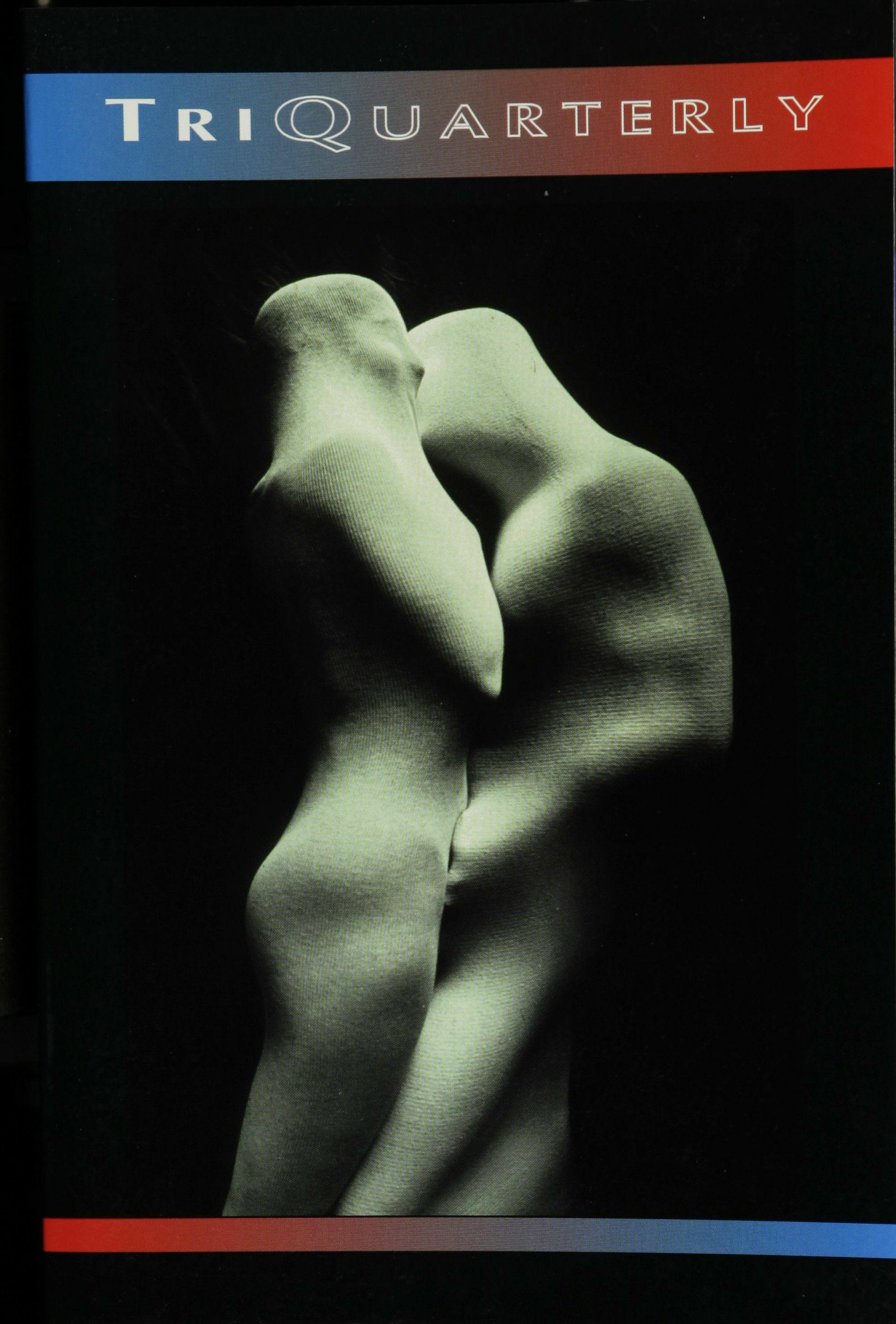
Publication of TriQuarterly is made possible in part by the donors of gifts and grants to the magazine. For their recent and continuing support, we are very pleased to thank The Illinois Arts Council, The Lannan Foundation, The John D. and Catherine T. MacArthur Foundation, The National Endow, ment for the Arts, The Sara Lee Foundation, The Chicago Community Trust, and individual donors.
TriQuarterly also thanks the following recent donors and life subscribers:
Simon J. Blattner, Jr.
Louise Blosten
Paul Brownfield
Robert Creamer
Eleanore Devine
W. S. Di Piero
John B. Elliott
Mr. and Mrs. H. Bernard Firestone
C. Dwight Foster
Amy Godine
Jay Harkey
Mr. and Mrs. David C. Hilliard
Irwin T. Holtzman
Helen Jacob
Loy E. Knapp
Greg Kuzma
Patrick Mangan

Charles T. Martin
Florence D. McMillan
Mr. and Mrs. Andrew McNally
Dorothy J. Mikuska
Michal Miller
William T. Morgan, Jr.
Alicia Ostriker
Linda Pastan
Fran Podulka
Mark Rudman
Gilaine Shindelman
Allen R. Smart
Gary Soto
Susan A. Stewart
Lawrence Stewart
Dorothy H. Taylor
Scott Turow
NOTE: TriQuarterly welcomes financial support in the form of donations, bequests and planned gifts. Please write to Reginald Gibbons, editor. Please see the last page and the inside back cover for names of individual donors to TriQuarterly.
�_ 9_1!_f!.._c_.!.J &I WK'" rl£I1'11'1 "ILUIII' This program is partially sponsored by a grant from the Illinois Arts Council
Illinois ARTS
1996 BOOKS AND BACKLIST

New Wrzters
EDITED BY REGINALD GIBBONS AND SUSAN HAHN
This unique collection showcases ten new writers (five poets and five fiction writers) who have won recognition only in the medium of the literary magazine. The anthology presents the best of new voices discovered through TriQuarterly magazine and TriQuarterly Books. From an O. Henry Award-winner to an MBA, contributors include Yolanda Barnes, Tammie Bob, Terri Brown-Davidson, Eileen Cherry, Loretta Collins, Page Dougherty Delano, Steve Fay, William Loizeaux, Dean Shavit and Cassandra Smith.
_GIl.nT
TriQuarterly
New Writers
136 pages $39.95, cloth \ $14.95, paper
MEREDITH STEINBACH
The Birth ofthe World As We Know It

IIIIIIIIB SIIIH\CH
208 pages \ $24.95, cloth
In this meditative little novel, Steinbach inhabits thefigureof Teiresias, the Theban seer, and delivers a metaphysical tour de force remarkablefor the light touch it sustains despite its wealth of allusions to Greek mythology. Told from various points ofview, the liquidstoryflows within an elastic timeframe, lightlydecorating the old myths as comments on life today This is all about our repetitions and confusionshistorical, sexual and psychological. Sentence by sentence, Steinbach's writing is as elegant as a neoclassical column.
-PUBLISHERS WEEKLY
MEREDITH STEINBACH
Zara
111111111 SIIII8\t11
277 pages I $15.95, paper
Steinbach's first novel tells the story of a strongyet vulnerable woman's attempts to reconcile hervarying roles as daughter, wife and doctor. Rich, horrific, beautiful, Zara is about the life of a woman extraordinary in every way, and is written in prose as strong and fabulous as Zara herself. I could not admire more this profound and exhilarating novel.
-John Hawkes
Steinbach probes vulnerability, futility in a style interlaced with quality and power.
-LOS ANGELES TIMES BOOK REVIEW
A masterpiece.
-BOSTON MAGAZINE
-
'�.'; '��
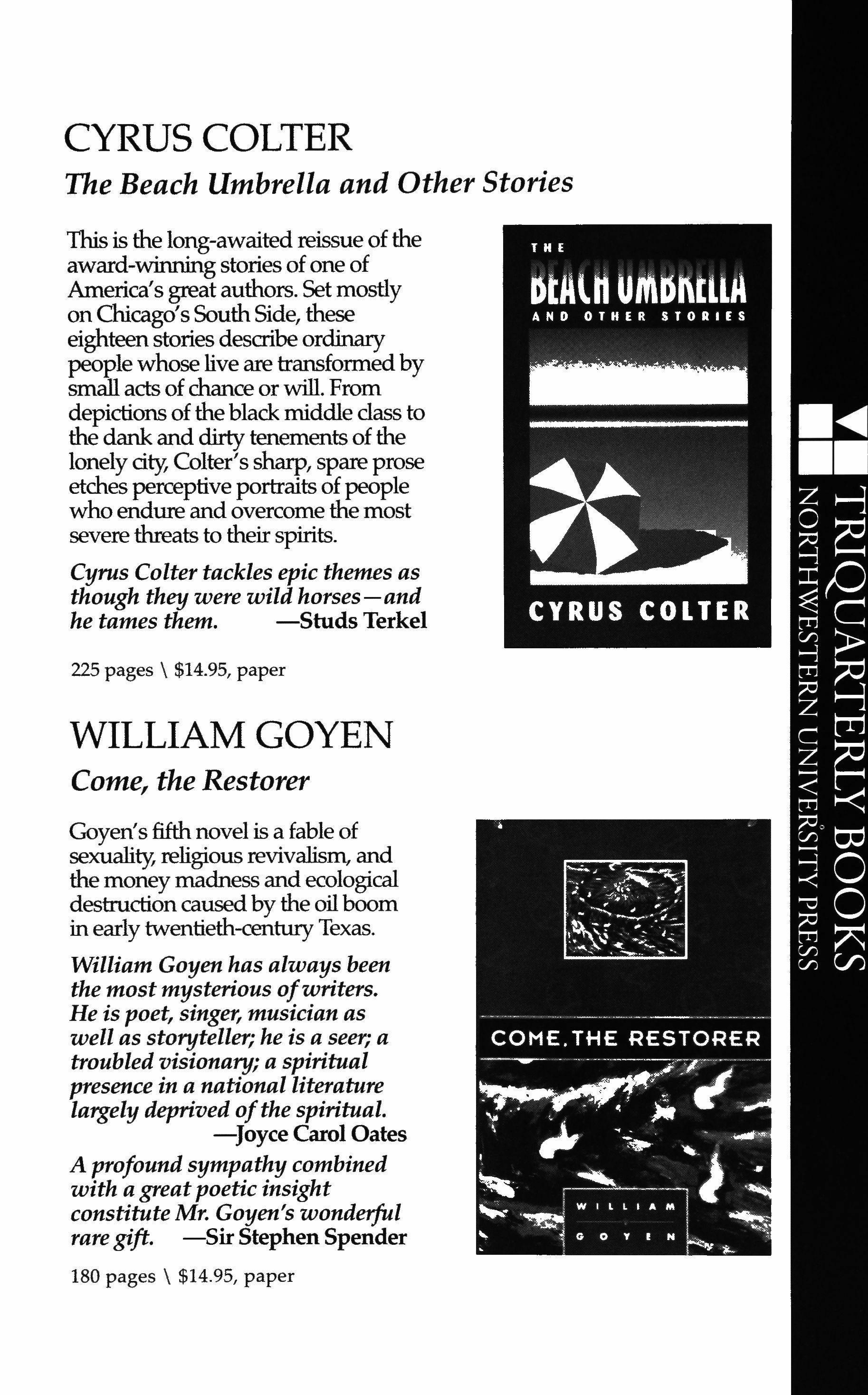
CYRUS COLTER
The Beach Umbrella and Other Stories
1his is the long-awaited reissue of the award-winning stories of one of America's greatauthors. Set mostly on Chicago's South Side, these eighteen stories describe ordinary people whose live are transformed by small acts of chance or will. From depictions of the black middle class to the dank and dirty tenements of the lonely city, Colter's sharp, spare prose etches perceptiveportraits ofpeople who endure and overcome the most severe threats to their spirits.
Cyrus Colter tackles epic themes as though they were wild horses-and he tames them. -Studs Terkel
225 pages \ $14.95, paper
WILLIAM GOYEN
Come, the Restorer
Goyen's fifth novel is a fable of sexuality, religious revivalism, and the money madness and ecological destruction causedby the oil boom in early twentieth-century Texas.
William Goyen has always been the most mysterious ofwriters. He is poet, singer, musician as well as storyteller; he is a seer; a troubled visionary; a spiritual presence in a national literature largely deprived ofthe spiritual.
-Joyce Carol Oates
A profoundsympathy combined with a greatpoetic insight constitute Mr. Goyen's wonderful rare gift. -Sir StephenSpender
180 pages \ $14.95, paper
CAROL FROST
Venus and Don Juan

90 pages $29.95, cloth \ $11.95, paper
JOHN PECK
M and Other Poems
136 page $29.95, cloth \ $12.95, paper
In her sixth book of poems, Frost makes striking discoveries in her signature style. Characteristically combining rich description with striking images, she evokes the complexities of emotional and moral states: love, lust, disappointment, competitiveness, loneliness, regret and envy.
Frost has an uncanny ability to disassociatefrom and observe emotion transformingher observations into shimmeringand hauntingimages.
-LIBRARY JOURNAL
Frost's work is dense, requiring-and rewarding-the reader's deep attention.
-PUBLISHERS WEEKLY
New work exploring the vulnerability and tenacity of human life from a member of a remarkable generation of poets.
Peck has established himself as a majorpoet, opening up territory no one else has attempted.
-TIMES LITERARY SUPPLEMENT
With his stylistic combination of elementsfrom two heroes: the detailed imagery ofEzra Pound and the conceptual coherence of Yvor Winters Peck's densely allusive and highly cerebral work rewards the rigorous reading that it demands.
-PUBLISHERS WEEKLY
BRUCE WEIGL
Sweet Lorain
An elegist of the lives of those who have been changed by hardship and suffering, Bruce Weigl has become one of the most admired American poets of his generation. In this new volume, Weigl returns to both Lorain, Ohio, and Vietnam, to explore the connection between his childhood in a working-class world, and the powerful effects of the American war in Vietnam on all of us.
PRAISE FOR BRUCE WEIGL
These are hard-edged, partisan works imbued with the spirits of Philip Levine and James Dickey.
-WASHINGTON POST BOOK WORLD
WILLIAM OLSEN
Vision of a Storm Cloud
Olsen's poems are energetic, expansive and romantic; his ability to manipulate language, image and form harkens back to the traditions of Blake and Whitman, while his range of subject and his use of metaphor forge his own uniqueand contemporary-artistic signature. These poems are a rich, dense and polished example of the voice of a strong new poet.
William Olsen teaches English at the University of Western Michigan. His poems have appeared in numerous periodicals, including the Paris Review, the Nation, the New Republic and Crazyhorse.

76 pages $29.95, doth I $11.95, paper
136
pages $29.95, cloth\$12.95, paper
W. S. DI PIERO
Shooting the Works: On Poetry and Pictures

'. :.!'I,.� ,.� SHOOT1NG ''', 1,.1 THE WORKS
230 pages $29.95, cloth \ $14.95, paper
Elegant and passionate tributes to the intersection of art and self, from the most gifted poet-critic of his generation. In brilliant prose, Oi Piero moves from educated ruminations on the frescoes of Florence's Santa Maria del Carmine to the politics of Pound to reflections on his working-classbackground and poetic development. Oi Piero's essays are an autobiographical testing of ideas; in their searching honesty they are deeply akin to Witold Gombrowicz's diaries
Di Piero's taste and judgments are refreshingly idiosyncratic, his frame ofreference broad.
-PUBLISHERS WEEKLY
STERLING A. BROWN
The Collected Poems ofSterling A. Brown
EDITED BY MICHAEL s. HARPER
267 pages \ $12.95, paper
One of the most important of American poets, Sterling Brown is a contemporary of Langston Hughes, Claude McKay and Jean Toomer. At once thoughtful and daring, Brown is known for his handling of folk materials, for his lack of pretension, and for his frank and unflinching portrayal of the Southern African-American experience. This is the definitive collection of his poems, and the only edition available in the Ll.S, This is a great book ofpoems, stunning in its artistry andgigantic in its vision.
-Philip Levine
i
K. ULL'CTID IOI: �or
TRUDY LEWIS
Private Correspondences
Winner of the 1994 William Goyen Prize for Fiction
This moral thunderclap of a novel portrays a teenage girlwho, attacked by violent evil, chooses not to flee itbut to face it, and then to embrace it. In prose that swings between lyrical moments of illumination and gritty sexual insight, Lewis explores the effects of male force and brutality on women and the issue of women's complicity in sexual violence.
Lewis's shatteringstudyofsexual violence and individual vulnerability is both timely and universally resonant - PUBUSHERS WEEKLY
This erotic, steamy tightly wound mystery story will holdyour interest to its phantasmagorical conclusion.

198 pages
$19.95, cloth/$12.95, paper
-CHICAGO TRIBUNE
BACKLIST
DAVID BARBER
The Spirit Level
Winner of the 1995 Terrence Des Pres Prize for Poetry
Filled with rich detail and striking metaphor, these poems are both technically brilliant and irresistibly inviting.
$29.95, cloth \ $12.95, paper
ANNE CALCAGNO
Prayfor Yourself
An exhilarating collection of short stories by an author with an abiding understanding of the fragile yet eduring nature of human relationships and of the textures of women's lives.
Calcagno has the clean voice and sharp unblinking eye of a true storyteller.
-Larry Heinemann
Language as maddeninglyfascinating as afifty-car locomotive, perfectly carved, from a single piece ofwood. -Lynda Barry
$26.95, cloth \ $12.95, paper
DANCHAON Fitting Ends
Title story chosen by John Edgar Wideman for inclusion in Best American Short Stories 1996.
Each story is a marvel ofcomplexity, dense with meaning and nuance a remarkable collectionfrom a young writer who bears careful watching. Veryfewfirst works are as solid, moving and pitch-perfect as Chaon'.s. -THE G..EVEl.AND PLAIN DEALER
$35, cloth \ $14.95, paper
CYRUS COLTER
A Chocolate Soldier
Colter's crowning work, this novel tells the tale of an unlikely friendship which transcends boundaries nad circumstances in pre-civil rights America. This powerful writer should win the attention ofevery serious reader offiction.
--SATIJRDAY REVIEW
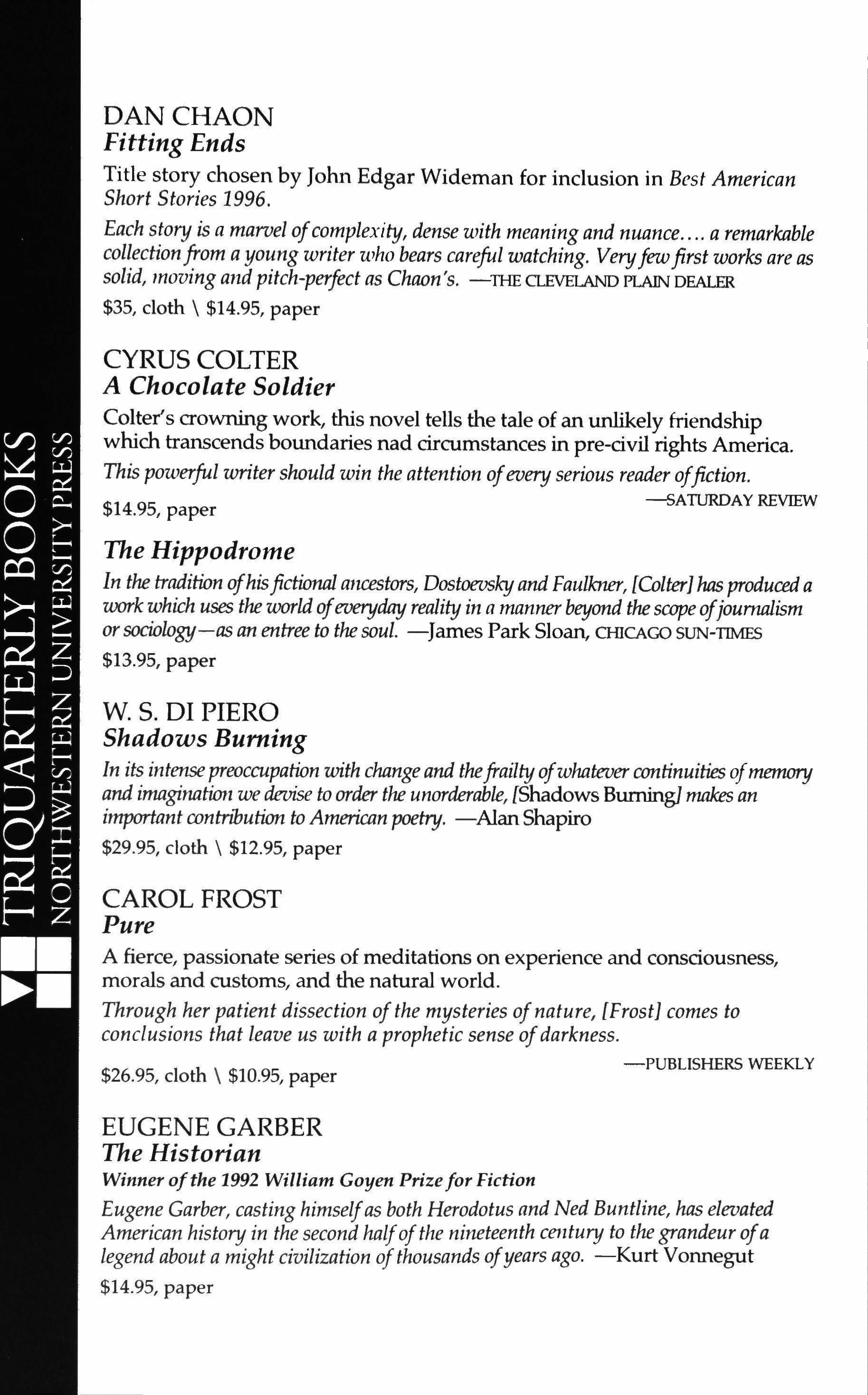
$14.95, paper
The Hippodrome
In the tradition ofhisfictional ancestors, Dostoevsky and Faulkner, [Colter) has produced a work which uses the world ofeverydayreality in a manner beyond thescope ofjournalism or sociology-as an entree to the soul. -James Park Sloan, CHICAGO SUN-TIMES
$13.95, paper
W. S. DI PIERO
Shadows Burning
In its intensepreoccupation with change and thefrailtyofwhatever continuities ofmemory and imagination we deoise to order the unorderoble, [Shadows Burning} makes an important contribution to American poetry. -Alan Shapiro
$29.95, cloth \ $12.95, paper
CAROL FROST
Pure
A fierce, passionate series of meditations on experience and consciousness, morals and customs, and the natural world.
Through her patient dissection of the mysteries ofnature, [Frost] comes to conclusions that leave us with a prophetic sense ofdarkness.
-PUBLISHERS WEEKLY
$26.95, cloth \ $10.95, paper
EUGENE GARBER
The Historian
Winner ofthe 1992 William Goyen Prizefor Fiction
Eugene Garber, casting himselfas both Herodotus and Ned Buntline, has elevated American history in the second halfofthe nineteenth century to the grandeurofa legend about a might civilization ofthousands ofyears ago. -Kurt Vonnegut
$14.95, paper
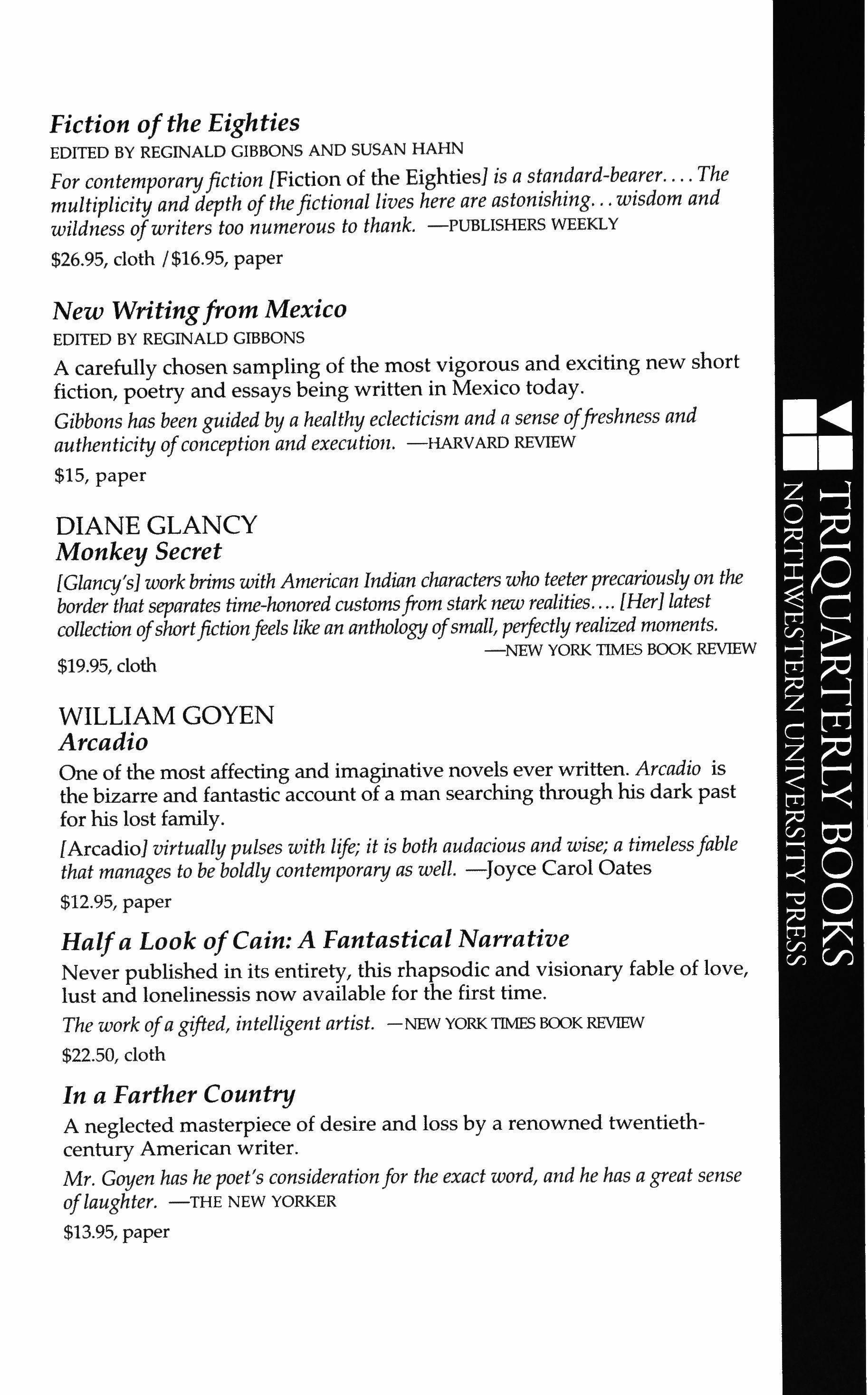
Fiction of the Eighties
EDITED BY REGINALD GIBBONS AND SUSAN HAHN
For contemporaryfiction [Fiction of the Eighties] is a standard-bearer The multiplicity and depth ofthefictional lives here are astonishing wisdom and wildness ofwriters too numerous to thank. -PUBLISHERS WEEKLY
$26.95, cloth /$16.95, paper
New Writingfrom Mexico
EDITED BY REGINALD GIBBONS
A carefully chosen sampling of the most vigorous and exciting new short fiction, poetry and essays being written in Mexico today. Gibbons has been guided by a healthy eclecticism and a sense offreshness and authenticity ofconception and execution. -HARVARD REVIEW
$15, paper
DIANE GLANCY
Monkey Secret
[Glancy's} work brims with American Indian characters who teeter precariously on the border that separates time-honored customsfrom stark new realities [Her} latest collection ofshortfictionfeels like an anthologyofsmall, perfectly realized moments.
$19.95, cloth -NEW YORK TIMES BOOK REVIEW
WILLIAM GOYEN
Arcadio
One of the most affecting and imaginative novels ever written. Arcadio is the bizarre and fantastic account of a man searching through his dark past for his lost family.
[Arcadio} virtuallypulses with life; it is both audacious and wise; a timelessfable that manages to be boldly contemporary as well. -Joyce Carol Oates
$12.95, paper
Halfa Look ofCain: A Fantastical Narrative
Never published in its entirety, this rhapsodic and visionary fable of love, lust and lonelinessis now available for the first time.
The work ofa gifted, intelligent artist. -NEW YORK TIMES BOOK REVIEW
$22.50, cloth
In a Farther Country
A neglected masterpiece of desire and loss by a renowned twentiethcentury American writer.
Mr. Goyen has he poet's considerationfor the exact word, and he has a great sense oflaughter. -THE NEW YORKER
$13.95, paper

ANGELA JACKSON
Dark Legs and Silk Kisses: The Beatitudes ofthe Spinners
Winner ofthe Carl SandburgAward and the 1993 Chicago Sun-Times Book ofthe YearAward in Poetry
This volume of poems features an impressive variety of characters exploring social identity, the rituals of race relations, the female psyche, creativity and spiritual experience.
Angela Jackson has known,for long, what is rightfor her attention and scrupulous investigation. -Gwendolyn Brooks
$25, cloth \ $11.95, paper
The Urgency
of
Identity: Contemporary English-Language Poetryfrom Wales
EDITED BY DAVID LLOYD
This anthology of poems and interviews presents for the first time in this country the important English-language Welsh poetry of the 1980s and 1990s. Includes work byJohn Davies, Gillian Oarke and R. S. Thomas, among others.
$39.95, cloth \ $14.95, paper
ADRIAN C. LOUIS
Vortex ofIndian Fevers
Wordplay, metaphoricbrilliance, technical virtuosity and a scathingly sardonic critique of self and society fill this new collection.
Beautifullyaglow with the love oflanguage. -James Tate
Prophetic, terrifyingly intelligent, unconditionally germane. -Hayden Carruth
First person, jugular: That is the voice ofLouis he refuses to scurry and cry and rides right into our lives with the languageofPound, Williams, and Ginsberg, driven mad by all that he sees. Paterson on the High Plains. -mE BLOOMSBURY REVIEW
$29.95, cloth \ $11.95, paper
LINDA McCARRISTON
Eva-Mary
National Book Award Finalistand Winner ofthe Terrence Des Pres PrizeforPoetry
An immensely moving book,fearless in its passion. Linda McCarriston accomplishes a near miracle, transforming memories oftrauma into poems that are luminous and often sacramental, arriving at a hard-won peace. - Lisel Mueller
$10.95, paper
PETER READING
Ukulele Music Perduta Gente
The first u.s. publication of the most controversial English poet of the age. Rarely has any poet found a way to address the most appalling and dispiriting aspects of life with such astonishing artistic virtuosity.
$26.95, doth \ $11.95, paper
MURIEL RUKEYSER
Out of Silence: Selected Poems
EDITED
BY
KATE DANIELS
Thefirstofour women poets to enter and engage the Western tradition ofprophetic outrage, she uarmed it with the living voices ofthe injured. And in heractivism and generosity, Rukeyser was as good as her word. -Eleanor Wilner
ThepublicationofOut ofSilence is an event worthyofcelebration.
-THE WOMEN'S REVIEW OF BOOKS
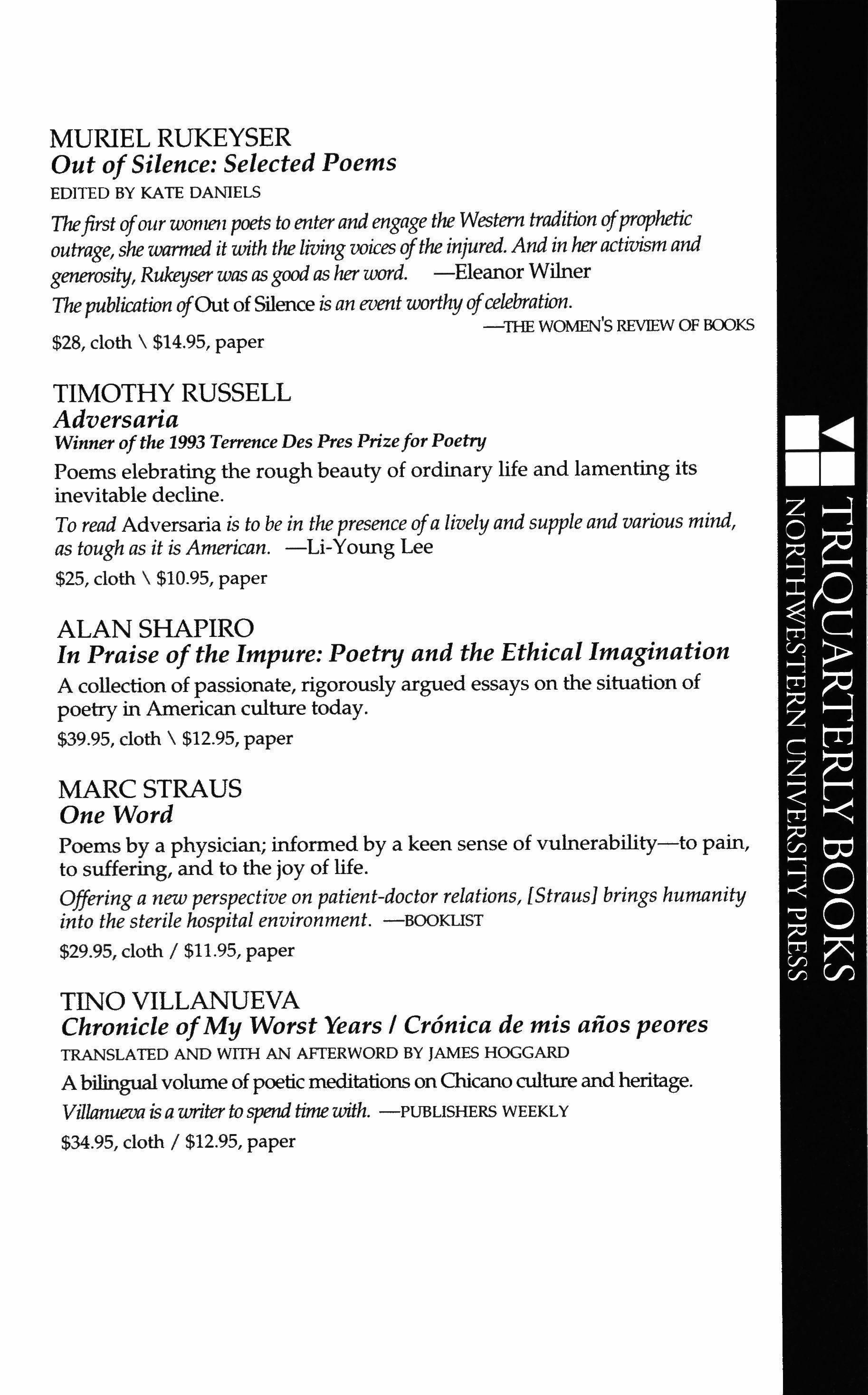
$28, cloth \ $14.95, paper
TIMOTHY RUSSELL
Adversaria
Winner of the 1993 Terrence Des Pres PrizeforPoetry
Poems elebrating the roughbeauty of ordinary life and lamenting its inevitable decline.
To read Adversaria is to be in the presence ofa lively and supple and various mind, as tough as it is American. -Li-Young Lee
$25, cloth \ $10.95, paper
ALAN SHAPIRO
In Praise of the Impure:
Poetry and
the
Ethical Imagination
A collection of passionate, rigorously argued essays on the situation of poetry in American culture today.
$39.95, cloth \ $12.95, paper
MARC STRAUS
One Word
Poems by a physician; informed by a keen sense of vulnerability-to pain, to suffering, and to the joy of life.
Offering a new perspective on patient-doctor relations, [Straus] brings humanity into the sterile hospital environment. -BOOKUST
$29.95, cloth / $11.95, paper
TINO VILLANUEVA
Chronicle ofMy Worst Years I Cronica de mis alios peores
TRANSLATED AND WTIH AN AFTERWORD BY JAMES HOGGARD
Abilingual volume of poetic meditations on Chicano culture and heritage. Villanueva is a writer tospend timewith. -PUBLISHERS WEEKLY
$34.95, cloth / $12.95, paper
BRUCE WEIGL
What Saves Us
In these wrenching, elegant poems Bruce Weigl writes out of uncompromising memory and vision.
Bruce Weigl has become one of the best poets now writing in America.
$17 cloth / $11.95 paper -Denise Levertov
THEODORE WEISS
Selected Poems
The definitive selection of poems by one of America's most distinguished and original poets.
[Weiss's poetry] is among the most valuable work produced in our time.
$49.95, cloth/$15.95, paper -James Merrill
EVAN ZIMROTH
Dead, Dinner, or Naked
Poems rooted in history, myth and everyday life.
I love the combination ofsmartness, pain, and what one might call conscious postmodern trashiness in this book A profoundly urban book, ofharsh memory andfantasy, set in harsher reality. -Alida Ostriker
$15, cloth /$8.95, paper
Order «'orm
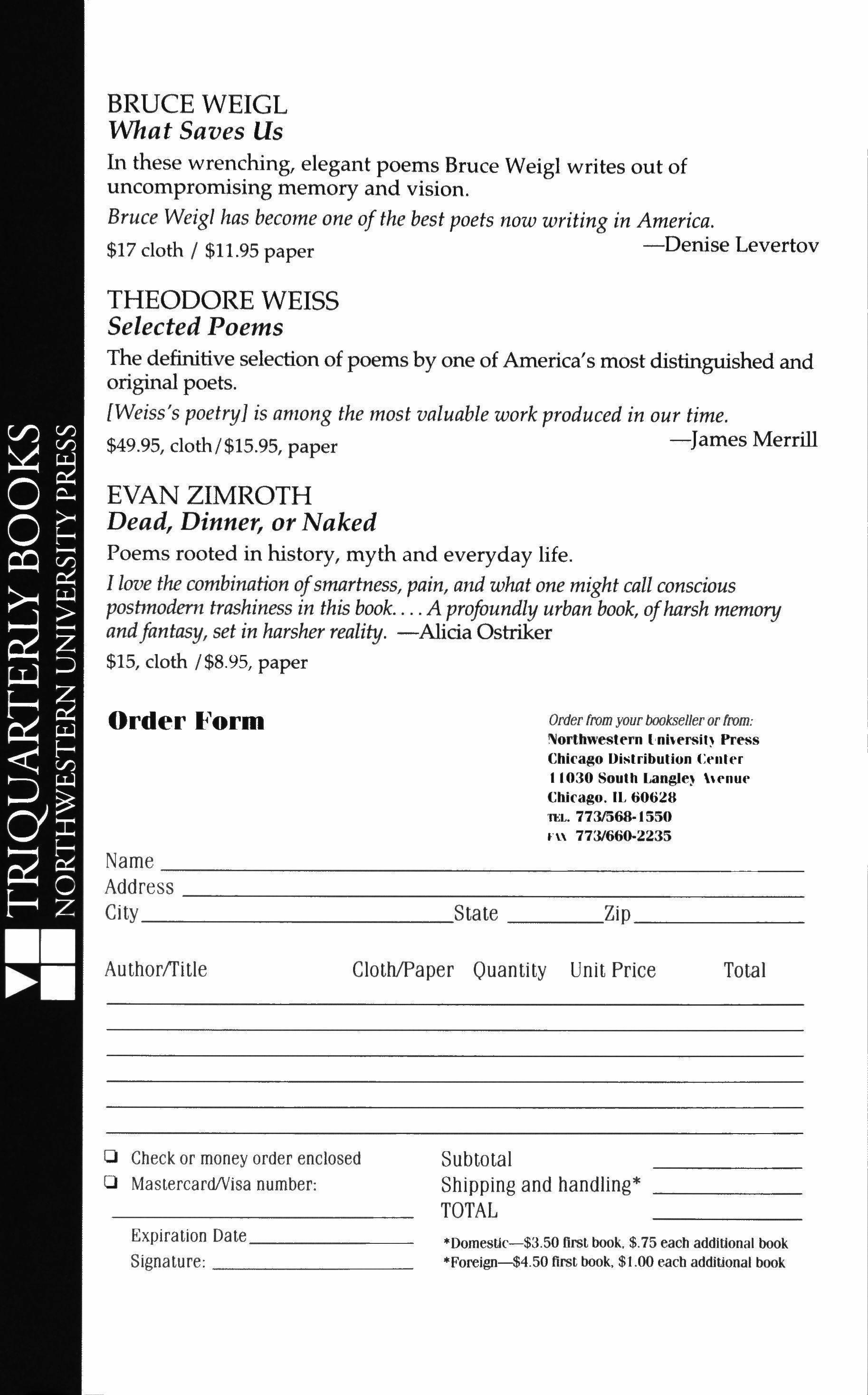
Order from your bookseller or from: �orthwest('rn tnil('rsit� Prt'Ss Chicago Distribution (;(,III('r 11030 South Lallgle� \\(,IIU(, Cbifago. It 60628 'I1\L. 7731568·1550 H\ 7731660-2235
Name Address
City State Zip
Authorlfitle
o Check or money order enclosed
o Mastercard/visa number:
Expiration Date
Signature:
ClothlPaper Quantity Unit Price Total
Subtotal Shipping
handling* TOTAL
and
*Domestlc-$3.50 tlrst book. $.75 each additional book *Foreign-$4.50
book. $1.00 each additional book
Urst
Editor
Reginald Gibbons
Managing Editor Kirstie Felland

Co�Editor Susan Hahn
Executive Editor Bob Perlongo Assistant Editor Gwenan Wilbur
Special Projects Editor Fred Shafer
TriQuarterly Fellow
James Lang
Advisory Editors
Design Director Gini Kondziolka
Editorial Assistants
Kemba Johnson, Jacob Harrell, Dylan Rice, Elizabeth Taggart
Hugo Achugar, Michael Anania, Stanislaw Baranczak, Cyrus Colter, Rita Dove, Richard Ford, George Garrett, Michael S. Harper, Bill Henderson, Maxine Kumin, Grace Paley, John Peck, Michael Ryan, Alan Shapiro, Ellen Bryant Voigt
TRIQUARTERLY IS AN INTERNATIONAL JOURNAL OF WRITING, ART AND CULTURAL INQUIRY PUBLISHED AT NORTHWESTERN UNIVERSITY.
Subscription rates (three issues a year) - Individuals: one year $24; two years $44; life $600. Institutions: one year $36; two years $68. Foreign subscriptions $5 per year additional. Price of back issues varies. Sample copies $5. Correspondence and subscriptions should be addressed to TriQuarterly, NORTHWESTERN UNIVERSITY, 2020 Ridge Avenue, Evanston, IL 60208. Phone: (847) 491-7614. The editors invite submissions of fiction, poetry and literary essays, which must be postmarked between October 1 and March 31; manuscripts postmarked between April 1 and September 30 will not be read. No manuscripts will be returned unless accompanied by a stamped, self-addressed envelope. All manuscripts accepted for publication become the property of TriQuarterly, unless otherwise indicated. Copyright © 1997 by TriQuarterly. No part of this volume may be reproduced in any manner without written permission. The views expressed in this magazine are to be attributed to the writers, not the editors or sponsors. Printed in the United States of America by Thomson-Shore; typeset by TriQuarterly. ISSN: 0041-3097.
National distributors to retail trade: Ingram Periodicals (La Vergne, TN); B. DeBoer (Nutley, NJ); Ubiquity (Brooklyn, NY); Armadillo (Los Angeles, CAl; Fine Print (Austin, TX).
Reprints of issues #1-15 of TnQuarterly are available in full format from Kraus Reprint Company, Route 100, Millwood, NY 10546, and all issues in microfilm from University Microfilms International, 300 North Zeeb Road, Ann Arbor, MI 48106. TriQuarterly is indexed in the Humanities Index (H.W.Wilson Co.), the American Humanities Index (Whitson Publishing Co.), Historical Absrracts, MLA, EBSCO Publishing (Peabody, MA) and Information Access Co. (Foster City, CAl.
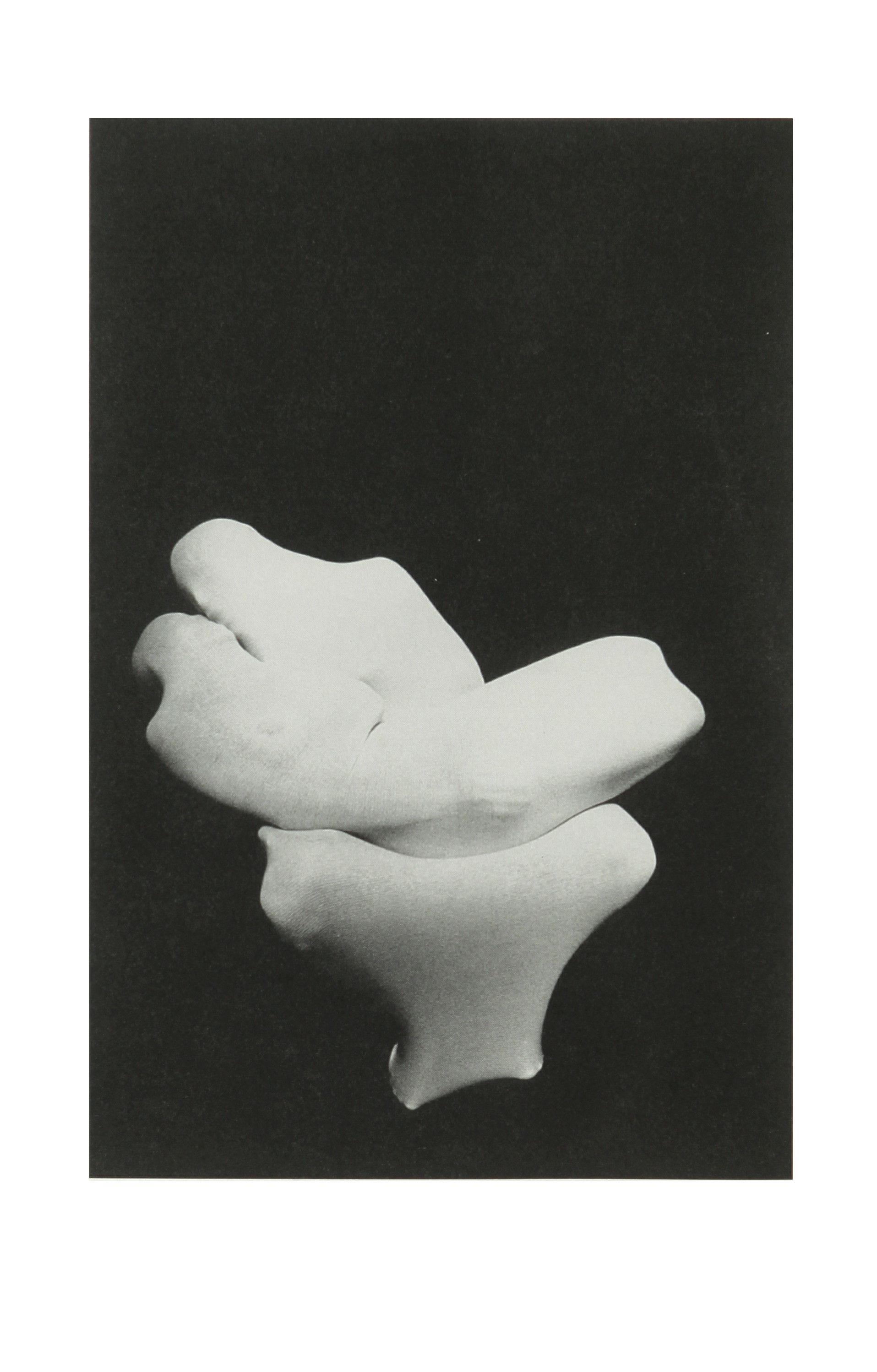

Contents Editor of this issue: Susan Hahn INTERVIEW A Conversation with Alice Fulton 22 Alec Marsh MEDITATION On Donald Barthelme 41 Edward Hirsch FICTION From The Feast of l-ove •.•.•••.•••••..............•.••.•.•.••• 65 Charles Baxter To China 82 Leigh Buchanan Bienen The Poet 101 Stephen Dixon How to Stop Loving Someone: A Twelve-Step Program .......•..........•.............•..• 167 Joan Connor Men Wearing Eye Shadow 1 77 Cammie McGovern The Rain in Kilrush 193 Michael Collins 15
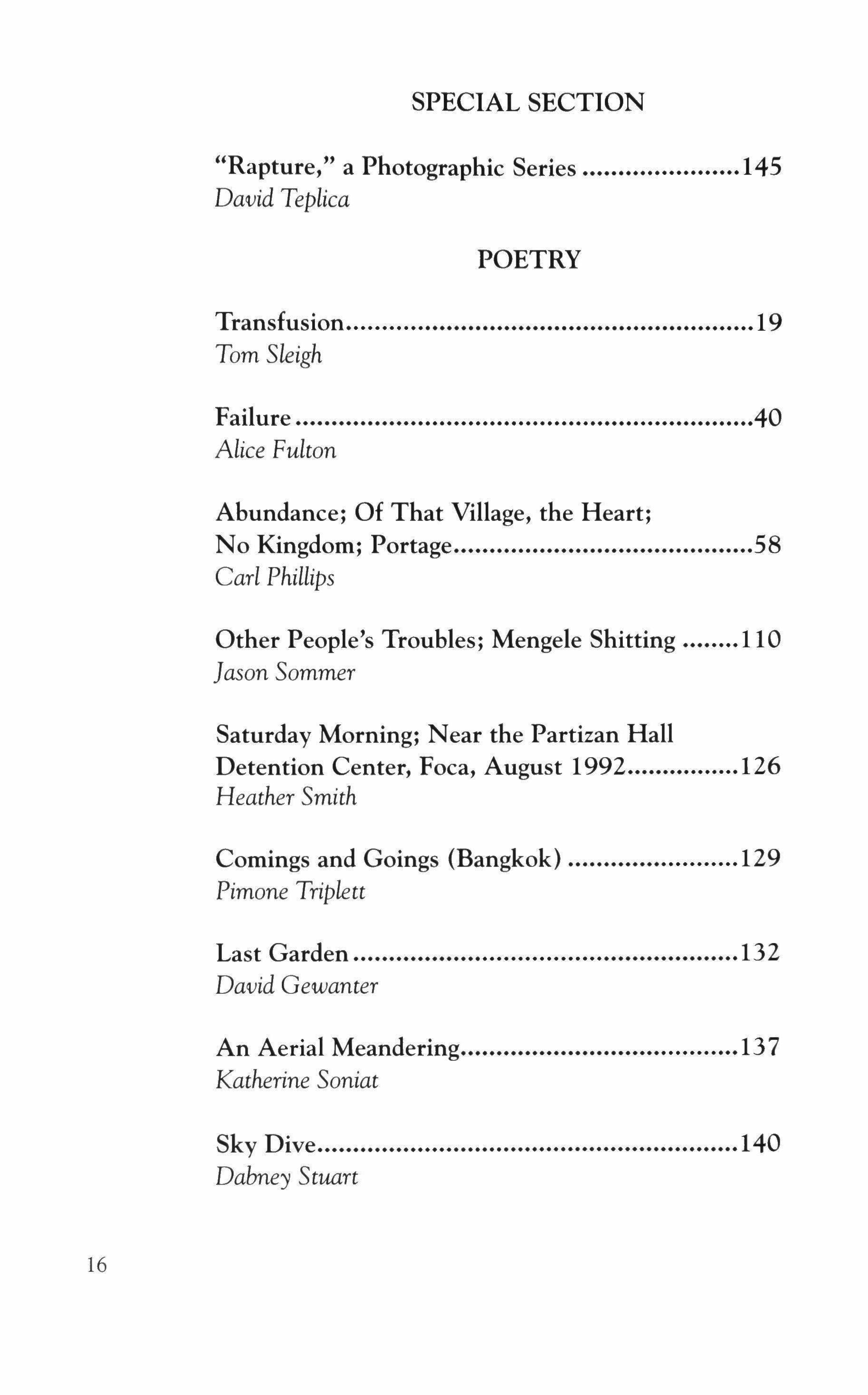
SPECIAL SECTION "Rapture," a Photographic Series ••••..•••.........••.. 145 David Teplica POETRY Transfusion 19 Tom Sleigh Failure 40 Alice Fulton Abundance; Of That Village, the Heart; No Kingdom; Portage ••••••........••.••..............•...•.... 58 Carl Phillips Other People's Troubles; Mengele Shitting 110 Jason Sommer Saturday Morning; Near the Partizan Hall Detention Center, Foca, August 1992 126 Heather Smith Comings and Goings (Bangkok) 129 Pimone Triplett Last Garden 132 David Gewanter An Aerial Meandering ••••••••.........•.•..................• 137 Katherine Soniat Sky Dive 140 Dabney Stuart 16
From Short Lines 159
Alan Williamson
The Angel of Melancholy 163
Eric Pankey
My Groom 165
Jill Bialosky
Easter Raga 251
Vikas Menon

ARTICLE
Tolstoy's American Disciple: Letters to Ernest Howard Crosby, 1894,1906 210
Robert Whittaker
CONTRIBUTORS 253
Cover photograph by David Teplica
Cover design by Gini Kondziolka
Photographs on pages 14, 18 and 255 by David Teplica
17
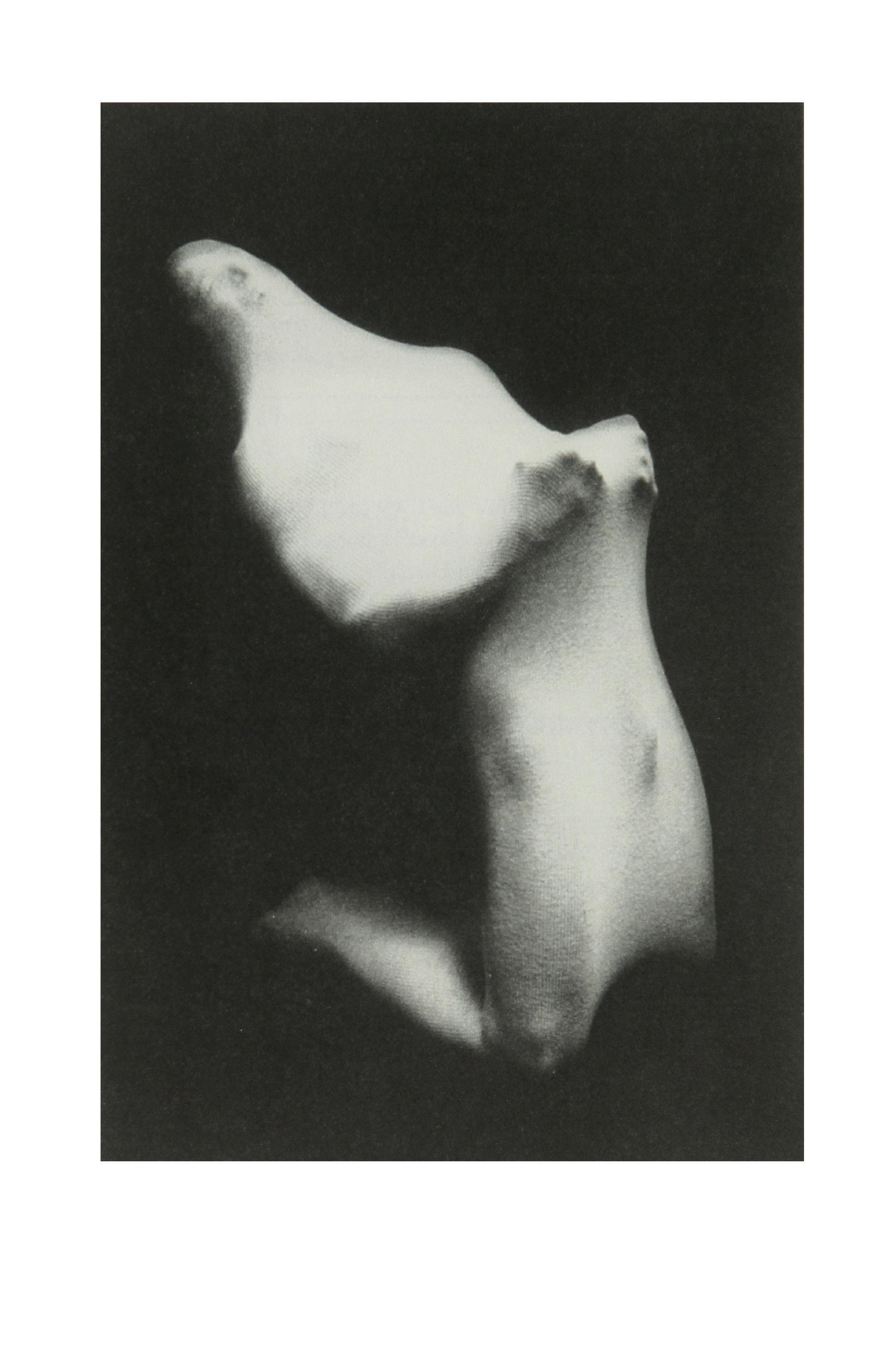
Transfusion
Tom Sleigh
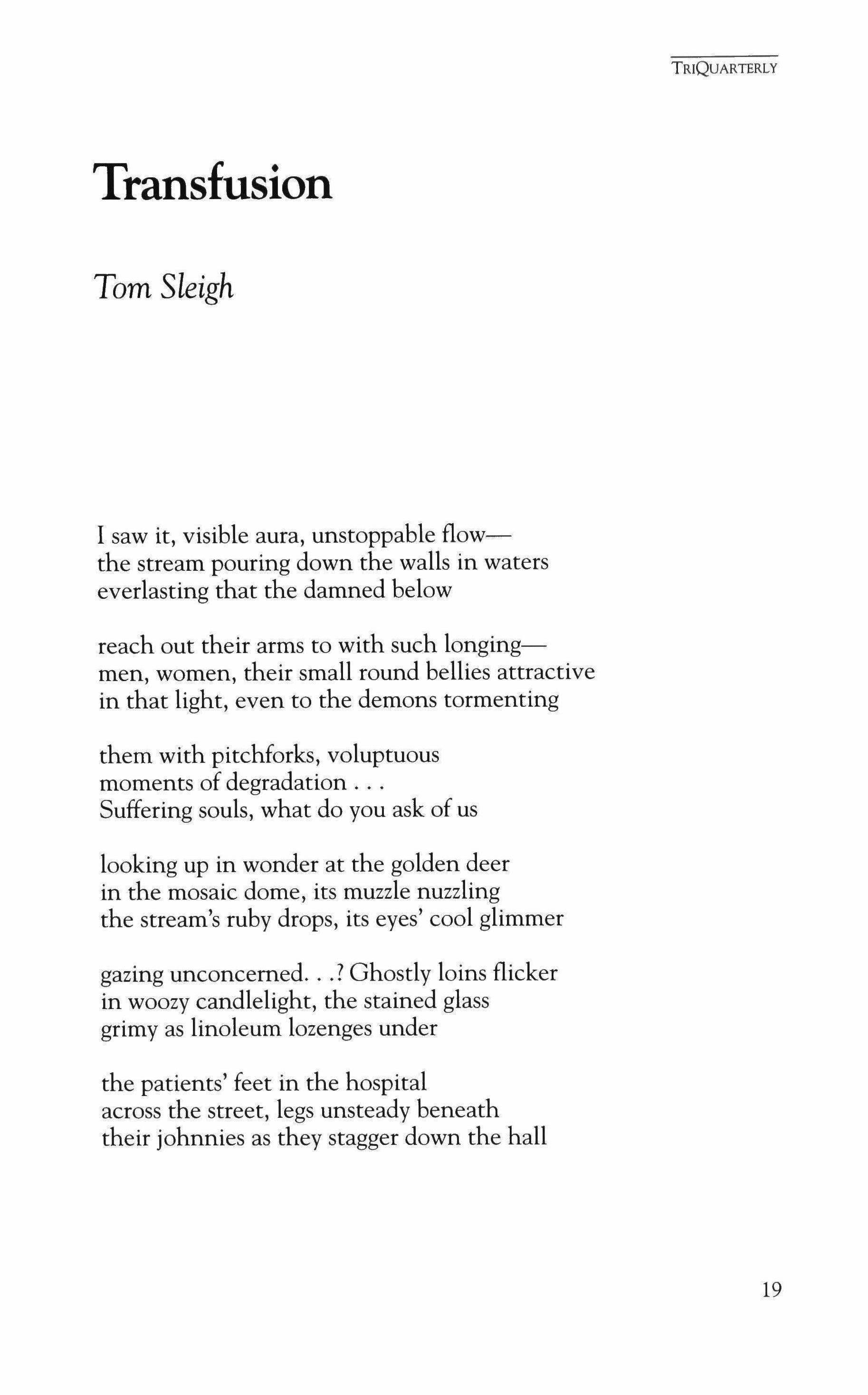
I saw it, visible aura, unstoppable flowthe stream pouring down the walls in waters everlasting that the damned below
reach out their arms to with such longingmen, women, their small round bellies attractive in that light, even to the demons tormenting them with pitchforks, voluptuous moments of degradation Suffering souls, what do you ask of us
looking up in wonder at the golden deer in the mosaic dome, its muzzle nuzzling the stream's ruby drops, its eyes' cool glimmer gazing unconcerned ? Ghostly loins flicker in woozy candlelight, the stained glass grimy as linoleum lozenges under
the patients' feet in the hospital across the street, legs unsteady beneath their johnnies as they stagger down the hall
TRIQUARTERLY 19
TRIQUARTERLY
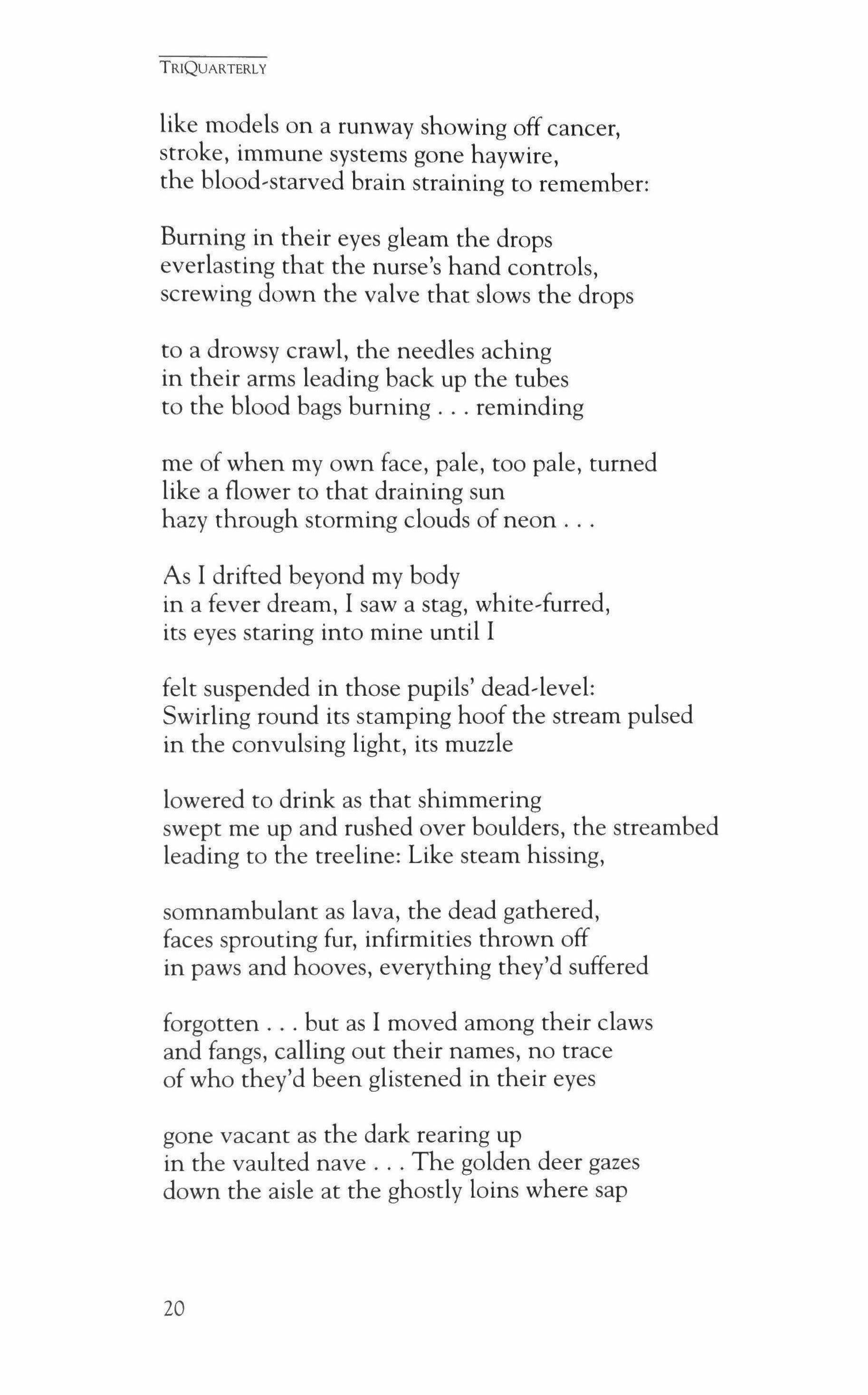
like models on a runway showing off cancer, stroke, immune systems gone haywire, the blood-starved brain straining to remember:
Burning in their eyes gleam the drops everlasting that the nurse's hand controls, screwing down the valve that slows the drops
to a drowsy crawl, the needles aching in their arms leading back up the tubes to the blood bags burning reminding
me of when my own face, pale, too pale, turned like a flower to that draining sun hazy through storming clouds of neon
As I drifted beyond my body in a fever dream, I saw a stag, white-furred, its eyes staring into mine until I
felt suspended in those pupils' dead,level: Swirling round its stamping hoof the stream pulsed in the convulsing light, its muzzle
lowered to drink as that shimmering swept me up and rushed over boulders, the streambed leading to the treeline: Like steam hissing,
somnambulant as lava, the dead gathered, faces sprouting fur, infirmities thrown off in paws and hooves, everything they'd suffered
forgotten but as I moved among their claws and fangs, calling out their names, no trace of who they'd been glistened in their eyes
gone vacant as the dark rearing up in the vaulted nave The golden deer gazes down the aisle at the ghostly loins where sap
20
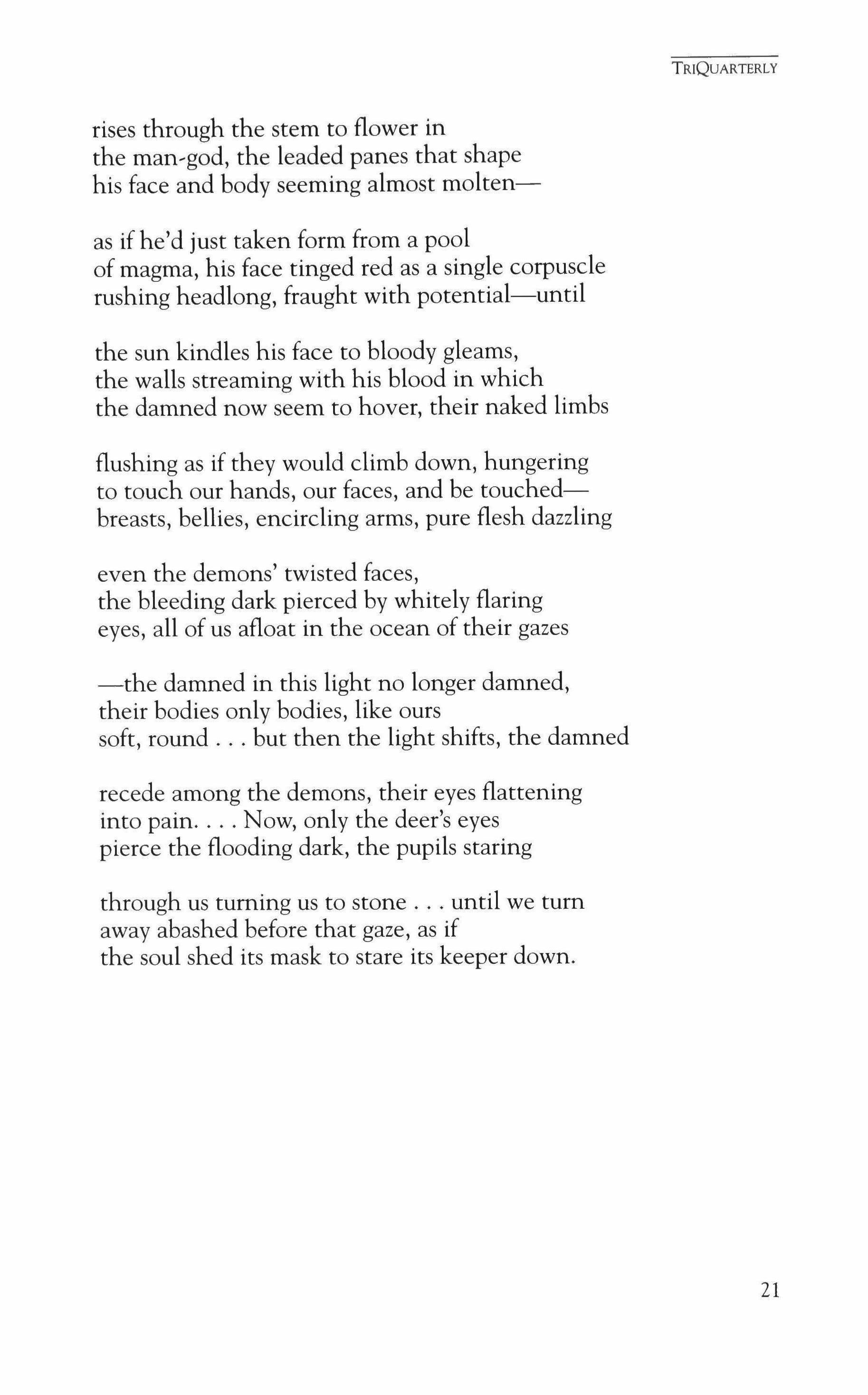
rises through the stem to flower in the man-god, the leaded panes that shape his face and body seeming almost molten-
as if he'd just taken form from a pool of magma, his face tinged red as a single corpuscle rushing headlong, fraught with potential-until the sun kindles his face to bloody gleams, the walls streaming with his blood in which the damned now seem to hover, their naked limbs
flushing as if they would climb down, hungering to touch our hands, our faces, and be touchedbreasts, bellies, encircling arms, pure flesh dazzling
even the demons' twisted faces, the bleeding dark pierced by whitely flaring eyes, all of us afloat in the ocean of their gazes
-the damned in this light no longer damned, their bodies only bodies, like ours soft, round but then the light shifts, the damned
recede among the demons, their eyes flattening into pain Now, only the deer's eyes pierce the flooding dark, the pupils staring
through us turning us to stone until we tum away abashed before that gaze, as if the soul shed its mask to stare its keeper down.
TRIQUARTERLY 21
A Conversation with Alice Fulton
Alec Marsh
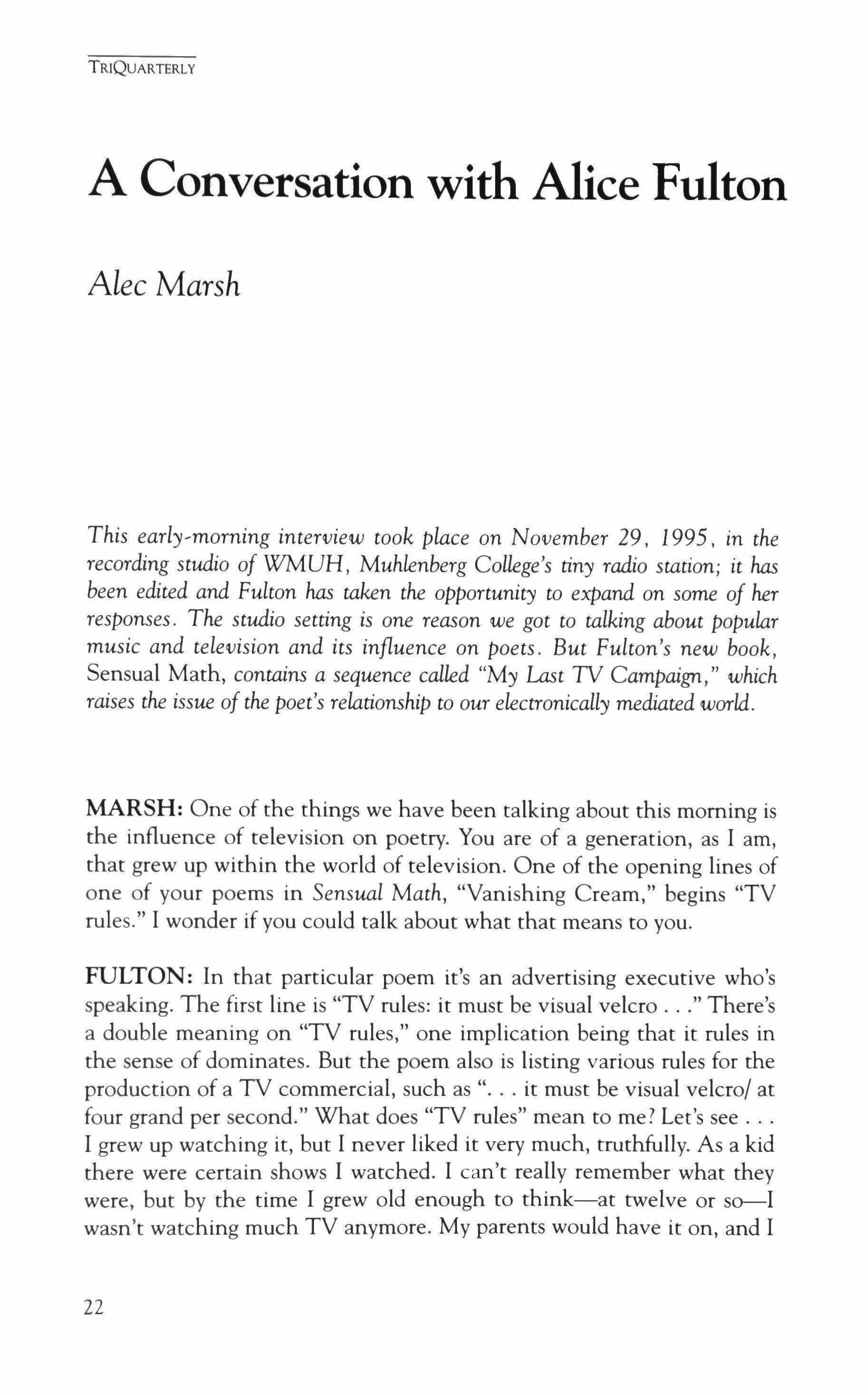
This early�morning interview took place on November 29, 1995, in the recording studio of WMUH, Muhlenberg College's tiny radio station; it has been edited and Fulton has taken the opportunity to expand on some of her responses. The studio setting is one reason we got to talking about popular music and television and its influence on poets. But Fulton's new book, Sensual Math, contains a sequence called "My Last TV Campaign," which raises the issue of the poet's relationship to our electronically mediated world.
MARSH: One of the things we have been talking about this morning is the influence of television on poetry. You are of a generation, as I am, that grew up within the world of television. One of the opening lines of one of your poems in Sensual Math, "Vanishing Cream," begins "TV rules." I wonder if you could talk about what that means to you.
FULTON: In that particular poem it's an advertising executive who's speaking. The first line is "TV rules: it must be visual velcro There's a double meaning on "TV rules," one implication being that it rules in the sense of dominates. But the poem also is listing various rules for the production of a TV commercial, such as it must be visual velcro/ at four grand per second." What does "TV rules" mean to me? Let's see I grew up watching it, but I never liked it very much, truthfully. As a kid there were certain shows I watched. I can't really remember what they were, but by the time I grew old enough to think-at twelve or so---I wasn't watching much TV anymore. My parents would have it on, and I
TRIQUARTERLY
22

would be up in my room listening to records or reading. What was happening to music in the sixties was more powerful to me than anything I saw on TV. I always found TV kind of vacuous and boring, in fact. Other people seemed to find it mesmerizing but at that time and I guess even today I don't find it very engaging. I can walk away from it, tum it off. My husband, for instance, says that he can't do that. He gets sucked in; he's a visual person, a painter, and he finds it much more engaging than I do.
I tend to disagree with many of the values encouraged by TV. In "My Last TV Campaign," the ad executive, after a life of selling dish soap, et cetera, is given the chance-finally-to create a campaign for something she or he believes in, a big idea that could have a positive social impact. The poem considers the difficulties of presenting or "selling" ideas that are not already part of culture. At least, that's one thing the poem does.
MARSH: I wonder if "TV rules" dictate, or give you a structure from which the quick cuts of your poetry are derived. Is there an influence there?
FULTON: Well, in "Vanishing Cream" there might be an influence. That poem quotes from ad copy the speaker is trying to write. It is a little disjunctive at times. But the disjunctiveness in other poems of mine probably comes more from what I've read and from postmodem ideas that question continuity and unity. Shifts of viewpoint and diction are a means of disrupting the poem's surface. I'm interested in dismantling the single, firm, unified speaking voice. Rather than the continuity and smoothness and polish of a steady subject, I'm interested in plurality of voices and registers of diction. My notion of poetry itself suggests quick cuts-those moves that used to be called poetic leaps. They allow the reader to fill in the gaps and participate by recreating the poem's meaning in their own minds. Poetry, to a greater degree than prose, depends on what happens between the lines. The gap between meanings is wider in poetry. My concept of poetry depends upon deletion and non sequiturs that the reader can reconstruct into meaning. To me this is a component of poetry. It has nothing to do with TV.
MARSH: I noticed when you were reading last night that some of the poems that I took to be monologic actually seemed to have a couple of voices coming in. It suggests to me that often lines that are taken off the
TRIQUARTERLY
23
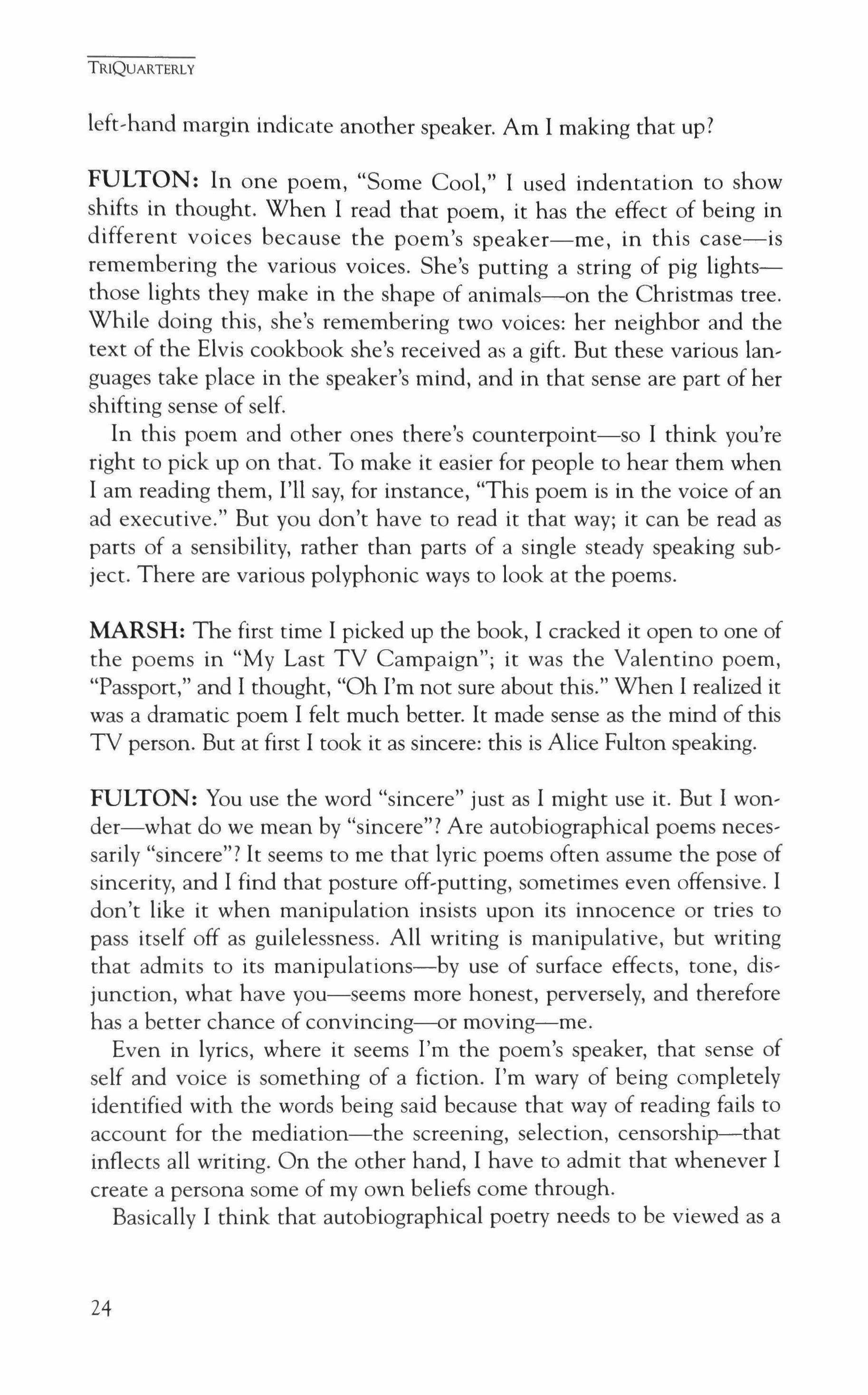
left-hand margin indicate another speaker. Am I making that up?
FULTON: In one poem, "Some Cool," I used indentation to show shifts in thought. When I read that poem, it has the effect of being in different voices because the poem's speaker-me, in this case-is remembering the various voices. She's putting a string of pig lightsthose lights they make in the shape of animals-on the Christmas tree. While doing this, she's remembering two voices: her neighbor and the text of the Elvis cookbook she's received as a gift. But these various languages take place in the speaker's mind, and in that sense are part of her shifting sense of self.
In this poem and other ones there's counterpoint-so I think you're right to pick up on that. To make it easier for people to hear them when I am reading them, I'll say, for instance, "This poem is in the voice of an ad executive." But you don't have to read it that way; it can be read as parts of a sensibility, rather than parts of a single steady speaking subject. There are various polyphonic ways to look at the poems.
MARSH: The first time I picked up the book, I cracked it open to one of the poems in "My Last TV Campaign"; it was the Valentino poem, "Passport," and I thought, "Oh I'm not sure about this." When I realized it was a dramatic poem I felt much better. It made sense as the mind of this TV person. But at first I took it as sincere: this is Alice Fulton speaking.
FULTON: You use the word "sincere" just as I might use it. But I wonder-what do we mean by "sincere"? Are autobiographical poems necessarily "sincere"? It seems to me that lyric poems often assume the pose of sincerity, and I find that posture off-putting, sometimes even offensive. I don't like it when manipulation insists upon its innocence or tries to pass itself off as guilelessness. All writing is manipulative, but writing that admits to its manipulations-by use of surface effects, tone, disjunction, what have you-seems more honest, perversely, and therefore has a better chance of convincing-or moving-me.
Even in lyrics, where it seems I'm the poem's speaker, that sense of self and voice is something of a fiction. I'm wary of being completely identified with the words being said because that way of reading fails to account for the mediation-the screening, selection, censorship=-rhat inflects all writing. On the other hand, I have to admit that whenever I create a persona some of my own beliefs come through.
Basically I think that autobiographical poetry needs to be viewed as a
TRIQUARTERLY
24
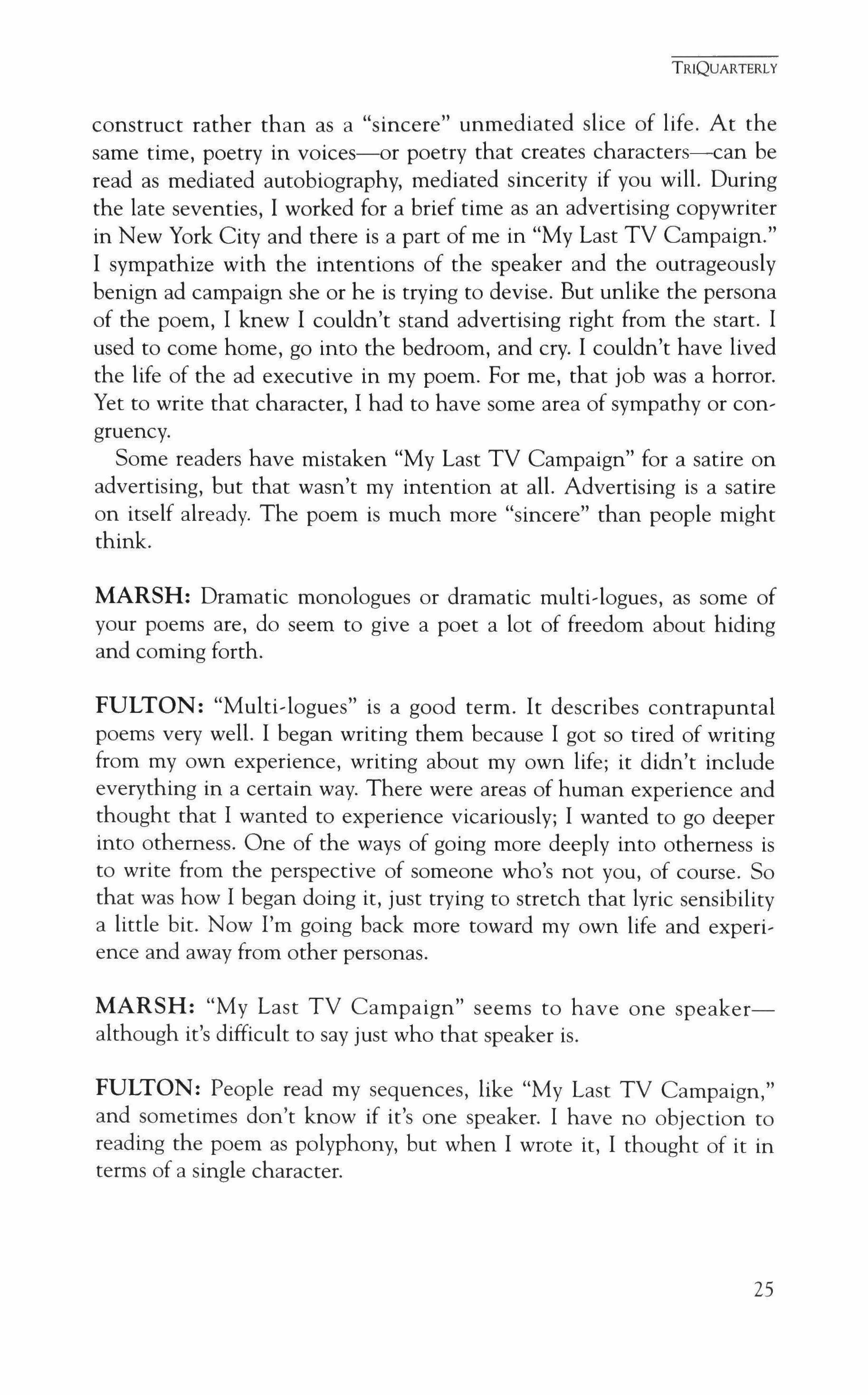
construct rather than as a "sincere" unmediated slice of life. At the same time, poetry in voices-or poetry that creates characters-can be read as mediated autobiography, mediated sincerity if you will. During the late seventies, I worked for a brief time as an advertising copywriter in New York City and there is a part of me in "My Last TV Campaign." I sympathize with the intentions of the speaker and the outrageously benign ad campaign she or he is trying to devise. But unlike the persona of the poem, I knew I couldn't stand advertising right from the start. I used to come home, go into the bedroom, and cry. I couldn't have lived the life of the ad executive in my poem. For me, that job was a horror. Yet to write that character, I had to have some area of sympathy or con, gruency.
Some readers have mistaken "My Last TV Campaign" for a satire on advertising, but that wasn't my intention at all. Advertising is a satire on itself already. The poem is much more "sincere" than people might think.
MARSH: Dramatic monologues or dramatic multi-logues, as some of your poems are, do seem to give a poet a lot of freedom about hiding and coming forth.
FULTON: "Multi-logues" is a good term. It describes contrapuntal poems very well. I began writing them because I got so tired of writing from my own experience, writing about my own life; it didn't include everything in a certain way. There were areas of human experience and thought that I wanted to experience vicariously; I wanted to go deeper into otherness. One of the ways of going more deeply into otherness is to write from the perspective of someone who's not you, of course. So that was how I began doing it, just trying to stretch that lyric sensibility a little bit. Now I'm going back more toward my own life and experience and away from other personas.
MARSH: "My Last TV Campaign" seems to have one speakeralthough it's difficult to say just who that speaker is.
FULTON: People read my sequences, like "My Last TV Campaign," and sometimes don't know if it's one speaker. I have no objection to reading the poem as polyphony, but when I wrote it, I thought of it in terms of a single character.
TRIQUARTERLY
25

MARSH: That poem's speaker is deliberately androgynous. When I started reading the sequence I just took it to be a woman, because you're a woman. Very naive. As I got halfway through I thought that maybe it was a male speaker, but it's actually deliberately left fuzzy.
FULTON: Right, the speaker's sex and gender are left open. But people always inscribe it. I think that's because the mind has trouble seeing two things at the same time. You could envision a transvestite or someone who is androgynous, but to envision both a gendered male and gendered female together is, perhaps, impossible. The poem is meant to oscillate between them. Some people inscribe it as male and will tell me about the man in my poem; others will say the woman. But it can be both; it can be either. The two overlap, switching back and forth, shuffling and flexing.
MARSH: Have you ever written dramatic monologues with a male speaker?
FULTON: Yes, yes. Several times. A sequence in Powers of Congress called "Overlord" is spoken in part by a soldier who's landing in Normandy on D�Day. That was definitely a male speaker, and in a recent issue of TriQuarterly, I published a poem called "World Wrap" that was in the voice of a man I'd describe as a feminist.
MARSH: When you write a poem and the speaker is the other gender (if there is just one other gender), it makes one think about the role of gender, or the role that gender is. What's that like for you?
FULTON: Before I answer let me be clear-when I say "sex" I'm referring to biology, while "gender" refers to the social and cultural construetion of the self. Now that we've cleared that up, I think gender is a great inconvenience. I'd like to get rid of it. I don't mean the word "gender," which is very useful, but gender in action. For women it's terribly constricting. The female gender role involves much more artificiality and contrivance than the male-though neither role is "natural."
When I was writing "Overlord," I tried to imagine my way into the consciousness of a soldier in World War II, who found himself in that particular historical predicament. I thought about what his background might be, and I thought of how he regarded women-that was one of the interesting things for me in the poem. When he's at war, he's
TRIQUARTERLY
26
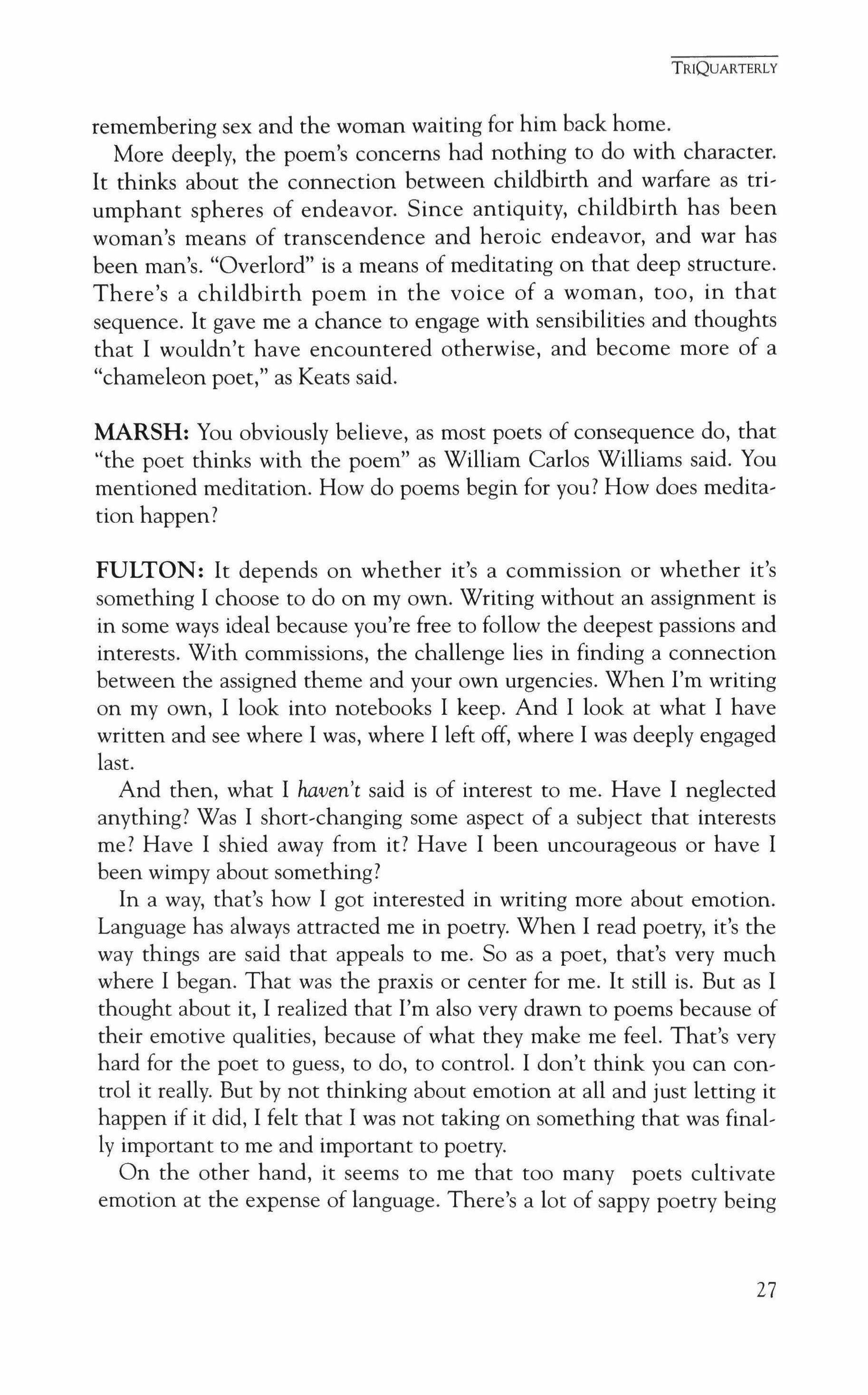
remembering sex and the woman waiting for him back home.
More deeply, the poem's concerns had nothing to do with character. It thinks about the connection between childbirth and warfare as triumphant spheres of endeavor. Since antiquity, childbirth has been woman's means of transcendence and heroic endeavor, and war has been man's. "Overlord" is a means of meditating on that deep structure. There's a childbirth poem in the voice of a woman, too, in that sequence. It gave me a chance to engage with sensibilities and thoughts that I wouldn't have encountered otherwise, and become more of a "chameleon poet," as Keats said.
MARSH: You obviously believe, as most poets of consequence do, that "the poet thinks with the poem" as William Carlos Williams said. You mentioned meditation. How do poems begin for you? How does meditation happen?
FULTON: It depends on whether it's a commission or whether it's something I choose to do on my own. Writing without an assignment is in some ways ideal because you're free to follow the deepest passions and interests. With commissions, the challenge lies in finding a connection between the assigned theme and your own urgencies. When I'm writing on my own, I look into notebooks I keep. And I look at what I have written and see where I was, where I left off, where I was deeply engaged last.
And then, what I haven't said is of interest to me. Have I neglected anything? Was I short-changing some aspect of a subject that interests me? Have I shied away from it? Have I been uncourageous or have I been wimpy about something?
In a way, that's how I got interested in writing more about emotion. Language has always attracted me in poetry. When I read poetry, it's the way things are said that appeals to me. So as a poet, that's very much where I began. That was the praxis or center for me. It still is. But as I thought about it, I realized that I'm also very drawn to poems because of their emotive qualities, because of what they make me feel. That's very hard for the poet to guess, to do, to control. I don't think you can control it really. But by not thinking about emotion at all and just letting it happen if it did, I felt that I was not taking on something that was finally important to me and important to poetry.
On the other hand, it seems to me that too many poets cultivate emotion at the expense of language. There's a lot of sappy poetry being
TRIQUARTERLY
27

written and published. The language in the poems might be plainmonochromatic, beige language-but the content is florid and gushy as cabbage roses. I have a horror of writing that way. When it comes to emotion, I prefer poems that err on the side of austerity. Most contemporary poems want to move the reader. But the emotions I feel when reading them are not the ones the poet intended. I might feel anger or disgust because I sense that the poet is trying to manipulate me with sincerity. All language is manipulative, but the poems that move me are those that seem somewhat surprised, taken aback, by their own emotional developments. I believe that can happen when feeling seeps into the poem without calculation on the poet's part. That's why I've allowed emotion into my work as an accidental {not an accident, but a fortuitous, unforeseen chromatic alteration}, and maybe that's why the emotion in my poetry tends to go unnoticed.
With emotion, you can't only think, because then you're back where you were before, with the analytical. But it's possible to be analytical at first and then to allow spontaneity and feeling-to think and then let the poem rip, in both senses of the phrase. Let it be more vulnerable. Poems of "desire" or loss are the safest, least vulnerable poems imaginable these days. It is far riskier, more vulnerable, to allow contrarian feelings-humiliation, vulgarity, perversity, humor, et cetera-into the poem than to express loss. The emotional range of contemporary poetry seems far too limited. When I think of the poetry of emotion, I think of surfaces that tear. Things are exposed that maybe you didn't intend to show. Those can be the most powerful points in writing.
MARSH: Did those moments happen in your notebooks or only when you move from the notebook to the poem? I'm trying to imagine your notebooks now.
FULTON: I have so many notebooks. Some are just collections of words and phrases that I like. But in them I'll put things I notice, things that I might feel. They are full of observations, aphorisms, about emotions or things that I've noticed about how people are acting-little things that I could work out and develop in a more nuanced and complex way in a poem.
I have a friend I talk to who's a scientist, John Holland, who's a colleague at Michigan, and we have wonderful conversations about science and literature, and I keep notes on that. So I have many different kinds of notebooks.
TRIQUARTERLY
28
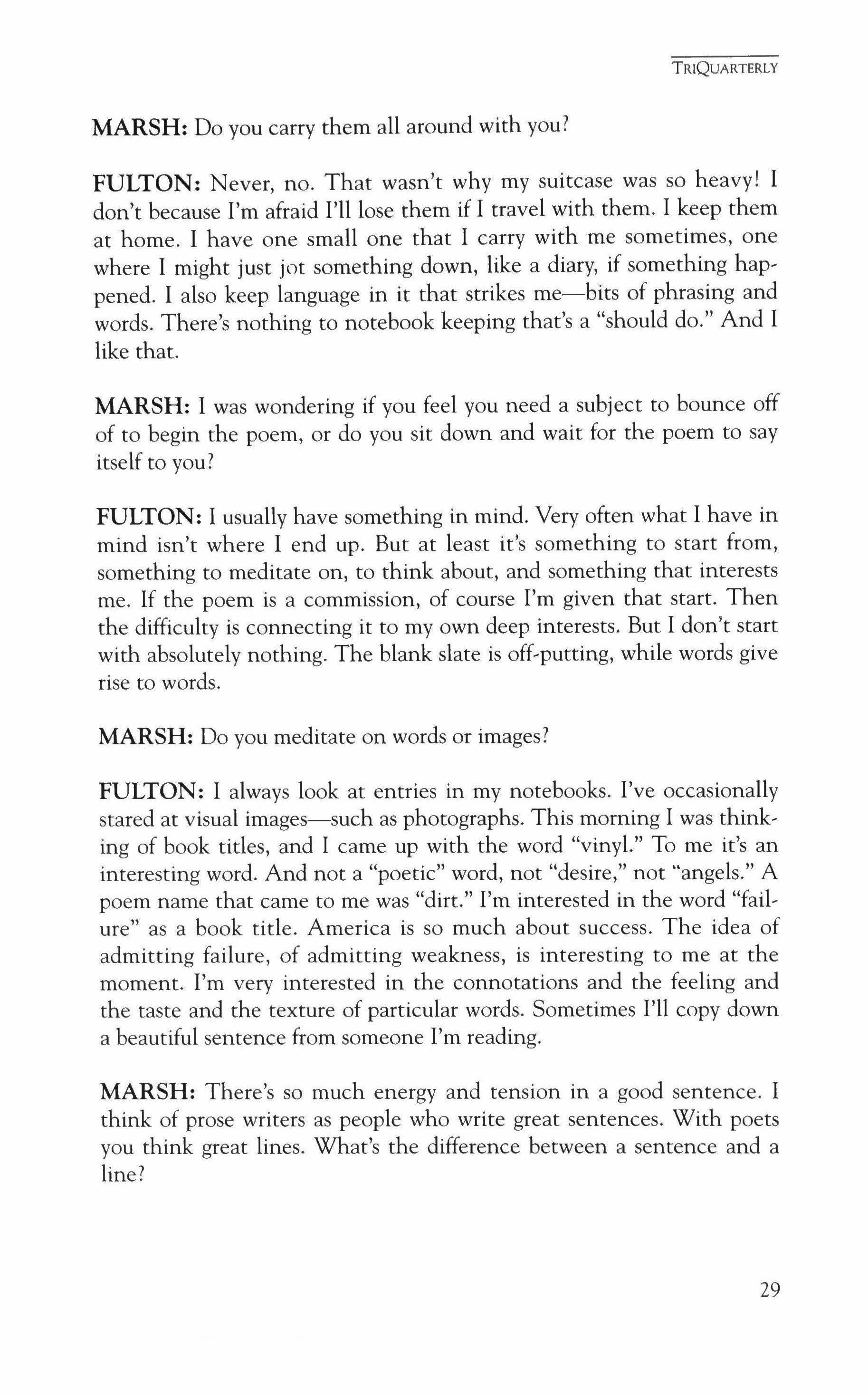
MARSH: Do you carry them all around with you?
FULTON: Never, no. That wasn't why my suitcase was so heavy! don't because I'm afraid I'll lose them if I travel with them. I keep them at home. I have one small one that I carry with me sometimes, one where I might just jot something down, like a diary, if something happened. I also keep language in it that strikes me-bits of phrasing and words. There's nothing to notebook keeping that's a "should do." And I like that.
MARSH: I was wondering if you feel you need a subject to bounce off of to begin the poem, or do you sit down and wait for the poem to say itself to you?
FULTON: I usually have something in mind. Very often what I have in mind isn't where I end up. But at least it's something to start from, something to meditate on, to think about, and something that interests me. If the poem is a commission, of course I'm given that start. Then the difficulty is connecting it to my own deep interests. But I don't start with absolutely nothing. The blank slate is off-putting, while words give rise to words.
MARSH: Do you meditate on words or images?
FULTON: I always look at entries in my notebooks. I've occasionally stared at visual images-such as photographs. This morning I was thinking of book titles, and I came up with the word "vinyl." To me it's an interesting word. And not a "poetic" word, not "desire," not "angels." A poem name that came to me was "dirt." I'm interested in the word "failure" as a book title. America is so much about success. The idea of admitting failure, of admitting weakness, is interesting to me at the moment. I'm very interested in the connotations and the feeling and the taste and the texture of particular words. Sometimes I'll copy down a beautiful sentence from someone I'm reading.
MARSH: There's so much energy and tension in a good sentence. I think of prose writers as people who write great sentences. With poets you think great lines. What's the difference between a sentence and a line?
TRIQUARTERLY
29
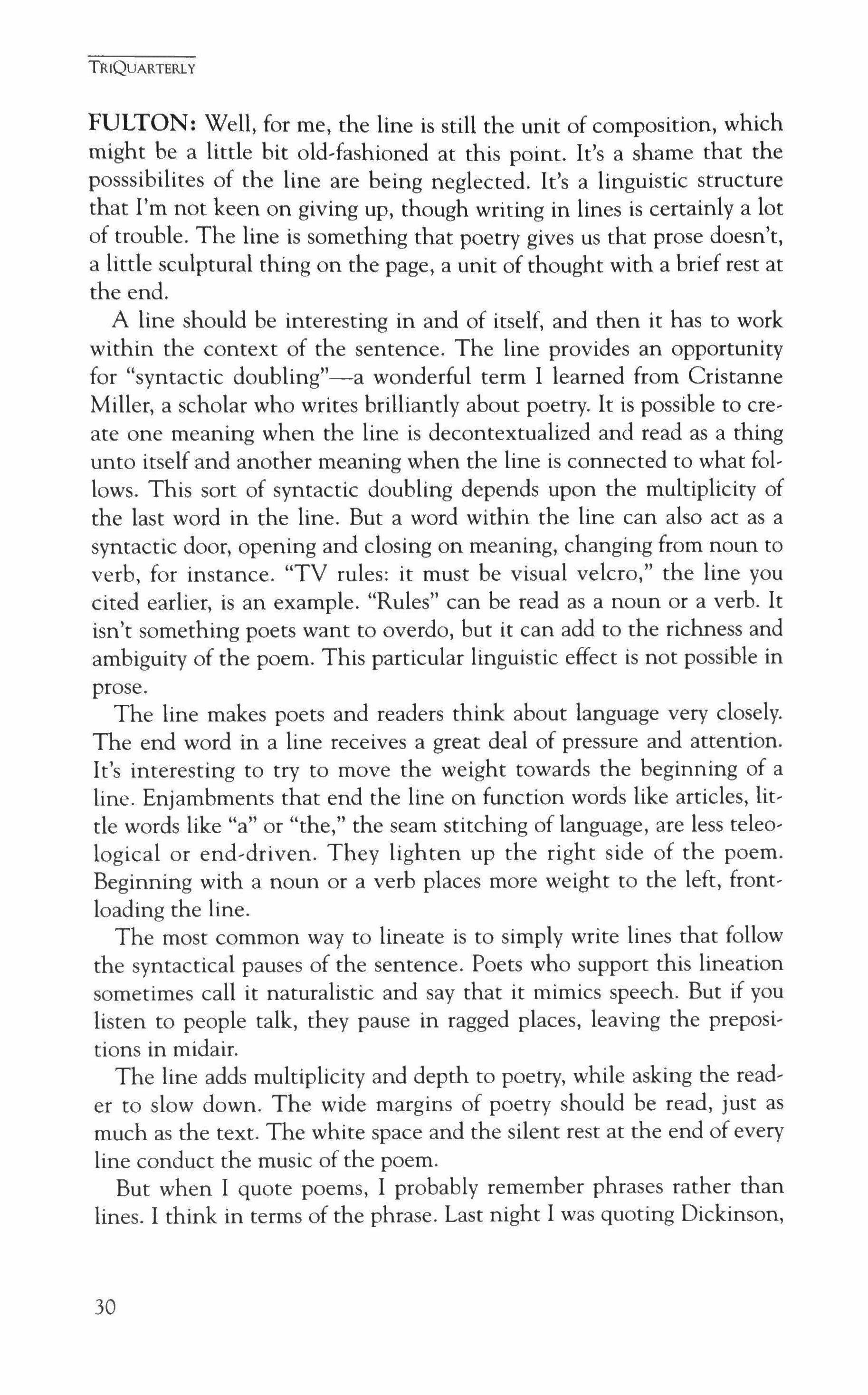
FULTON: Well, for me, the line is still the unit of composition, which might be a little bit old-fashioned at this point. It's a shame that the posssibilites of the line are being neglected. It's a linguistic structure that I'm not keen on giving up, though writing in lines is certainly a lot of trouble. The line is something that poetry gives us that prose doesn't, a little sculptural thing on the page, a unit of thought with a brief rest at the end.
A line should be interesting in and of itself, and then it has to work within the context of the sentence. The line provides an opportunity for "syntactic doubling"-a wonderful term I learned from Cristanne Miller, a scholar who writes brilliantly about poetry. It is possible to create one meaning when the line is decontextualized and read as a thing unto itself and another meaning when the line is connected to what follows. This sort of syntactic doubling depends upon the multiplicity of the last word in the line. But a word within the line can also act as a syntactic door, opening and closing on meaning, changing from noun to verb, for instance. "TV rules: it must be visual velcro," the line you cited earlier, is an example. "Rules" can be read as a noun or a verb. It isn't something poets want to overdo, but it can add to the richness and ambiguity of the poem. This particular linguistic effect is not possible in prose.
The line makes poets and readers think about language very closely. The end word in a line receives a great deal of pressure and attention. It's interesting to try to move the weight towards the beginning of a line. Enjambments that end the line on function words like articles, little words like "a" or "the," the seam stitching of language, are less teleological or end-driven. They lighten up the right side of the poem. Beginning with a noun or a verb places more weight to the left, frontloading the line.
The most common way to lineate is to simply write lines that follow the syntactical pauses of the sentence. Poets who support this lineation sometimes call it naturalistic and say that it mimics speech. But if you listen to people talk, they pause in ragged places, leaving the prepositions in midair.
The line adds multiplicity and depth to poetry, while asking the reader to slow down. The wide margins of poetry should be read, just as much as the text. The white space and the silent rest at the end of every line conduct the music of the poem.
But when I quote poems, I probably remember phrases rather than lines. I think in terms of the phrase. Last night I was quoting Dickinson,
TRIQUARTERLY
30

"I like a look of agony, because I know it's true." I don't know how that sentence is lineated. I'd have to look it up.
MARSH: What about those dashes in Dickinson? You use them too, and then you also have invented a new form of punctuation, the double equal sign, which is also kind of double dash and must at some level have something to do with the effect of Emily Dickinson on you.
FULTON: Yes, oh absolutely. Her dashes are so mysterious. In her work I feel the dash has been done to perfection. And that's partly why I made up another sign that could be something to think about in terms of punctuation. It wouldn't be the dash because I just can't imagine anyone using it as well as Dickinson. She uses it in ways that let you become more involved with the poem's syntax; you can fill it in, inscribe it. The dash is an empty space, but Dickinson's syntactical deletions often ask to be filled in; they exist to be recovered. Recovering the deletions makes reading her a very active, reciprocal experience. You feel like you're building the poem with her as you read. Sometimes you can't recover the deletions. The phrases on either side of the dash remain non sequiturs. Again, I have to credit Cristanne Miller, whose marvelous book on Dickinson, A Poet's Grammar, articulates these effects.
I also love the way that the dash looks like well, sewing. It suggests the way Dickinson sewed her manuscripts together. For me, it has a feminist aspect: it looks like thread, it looks like sewing, holding the lines together. But mostly I love it because it allows multiplicity. And I like the story of Dickinson's reception. I love the way that they tidied her up and put the periods in, and by regulating her punctuation, removed the single best thing, for us, that she did.
MARSH: It seems to me that one of the reasons that her reception was so belated was that readers had to have already been trained with a little bit of modernism, by Marianne Moore perhaps, to understand those dashes as dashes and not as little Emily's mistakes.
FULTON: I think that's true. She seems postmodern in fact. We needed indeterminacy; we needed all these twentieth-century ideas about turbulence before we could really appreciate what she had done.
MARSH: Now your revision of a dash into this double thing. It's a
TRIQUARTERLY
31

sign that's not voiced when you read the poems so it's a form of punctuation
FULTON: Uh-huh.
MARSH: -and therefore it's a visual sign-
FULTON: Uh-huh.
MARSH: -and you just mentioned that good lines of poetry reminded you of sculpture, which makes me think that you see your lines before you hear them. Always tricky to make a judgment about that, but maybe you could talk about the relationship between sound and sight in your double dash, or "bride" as you call it.
FULTON: Although the sign is visual, as you say, when I'm writing a poem the sound comes first, the music. Again I think I'm old-fashioned that way. Not that the poems have a steady meter, but I hear the music of the words and rhythm. The bride sign is silent and it's mostly for readers of the page, because when I read the poems, you hear a rest or pause, but you don't know what the punctuation mark looks like. There's so much going on, I think, not only in my poetry, but in most poetry, that it's very hard for listeners to hear it and take it in if they haven't read the poem on the page. So, that's the kind of writer I am, the book kind, not the performance kind.
MARSH: Well, having seen you perform last night I want to qualify that. You read your poems beautifully, and you do make the poems complex in a different way, by revealing a play of voices or slight shifts of inflection which give the impression that there is more than one voice.
FULTON: Oh good, it's nice that there's a reason to read them. Thank you.
MARSH: You were talking last night about your "Daphne and Apollo" poem, and you used a wonderful image about how Daphne had been "stirred into" a tree at the moment of metamorphosis. This curling image reminded me again of a word you like a lot: "turbulence." I began to wonder if the bride sign is silenced because it's also a bride-perhaps a woman who has been silenced and who is full of turbulence-it marks a moment of transformation.
TRIQUARTERLY
32

FULTON: Oh that's really lovely. I think it is a moment of transformation; I'd like it to be that. It could also be a hinge; I see it that way too-the hinge that allows the door to open onto another realm. That threshold moment is transformative. Actually, one title I considered for Sensual Math was Transformer.
I also think of the double equal as the sign of immersion. The single equal sign retains the separation of whatever is on either side. We know that separate is not equal. The double equal, as I said in one defining poem, "Means more / than equal to-within." It signals an absence of boundary, that two things are immersed in one another, as in metaphor. A simile is separated by "like," while a metaphor is transformative; one thing actually becomes the other. So, I think of the double equal as a metaphorical sign and a feminist sign, imbued with the qualities of the background, of negative space, of reticence. Yet, it's also very visible. It calls attention to itself because it's a mark that no one has ever seen in a poem before. I like the fact that it both recalls the reticence of women, the way that women have been in the background historically, and it also brings them visibly to the fore.
I also think it's a turbulent sign. To make up your own sign is probably in some ways not a good idea. It could cause some anxiety and hostility. I was aware of that, but I think poetry should be a bit turbulent and should raise arguments. It should have people saying, "Why are you making me notice this?" Those are valid things for poetry to do, that it hasn't been doing. It's been disappearing and being decorous. It's been behaving itself. In making that sign I wanted to take a bit of a risk, the risk of being called gimmicky and contrived and all that. That's part of the turbulence for me, that's the risk of it.
MARSH: It will be interesting to see if this sign will proliferate.
FULTON: Well, that would be the ultimate compliment. That would be an honor to me, because if you wrote a poem with that sign in it, you'd be saying to me that you weren't ashamed of being associated with the ideas that we've been talking about, that you were a fellow traveler. If others were to use the sign, they'd be supporting a world view. I have to add that I don't expect to see this.
It's amazing how conservative poetry is. Many people who get involved with poetry seem to be fearful, easily threatened. Maybe that's just human nature. But I do wish the world of poetry weren't so small and mean. If you change a tiny aspect of poetics it's "Off with her head!
TRIQUARTERLY
33
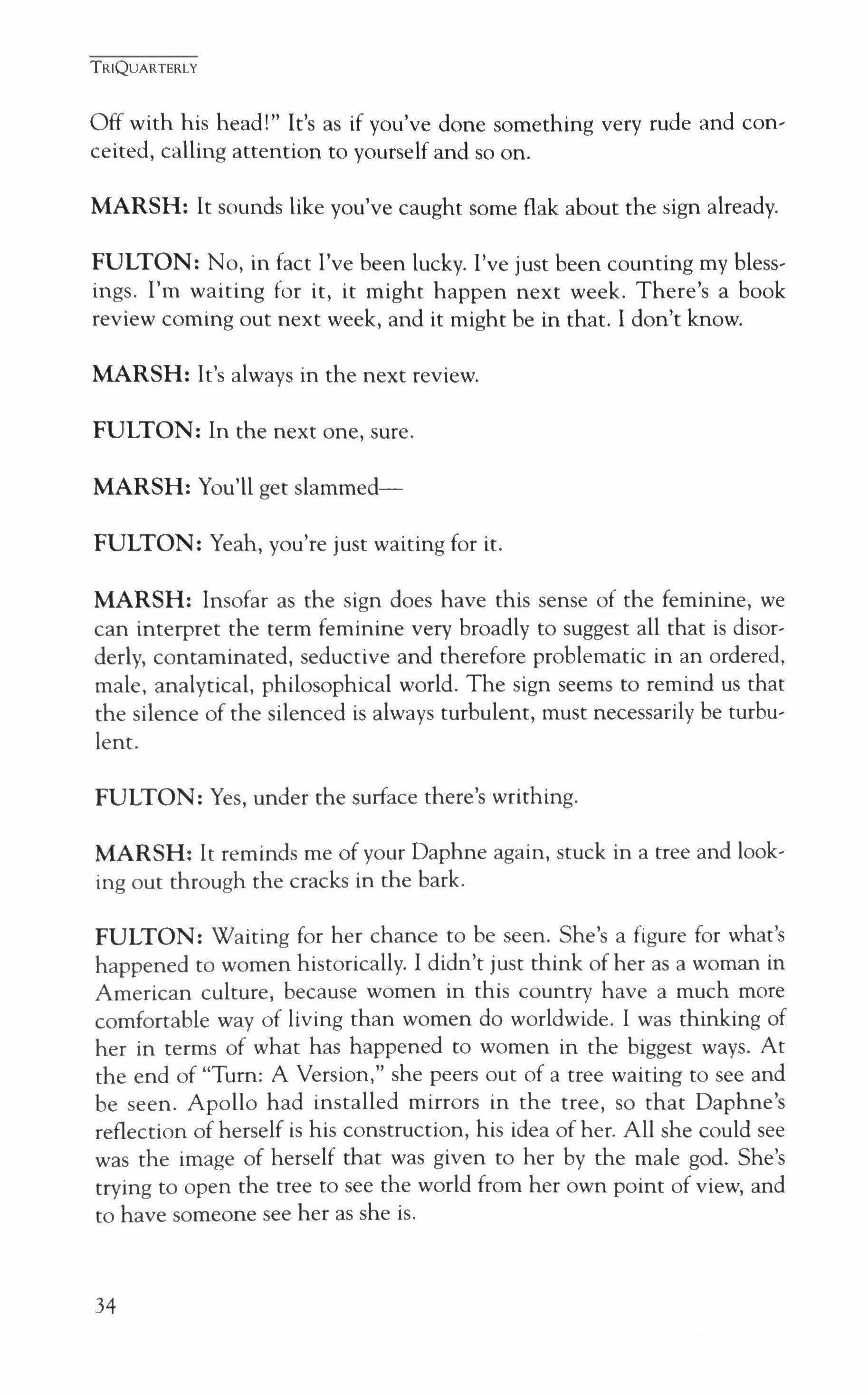
Off with his head!" It's as if you've done something very rude and con, ceited, calling attention to yourself and so on.
MARSH: It sounds like you've caught some flak about the sign already.
FULTON: No, in fact I've been lucky. I've just been counting my bless' ings. I'm waiting for it, it might happen next week. There's a book review coming out next week, and it might be in that. I don't know.
MARSH: It's always in the next review.
FULTON: In the next one, sure.
MARSH: You'll get slammed-
FULTON: Yeah, you're just waiting for it.
MARSH: Insofar as the sign does have this sense of the feminine, we can interpret the term feminine very broadly to suggest all that is disorderly, contaminated, seductive and therefore problematic in an ordered, male, analytical, philosophical world. The sign seems to remind us that the silence of the silenced is always turbulent, must necessarily be turbulent.
FULTON: Yes, under the surface there's writhing.
MARSH: It reminds me of your Daphne again, stuck in a tree and look, ing out through the cracks in the bark.
FULTON: Waiting for her chance to be seen. She's a figure for what's happened to women historically. I didn't just think of her as a woman in American culture, because women in this country have a much more comfortable way of living than women do worldwide. I was thinking of her in terms of what has happened to women in the biggest ways. At the end of "Tum: A Version," she peers out of a tree waiting to see and be seen. Apollo had installed mirrors in the tree, so that Daphne's reflection of herself is his construction, his idea of her. All she could see was the image of herself that was given to her by the male god. She's trying to open the tree to see the world from her own point of view, and to have someone see her as she is.
TRIQUARTERLY
34
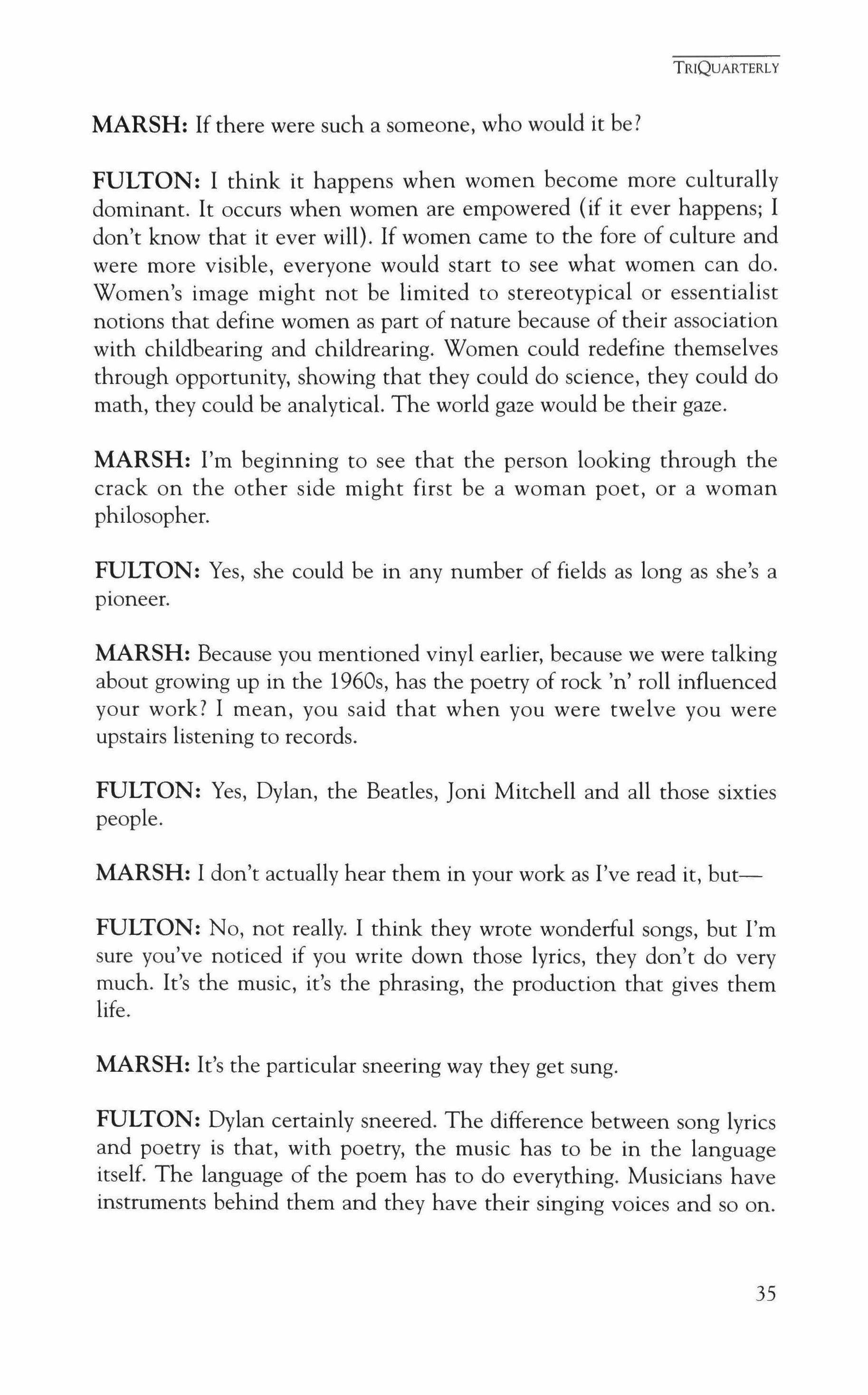
MARSH: If there were such a someone, who would it be?
FULTON: I think it happens when women become more culturally dominant. It occurs when women are empowered (if it ever happens; I don't know that it ever will). If women came to the fore of culture and were more visible, everyone would start to see what women can do. Women's image might not be limited to stereotypical or essentialist notions that define women as part of nature because of their association with childbearing and childrearing. Women could redefine themselves through opportunity, showing that they could do science, they could do math, they could be analytical. The world gaze would be their gaze.
MARSH: I'm beginning to see that the person looking through the crack on the other side might first be a woman poet, or a woman philosopher.
FULTON: Yes, she could be in any number of fields as long as she's a pioneer.
MARSH: Because you mentioned vinyl earlier, because we were talking about growing up in the 1960s, has the poetry of rock 'n' roll influenced your work? I mean, you said that when you were twelve you were upstairs listening to records.
FULTON: Yes, Dylan, the Beatles, [oni Mitchell and all those sixties people.
MARSH: I don't actually hear them in your work as I've read it, but-
FULTON: No, not really. I think they wrote wonderful songs, but I'm sure you've noticed if you write down those lyrics, they don't do very much. It's the music, it's the phrasing, the production that gives them life.
MARSH: It's the particular sneering way they get sung.
FULTON: Dylan certainly sneered. The difference between song lyrics and poetry is that, with poetry, the music has to be in the language itself. The language of the poem has to do everything. Musicians have instruments behind them and they have their singing voices and so on.
TRIQUARTERLY
35
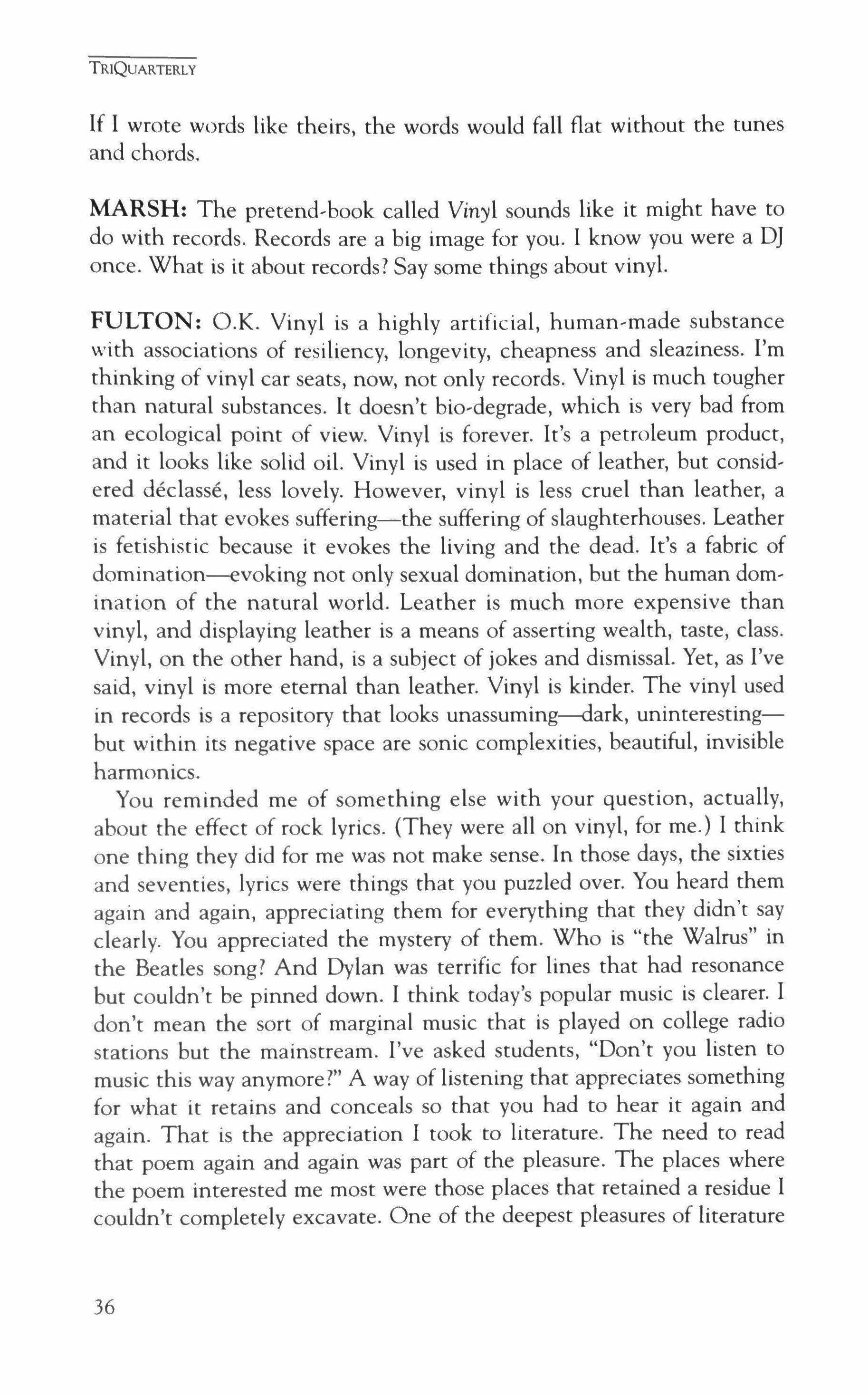
If I wrote words like theirs, the words would fall flat without the tunes and chords.
MARSH: The pretend-book called Vinyl sounds like it might have to do with records. Records are a big image for you. I know you were a OJ once. What is it about records? Say some things about vinyl.
FULTON: O.K. Vinyl is a highly artificial, human-made substance with associations of resiliency, longevity, cheapness and sleaziness. I'm thinking of vinyl car seats, now, not only records. Vinyl is much tougher than natural substances. It doesn't bio-degrade, which is very bad from an ecological point of view. Vinyl is forever. It's a petroleum product, and it looks like solid oil. Vinyl is used in place of leather, but considered declasse, less lovely. However, vinyl is less cruel than leather, a material that evokes suffering-the suffering of slaughterhouses. Leather is fetishistic because it evokes the living and the dead. It's a fabric of domination-evoking not only sexual domination, but the human domination of the natural world. Leather is much more expensive than vinyl, and displaying leather is a means of asserting wealth, taste, class. Vinyl, on the other hand, is a subject of jokes and dismissal. Yet, as I've said, vinyl is more eternal than leather. Vinyl is kinder. The vinyl used in records is a repository that looks unassuming--dark, uninterestingbut within its negative space are sonic complexities, beautiful, invisible harmonics.
You reminded me of something else with your question, actually, about the effect of rock lyrics. (They were all on vinyl, for me.) I think one thing they did for me was not make sense. In those days, the sixties and seventies, lyrics were things that you puzzled over. You heard them again and again, appreciating them for everything that they didn't say clearly. You appreciated the mystery of them. Who is "the Walrus" in the Beatles song? And Dylan was terrific for lines that had resonance but couldn't be pinned down. I think today's popular music is clearer. I don't mean the sort of marginal music that is played on college radio stations but the mainstream. I've asked students, "Don't you listen to music this way anymore?" A way of listening that appreciates something for what it retains and conceals so that you had to hear it again and again. That is the appreciation I took to literature. The need to read that poem again and again was part of the pleasure. The places where the poem interested me most were those places that retained a residue I couldn't completely excavate. One of the deepest pleasures of literature
ThIQUARTERLY
36
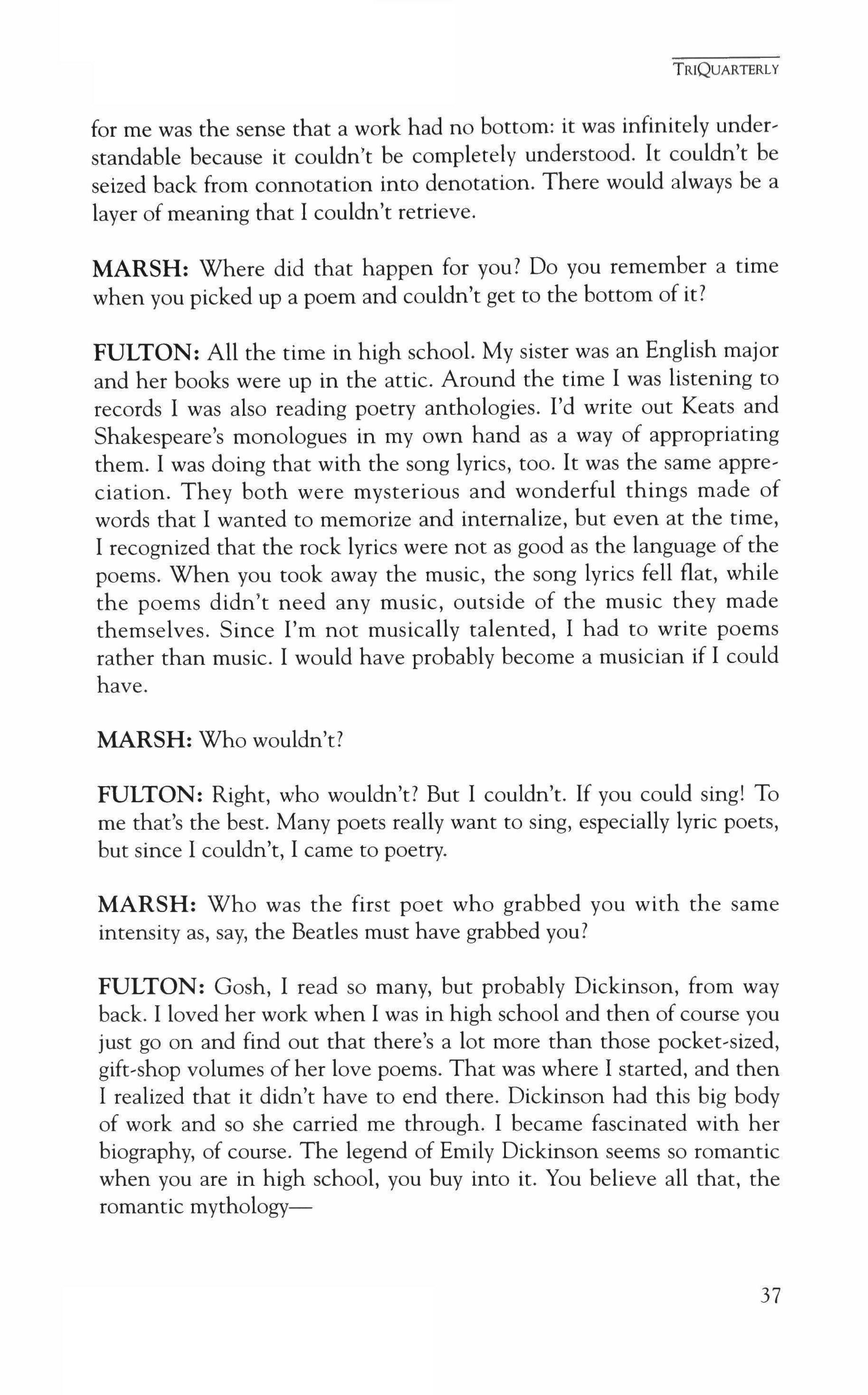
for me was the sense that a work had no bottom: it was infinitely understandable because it couldn't be completely understood. It couldn't be seized back from connotation into denotation. There would always be a layer of meaning that I couldn't retrieve.
MARSH: Where did that happen for you? Do you remember a time when you picked up a poem and couldn't get to the bottom of it?
FULTON: All the time in high school. My sister was an English major and her books were up in the attic. Around the time I was listening to records I was also reading poetry anthologies. I'd write out Keats and Shakespeare's monologues in my own hand as a way of appropriating them. I was doing that with the song lyrics, too. It was the same appreciation. They both were mysterious and wonderful things made of words that I wanted to memorize and internalize, but even at the time, I recognized that the rock lyrics were not as good as the language of the poems. When you took away the music, the song lyrics fell flat, while the poems didn't need any music, outside of the music they made themselves. Since I'm not musically talented, I had to write poems rather than music. I would have probably become a musician if I could have.
MARSH: Who wouldn't?
FULTON: Right, who wouldn't? But I couldn't. If you could sing! To me that's the best. Many poets really want to sing, especially lyric poets, but since I couldn't, I came to poetry.
MARSH: Who was the first poet who grabbed you with the same intensity as, say, the Beatles must have grabbed you?
FULTON: Gosh, I read so many, but probably Dickinson, from way back. I loved her work when I was in high school and then of course you just go on and find out that there's a lot more than those pocket-sized, gift-shop volumes of her love poems. That was where I started, and then I realized that it didn't have to end there. Dickinson had this big body of work and so she carried me through. I became fascinated with her biography, of course. The legend of Emily Dickinson seems so romantic when you are in high school, you buy into it. You believe all that, the romantic mythology-
TRIQUARTERLY
37
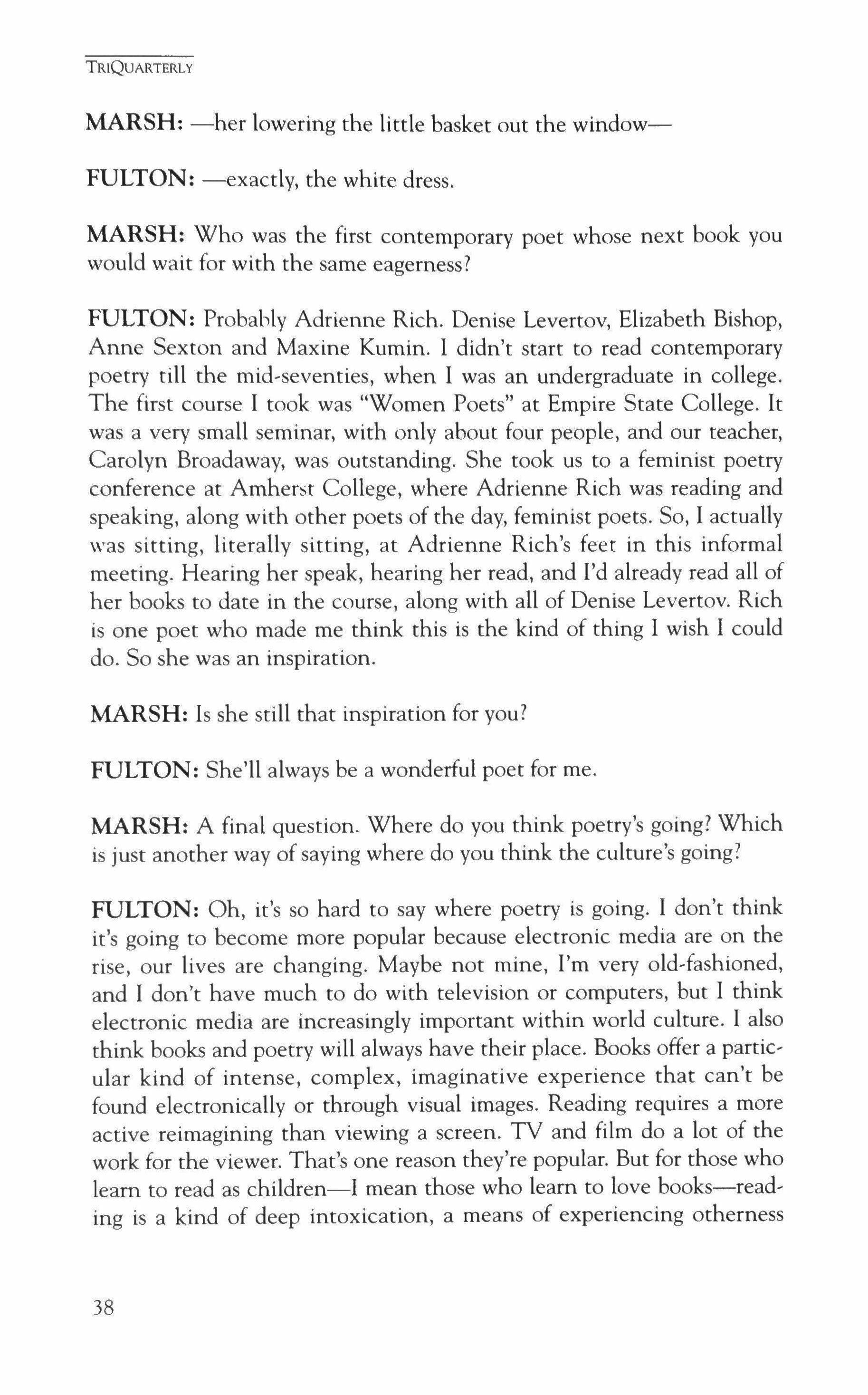
MARSH: -her lowering the little basket out the window-
FULTON: -exactly, the white dress.
MARSH: Who was the first contemporary poet whose next book you would wait for with the same eagerness?
FULTON: Probably Adrienne Rich. Denise Levertov, Elizabeth Bishop, Anne Sexton and Maxine Kumin. I didn't start to read contemporary poetry till the mid-seventies, when I was an undergraduate in college. The first course I took was "Women Poets" at Empire State College. It was a very small seminar, with only about four people, and our teacher, Carolyn Broadaway, was outstanding. She took us to a feminist poetry conference at Amherst College, where Adrienne Rich was reading and speaking, along with other poets of the day, feminist poets. So, I actually was sitting, literally sitting, at Adrienne Rich's feet in this informal meeting. Hearing her speak, hearing her read, and I'd already read all of her books to date in the course, along with all of Denise Levertov. Rich is one poet who made me think this is the kind of thing I wish I could do. So she was an inspiration.
MARSH: Is she still that inspiration for you?
FULTON: She'll always be a wonderful poet for me.
MARSH: A final question. Where do you think poetry's going? Which is just another way of saying where do you think the culture's going?
FULTON: Oh, it's so hard to say where poetry is going. I don't think it's going to become more popular because electronic media are on the rise, our lives are changing. Maybe not mine, I'm very old-fashioned, and I don't have much to do with television or computers, but I think electronic media are increasingly important within world culture. I also think books and poetry will always have their place. Books offer a partieular kind of intense, complex, imaginative experience that can't be found electronically or through visual images. Reading requires a more active reimagining than viewing a screen. TV and film do a lot of the work for the viewer. That's one reason they're popular. But for those who learn to read as children-I mean those who learn to love books=-reading is a kind of deep intoxication, a means of experiencing otherness
TRIQUARTERLY
38

deeply. That, nothing can replace. As long as kids still learn to read that way, I believe some of them will value books and want them around. As long as there's a written language, I think people-certain small groups of people-will prize poetry as the best example of an elegant, and thrilling, linguistic structure.
TRIQUARTERLY
39
Failure
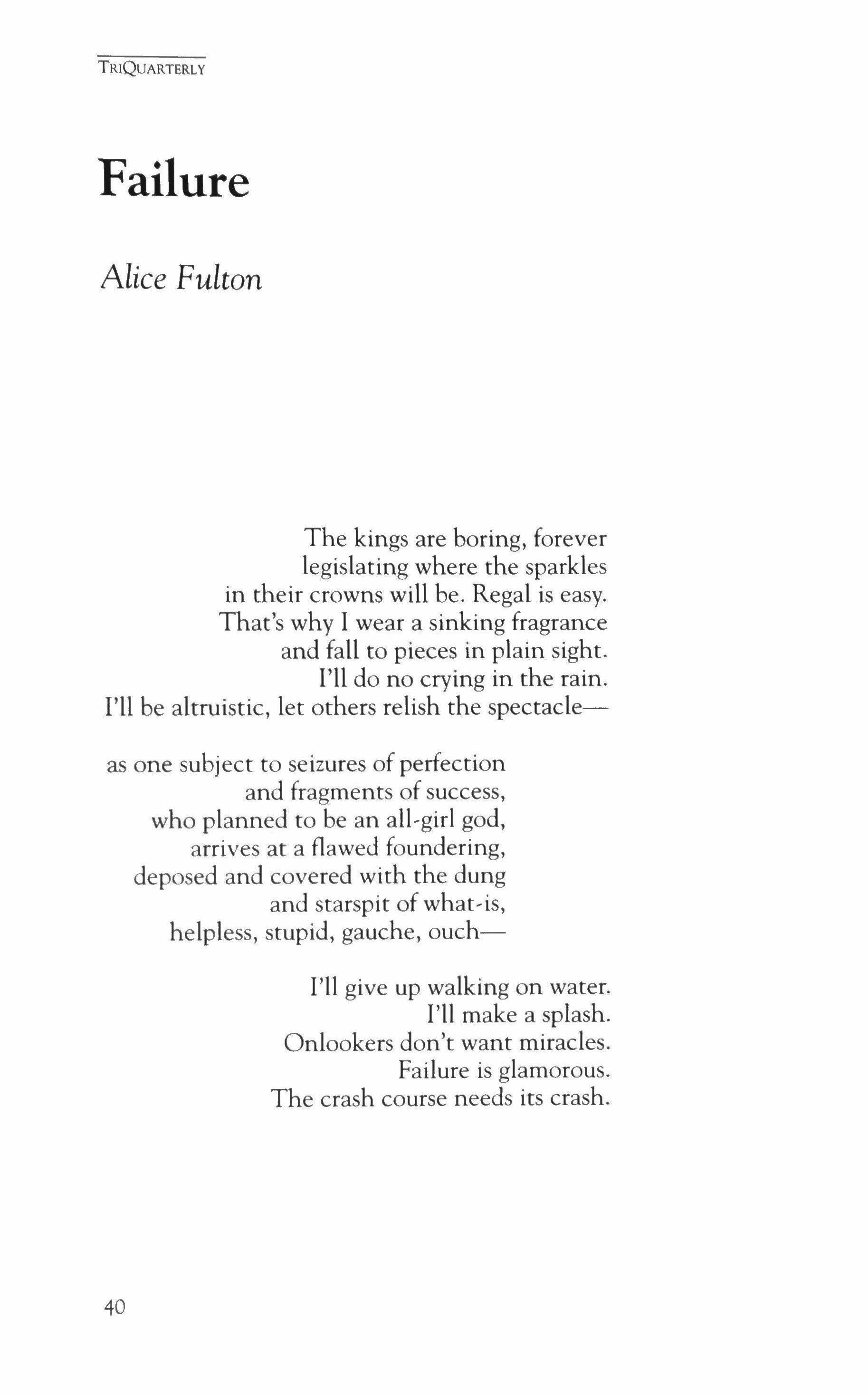 Alice Fulton
Alice Fulton
The kings are boring, forever legislating where the sparkles in their crowns will be. Regal is easy. That's why I wear a sinking fragrance and fall to pieces in plain sight. I'll do no crying in the rain. I'll be altruistic, let others relish the spectacle-
as one subject to seizures of perfection and fragments of success, who planned to be an all-gtrl god, arrives at a flawed foundering, deposed and covered with the dung and starspit of what-is, helpless, stupid, gauche, ouch-
I'll give up walking on water. I'll make a splash. Onlookers don't want miracles. Failure is glamorous. The crash course needs its crash.
TRIQUARTERLY
40
On Donald Barthelme
Edward Hirsch
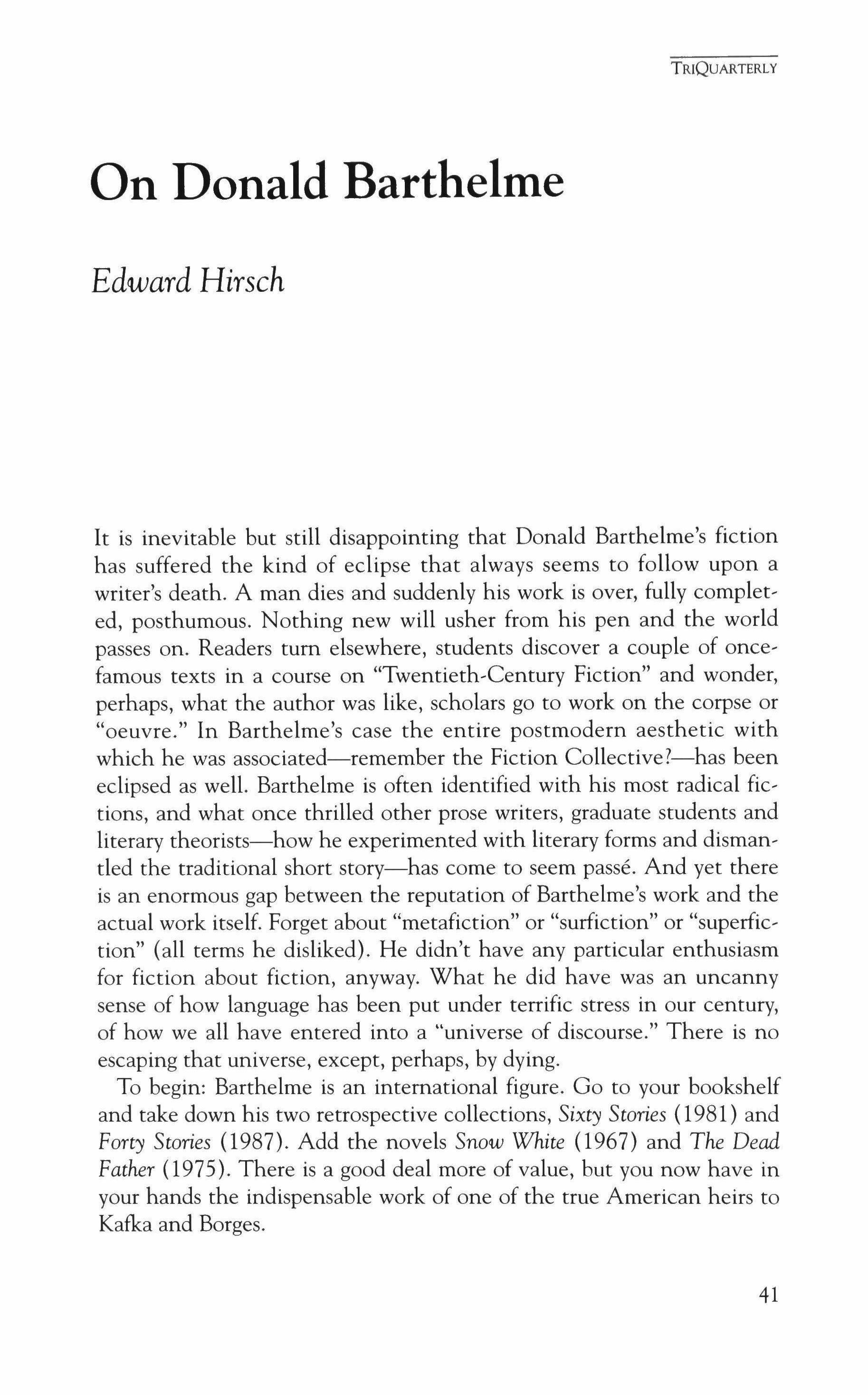
It is inevitable but still disappointing that Donald Barthelme's fiction has suffered the kind of eclipse that always seems to follow upon a writer's death. A man dies and suddenly his work is over, fully completed, posthumous. Nothing new will usher from his pen and the world passes on. Readers tum elsewhere, students discover a couple of oncefamous texts in a course on "Twentieth-Century Fiction" and wonder, perhaps, what the author was like, scholars go to work on the corpse or "oeuvre." In Barthelme's case the entire postmodern aesthetic with which he was associated-remember the Fiction Collective?-has been eclipsed as well. Barthelme is often identified with his most radical fictions, and what once thrilled other prose writers, graduate students and literary theorists-how he experimented with literary forms and dismantled the traditional short story-has come to seem passe. And yet there is an enormous gap between the reputation of Barthelme's work and the actual work itself. Forget about "metafiction'' or "surfiction" or "superfiction" (all terms he disliked). He didn't have any particular enthusiasm for fiction about fiction, anyway. What he did have was an uncanny sense of how language has been put under terrific stress in our century, of how we all have entered into a "universe of discourse." There is no escaping that universe, except, perhaps, by dying.
To begin: Barthelme is an international figure. Go to your bookshelf and take down his two retrospective collections, Sixty Stories (1981) and Forty Stories (1987). Add the novels Snow White (1967) and The Dead Father (1975). There is a good deal more of value, but you now have in your hands the indispensable work of one of the true American heirs to Kafka and Borges.
TRIQUARTERLY
41

After his death I wrote a memorial poem to a friend. I would now like to unpack that poem-a Bnrthelme-like exercise-in order to help the reevaluation of his work.
Apostrophe
(In memory of Donald Barthelme, 1931-89)
Perpetual worrier, patron of the misfit and misguided, the oddball, the longshot, irreverent black sheep in every family, middle-aged man who languishes on the couch with his head in his hands and often spends the evening drinking by himself, a dualist fated to deal in hybrids and crossbreedings, riddles without answers, slumgullions, impure waters, inappropriate longings, philosopher of acedia, of spiritual torpor, nightsweats and free-floating anxieties, sentencings, sullenness in the face of existence, wry veteran of the unresolved and the self-divided, the besotted, the much married, defender of the unhealthy and the uncommitted, collagist of that mysterious overcrowded muck we called a city, master of the solo riff and the non sequitur, the call and response, voice-overs and backtrackings, sublime bewilderments and inexplicabilities, the comedy of posthistorical desires and thwarted passions, first of the non-joiners, most unlikely, tactful, and generous of fathers, you who embarrassed the credulous and irritated the unimaginative, who entertained the void and recycled the dross, who deflated the pretentious and deepened perplexities, subject to odd stabbing rages of happiness, weird bouts of pleasure, connoisseur of mornings, of sunlight swinging into an open doorway, small boys bumping into small girls, purposefully, most self-conscious and ecstatic of ironists
TRIQUARTERLY
42

who sang uncertainties like the Song of Songs and dwelled in doubt like a habitation, my wary, unreachable, inconsolable friend, I wish I believed in another world than this so I could think of seeing you again raising your wineglass to the Holy Ghost, your "main man," and praising the mysteries, Love and Work, looking down at the weather which, as you said, is going to be fair and warmer, warmer and fair, most fair.
Apostrophe
Apostrophe: "a digression in discourse; especially, a turning away from an audience to address an absent or imaginary person." This puts the reader-the audience-in the position of overhearing that address. John Stuart Mill said, "Rhetoric is heard; poetry is overheard." W. B. Yeats modified this into "We make of the quarrel with others, rhetoric, but of the quarrel with ourselves, poetry." Miles Davis took the situation a step further by entirely turning his back on the audience. Donald Barthelme's work is also a turning away, a long quarrel with itself. He called the installments in that quarrel "stories."
(In Memory of Donald Barthelme, 1931 89)
A postmodern elegy, an elegy for a postmodernist. A Homeric sum, moning, a sort of found poem that lifts phrases and sentences from Barthelme's work to create a portrait of him. The effect is in the cross' cuttings. The problem for the poet-indeed, it is the problem of all of Barthelme's work-is what kind of language can one use when language itself is so debased in our time, so much of the problem. The ethic of his work is to go through-rather than around-the barriers of language. "Donald Barthelme": the absent friend has now become an imaginary person, a name attached to a body of work. How to memorialize him? There is a parable by Kafka called not "The Tower of Babel" but "The Pit of Babel." Barthelme is a writer sentenced to digging a passage through that subterranean pit. That is one way of putting it. Here is another: he is known for his laconic wit and astonishing incongruities. But there is a secret in his work: he is heartbreaking.
TRIQUARTERLY
43
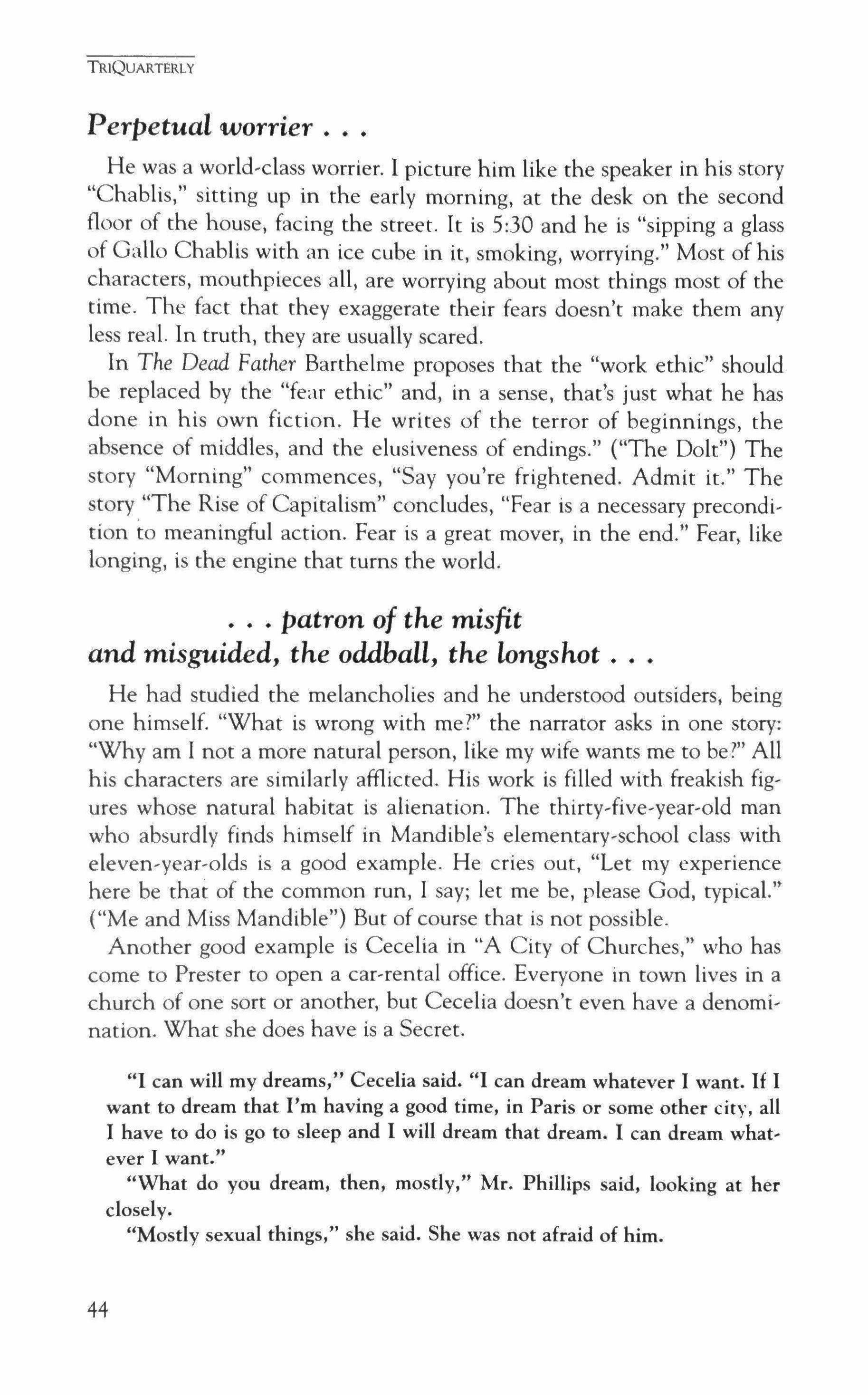
Perpetual worrier
He was a world-class worrier. I picture him like the speaker in his story "Chablis," sitting up in the early morning, at the desk on the second floor of the house, facing the street. It is 5:30 and he is "sipping a glass of Gallo Chablis with an ice cube in it, smoking, worrying." Most of his characters, mouthpieces all, are worrying about most things most of the time. The fact that they exaggerate their fears doesn't make them any less real. In truth, they are usually scared.
In The Dead Father Barthelme proposes that the "work ethic" should be replaced by the "fear ethic" and, in a sense, that's just what he has done in his own fiction. He writes of the terror of beginnings, the absence of middles, and the elusiveness of endings." ("The Dolt") The story "Morning" commences, "Say you're frightened. Admit it." The story "The Rise of Capitalism" concludes, "Fear is a necessary precondition to meaningful action. Fear is a great mover, in the end." Fear, like longing, is the engine that turns the world
patron of the misfit and misguided, the oddball, the longshot
He had studied the melancholies and he understood outsiders, being one himself. "What is wrong with me?" the narrator asks in one story: "Why am I not a more natural person, like my wife wants me to be?" All his characters are similarly afflicted. His work is filled with freakish fig, ures whose natural habitat is alienation. The thirty-five-year-old man who absurdly finds himself in Mandible's elementary-school class with eleven-year-olds is a good example. He cries out, "Let my experience here be that of the common run, I say; let me be, please God, typical." ("Me and Miss Mandible") But of course that is not possible.
Another good example is Cecelia in "A City of Churches," who has come to Prester to open a car-rental office. Everyone in town lives in a church of one sort or another, but Cecelia doesn't even have a denomination. What she does have is a Secret.
"I can will my dreams," Cecelia said. "I can dream whatever 1 want. If I want to dream that I'm having a good time, in Paris or some other city, all I have to do is go to sleep and 1 will dream that dream. 1 can dream whatever I want."
"What do you dream, then, mostly," Mr. Phillips said, looking at her closely.
"Mostly sexual things," she said. She was not afraid of him.
TRIQUARTERLY
44
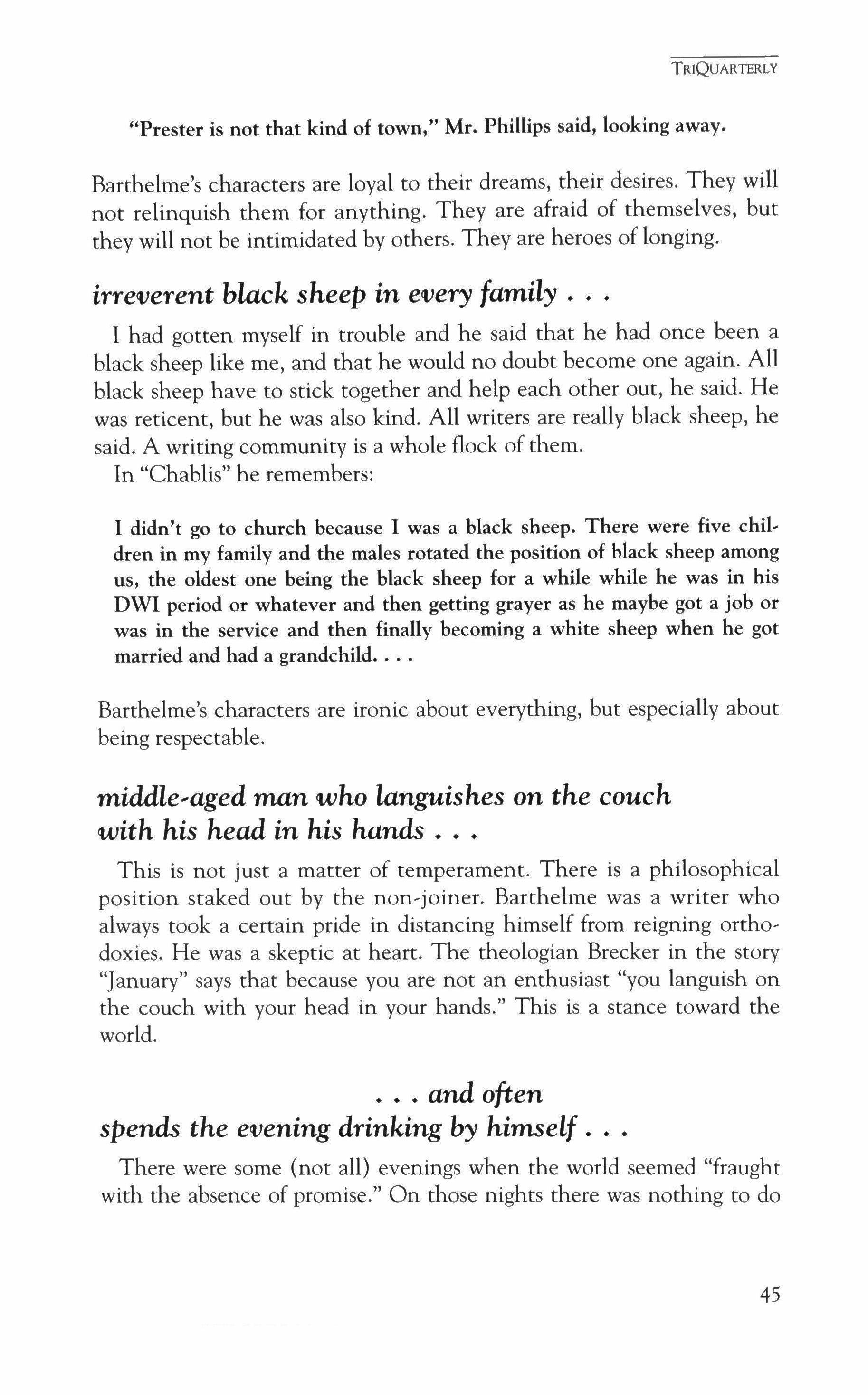
"Prester is not that kind of town," Mr. Phillips said, looking away.
Barthelme's characters are loyal to their dreams, their desires. They will not relinquish them for anything. They are afraid of themselves, but they will not be intimidated by others. They are heroes of longing.
irreverent black sheep in every family
I had gotten myself in trouble and he said that he had once been a black sheep like me, and that he would no doubt become one again. All black sheep have to stick together and help each other out, he said. He was reticent, but he was also kind. All writers are really black sheep, he said. A writing community is a whole flock of them.
In "Chablis" he remembers:
I didn't go to church because I was a black sheep. There were five children in my family and the males rotated the position of black sheep among us, the oldest one being the black sheep for a while while he was in his DWI period or whatever and then getting grayer as he maybe got a job or was in the service and then finally becoming a white sheep when he got married and had a grandchild
Barthelme's characters are ironic about everything, but especially about being respectable.
middle,aged man who languishes on the couch with his head in his hands
This is not just a matter of temperament. There is a philosophical position staked out by the non-joiner. Barthelme was a writer who always took a certain pride in distancing himself from reigning orthodoxies. He was a skeptic at heart. The theologian Brecker in the story "January" says that because you are not an enthusiast "you languish on the couch with your head in your hands." This is a stance toward the world.
and often spends the evening drinking by himself.
There were some (not all) evenings when the world seemed "fraught with the absence of promise." On those nights there was nothing to do 45
TRIQUARTERLY
"but go home and drink your nine drinks and forget about it." ("Critique de la Vie Quotidienne")
a dualist fated to deal in hybrids and cross breedings •..
Barthelme was a moral writer. His morality consisted in turning everything inside out, in seeing everything as if in a reverse lens. He called himself "an incorrigibly double-minded man." This is to say he had a dialogic or double-minded imagination and tended to see everything in contradictory or irreconcilable terms. Thus the omnipresence of two conspiring voices in his work: the Q. and A., the call and response, the open-ended dislocated conversation
riddles without answers
"It is appropriate to pause and say that the writer is one who, embarking upon a task, does not know what to do."
"A writer, says Karl Krauss, is a man who can make a riddle out of an answer." ("Not-Knowing")
slumgullions

He said:
I'm fated to deal in mixtures, slumgullions, which preclude tragedy, which requires a pure line. It's a habit of mind, a perversity. Tom Hess used to tell a story, maybe from Lewis Carroll, I don't remember, about an enraged mob storming the palace shouting "More taxes! Less bread!" As soon as I hear a proposition I immediately consider its opposite. A doubleminded man-makes for mixtures.
impure waters
All the waters, but especially the linguistic ones, are polluted now. Barthelme understood this. He could not forget it.
inappropriate longings
Barthelme greatly admired Walker Percy's book The Second Coming. In his Paris Review interview he said that "When the hero's doctors diagnosed wahnsinnige Sehnsucht or 'inappropriate longings' as what was wrong with him I like to fell off my chair. That's too beautiful to be real.
TRIQUARTERLY
.•.
46
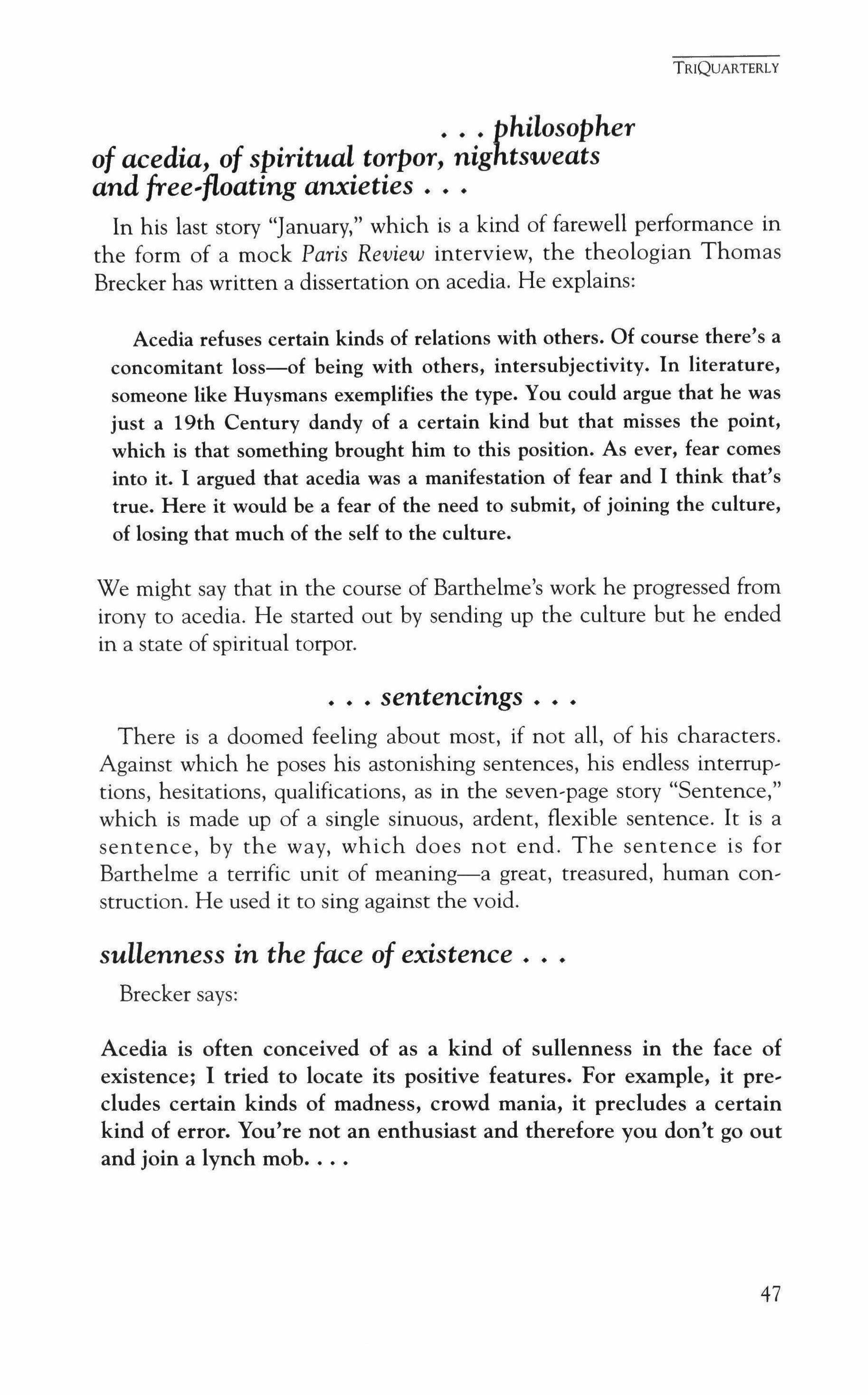
philosopher of acedia, of spiritual torpor, nightsweats and free-floating anxieties .•.
In his last story "January," which is a kind of farewell performance in the form of a mock Paris Review interview, the theologian Thomas Brecker has written a dissertation on acedia. He explains:
Acedia refuses certain kinds of relations with others. Of course there's a concomitant loss-of being with others, intersubjectivity. In literature, someone like Huysmans exemplifies the type. You could argue that he was just a 19th Century dandy of a certain kind but that misses the point, which is that something brought him to this position. As ever, fear comes into it. I argued that acedia was a manifestation of fear and I think that's true. Here it would be a fear of the need to submit, of joining the culture, of losing that much of the self to the culture.
We might say that in the course of Barthelme's work he progressed from irony to acedia. He started out by sending up the culture but he ended in a state of spiritual torpor
sentencings
There is a doomed feeling about most, if not all, of his characters. Against which he poses his astonishing sentences, his endless interruptions, hesitations, qualifications, as in the seven-page story "Sentence," which is made up of a single sinuous, ardent, flexible sentence. It is a sentence, by the way, which does not end. The sentence is for Barthelme a terrific unit of meaning-a great, treasured, human construction. He used it to sing against the void.
sullenness in the face of existence
Brecker says:
Acedia is often conceived of as a kind of sullenness in the face of existence; I tried to locate its positive features. For example, it pre, eludes certain kinds of madness, crowd mania, it precludes a certain kind of error. You're not an enthusiast and therefore you don't go out and join a lynch mob
TRIQUARTERLY
47
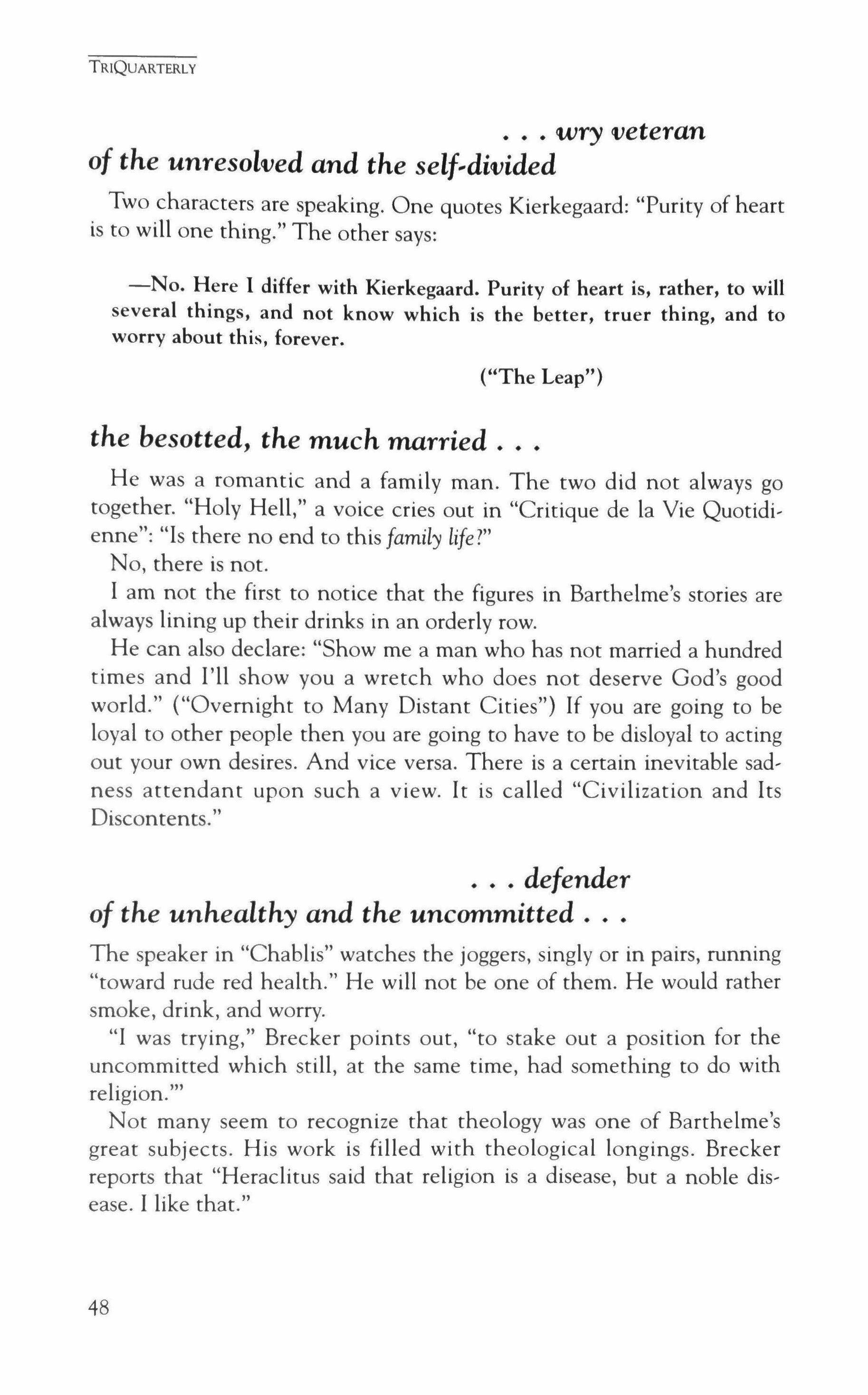
wry veteran
of the unresolved and the self."divided
Two characters are speaking. One quotes Kierkegaard: "Purity of heart is to will one thing." The other says:
-No. Here I differ with Kierkegaard. Purity of heart is, rather, to will several things, and not know which is the better, truer thing, and to worry about this, forever.
("The Leap")
the besotted, the much married .••
He was a romantic and a family man. The two did not always go together. "Holy Hell," a voice cries out in "Critique de la Vie Quotidienne": "Is there no end to this family life?"
No, there is not.
I am not the first to notice that the figures in Barthelme's stories are always lining up their drinks in an orderly row.
He can also declare: "Show me a man who has not married a hundred times and I'll show you a wretch who does not deserve God's good world." ("Overnight to Many Distant Cities") If you are going to be loyal to other people then you are going to have to be disloyal to acting out your own desires. And vice versa. There is a certain inevitable sadness attendant upon such a view. It is called "Civilization and Its Discontents.
•.. defender
of the unhealthy and the uncommitted
The speaker in "Chablis" watches the joggers, singly or in pairs, running "toward rude red health." He will not be one of them. He would rather smoke, drink, and worry.
"I was trying," Brecker points out, "to stake out a position for the uncommitted which still, at the same time, had something to do with religion. '"
Not many seem to recognize that theology was one of Barthelme's great subjects. His work is filled with theological longings. Brecker reports that "Heraclitus said that religion is a disease, but a noble disease. I like that."
TRIQUARTERLY
48
collagist
Barthelme liked to play with typography, He enjoyed things that looked funny on the page and he liked stories that included graphics {"Brain Damage," "At the Tolstoy Museum," "The Flight of Pigeons from the Palace"}. This aspect of his work has inspired theorists and other practitioners of experimental fiction, but it mostly leaves me cold. More poignant, I think, is the way he juxtaposes sentences, punctures ideas, mixes dictions.
-He who hath not love is a sad cookie.
-This is the way, walk ye in it. Isaiah 30:21 ("The Leap")
The art of juxtaposition allowed him to enact his double-rnindedness. Collage became the action of planned incongruity
of that mysterious overcrowded muck we called a city
In "City Life" Ramona playfully considers the nature of the city:
-I have to admit we are locked in the most exquisite mysterious muck. This muck heaves and palpitates. It is multi-directional and has a mayor. To describe it takes many hundreds of thousands of words. Our muck is only part of a much greater muck-the nationstate-which is itself the creation of that muck of mucks, human consciousness.
It is this, our muck, human consciousness, that is Barthelme's true subject. The city gets him there
master of the solo riff and the
non sequitur,
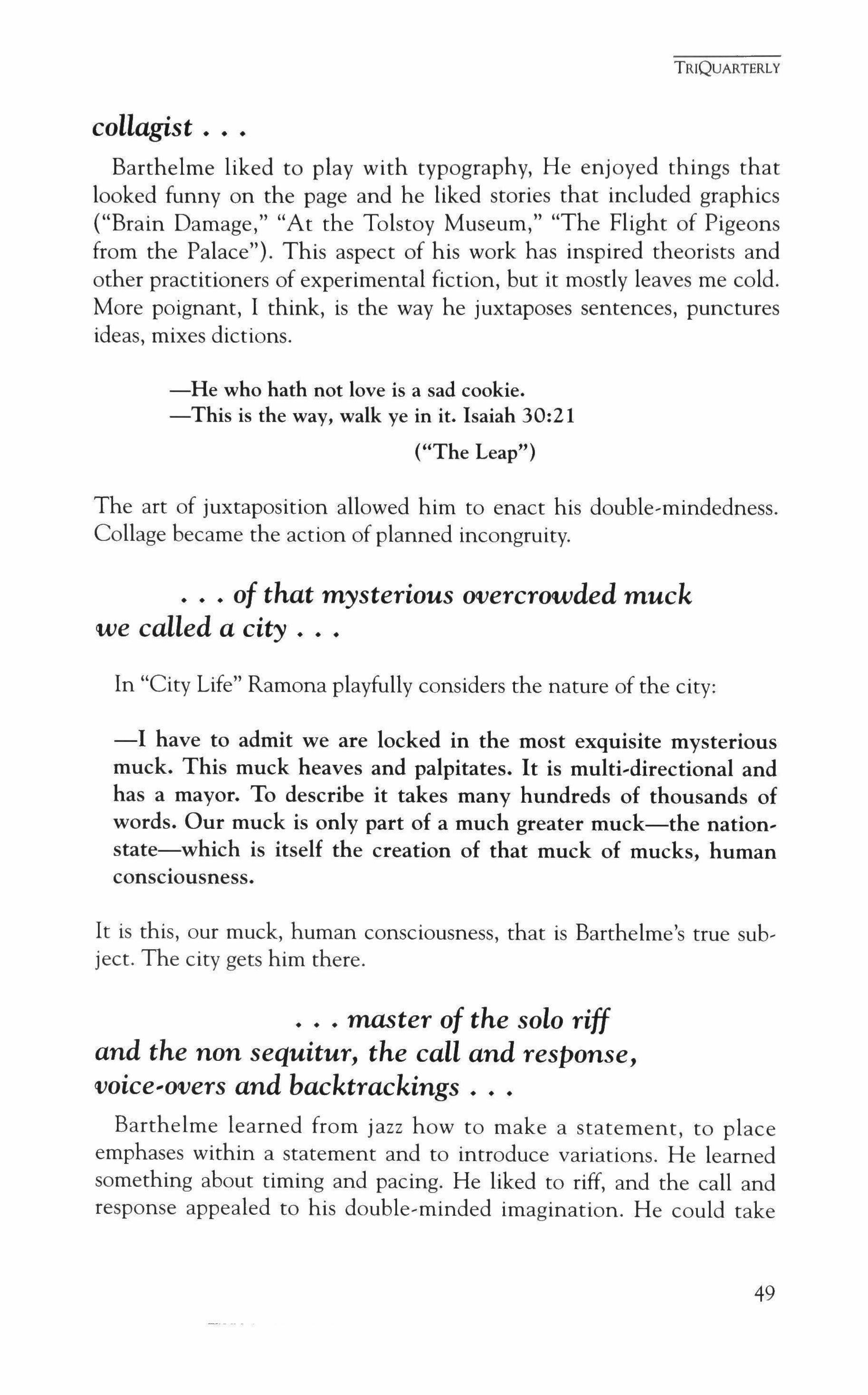
the
call and response, voice overs and
backtrackings
Barthelme learned from jazz how to make a statement, to place emphases within a statement and to introduce variations. He learned something about timing and pacing. He liked to riff, and the call and response appealed to his double-minded imagination. He could take
TRIQUARTERLY
49
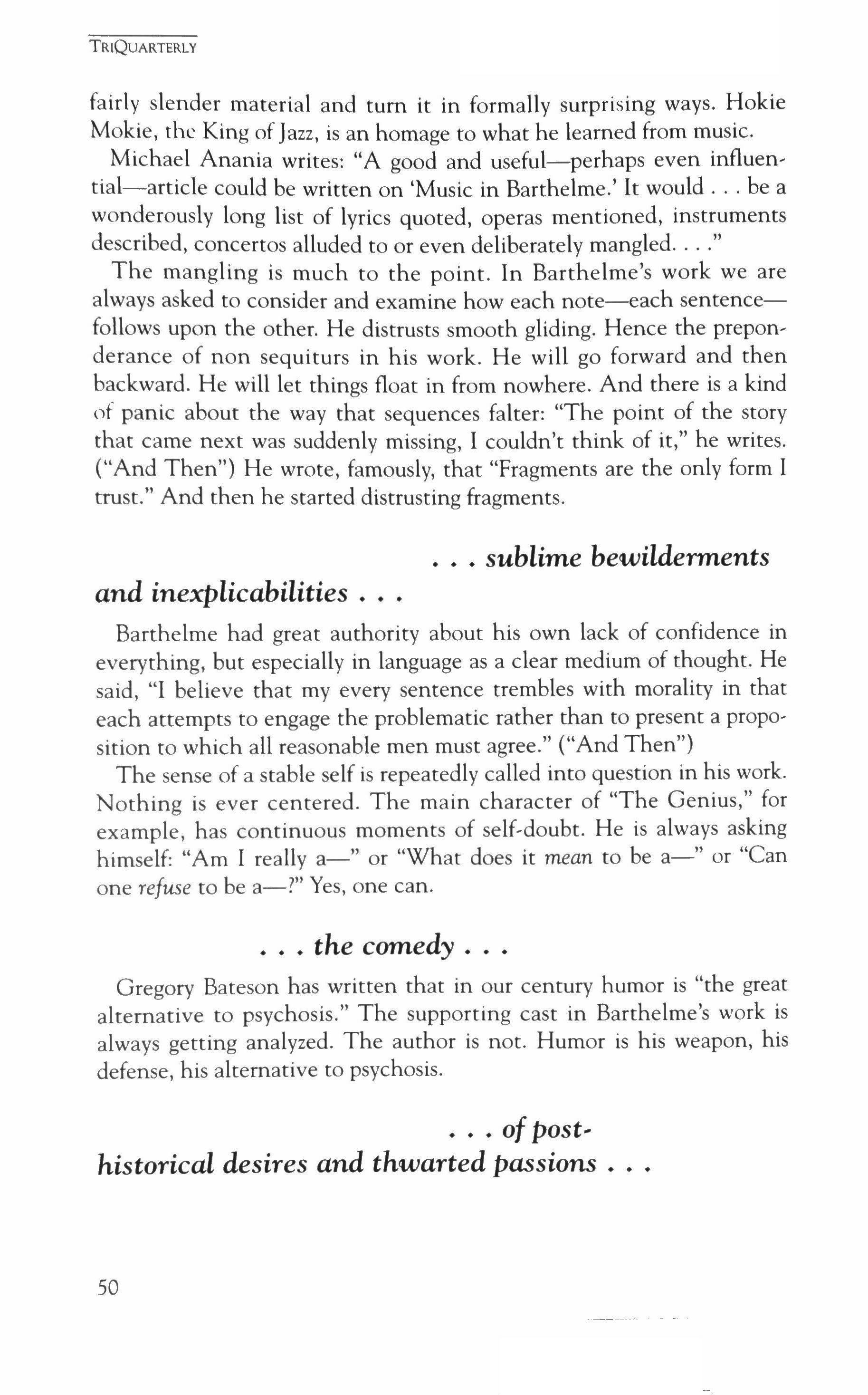
fairly slender material and tum it in formally surprising ways. Hokie Mckie, the King of Jazz, is an homage to what he learned from music. Michael Anania writes: "A good and useful-perhaps even influential-article could be written on 'Music in Barthelme.' It would be a wonderously long list of lyrics quoted, operas mentioned, instruments described, concertos alluded to or even deliberately mangled
The mangling is much to the point. In Barthelme's work we are always asked to consider and examine how each note-each sentencefollows upon the other. He distrusts smooth gliding. Hence the preponderance of non sequiturs in his work. He will go forward and then backward. He will let things float in from nowhere. And there is a kind of panic about the way that sequences falter: "The point of the story that came next was suddenly missing, I couldn't think of it," he writes. ("And Then") He wrote, famously, that "Fragments are the only form I trust." And then he started distrusting fragments.
sublime bewilderments and inexplicabilities
Barthelme had great authority about his own lack of confidence in everything, but especially in language as a clear medium of thought. He said, "I believe that my every sentence trembles with morality in that each attempts to engage the problematic rather than to present a proposition to which all reasonable men must agree." ("And Then")
The sense of a stable self is repeatedly called into question in his work. Nothing is ever centered. The main character of "The Genius," for example, has continuous moments of self-doubt. He is always asking himself: "Am I really a-" or "What does it mean to be a-" or "Can one refuse to be a-?" Yes, one can.
the comedy
Gregory Bateson has written that in our century humor is "the great alternative to psychosis." The supporting cast in Barthelme's work is always getting analyzed. The author is not. Humor is his weapon, his defense, his alternative to psychosis
ofpost historical desires and thwarted passions
TRIQUARTERLY
50
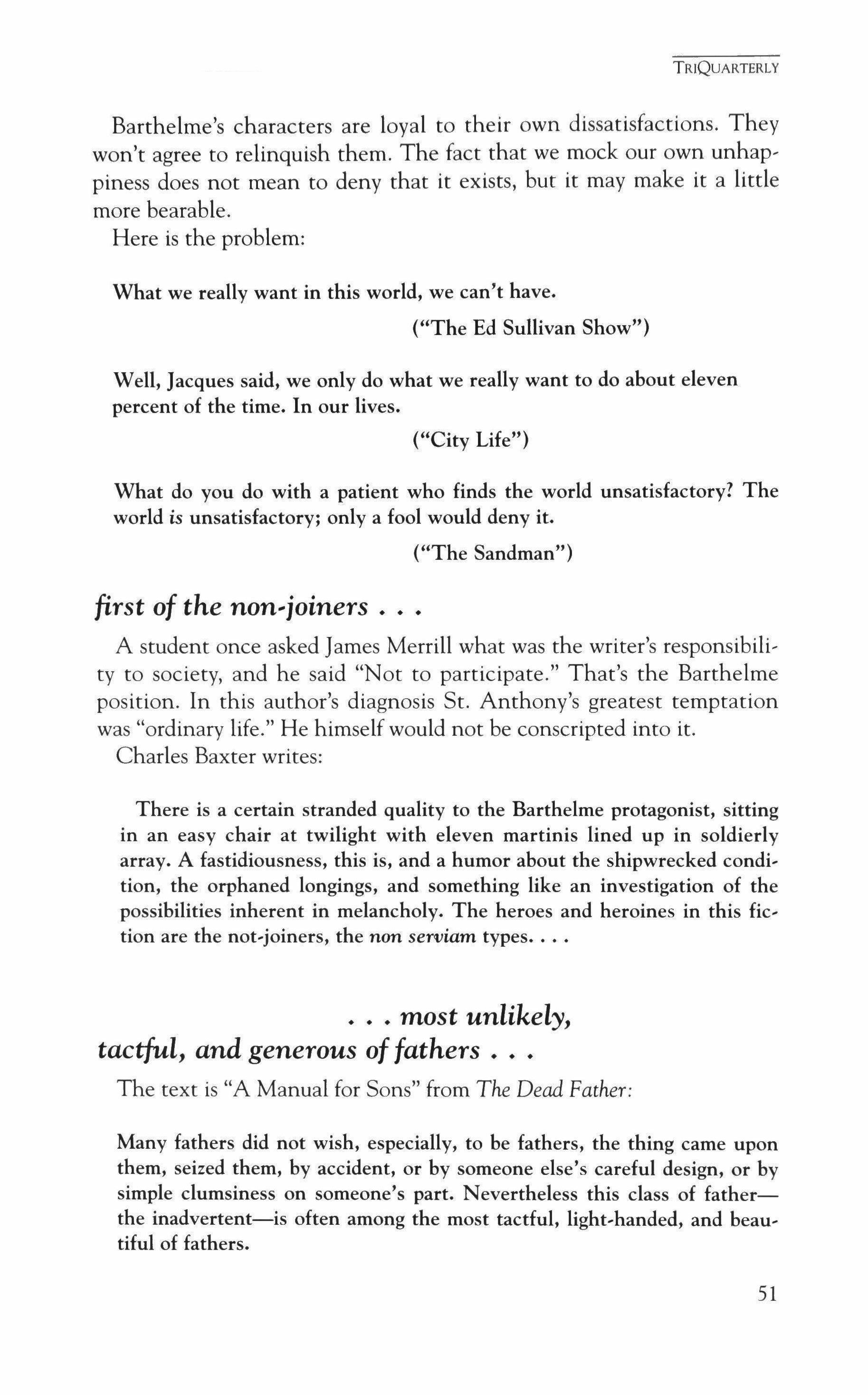
Barthelme's characters are loyal to their own dissatisfactions. They won't agree to relinquish them. The fact that we mock our own unhappiness does not mean to deny that it exists, but it may make it a little more bearable.
Here is the problem:
What we really want in this world, we can't have.
("The Ed Sullivan Show")
Well, Jacques said, we only do what we really want to do about eleven percent of the time. In our lives.
("City Life")
What do you do with a patient who finds the world unsatisfactory? The world is unsatisfactory; only a fool would deny it.
("The Sandman")
first of the non joiners ..•
A student once asked James Merrill what was the writer's responsibility to society, and he said "Not to participate." That's the Barthelme position. In this author's diagnosis St. Anthony's greatest temptation was "ordinary life." He himself would not be conscripted into it.
Charles Baxter writes:
There is a certain stranded quality to the Barthelme protagonist, sitting in an easy chair at twilight with eleven martinis lined up in soldierly array. A fastidiousness, this is, and a humor about the shipwrecked condition, the orphaned longings, and something like an investigation of the possibilities inherent in melancholy. The heroes and heroines in this fie, tion are the not-joiners, the non serviam types
most unlikely, tactful, and generous offathers
The text is "A Manual for Sons" from The Dead Father:
Many fathers did not wish, especially, to be fathers, the thing came upon them, seized them, by accident, or by someone else's careful design, or by simple clumsiness on someone's part. Nevertheless this class of fatherthe inadvertent-is often among the most tactful, light,handed, and beau, tiful of fathers.
TRIQUARTERLY
51

Barthelme himself, of course, was this kind of father to many. He was the one who ironically, gracefully, and profoundly bore the burdens and shouldered the responsibilities. He did not make much of a point of it, though he did have a lovely sigh-weighty, humorous, world-weary, "Fatherhood can be, if not conquered, at least 'turned down' in this genera, non. you who embarrassed the credulous and irritated the unimaginative
Barthelme could arouse a great fury in unsympathetic readers. His editor at the New Yorker, Roger Angell, has said: "Many readers had difficulty at first cottoning to writing like this. They were put off by Barthelme's crosscutting and by his terrifying absence of explanation, and those who resisted him in the end may have been people who were by nature unable to put their full trust in humor."
who entertained the void
Barthelme said that "Beckett's work is an embarrassment to the void." It's true of his own work as well. Except he not only tried to embarrass the void, but also to entertain it. See "The School" and "Nothing: A Preliminary Account."
and recycled the dross
One of his chief means of verbal entertainment was by recycling our cultural junk, our verbal garbage, what William Gass called "the leading edge of the trash phenomenon." Modem culture is wildly unmasked in his work, especially in his early stories. There's a srnart-alecky tone to stories in which he sends up, say, television, or the language of existentialism, or the commodification of nearly everything. A famous example comes from "The Indian Uprising":
"People were trying to understand. I spoke to Sylvia. 'Do you think this is a good life?' The table held apples, books, long-playing records. She looked up. 'No."
Christopher Lasch writes: "A latter day Madame Bovary, Snow White is a typical victim of mass culture, the culture of commodities and consumensm
TRIQUARTERLY
52
Many of the sociological features of Barthelme's work leave me unmoved, but it is a different story when he writes about contemporary unhappiness, when we are asked (in "Report") to "consider for instance the area of realtime online computer-controlled wish evaporation." There is a lot of verbal snap and sparkle in Barthelme's work. He has a gift for deflation and an ear for cliches. But the tone darkens whenever he talks about the sadness of wish evaporation in real time. Then he is singing back to the sirens
who deflated the pretentious and deepened perplexities
Barthelme's scrupulous irony is deflating. It gave him no rest. Pompousness cannot stand up to it. His work deepens our sense of what we don't know. Some people can't stand to have answers turned back into questions.
subject to odd stabbing rages of happiness, weird bouts ofpleasure, connoisseur ofmornings, of sunlight swinging into an open doorway, small boys bumping into small girls, purposefully
Barthelme's work is animated by instances of supreme happiness and well-being, moments of radiance. There are times when he is over, whelmed by gaiety. He praises a simple soup "in an ecstasy of admiration." He praises the splendid voices of Bessie Smith, Alice Babs, Joan Armatrading and Aretha Franklin:
-Each voice testifying to the greater honor and glory of God, each in its own way.
-Damn straight.
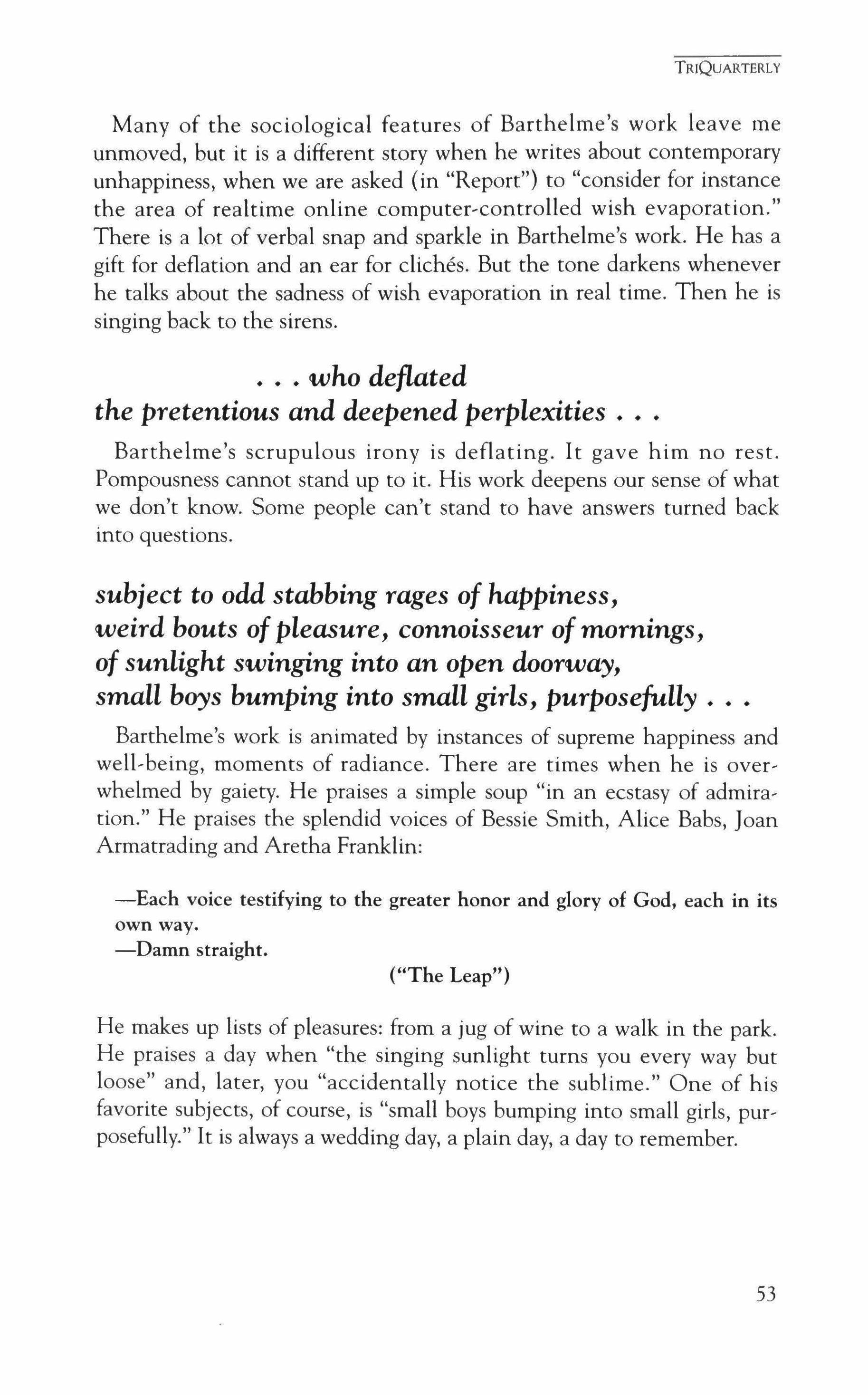
("The Leap")
He makes up lists of pleasures: from a jug of wine to a walk in the park. He praises a day when "the singing sunlight turns you every way but loose" and, later, you "accidentally notice the sublime." One of his favorite subjects, of course, is "small boys bumping into small girls, pur, posefully." It is always a wedding day, a plain day, a day to remember.
TRIQUARTERLY
53
most self.-conscious and ecstatic of ironists who sang uncertainties like the Song ofSongs
Barthelme could be oddly ecstatic about the writer's impossible uphill struggle. He wrote:
How joyous the notion that, try as we may, we cannot do other than fail and fail absolutely, and that the task will remain always before us, like a meaning for our lives
(HNothing: A Preliminary Account")
He also said in an interview: "In this century there's been much stress placed not upon what we know but on knowing that our methods are themselves questionable-our Song of Songs is the Uncertainty Principle."
One could not say that this made him happy, exactly. But he did consider irony "useful" and even "necessary."
A. But I love my irony.
B. Does it give you pleasure?
A. A poor - A rather unsatisfactory
B. The unavoidable tendency of everything particular to emphasize its own particularity.
A. Yes.

(HKierkegaard Unfair to Schlegel")
Barthelme relished Kierkegaard's idea that an irony directed against the whole of existence produces "estrangement and poetry." and dwelled in doubt like a habitation .•.
He made doubt his residence. That is his ethic and his aesthetic. His best essay on writing is called "Not-Knowing." He liked to point out that the very nature of artistic activity is failure. In "The Sandman" a fellow writes a letter, somewhat inappropriately, to his girlfriend's shrink. He says:
Let me point out, if it has escaped your notice, that what an artist does, is fail. Any reading of the literature (I mean the theory of artistic creation), however summary, will persuade you instantly that the paradigmatic artistic experience is that of failure. The actualization fails to meet, equal, the
TRIQUARTERLY
54

intuition. There is something "out there" which cannot be brought "here." This is standard. I don't mean bad artists, 1 mean good artists. There is no such thing as a "successful artist" (except, of course, in worldly terms). The proposition should read, "Susan becomes an artist and lives unhappily ever after." This is the case. Don't be deceived.
Barthelme vowed to be one of what Philip Larkin called "the less deceived." It's a painful position, but one with integrity.
my wary, unreachable, inconsolable friend.
Wary: "On one's guard; cautious, watchful."
Unreachable: Not to be reached.
Inconsolable: "Incapable of being consoled or solaced; despondent."
Friend: "One with whom one is allied in a struggle or cause; a cornrade."
I wish I believed in another world than this
Barthelme would have liked to believe in a world beyond our own. This was denied him. The theologian Brecker confesses: "I can do without certitude. I would have liked to have had faith."
As a writer Barthelme could be very funny-and deadly seriousabout the death of God. His favorite tactic was to take theological questions completely literally, as in "The death of God left the angels in a strange position" ("On Angels") or:
-Today we make the leap to faith. Today.
-Today?
-Today.
-We're really going to do it? At last?
-Spent too much time fooling around. Today we do it.
-I don't know. Maybe we're not ready?
-I am cheered by the wine of possibility and the growing popularity of light. Today's the day.
-You're serious.
-Intensely. First, we examine our consciences. ("The Leap")
After examining his conscience, however, this speaker, this free-floating voice-we can't really call him a character-decides that he can't quite make the leap of faith. Why not? Because he is a "double-minded man." He would try another day. He would fail again.
TRIQUARTERLY
55
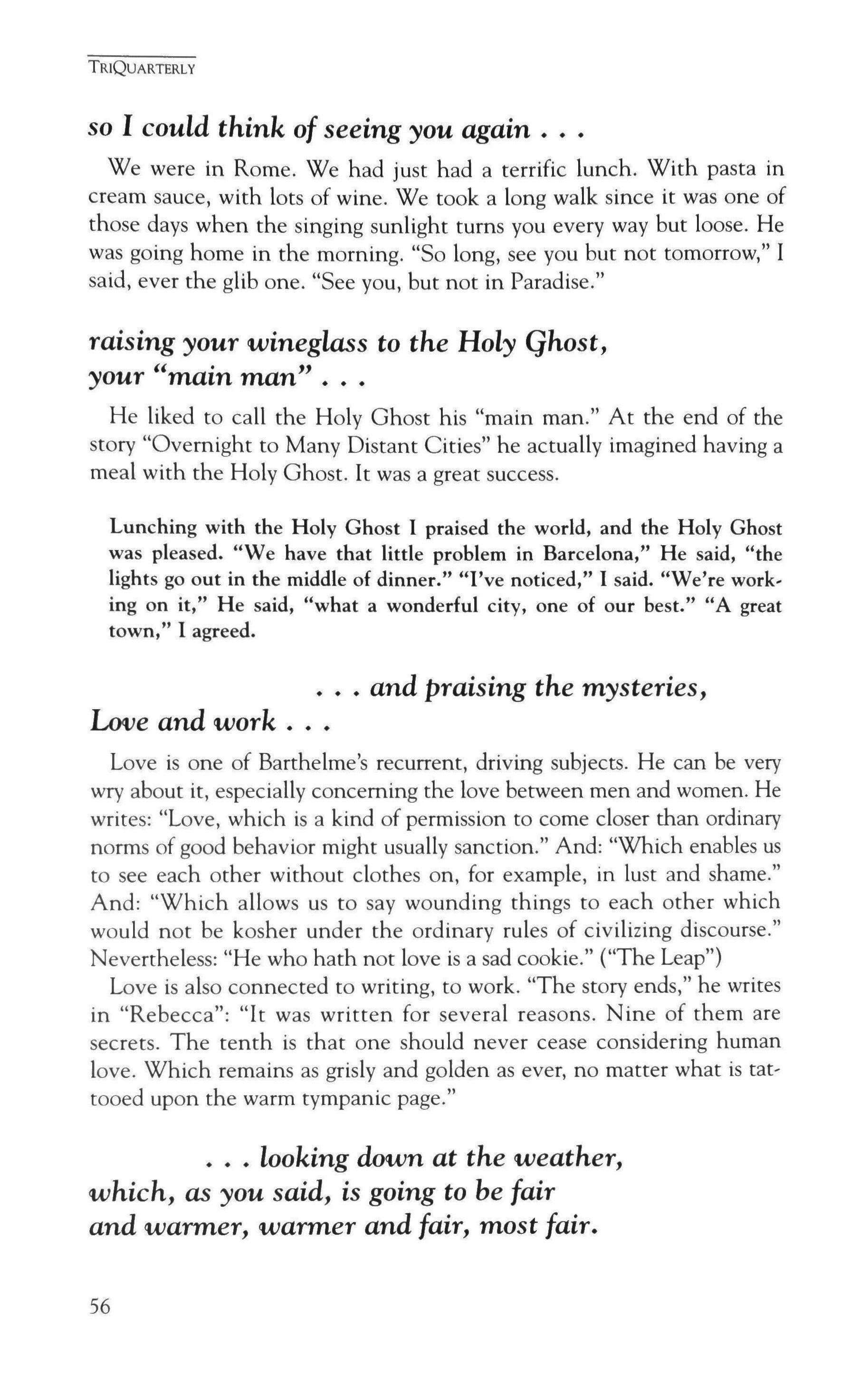
so I
could
think of seeing you again.
We were in Rome. We had just had a terrific lunch. With pasta in cream sauce, with lots of wine. We took a long walk since it was one of those days when the singing sunlight turns you every way but loose. He was going home in the morning. "So long, see you but not tomorrow," I said, ever the glib one. "See you, but not in Paradise."
raising your wineglass to the Holy Ghost, your "main man"
He liked to call the Holy Ghost his "main man." At the end of the story "Overnight to Many Distant Cities" he actually imagined having a meal with the Holy Ghost. It was a great success.
Lunching with the Holy Ghost I praised the world, and the Holy Ghost was pleased. "We have that little problem in Barcelona," He said, "the lights go out in the middle of dinner." "I've noticed," I said. "We're working on it," He said, "what a wonderful city, one of our best." "A great town," I agreed.
and praising the mysteries, Love and work
Love is one of Barthelme's recurrent, driving subjects. He can be very wry about it, especially concerning the love between men and women. He writes: "Love, which is a kind of permission to come closer than ordinary norms of good behavior might usually sanction." And: "Which enables us to see each other without clothes on, for example, in lust and shame." And: "Which allows us to say wounding things to each other which would not be kosher under the ordinary rules of civilizing discourse." Nevertheless: "He who hath not love is a sad cookie." ("The Leap")
Love is also connected to writing, to work. "The story ends," he writes in "Rebecca": "It was written for several reasons. Nine of them are secrets. The tenth is that one should never cease considering human love. Which remains as grisly and golden as ever, no matter what is tattooed upon the warm tympanic page."
looking
down at the weather, which, as you said, is going to be fair
and warmer, warmer and fair, most fair.
TRIQUARTERLY
56
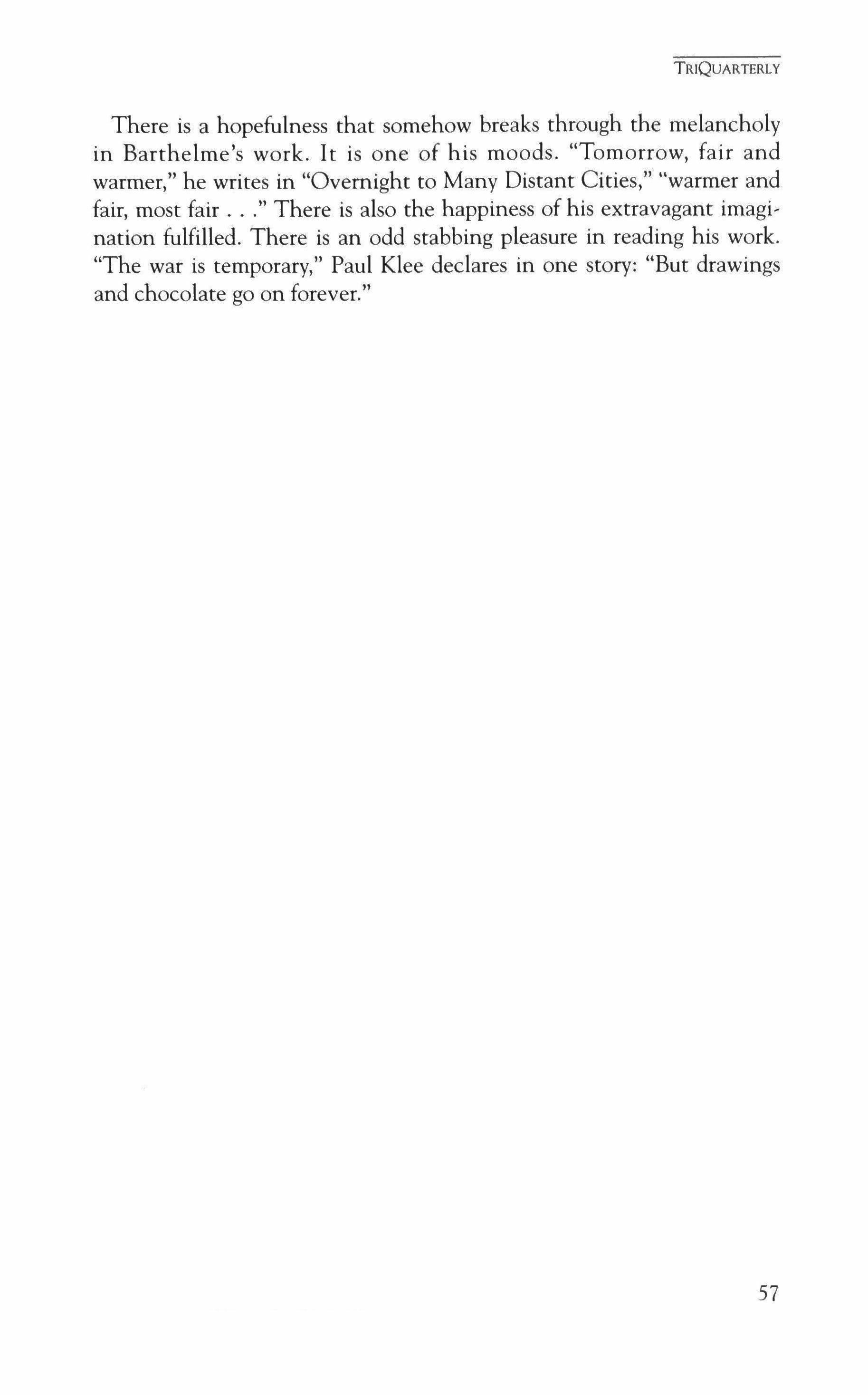
There is a hopefulness that somehow breaks through the melancholy in Barthelme's work. It is one of his moods. "Tomorrow, fair and warmer," he writes in "Overnight to Many Distant Cities," "warmer and fair, most fair There is also the happiness of his extravagant imagination fulfilled. There is an odd stabbing pleasure in reading his work. "The war is temporary," Paul Klee declares in one story: "But drawings and chocolate go on forever."
TRIQUARTERLY
57
Four Poems
Carl Phillips
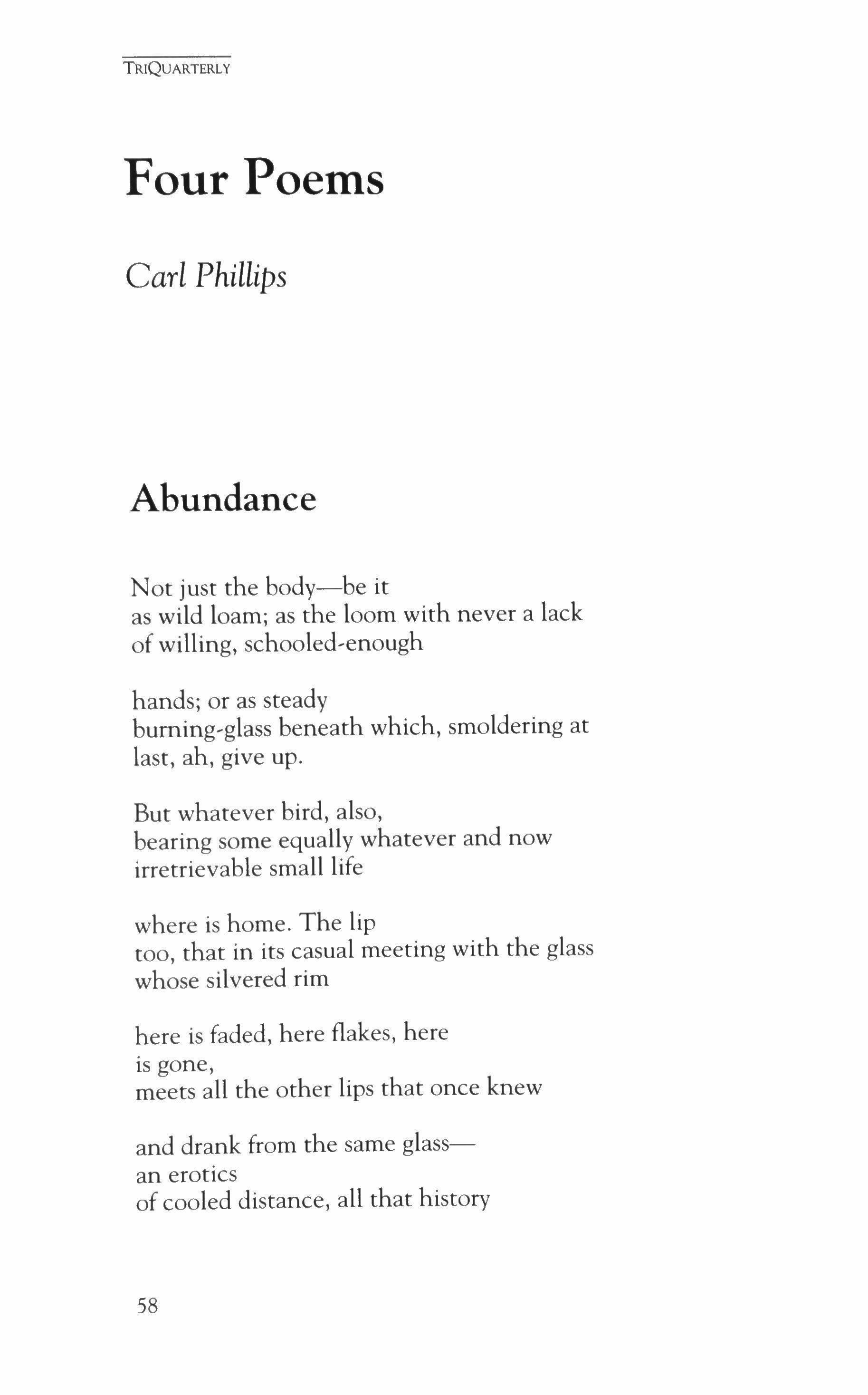
Abundance
Not just the body-be it as wild loam; as the loom with never a lack of willing, schooled-enough
hands; or as steady burning-glass beneath which, smoldering at last, ah, give up.
But whatever bird, also, bearing some equally whatever and now irretrievable small life
where is home. The lip too, that in its casual meeting with the glass whose silvered rim
here is faded, here flakes, here is gone, meets all the other lips that once knew and drank from the same glassan erotics of cooled distance, all that history
TRIQUARTERLY
58
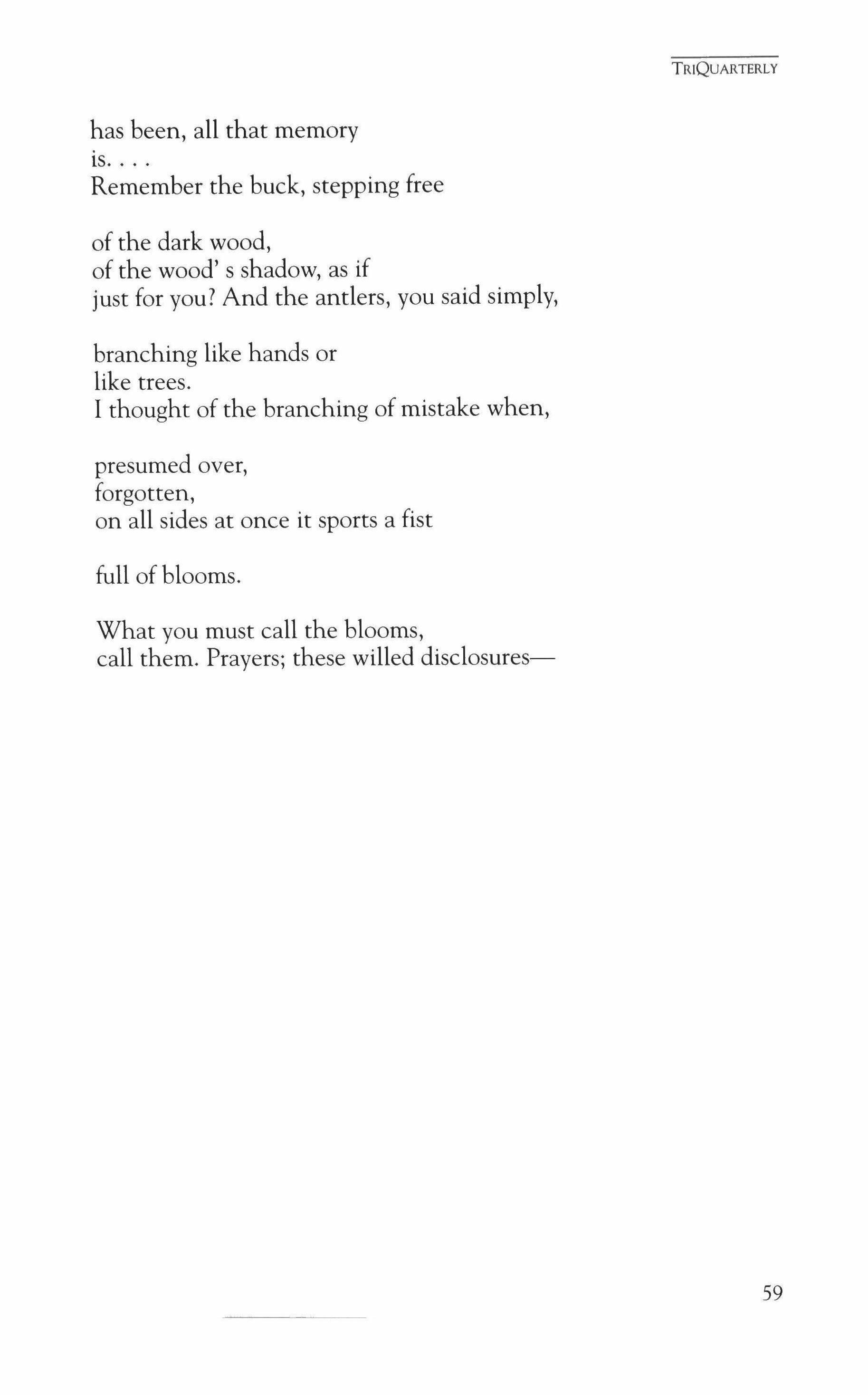
has been, all that memory is
Remember the buck, stepping free of the dark wood, of the wood's shadow, as if just for you? And the antlers, you said simply, branching like hands or like trees.
I thought of the branching of mistake when, presumed over, forgotten, on all sides at once it sports a fist full of blooms.
What you must call the blooms, call them. Prayers; these willed disclosures-
TRIQUARTERLY
59
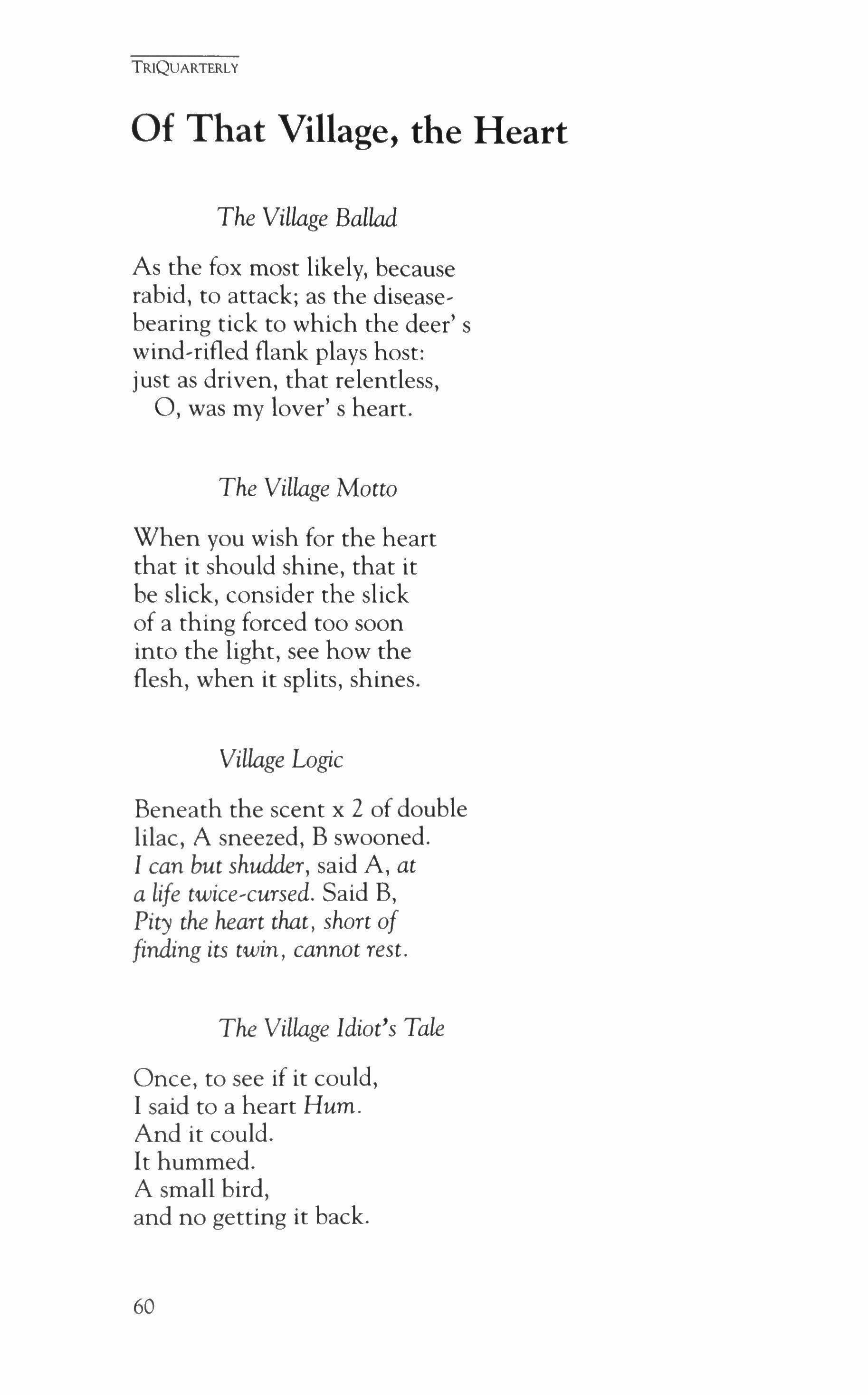
Of That Village, the Heart
The Village Ballad
As the fox most likely, because rabid, to attack; as the disease, bearing tick to which the deer's wind-rifled flank plays host: just as driven, that relentless, 0, was my lover's heart.
The Village Motto
When you wish for the heart that it should shine, that it be slick, consider the slick of a thing forced too soon into the light, see how the flesh, when it splits, shines.
Village
Logic
Beneath the scent x 2 of double lilac, A sneezed, B swooned. I can but shudder, said A, at a life twice,cursed. Said B, Pity the heart that, short of finding its twin, cannot rest.
The Village Idiot's Tale
Once, to see if it could, I said to a heart Hum. And it could. It hummed. A small bird, and no getting it back.
TRIQUARTERLY
60
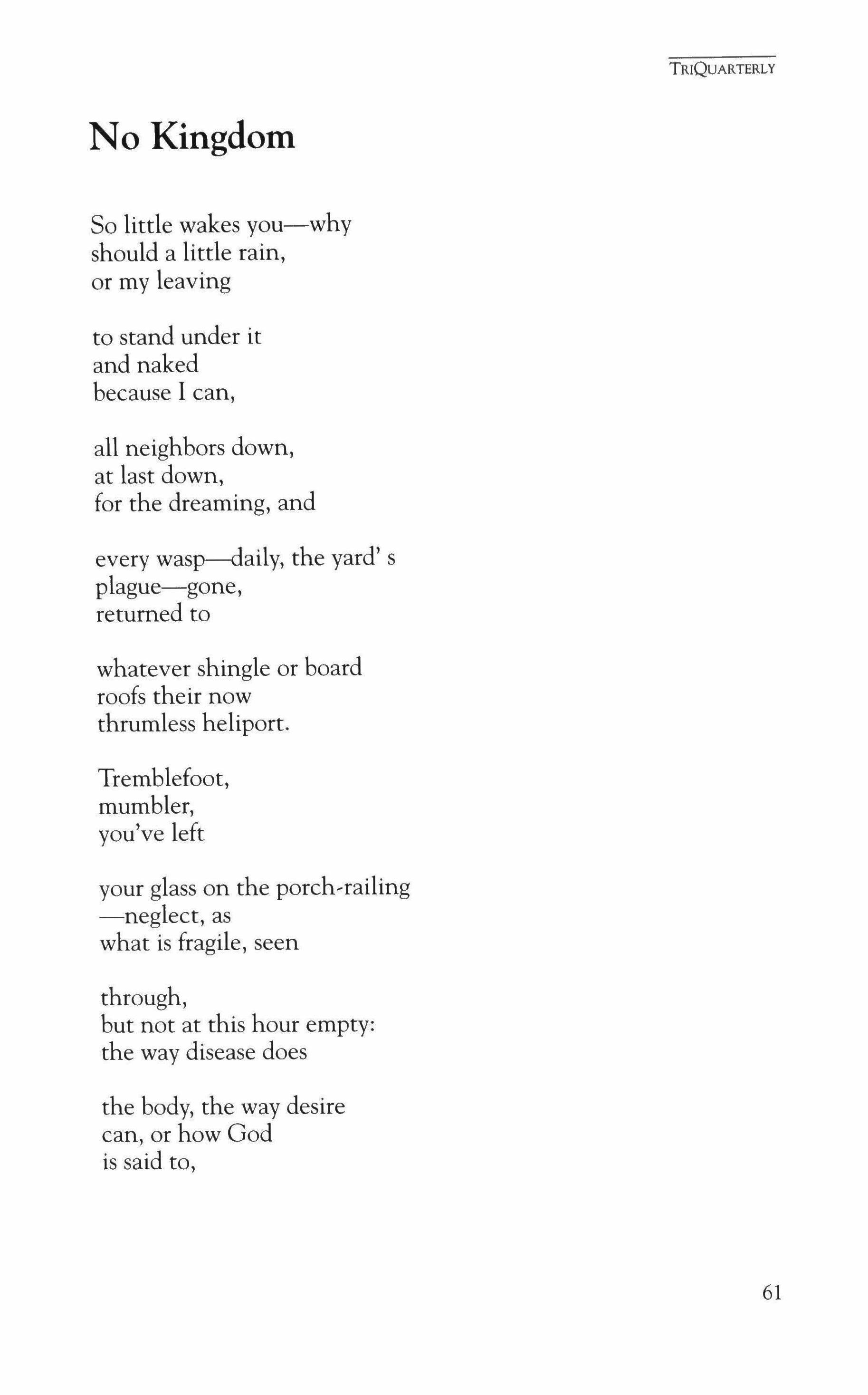
No Kingdom
So little wakes you-why should a little rain, or my leaving to stand under it and naked because I can, all neighbors down, at last down, for the dreaming, and every wasp--daily, the yard's plague-gone, returned to whatever shingle or board roofs their now thrumless heliport.
Tremblefoot, mumbler, you've left your glass on the porch-railing -neglect, as what is fragile, seen through, but not at this hour empty: the way disease does the body, the way desire can, or how God is said to,
TRIQUARTERLY
61
TRIQUARTERLY
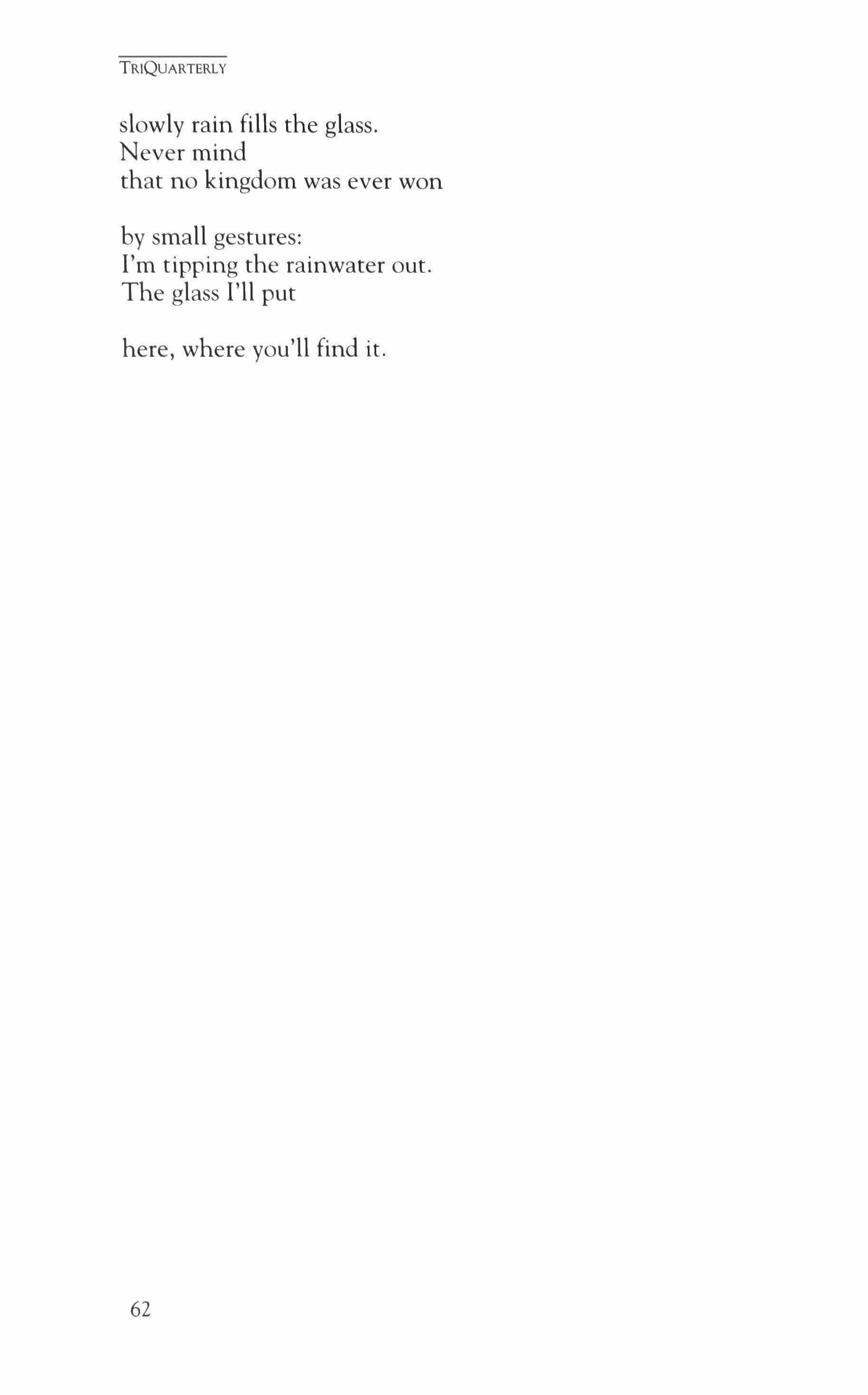
slowly rain fills the glass. Never mind that no kingdom was ever won by small gestures: I'm tipping the rainwater out. The glass I'll put here, where you'll find it.
62
Portage
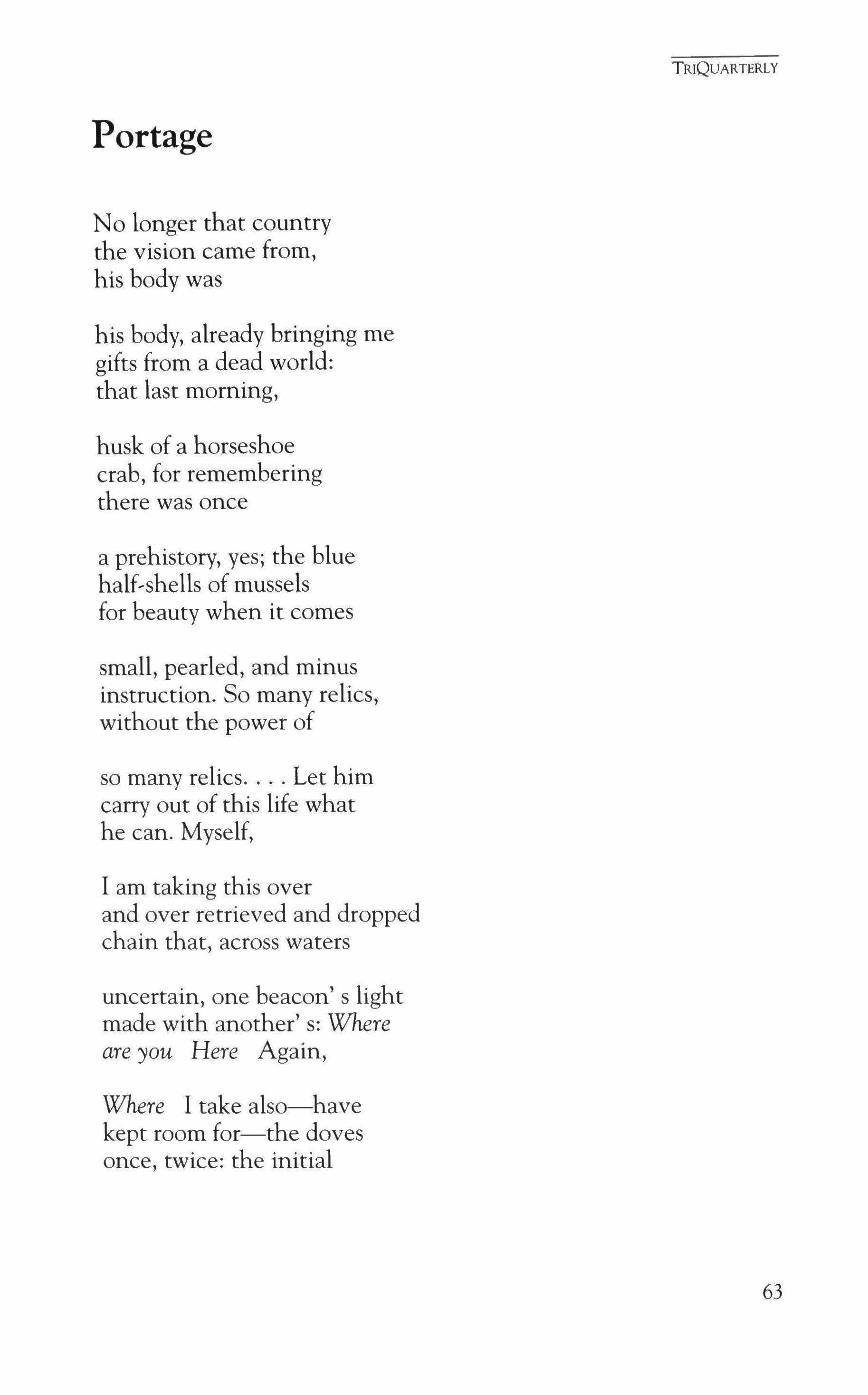
No longer that country the vision came from, his body was his body, already bringing me gifts from a dead world: that last morning,
husk of a horseshoe crab, for remembering there was once
a prehistory, yes; the blue half,shells of mussels for beauty when it comes
small, pearled, and minus instruction. So many relics, without the power of so many relics Let him carry out of this life what he can. Myself,
I am taking this over and over retrieved and dropped chain that, across waters
uncertain, one beacon's light made with another's: Where are you Here Again,
Where I take also-have kept room for-the doves once, twice: the initial
TRIQUARTERLY
63

wind-snapped wash of their wings toward ascent; then the doves visibly themselves, with-because of a name they don't ask forthe unswallowable mourning for a loss that never shows, forever stuck inside their excellent, downed throats.
TRIQUARTERLY
64
From The Feast of Love
Charles Baxter

Jonah
He's leaning back in the chair, giving an impression of pleasantness.
"There are a few details you should know about me, simple matters," he says. "I'm not an especially complicated guy. My pleasures are mostly the ordinary ones. People don't notice me in a group, and they shouldn't. I have a formal side. I don't like to go to the job wearing overalls and a sweatshirt. And I prefer to do procedures at work in the right order, by the book. I'm not a stickler, but I'm not much for touchyfeely improvisations on that end of things. It gets you into trouble, and then you have to go back and fix everything step by step.
"But I do have a kink, and it's caused me trouble, and I'm aware that it's caused me trouble, and I don't like to talk about it because it can be perceived as a weakness. A gap.
"It finally gets to Diana. But to explain this, I have to tell you a story.
"I have two sisters, one older and one younger than I am. The older one, Amy, was bossy and a tomboy and quite a jock in grade school and high school. She was the captain of her high-school girls' basketball team by the time she was seventeen, and she got a full athletic scholarship to Wisconsin, though after her sophomore year she dropped all that. She went grunge for a while. She learned a few power chords on a bass guitar and helped form a girl group called Handcuff. Four leatherand-vinyl women playing at max volume and shouting into microphones at clubs with names like The Eight-Ball; it was worth seeing.
"You wouldn't want to hear it, though, unless you liked techno heavy
TRIQUARTERLY
65
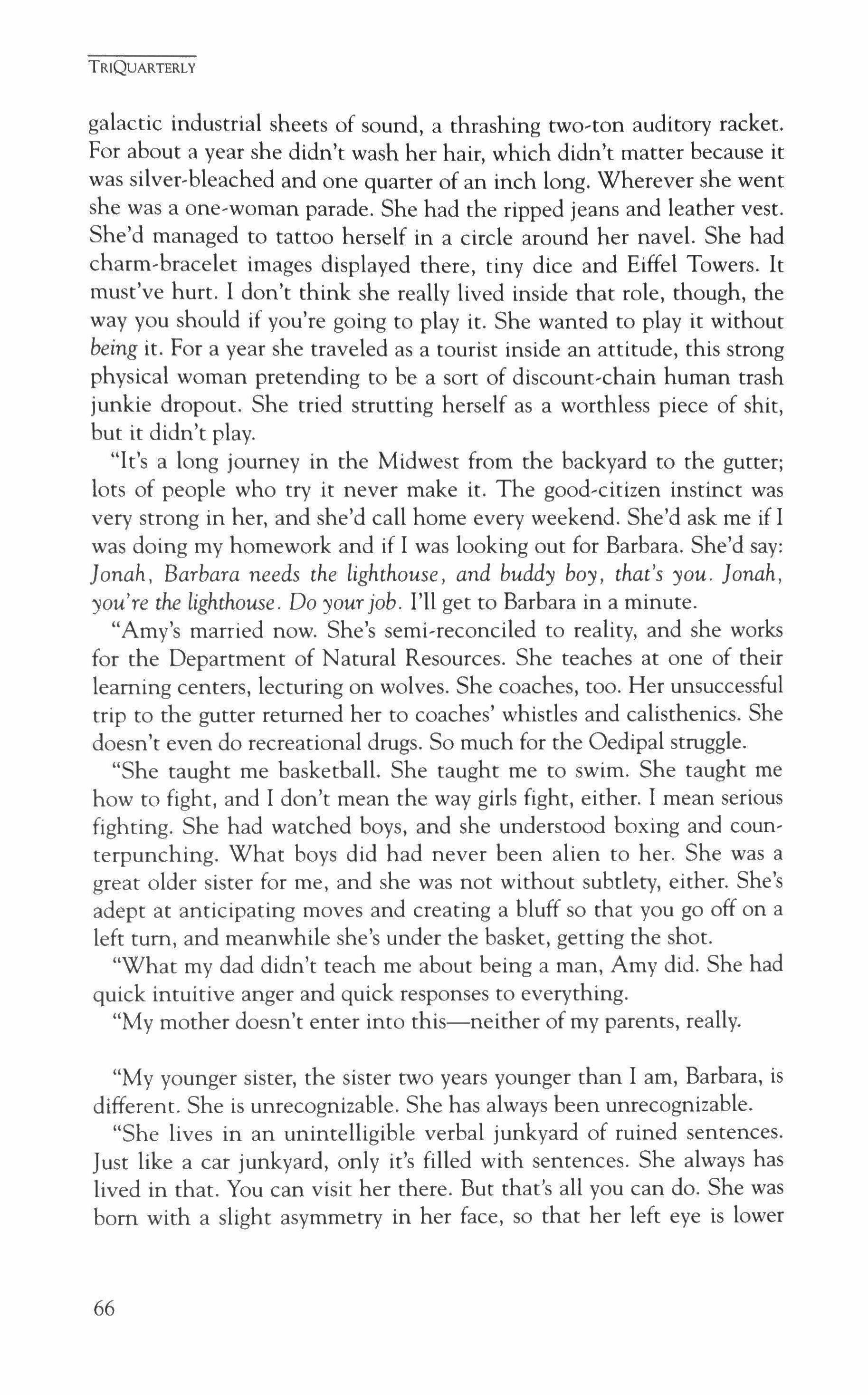
galactic industrial sheets of sound, a thrashing two-ton auditory racket. For about a year she didn't wash her hair, which didn't matter because it was silver-bleached and one quarter of an inch long. Wherever she went she was a one-woman parade. She had the ripped jeans and leather vest. She'd managed to tattoo herself in a circle around her navel. She had charm-bracelet images displayed there, tiny dice and Eiffel Towers. It must've hurt. I don't think she really lived inside that role, though, the way you should if you're going to play it. She wanted to play it without being it. For a year she traveled as a tourist inside an attitude, this strong physical woman pretending to be a sort of discount-chain human trash junkie dropout. She tried strutting herself as a worthless piece of shit, but it didn't play.
"It's a long journey in the Midwest from the backyard to the gutter; lots of people who try it never make it. The good-citizen instinct was very strong in her, and she'd call home every weekend. She'd ask me if I was doing my homework and if I was looking out for Barbara. She'd say: Jonah, Barbara needs the lighthouse, and buddy boy, that's you. Jonah, you're the lighthouse. Do your job. I'll get to Barbara in a minute.
"Amy's married now. She's semi-reconciled to reality, and she works for the Department of Natural Resources. She teaches at one of their learning centers, lecturing on wolves. She coaches, too. Her unsuccessful trip to the gutter returned her to coaches' whistles and calisthenics. She doesn't even do recreational drugs. So much for the Oedipal struggle.
"She taught me basketball. She taught me to swim. She taught me how to fight, and I don't mean the way girls fight, either. I mean serious fighting. She had watched boys, and she understood boxing and counterpunching. What boys did had never been alien to her. She was a great older sister for me, and she was not without subtlety, either. She's adept at anticipating moves and creating a bluff so that you go off on a left tum, and meanwhile she's under the basket, getting the shot.
"What my dad didn't teach me about being a man, Amy did. She had quick intuitive anger and quick responses to everything.
"My mother doesn't enter into this-neither of my parents, really.
"My younger sister, the sister two years younger than I am, Barbara, is different. She is unrecognizable. She has always been unrecognizable.
"She lives in an unintelligible verbal junkyard of ruined sentences. Just like a car junkyard, only it's filled with sentences. She always has lived in that. You can visit her there. But that's all you can do. She was born with a slight asymmetry in her face, so that her left eye is lower
TRIQUARTERLY
66
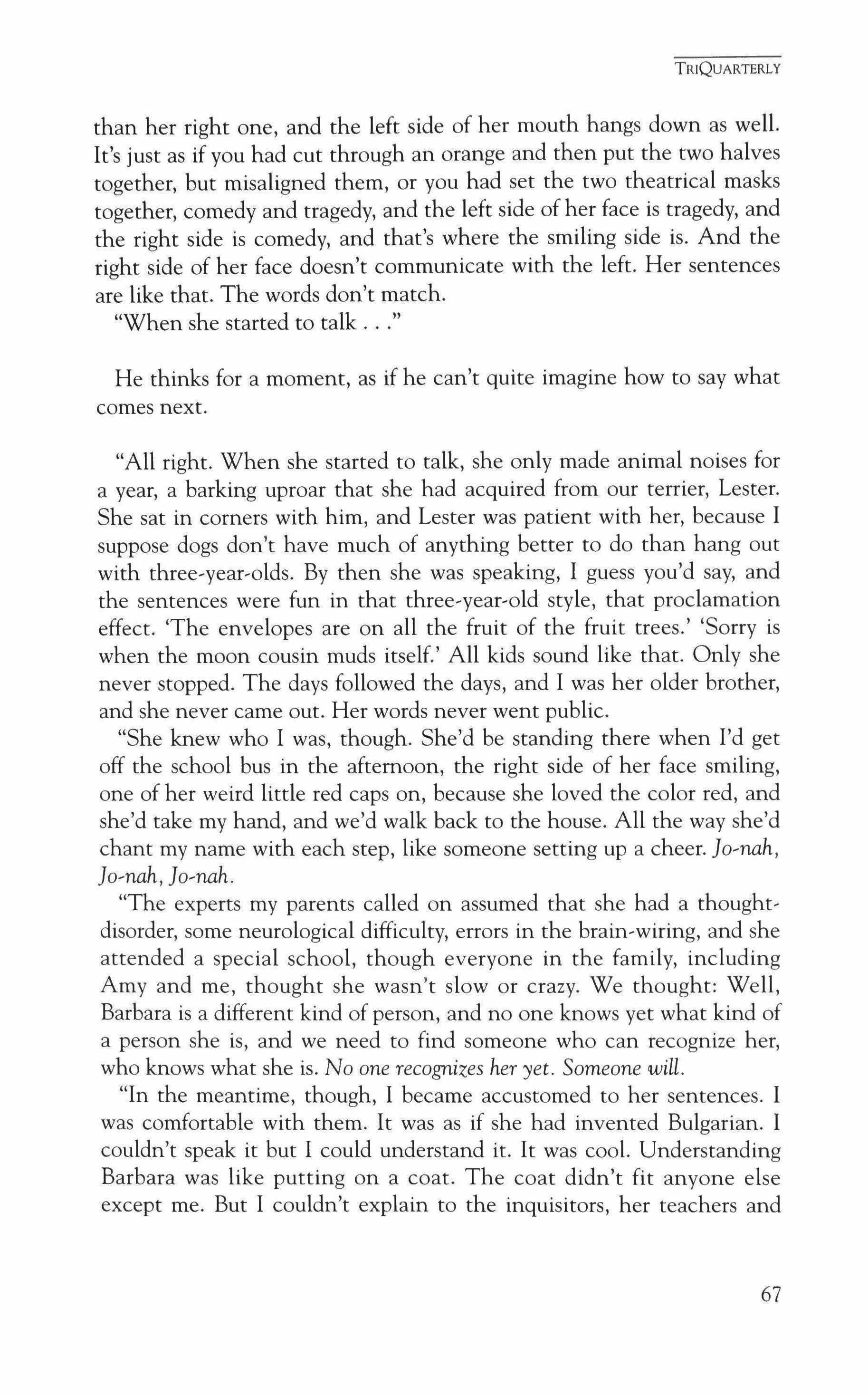
than her right one, and the left side of her mouth hangs down as well. It's just as if you had cut through an orange and then put the two halves together, but misaligned them, or you had set the two theatrical masks together, comedy and tragedy, and the left side of her face is tragedy, and the right side is comedy, and that's where the smiling side is. And the right side of her face doesn't communicate with the left. Her sentences are like that. The words don't match.
"When she started to talk "
He thinks for a moment, as if he can't quite imagine how to say what comes next.
"All right. When she started to talk, she only made animal noises for a year, a barking uproar that she had acquired from our terrier, Lester. She sat in corners with him, and Lester was patient with her, because I suppose dogs don't have much of anything better to do than hang out with three-year-olds. By then she was speaking, I guess you'd say, and the sentences were fun in that three-year-old style, that proclamation effect. 'The envelopes are on all the fruit of the fruit trees.' 'Sorry is when the moon cousin muds itself.' All kids sound like that. Only she never stopped. The days followed the days, and I was her older brother, and she never came out. Her words never went public.
"She knew who I was, though. She'd be standing there when I'd get off the school bus in the afternoon, the right side of her face smiling, one of her weird little red caps on, because she loved the color red, and she'd take my hand, and we'd walk back to the house. All the way she'd chant my name with each step, like someone setting up a cheer. [o-nai», Jo�nah, Jo�nah.
"The experts my parents called on assumed that she had a thoughtdisorder, some neurological difficulty, errors in the brain-wiring, and she attended a special school, though everyone in the family, including Amy and me, thought she wasn't slow or crazy. We thought: Well, Barbara is a different kind of person, and no one knows yet what kind of a person she is, and we need to find someone who can recognize her, who knows what she is. No one recognizes her yet. Someone will.
"In the meantime, though, I became accustomed to her sentences. I was comfortable with them. It was as if she had invented Bulgarian. I couldn't speak it but I could understand it. It was cool. Understanding Barbara was like putting on a coat. The coat didn't fit anyone else except me. But I couldn't explain to the inquisitors, her teachers and 67
TRIQUARTERLY
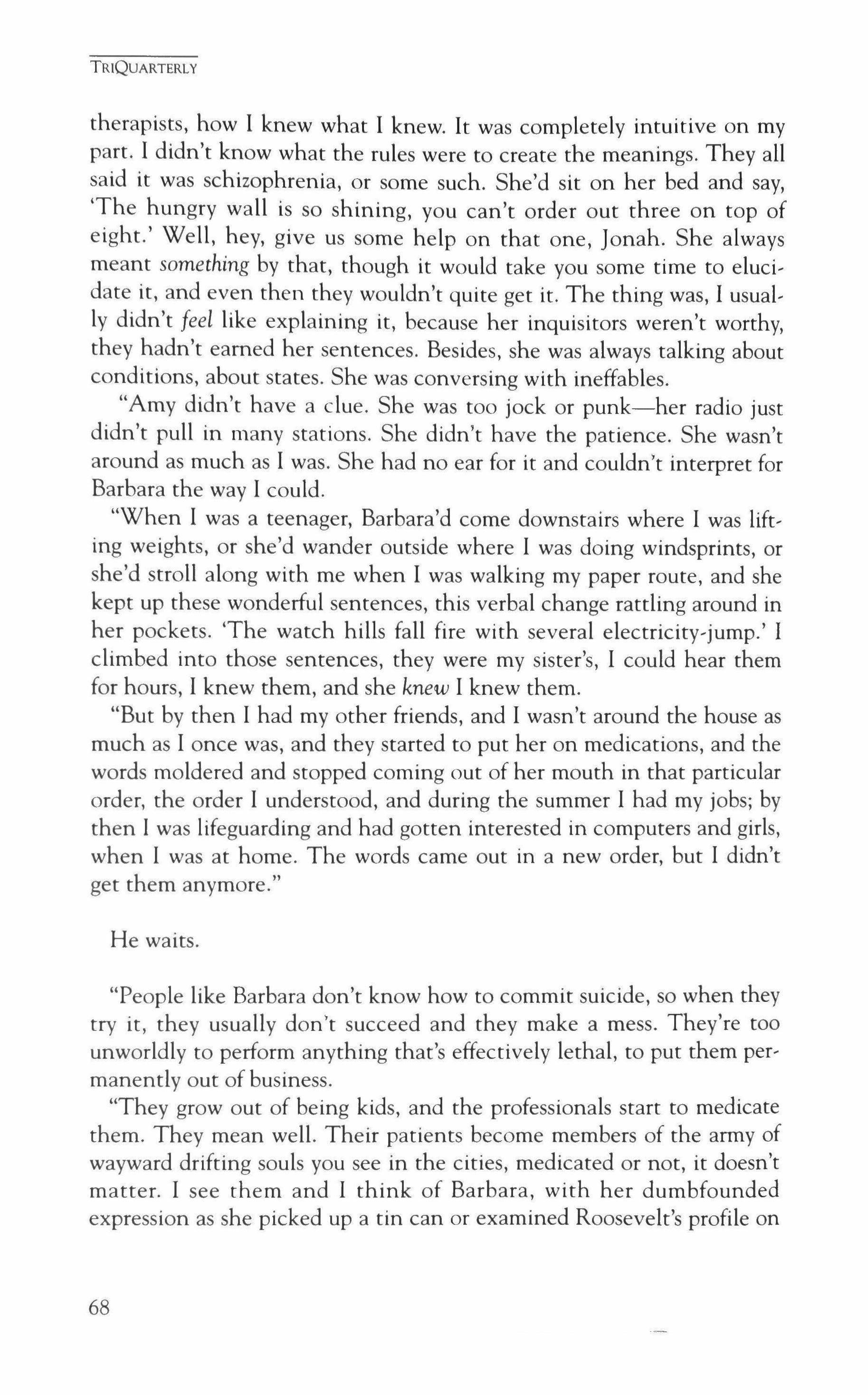
therapists, how I knew what I knew. It was completely intuitive on my part. I didn't know what the rules were to create the meanings. They all said it was schizophrenia, or some such. She'd sit on her bed and say, 'The hungry wall is so shining, you can't order out three on top of eight.' Well, hey, give us some help on that one, Jonah. She always meant something by that, though it would take you some time to elucidate it, and even then they wouldn't quite get it. The thing was, I usually didn't feel like explaining it, because her inquisitors weren't worthy, they hadn't earned her sentences. Besides, she was always talking about conditions, about states. She was conversing with ineffables.
"Amy didn't have a clue. She was too jock or punk-her radio just didn't pull in many stations. She didn't have the patience. She wasn't around as much as I was. She had no ear for it and couldn't interpret for Barbara the way I could.
"When I was a teenager, Barbara'd come downstairs where I was lifting weights, or she'd wander outside where I was doing windsprints, or she'd stroll along with me when I was walking my paper route, and she kept up these wonderful sentences, this verbal change rattling around in her pockets. 'The watch hills fall fire with several electricity-jump.' I climbed into those sentences, they were my sister's, I could hear them for hours, I knew them, and she knew I knew them.
"But by then I had my other friends, and I wasn't around the house as much as I once was, and they started to put her on medications, and the words moldered and stopped coming out of her mouth in that particular order, the order I understood, and during the summer I had my jobs; by then I was lifeguarding and had gotten interested in computers and girls, when I was at home. The words came out in a new order, but I didn't get them anymore."
He waits.
"People like Barbara don't know how to commit suicide, so when they try it, they usually don't succeed and they make a mess. They're too unworldly to perform anything that's effectively lethal, to put them permanently out of business.
"They grow out of being kids, and the professionals start to medicate them. They mean well. Their patients become members of the army of wayward drifting souls you see in the cities, medicated or not, it doesn't matter. I see them and I think of Barbara, with her dumbfounded expression as she picked up a tin can or examined Roosevelt's profile on
TRIQUARTERLY
68

the side of a dime. I'm supposed to explain Roosevelt's profile?
"Being Barbara's lifelong interpreter would've been my job, but I turned it down. After a certain point, I couldn't do it, and they dolloped out the tranquilizers instead. And when they did that, she became dull. I couldn't stand it. She began to make dull sense. She'd say, 'Give me some popcorn. Where's my water?' She discovered that she had a talent for watching television. She enjoyed the news. 'I like the news. I like Peter Jennings.' She waited for certain commercials to come on, the soap commercials, those were the ones she loved. She approved of how clean they were. She'd say 'Please' to the TV set, asking for her favorite ads.
"She embarked upon the round of the hospitals and the group homes, and there was just nothing left of her to interest anyone. She was fat by now, and a smoker. She smoked no-brand cigarettes. She slopped from room to room. She left puddles behind her.
"I can hardly stand to see her these days. Charlie, she had a weird beauty once. You had to learn to appreciate her small shows of poetry and harmlessness. Now she's just circling the airport, all day long. That plane is never going to land."
He takes a sip of water.
"There's one other story. I was a camp counselor one summer when I was seventeen near Brainard, on Lake Tonak. Barbara was being medicated by then. This was a camp called Camp Buchanan, and just down the shore was the girls' camp, Camp Maple, about half a mile away. Camp Maple's buildings were a lighter shade of wood, like pine, and Camp Buchanan's were darker, so that you couldn't see them until you were almost on top of them. I worked at both the junior camp and the senior camp, and my group was the Muskrats. They had four groups of boys: Muskrats, Badgers, Raccoons and I don't remember the other group. Weasels, possibly. Little snouty foraging woodland creatures.
"In the morning, before anyone else was up, I'd go down to the water just as the sun was rising and swim across the lake and back. It wasn't what you'd call a big lake. The water was so clear that you could sometimes see to the bottom, the odds-and-ends of fish and weeds, what you get around here, inland aquatic droop. But the sun rising: that would give it a gold look, and besides, I was proud of my speed and endurance. I'd tear across the water. I'd tear back.
'Then I stood on the dock. Those docks had a cedar-and-creosote
TRIQUARTERLY
69
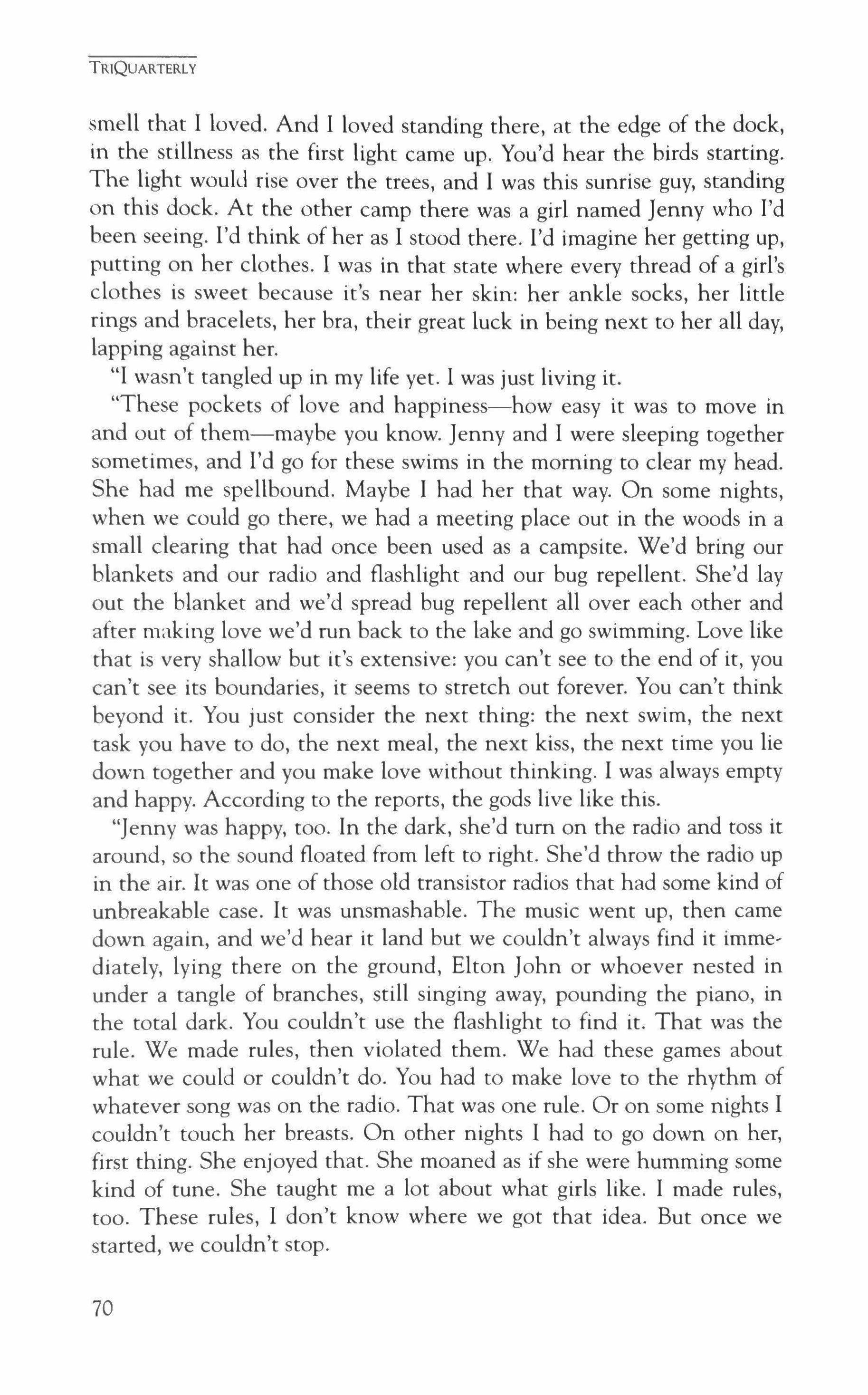
smell that I loved. And I loved standing there, at the edge of the dock, in the stillness as the first light came up. You'd hear the birds starting. The light would rise over the trees, and I was this sunrise guy, standing on this dock. At the other camp there was a girl named Jenny who I'd been seeing. I'd think of her as I stood there. I'd imagine her getting up, putting on her clothes. I was in that state where every thread of a girl's clothes is sweet because it's near her skin: her ankle socks, her little rings and bracelets, her bra, their great luck in being next to her all day, lapping against her.
"I wasn't tangled up in my life yet. I was just living it.
"These pockets of love and happiness-how easy it was to move in and out of them-maybe you know. Jenny and I were sleeping together sometimes, and I'd go for these swims in the morning to clear my head. She had me spellbound. Maybe I had her that way. On some nights, when we could go there, we had a meeting place out in the woods in a small clearing that had once been used as a campsite. We'd bring our blankets and our radio and flashlight and our bug repellent. She'd lay out the blanket and we'd spread bug repellent all over each other and after making love we'd run back to the lake and go swimming. Love like that is very shallow but it's extensive: you can't see to the end of it, you can't see its boundaries, it seems to stretch out forever. You can't think beyond it. You just consider the next thing: the next swim, the next task you have to do, the next meal, the next kiss, the next time you lie down together and you make love without thinking. I was always empty and happy. According to the reports, the gods live like this.
"Jenny was happy, too. In the dark, she'd tum on the radio and toss it around, so the sound floated from left to right. She'd throw the radio up in the air. It was one of those old transistor radios that had some kind of unbreakable case. It was unsmashable. The music went up, then came down again, and we'd hear it land but we couldn't always find it imrnediatelv, lying there on the ground, Elton John or whoever nested in under a tangle of branches, still singing away, pounding the piano, in the total dark. You couldn't use the flashlight to find it. That was the rule. We made rules, then violated them. We had these games about what we could or couldn't do. You had to make love to the rhythm of whatever song was on the radio. That was one rule. Or on some nights I couldn't touch her breasts. On other nights I had to go down on her, first thing. She enjoyed that. She moaned as if she were humming some kind of tune. She taught me a lot about what girls like. I made rules, too. These rules, I don't know where we got that idea. But once we started, we couldn't stop.
TRIQUARTERLY
70

"She had long, slow orgasms that left her feeling hazy, as if she'd washed up on shore after a long trip. She'd gone somewhere, and so had 1. Then she'd come out of it and she'd become impish again.
"It doesn't dawn on you until later that none of this is going to last very long. The minute it dawns on you, it starts to be over.
"Jenny was a counselor for the girls' camp, for a batch of girls in a lodge close to the lake. The Sparrows. One of the Sparrows, a girl named Dodie, slopped around Camp Maple, according to Jenny, being homesick and unhappy and unpopular. This Dodie-what kind of name is that? who would let their daughter be called by such a name ?-hadn't talked much and hadn't made friends, and she stewed in her misery on her bunk bed, sitting up with her arms tightly wrapped around her legs, this little shell she made of herself. Or she'd worry her 'Tshirt with her fingers, twisting it in anxious knots. She refused to do most of what they had scheduled. No archery, no swimming, no running games, no hiking, nothing. She liked to sing songs, and that was about all. Jenny tried to coax her out. It didn't seem to work.
"It's not unusual for those camps to have kids like that. We had boys who were homesick, too.
"One afternoon, in July, this Dodie disappeared. It was just before afternoon swimming, and she was gone. They did a search of the camp, and then they fanned out and looked in the woods, and they searched through the boys' camp, and they drove down to the highway to see if she was there, hitchhiking or calling home. No. Not there either.
"They immediately called her parents and told them that she might have run away. Her parents were calm about it, just then. The police were called. They assumed she would turn up.
"Jenny came over and told me about this girl. She and I wouldn't meet that night, of course, because all the counselors who could get free, and that was most of them, would be looking for this runaway child. Of course everyone, without saying it, was worried that she had drowned in Lake Tonak.
"I don't know. I think I went a little crazy.
"As soon as the boys in my group were in bed and asleep, I put on my swim trunks. I went down to the lake and dove in, and I began to swim, a long slow easy crawl, across the length of the water. I had this idea that at night your eyes get accustomed to the darkness and that if you waited long enough you would be able to see downward into the depths. You'd be able to see everything.
TRIQUARTERLY
71
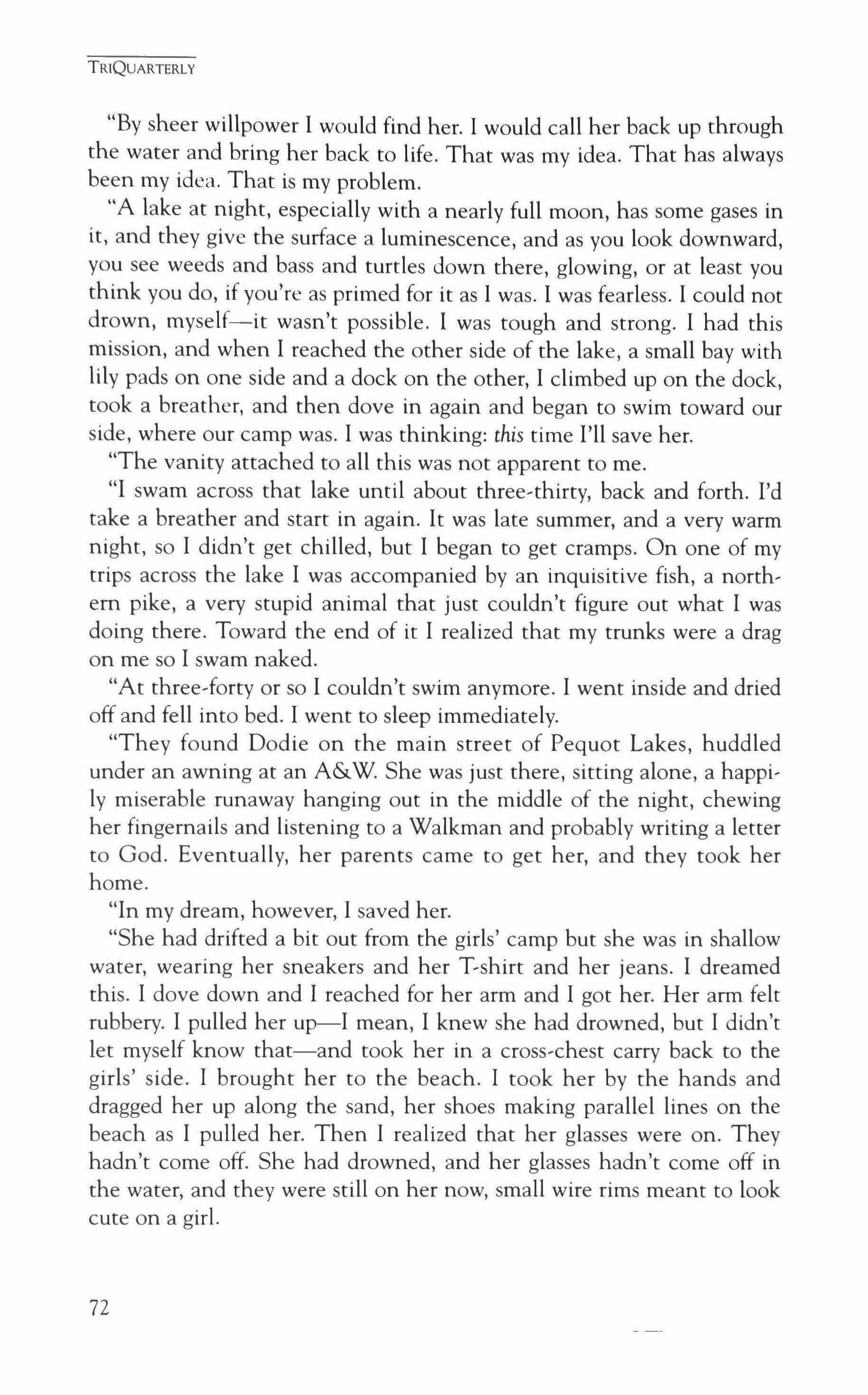
"By sheer willpower I would find her. I would call her back up through the water and bring her back to life. That was my idea. That has always been my idea. That is my problem.
"A lake at night, especially with a nearly full moon, has some gases in it, and they give the surface a luminescence, and as you look downward, you see weeds and bass and turtles down there, glowing, or at least you think you do, if you're as primed for it as I was. I was fearless. I could not drown, myself-it wasn't possible. I was tough and strong. I had this mission, and when I reached the other side of the lake, a small bay with lily pads on one side and a dock on the other, I climbed up on the dock, took a breather, and then dove in again and began to swim toward our side, where our camp was. I was thinking: this time I'll save her.
"The vanity attached to all this was not apparent to me.
"I swam across that lake until about three-thirty, back and forth. I'd take a breather and start in again. It was late summer, and a very warm night, so I didn't get chilled, but I began to get cramps. On one of my trips across the lake I was accompanied by an inquisitive fish, a north, em pike, a very stupid animal that just couldn't figure out what I was doing there. Toward the end of it I realized that my trunks were a drag on me so I swam naked.
"At three-forty or so I couldn't swim anymore. I went inside and dried off and fell into bed. I went to sleep immediately.
"They found Dodie on the main street of Pequot Lakes, huddled under an awning at an A&W. She was just there, sitting alone, a happily miserable runaway hanging out in the middle of the night, chewing her fingernails and listening to a Walkman and probably writing a letter to God. Eventually, her parents came to get her, and they took her home.
"In my dream, however, I saved her.
"She had drifted a bit out from the girls' camp but she was in shallow water, wearing her sneakers and her T,shirt and her jeans. I dreamed this. I dove down and I reached for her arm and I got her. Her arm felt rubbery. I pulled her up-I mean, I knew she had drowned, but I didn't let myself know that-and took her in a cross-chest carry back to the girls' side. I brought her to the beach. I took her by the hands and dragged her up along the sand, her shoes making parallel lines on the beach as I pulled her. Then I realized that her glasses were on. They hadn't come off. She had drowned, and her glasses hadn't come off in the water, and they were still on her now, small wire rims meant to look cute on a girl.
TRIQUARTERLY
72
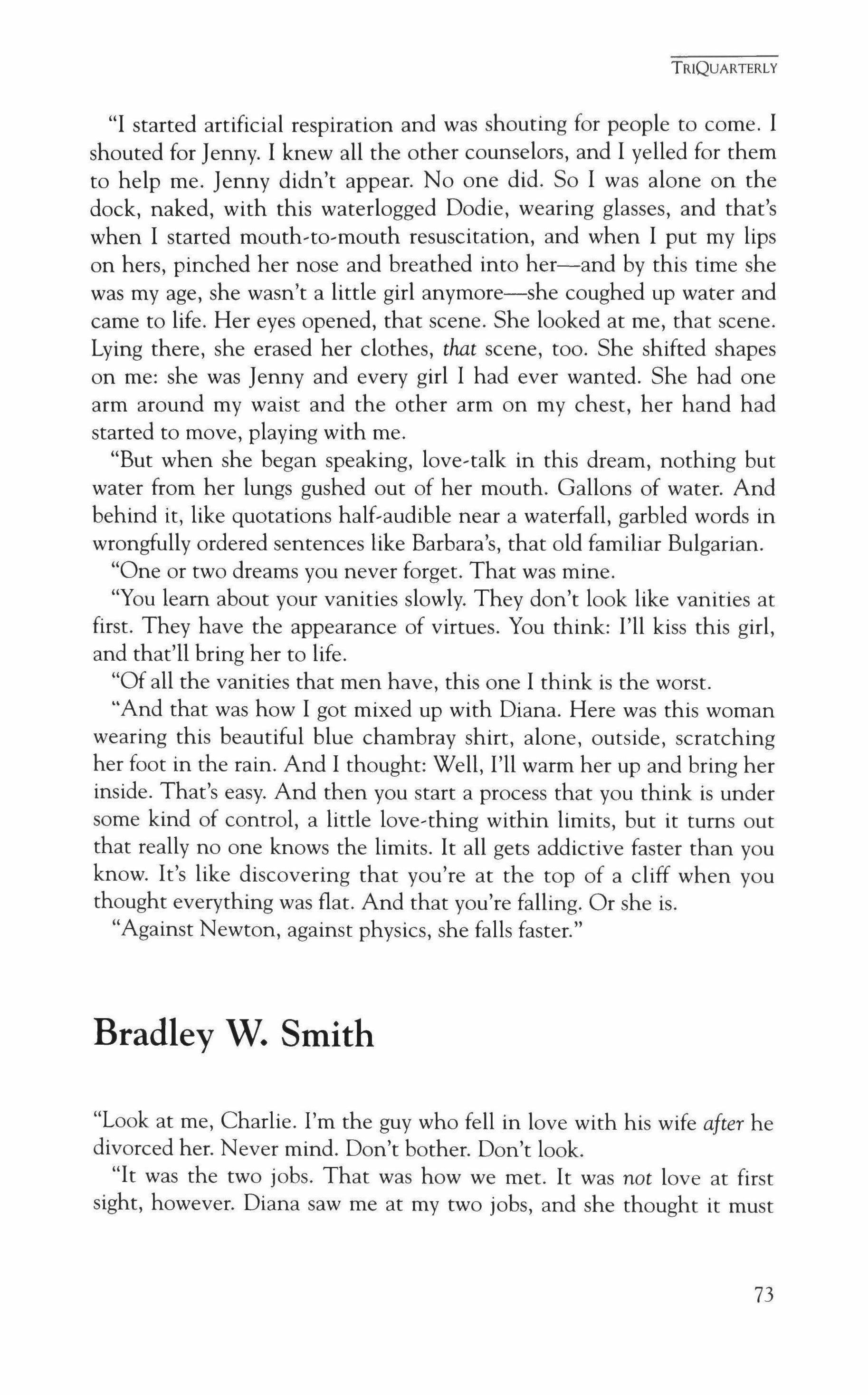
"I started artificial respiration and was shouting for people to come. I shouted for Jenny. I knew all the other counselors, and I yelled for them to help me. Jenny didn't appear. No one did. So 1 was alone on the dock, naked, with this waterlogged Dodie, wearing glasses, and that's when 1 started mouth-to-mouth resuscitation, and when 1 put my lips on hers, pinched her nose and breathed into her-and by this time she was my age, she wasn't a little girl anymore-she coughed up water and came to life. Her eyes opened, that scene. She looked at me, that scene. Lying there, she erased her clothes, that scene, too. She shifted shapes on me: she was Jenny and every girl I had ever wanted. She had one arm around my waist and the other arm on my chest, her hand had started to move, playing with me.
"But when she began speaking, love-talk in this dream, nothing but water from her lungs gushed out of her mouth. Gallons of water. And behind it, like quotations half-audible near a waterfall, garbled words in wrongfully ordered sentences like Barbara's, that old familiar Bulgarian.
"One or two dreams you never forget. That was mine.
"You learn about your vanities slowly. They don't look like vanities at first. They have the appearance of virtues. You think: I'll kiss this girl, and that'll bring her to life.
"Of all the vanities that men have, this one 1 think is the Worst.
"And that was how I got mixed up with Diana. Here was this woman wearing this beautiful blue chambray shirt, alone, outside, scratching her foot in the rain. And 1 thought: Well, I'll warm her up and bring her inside. That's easy. And then you start a process that you think is under some kind of control, a little love-thing within limits, but it turns out that really no one knows the limits. It all gets addictive faster than you know. It's like discovering that you're at the top of a cliff when you thought everything was flat. And that you're falling. Or she is.
"Against Newton, against physics, she falls faster."
Bradley W. Smith
"Look at me, Charlie. I'm the guy who fell in love with his wife after he divorced her. Never mind. Don't bother. Don't look.
"It was the two jobs. That was how we met. It was not love at first sight, however. Diana saw me at my two jobs, and she thought it must
TRIQUARTERLY
73
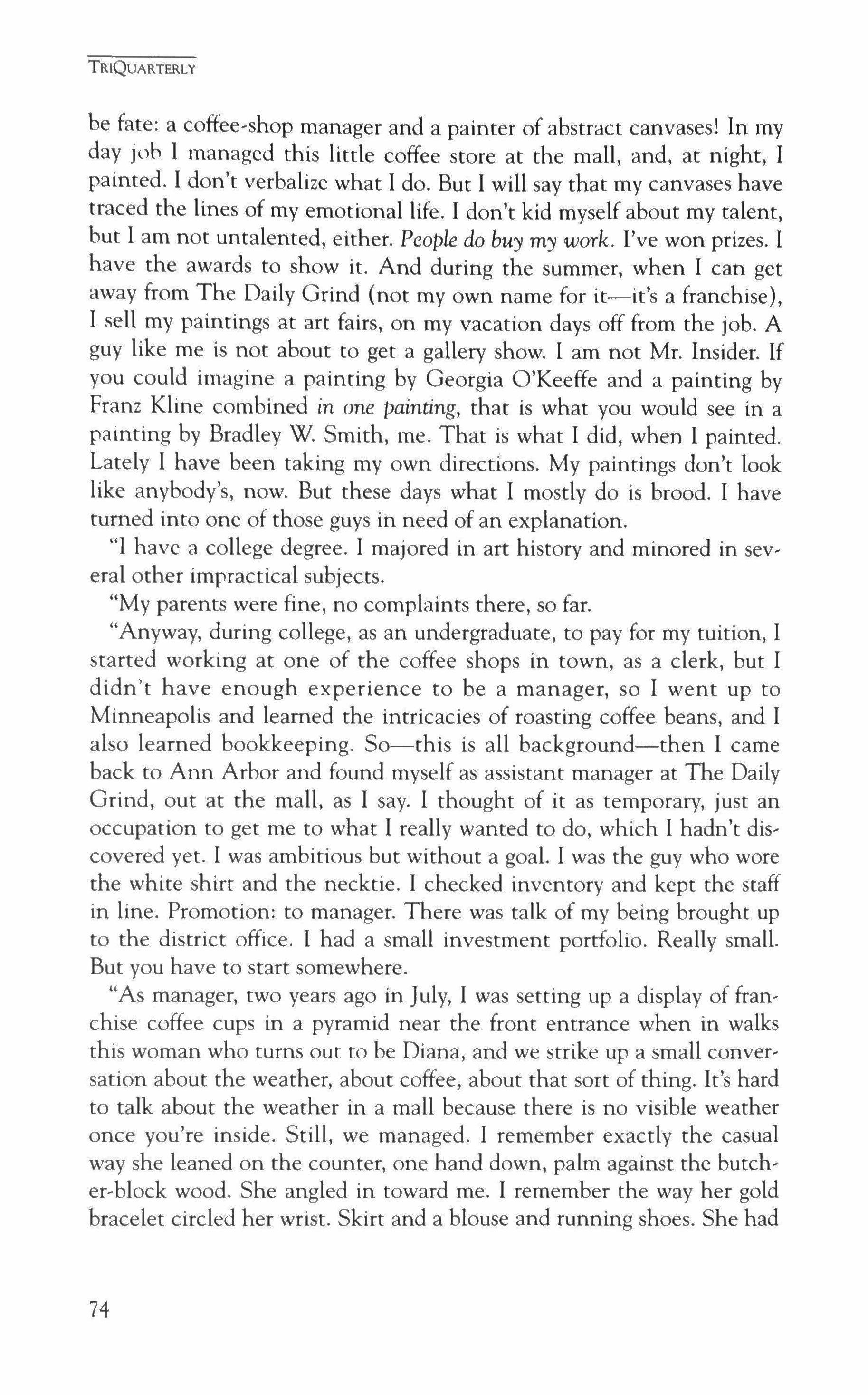
be fate: a coffee-shop manager and a painter of abstract canvases! In my day jon I managed this little coffee store at the mall, and, at night, I painted. I don't verbalize what I do. But I will say that my canvases have traced the lines of my emotional life. I don't kid myself about my talent, but I am not untalented, either. People do buy my work. I've won prizes. I have the awards to show it. And during the summer, when I can get away from The Daily Grind {not my own name for it-it's a franchise}, I sell my paintings at art fairs, on my vacation days off from the job. A guy like me is not about to get a gallery show. I am not Mr. Insider. If you could imagine a painting by Georgia O'Keeffe and a painting by Franz Kline combined in one painting, that is what you would see in a painting by Bradley W. Smith, me. That is what I did, when I painted. Lately I have been taking my own directions. My paintings don't look like anybody's, now. But these days what I mostly do is brood. I have turned into one of those guys in need of an explanation.
"I have a college degree. I majored in art history and minored in several other impractical subjects.
"My parents were fine, no complaints there, so far.
"Anyway, during college, as an undergraduate, to pay for my tuition, I started working at one of the coffee shops in town, as a clerk, but I didn't have enough experience to be a manager, so I went up to Minneapolis and learned the intricacies of roasting coffee beans, and I also learned bookkeeping. So-this is all background-then I came back to Ann Arbor and found myself as assistant manager at The Daily Grind, out at the mall, as I say. I thought of it as temporary, just an occupation to get me to what I really wanted to do, which I hadn't discovered yet. I was ambitious but without a goal. I was the guy who wore the white shirt and the necktie. I checked inventory and kept the staff in line. Promotion: to manager. There was talk of my being brought up to the district office. I had a small investment portfolio. Really small. But you have to start somewhere.
"As manager, two years ago in July, I was setting up a display of franchise coffee cups in a pyramid near the front entrance when in walks this woman who turns out to be Diana, and we strike up a small conversation about the weather, about coffee, about that sort of thing. It's hard to talk about the weather in a mall because there is no visible weather once you're inside. Still, we managed. I remember exactly the casual way she leaned on the counter, one hand down, palm against the butcher-block wood. She angled in toward me. I remember the way her gold bracelet circled her wrist. Skirt and a blouse and running shoes. She had
TRIQUARTERLY
74

a perfumy scent of lemons. A slender, elegant woman. 1 wanted to cornpliment her for some aspect of her appearance, so 1 said 1 liked the color of her yes. 1 meant 'eyes' but 1 said 'yes.' She was pleased by my quality of dazed friendliness.
"And the very next week happened to be the week of the Street Art Fair, and she walked into my booth and started looking at my paintings. She stood gazing at Synergy #4 and my calendar painting, Six Days of Sunshine. And then she said, 'I really admire the strong forceful lines in your paintings.' Strong, forceful lines. You could interpret that, and 1 did, as a compliment and as an opening move, a verbal flirtation. She didn't buy anything, but we talked again, and 1 almost reminded her of when we met at the mall, but 1 didn't, feeling that it would be a misstep. We talked about abstraction, how a painter can paint an abstract bam, an abstract silo.
"You want thumbnail? Light brown hair, high cheekbones, big wide blue eyes and a strong chin. Medium height. Pretty. She doesn't think she's pretty, but she is. She'll tell you that her hands are pretty, but that's all. That's one of her little fallacies about the physical body. She says it all the time. She fishes for compliments. She smiles slightly when she says it. It's her voice-that's where her beauty is, that, and the way she grins. She'll come up to you, this light step, real serious in her expression, like she's from Bulgaria or somewhere, and then she'll break unexpectedly into a smile, with a high laugh, when you're not expecting it, and that laugh is like a promise. On one of our first dates, she watched me paint in my basement studio. Sometimes she'd bring a book, John le Carre or Jane Austen. She'd hum along to the radio, exactly on pitch.
"We went to the movies, then 1 invited her up north, one of those resorts near Lake Superior, where we went picking raspberries in late August. We got along. 1 was attracted to her. It was bumpy sometimes, 1 won't say it wasn't. After we had sex, for example, she would look at me ironically.
"All the same, we were married. You think everything can be ironed out eventually. Our families got along, and our friends thought we were a good match. I could make her laugh. 1 have a huge repertoire of jokes. My favorite character is Sad Sack.
"Nineteen months later, we were divorced. It had been grim, our living together, lonely strangers trying to find topics of conversation through those long weekend afternoons and lying-wide-awake nights. Nothing in common, so to speak, no spark, and eventually the nastiness you get when you have a collection of incompatibles. I was lonelier with 75
TRIQUARTERLY

her than I had ever been by myself. I'd go in the garage and work on something with my tools, or I'd paint. Having a cat didn't help. Getting drunk didn't help. Getting stoned didn't help. The divorce wasn't as bad as some of them are, because we didn't have kids. But we were lonely together, and I felt marooned. I was adrift in the rowboat of my life. I painted that. I painted the way the sky looks, when you're adrift. Sky Study #1, which hasn't sold yet. That's one of my abstract paintings about divorce.
"I can't remember which one of us, Diana or me, brought up the subject of divorce. It was a collaborative idea, our very first one.
"This is where my story begins. My story begins after Diana and I were divorced. Everything up to here is background.
"The summer after the divorce was finalized, I walked around town all the time. I am not a jogger. I disapprove of the jogger lifestyle. I mean, there are even fashions that go with it. All that spandex, for example. I object to the merchandising. But I did like to walk, watching the light, those nights when I didn't schedule myself at The Daily Grind, and when I didn't feel like working on my paintings and when I didn't care to read a book. Sometimes I would walk with my neighbor, Ginzburg, but he talks too much, especially about philosophy. He knocks at my door, Ginzburg, asking me to accompany him. I did at first, until the philosophy got to me. So I would generally take these walks by myself, sneaking out to avoid detection by Ginzburg, who I think peers through the blinds from his house across the street. My buddy Lewis sometimes came over after summer softball, still in uniform, and we'd drink beer and talk about what was on our minds. He was trying to recruit me for his softball team: they needed a good shortstop. But walking alone, I have found, is the best cure for post-divorce melancholy, better than team sports. I had thought about acquiring a dog but had spent months visiting kennels and reading breeders' books trying to settle on what kind of dog and had yet to make up my mind. I would have to leave the dog at home for several hours at a time, and she (it would be a she) would have to be relaxed about my painting and not get jealous. Also, I had bought a guitar and was trying to learn to play it. I made household repairs. Some nights I would drive into Detroit to Tiger Stadium to watch the Tigers lose. I am somewhat scattered. I read Business Week and Art Forum. I stayed busy, which is best.
"And finally there were the German tapes and the French tapes that I listened to, for a planned trip to Europe. I wanted to see the Durers and
TRIQUARTERLY
76

the Cezannes. I had resolved to stay occupied. I wasn't ready to start dating again, although a few women had called me, dropping hints.
"I feel that I am a little bit of a shmuck but that I am lovable. That is Ginzburg's opinion. That's what he told me once, and 1 have come around to that view of myself.
"You would be glad to meet me. Most people are. They say: that Brad, he sure is a cheerful guy. I am the smiling man on Monday morning. 1 rarely lose my temper. That is even before they know about my painting. 1 could make you laugh. I leave a good impression.
"My story begins on one of these nights when 1 was walking around town. 1 wasn't feeling too bad. This song, 'My Funny Valentine,' as sung by Ella Fitzgerald, was going through my head as 1 walked. 1 always liked her; I liked it that she sang jazz while wearing glasses. 1 came to Allmendinger Park. There was just enough light to see by, Magritte light. These guys were playing basketball, as per usual. And there, next to the basketball hoops, there was a bench, and on this bench was of all people my ex-wife, Diana. Of course 1 knew she hadn't moved out of town. However, she had changed her hair color. She looked like she'd dipped it in blond ink or something. She looked nice. She was sitting on the bench with her legs out in front of her and her arms crossed just under her breasts. 1 watched her as she slapped at a mosquito. Her legs looked prettier than 1 remembered them.
"I was about to call out to her, you know, just to say hi, because what's the harm, when 1 saw that she was watching some guys playing, and she was studying one particular guy. Just a guy. He was playing basketball as it got dark.
"After ten minutes, it was too dark, and they stopped playing. And this guy came over to where she was, and Diana stood up, and he put his arm around her shoulders, and she put her arm around his waist, and they started walking toward his car, that way, his arm around her shoulder, her arm around his waist. It couldn't have taken more than fifteen seconds for them to get to that car. But 1 will remember how they looked all my life.
"It's funny how you can tell when people are in love.
"They passed under one of those streetlights they have near the parking area. And 1 saw Diana clearly, leaning into this fellow, her head bent to the left so it was resting on his shoulder, and this insane thing happened. 1 felt this punch in my stomach. Standing there, across the street, in the shadows, by myself, 1 felt this punch in my stomach.
"I could see instantly what 1 had missed all along. That she was beauti-
TRIQUARTERLY
77

ful in a way I hadn't noticed before. Suddenly I missed her lazy manner of reading the newspaper aloud on Sunday morning and I missed the way she said goodnight by whispering it and I missed everything about her. I remembered the way she blew the bangs away from her forehead by jutting her lower lip outward and blowing a stream of air upward. Sick with memory, I was in love with my now ex-wife Diana for the first time. About two or three years too late, Cupid's arrow went through my heart.
"They got in the car and this time she put her hand on his chest and started kissing him. They kissed for a while. I should have turned away. I tried.
"A firetruck went by a few blocks away, howling.
"I went home and couldn't sleep. It occurred to me for the first time that I had smashed up my life with a hammer.
"The job at The Daily Grind became a different job.
"Couples would come in, hand in hand, arm in arm. They'd order a pound of coffee or they'd order decaf cappuccino, and they'd go over to one of our tables and sit down and talk, leaning toward each other, their knees touching. I had never paid attention before. Couples are couples. But now it's the feast of love, a phrase that Diana used to use, ironically I always thought, and I realize that I've never been invited to the table. The mere sight of happiness now makes me groan inwardly. Because I'm thinking of Diana, now I know what I'm missing. I'm thinking of Diana with that guy. But then I'm thinking of Diana with me. And I think: I would do it better this time, if I had the chance.
"What was I doing before? What dream world was I in? How could I have ignored her?
"Now, when I walked in the parks, all I saw were couples. At intersections I would find myself behind couples necking in the back seat, or some woman next to a guy in the front. I would watch. I would see her toying with the back of his neck. Twirling her fingers there. Playing with the little curls. Sometimes I'd see people smiling for no reason. Just smiling. Happy with life.
"It helps that in Michigan everyone goes inside from November through April. But from May until August they are outside, strutting and on display, and all of a sudden if you are single, you have a window to heaven and no way at all to get in.
"My attitude toward my art changed. Now, I didn't paint my canvases; instead I vandalized them. Ginzburg came over one evening and said, 'I have heard of action painting but this is new. This is devastation paint-
TRIQUARTERLY
78
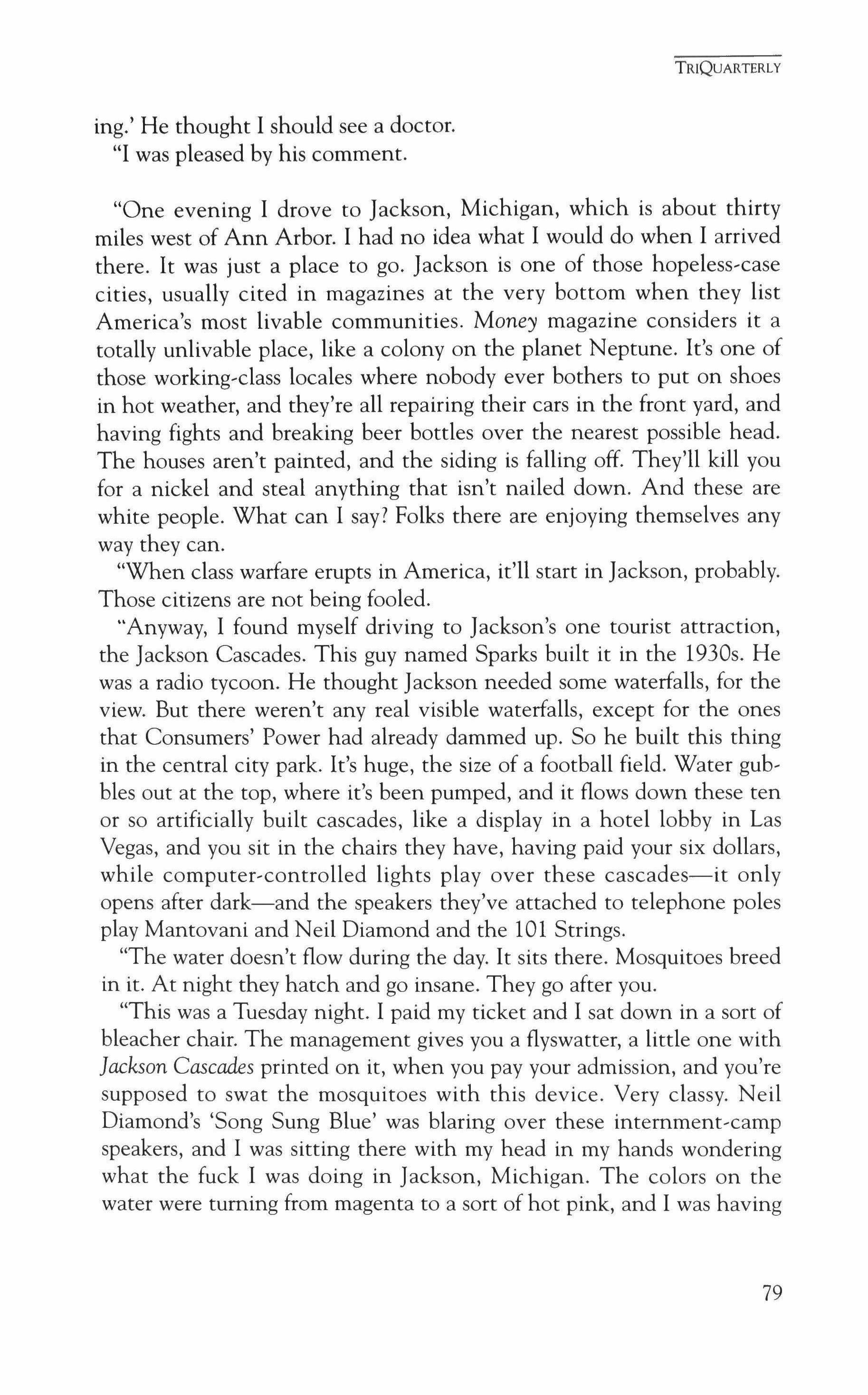
ing.' He thought I should see a doctor.
"I was pleased by his comment.
"One evening I drove to Jackson, Michigan, which is about thirty miles west of Ann Arbor. I had no idea what I would do when I arrived there. It was just a place to go. Jackson is one of those hopeless-case cities, usually cited in magazines at the very bottom when they list America's most livable communities. Money magazine considers it a totally unlivable place, like a colony on the planet Neptune. It's one of those working-class locales where nobody ever bothers to put on shoes in hot weather, and they're all repairing their cars in the front yard, and having fights and breaking beer bottles over the nearest possible head. The houses aren't painted, and the siding is falling off. They'll kill you for a nickel and steal anything that isn't nailed down. And these are white people. What can I say? Folks there are enjoying themselves any way they can.
"When class warfare erupts in America, it'll start in Jackson, probably. Those citizens are not being fooled.
"Anyway, I found myself driving to Jackson's one tourist attraction, the Jackson Cascades. This guy named Sparks built it in the 1930s. He was a radio tycoon. He thought Jackson needed some waterfalls, for the view. But there weren't any real visible waterfalls, except for the ones that Consumers' Power had already dammed up. So he built this thing in the central city park. It's huge, the size of a football field. Water gubbles out at the top, where it's been pumped, and it flows down these ten or so artificially built cascades, like a display in a hotel lobby in Las Vegas, and you sit in the chairs they have, having paid your six dollars, while computer-controlled lights play over these cascades-it only opens after dark-and the speakers they've attached to telephone poles play Mantovani and Neil Diamond and the 101 Strings.
"The water doesn't flow during the day. It sits there. Mosquitoes breed in it. At night they hatch and go insane. They go after you.
"This was a Tuesday night. I paid my ticket and I sat down in a sort of bleacher chair. The management gives you a flyswatter, a little one with Jackson Cascades printed on it, when you pay your admission, and you're supposed to swat the mosquitoes with this device. Very classy. Neil Diamond's 'Song Sung Blue' was blaring over these internment-camp speakers, and I was sitting there with my head in my hands wondering what the fuck I was doing in Jackson, Michigan. The colors on the water were turning from magenta to a sort of hot pink, and I was having
TRIQUARTERLY
79

this insight that my parents had let me loose in the world without explaining anything of importance to me. Down below me were some families, likewise sitting, likewise watching this spectacle but perkier than I was. One child wearing Oshkosh overalls was running in widening circles. He was yelling, 'I'm gonna explode!' I nodded at him. O.K. with me, kid. You just explode right there. I'm watching, and I've got a good view.
"The music switched to Mantovani, this string slop, pouring molasses over hapless George Gershwin.
"In front of me this picture-perfect high-school couple was sitting on a bench. He looked a little bit like the guy that Diana was seeing, and she looked a tiny bit like Diana. They were talking. Then they were kissing. Everywhere I went I saw people kissing. It was like this conspiracy. These two were holding hands, and with the hand that was free, she was swatting mosquitoes on his back, and he was swatting mosquitoes on hers.
"This I found unbearable. Another couple in love, this time at the Jackson Cascades, swatting mosquitoes off each other's backs, and they both look dirt poor, knowing the system is rigged against them, and they don't care, because they're both drugged with amour.
"I felt a sort of energetic, visionary despair.
"I raced back toward my car. I rushed home. I was arrested for speeding. I was traveling eighty-five miles an hour on 1-94. I was given a breath test. Sober sober sober. Oh, I am a sober man, and the state trooper wrote me a ticket to confirm my sober crime.
"Back in Ann Arbor, in the small house on the west side where Diana and I once lived together in our mutual loneliness and unhappiness, and where I now live by myself, I walked into the kitchen and turned on the overhead fluorescent light. It snaps at you when you do that, before it begins to shower glare and that flickering corpse-blue illumination on the sink and the Formica counter and the red dish drainer.
"I sat down. My head was full of wild ambitious urges to hurt myself. I felt the ambrosia of maddened impulse. I wanted my interior pain out in my body somehow. I wanted this vague pain to become specific. That's how I explain it.
"I took out my sharpest knife and cut off the tip of my little finger. On my left hand."
He holds it up for inspection.
TRIQUARTERLY
80
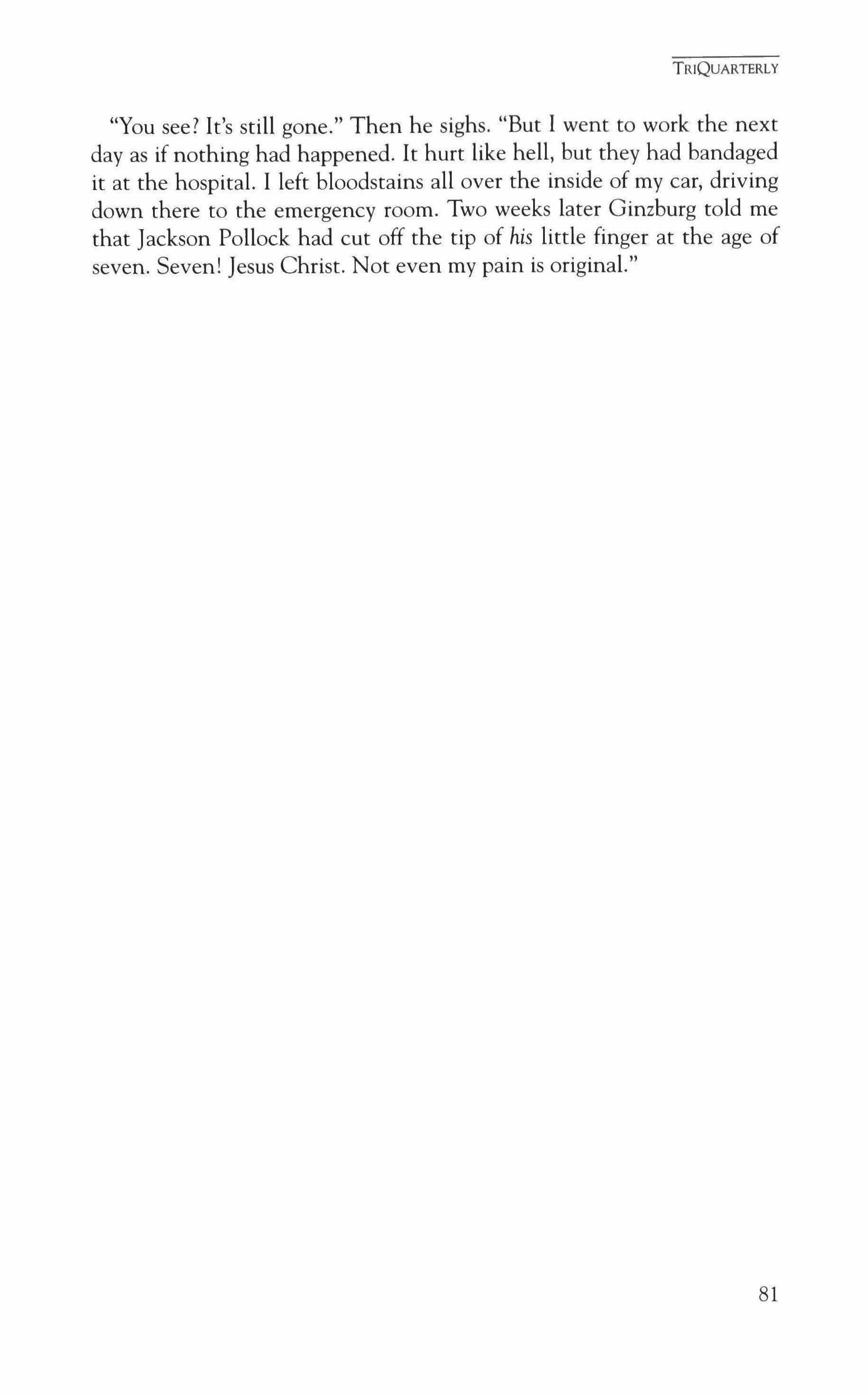
"You see? It's still gone." Then he sighs. "But I went to work the next day as if nothing had happened. It hurt like hell, but they had bandaged it at the hospital. I left bloodstains all over the inside of my car, driving down there to the emergency room. Two weeks later Ginzburg told me that Jackson Pollock had cut off the tip of his little finger at the age of seven. Seven! Jesus Christ. Not even my pain is original."
TRIQUARTERLY
81
To China
Leigh Buchanan Bienen

June 10, 1985
Hotel Okura, Tokyo
B. scheduled two days in Tokyo to pick up the materials for the production that we wouldn't be able to get in China. Extra electronic parts, duplicate sound equipment, fabrics. The flight was twelve hours. Narita is still the cleanest airport in the world. When we landed a high pitched female voice on the loudspeaker asked very politely, again and again, for anyone with a rash or a skin ailment or cough or fever to report please to the quarantine authorities. Two years ago it was the symptoms for toxic shock.
I'm glad for the two-day layover. I am exhausted. If the commitment hadn't been made two years ago, I am not sure I would have come. I never quite recovered from the flu this spring, and I did hate to leave you. Did I say how much I love the little silver clock with the jumping fish on the top? Every time I change the time, which will be often in the next six weeks, I will think of you. It nestles in my hand very comfortably.
It is a great privilege to work with B. again, although he is as impossible as ever. On the twelve hour flight he didn't stop talking for ten minutes. He talked all the way to San Francisco, straight through the two dreadful movies shown back to back, and up to the inedible American breakfast served just before landing. Finally, I started ordering brandy. Now I'm paying for it, by having to stay in the hotel room with a bad stomach. You've heard all the stories before, and so have I. The three wives. How each betrayed him. Still, he is a genius. Then, after the wives, his work. Now the critics just shower praise on him because of his past success. He can't trust anyone to give him honest criticism. That's
TiUQUARTERLY
82
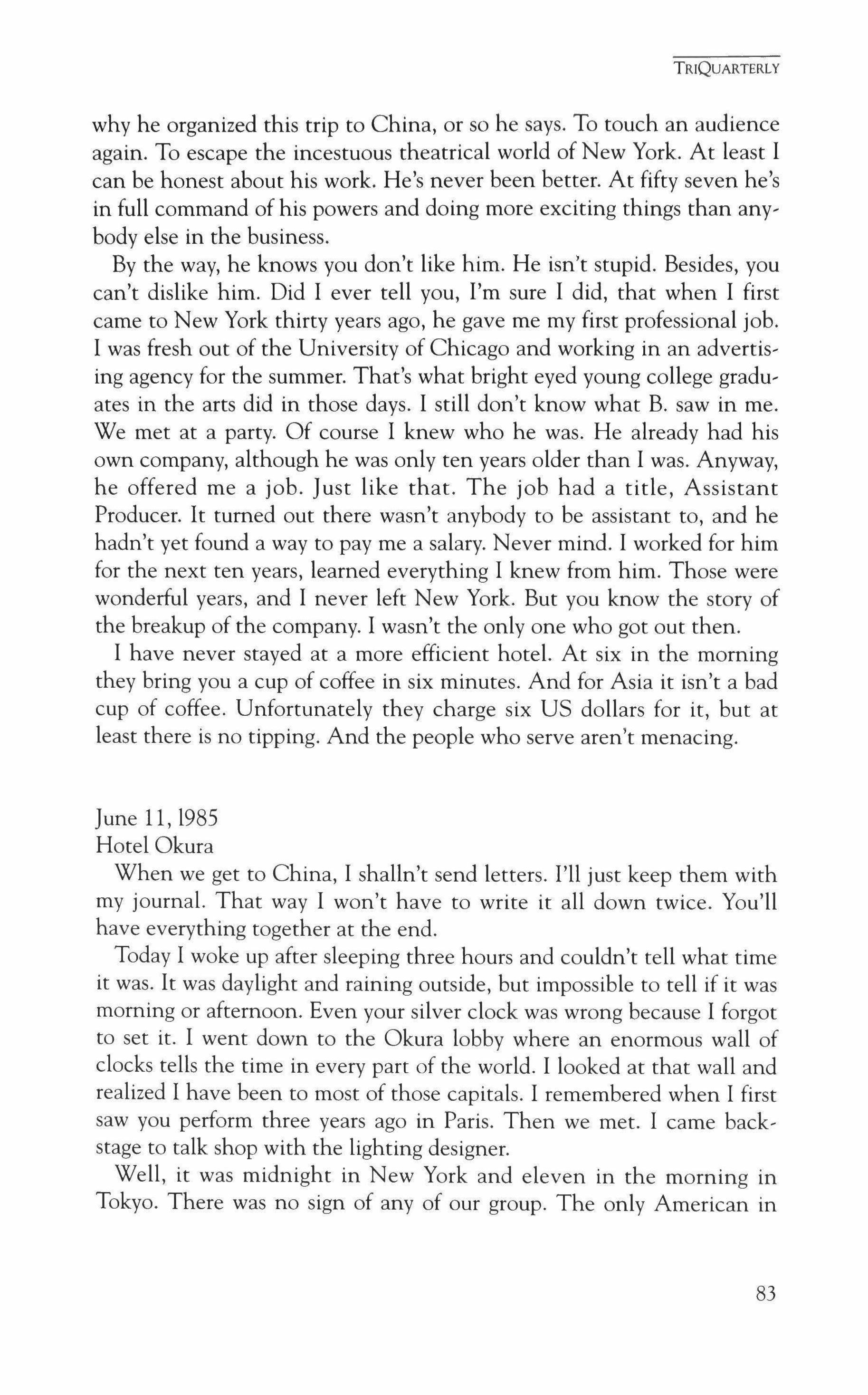
why he organized this trip to China, or so he says. To touch an audience again. To escape the incestuous theatrical world of New York. At least I can be honest about his work. He's never been better. At fifty seven he's in full command of his powers and doing more exciting things than any' body else in the business.
By the way, he knows you don't like him. He isn't stupid. Besides, you can't dislike him. Did I ever tell you, I'm sure I did, that when I first came to New York thirty years ago, he gave me my first professional job. I was fresh out of the University of Chicago and working in an advertising agency for the summer. That's what bright eyed young college graduates in the arts did in those days. I still don't know what B. saw in me. We met at a party. Of course I knew who he was. He already had his own company, although he was only ten years older than I was. Anyway, he offered me a job. Just like that. The job had a title, Assistant Producer. It turned out there wasn't anybody to be assistant to, and he hadn't yet found a way to pay me a salary. Never mind. I worked for him for the next ten years, learned everything I knew from him. Those were wonderful years, and I never left New York. But you know the story of the breakup of the company. I wasn't the only one who got out then. I have never stayed at a more efficient hotel. At six in the morning they bring you a cup of coffee in six minutes. And for Asia it isn't a bad cup of coffee. Unfortunately they charge six US dollars for it, but at least there is no tipping. And the people who serve aren't menacing.
June 11,1985
Hotel Okura
When we get to China, I shalln't send letters. I'll just keep them with my journal. That way I won't have to write it all down twice. You'll have everything together at the end.
Today I woke up after sleeping three hours and couldn't tell what time it was. It was daylight and raining outside, but impossible to tell if it was morning or afternoon. Even your silver clock was wrong because I forgot to set it. I went down to the Okura lobby where an enormous wall of clocks tells the time in every part of the world. I looked at that wall and realized I have been to most of those capitals. I remembered when I first saw you perform three years ago in Paris. Then we met. I came back, stage to talk shop with the lighting designer.
Well, it was midnight in New York and eleven in the morning in Tokyo. There was no sign of any of our group. The only American in 83
TRIQUARTERLY
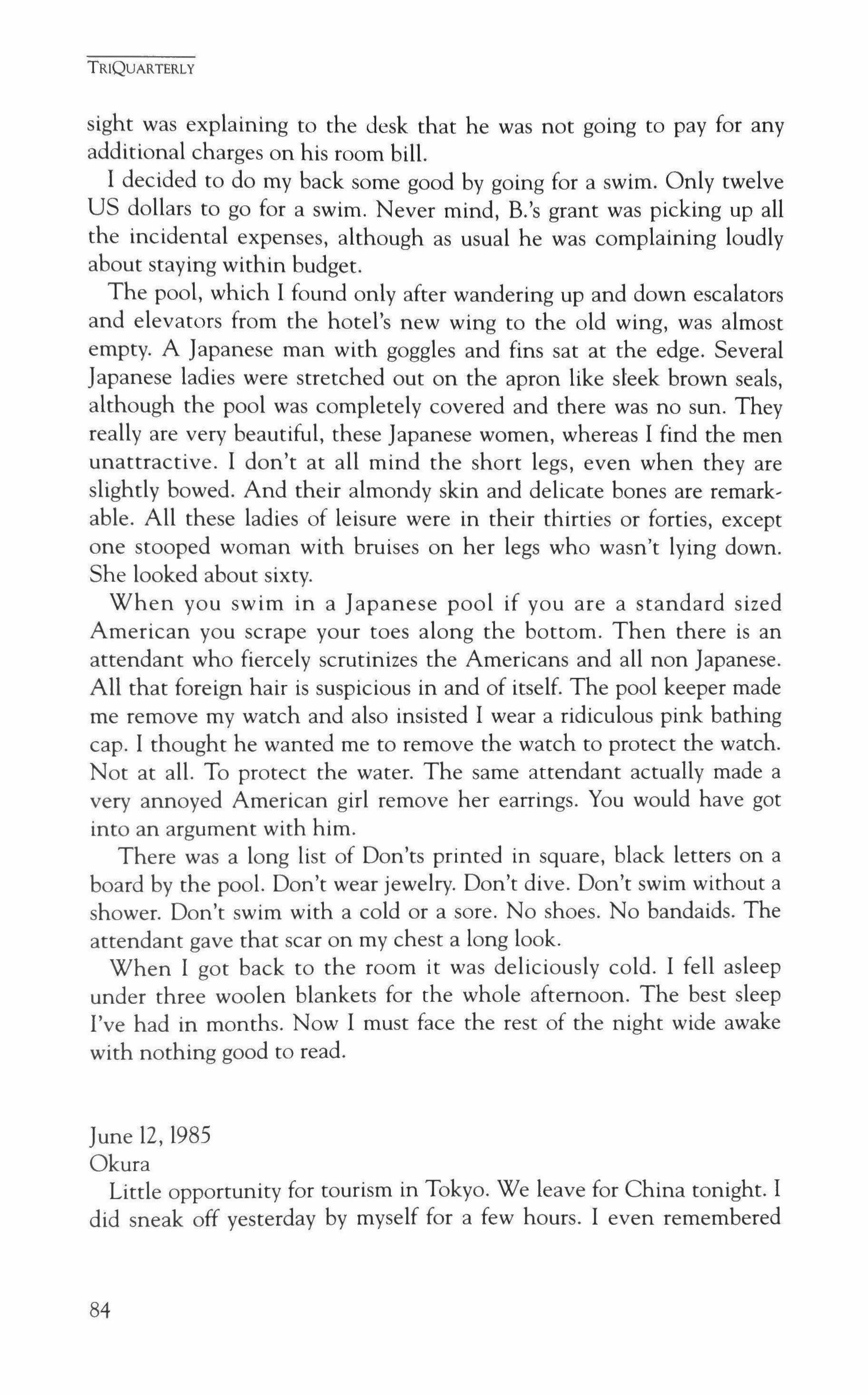
sight was explaining to the desk that he was not going to pay for any additional charges on his room bill.
I decided to do my back some good by going for a swim. Only twelve US dollars to go for a swim. Never mind, B.'s grant was picking up all the incidental expenses, although as usual he was complaining loudly about staying within budget.
The pool, which I found only after wandering up and down escalators and elevators from the hotel's new wing to the old wing, was almost empty. A Japanese man with goggles and fins sat at the edge. Several Japanese ladies were stretched out on the apron like sleek brown seals, although the pool was completely covered and there was no sun. They really are very beautiful, these Japanese women, whereas I find the men unattractive. I don't at all mind the short legs, even when they are slightly bowed. And their almondy skin and delicate bones are remarkable. All these ladies of leisure were in their thirties or forties, except one stooped woman with bruises on her legs who wasn't lying down. She looked about sixty.
When you swim in a Japanese pool if you are a standard sized American you scrape your toes along the bottom. Then there is an attendant who fiercely scrutinizes the Americans and all non Japanese. All that foreign hair is suspicious in and of itself. The pool keeper made me remove my watch and also insisted I wear a ridiculous pink bathing cap. I thought he wanted me to remove the watch to protect the watch. Not at all. To protect the water. The same attendant actually made a very annoyed American girl remove her earrings. You would have got into an argument with him.
There was a long list of Don'ts printed in square, black letters on a board by the pool. Don't wear jewelry. Don't dive. Don't swim without a shower. Don't swim with a cold or a sore. No shoes. No bandaids. The attendant gave that scar on my chest a long look.
When I got back to the room it was deliciously cold. I fell asleep under three woolen blankets for the whole afternoon. The best sleep I've had in months. Now I must face the rest of the night wide awake with nothing good to read.
June 12, 1985
Okura
Little opportunity for tourism in Tokyo. We leave for China tonight. I did sneak off yesterday by myself for a few hours. I even remembered
TRIQUARTERLY
84
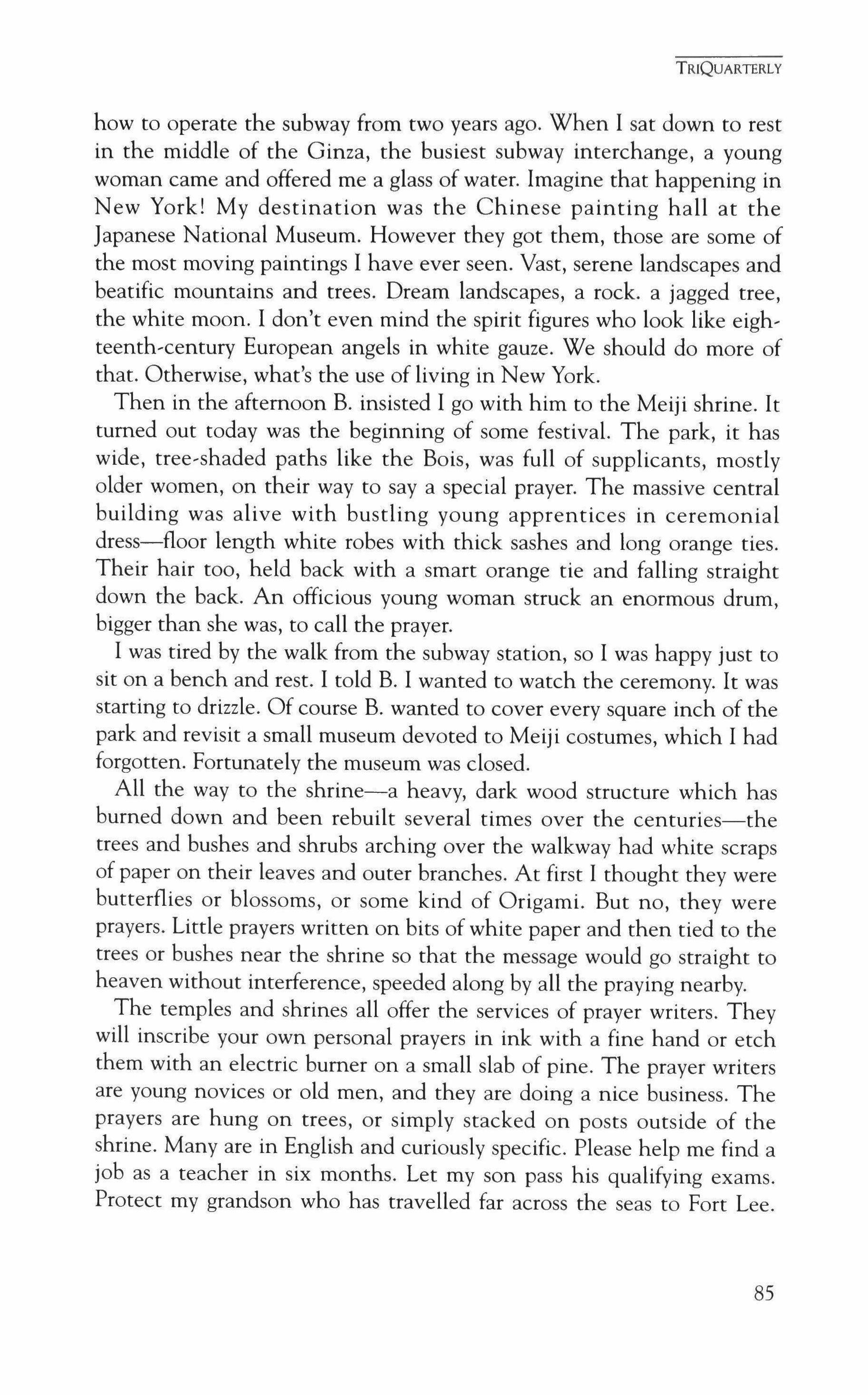
how to operate the subway from two years ago. When I sat down to rest in the middle of the Ginza, the busiest subway interchange, a young woman came and offered me a glass of water. Imagine that happening in New York! My destination was the Chinese painting hall at the Japanese National Museum. However they got them, those are some of the most moving paintings I have ever seen. Vast, serene landscapes and beatific mountains and trees. Dream landscapes, a rock. a jagged tree, the white moon. I don't even mind the spirit figures who look like eighteenth-century European angels in white gauze. We should do more of that. Otherwise, what's the use of living in New York.
Then in the afternoon B. insisted I go with him to the Meiji shrine. It turned out today was the beginning of some festival. The park, it has wide, tree-shaded paths like the Bois, was full of supplicants, mostly older women, on their way to say a special prayer. The massive central building was alive with bustling young apprentices in ceremonial dress-floor length white robes with thick sashes and long orange ties. Their hair too, held back with a smart orange tie and falling straight down the back. An officious young woman struck an enormous drum, bigger than she was, to call the prayer.
I was tired by the walk from the subway station, so I was happy just to sit on a bench and rest. I told B. I wanted to watch the ceremony. It was starting to drizzle. Of course B. wanted to cover every square inch of the park and revisit a small museum devoted to Meiji costumes, which I had forgotten. Fortunately the museum was closed.
All the way to the shrine-a heavy, dark wood structure which has burned down and been rebuilt several times over the centuries-the trees and bushes and shrubs arching over the walkway had white scraps of paper on their leaves and outer branches. At first I thought they were butterflies or blossoms, or some kind of Origami. But no, they were prayers. Little prayers written on bits of white paper and then tied to the trees or bushes near the shrine so that the message would go straight to heaven without interference, speeded along by all the praying nearby. The temples and shrines all offer the services of prayer writers. They will inscribe your own personal prayers in ink with a fine hand or etch them with an electric burner on a small slab of pine. The prayer writers are young novices or old men, and they are doing a nice business. The prayers are hung on trees, or simply stacked on posts outside of the shrine. Many are in English and curiously specific. Please help me find a job as a teacher in six months. Let my son pass his qualifying exams. Protect my grandson who has travelled far across the seas to Fort Lee.
TRIQUARTERLY
85

Let me recover from the stomach operation I had in November. I was raised a Catholic, so I distrust all organized religion. My mother, who never left the small town in Illinois where I was born, would have understood everything at the Meiji shrine. She would have lined up to buy a prayer, along with the few other foreigners, and cheerfully paid the going rate, on the theory that her God, a generic kindly wise man, would never take seriously the petty distinctions between religions. Dying in the hospital, kept alive on machines to suffer, she never indicated to me she doubted. But I vowed, never again. I learned to hate the nuns and doctors who kept her alive. Buddhist, Christian, Shinto, to God they were all the same. In her book there were good people and bad people. I don't think I ever told you I too was raised and educated as a Catholic. By Jesuits, no less.
Shanghai
June 13
Last night when we arrived Shanghai had just been cooled by a ferocious thunderstorm. We were delayed three hours in Narita because of weather. The five official greeters who had been sent to welcome B. waited for hours, but they didn't complain. B. was treated like an ambassador. At the height of the tourist season the Shanghai airport had three jets in it. Your tiny Caribbean island would have boasted more planes parked in its tourist port. Two attendants with hand-held flashlights led us across the shining tarmac. Some one took care of the bags and customs, thank God, because it was all I could do to smile, bow and shake hands. We drove through the sleeping city-there is nothing to do in China past nine 0' clock-in one of those Soviet style cars with the little white ruffled curtains on the back windows. So the riffraff can't peer in. The good thing about arriving at that late hour was, thank God, no traffic. There is so much construction on the Shanghai airport road it regularly takes two hours to drive twenty miles.
The Chinese have a curious habit of driving at night without headlights. As if they were saving the electricity. The explanation offered is that the headlights blind the cyclists. One of the Chinese interpreters could see I found this answer highly amusing. He's about your age, twenty five. Actually he's probably about ten years older, but he looks twenty five to a Westerner. His English is excellent, and he has visited both New York and London. When he saw me struggling to pronounce his name, he said, just call me Tom. He's stocky for a Chinese, this Chinese
TRIQUARTERLY
86
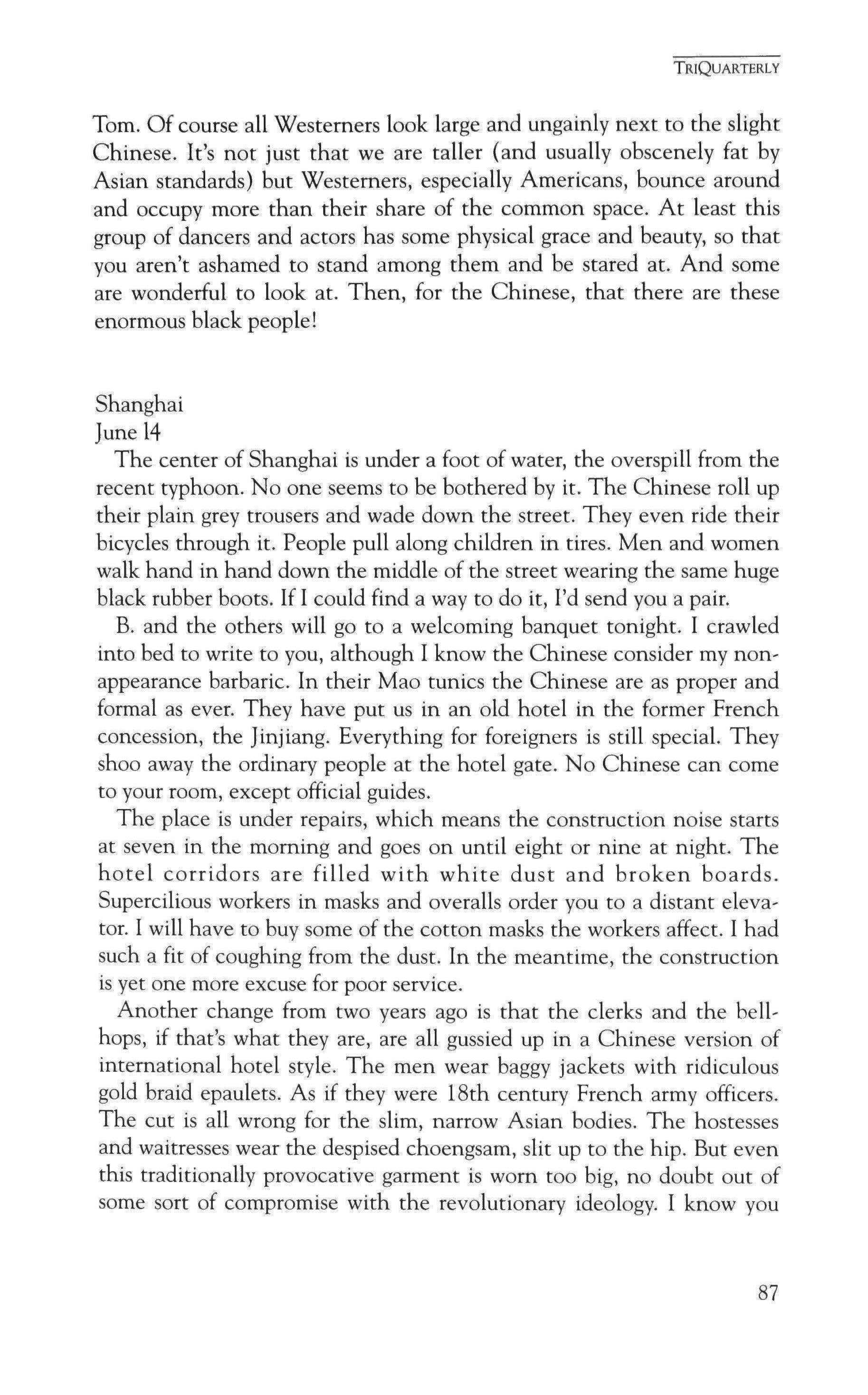
Tom. Of course all Westerners look large and ungainly next to the slight Chinese. It's not just that we are taller {and usually obscenely fat by Asian standards} but Westerners, especially Americans, bounce around and occupy more than their share of the common space. At least this group of dancers and actors has some physical grace and beauty, so that you aren't ashamed to stand among them and be stared at. And some are wonderful to look at. Then, for the Chinese, that there are these enormous black people!
Shanghai
June 14
The center of Shanghai is under a foot of water, the overspill from the recent typhoon. No one seems to be bothered by it. The Chinese roll up their plain grey trousers and wade down the street. They even ride their bicycles through it. People pull along children in tires. Men and women walk hand in hand down the middle of the street wearing the same huge black rubber boots. If I could find a way to do it, I'd send you a pair.
B. and the others will go to a welcoming banquet tonight. I crawled into bed to write to you, although I know the Chinese consider my nonappearance barbaric. In their Mao tunics the Chinese are as proper and formal as ever. They have put us in an old hotel in the former French concession, the Jinjiang. Everything for foreigners is still special. They shoo away the ordinary people at the hotel gate. No Chinese can come to your room, except official guides.
The place is under repairs, which means the construction noise starts at seven in the morning and goes on until eight or nine at night. The hotel corridors are filled with white dust and broken boards.
Supercilious workers in masks and overalls order you to a distant elevator. I will have to buy some of the cotton masks the workers affect. I had such a fit of coughing from the dust. In the meantime, the construction is yet one more excuse for poor service.
Another change from two years ago is that the clerks and the bellhops, if that's what they are, are all gussied up in a Chinese version of international hotel style. The men wear baggy jackets with ridiculous gold braid epaulets. As if they were 18th century French army officers. The cut is all wrong for the slim, narrow Asian bodies. The hostesses and waitresses wear the despised choengsam, slit up to the hip. But even this traditionally provocative garment is worn too big, no doubt out of some sort of compromise with the revolutionary ideology. I know you
TRIQUARTERLY
87
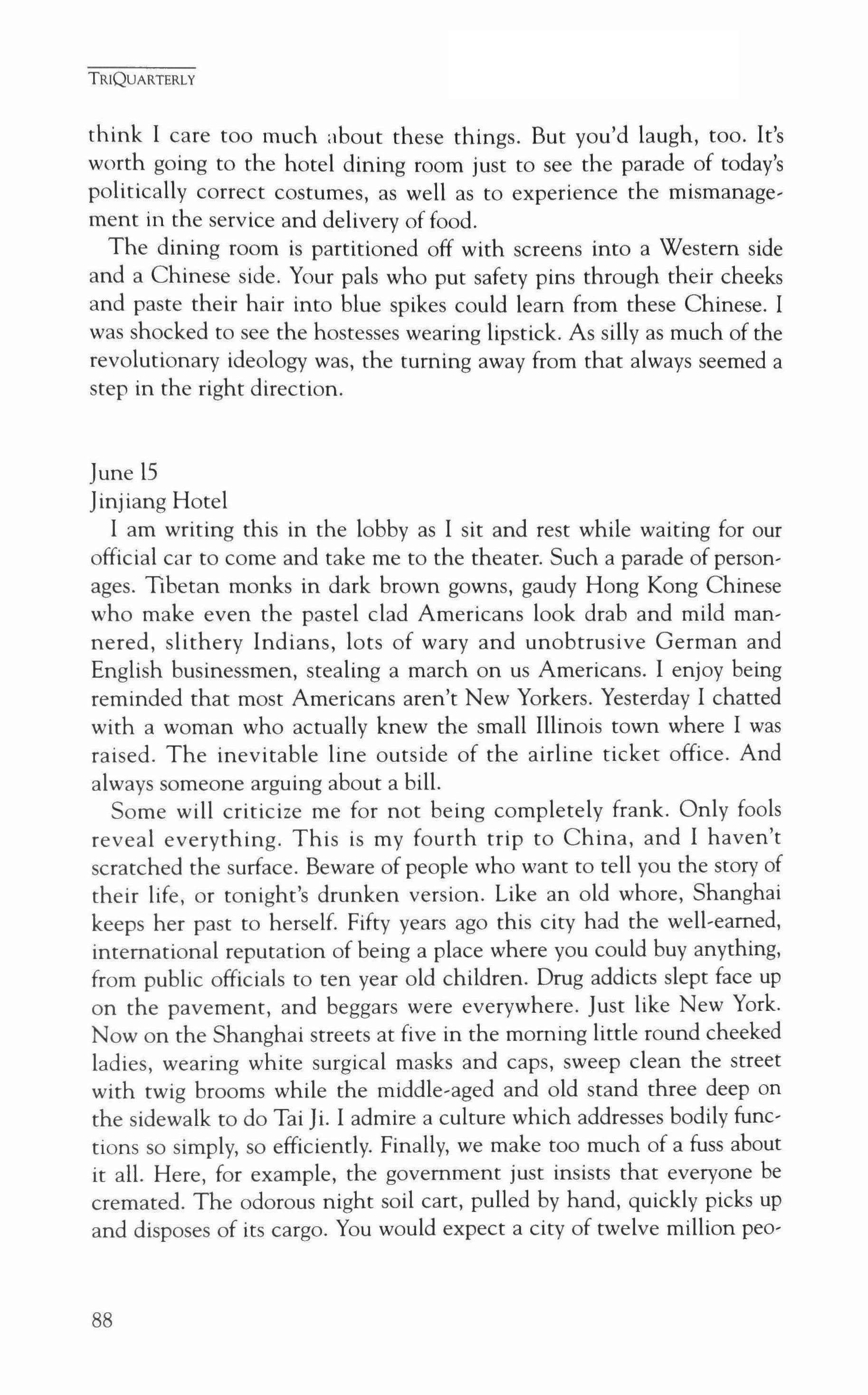
think I care too much about these things. But you'd laugh, too. It's worth going to the hotel dining room just to see the parade of today's politically correct costumes, as well as to experience the mismanagement in the service and delivery of food.
The dining room is partitioned off with screens into a Western side and a Chinese side. Your pals who put safety pins through their cheeks and paste their hair into blue spikes could learn from these Chinese. I was shocked to see the hostesses wearing lipstick. As silly as much of the revolutionary ideology was, the turning away from that always seemed a step in the right direction.
June 15
Jinjiang Hotel
I am writing this in the lobby as I sit and rest while waiting for our official car to come and take me to the theater. Such a parade of personages. Tibetan monks in dark brown gowns, gaudy Hong Kong Chinese who make even the pastel clad Americans look drab and mild mannered, slithery Indians, lots of wary and unobtrusive German and English businessmen, stealing a march on us Americans. I enjoy being reminded that most Americans aren't New Yorkers. Yesterday I chatted with a woman who actually knew the small Illinois town where I was raised. The inevitable line outside of the airline ticket office. And always someone arguing about a bill.
Some will criticize me for not being completely frank. Only fools reveal everything. This is my fourth trip to China, and I haven't scratched the surface. Beware of people who want to tell you the story of their life. or tonight's drunken version. Like an old whore, Shanghai keeps her past to herself. Fifty years ago this city had the well-earned, international reputation of being a place where you could buy anything, from public officials to ten year old children. Drug addicts slept face up on the pavement, and beggars were everywhere. Just like New York. Now on the Shanghai streets at five in the morning little round cheeked ladies, wearing white surgical masks and caps, sweep clean the street with twig brooms while the middle-aged and old stand three deep on the sidewalk to do Tai ji. I admire a culture which addresses bodily functions so simply, so efficiently. Finally, we make too much of a fuss about it all. Here, for example, the government just insists that everyone be cremated. The odorous night soil cart, pulled by hand, quickly picks up and disposes of its cargo. You would expect a city of twelve million peo-
TRIQUARTERLY
88
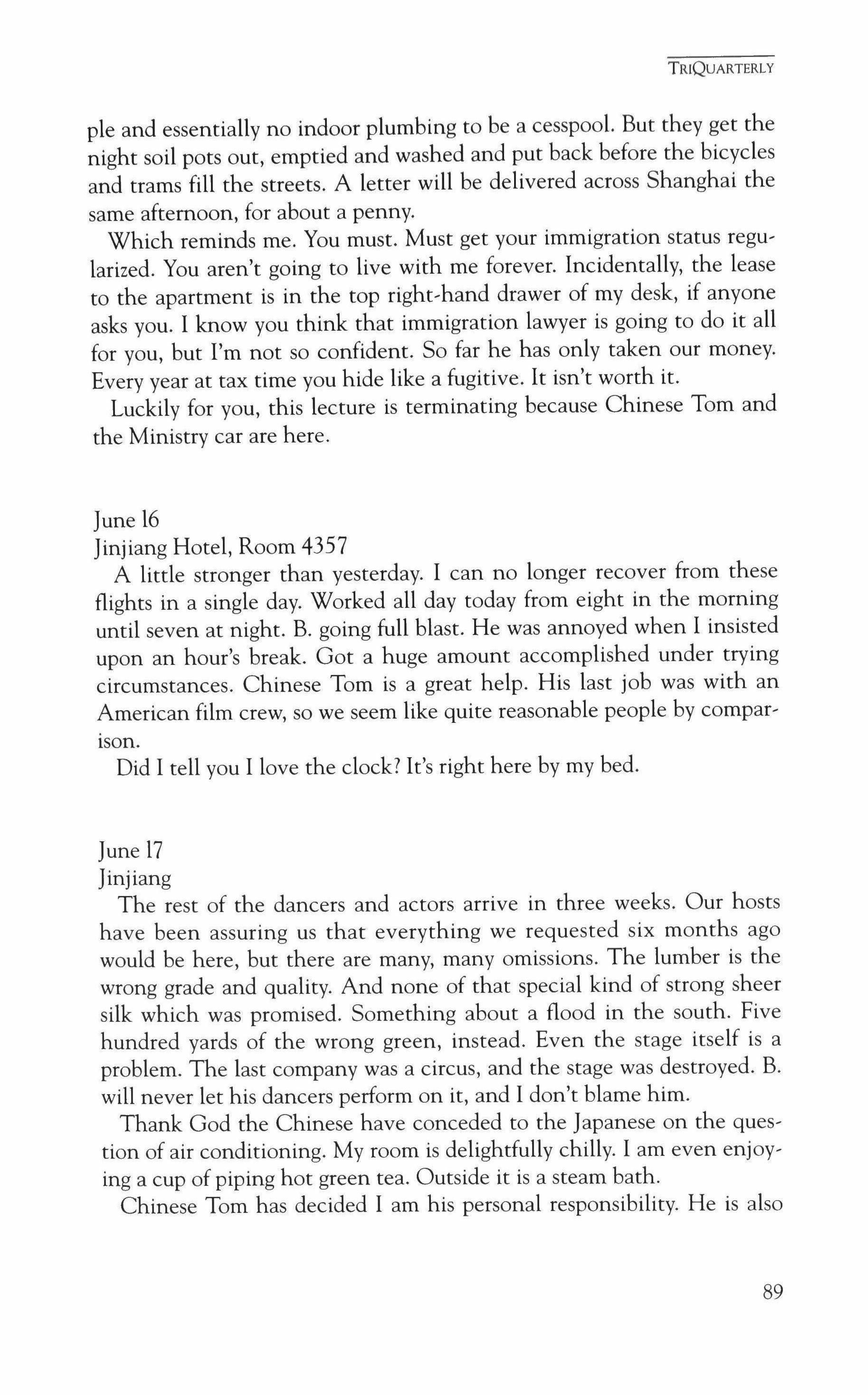
ple and essentially no indoor plumbing to be a cesspool. But they get the night soil pots out, emptied and washed and put back before the bicycles and trams fill the streets. A letter will be delivered across Shanghai the same afternoon, for about a penny.
Which reminds me. You must. Must get your immigration status regularized. You aren't going to live with me forever. Incidentally, the lease to the apartment is in the top right-hand drawer of my desk, if anyone asks you. I know you think that immigration lawyer is going to do it all for you, but I'm not so confident. So far he has only taken our money. Every year at tax time you hide like a fugitive. It isn't worth it.
Luckily for you, this lecture is terminating because Chinese Tom and the Ministry car are here.
June 16
[injiang Hotel, Room 4357
A little stronger than yesterday. I can no longer recover from these flights in a single day. Worked all day today from eight in the morning until seven at night. B. going full blast. He was annoyed when I insisted upon an hour's break. Got a huge amount accomplished under trying circumstances. Chinese Tom is a great help. His last job was with an American film crew, so we seem like quite reasonable people by comparison.
Did I tell you I love the clock? It's right here by my bed.
June 17
[injiang
The rest of the dancers and actors arrive in three weeks. Our hosts have been assuring us that everything we requested six months ago would be here, but there are many, many omissions. The lumber is the wrong grade and quality. And none of that special kind of strong sheer silk which was promised. Something about a flood in the south. Five hundred yards of the wrong green, instead. Even the stage itself is a problem. The last company was a circus, and the stage was destroyed. B. will never let his dancers perform on it, and I don't blame him.
Thank God the Chinese have conceded to the Japanese on the question of air conditioning. My room is delightfully chilly. I am even enjoying a cup of piping hot green tea. Outside it is a steam bath.
Chinese Tom has decided I am his personal responsibility. He is also
TRIQUARTERLY
89
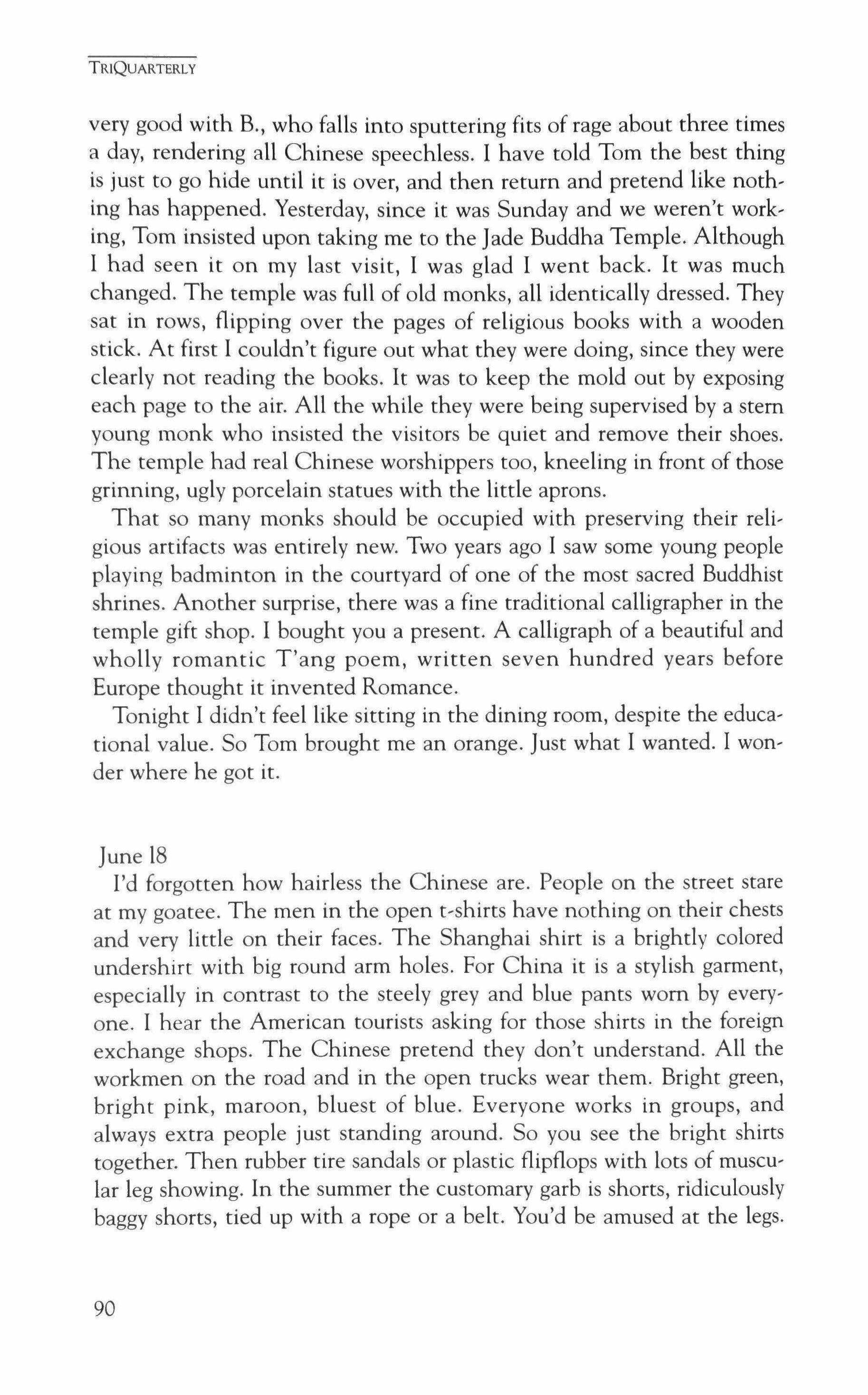
very good with B., who falls into sputtering fits of rage about three times a day, rendering all Chinese speechless. I have told Tom the best thing is just to go hide until it is over, and then return and pretend like nothing has happened. Yesterday, since it was Sunday and we weren't working, Tom insisted upon taking me to the Jade Buddha Temple. Although I had seen it on my last visit, I was glad I went back. It was much changed. The temple was full of old monks, all identically dressed. They sat in rows, flipping over the pages of religious books with a wooden stick. At first I couldn't figure out what they were doing, since they were clearly not reading the books. It was to keep the mold out by exposing each page to the air. All the while they were being supervised by a stem young monk who insisted the visitors be quiet and remove their shoes. The temple had real Chinese worshippers too, kneeling in front of those grinning, ugly porcelain statues with the little aprons.
That so many monks should be occupied with preserving their religious artifacts was entirely new. Two years ago I saw some young people playing badminton in the courtyard of one of the most sacred Buddhist shrines. Another surprise, there was a fine traditional calligrapher in the temple gift shop. I bought you a present. A calligraph of a beautiful and wholly romantic Tang poem, written seven hundred years before Europe thought it invented Romance.
Tonight I didn't feel like sitting in the dining room, despite the educational value. So Tom brought me an orange. Just what I wanted. I wonder where he got it.
Junel8
I'd forgotten how hairless the Chinese are. People on the street stare at my goatee. The men in the open t-shirts have nothing on their chests and very little on their faces. The Shanghai shirt is a brightly colored undershirt with big round arm holes. For China it is a stylish garment, especially in contrast to the steely grey and blue pants worn by everyone. I hear the American tourists asking for those shirts in the foreign exchange shops. The Chinese pretend they don't understand. All the workmen on the road and in the open trucks wear them. Bright green, bright pink, maroon, bluest of blue. Everyone works in groups, and always extra people just standing around. So you see the bright shirts together. Then rubber tire sandals or plastic flipflops with lots of muscular leg showing. In the summer the customary garb is shorts, ridiculously baggy shorts, tied up with a rope or a belt. You'd be amused at the legs.
TRIQUARTERLY
90
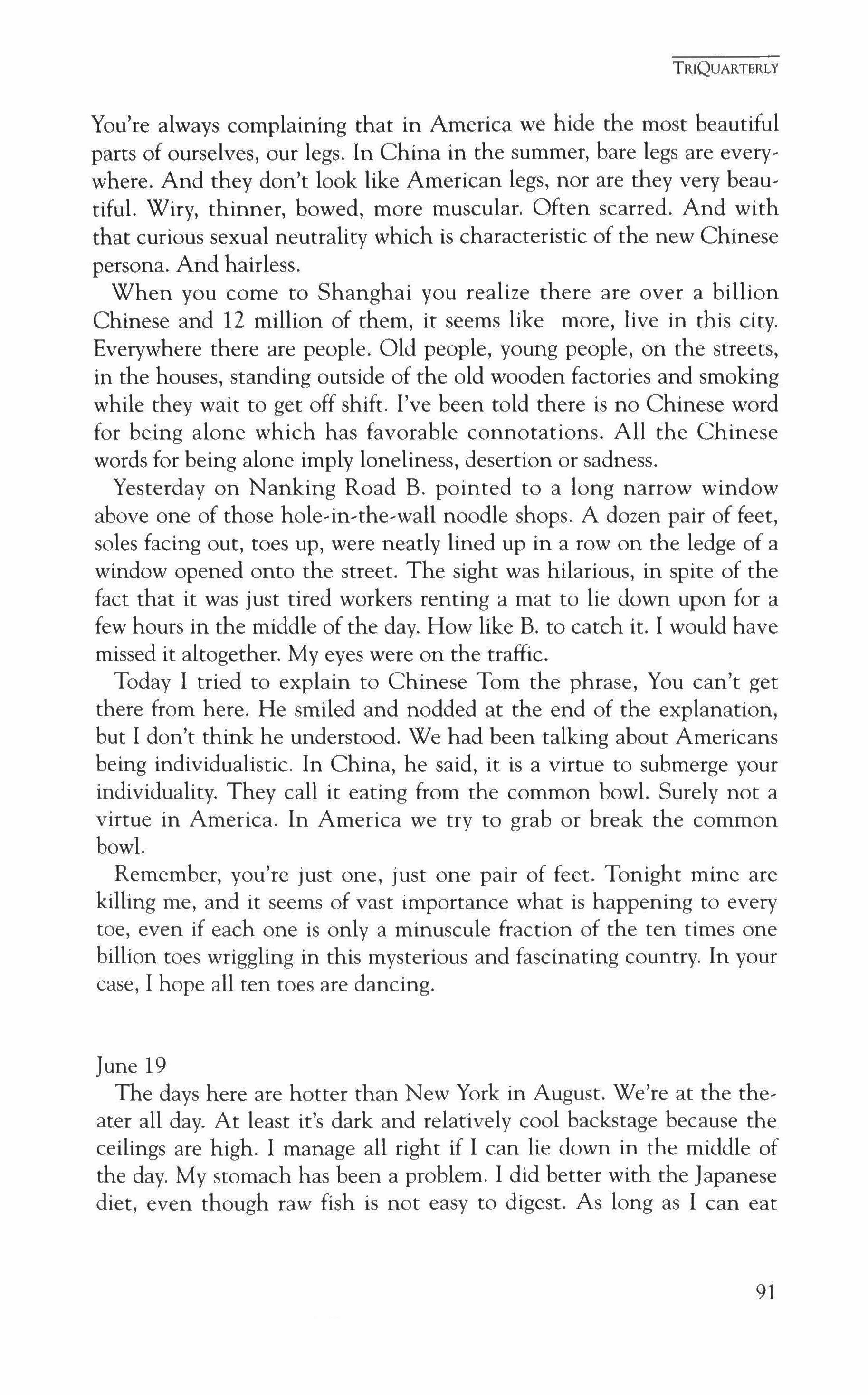
You're always complaining that in America we hide the most beautiful parts of ourselves, our legs. In China in the summer, bare legs are every' where. And they don't look like American legs, nor are they very beau, tiful. Wiry, thinner, bowed, more muscular. Often scarred. And with that curious sexual neutrality which is characteristic of the new Chinese persona. And hairless.
When you come to Shanghai you realize there are over a billion Chinese and 12 million of them, it seems like more, live in this city. Everywhere there are people. Old people, young people, on the streets, in the houses, standing outside of the old wooden factories and smoking while they wait to get off shift. I've been told there is no Chinese word for being alone which has favorable connotations. All the Chinese words for being alone imply loneliness, desertion or sadness.
Yesterday on Nanking Road B. pointed to a long narrow window above one of those hole-in-the-wall noodle shops. A dozen pair of feet, soles facing out, toes up, were neatly lined up in a row on the ledge of a window opened onto the street. The sight was hilarious, in spite of the fact that it was just tired workers renting a mat to lie down upon for a few hours in the middle of the day. How like B. to catch it. I would have missed it altogether. My eyes were on the traffic.
Today I tried to explain to Chinese Tom the phrase, You can't get there from here. He smiled and nodded at the end of the explanation, but I don't think he understood. We had been talking about Americans being individualistic. In China, he said, it is a virtue to submerge your individuality. They call it eating from the common bowl. Surely not a virtue in America. In America we try to grab or break the common bowl.
Remember, you're just one, just one pair of feet. Tonight mine are killing me, and it seems of vast importance what is happening to every toe, even if each one is only a minuscule fraction of the ten times one billion toes wriggling in this mysterious and fascinating country. In your case, I hope all ten toes are dancing.
June 19
The days here are hotter than New York in August. We're at the the, ater all day. At least it's dark and relatively cool backstage because the ceilings are high. I manage all right if I can lie down in the middle of the day. My stomach has been a problem. I did better with the Japanese diet, even though raw fish is not easy to digest. As long as I can eat
TRIQUARTERLY
91
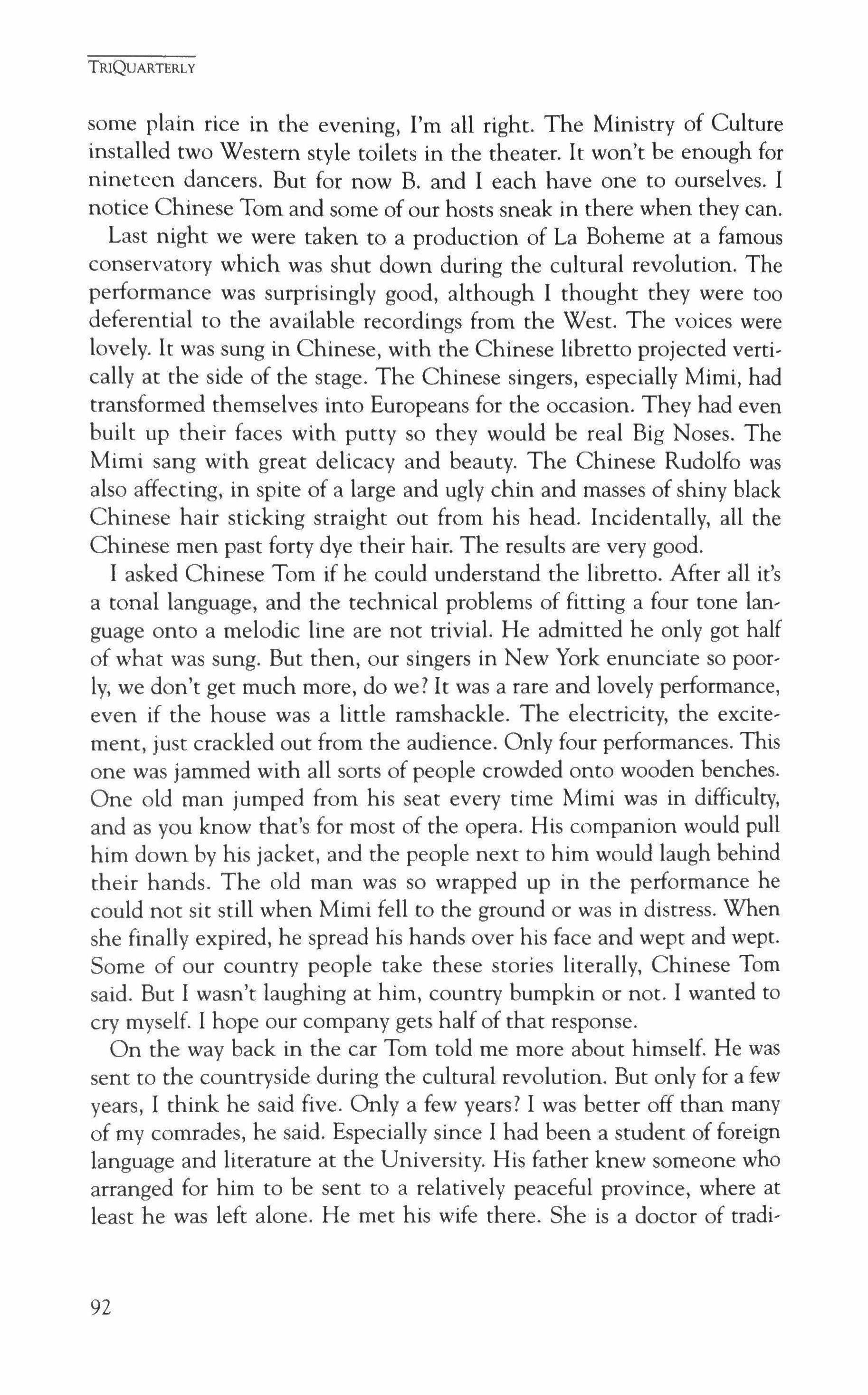
some plain rice in the evening, I'm all right. The Ministry of Culture installed two Western style toilets in the theater. It won't be enough for nineteen dancers. But for now B. and I each have one to ourselves. I notice Chinese Tom and some of our hosts sneak in there when they can.
Last night we were taken to a production of La Boheme at a famous conservatory which was shut down during the cultural revolution. The performance was surprisingly good, although I thought they were too deferential to the available recordings from the West. The voices were lovely. It was sung in Chinese, with the Chinese libretto projected vertically at the side of the stage. The Chinese singers, especially Mimi, had transformed themselves into Europeans for the occasion. They had even built up their faces with putty so they would be real Big Noses. The Mimi sang with great delicacy and beauty. The Chinese Rudolfo was also affecting, in spite of a large and ugly chin and masses of shiny black Chinese hair sticking straight out from his head. Incidentally, all the Chinese men past forty dye their hair. The results are very good.
I asked Chinese Tom if he could understand the libretto. After all it's a tonal language, and the technical problems of fitting a four tone language onto a melodic line are not trivial. He admitted he only got half of what was sung. But then, our singers in New York enunciate so poorly, we don't get much more, do we? It was a rare and lovely performance, even if the house was a little ramshackle. The electricity, the excitement, just crackled out from the audience. Only four performances. This one was jammed with all sorts of people crowded onto wooden benches. One old man jumped from his seat every time Mimi was in difficulty, and as you know that's for most of the opera. His companion would pull him down by his jacket, and the people next to him would laugh behind their hands. The old man was so wrapped up in the performance he could not sit still when Mimi fell to the ground or was in distress. When she finally expired, he spread his hands over his face and wept and wept. Some of our country people take these stories literally, Chinese Torn said. But I wasn't laughing at him, country bumpkin or not. I wanted to cry myself. I hope our company gets half of that response.
On the way back in the car Tom told me more about himself. He was sent to the countryside during the cultural revolution. But only for a few years, I think he said five. Only a few years? I was better off than many of my comrades, he said. Especially since I had been a student of foreign language and literature at the University. His father knew someone who arranged for him to be sent to a relatively peaceful province, where at least he was left alone. He met his wife there. She is a doctor of tradi-
TRIQUARTERLY
92
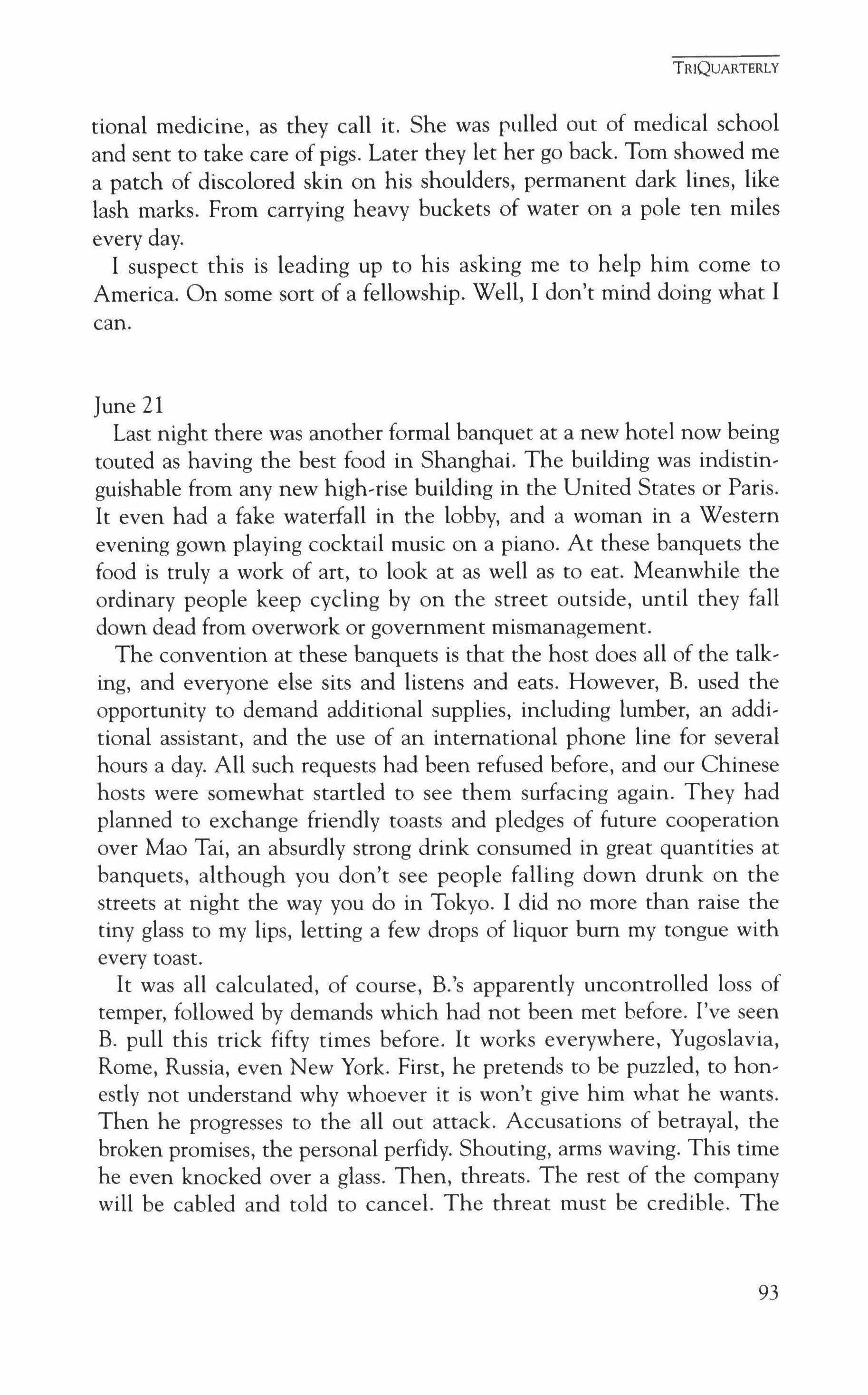
tional medicine, as they call it. She was pulled out of medical school and sent to take care of pigs. Later they let her go back. Tom showed me a patch of discolored skin on his shoulders, permanent dark lines, like lash marks. From carrying heavy buckets of water on a pole ten miles every day.
I suspect this is leading up to his asking me to help him come to America. On some sort of a fellowship. Well, I don't mind doing what I can.
June 21
Last night there was another formal banquet at a new hotel now being touted as having the best food in Shanghai. The building was indistinguishable from any new high-rise building in the United States or Paris. It even had a fake waterfall in the lobby, and a woman in a Western evening gown playing cocktail music on a piano. At these banquets the food is truly a work of art, to look at as well as to eat. Meanwhile the ordinary people keep cycling by on the street outside, until they fall down dead from overwork or government mismanagement.
The convention at these banquets is that the host does all of the talking, and everyone else sits and listens and eats. However, B. used the opportunity to demand additional supplies, including lumber, an additional assistant, and the use of an international phone line for several hours a day. All such requests had been refused before, and our Chinese hosts were somewhat startled to see them surfacing again. They had planned to exchange friendly toasts and pledges of future cooperation over Mao Tai, an absurdly strong drink consumed in great quantities at banquets, although you don't see people falling down drunk on the streets at night the way you do in Tokyo. I did no more than raise the tiny glass to my lips, letting a few drops of liquor burn my tongue with every toast.
It was all calculated, of course, B.'s apparently uncontrolled loss of temper, followed by demands which had not been met before. I've seen B. pull this trick fifty times before. It works everywhere, Yugoslavia, Rome, Russia, even New York. First, he pretends to be puzzled, to honestly not understand why whoever it is won't give him what he wants. Then he progresses to the all out attack. Accusations of betrayal, the broken promises, the personal perfidy. Shouting, arms waving. This time he even knocked over a glass. Then, threats. The rest of the company will be cabled and told to cancel. The threat must be credible. The
TRIQUARTERLY
93

Chinese stared, first at him and then at each other. Our two principal hosts retired briefly. They were joined by the official greeter, the one who everyone assumes is the government informant. The result seems to be that we'll have the phone line, at least, tomorrow, and they're working on the lumber.
In the car on the way back to the [injiang, I congratulated B. He was exhausted. These are performances, and they take it out of him. We start tomorrow at ten in the morning instead of eight.
June 23 Jinjiang
Look, you are better off not having come. Really, I would have loved your company. But everything considered, it was better you stayed. There was nothing for you to do here. Who knows, this audition might have turned out to be what we have been waiting for. It's a cliche, but after years of listening to stories about people's careers, I'm convinced that happenstance, chance, and luck do change your life. Look at me. I met B. at a party and worked for him for the next ten years. lowe everything to him.
By the way, if you need cash, there is some in the top drawer of my desk. Top right drawer. Take whatever you need. The bank books are there too, along with various insurance policies.
June 24, 4357
I can't write much today. I fainted at the theater. It was mortifying. B. stopped everybody in the middle of what they were doing. He wanted to come back to the hotel with me. I finally persuaded B. that Chinese Tom would be better able to assist me. When we got back to the room the air conditioning was barely working. I lay down having some difficulty breathing, and I think I even scared Tom. I asked him to get me some oxygen. It isn't like America where you can just go to the comer pharmacy and buy yourself a can of oxygen. When Tom came back with the oxygen he was very quiet. He had been gone about two hours, and I thought he'd never return. If I could have used the telephone, I would have called for help myself, although there are no telephone books in this country, and I wouldn't have known who to call. Tom wouldn't tell me where he got the oxygen. He must have had to do something he didn't want to do.
TRIQUARTERlY
94
June 25
Room 4357, [injiang
Really, it's a national disgrace that we are so bad at languages. I meet scores of Chinese who read and write and speak English fluently. We cannot manage the simplest greeting in Chinese, let alone read a street sign. Take Tom, for example. He reads and writes English and French. He started studying English at age eight. He is an artist, of course. Probably he begged for this assignment. You never can tell when contact with a foreigner, especially a man of B.'s international reputation, will result in the offer of a fellowship abroad, or an invitation to an international festival. At the same time, a job such as this always carries a risk here. The winds of politics may change. You could be sent to take care of pigs for far less than having an association with a visiting American theater company. But he can learn so much, just from watching B. at work. I still go to rehearsals. What is he going to do today, to get the best, the newest, the freshest approach out of every single mernber of the company, including me. And he never disappoints me. Whatever you say about him, and I do say it all, he is a great artist. My friend Tom has been highly trained in Chinese traditional painting, like so many of their young people. And very gifted. He dashes off the stylized paintings of horses, trees and birds and says with great contempt that what he paints in five minutes will sell in the tourist shop for a hundred US dollars. The government gives him five, and he's glad to have it.
Yesterday I tried to tell him that the stand of bamboo he did for a backdrop was not wholly without artistic interest or merit. He just shrugged. He has an unrealistic view of how wonderful it is to be an artist in the West. Don't despise fluency, I said. I don't think he understood. I told him I knew artists who agonized for months, or even years to produce a pea of little value. He wasn't listening. He's like you. Because he can do something easily, gracefully, he thinks anybody could do it. But they can't. Most people can't do anything, let alone do anything well or beautifully. Can't do anything worth other people paying attention to.
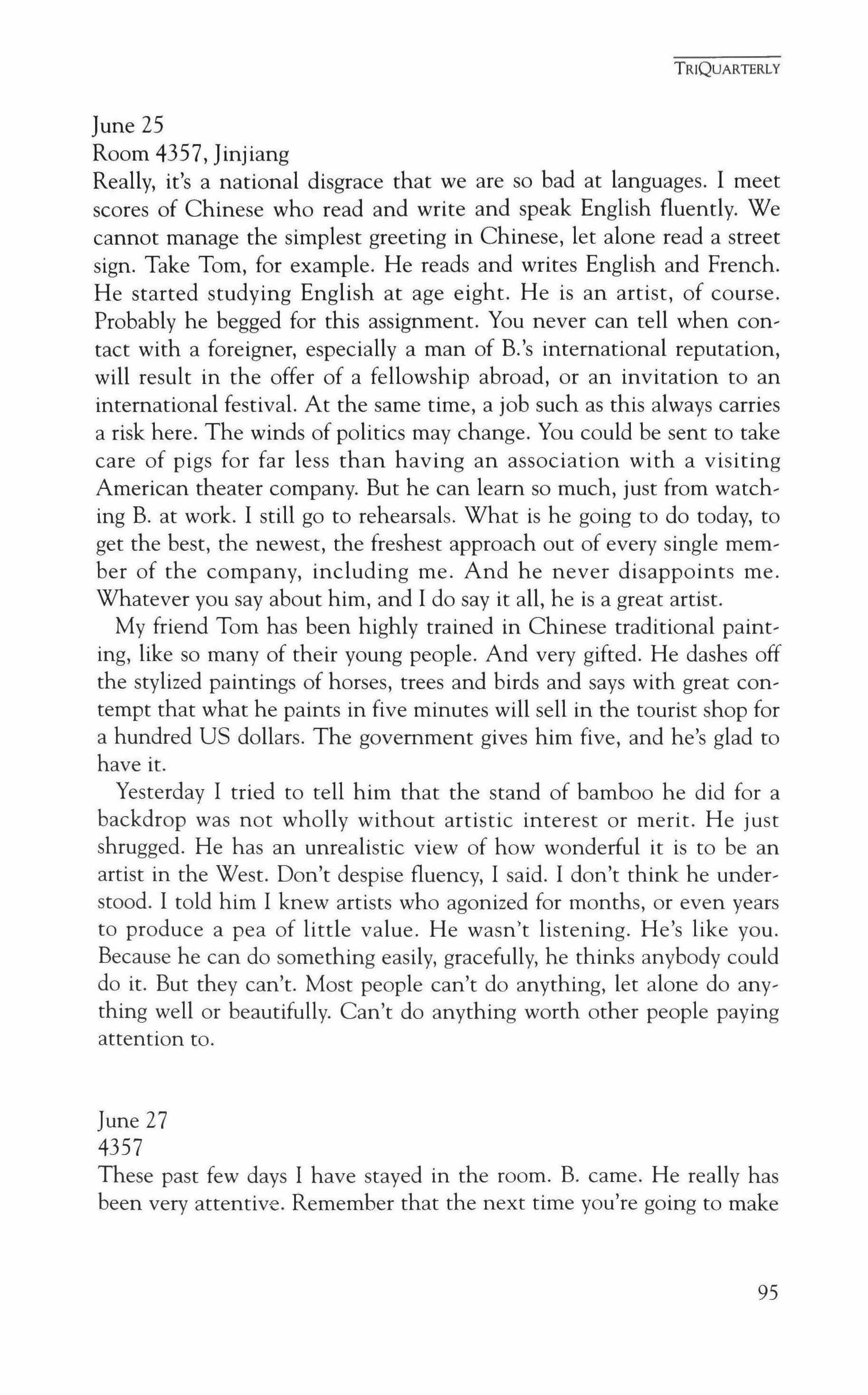
June 27 4357
These past few days I have stayed in the room. B. came. He really has been very attentive. Remember that the next time you're going to make
TRIQUARTERLY
95

rude remarks about him. He sat by the bed and held my hand and offered me all of the antibiotics and pain killers in his personal drugstore. I laughed, which made me start coughing again. But I'm not in pain, I said. Still, it was comforting to know the stuff was there. The hospital for foreigners is supposed to be pretty good, he said. They give you a choice of Chinese style or Western style medicine, just like the two sides of the dining room. I don't want to go there. I took some of the herbal medicine Tom brought me yesterday. It must be a very strong decongestant with some kind of stimulant in it. I have felt better for several hours. I even washed up. You take this horse pill, it has the consistency of a Tootsie Roll, but it does not taste like chocolate. Then you must follow it with about two quarts of boiling hot water. That's probably what does the good. What I really wanted after that disgusting pill was an American Scotch with a huge pitcher of good old-fashioned American ice water.
So that he would stop pressing me to drink more hot water, I got Chinese Tom to tell me more of the story of his life. His father and mother were separated and sent off to the North to labor camps during what he refers to as the recent troubled times. Because they were teachers. He and his sister and brother were at first left alone in the city. At thirteen he was the oldest, with the responsibility for taking care of the younger ones. An uncle lived in a nearby town. But we were all right, he said. We had enough to eat and a place. The mother didn't survive the camp. The lack of bitterness expressed by the tellers of such tales is astounding. So many have suffered so needlessly. Yet there seems to be a collective agreement, that it's a waste of time to be bitter. Or perhaps this is just the face that is put on for Americans. In normal times, if there have ever been normal times, he would have studied to be a dancer or an actor. Painting came later as a second choice, because it was less political. He never thought he would be an administrator in the Ministry for Cultural Affairs, but it turned out all right, he says. Many opportunities. His wife runs a clinic for herbal medicine in Shanghai. At least when our doctors are trained we don't send them off to clean pig troughs. Although we allow our young people to kill themselves in many stupid ways.
Tom keeps asking me, what am I writing in the notebook. I tell him it is a letter to a friend. And a diary of my journey. My impressions. He can see it takes a lots of time, and that I always try to write something even when I am very tired or don't feel well. Someone I miss very much, I tell him.
TRIQUARTERLY
96
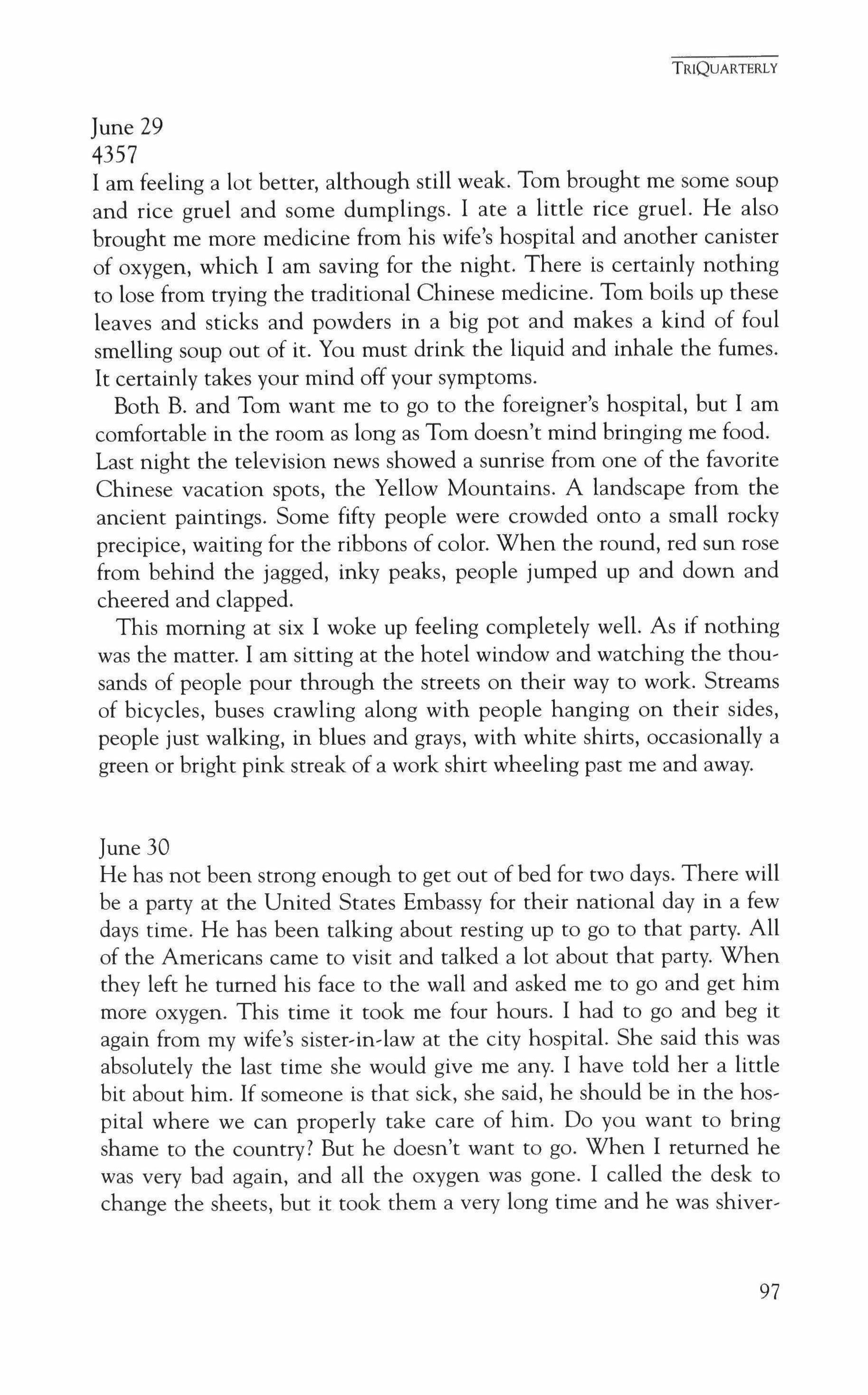
June 29
4357
I am feeling a lot better, although still weak. Tom brought me some soup and rice gruel and some dumplings. I ate a little rice gruel. He also brought me more medicine from his wife's hospital and another canister of oxygen, which I am saving for the night. There is certainly nothing to lose from trying the traditional Chinese medicine. Tom boils up these leaves and sticks and powders in a big pot and makes a kind of foul smelling soup out of it. You must drink the liquid and inhale the fumes. It certainly takes your mind off your symptoms.
Both B. and Tom want me to go to the foreigner's hospital, but I am comfortable in the room as long as Tom doesn't mind bringing me food. Last night the television news showed a sunrise from one of the favorite Chinese vacation spots, the Yellow Mountains. A landscape from the ancient paintings. Some fifty people were crowded onto a small rocky precipice, waiting for the ribbons of color. When the round, red sun rose from behind the jagged, inky peaks, people jumped up and down and cheered and clapped.
This morning at six I woke up feeling completely well. As if nothing was the matter. I am sitting at the hotel window and watching the thousands of people pour through the streets on their way to work. Streams of bicycles, buses crawling along with people hanging on their sides, people just walking, in blues and grays, with white shirts, occasionally a green or bright pink streak of a work shirt wheeling past me and away.
June 30
He has not been strong enough to get out of bed for two days. There will be a party at the United States Embassy for their national day in a few days time. He has been talking about resting up to go to that party. All of the Americans came to visit and talked a lot about that party. When they left he turned his face to the wall and asked me to go and get him more oxygen. This time it took me four hours. I had to go and beg it again from my wife's sister-in-law at the city hospital. She said this was absolutely the last time she would give me any. I have told her a little bit about him. If someone is that sick, she said, he should be in the hospital where we can properly take care of him. Do you want to bring shame to the country? But he doesn't want to go. When I returned he was very bad again, and all the oxygen was gone. I called the desk to change the sheets, but it took them a very long time and he was shiver-
TRIQUARTERLY
97
ing. I wrapped him in a blanket and we sat on the sofa together. I promised to bring him some of our black hair dye tomorrow. He drank a little tea with herbs and felt stronger. I will stay in the room with him now.
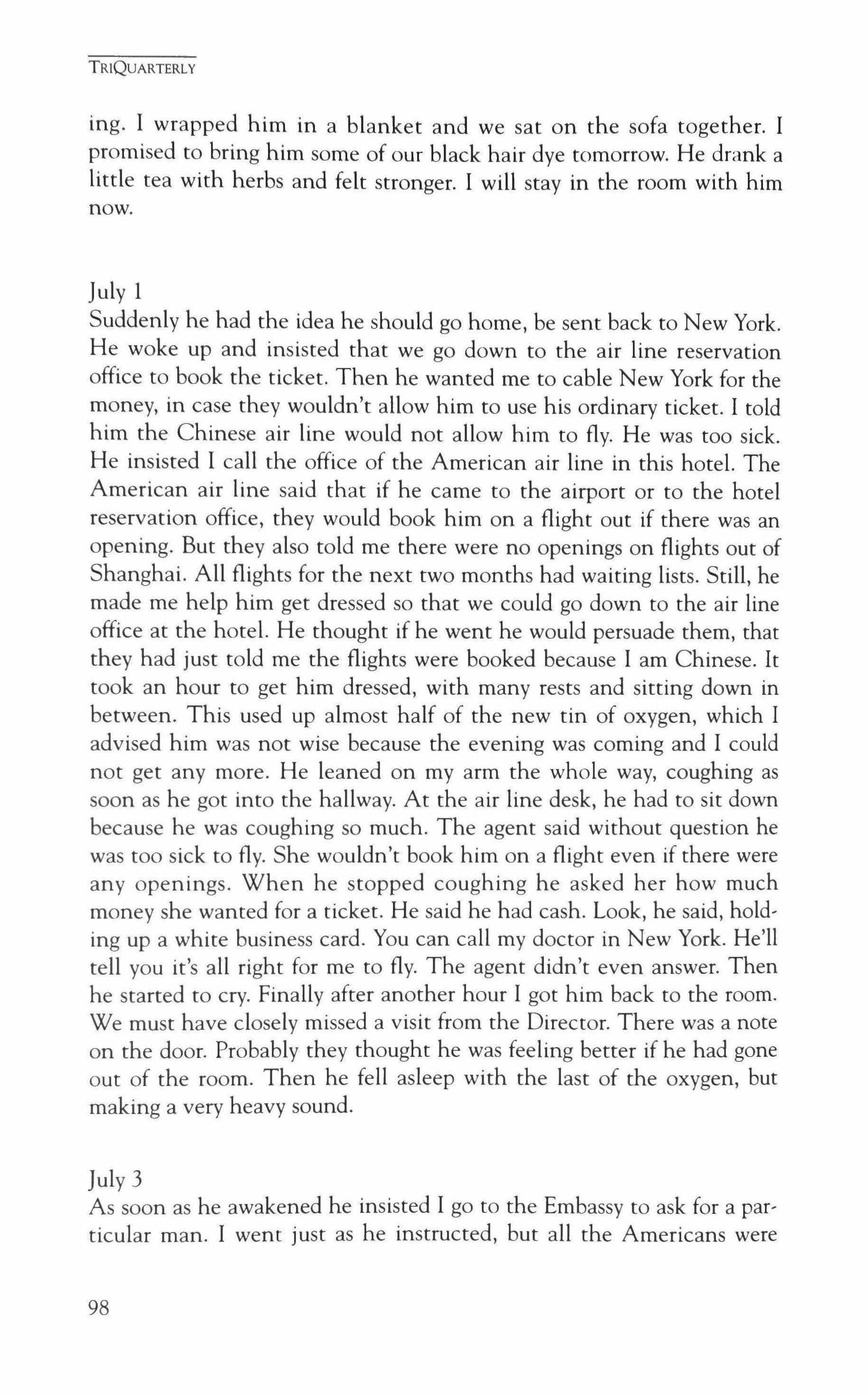
July 1
Suddenly he had the idea he should go home, be sent back to New York. He woke up and insisted that we go down to the air line reservation office to book the ticket. Then he wanted me to cable New York for the money, in case they wouldn't allow him to use his ordinary ticket. I told him the Chinese air line would not allow him to fly. He was too sick. He insisted I call the office of the American air line in this hotel. The American air line said that if he came to the airport or to the hotel reservation office, they would book him on a flight out if there was an opening. But they also told me there were no openings on flights out of Shanghai. All flights for the next two months had waiting lists. Still, he made me help him get dressed so that we could go down to the air line office at the hotel. He thought if he went he would persuade them, that they had just told me the flights were booked because I am Chinese. It took an hour to get him dressed, with many rests and sitting down in between. This used up almost half of the new tin of oxygen, which I advised him was not wise because the evening was coming and I could not get any more. He leaned on my arm the whole way, coughing as soon as he got into the hallway. At the air line desk, he had to sit down because he was coughing so much. The agent said without question he was too sick to fly. She wouldn't book him on a flight even if there were any openings. When he stopped coughing he asked her how much money she wanted for a ticket. He said he had cash. Look, he said, holding up a white business card. You can call my doctor in New York. He'll tell you it's all right for me to fly. The agent didn't even answer. Then he started to cry. Finally after another hour I got him back to the room. We must have closely missed a visit from the Director. There was a note on the door. Probably they thought he was feeling better if he had gone out of the room. Then he fell asleep with the last of the oxygen, but making a very heavy sound.
July 3
As soon as he awakened he insisted I go to the Embassy to ask for a particular man. I went just as he instructed, but all the Americans were
TRIQUARTERLY
98
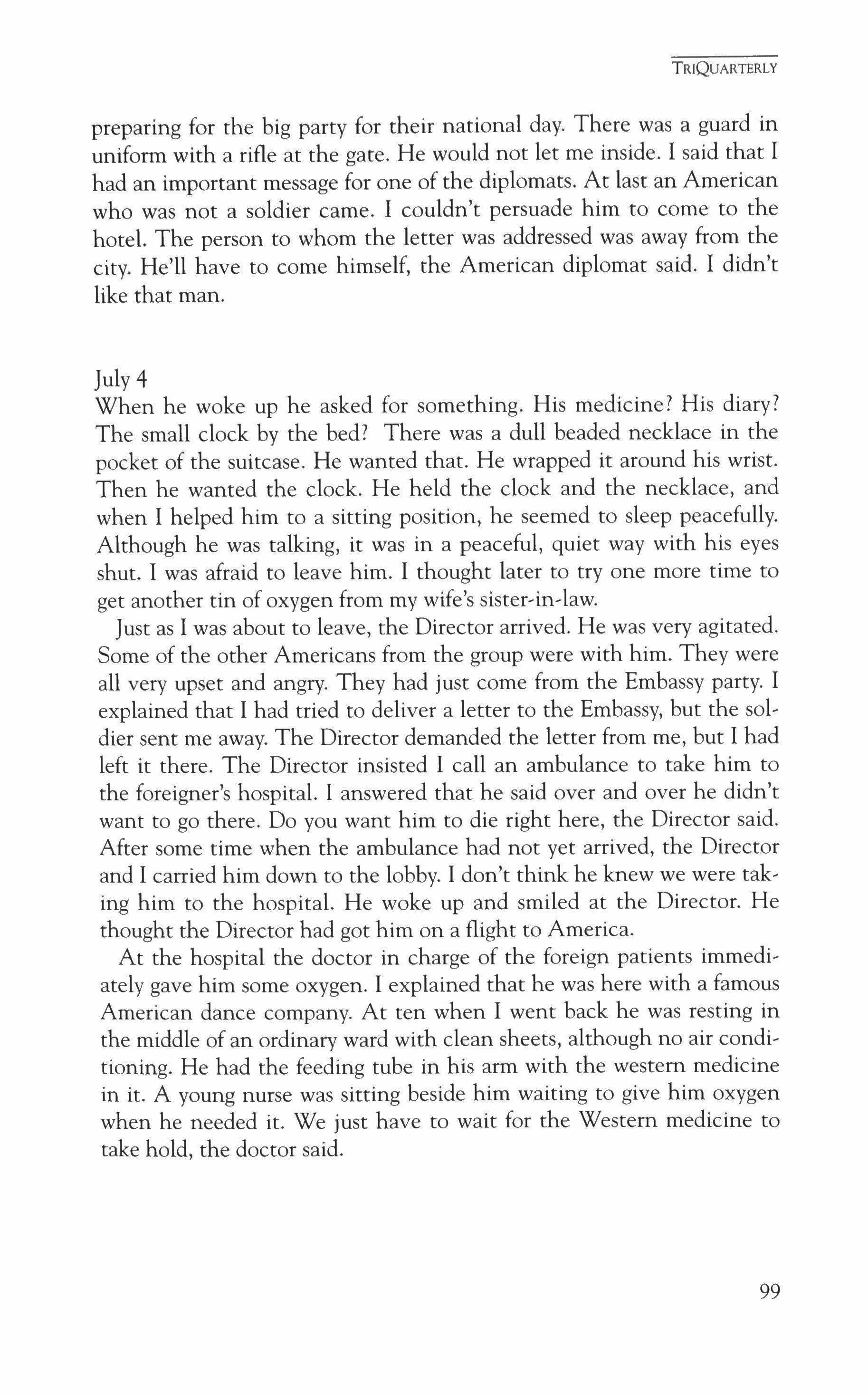
preparing for the big party for their national day. There was a guard in uniform with a rifle at the gate. He would not let me inside. I said that I had an important message for one of the diplomats. At last an American who was not a soldier came. I couldn't persuade him to come to the hotel. The person to whom the letter was addressed was away from the city. He'll have to come himself, the American diplomat said. I didn't like that man.
July 4
When he woke up he asked for something. His medicine? His diary? The small clock by the bed? There was a dull beaded necklace in the pocket of the suitcase. He wanted that. He wrapped it around his wrist. Then he wanted the clock. He held the clock and the necklace, and when I helped him to a sitting position, he seemed to sleep peacefully. Although he was talking, it was in a peaceful, quiet way with his eyes shut. I was afraid to leave him. I thought later to try one more time to get another tin of oxygen from my wife's sister-in-law.
Just as I was about to leave, the Director arrived. He was very agitated. Some of the other Americans from the group were with him. They were all very upset and angry. They had just come from the Embassy party. I explained that I had tried to deliver a letter to the Embassy, but the soldier sent me away. The Director demanded the letter from me, but I had left it there. The Director insisted I call an ambulance to take him to the foreigner's hospital. I answered that he said over and over he didn't want to go there. Do you want him to die right here, the Director said. After some time when the ambulance had not yet arrived, the Director and I carried him down to the lobby. I don't think he knew we were taking him to the hospital. He woke up and smiled at the Director. He thought the Director had got him on a flight to America.
At the hospital the doctor in charge of the foreign patients immediately gave him some oxygen. I explained that he was here with a famous American dance company. At ten when I went back he was resting in the middle of an ordinary ward with clean sheets, although no air conditioning. He had the feeding tube in his arm with the western medicine in it. A young nurse was sitting beside him waiting to give him oxygen when he needed it. We just have to wait for the Western medicine to take hold, the doctor said.
TRIQUARTERLY
99
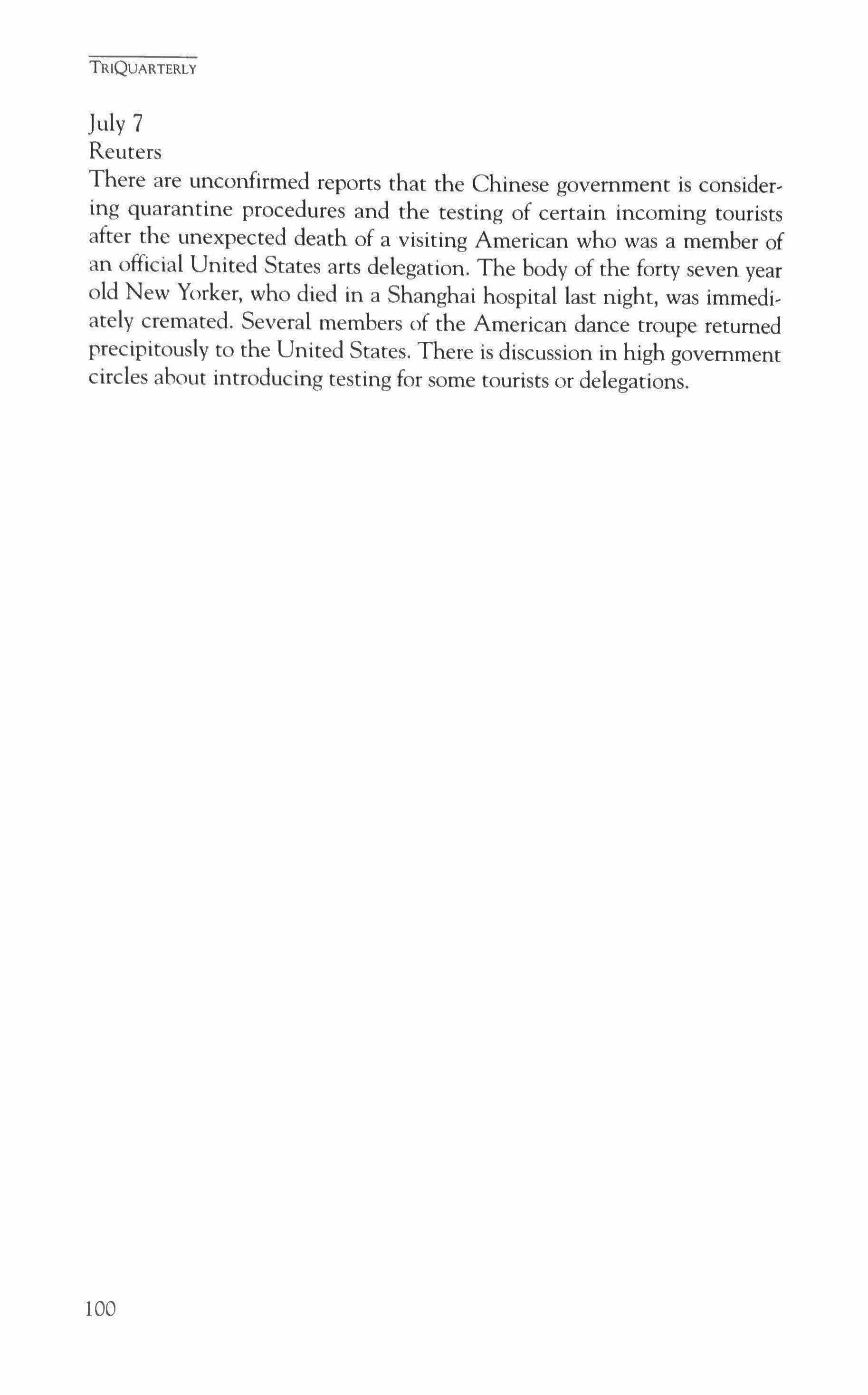
uly 7
Reuters
There are unconfirmed reports that the Chinese government is considering quarantine procedures and the testing of certain incoming tourists after the unexpected death of a visiting American who was a member of an official United States arts delegation. The body of the forty seven year old New Yorker, who died in a Shanghai hospital last night, was immediately cremated. Several members of the American dance troupe returned precipitously to the United States. There is discussion in high government circles about introducing testing for some tourists or delegations.
ThIQUARTERLY
]
100
The Poet
Stephen Dixon
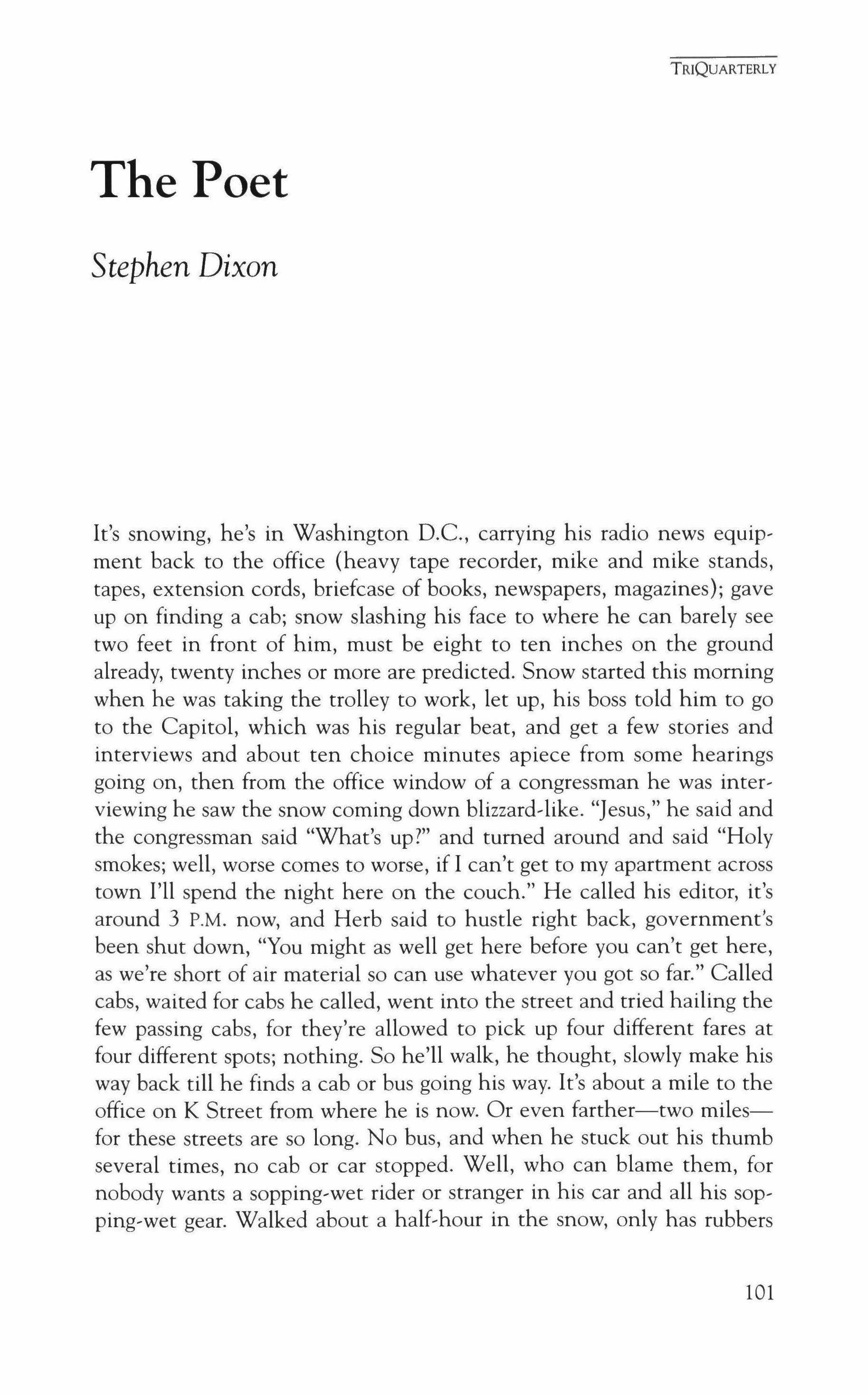
It's snowing, he's in Washington D.C., carrying his radio news equipment back to the office (heavy tape recorder, mike and mike stands, tapes, extension cords, briefcase of books, newspapers, magazines); gave up on finding a cab; snow slashing his face to where he can barely see two feet in front of him, must be eight to ten inches on the ground already, twenty inches or more are predicted. Snow started this morning when he was taking the trolley to work, let up, his boss told him to go to the Capitol, which was his regular beat, and get a few stories and interviews and about ten choice minutes apiece from some hearings going on, then from the office window of a congressman he was interviewing he saw the snow coming down blizzard-like. "Jesus," he said and the congressman said "What's up?" and turned around and said "Holy smokes; well, worse comes to worse, if I can't get to my apartment across town I'll spend the night here on the couch." He called his editor, it's around 3 P.M. now, and Herb said to hustle right back, government's been shut down, "You might as well get here before you can't get here, as we're short of air material so can use whatever you got so far." Called cabs, waited for cabs he called, went into the street and tried hailing the few passing cabs, for they're allowed to pick up four different fares at four different spots; nothing. So he'll walk, he thought, slowly make his way back till he finds a cab or bus going his way. It's about a mile to the office on K Street from where he is now. Or even farther-two milesfor these streets are so long. No bus, and when he stuck out his thumb several times, no cab or car stopped. Well, who can blame them, for nobody wants a sopping-wet rider or stranger in his car and all his sopping-wet gear. Walked about a half-hour in the snow, only has rubbers
TRIQUARTERLY
101
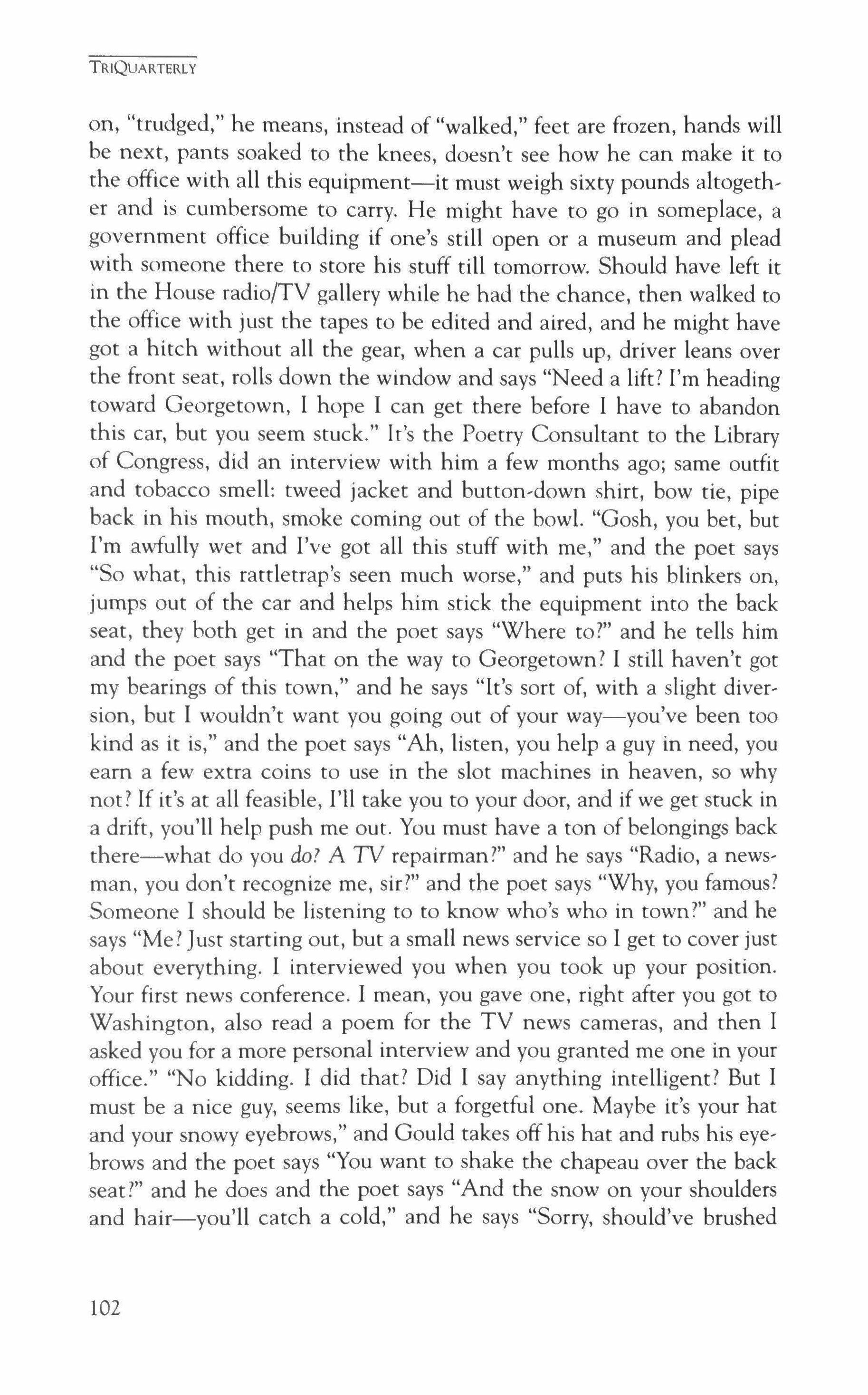
on, "trudged," he means, instead of "walked," feet are frozen, hands will be next, pants soaked to the knees, doesn't see how he can make it to the office with all this equipment-it must weigh sixty pounds altogether and is cumbersome to carry. He might have to go in someplace, a government office building if one's still open or a museum and plead with someone there to store his stuff till tomorrow. Should have left it in the House radio/TV gallery while he had the chance, then walked to the office with just the tapes to be edited and aired, and he might have got a hitch without all the gear, when a car pulls up, driver leans over the front seat, rolls down the window and says "Need a lift? I'm heading toward Georgetown, I hope I can get there before I have to abandon this car, but you seem stuck." It's the Poetry Consultant to the Library of Congress, did an interview with him a few months ago; same outfit and tobacco smell: tweed jacket and button-down shirt, bow tie, pipe back in his mouth, smoke coming out of the bowl. "Gosh, you bet, but I'm awfully wet and I've got all this stuff with me," and the poet says "So what, this rattletrap's seen much worse," and puts his blinkers on, jumps out of the car and helps him stick the equipment into the back seat, they both get in and the poet says "Where to?" and he tells him and the poet says "That on the way to Georgetown? I still haven't got my bearings of this town," and he says "It's sort of, with a slight diversion, but I wouldn't want you going out of your way-you've been too kind as it is," and the poet says "Ah, listen, you help a guy in need, you earn a few extra coins to use in the slot machines in heaven, so why not? If it's at all feasible, I'll take you to your door, and if we get stuck in a drift, you'll help push me out. You must have a ton of belongings back there-what do you do? A TV repairman?" and he says "Radio, a newsman, you don't recognize me, sir?" and the poet says "Why, you famous? Someone I should be listening to to know who's who in town?" and he says "Me? Just starting out, but a small news service so I get to cover just about everything. I interviewed you when you took up your position. Your first news conference. I mean, you gave one, right after you got to Washington, also read a poem for the TV news cameras, and then I asked you for a more personal interview and you granted me one in your office." "No kidding. I did that? Did I say anything intelligent? But I must be a nice guy, seems like, but a forgetful one. Maybe it's your hat and your snowy eyebrows," and Gould takes off his hat and rubs his eyebrows and the poet says "You want to shake the chapeau over the back seat?" and he does and the poet says "And the snow on your shoulders and hair-you'll catch a cold," and he says "Sorry, should've brushed
TRIQUARTERLY
102

myself off before I got in here," and the poet says "Don't worry, nothing'll hurt this heap and these are intemperate times where just survival is in order," and looks at Gould and says "You look a little familiar. What'd we talk about? Did I dispense my usual nonsense, for I tend to freeze up before you electronic news guys when you jut your paraphernalia in my mug," and he says "No, you were fine, my boss said. He was afraid, in his terms, I'd get a supercilious literary stiff, since I was the one who suggested my going to your press conference, your building being so close to the Capitol, which I normally work out of. But you know-about your job, what you'll do in it for the year you're here or two years if you feel like staying on. What poetry means in Americathere never was a time it commandeered, you said, anything close to center stage in the States. And how you plan to make it more a part of the mainstream-your primary goal," and the poet says "I propounded the possibility of that? What an idiot! And of course I gave no ways how I'd go about it. Listen, poetry will always be for a small devoted clientele, and nobody in government's interested in it in the slightest. My position's a sham-no one consults me and I can't find anyone to consult-and it took a coupla months to learn that. But I am getting plenty of writing done-teaching's much tougher and more time-consuming-and meeting a few nice people, though no one who's read a stitch of my work or knew me from Adam till I arrived here, and I know they think anyone calling himself a poet's a joke, except Sandburg and Frost, because they were homespun and made it pay. Next time disregard any poet who takes on a government sinecure, even with the word poetry in it, or holds a press conference, at least during the first two months of his job." The drive's slow, poet's funny, garrulous and lively, slaps his knee, relights his pipe several times, offers him a candy, and when he refuses, a mint and then a stick of gum, drops him off in front of his office building, Gould shakes his hand and says "I can't thank you enough, sir. I would've frozen out there if you hadn't showed." The poet says "Drop in on me if you like-when I'm there, door's always open. I can use the company-all the officials and librarians in the building stay away from me as if I've the plague. I won't have anything to say into your machine, but we can have a coffee and chat." He tells his boss what happened-"I meet him in a blizzard and he turns out to be the nicest guy on earth." "Did you get another interview with him? Would have been a good bit; Washington conked out by its worst storm in twenty years but it doesn't stop the muse." "Oh come on; the guy helped me out of a terrific spot." "You could have put the recorder on
TRIQUARTERLY
103
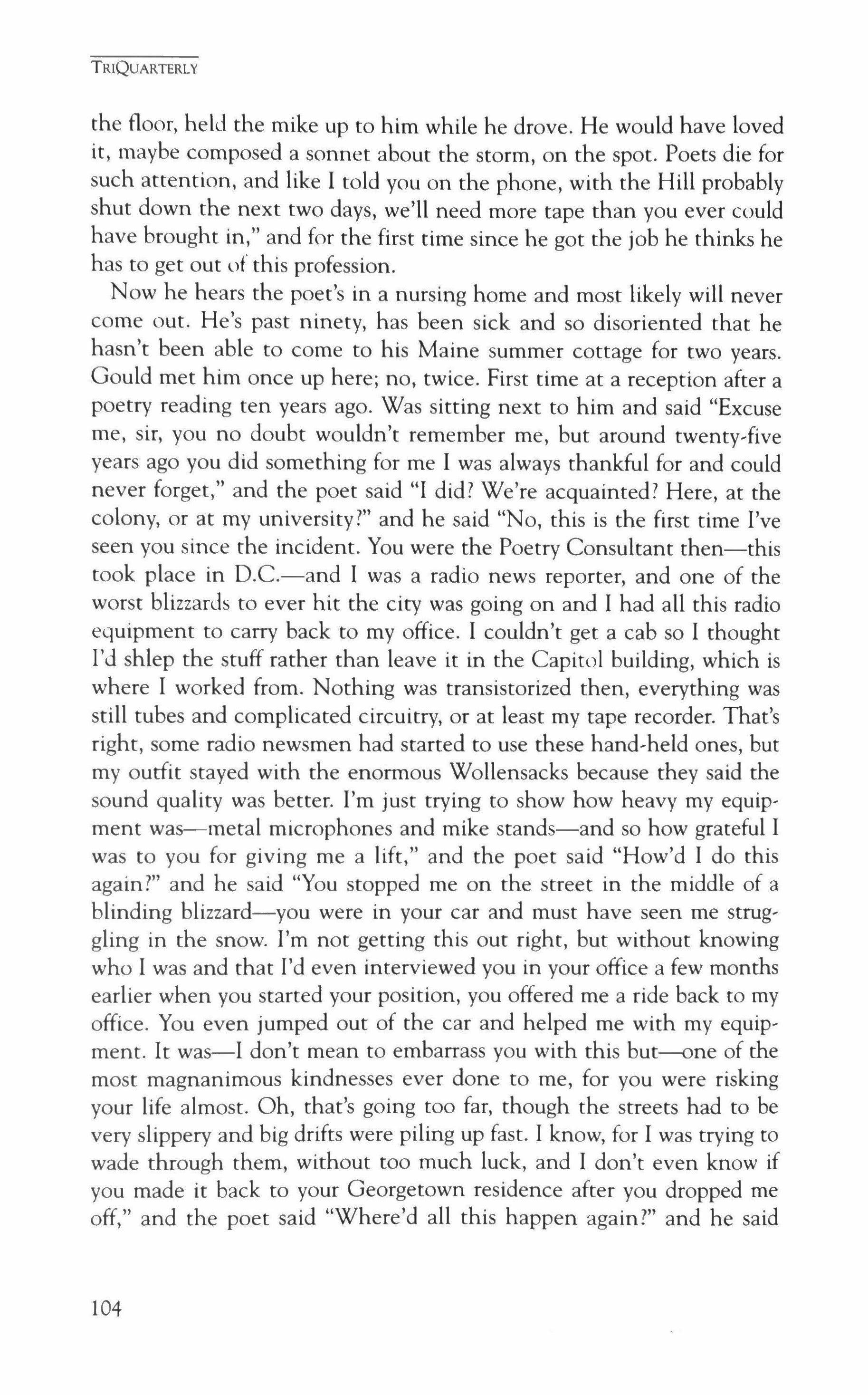
the floor, held the mike up to him while he drove. He would have loved it, maybe composed a sonnet about the storm, on the spot. Poets die for such attention, and like I told you on the phone, with the Hill probably shut down the next two days, we'll need more tape than you ever could have brought in," and for the first time since he got the job he thinks he has to get out of this profession.
Now he hears the poet's in a nursing home and most likely will never come out. He's past ninety, has been sick and so disoriented that he hasn't been able to come to his Maine summer cottage for two years. Gould met him once up here; no, twice. First time at a reception after a poetry reading ten years ago. Was sitting next to him and said "Excuse me, sir, you no doubt wouldn't remember me, but around twenty-five years ago you did something for me I was always thankful for and could never forget," and the poet said "I did? We're acquainted? Here, at the colony, or at my university?" and he said "No, this is the first time I've seen you since the incident. You were the Poetry Consultant then-this took place in D.C.-and I was a radio news reporter, and one of the worst blizzards to ever hit the city was going on and I had all this radio equipment to carry back to my office. I couldn't get a cab so I thought I'd shlep the stuff rather than leave it in the Capitol building, which is where I worked from. Nothing was transistorized then, everything was still tubes and complicated circuitry, or at least my tape recorder. That's right, some radio newsmen had started to use these hand-held ones, but my outfit stayed with the enormous Wollensacks because they said the sound quality was better. I'm just trying to show how heavy my equipment was-metal microphones and mike stands-and so how grateful I was to you for giving me a lift," and the poet said "How'd I do this again?" and he said "You stopped me on the street in the middle of a blinding blizzard-you were in your car and must have seen me struggling in the snow. I'm not getting this out right, but without knowing who I was and that I'd even interviewed you in your office a few months earlier when you started your position, you offered me a ride back to my office. You even jumped out of the car and helped me with my equipment. It was-I don't mean to embarrass you with this but--one of the most magnanimous kindnesses ever done to me, for you were risking your life almost. Oh, that's going too far, though the streets had to be very slippery and big drifts were piling up fast. I know, for I was trying to wade through them, without too much luck, and I don't even know if you made it back to your Georgetown residence after you dropped me off," and the poet said "Where'd all this happen again?" and he said
TRIQUARTERLY
104

"Washington-when you were the Poetry Consultant; your first year. Winter, during this record-breaking snowstorm, and you were probably driving home from the Library of Congress, told like everyone else to get the heck home while you still had the chance. They closed-the government did-all their offices early because of the storm, Congress included. But who actually does give the order for the government to close up? I just thought of that. Probably no one person or office but each branch, given the separation of branches and such, or even each department gives orders for its own closing, wouldn't that seem right?" and the poet said "Don't know," and stood up and said "Lucy, listen to this. This nice young man here. I stopped for him in a blizzard when I was the Consultant in Poetry in Washington and gave him a lift," and he said "Consultant in Poetry? That was the official title? Now it's Poet Laureate, but-" and she said from across the room "When did all this occur?" and the poet said "I just told you; in D.C., Washington, the capital, when I was the c.P. to the Library of Congress, or should I say 'the c.P. to the LiC. in D.C.,' though no one called the Library that. The institution, you remember, which typically came with all the honors and regard money couldn't buy, but scant remuneration. I don't recall the episode myself, not even the blizzard, but this nice young man here seems to recollect it perfectly. I pulled over for him during a raging snowstorm, it seems like. Act of kindness, he calls it, because he had a bevy of heavy radio equipment for his news work, and I took pity on him, I suppose, when I saw him trekking through hills of snow. I did that. Do you recall my ever telling you of it?" and she said, people she was sitting with looking at him too, "That was around thirty years ago?" and the poet looked at Gould and he nodded and the poet said "I believe so," and she said "No, but it would be like you to do that. That's how you were. But at this moment, for me, though I remember the consultancy well, it's as if this is the first I've heard of the incident, which would also be like you-not so much not to remember but not to tell me of the good deeds you did then. But I could have forgotten," and the poet said "It was sort of nice of me to do it, wasn't it?-something I couldn't afford to do today because of my age. And I don't even drive anymore-you do, or our college-student driver. And a little self-admiration isn't undesirable from time to time if you're feeling especially low on yourself, am I wrong?" and she said "I think it's fine; anything you wish; you deserve even more," and resumed talking to the people near her. The poet said to Gould "Thank you for reminding me of it, young man. That was extremely gracious of you. Do you know the quote of
TRIQUARTERLY
105
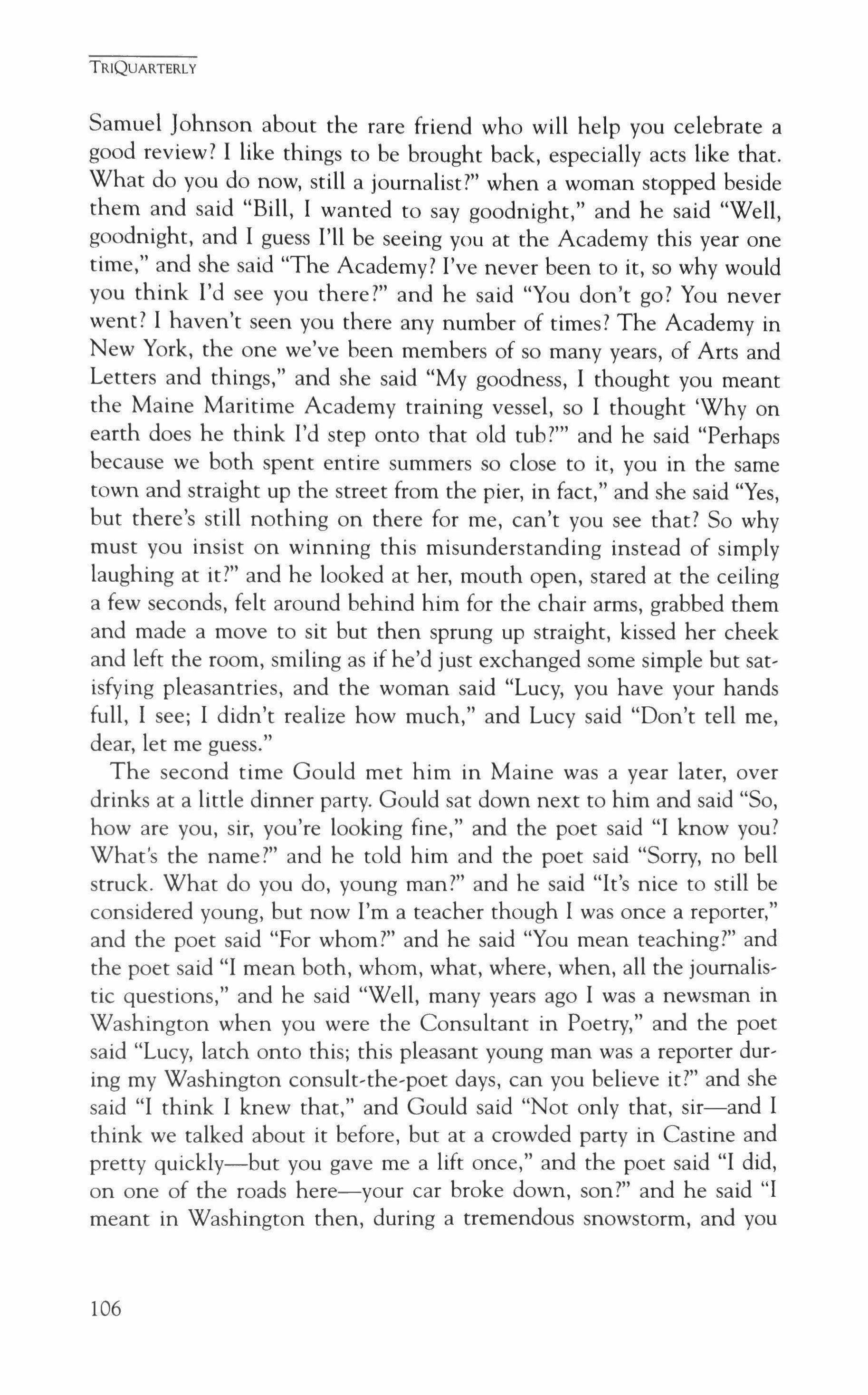
Samuel Johnson about the rare friend who will help you celebrate a good review? I like things to be brought back, especially acts like that. What do you do now, still a journalist?" when a woman stopped beside them and said "Bill, I wanted to say goodnight," and he said "Well, goodnight, and I guess I'll be seeing you at the Academy this year one time," and she said "The Academy? I've never been to it, so why would you think I'd see you there?" and he said "You don't go? You never went? I haven't seen you there any number of times? The Academy in New York, the one we've been members of so many years, of Arts and Letters and things," and she said "My goodness, I thought you meant the Maine Maritime Academy training vessel, so I thought 'Why on earth does he think I'd step onto that old tub?'" and he said "Perhaps because we both spent entire summers so close to it, you in the same town and straight up the street from the pier, in fact," and she said "Yes, but there's still nothing on there for me, can't you see that? So why must you insist on winning this misunderstanding instead of simply laughing at it?" and he looked at her, mouth open, stared at the ceiling a few seconds, felt around behind him for the chair arms, grabbed them and made a move to sit but then sprung up straight, kissed her cheek and left the room, smiling as if he'd just exchanged some simple but sat, isfying pleasantries, and the woman said "Lucy, you have your hands full, I see; I didn't realize how much," and Lucy said "Don't tell me, dear, let me guess."
The second time Gould met him in Maine was a year later, over drinks at a little dinner party. Gould sat down next to him and said "So, how are you, sir, you're looking fine," and the poet said "I know you? What's the name?" and he told him and the poet said "Sorry, no bell struck. What do you do, young man?" and he said "It's nice to still be considered young, but now I'm a teacher though I was once a reporter," and the poet said "For whom?" and he said "You mean teaching?" and the poet said "I mean both, whom, what, where, when, all the journalistic questions," and he said "Well, many years ago I was a newsman in Washington when you were the Consultant in Poetry," and the poet said "Lucy, latch onto this; this pleasant young man was a reporter during my Washington consult-the-poet days, can you believe it?" and she said "I think I knew that," and Gould said "Not only that, sir-and I think we talked about it before, but at a crowded party in Castine and pretty quickly-but you gave me a lift once," and the poet said "I did, on one of the roads here-your car broke down, son?" and he said "I meant in Washington then, during a tremendous snowstorm, and you
TRIQUARTERLY
106
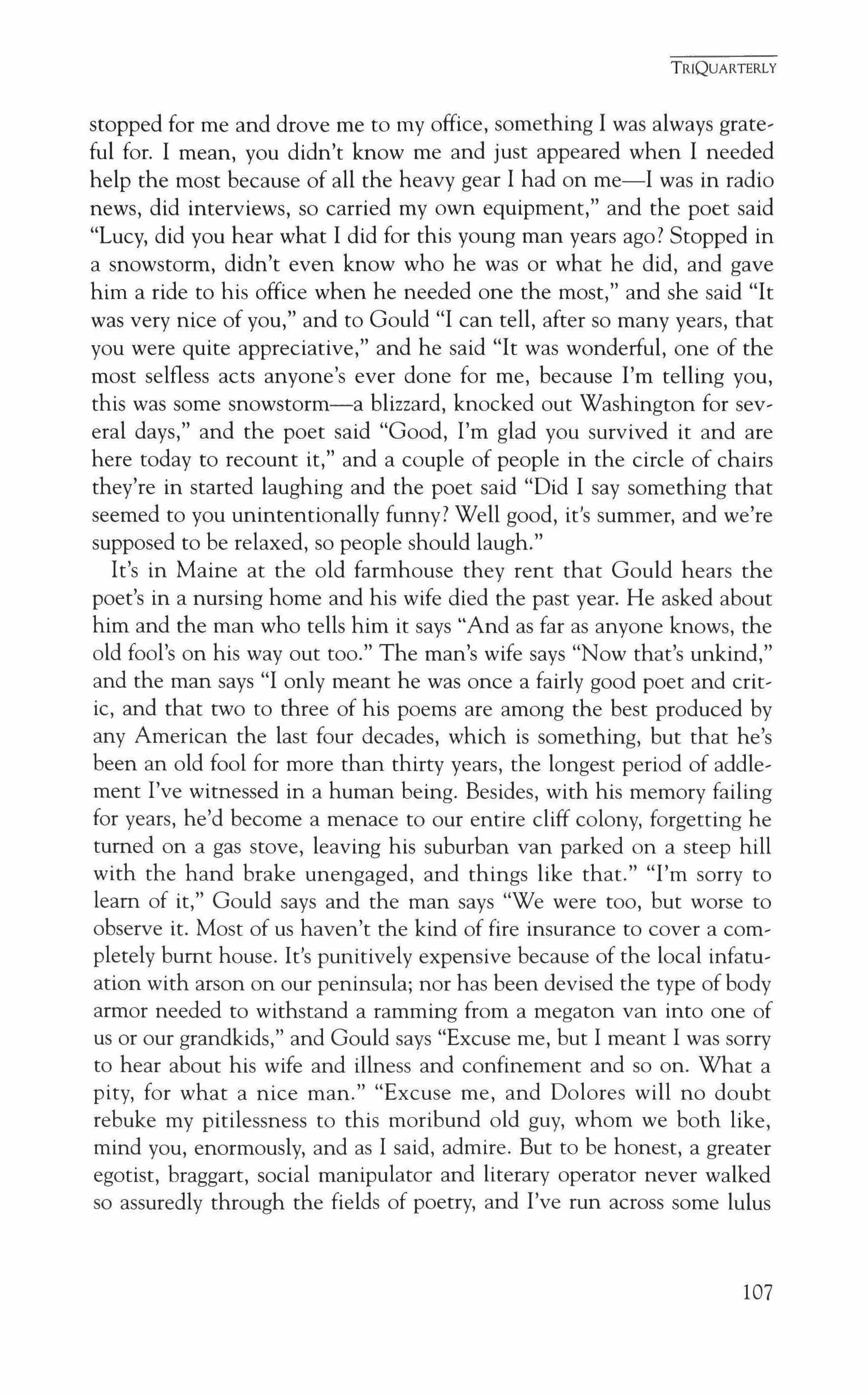
stopped for me and drove me to my office, something I was always grate, ful for. I mean, you didn't know me and just appeared when I needed help the most because of all the heavy gear I had on me-I was in radio news, did interviews, so carried my own equipment," and the poet said "Lucy, did you hear what I did for this young man years ago? Stopped in a snowstorm, didn't even know who he was or what he did, and gave him a ride to his office when he needed one the most," and she said "It was very nice of you," and to Gould "I can tell, after so many years, that you were quite appreciative," and he said "It was wonderful, one of the most selfless acts anyone's ever done for me, because I'm telling you, this was some snowstorm-a blizzard, knocked out Washington for several days," and the poet said "Good, I'm glad you survived it and are here today to recount it," and a couple of people in the circle of chairs they're in started laughing and the poet said "Did I say something that seemed to you unintentionally funny? Well good, it's summer, and we're supposed to be relaxed, so people should laugh."
It's in Maine at the old farmhouse they rent that Gould hears the poet's in a nursing home and his wife died the past year. He asked about him and the man who tells him it says "And as far as anyone knows, the old fool's on his way out too." The man's wife says "Now that's unkind," and the man says "I only meant he was once a fairly good poet and critic, and that two to three of his poems are among the best produced by any American the last four decades, which is something, but that he's been an old fool for more than thirty years, the longest period of addle, ment I've witnessed in a human being. Besides, with his memory failing for years, he'd become a menace to our entire cliff colony, forgetting he turned on a gas stove, leaving his suburban van parked on a steep hill with the hand brake unengaged, and things like that." "I'm sorry to learn of it," Gould says and the man says "We were too, but worse to observe it. Most of us haven't the kind of fire insurance to cover a com, pletely burnt house. It's punitively expensive because of the local infatuation with arson on our peninsula; nor has been devised the type of body armor needed to withstand a ramming from a megaton van into one of us or our grandkids," and Gould says "Excuse me, but I meant I was sorry to hear about his wife and illness and confinement and so on. What a pity, for what a nice man." "Excuse me, and Dolores will no doubt rebuke my pitilessness to this moribund old guy, whom we both like, mind you, enormously, and as I said, admire. But to be honest, a greater egotist, braggart, social manipulator and literary operator never walked so assuredly through the fields of poetry, and I've run across some lulus
TRIQUARTERLY
107

in my time. An example, and this also of his idiocy, for it didn't start when he first became senile, you know-" and his wife says "Now that's enough," and he says "No, let me finish, since I never could make any sense to Bill on this score, simply because he refused to see anything he'd done as wrong, no matter how inappropriate, ill-considered or just plain dumb it was. Once, an anthologist was putting together a book of poems by poets under forty. When our poet hears this, and he has his ears screwed into anything he thought could help his career, he contacts the anthologist and says 'Why haven't you asked me for any poems?' 'Because you're over forty,' the anthologist says; 'you're sixty-two.' This was a number of years ago, of course, though he never changed. And Bill's answer? 'So what? If you're compiling an anthology of contemporary American poetry I'd think you'd want my work in it, because who cares what age a poet is when you read his poems?' Does that make any sense to you? Are we talking of a truly great self-effacing unfinagling realistic guy?" and Gould says "He's, well yes, it doesn't make much sense-but still, and maybe this'll seem silly to you, but he once did something so wonderful for me that it's hard to think anything bad of him." He starts to tell the Washington story and the man says "I know, I was at some home up here when you gushed all over him in recapitulating it, but you must know that everyone has his three to four involuntary magnanimous acts to his credit, and Bill probably has a few more than that, and not just because he's survived past ninety, but listen to this," and he reels off a number of stories showing the poet manipulating people and institutions, "and I'm only going back fifty-some years, which is how long I know him," and Gould says "Still, you can't see what I'm saying? I'm sure there was this other good side to him. Not so much involuntary or momentarily magnanimous but downright selfless and big-hearted and generous. Going out of his way for a stranger when most people in the same situation-a blinding snowstorm, which also meant he couldn't have recognized me as the fellow who interviewed him months before. Ten inches on the ground, maybe another fifteen expected, and you're in your warm car with your warm pipe and you want to get to your warm home fast with maybe even a fireplace going? Risking your life, you can almost say-that's not so farfetched. The snow was piling up a couple of inches an hour and the car could skid, when if he didn't stop for me and take all the time it took to load my equipment up and drive me to my office, he might be able to make it home safely anyway, the chances of it would be better. But what did I start out saying? This other good side of him that I caught irnmedi-
TRIQUARTERLY
108

ately from that one situation and which I don't hear anything of in what you're saying about him over fifty years. And the interview he granted me when I first met him. That's what I meant about that he didn't recognize me at first. He didn't have to give it. I was a shrimp of a reporter and the news service I worked for was small too. And I should've got his press conference on tape when the other radio and TV guys did, if any of them-I forget-thought there was anything potential there to even attend it, but I asked him for an interview right after. I might even have given him some cock-and-bull story that my tape jammed. I did that then to get solo interviews-lied, finagled, cajoled, et cetera, all the things you said he did," and the man says "Sure he gave you an interview. For the fame, not because of your cajolery. When Bill saw a newsman's tape recorder and mike, he saw an audience of millions and possible book buyers and poetry reading invitations and so forth. I bet you even had him read a few of his poems for radio," and Gould says "I think I did; it's what I normally would have done for an interview like that with someone in his position," and the man says "That's my point. The regular press conference was what came with the turf of being introduced as the new poetry consultant, but your solo with him was gravy that made him giddy. You showed him individual attention that also had a good chance of being on radio for a lot more time than a news report of the pro forma press conference," and he says "But if I remember, he told me to come back anytime for a coffee and chat but not to bring my tape recorder. So if that's the case-" and the man says "Ah, come on, he was only trying to show he was more interested in you than what you could do for him. But you probably would have brought your tape recorder and he would have seen it and somehow worked you around where he ended up gladly giving you another interview," and Gould says "No, I'm not getting through to you and you really can't change my initial opinion of him, though you have opened me up to him a little, mostly because I didn't know him. Anyway, he did a wonderful thing for me and I just wish everyone would do things like that for people in similar situations, and I also feel lousy about the condition he's in now," and the man says "That's not the question; we all do."
TRIQUARTERLY
109
Two Poems
Jason Sommer

Other People's Troubles
The Jewish parable goes that in the waiting room where all souls come, they leave a bundle of their troubles on hooks. At their return, emerging from interviews, they eye the parcels hung in hundreds on the walls with care, and take their own.
*
Trash night, curbside sits a little sofa meant for the taking, no one around even to see our need. A few speculatable stains, though in the abstract forest on its cover, shadows turn out to be not impeded streetlight but the body's unguent, armrests oiled by arms. We leave the sofa there, sturdy and recoverable, life in it yet.
*
TRIQUARTERLY
110
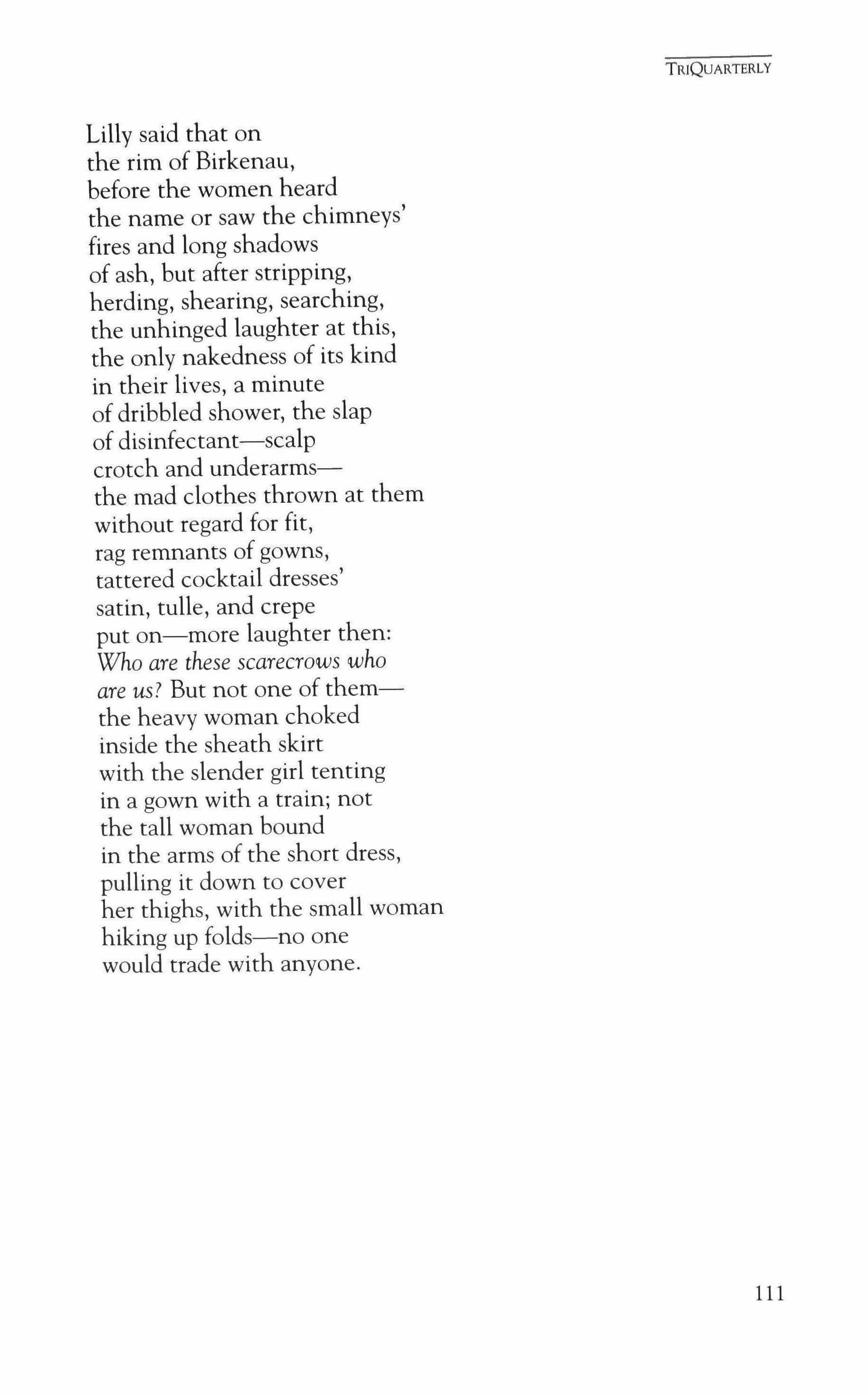
Lilly said that on the rim of Birkenau, before the women heard the name or saw the chimneys' fires and long shadows of ash, but after stripping, herding, shearing, searching, the unhinged laughter at this, the only nakedness of its kind in their lives, a minute of dribbled shower, the slap of disinfectant-scalp crotch and underarmsthe mad clothes thrown at them without regard for fit, rag remnants of gowns, tattered cocktail dresses' satin, tulle, and crepe put on-more laughter then: Who are these scarecrows who are us? But not one of themthe heavy woman choked inside the sheath skirt with the slender girl tenting in a gown with a train; not the tall woman bound in the arms of the short dress, pulling it down to cover her thighs, with the small woman hiking up folds-no one would trade with anyone.
TRIQUARTERLY
111
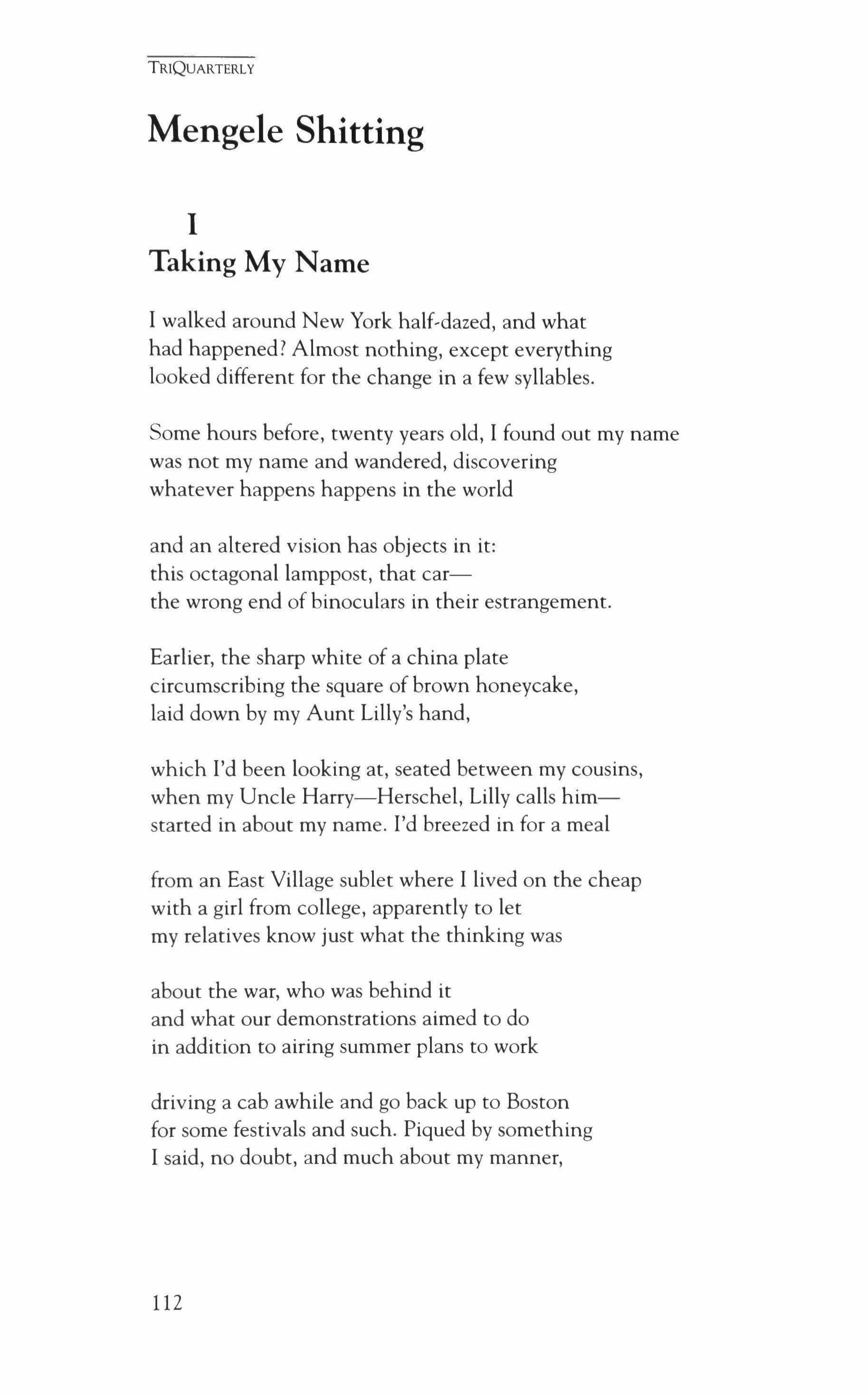
Mengele Shitting
I Taking My Name
I walked around New York half-dazed, and what had happened? Almost nothing, except everything looked different for the change in a few syllables.
Some hours before, twenty years old, I found out my name was not my name and wandered, discovering whatever happens happens in the world
and an altered vision has objects in it: this octagonal lamppost, that carthe wrong end of binoculars in their estrangement.
Earlier, the sharp white of a china plate circumscribing the square of brown honeycake, laid down by my Aunt Lilly's hand,
which I'd been looking at, seated between my cousins, when my Uncle Harry-Herschel, Lilly calls himstarted in about my name. I'd breezed in for a meal
from an East Village sublet where I lived on the cheap with a girl from college, apparently to let my relatives know just what the thinking was
about the war, who was behind it and what our demonstrations aimed to do in addition to airing summer plans to work
driving a cab awhile and go back up to Boston for some festivals and such. Piqued by something I said, no doubt, and much about my manner,
TRIQUARTERLY
112
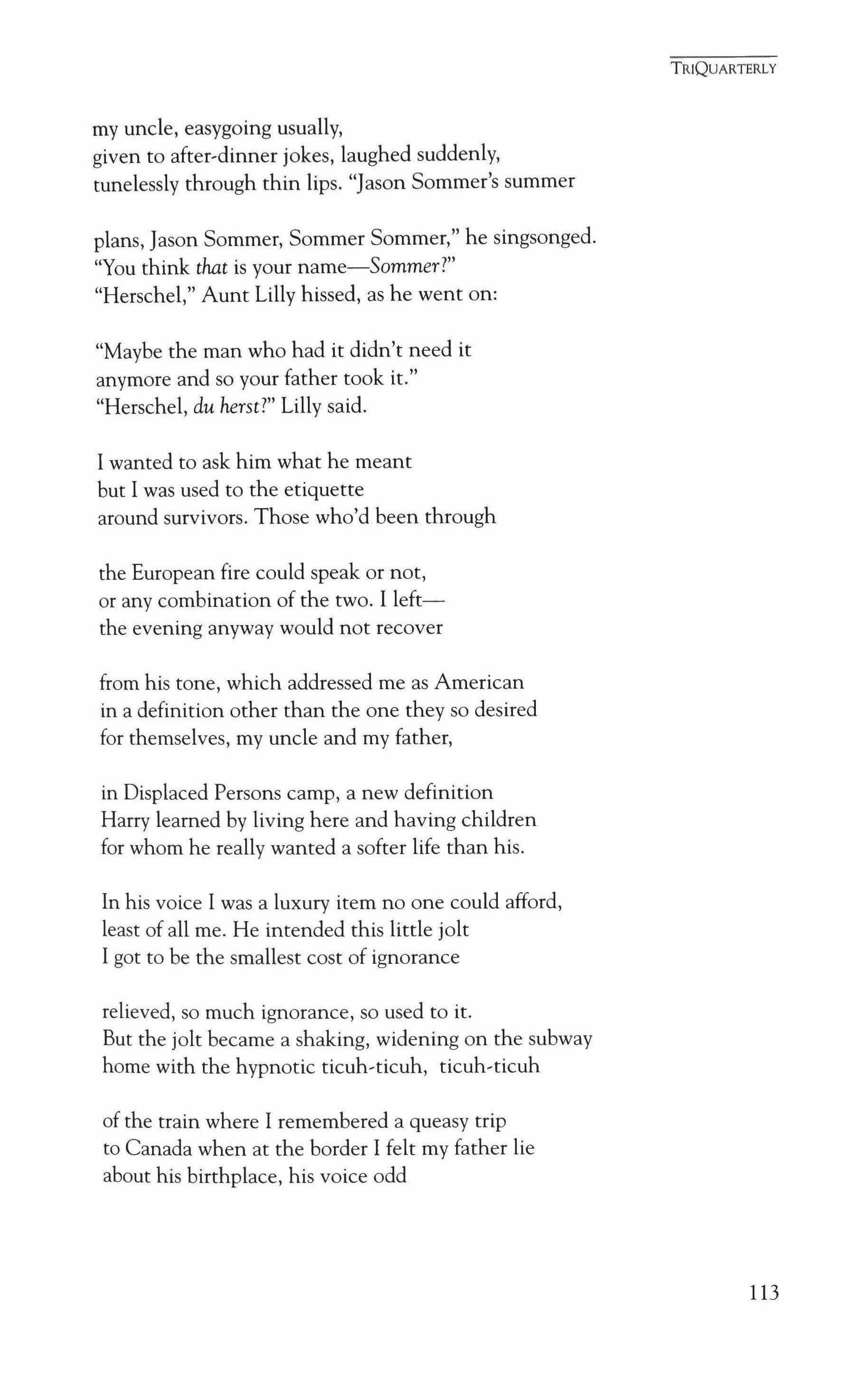
my uncle, easygoing usually, given to after-dinner jokes, laughed suddenly, tunelessly through thin lips. "Jason Sommer's summer
plans, Jason Sommer, Sommer Sommer," he singsonged.
"You think that is your name-Sommer!"
"Herschel," Aunt Lilly hissed, as he went on:
"Maybe the man who had it didn't need it anymore and so your father took it."
"Herschel, du herst!" Lilly said.
I wanted to ask him what he meant but I was used to the etiquette around survivors. Those who'd been through the European fire could speak or not, or any combination of the two. I leftthe evening anyway would not recover
from his tone, which addressed me as American in a definition other than the one they so desired for themselves, my uncle and my father,
in Displaced Persons camp, a new definition Harry learned by living here and having children for whom he really wanted a softer life than his.
In his voice I was a luxury item no one could afford, least of all me. He intended this little jolt I got to be the smallest cost of ignorance
relieved, so much ignorance, so used to it.
But the jolt became a shaking, widening on the subway home with the hypnotic ticuh-ticuh, ticuh-ticuh
of the train where I remembered a queasy trip to Canada when at the border I felt my father lie about his birthplace, his voice odd
TRIQUARTERLY 113
TRIQUARTERLY
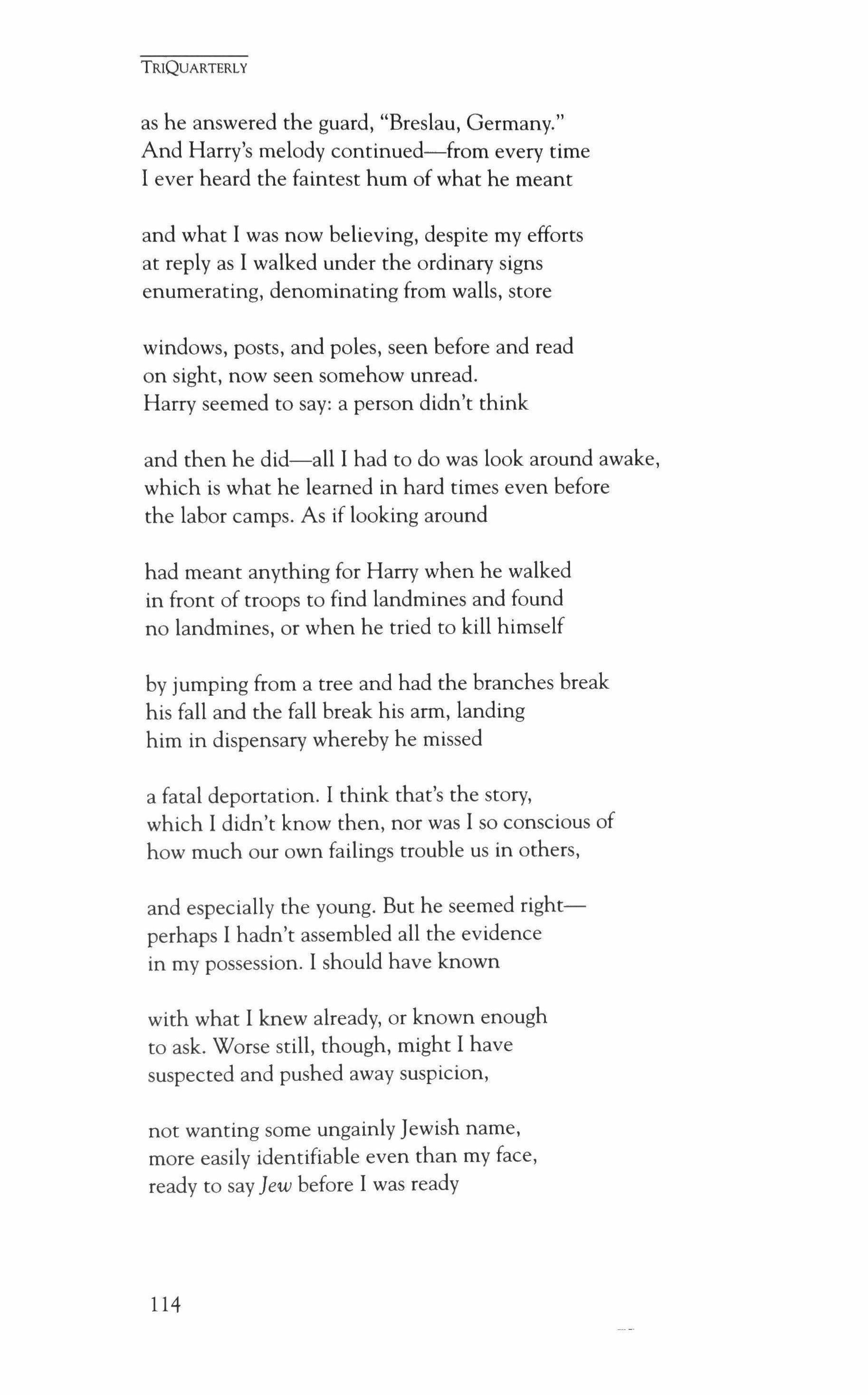
as he answered the guard, "Breslau, Germany." And Harry's melody continued-from every time I ever heard the faintest hum of what he meant
and what I was now believing, despite my efforts at reply as I walked under the ordinary signs enumerating, denominating from walls, store windows, posts, and poles, seen before and read on sight, now seen somehow unread. Harry seemed to say: a person didn't think and then he did-all I had to do was look around awake, which is what he learned in hard times even before the labor camps. As if looking around had meant anything for Harry when he walked in front of troops to find landmines and found no landmines, or when he tried to kill himself by jumping from a tree and had the branches break his fall and the fall break his arm, landing him in dispensary whereby he missed
a fatal deportation. I think that's the story, which I didn't know then, nor was I so conscious of how much our own failings trouble us in others, and especially the young. But he seemed rightperhaps I hadn't assembled all the evidence in my possession. I should have known with what I knew already, or known enough to ask. Worse still, though, might I have suspected and pushed away suspicion, not wanting some ungainly Jewish name, more easily identifiable even than my face, ready to say Jew before I was ready
114

to say it? Though I was not in hiding, or trying for safe haven as far as I am aware, I also had an alias instead of another name,
more frankly Jewish-sounding, an alias that properly pronounced sounds German, is German.
For days after I wasn't who I thought I was or said I was aloud, at last only curious to know how many times I would have to see what was familiar before it became familiar once again, when I could stop staring at the edges of things till they shone, outlined in a buzzing light.
Too much trouble to be dizzy with it always, I might as well have said some peculiarity in the light of streetlamps, storefront neon, sun or moon
combined with nerves to account for the effect, let light be light, lamppost, lamppost. It will do if you can get others to agree that that's the story.
Last year a river flooded through a graveyard. The bodies, washed away from their stones, recovered one by one, massed in an unrecoverable
anonymity. The body can shift past its name or be shifted as mine was. If it happens it happens to anyone, and I think now I was fortunate
to discover that my name was not mine as an absolute possession, to be refreshed in the knowledge
that what has been given me is given in the grant of other people's survival, hard-won and conferring on them
TRIQUARTERLY 115
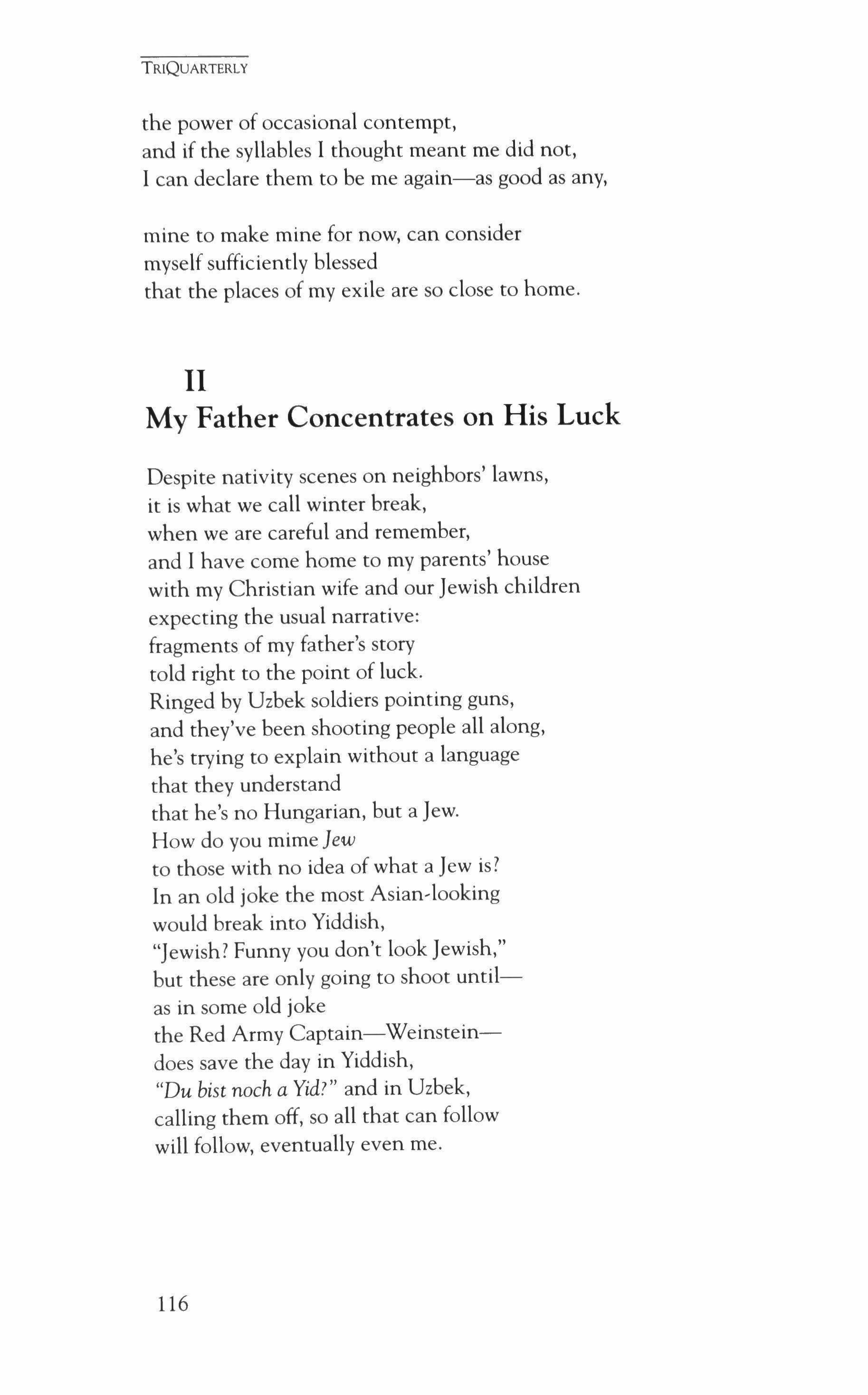
the power of occasional contempt, and if the syllables I thought meant me did not, I can declare them to be me again-as good as any,
mine to make mine for now, can consider myselfsufficiently blessed that the places of my exile are so close to home.
II
My Father Concentrates on His Luck
Despite nativity scenes on neighbors' lawns, it is what we call winter break, when we are careful and remember, and I have come home to my parents' house with my Christian wife and our Jewish children expecting the usual narrative: fragments of my father's story told right to the point of luck.
Ringed by Uzbek soldiers pointing guns, and they've been shooting people all along, he's trying to explain without a language that they understand that he's no Hungarian, but a Jew. How do you mime Jew to those with no idea of what a Jew is? In an old joke the most Asian-looking would break into Yiddish, "Jewish? Funny you don't look Jewish," but these are only going to shoot untilas in some old joke the Red Army Captain-Weinsteindoes save the day in Yiddish, "Du bist noch a Yid!" and in Uzbek, calling them off, so all that can follow will follow, eventually even me.
TRIQUARTERLY
116
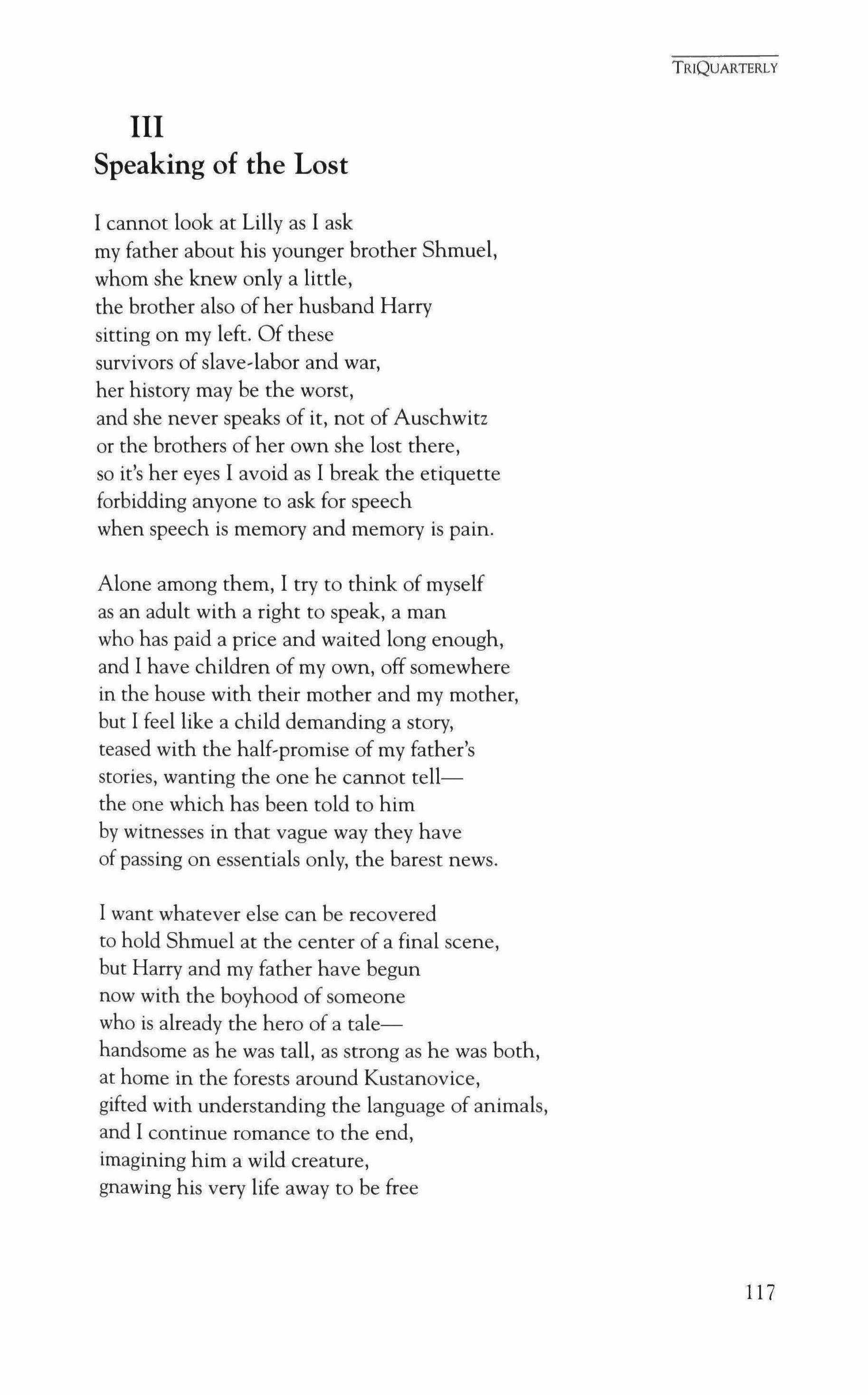
Speaking of the Lost
I cannot look at Lilly as I ask my father about his younger brother Shmuel, whom she knew only a little, the brother also of her husband Harry sitting on my left. Of these survivors of slave-labor and war, her history may be the worst, and she never speaks of it, not of Auschwitz or the brothers of her own she lost there, so it's her eyes I avoid as I break the etiquette forbidding anyone to ask for speech when speech is memory and memory is pain.
Alone among them, I try to think of myself as an adult with a right to speak, a man who has paid a price and waited long enough, and I have children of my own, off somewhere in the house with their mother and my mother, but I feel like a child demanding a story, teased with the half-promise of my father's stories, wanting the one he cannot tellthe one which has been told to him by witnesses in that vague way they have of passing on essentials only, the barest news.
I want whatever else can be recovered to hold Shmuel at the center of a final scene, but Harry and my father have begun now with the boyhood of someone who is already the hero of a talehandsome as he was tall, as strong as he was both, at home in the forests around Kustanovice, gifted with understanding the language of animals, and I continue romance to the end, imagining him a wild creature, gnawing his very life away to be free
TRIQUARTERLY III
117
TRIQUARTERLY
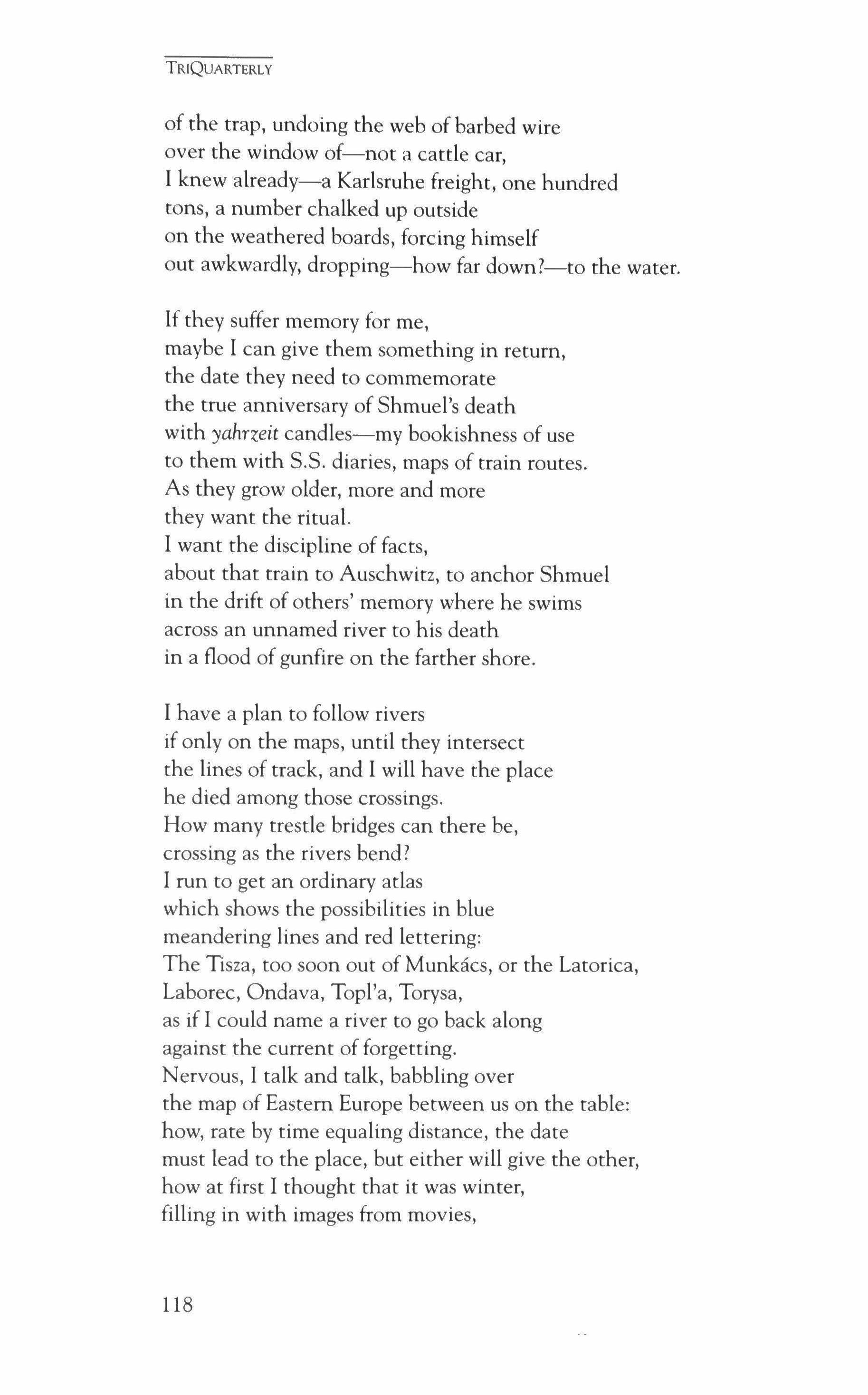
of the trap, undoing the web of barbed wire over the window of-not a cattle car, I knew already-a Karlsruhe freight, one hundred tons, a number chalked up outside on the weathered boards, forcing himself out awkwardly, dropping-how far down?-to the water.
If they suffer memory for me, maybe I can give them something in return, the date they need to commemorate the true anniversary of Shmuel's death with yahrzeit candles-my bookishness of use to them with S.S. diaries, maps of train routes. As they grow older, more and more they want the ritual.
I want the discipline of facts, about that train to Auschwitz, to anchor Shmuel in the drift of others' memory where he swims across an unnamed river to his death in a flood of gunfire on the farther shore.
I have a plan to follow rivers if only on the maps, until they intersect the lines of track, and I will have the place he died among those crossings. How many trestle bridges can there be, crossing as the rivers bend?
I run to get an ordinary atlas which shows the possibilities in blue meandering lines and red lettering: The Tisza, too soon out of Munkacs, or the Latorica, Laborec, Ondava, Topl'a, Torysa, as if I could name a river to go back along against the current of forgetting. Nervous, I talk and talk, babbling over the map of Eastern Europe between us on the table: how, rate by time equaling distance, the date must lead to the place, but either will give the other, how at first I thought that it was winter, filling in with images from movies,
118
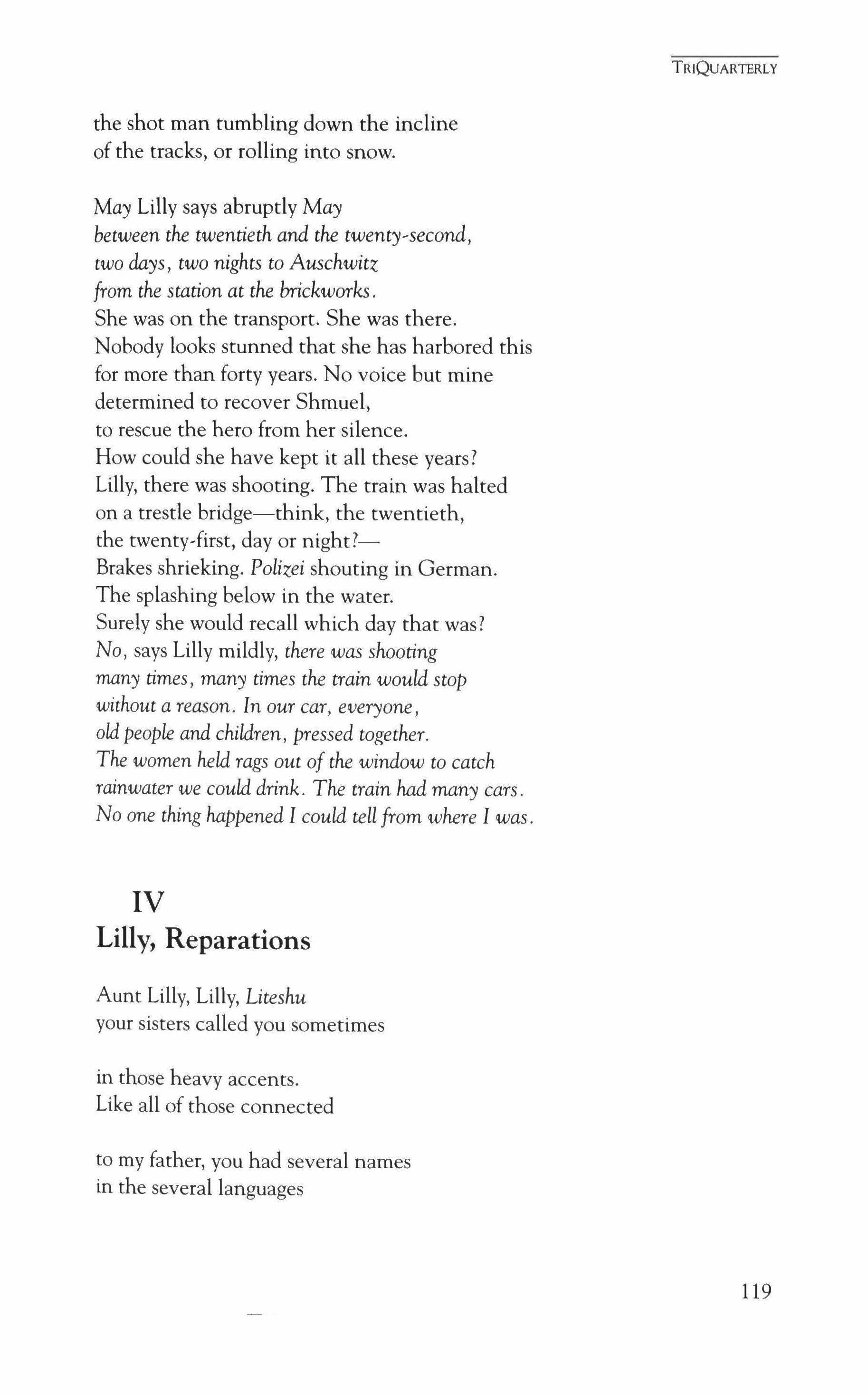
the shot man tumbling down the incline of the tracks, or rolling into snow.
May Lilly says abruptly May between the twentieth and the twenty�second, two days, two nights to Auschwitz from the station at the brickworks. She was on the transport. She was there. Nobody looks stunned that she has harbored this for more than forty years. No voice but mine determined to recover Shmuel, to rescue the hero from her silence. How could she have kept it all these years? Lilly, there was shooting. The train was halted on a trestle bridge-think, the twentieth, the twenty-first, day or night?Brakes shrieking. Polizei shouting in German. The splashing below in the water. Surely she would recall which day that was? No, says Lilly mildly, there was shooting many times, many times the train would stop without a reason. In our car, everyone, old people and children, pressed together. The women held rags out of the window to catch rainwater we could drink. The train had many cars. No one thing happened I could tell from where I was.
IV Lilly, Reparations
Aunt Lilly, Lilly, Liteshu your sisters called you sometimes in those heavy accents. Like all of those connected to my father, you had several names in the several languages
TRIQUARTERLY
119
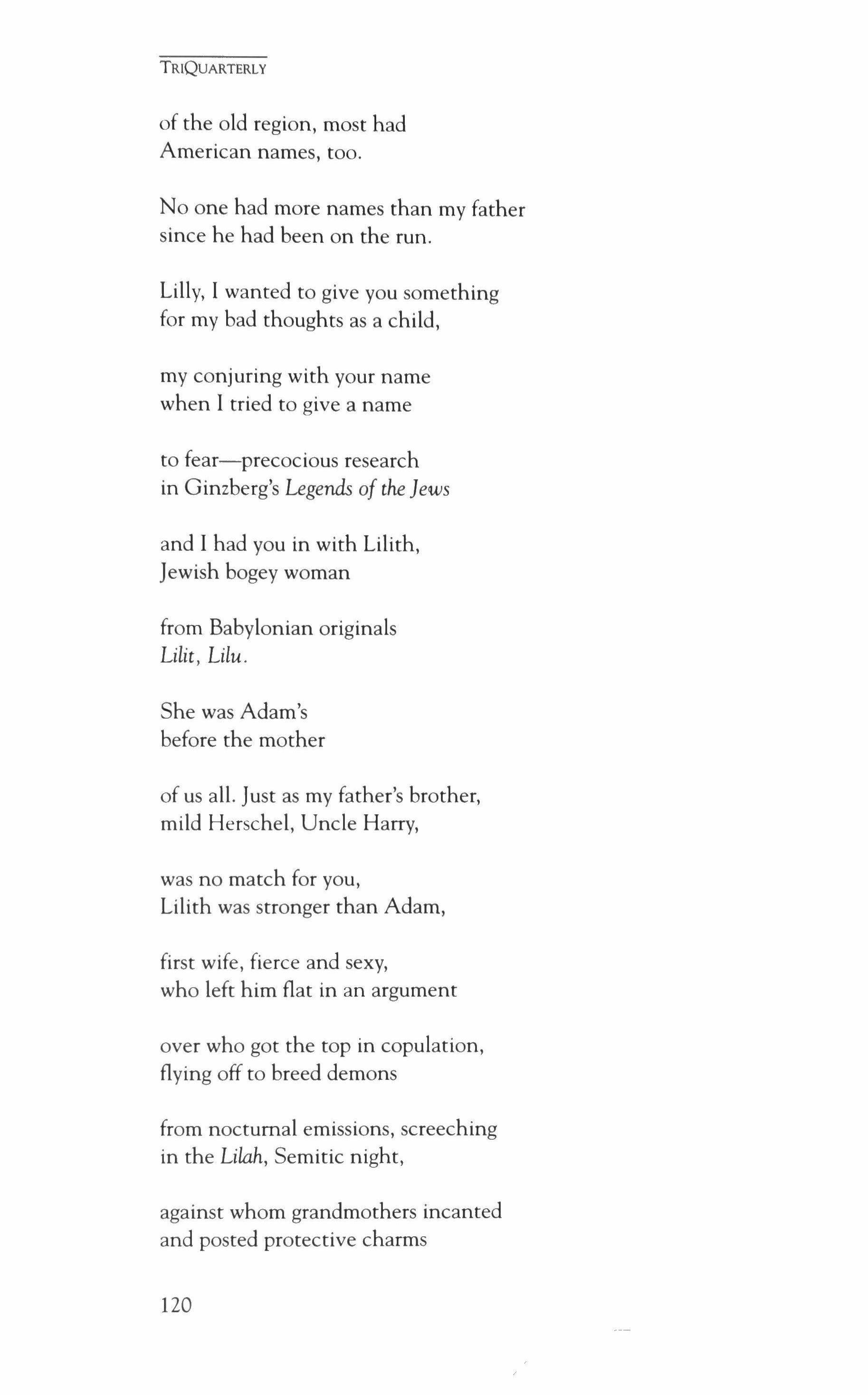
of the old region, most had American names, too.
No one had more names than my father since he had been on the run.
Lilly, I wanted to give you something for my bad thoughts as a child,
my conjuring with your name when I tried to give a name to fear-precocious research in Ginzberg's Legends of the Jews and I had you in with Lilith, Jewish bogey woman from Babylonian originals Lilit, Lilu.
She was Adam's before the mother
of us all. Just as my father's brother, mild Herschel, Uncle Harry,
was no match for you, Lilith was stronger than Adam, first wife, fierce and sexy, who left him flat in an argument
over who got the top in copulation, flying off to breed demons from nocturnal emissions, screeching in the Lilah, Semitic night, against whom grandmothers incanted and posted protective charms
TRIQUARTERLY
120

to save the infants over whom she had power.
* * *
1 thought you might kill children, you had such anger. Shmutz! Shmutz! You screamed down the street at your son Steven who would pick up junk from the gutter or the garbage cans-
an oily piece of a sparkplug, smacked from his handDirt! Dirt!the guts of a music box, the head of a doll, lead weights inside to tip the eyes open and shut.
1 took things from him, anyone could. He was available to force, one of those people who limply allowed so much it was a challenge not to bully him.
He was a version of what 1 would understand a Jew to be. His may have been the first life in which I was a bystander. The two of us, small boys, the women chattering away around us on the sidewalk of St. John's Place in Brooklyn. You took him between parked cars-
TRIQUARTERLY
121

the matter-of-fact, casual power of it!down with his pants, you tickled his penis and he peed.
* * *
Something was owed you for what had been taken, and what had been taken?
Your mother and father, four brothers, grandparents, uncles, aunts, cousins, most of the family and every thing, any love that might be unafraid, the momentum of the everyday, sleeping along too deeply even to dream catastrophe. What was owed in compensation, then?
Whatever could be restored. Your sisters. Whatever came after that would compensate. A husband from a fiance who survived,
children to be named for the dead. Who owed it? God, the Germans, the children themselves.
Was it paid? Herschel returned, the Germans gave some money, children were given, and given the names of the dead. No.
* * *
I, too, have something insufficient to give, a complicated gift likely to give offense,
TRIQUARTERLY
122
or perhaps no gift at all since I hope you'll never see these words. Your pardon, Lilly, anyway for bringing these things up again, also for retelling what you know better than anyone, out here where others listen, as if it were something of my own.
But what I have for you that you will not have heard, even if you kept up with news disinterred about the camps, a dark gleam of shards embedded in the midden of the rest, concerns the later life of the murderous Doctor Mengele who selected you for life on the ramp at Auschwitz-Birkenau
within several moments of sending to the gas your parents and small brother. I have the story from a dear man, the most reliable of witnesses, who has held Mengele's bones in his own handsthe bastard is dead, Lilly, the best evidence indicates. The bastard. The monster.
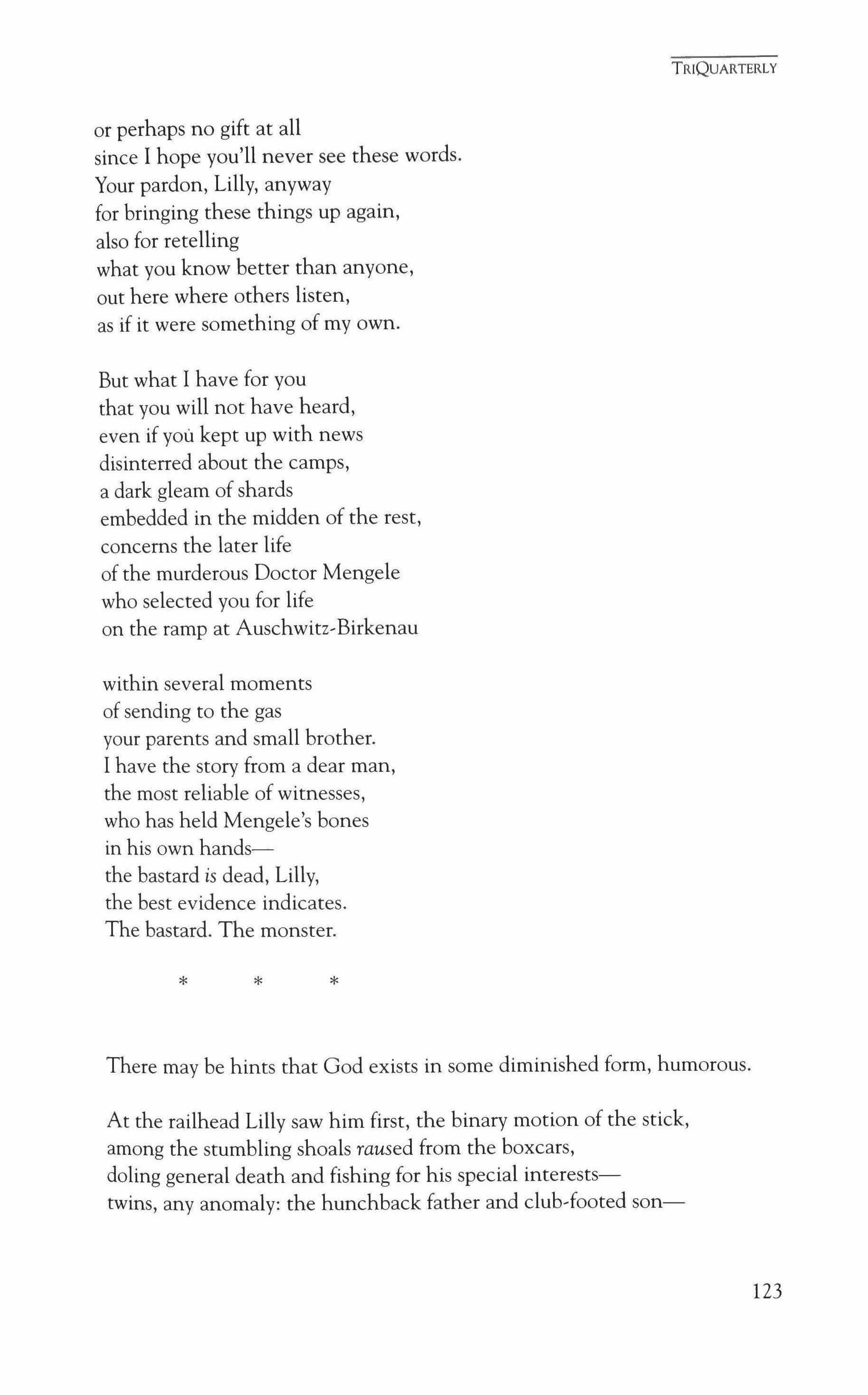
There may be hints that God exists in some diminished form, humorous.
At the railhead Lilly saw him first, the binary motion of the stick, among the stumbling shoals raused from the boxcars, doling general death and fishing for his special intereststwins, any anomaly: the hunchback father and club-footed son-
TRIQUARTERLY
* * *
123
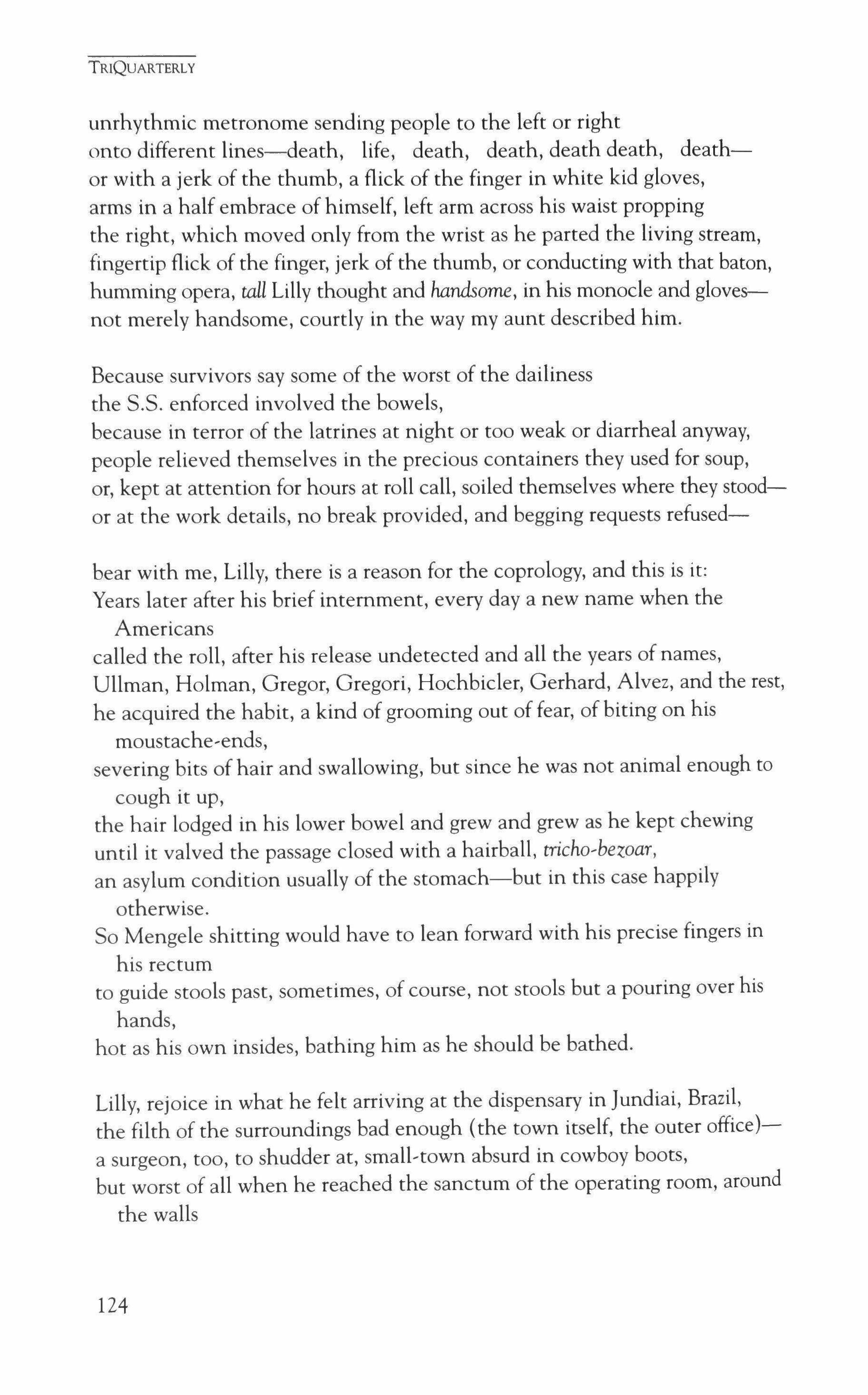
unrhythmic metronome sending people to the left or right onto different lines-death, life, death, death, death death, deathor with a jerk of the thumb, a flick of the finger in white kid gloves, arms in a half embrace of himself, left arm across his waist propping the right, which moved only from the wrist as he parted the living stream, fingertip flick of the finger, jerk of the thumb, or conducting with that baton, humming opera, tall Lilly thought and handsome, in his monocle and glovesnot merely handsome, courtly in the way my aunt described him.
Because survivors say some of the worst of the dailiness the S.S. enforced involved the bowels, because in terror of the latrines at night or too weak or diarrheal anyway, people relieved themselves in the precious containers they used for soup, or, kept at attention for hours at roll call, soiled themselves where they stoodor at the work details, no break provided, and begging requests refusedbear with me, Lilly, there is a reason for the coprology, and this is it:
Years later after his brief internment, every day a new name when the Americans called the roll, after his release undetected and all the years of names, Ullman, Holman, Gregor, Gregori, Hochbicler, Gerhard, Alvez, and the rest, he acquired the habit, a kind of grooming out of fear, of biting on his moustache-ends, severing bits ofhair and swallowing, but since he was not animal enough to cough it up, the hair lodged in his lower bowel and grew and grew as he kept chewing until it valved the passage closed with a hairball, tricho-bezoar, an asylum condition usually of the stomach-but in this case happily otherwise.
So Mengele shirting would have to lean forward with his precise fingers in his rectum to guide stools past, sometimes, of course, not stools but a pouring over his hands, hot as his own insides, bathing him as he should be bathed.
Lilly, rejoice in what he felt arriving at the dispensary in jundiai, Brazil, the filth of the surroundings bad enough (the town itself, the outer office)a surgeon, too, to shudder at, small-town absurd in cowboy boots, but worst of all when he reached the sanctum of the operating room, around the walls
TRIQUARTERLY
124

he saw disposable rubber gloves adhering to tiles, drying for re-use. But he had little choice. Here he would be cut open to get at what he thought was cancer.
So, Lilly, a kind of symmetry that will pass for justice in its absence, irony's schadenfreude, ours by interpretation of what occurs, as good as construing Providence out of the luck of chance survivalyours, say, Harry's, or my father's---or constructing a God who happens to care for some and takes care of others with a little quittance. In Dante effluvia doesn't seem that much, serious enough for the InfemoCanto 18, Ring 8, Trench 2-frauds swim it. Who would wish for hell just to have Mengele in it? What Mengele did was not done to him, nothing was done to him by anyone, but he was unhappy, abandoned, fearful, startled at the least sound: a car backfiring, being addressed by someone unexpectedlya small hell in the body, such as the innocent also experience, and that hand which motioned thousands toward death, those fingers reaching up his ass for years, this thing I tell you that few people know.
TRIQUARTERLY
125
Two Poems
Heather Smith
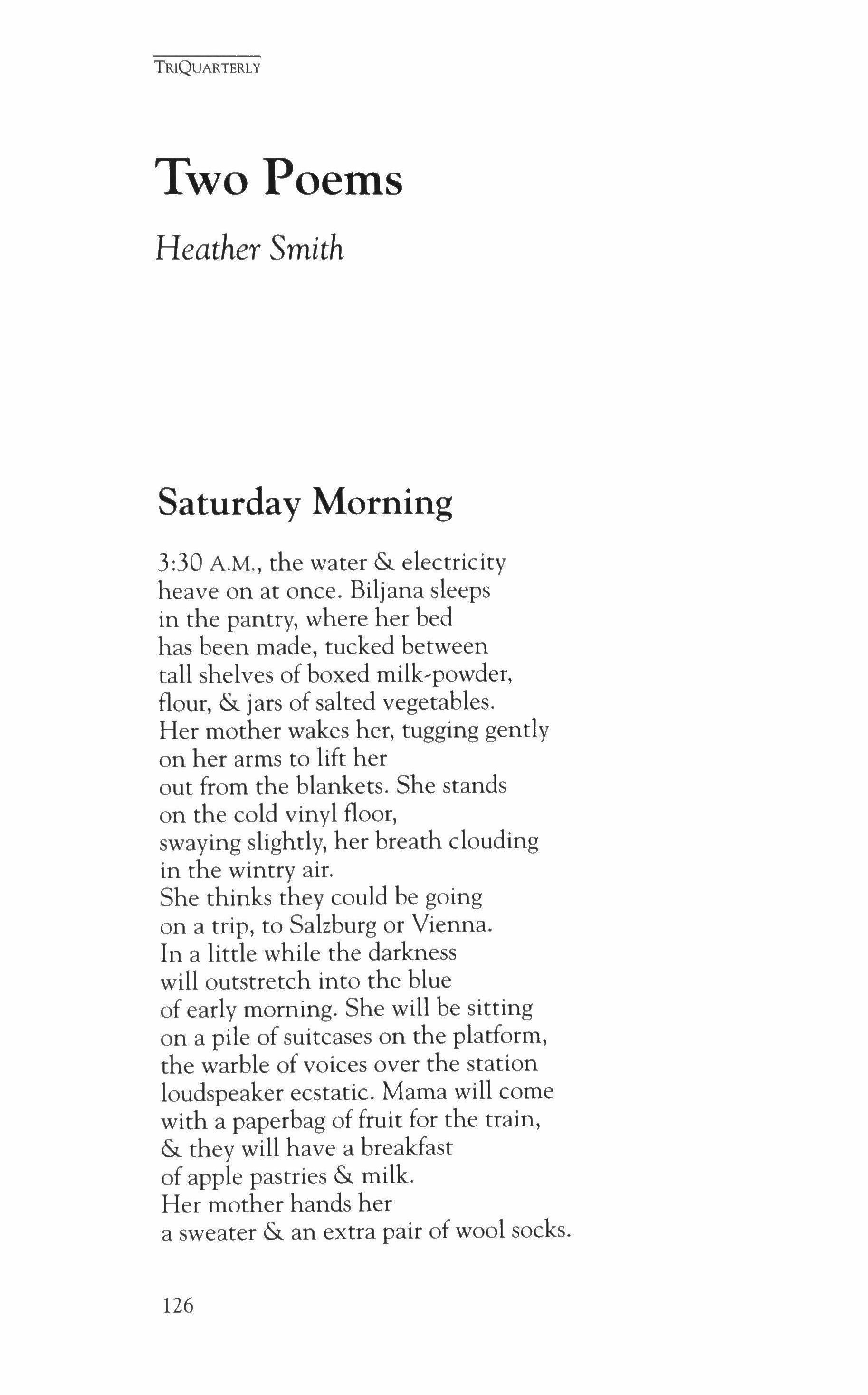
Saturday Morning
3:30 A.M., the water & electricity heave on at once. Biljana sleeps in the pantry, where her bed has been made, tucked between tall shelves of boxed milk-powder, flour, & jars of salted vegetables. Her mother wakes her, tugging gently on her arms to lift her out from the blankets. She stands on the cold vinyl floor, swaying slightly, her breath clouding in the wintry air. She thinks they could be going on a trip, to Salzburg or Vienna. In a little while the darkness will outstretch into the blue of early morning. She will be sitting on a pile of suitcases on the platform, the warble of voices over the station loudspeaker ecstatic. Mama will come with a paperbag of fruit for the train, & they will have a breakfast of apple pastries & milk. Her mother hands her a sweater & an extra pair of wool socks.
TRIQUARTERLY
126
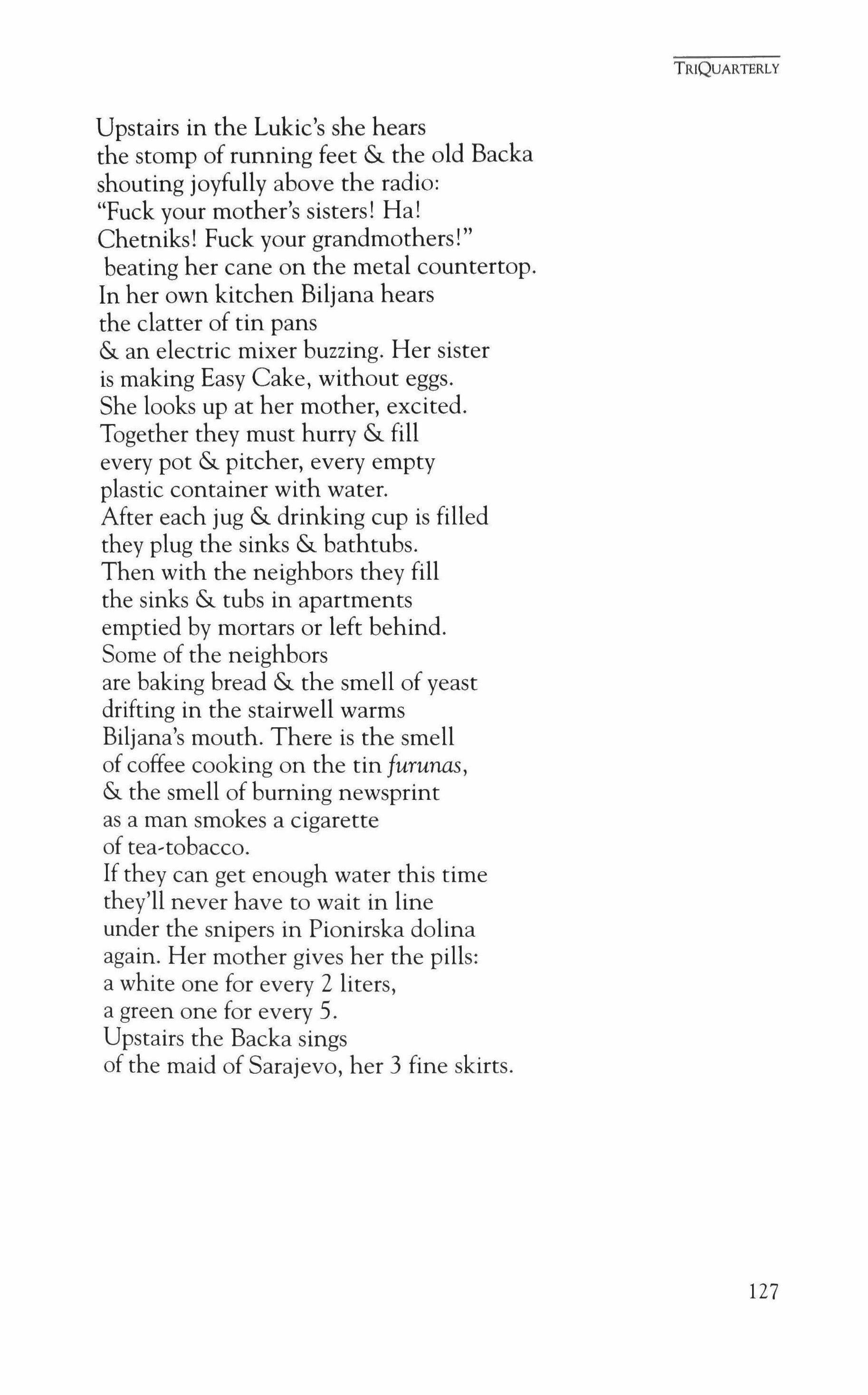
Upstairs in the Lukic's she hears the stomp of running feet & the old Backa shouting joyfully above the radio: "Fuck your mother's sisters! Ha! Chetniks! Fuck your grandmothers!" beating her cane on the metal countertop. In her own kitchen Biljana hears the clatter of tin pans & an electric mixer buzzing. Her sister is making Easy Cake, without eggs. She looks up at her mother, excited. Together they must hurry & fill every pot & pitcher, every empty plastic container with water. After each jug & drinking cup is filled they plug the sinks & bathtubs. Then with the neighbors they fill the sinks & tubs in apartments emptied by mortars or left behind. Some of the neighbors are baking bread & the smell of yeast drifting in the stairwell warms Biljana's mouth. There is the smell of coffee cooking on the tin furunas, & the smell of burning newsprint as a man smokes a cigarette of tea-tobacco. If they can get enough water this time they'll never have to wait in line under the snipers in Pionirska dolina again. Her mother gives her the pills: a white one for every 2 liters, a green one for every 5. Upstairs the Backa sings of the maid of Sarajevo, her 3 fine skirts.
TRIQUARTERLY
127
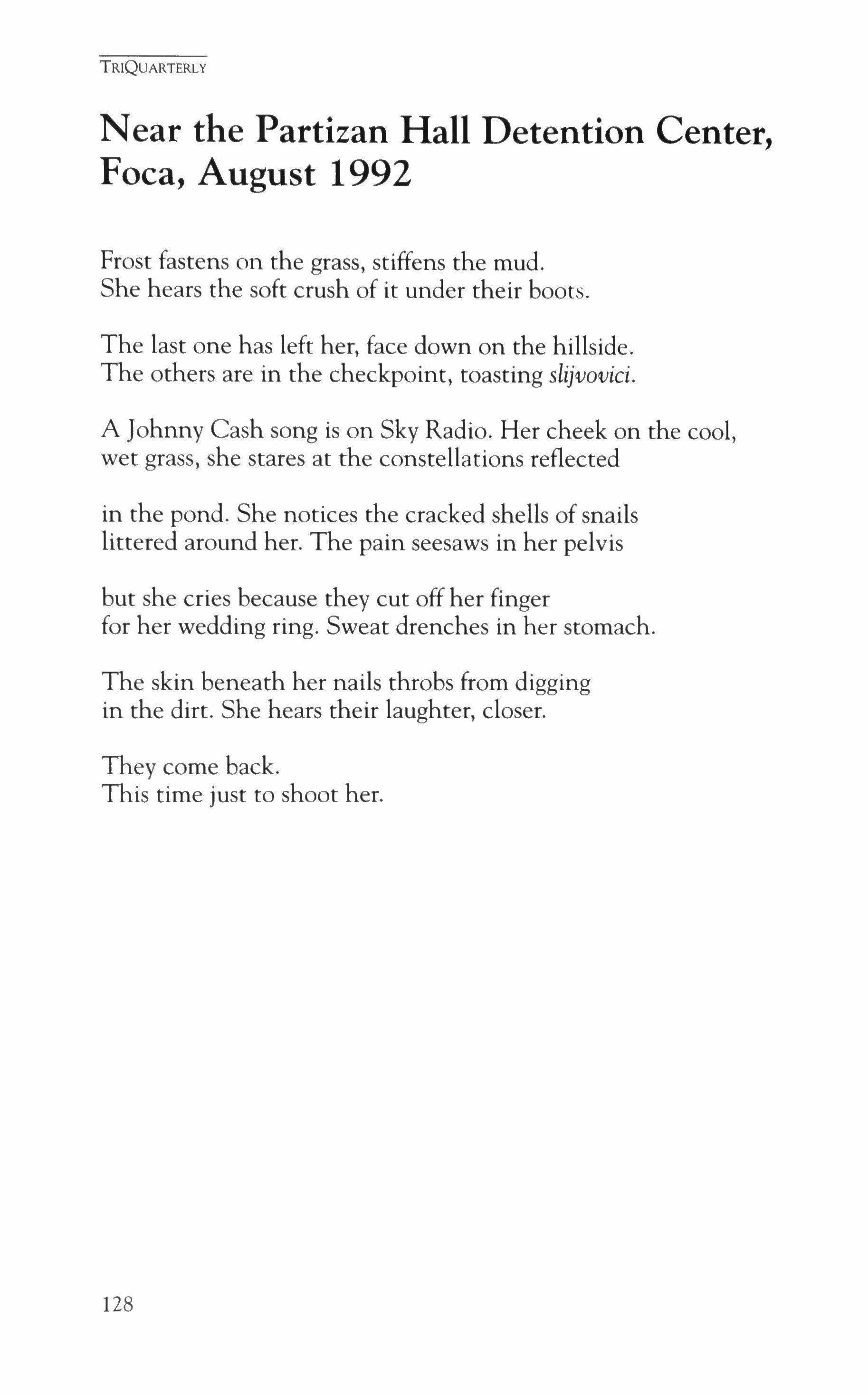
Near the Partizan Hall Detention Center, Foca, August 1992
Frost fastens on the grass, stiffens the mud. She hears the soft crush of it under their boots.
The last one has left her, face down on the hillside. The others are in the checkpoint, toasting slijvovici.
A Johnny Cash song is on Sky Radio. Her cheek on the cool, wet grass, she stares at the constellations reflected in the pond. She notices the cracked shells of snails littered around her. The pain seesaws in her pelvis
but she cries because they cut off her finger for her wedding ring. Sweat drenches in her stomach.
The skin beneath her nails throbs from digging in the dirt. She hears their laughter, closer.
They come back. This time just to shoot her.
TR1QUARTERLY
128
Comings and Goings (Bangkok)
Pimone Triplett
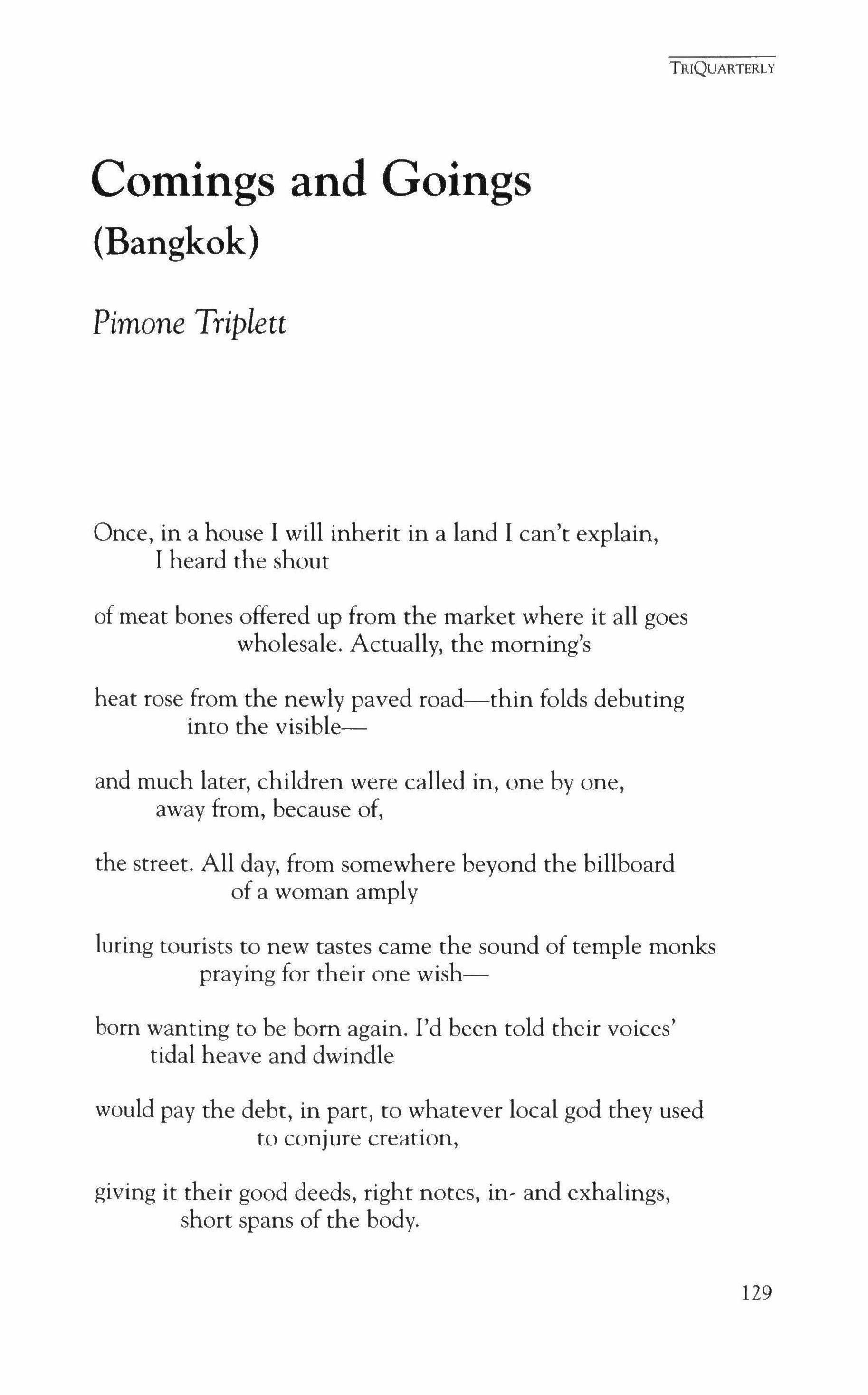
Once, in a house I will inherit in a land I can't explain, I heard the shout of meat bones offered up from the market where it all goes wholesale. Actually, the morning's heat rose from the newly paved road-thin folds debuting into the visibleand much later, children were called in, one by one, away from, because of, the street. All day, from somewhere beyond the billboard of a woman amply luring tourists to new tastes came the sound of temple monks praying for their one wishborn wanting to be born again. I'd been told their voices' tidal heave and dwindle would pay the debt, in part, to whatever local god they used to conjure creation, giving it their good deeds, right notes, in- and exhalings, short spans of the body.
TRIQUARTERLY
129

Meanwhile, this week in this world, a mound of sludge and leaf rot caught behind the house is,
over a week's time, veiled and parceled out among the red ants. And still
the black flies keep entering and exiting the air above the table's day-old
bowl ofplums. I'd like to know how it's good, or enough, for anyonethis small rush into the sickly sweet, these brief becomings, part of the increase we call material
Since there's also the ten-year-old girl I recognize and hardly know, the one who's hired to sweep and clean, to rid us of the dirt tracked in, and bundled out, finding the floor's small shames. Dust clumps,
carpet threads, the bits of fallen meat scraps, all the Svshaped hair that daily, secretly
escaped. What can she inherit in this country where they speak three languages,
one for their betters, another for family, a last for servants: millions of voices pitched toward the accidents of birth? I know she could leave us like some of the others who wandered down the road for a better sum in the massage parlor they also call a coffee shop.
Or could be dreaming already, as she sweeps, of the barker who calls each of the girls
TRIQUARTERLY
130

by number, so that, by turns, everyone is among the chosen. He's there, behind the strobe,
passing the bodies between one dark and the next, generation after generation.
And she is here for now, mid-afternoon, her small hips' swing a slow bargain with the heat.
As if this dust shaken from her broom could enter the fragile argument,
we watch the freed traces scatter in sun, then cling briefly to grass. We look up, then look away.
TRIQUARTERLY
131
Last Garden
David Gewanter

(my father, a pathologist, suffers a stroke)
Survey of your eye
Spectral lily, trickle of phosphorus, blood-midge and polyp, salt lace nursed in pusa garden of disease stained on the inkpress glass; last garden, grown in its health by the specimen-patient.
Between your eyepiece and your eye a play of reflections
your eye felt no play. Yet cords behind it tingled, brain-wall soaked and informedname, condition, and source you knew, clamping the jags in a gummy cure; holy knowledge, that would lift a man from his sickbed.
Your vision
Under the memory-quilt, patched by the splintered family,
TRIQUARTERLY
132

under the roof of nights hushing the risen crossword puzzles of ink, Whan that Aprill from college, the chambered multitudes of death studied and preservedyour mind's fabulous catacomb, built "Because education is the only thing they can't take from us-" It was not "they" who camenot death slid under your eye, you did not recognize
Those who watched the miracle of falling bread, asking mannaThe desert-man, asked the name of the jumping beast, kangaroothese things without names, names of not-know, Manna what is it Kangaroo don't knownew creations, Adam didn't see them
Nor could you see what passed through your sleeping eye, what held its reasons behind your eye and drilled the brain stock. You were struck, and woke like a visionary.
Dr. Johnson's prayer
His learning was supreme and brought him fear, rolling down the hill from heaven to hell. Mammoth at table, he grumbled about
TRIQUARTERLY 133
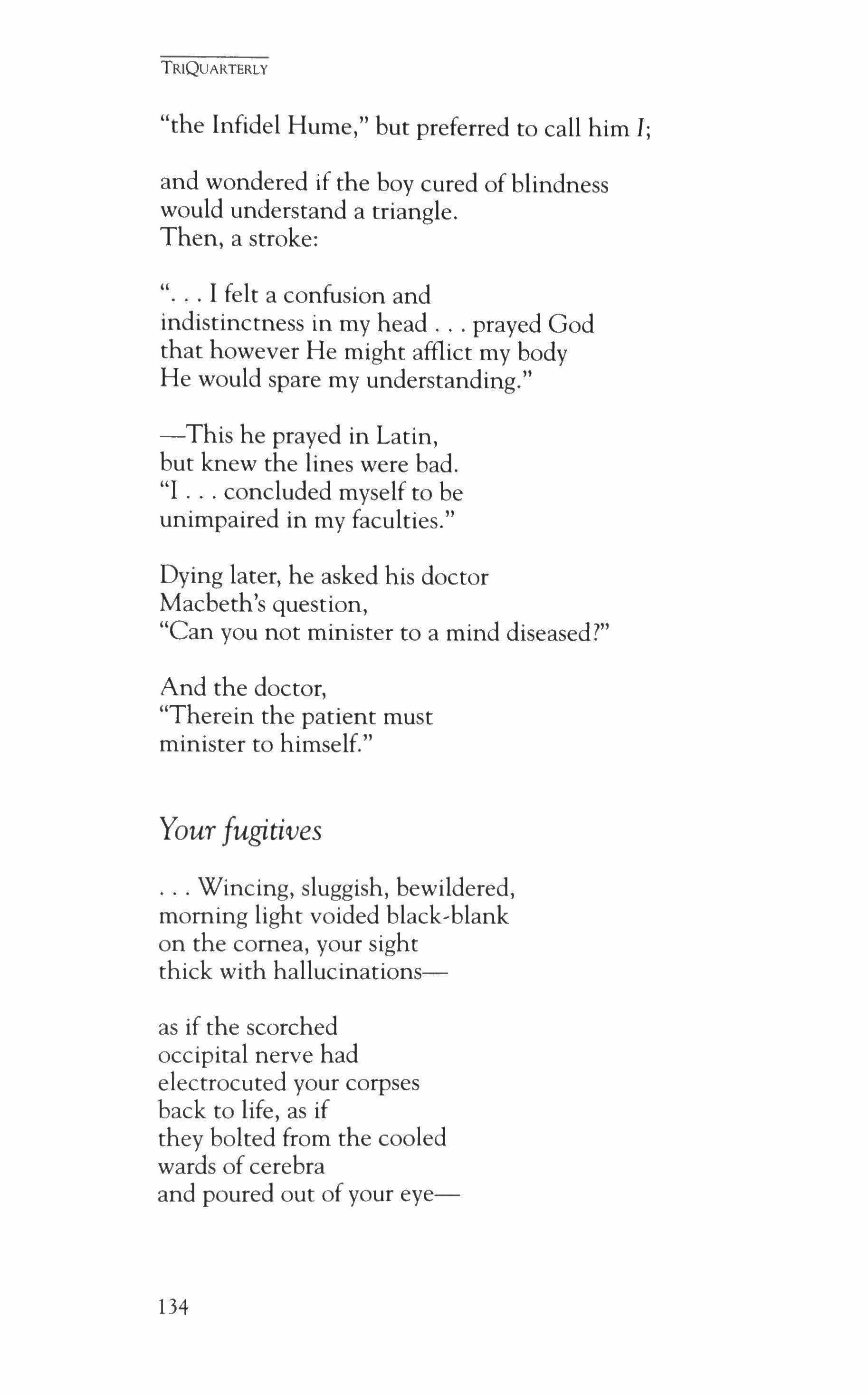
"the Infidel Hume," but preferred to call him Ii and wondered if the boy cured of blindness would understand a triangle. Then, a stroke:
" I felt a confusion and indistinctness in my head prayed God that however He might afflict my body He would spare my understanding."
-This he prayed in Latin, but knew the lines were bad. "I concluded myself to be unimpaired in my faculties."
Dying later, he asked his doctor Macbeth's question, "Can you not minister to a mind diseased?"
And the doctor, "Therein the patient must minister to himself."
Your fugitives
Wincing, sluggish, bewildered, morning light voided black-blank on the cornea, your sight thick with hallucinationsas if the scorched occipital nerve had electrocuted your corpses back to life, as if they bolted from the cooled wards of cerebra and poured out of your eye-
TRIQUARTERLY
134

"For two days I was seeing dead people walking round the room" -old familiars, wearing the medals ofdisease while you chatted with your dead mom and frightened wife.
You could not treat yourselfdriving lost a hundred miles, names of your family lostcould not read the Manual ofSymptoms or see a doctor, pride demanding that you know the diagnosis firstSickness cleansed your mind of its name, your hapless will calling what what what from a citadel of necros-
Your changes
A nightmare only sleep would end. Then rest, and wanderings through your house, the temple of knickknack.
Forced at last to the hospital, half-blind before a staff of youngsters, suddenly, this opening giftyou said please, and listened to your doctors; you kissed your wife, learned to read again, didn't trust yourselfNo driving. No moat of gin. Patient, hopeful, half,surrendering, impish, caring, forgetful, shakenyour daughter, whom you loved over your shoulder, cried hearing you praise her at last.
Gone is your genius in forestalling deaths: nature recovers its mysteries, and leaves you only your death.
TRIQUARTERLY 135
TRIQUARTERLY

You seem strangely distracted, as if working out another problem; tired now and crumbling, rawly incomplete, you've turned toward a puzzle long deferred, holding it with ignorance and with gracethis masterful late imperfect love.
136
An Aerial Meandering
Katherine Soniat
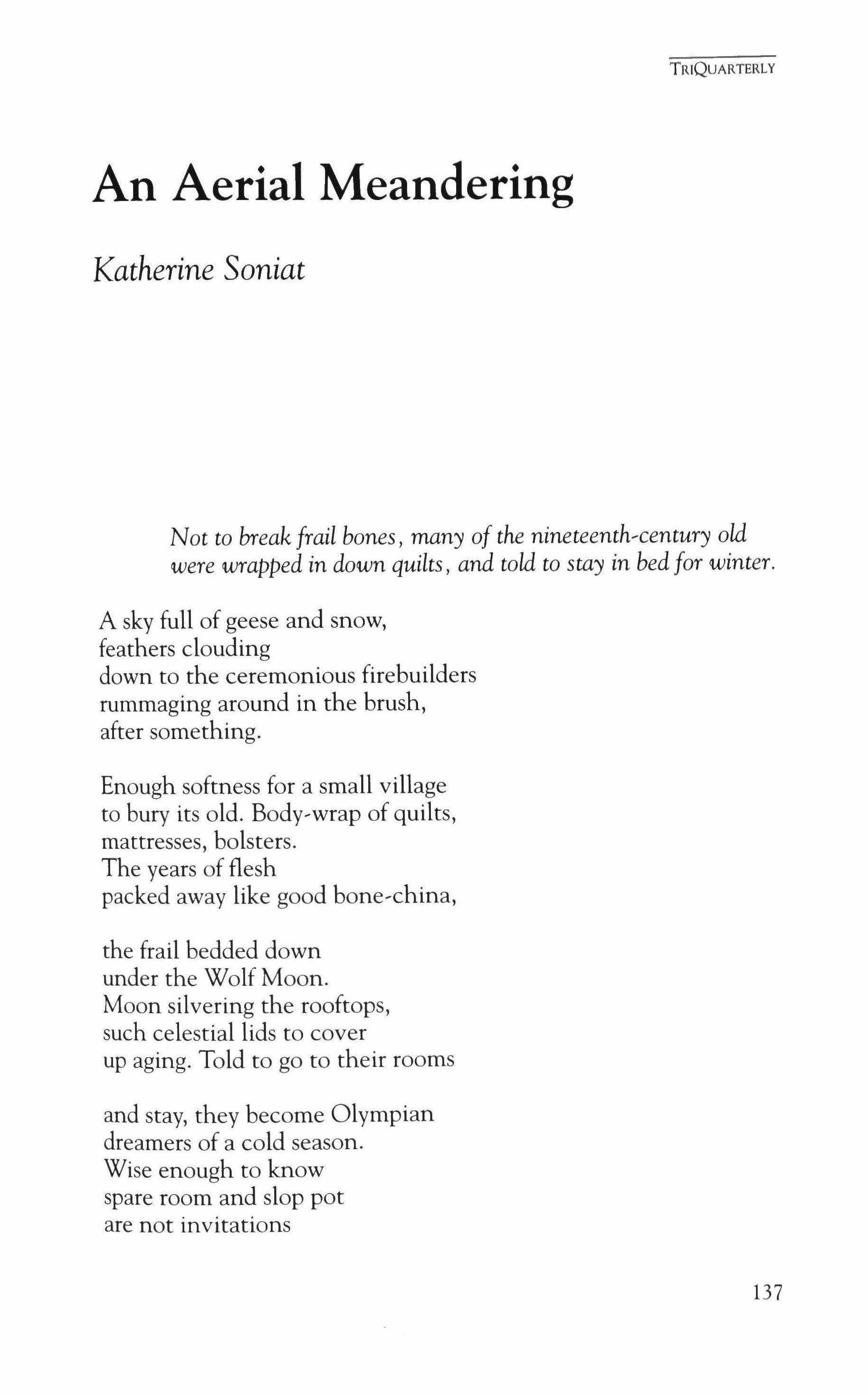
Not to break frail bones, many of the nmezeenrh-cennzry old were wrapped in down quilts, and told to stay in bed for winter.
A sky full of geese and snow, feathers clouding down to the ceremonious firebuilders rummaging around in the brush, after something.
Enough softness for a small village to bury its old. Body-wrap of quilts, mattresses, bolsters. The years of flesh packed away like good bone-china, the frail bedded down under the Wolf Moon. Moon silvering the rooftops, such celestial lids to cover up aging. Told to go to their rooms and stay, they become Olympian dreamers of a cold season. Wise enough to know spare room and slop pot are not invitations
TRIQUARTERLY
137
TRIQUARTERLY
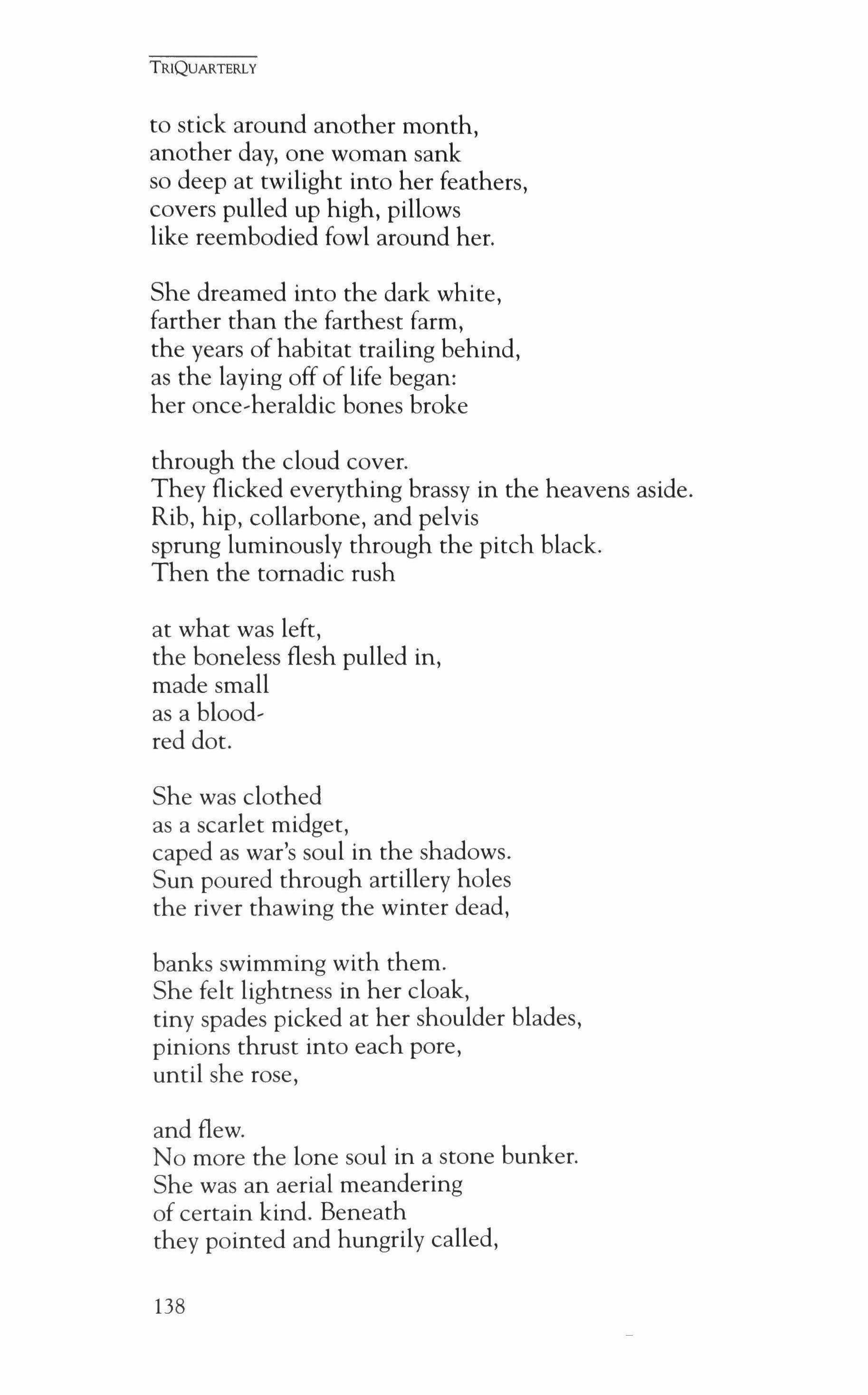
to stick around another month, another day, one woman sank so deep at twilight into her feathers, covers pulled up high, pillows like reembodied fowl around her.
She dreamed into the dark white, farther than the farthest farm, the years of habitat trailing behind, as the laying off of life began: her once-heraldic bones broke through the cloud cover. They flicked everything brassy in the heavens aside. Rib, hip, collarbone, and pelvis sprung luminously through the pitch black. Then the tomadic rush at what was left, the boneless flesh pulled in, made small as a bloodred dot.
She was clothed as a scarlet midget, caped as war's soul in the shadows. Sun poured through artillery holes the river thawing the winter dead, banks swimming with them. She felt lightness in her cloak, tiny spades picked at her shoulder blades, pinions thrust into each pore, until she rose, and flew. No more the lone soul in a stone bunker. She was an aerial meandering of certain kind. Beneath they pointed and hungrily called,
138

goose, as she flapped. Great wings over a strange land, bodies as boulders on the moon. One hung from a tree pink as a pig on the rafters.
From the barns of cutlery, she heard the cry, pig, we hold their throats back hard, cut like a pig's, and the country flared with brilliances, smoke. Distant little mouths filled with the last long 0, lame calls to no one, the flamethrowers intent on running at one another. Then heaviness, the absolute structure of inertia came upon her. Her wings, collapsed, would not glide. In frozen sunlight she was pounds of gooseflesh, yellow skin on waning wings. Time was up, down, all over her, sinking her to the world again. The lost feathers trailed into the madnessthe hurling, thrusting arms below had tired, worn themselves to pieces.
All those human appendages that could have been wings, lay buried in something sunken, like a valley.
TRIQUARTERLY 139
Sky Dive
Dabney Stuart
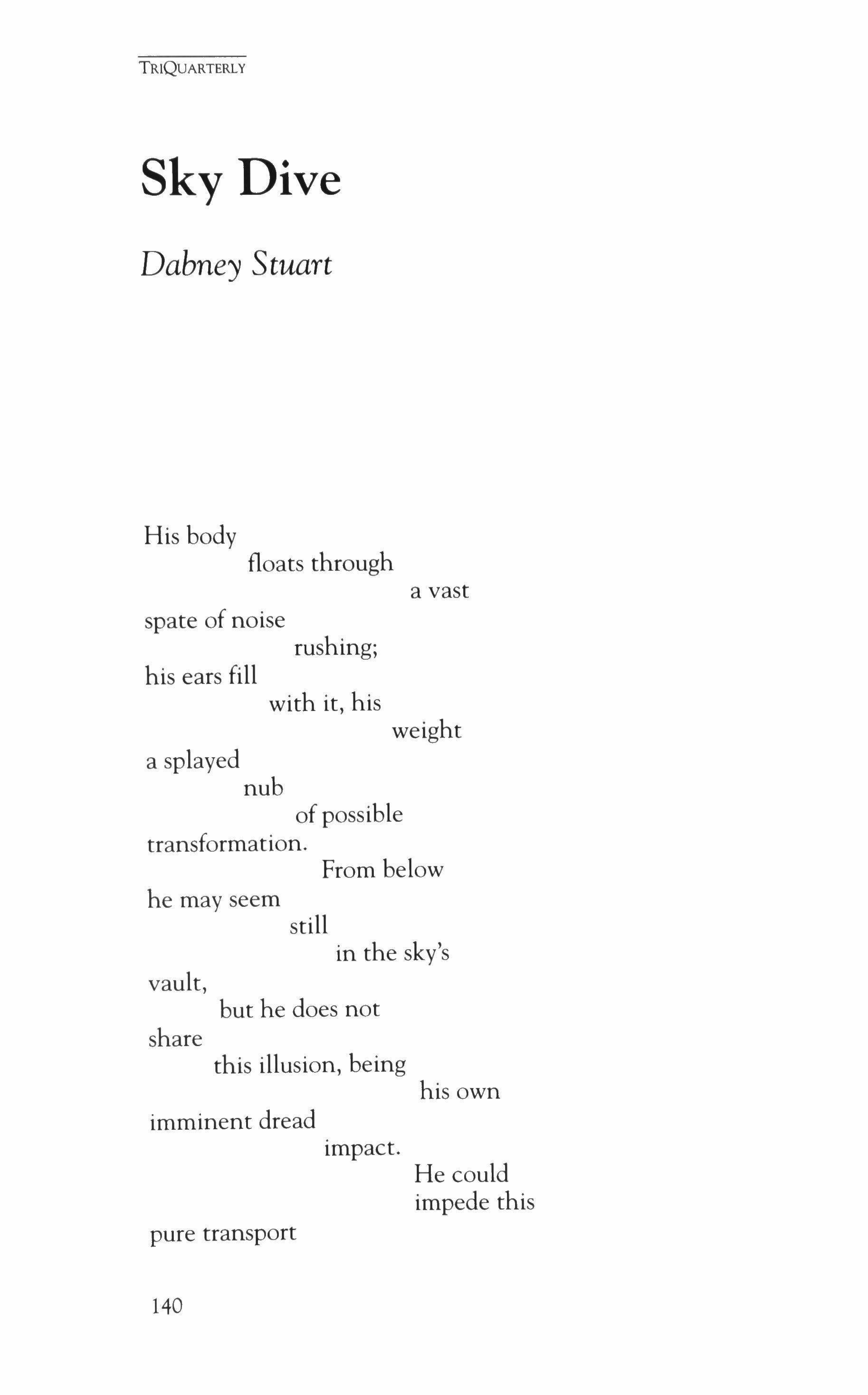
His body floats through a vast spate of noise rushing; his ears fill with it, his weight a splayed nub of possible transformation. From below he may seem still in the sky's vault, but he does not share this illusion, being his own imminent dread impact. He could impede this pure transport
TRIQUARTERLY
140
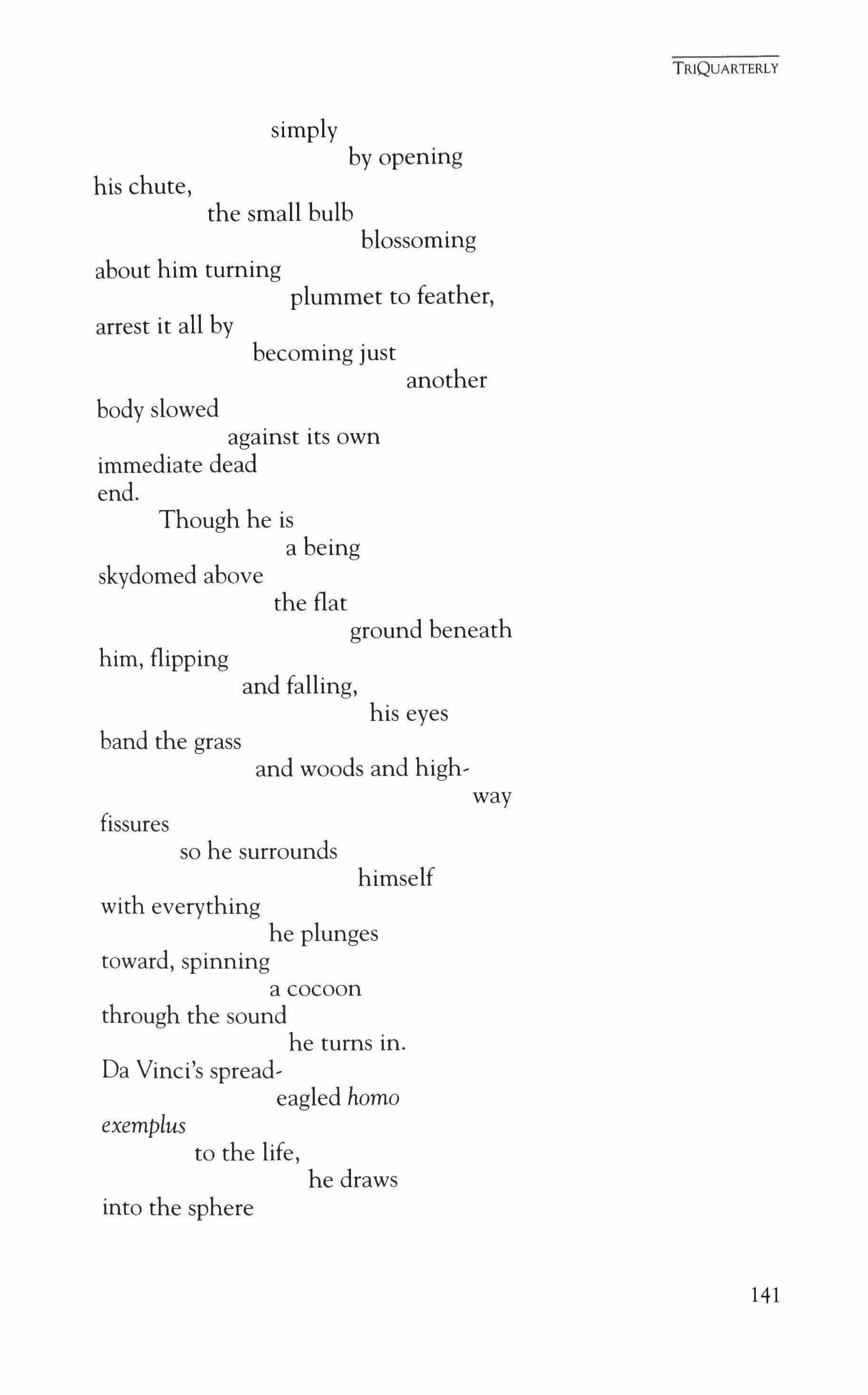
simply by opening his chute, the small bulb blossoming about him turning plummet to feather, arrest it all by becoming just another body slowed against its own immediate dead end.
Though he is a being skydomed above the flat ground beneath him, flipping and falling, his eyes band the grass and woods and highway fissures so he surrounds himself with everything he plunges toward, spinning a cocoon through the sound he turns in.
Da Vinci's spreadeagled homo exemplus to the life, he draws into the sphere
TRIQUARTERLY
141
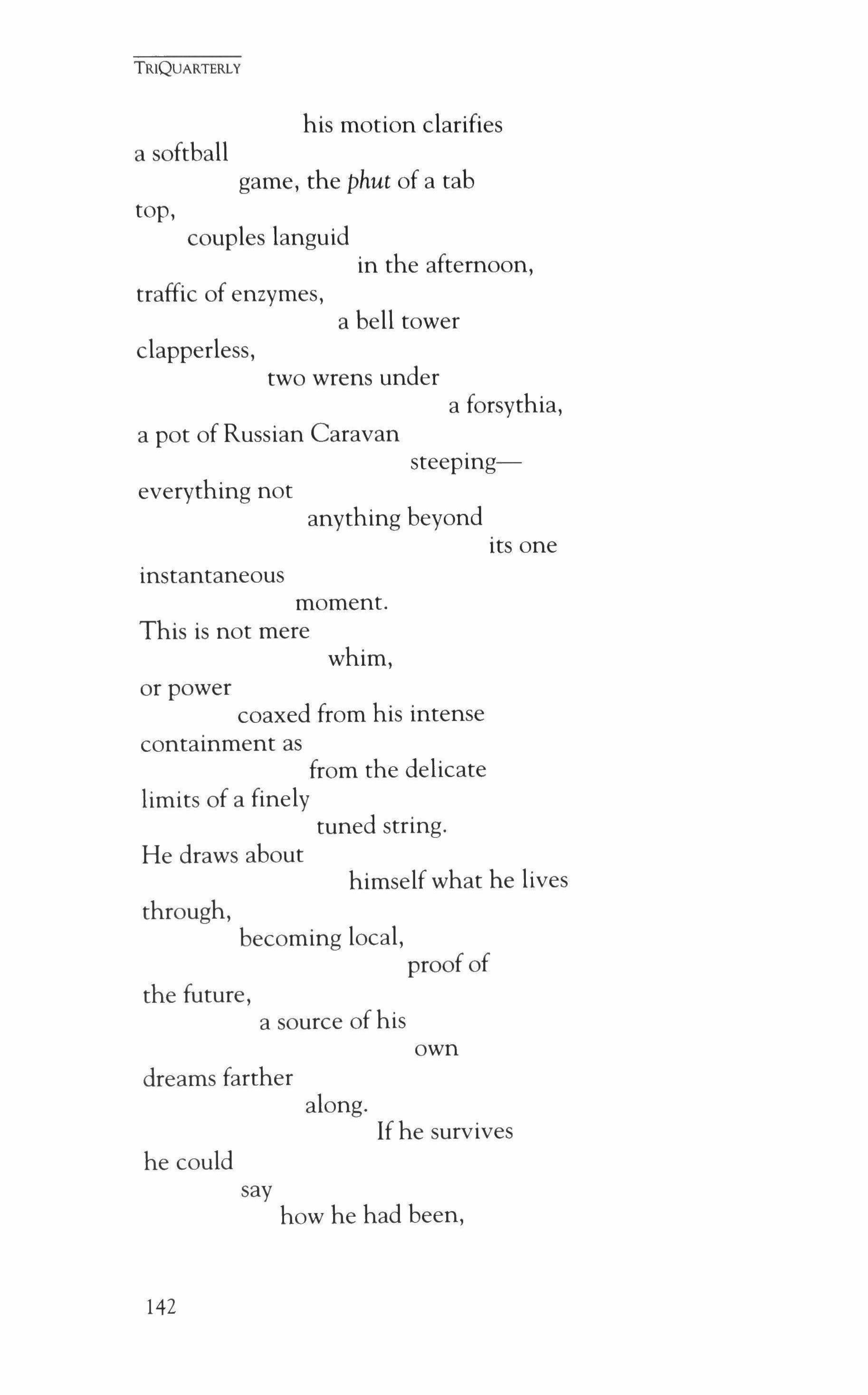
his motion clarifies a softball game, the phut of a tab top, couples languid in the afternoon, traffic of enzymes, a bell tower clapperless, two wrens under a forsythia, a pot of Russian Caravan steepingeverything not anything beyond its one instantaneous moment. This is not mere whim, or power coaxed from his intense containment as from the delicate limits of a finely tuned string. He draws about himself what he lives through, becoming local, proof of the future, a source of his own dreams farther along. If he survives he could say how he had been,
TRIQUARTERLY
142

once, the place where gravity and air kissed, a place he still is, since, bearing himself, he is weaving this story, this net, a part ofwhat is given.
TRIQUARTERLY
143

Rapture
at the interface between love and disease
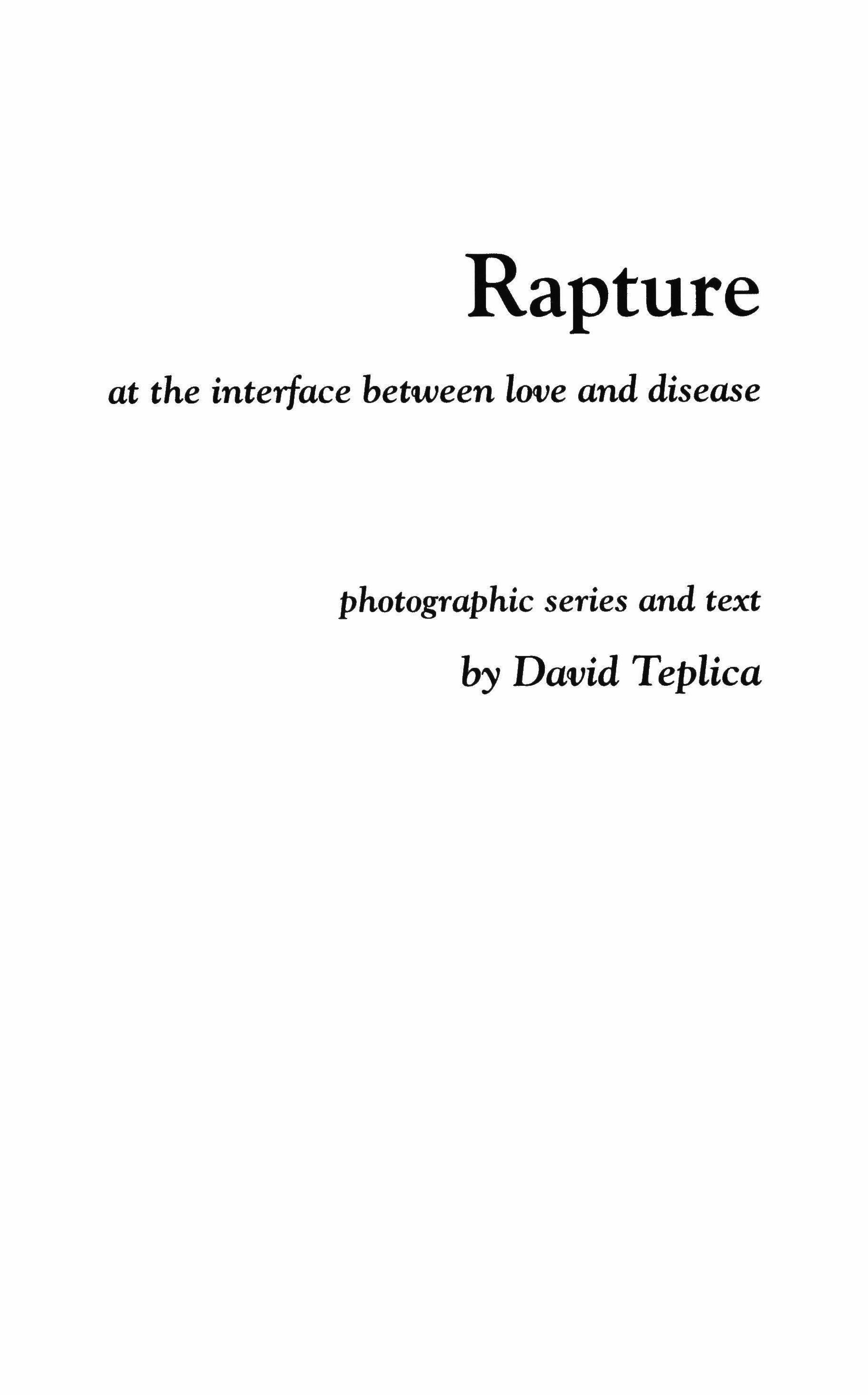
photographic series and text
by David Teplica

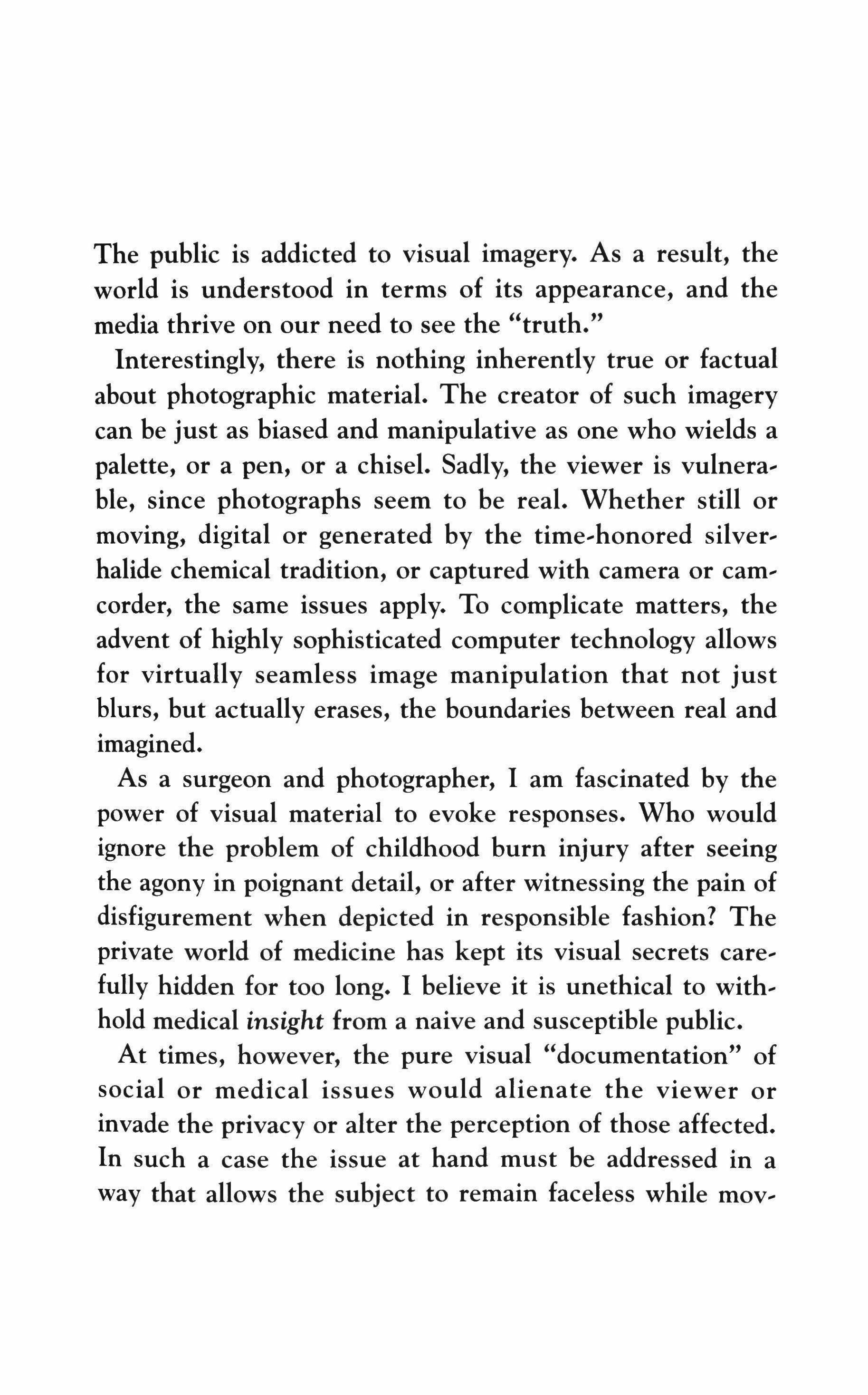
The public is addicted to visual imagery. As a result, the world is understood in terms of its appearance, and the media thrive on our need to see the "truth."
Interestingly, there is nothing inherently true or factual about photographic material. The creator of such imagery can be just as biased and manipulative as one who wields a palette, or a pen, or a chisel. Sadly, the viewer is vulnera ble, since photographs seem to be real. Whether still or moving, digital or generated by the time honored silver halide chemical tradition, or captured with camera or cam corder, the same issues apply. To complicate matters, the advent of highly sophisticated computer technology allows for virtually seamless image manipulation that not just blurs, but actually erases, the boundaries between real and imagined.
As a surgeon and photographer, I am fascinated by the power of visual material to evoke responses. Who would ignore the problem of childhood burn injury after seeing the agony in poignant detail, or after witnessing the pain of disfigurement when depicted in responsible fashion? The private world of medicine has kept its visual secrets care fully hidden for too long. I believe it is unethical to with hold medical insight from a naive and susceptible public.
At times, however, the pure visual "documentation" of social or medical issues would alienate the viewer or invade the privacy or alter the perception of those affected. In such a case the issue at hand must be addressed in a way that allows the subject to remain faceless while mov
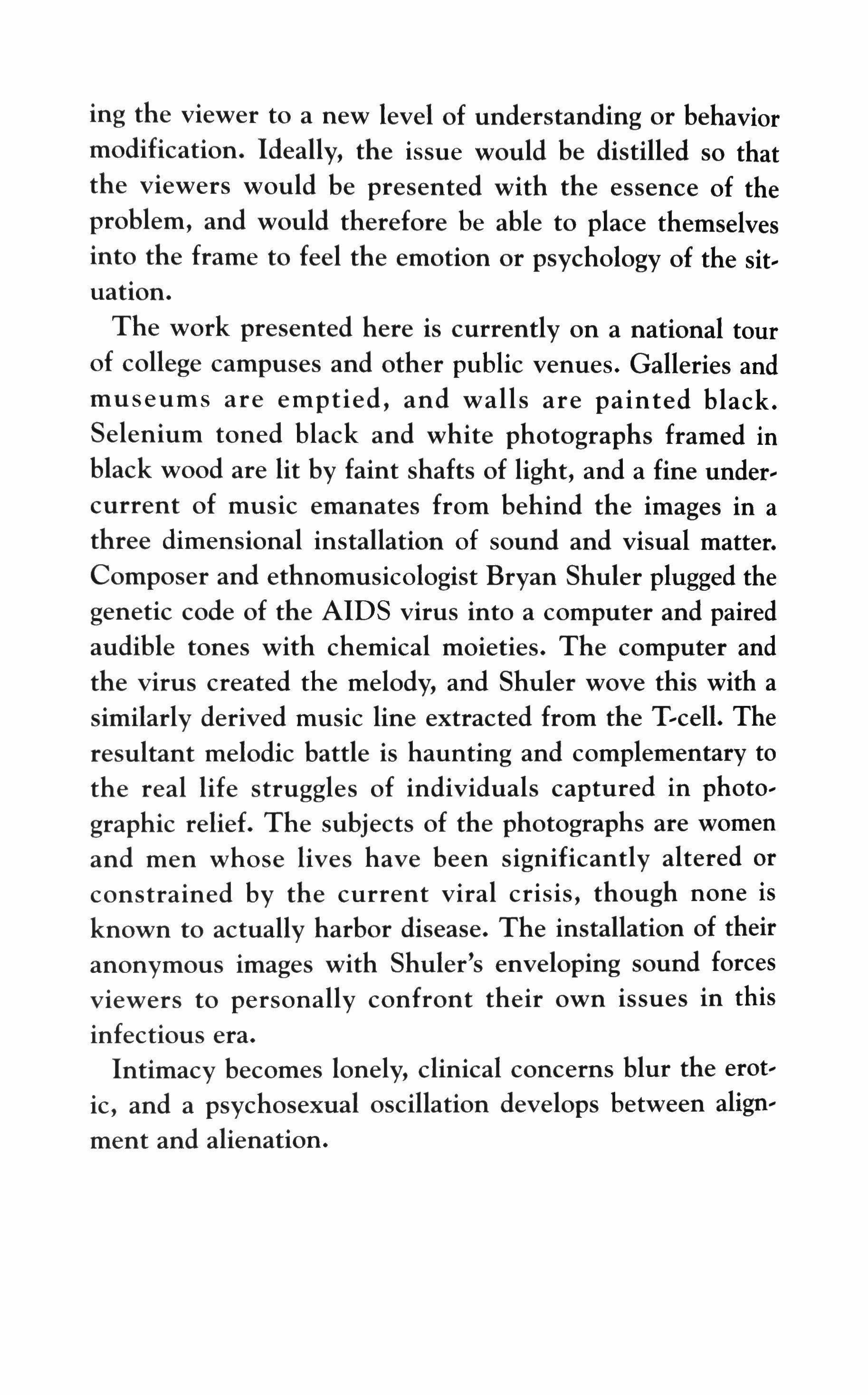
ing the viewer to a new level of understanding or behavior modification. Ideally, the issue would be distilled so that the viewers would be presented with the essence of the problem, and would therefore be able to place themselves into the frame to feel the emotion or psychology of the sit uation.
The work presented here is currently on a national tour of college campuses and other public venues. Galleries and museums are emptied, and walls are painted black. Selenium toned black and white photographs framed in black wood are lit by faint shafts of light, and a fine under current of music emanates from behind the images in a three dimensional installation of sound and visual matter.
Composer and ethnomusicologist Bryan Shuler plugged the genetic code of the AIDS virus into a computer and paired audible tones with chemical moieties. The computer and the virus created the melody, and Shuler wove this with a similarly derived music line extracted from the T cell. The resultant melodic battle is haunting and complementary to the real life struggles of individuals captured in photo graphic relief. The subjects of the photographs are women and men whose lives have been significantly altered or constrained by the current viral crisis, though none is known to actually harbor disease. The installation of their anonymous images with Shuler's enveloping sound forces viewers to personally confront their own issues in this infectious era.
Intimacy becomes lonely, clinical concerns blur the erot ic, and a psychosexual oscillation develops between align ment and alienation.


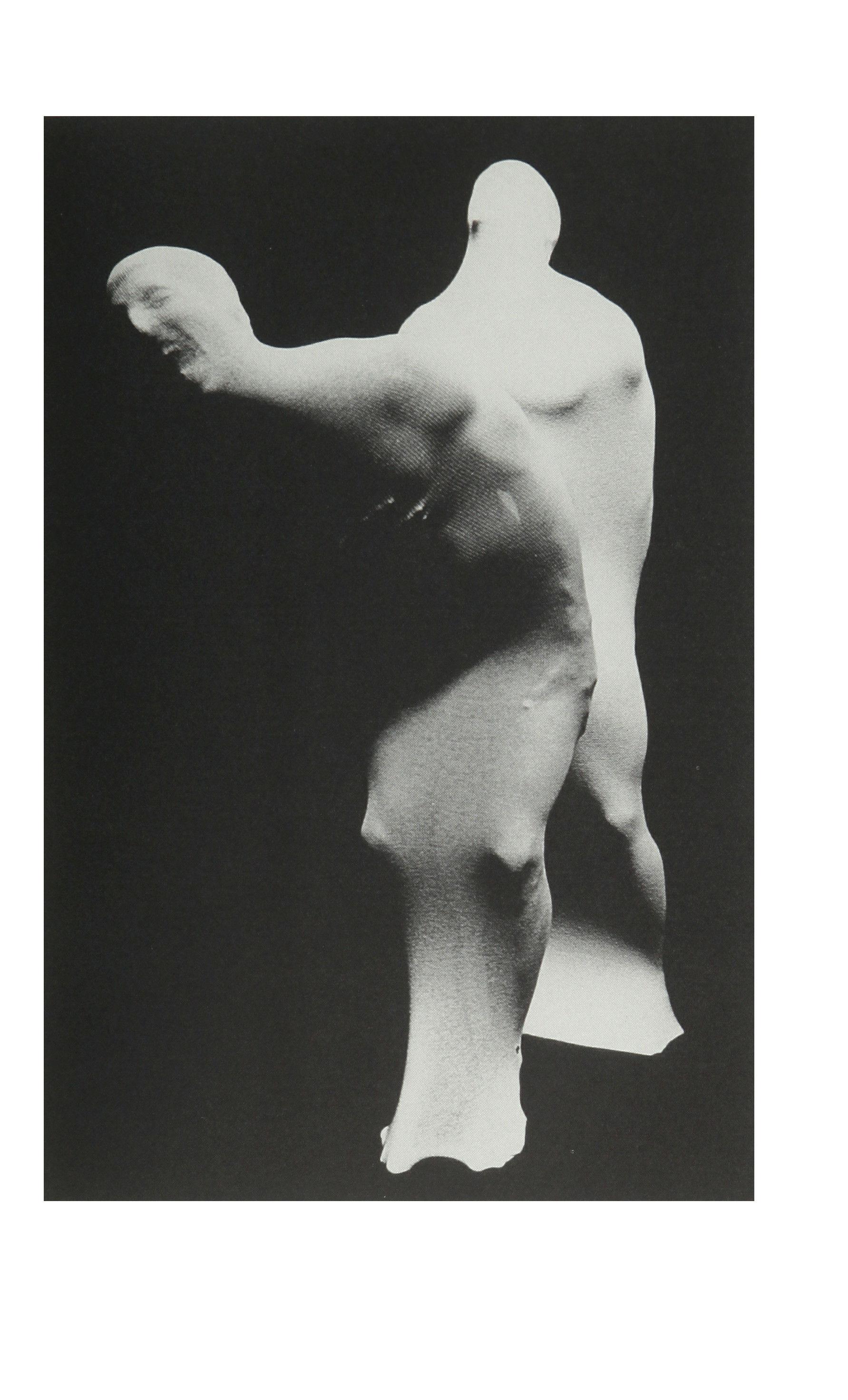




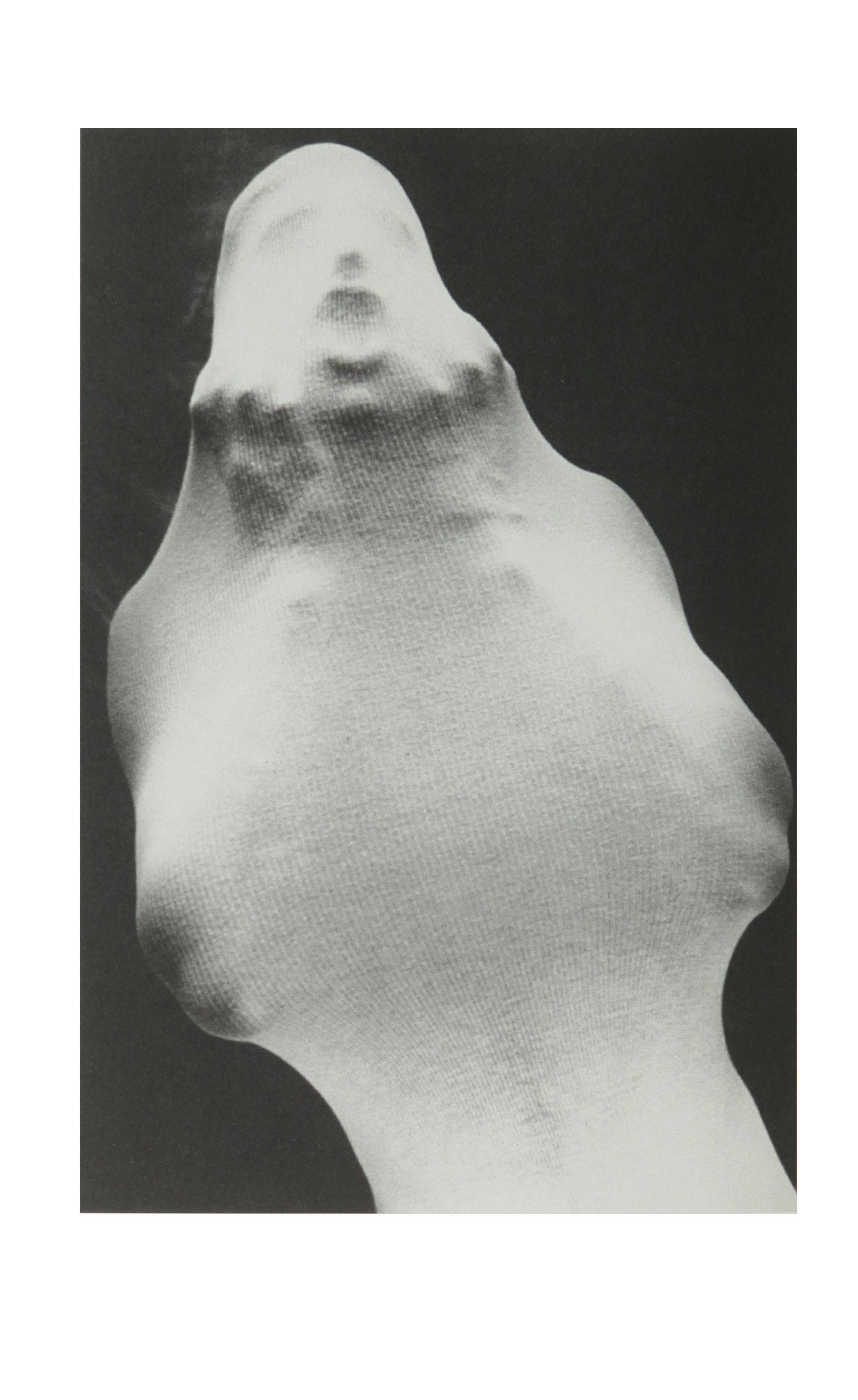


From Short Lines
Alan Williamson
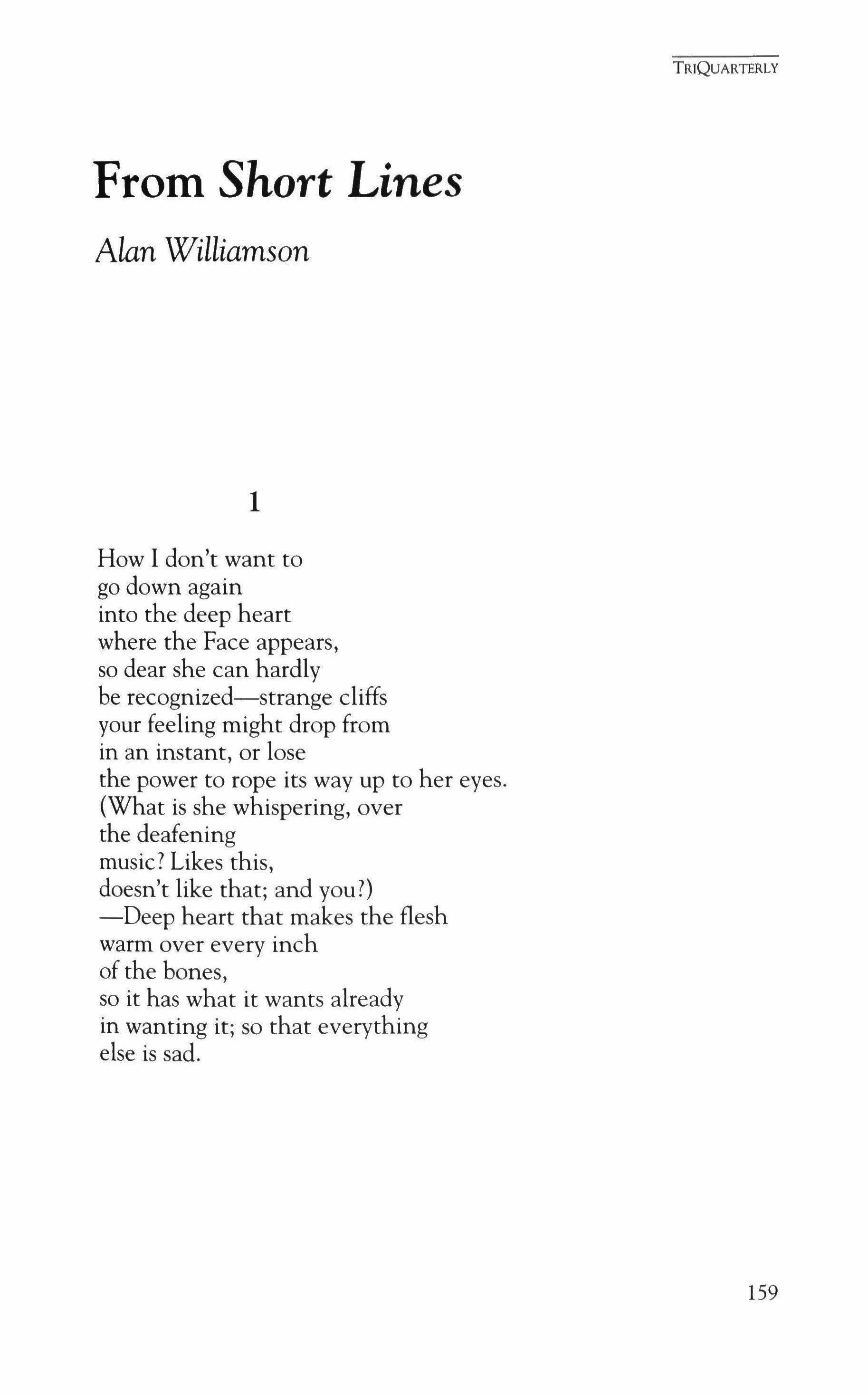
1
How I don't want to go down again into the deep heart where the Face appears, so dear she can hardly be recognized-strange cliffs your feeling might drop from in an instant, or lose the power to rope its way up to her eyes. (What is she whispering, over the deafening music? Likes this, doesn't like that; and you?) -Deep heart that makes the flesh warm over every inch of the bones, so it has what it wants already in wanting it; so that everything else is sad.
TRIQUARTERLY
159
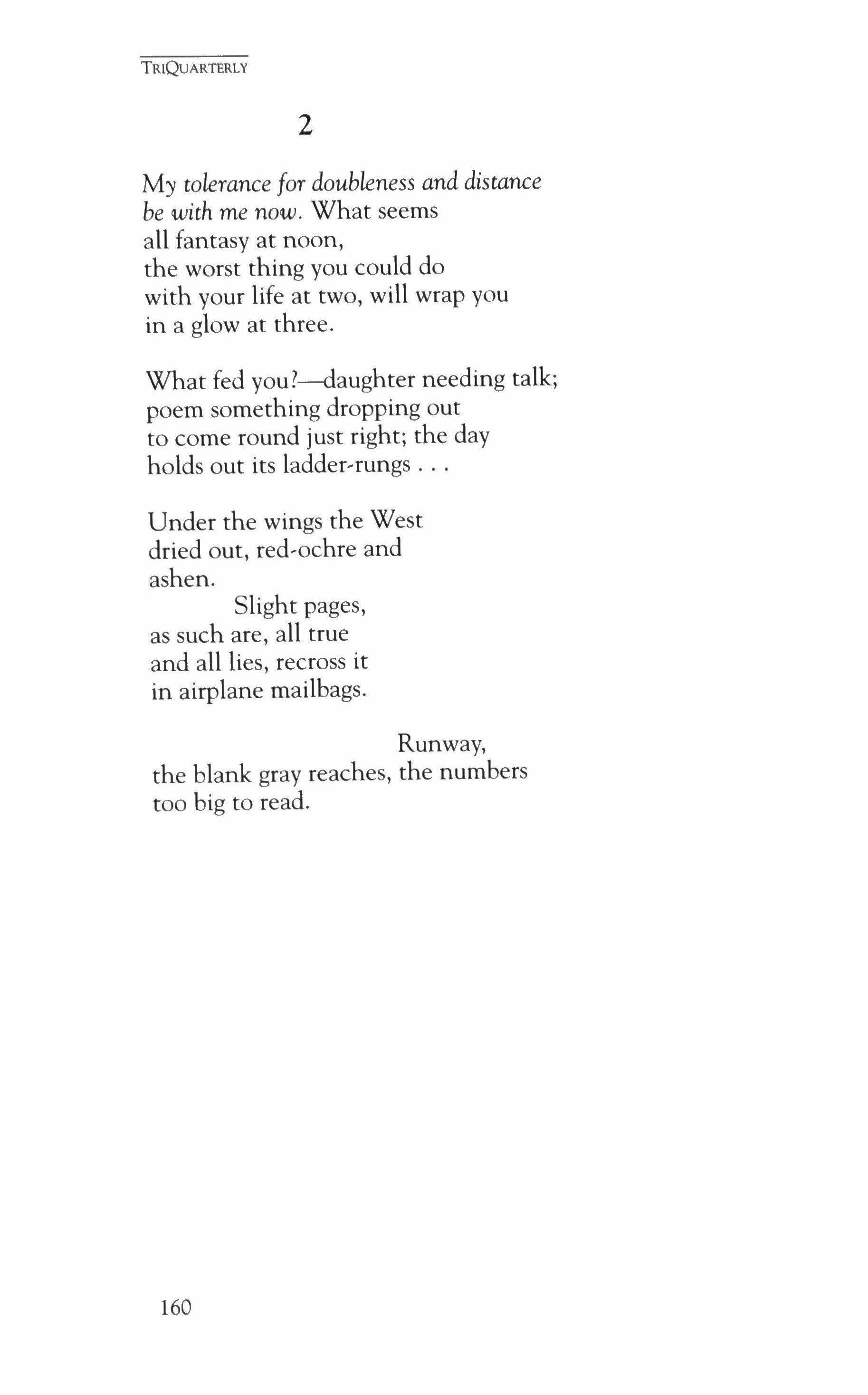
My tolerance for doubleness and distance be with me now. What seems all fantasy at noon, the worst thing you could do with your life at two, will wrap you in a glow at three.
What fed voui=-daughter needing talk; poem something dropping out to come round just right; the day holds out its ladder-rungs
Under the wings the West dried out, red-ochre and ashen.
Slight pages, as such are, all true and all lies, recross it in airplane mailbags.
Runway, the blank gray reaches, the numbers too big to read.
TRIQUARTERLY 2
160
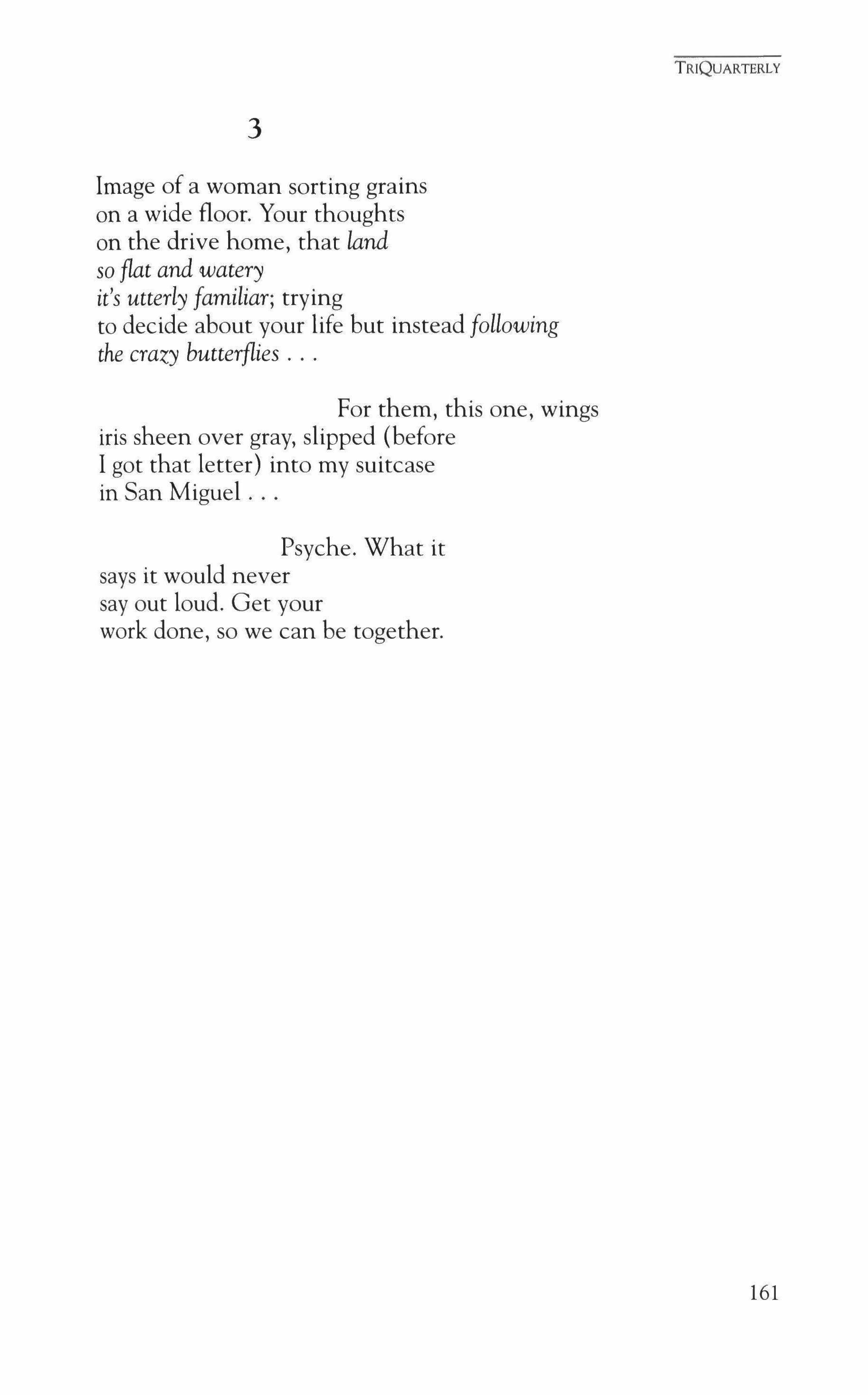
Image of a woman sorting grains on a wide floor. Your thoughts on the drive home, that land so flat and watery it's utterly familiar; trying to decide about your life but instead following the crazy butterflies
For them, this one, wings iris sheen over gray, slipped (before I got that letter) into my suitcase in San Miguel
Psyche. What it says it would never say out loud. Get your work done, so we can be together.
3
TRIQUARTERLY 161
You sat through a tornado once holding the animals in the inner hallway while it thump, thumped its circle round the meadow
So your words, reread, make a stillness like sitting together, while outside, the huge fists narrow and kneadwhat lowed, what was real, what my grudging self unspeaking held back fromwith you?
In dream my friend's mad brother shows me a dildo and I stuff it, boastfully, in my pants)
-three years.
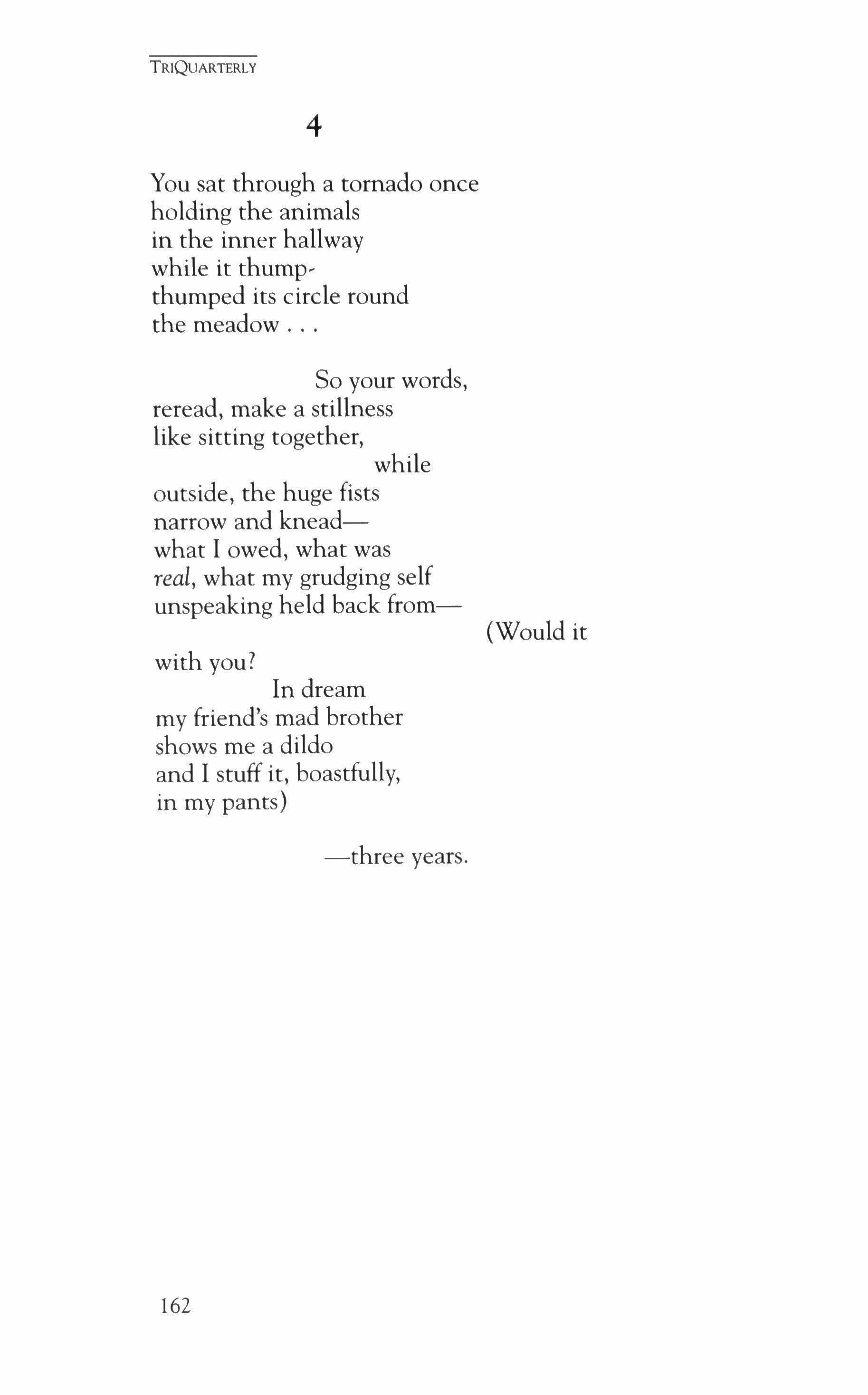
(Would it
TRIQUARTERLY 4
162
The Angel of Melancholy
Eric Pankey

Removed from its axle, the chipped grindstone, A useless mass, leans against the wall. Above, scales hang on a hook, balanced and empty.
Half the sand has slipped as time to the bottom. The bell, unrung, will not be rung at the hour: The plumb bob of its brass clapper unmoved,
The glinting lip unshimmered into music. The molding plane, handsaw, and scattered nails Rest, idle, spoiled for want of occupation
At the brooding angel's feet. A mold of rust Waits to pock the polished edges and points. As if the practical text of her neglect,
The book, clasped shut on her lap, remains unread: The pages never dog-cared, the spine unbroken. If she could bring a single hope to light
And not cast it aside in the dull allure Of twilight and moonlight that overshadows all, If she could unfurl her wings and imagine flight,
TRIQUARTERLY 163
TRIQUARTERLY

And allow the thought of flight to rise up Without the ballast of set squares and compasses, Or the marble globe that has rolled onto the floor,
Then she might see that beyond the clutter and forms, Beyond the unrendered distance into which she stares, All one is ever given is this clutter, these forms, That distance to arrange and in arranging change.
164
My Groom
Jill Bialosky
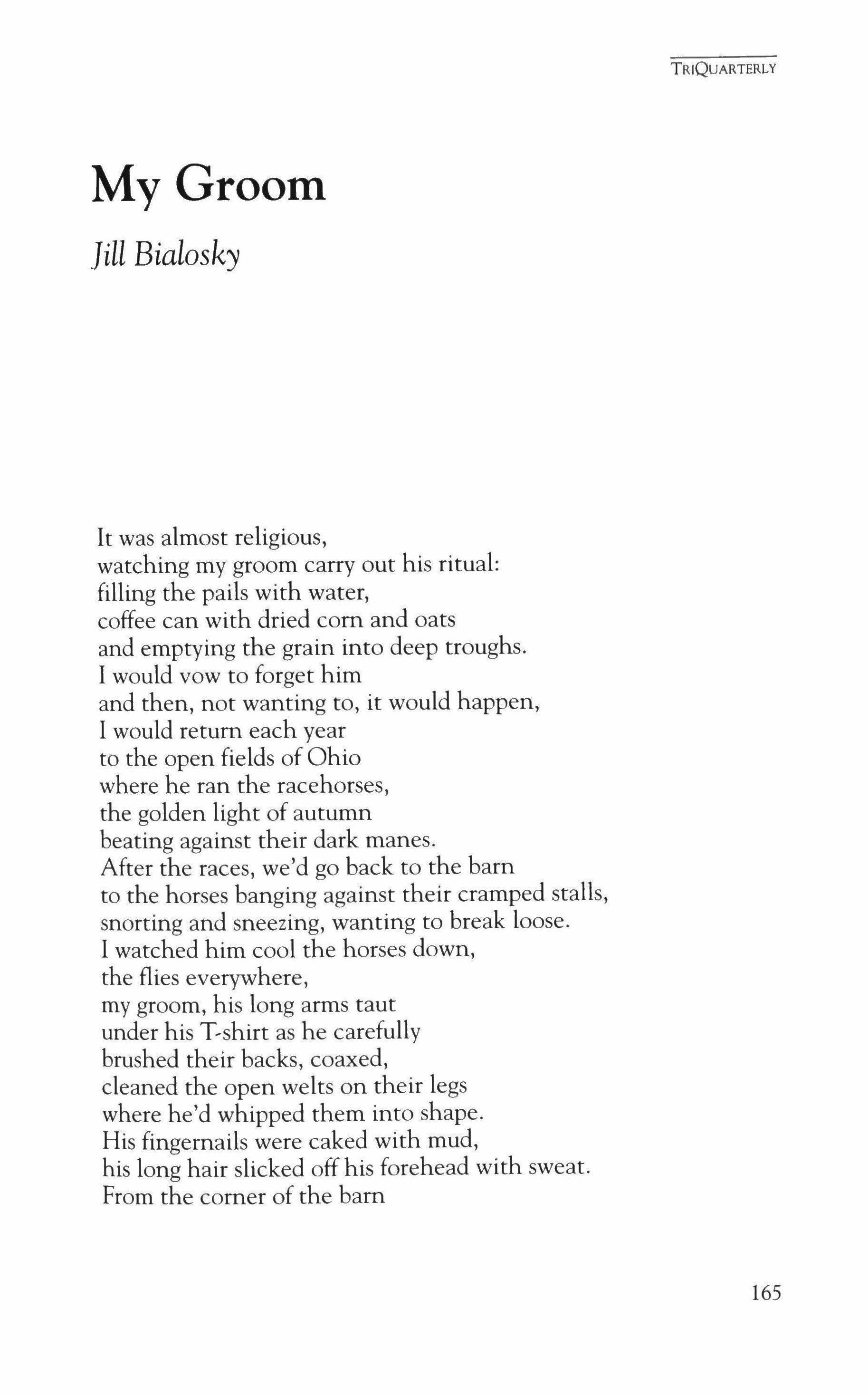
It was almost religious, watching my groom carry out his ritual: filling the pails with water, coffee can with dried com and oats and emptying the grain into deep troughs. I would vow to forget him and then, not wanting to, it would happen, I would return each year to the open fields of Ohio where he ran the racehorses, the golden light of autumn beating against their dark manes. After the races, we'd go back to the bam to the horses banging against their cramped stalls, snorting and sneezing, wanting to break loose. I watched him cool the horses down, the flies everywhere, my groom, his long arms taut under his T-shirt as he carefully brushed their backs, coaxed, cleaned the open welts on their legs where he'd whipped them into shape. His fingernails were caked with mud, his long hair slicked off his forehead with sweat. From the comer of the bam
TRIQUARTERLY 165

light weakened in the slats of the roof, bats screeched in the eaves. When he finished he'd look at me, standing in the shadows. Up close, I smelled the horses, dark and dangerous, wedded to his clothes. His warm hands slipped down my back underneath my shirt; horse hooves wild as my heart against the earth's secrets. Is this where love begins, in the arms of the cruel tamer, the keeper of horses? Is it this marriage I'll always crave?
TRIQUARTERLY
166
How to Stop Loving Someone: A Twelve-Step Program
Joan Connor
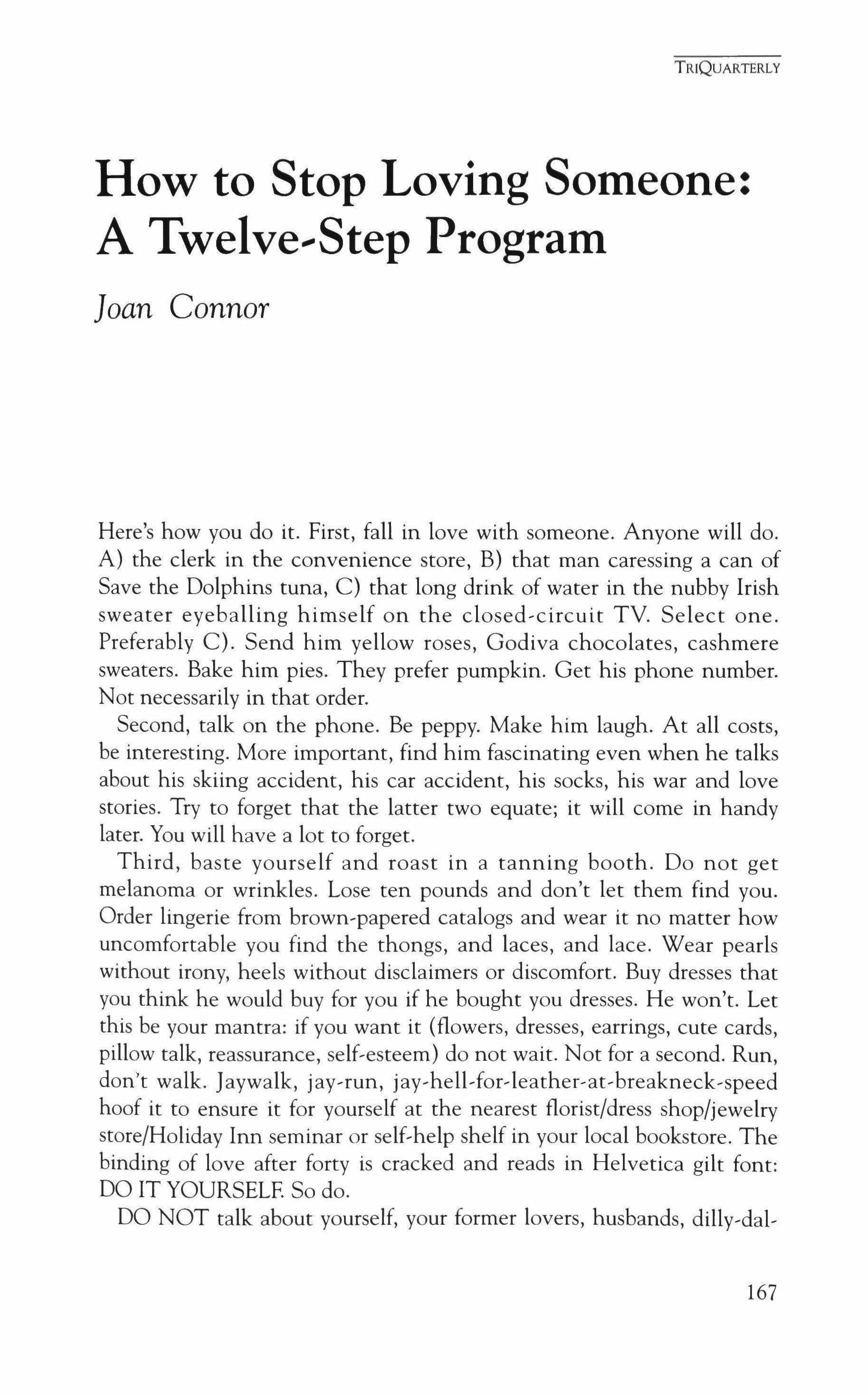
Here's how you do it. First, fall in love with someone. Anyone will do. A) the clerk in the convenience store, B) that man caressing a can of Save the Dolphins tuna, C) that long drink of water in the nubby Irish sweater eyeballing himself on the closed-circuit TV. Select one. Preferably C). Send him yellow roses, Godiva chocolates, cashmere sweaters. Bake him pies. They prefer pumpkin. Get his phone number. Not necessarily in that order.
Second, talk on the phone. Be peppy. Make him laugh. At all costs, be interesting. More important, find him fascinating even when he talks about his skiing accident, his car accident, his socks, his war and love stories. Try to forget that the latter two equate; it will come in handy later. You will have a lot to forget.
Third, baste yourself and roast in a tanning booth. Do not get melanoma or wrinkles. Lose ten pounds and don't let them find you. Order lingerie from brown-papered catalogs and wear it no matter how uncomfortable you find the thongs, and laces, and lace. Wear pearls without irony, heels without disclaimers or discomfort. Buy dresses that you think he would buy for you if he bought you dresses. He won't. Let this be your mantra: if you want it (flowers, dresses, earrings, cute cards, pillow talk, reassurance, self-esteem) do not wait. Not for a second. Run, don't walk. Jaywalk, jay-run, jay-hell-for-Ieather-at-breakneck-speed hoof it to ensure it for yourself at the nearest florist/dress shop/jewelry store/Holiday Inn seminar or self-help shelf in your local bookstore. The binding of love after forty is cracked and reads in Helvetica gilt font: DO IT YOURSELF. So do.
DO NOT talk about yourself, your former lovers, husbands, dilly-dal-
TRIQUARTERLY
167

liances, or your offspring. DO NOT complain when you spend your birthday, Thanksgiving, Christmas, New Year's Eve, and Valentine's Day alone. (They hate that.) DO NOT analyze your relationship with him. They really hate that. Compliment him sincerely on his intelligence, haircut, car and clothes, especially his socks (they give great thought to their socks) even if you don't mean it.
Go to his condo. Memorize his wardrobe, the tweeds, the doublebreasted, gold-buttoned blazers that only he can wear without being flip or camp. Memorize the contents of his medicine cabinet. Run water while you click through his bottles of sinus spray, his prescriptions, the Valium, the Xanax. Rifle through his magazines, his CDs, his books. Always remember this: they secretly long to be rock stars. Or cowboys. They are desperate men. They play air guitar or air harmonica before the steamy bathroom mirror. They dream of room keys wrapped in red string bikinis tossed past the footlights. They dream of being lone little dogies eating maverick beans and fire-sizzled bacon. Their dreams are not their own. They secretly long to be rebels without a dependent clause, but only if, an essential if, they already have a girlfriend or a wife. They need their security systems.
Study the sock drawer. They take pride in the insignias. Other podwomen have gotten to them about the socks. No crews, only J. Crews, a discreet alligator, perhaps, or decorous tony Ralph Lauren argyles. Cull all the details. Become his expert. Memorize the photos of his mother, deceased father, his sister, his son, his girlfriend. Speak well of them all, especially the latter. Compliment his taste in women. Never mind that she sells insurance, pays one hundred dollars a week for her hair and nails, drives a red car with a cellular phone. Study your rival. Cut your hair like hers. Forget the nails; you've most likely already bitten them to the quick. You will require a few nervous habits, however bad. Falling out of love is rigorous work. But that comes later.
Fourth, in bed strike a balance between demure and sluttish. Moan; they like that. Never, ever say, "Take me, take me, make me yours." They hate that. Tell him the truth, that he is beautiful, that his skin is soft and dark until the white band below his navel where you imagine enwrapping him like his swimsuit, that you almost cannot bear the auburn down on his abdomen, soft as it is, that his come tastes like strawberries, not the hothouse grocery-store variety, the sun-warmed mid-July tiny ones which hide under parasol leaves of green. Put your index finger into his mouth like a key into a lock. It opens the door to that forbidden room where everything is tentative, where everything,
TRIQUARTERLY
168
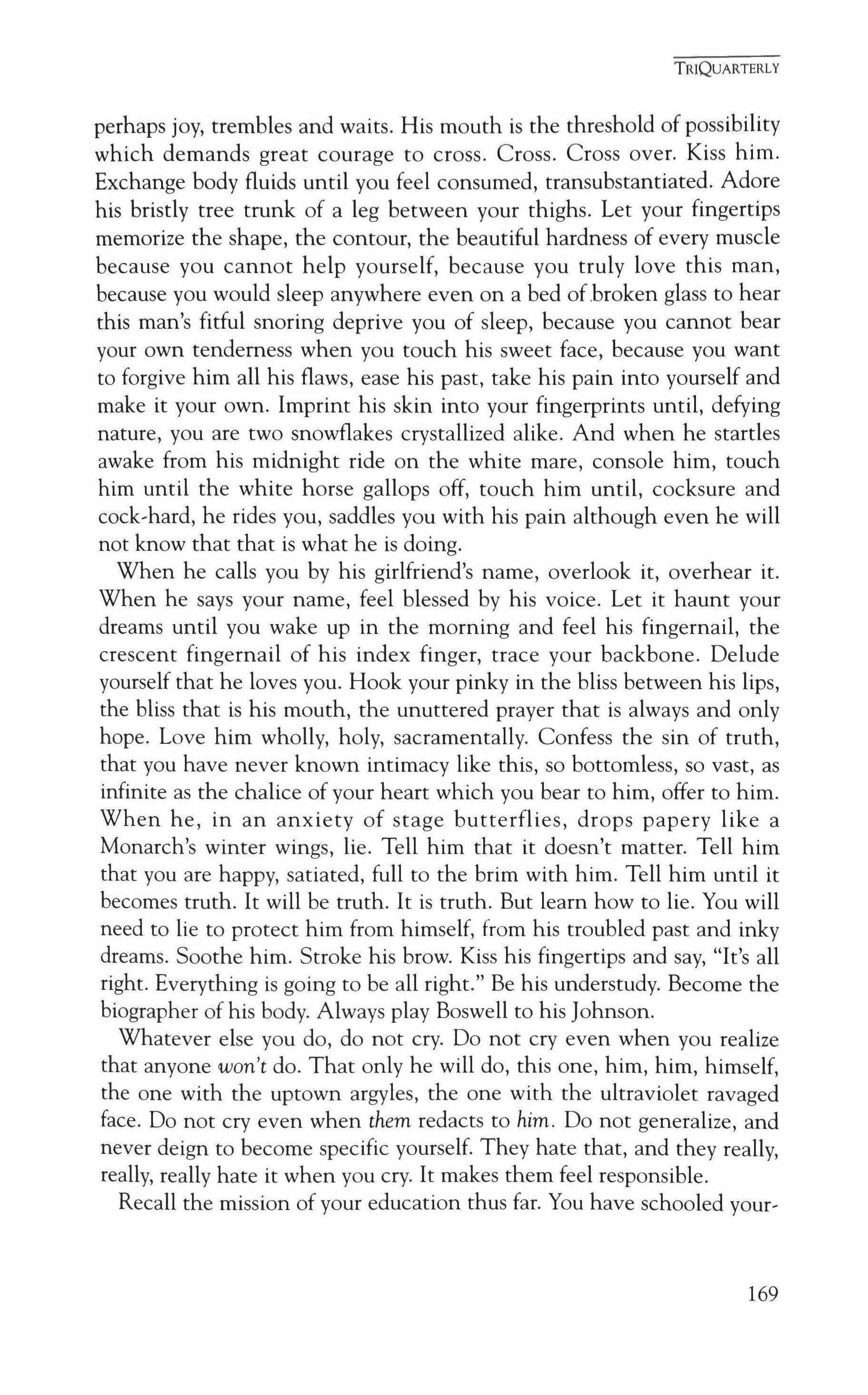
perhaps joy, trembles and waits. His mouth is the threshold of possibility which demands great courage to cross. Cross. Cross over. Kiss him. Exchange body fluids until you feel consumed, transubstantiated. Adore his bristly tree trunk of a leg between your thighs. Let your fingertips memorize the shape, the contour, the beautiful hardness of every muscle because you cannot help yourself, because you truly love this man, because you would sleep anywhere even on a bed ofbroken glass to hear this man's fitful snoring deprive you of sleep, because you cannot bear your own tenderness when you touch his sweet face, because you want to forgive him all his flaws, ease his past, take his pain into yourself and make it your own. Imprint his skin into your fingerprints until, defying nature, you are two snowflakes crystallized alike. And when he startles awake from his midnight ride on the white mare, console him, touch him until the white horse gallops off, touch him until, cocksure and cock-hard, he rides you, saddles you with his pain although even he will not know that that is what he is doing.
When he calls you by his girlfriend's name, overlook it, overhear it. When he says your name, feel blessed by his voice. Let it haunt your dreams until you wake up in the morning and feel his fingernail, the crescent fingernail of his index finger, trace your backbone. Delude yourself that he loves you. Hook your pinky in the bliss between his lips, the bliss that is his mouth, the unuttered prayer that is always and only hope. Love him wholly, holy, sacramentally. Confess the sin of truth, that you have never known intimacy like this, so bottomless, so vast, as infinite as the chalice of your heart which you bear to him, offer to him. When he, in an anxiety of stage butterflies, drops papery like a Monarch's winter wings, lie. Tell him that it doesn't matter. Tell him that you are happy, satiated, full to the brim with him. Tell him until it becomes truth. It will be truth. It is truth. But learn how to lie. You will need to lie to protect him from himself, from his troubled past and inky dreams. Soothe him. Stroke his brow. Kiss his fingertips and say, "It's all right. Everything is going to be all right." Be his understudy. Become the biographer of his body. Always play Boswell to his Johnson. Whatever else you do, do not cry. Do not cry even when you realize that anyone won't do. That only he will do, this one, him, him, himself, the one with the uptown argyles, the one with the ultraviolet ravaged face. Do not cry even when them redacts to him. Do not generalize, and never deign to become specific yourself. They hate that, and they really, really, really hate it when you cry. It makes them feel responsible. Recall the mission of your education thus far. You have schooled your-
TRIQUARTERLY
169
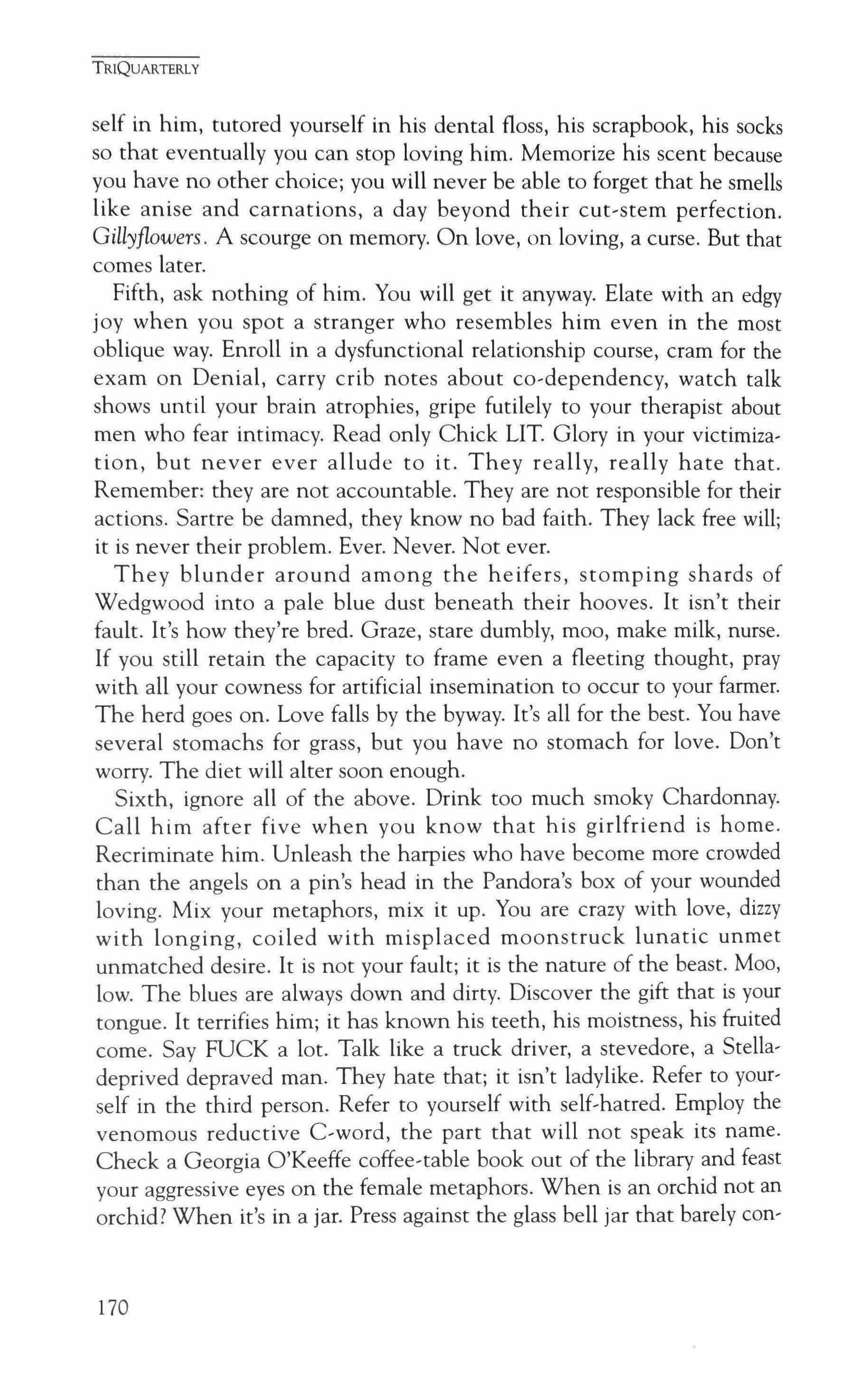
self in him, tutored yourself in his dental floss, his scrapbook, his socks so that eventually you can stop loving him. Memorize his scent because you have no other choice; you will never be able to forget that he smells like anise and carnations, a day beyond their cut-stern perfection. Gillyflowers. A scourge on memory. On love, on loving, a curse. But that comes later.
Fifth, ask nothing of him. You will get it anyway. Elate with an edgy joy when you spot a stranger who resembles him even in the most oblique way. Enroll in a dysfunctional relationship course, cram for the exam on Denial, carry crib notes about co-dependency, watch talk shows until your brain atrophies, gripe futilely to your therapist about men who fear intimacy. Read only Chick LIT. Glory in your victimization, but never ever allude to it. They really, really hate that. Remember: they are not accountable. They are not responsible for their actions. Sartre be damned, they know no bad faith. They lack free will; it is never their problem. Ever. Never. Not ever.
They blunder around among the heifers, stomping shards of Wedgwood into a pale blue dust beneath their hooves. It isn't their fault. It's how they're bred. Graze, stare dumbly, moo, make milk, nurse. If you still retain the capacity to frame even a fleeting thought, pray with all your cowness for artificial insemination to occur to your farmer. The herd goes on. Love falls by the byway. It's all for the best. You have several stomachs for grass, but you have no stomach for love. Don't worry. The diet will alter soon enough.
Sixth, ignore all of the above. Drink too much smoky Chardonnay. Call him after five when you know that his girlfriend is home. Recriminate him. Unleash the harpies who have become more crowded than the angels on a pin's head in the Pandora's box of your wounded loving. Mix your metaphors, mix it up. You are crazy with love, dizzy with longing, coiled with misplaced moonstruck lunatic unmet unmatched desire. It is not your fault; it is the nature of the beast. Moo, low. The blues are always down and dirty. Discover the gift that is your tongue. It terrifies him; it has known his teeth, his moistness, his fruited come. Say FUCK a lot. Talk like a truck driver, a stevedore, a Stelladeprived depraved man. They hate that; it isn't ladylike. Refer to yourself in the third person. Refer to yourself with self-hatred. Employ the venomous reductive Cvword, the part that will not speak its name. Check a Georgia O'Keeffe coffee-table book out of the library and feast your aggressive eyes on the female metaphors. When is an orchid not an orchid? When it's in a jar. Press against the glass bell jar that barely con-
TRIQUARTERLY
170
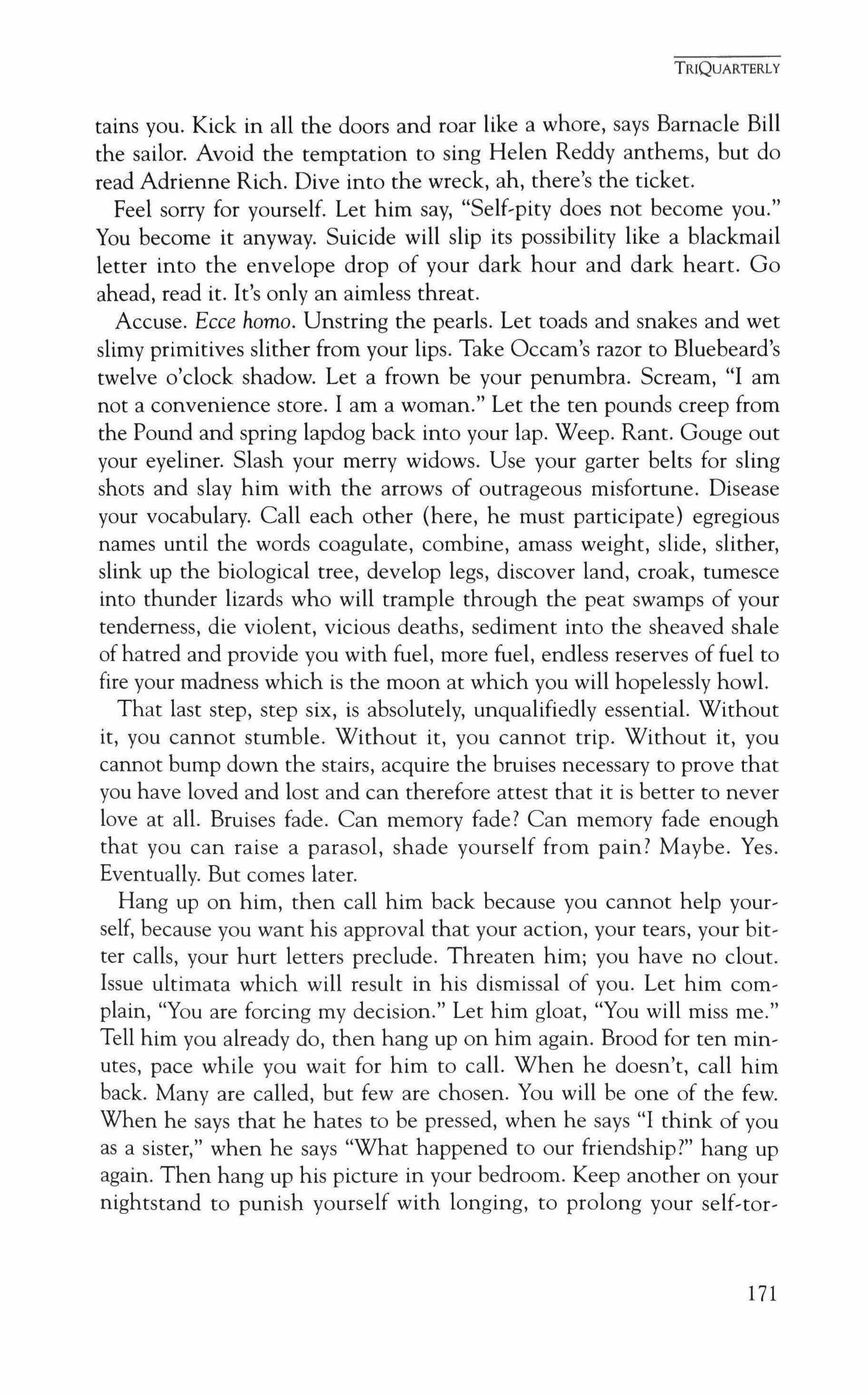
tains you. Kick in all the doors and roar like a whore, says Barnacle Bill the sailor. Avoid the temptation to sing Helen Reddy anthems, but do read Adrienne Rich. Dive into the wreck, ah, there's the ticket.
Feel sorry for yourself. Let him say, "Self-pity does not become you." You become it anyway. Suicide will slip its possibility like a blackmail letter into the envelope drop of your dark hour and dark heart. Go ahead, read it. It's only an aimless threat.
Accuse. Ecce homo. Unstring the pearls. Let toads and snakes and wet slimy primitives slither from your lips. Take Occam's razor to Bluebeard's twelve o'clock shadow. Let a frown be your penumbra. Scream, "I am not a convenience store. I am a woman." Let the ten pounds creep from the Pound and spring lapdog back into your lap. Weep. Rant. Gouge out your eyeliner. Slash your merry widows. Use your garter belts for sling shots and slay him with the arrows of outrageous misfortune. Disease your vocabulary. Call each other (here, he must participate) egregious names until the words coagulate, combine, amass weight, slide, slither, slink up the biological tree, develop legs, discover land, croak, tumesce into thunder lizards who will trample through the peat swamps of your tenderness, die violent, vicious deaths, sediment into the sheaved shale of hatred and provide you with fuel, more fuel, endless reserves of fuel to fire your madness which is the moon at which you will hopelessly howl. That last step, step six, is absolutely, unqualifiedly essential. Without it, you cannot stumble. Without it, you cannot trip. Without it, you cannot bump down the stairs, acquire the bruises necessary to prove that you have loved and lost and can therefore attest that it is better to never love at all. Bruises fade. Can memory fade? Can memory fade enough that you can raise a parasol, shade yourself from pain? Maybe. Yes. Eventually. But comes later.
Hang up on him, then call him back because you cannot help your, self, because you want his approval that your action, your tears, your bit, ter calls, your hurt letters preclude. Threaten him; you have no clout. Issue ultimata which will result in his dismissal of you. Let him com, plain, "You are forcing my decision." Let him gloat, "You will miss me." Tell him you already do, then hang up on him again. Brood for ten min, utes, pace while you wait for him to call. When he doesn't, call him back. Many are called, but few are chosen. You will be one of the few. When he says that he hates to be pressed, when he says "I think of you as a sister," when he says "What happened to our friendship?" hang up again. Then hang up his picture in your bedroom. Keep another on your nightstand to punish yourself with longing, to prolong your self-tor-
TRIQUARTERLY
171

ment. Repeat after yourself, "I don't have what I can't want." Fantasize only about him. Only he will suffice. In the wide desert of your whitesheeted bed, thirst until you hallucinate, see his figure wavering in the heat, a quaver, a quivering cipher. Oasis. Check the mailbox for the letter which won't arrive. Then check it again and again until it becomes a nervous tic. Open and close the refrigerator. Stare at the unflashing Cyclopean eye of your answering machine. When your phone rings, bruise your shins in your scramble to answer it. When Bob the automated telemarketer pitches five-year light bulbs, spiral downward in a maelstrom of loathing at your expectancy, at your weakness. Check the mirror several times a day to be sure that you still exist. Rearrange your hair. You are never pretty enough. Eat the Havarti which you bought for him. The sound of your phone not ringing hums in your apartment, the silence so complete, so nearly complete that you startle when your neighbor's phone rings in the parallel universe beyond your white apartment walls. She gets calls. She gets so many calls that she isn't even home to answer them. You hear the dim formal electronic rhythms of her pre-recorded message. You stare at the white wall as if it were an empty mirror, as if your loneliness were palindromic. If you could only ghost-walk through the wall, there, there on the other side, fortune would rise to meet you, come with both hands full.
Here is the still center. Here is the point to review, here before the long downward slide to the last step. The last one is a doozy.
"Say, where'd you meet him?"
"I met him at the convenience store. He turned around. He smiled at me. You get the picture?"
"Yes, we see."
Then what happened?
'That's when I fell for the liter of the pack."
So I called him. So he called me.
So then I go, "Let's get together?"
And he goes, "Yeah. Yeah. Yeah. We could have a swingin' time."
So I go and he goes, and it's love a go go. And he goes on and on, telling me about his tour of duty in Vietnam, his failed marriage, his son who writes poetry and plays Kamikaze soccer.
He told me about the novel he was writing. He told me loved Havarti. He told me about his socks. He did not tell me about the girlfriend. That came later.
How much later?
After I stopped resisting him, after we went out to dinner and sat out-
TRIQUARTERLY
172

doors holding hands at an Italian restaurant on a mountaintop, after we went swimming at midnight with fireflies, after I started loving him, after that.
And then? And then?
When he danced, he held me tight, and when he walked me home at night, all the stars were shining bright.
And then? And then?
And then he kissed me.
Did you love him right away?
No, I was afraid. Again? I thought, Love again? It is too painful. I can't, I can't free-fall into love again,
But then? Then?
Yes. Then. I did.
And then and then?
And then lace fluttered in spring windows. Pansies sprang up in the windowboxes. I rose to him like a heliotrope to sun. I wove him viney into my hair. I kissed his eyelids. I kissed his perfect curled toes, every one. I loved him with every cell, with every pore, with every atom spiraling up the Diatoma's ladder of my genetic material.
And then? And then?
Reader, he dumped me.
Seventh. Seven is a magic number. But if you have a tendency to bet on dark horses, it is not lucky. As you slip down the glass mountain, the three golden apples still intact and gleaming on its summit, you will notice that the downward slope is steeper, faster than the incline which was leisurely, which paused every so often to admire the widening view, the purling rivers, the skirling clouds, the tender pink light. The drop is sudden. The plummet quick. All love has a denouement, a declining sun; all stories resolve with a decrescendo, a diminuendo to silence. The downward slope. The spilled pail. And Jill came tumblingafter.
Advice for the seventh stage: play only songs which remind you of him. Fall into a coma of disappointed love. Treasure your misery. Miss him at every tum. Grieve for him. Read Simone Weil's essay on love and underline key phrases in black ink like "Love is a sign of our wretchedness." or "Love tends to go further and further, but there is a limit. When the limit is passed love turns to hate." Pass the limit. Pass the time. Grieve for yourself. Forgive him, forgive everything except this: never forgive him for not loving you.
At this stage, you will call him again because you are in the habit of handing your life over to him. But you will do so less and less frequently.
TRIQUARTERLY
173
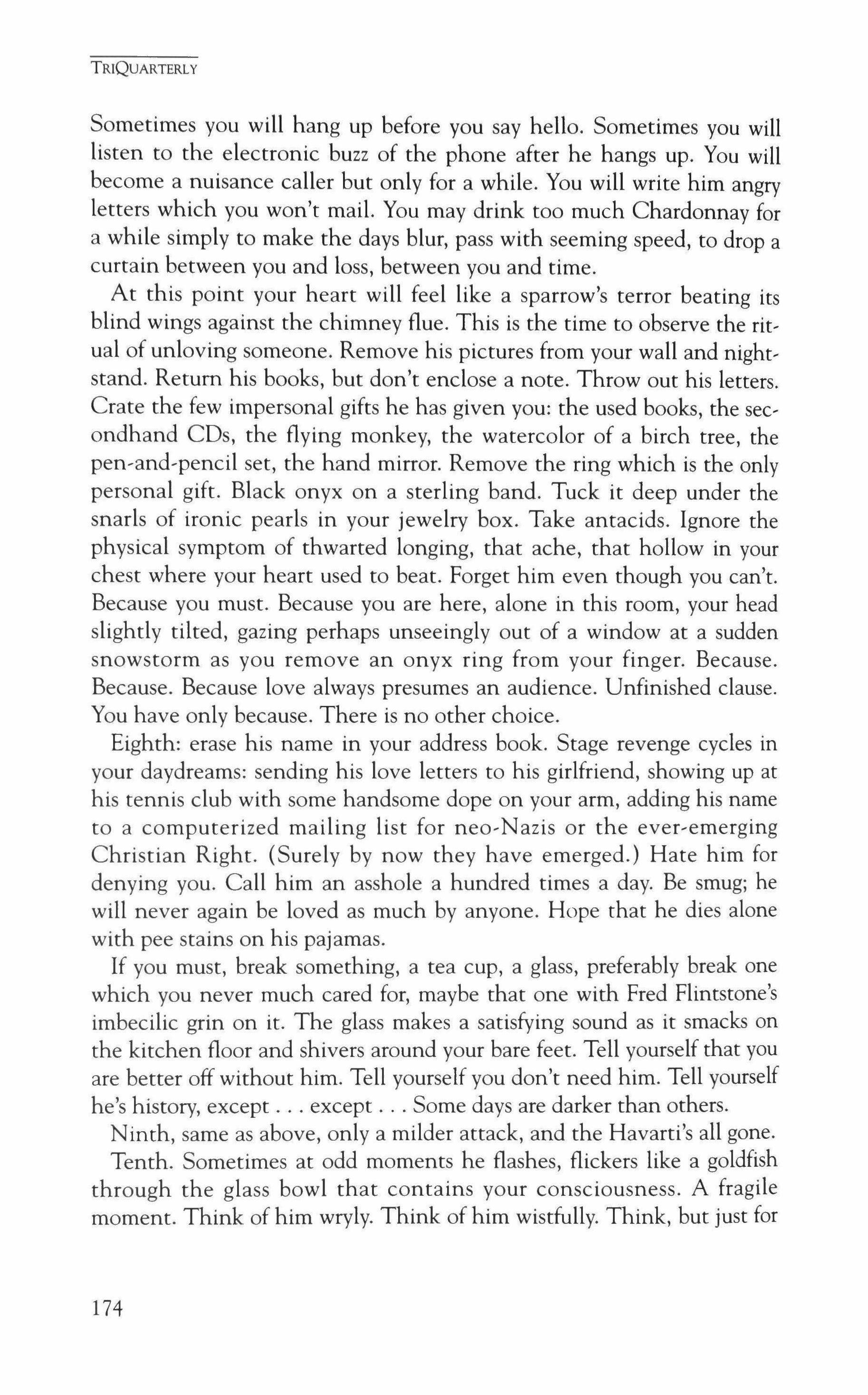
Sometimes you will hang up before you say hello. Sometimes you will listen to the electronic buzz of the phone after he hangs up. You will become a nuisance caller but only for a while. You will write him angry letters which you won't mail. You may drink too much Chardonnay for a while simply to make the days blur, pass with seeming speed, to drop a curtain between you and loss, between you and time.
At this point your heart will feel like a sparrow's terror beating its blind wings against the chimney flue. This is the time to observe the ritual of unloving someone. Remove his pictures from your wall and nightstand. Return his books, but don't enclose a note. Throw out his letters. Crate the few impersonal gifts he has given you: the used books, the secondhand CDs, the flying monkey, the watercolor of a birch tree, the pen-and-pencil set, the hand mirror. Remove the ring which is the only personal gift. Black onyx on a sterling band. Tuck it deep under the snarls of ironic pearls in your jewelry box. Take antacids. Ignore the physical symptom of thwarted longing, that ache, that hollow in your chest where your heart used to beat. Forget him even though you can't. Because you must. Because you are here, alone in this room, your head slightly tilted, gazing perhaps unseeingly out of a window at a sudden snowstorm as you remove an onyx ring from your finger. Because. Because. Because love always presumes an audience. Unfinished clause. You have only because. There is no other choice.
Eighth: erase his name in your address book. Stage revenge cycles in your daydreams: sending his love letters to his girlfriend, showing up at his tennis club with some handsome dope on your arm, adding his name to a computerized mailing list for neo-Nazis or the ever-emerging Christian Right. (Surely by now they have emerged.) Hate him for denying you. Call him an asshole a hundred times a day. Be smug; he will never again be loved as much by anyone. Hope that he dies alone with pee stains on his pajamas.
If you must, break something, a tea cup, a glass, preferably break one which you never much cared for, maybe that one with Fred Flintstone's imbecilic grin on it. The glass makes a satisfying sound as it smacks on the kitchen floor and shivers around your bare feet. Tell yourself that you are better off without him. Tell yourself you don't need him. Tell yourself he's history, except except Some days are darker than others. Ninth, same as above, only a milder attack, and the Havarti's all gone. Tenth. Sometimes at odd moments he flashes, flickers like a goldfish through the glass bowl that contains your consciousness. A fragile moment. Think of him wryly. Think of him wistfully. Think, but just for
TRIQUARTERLY
174

the duration of the briefest kiss, how it might have been other, that alternate life, that life which you might have led together. Pies in the oven, dimity curtains in the window, him there in that navy-blue wing chair reading one of his silly Techno-thrillers while you watch him with wifely fondness and your Golden Retriever lopes dopily across the yard and the Blue Flag Irises, the color of his eyes, spike up in the flower beds.
Eleventh: like ninth and tenth only a shade dimmer. The pain peels off like the scrims of mica sparkling on a granite boulder, paler and paler, thinner and thinner sheets of Isinglass. Un-loving is a process of exfoliation. Layer by layer, you get closer to the hard pebble that is your metamorphic heart, pressure-warped and heat-fused. You no longer call him just to hear his voice on the answering machine. You remember the box in the attic and are surprised as you unwrap the watercolor that it no longer pains you. Now that you no longer want to call him, you find that you could, that you could ask him how life is treating him, that you could bear to hear his girlfriend's name in his deep, measured voice. You try to recall her name. There it is: yes, Joyce. You actually could call him. But don't.
Hang the watercolor back up in the living room. Try to click through the wardrobe of your memory for his suits, the smell of his starched shirts only to find the closet empty, the gillyflower perfume wilted, and his socks lamenting their mates forever lost in the limbo of some fluorescent,buzzed Laundromat.
Discover that certain songs, Counting Crows' "Mr. Jones" perhaps, no longer make you cry, that instead you feel only the aura of that time, that discrete episode in your life as if it were lived by someone else, someone who once knew you very well, him perhaps. Shake your head as you marvel how once you thought your very life depended on a word, a word from him, a word that bore all the joy that is possible in this world. Yes. Yes. Yes, I do.
But No slammed the door on the mustiness of an empty closet.
There will be other surprises. When you reread Simone Weil, different phrases isolate themselves, like "To love purely is to consent to distance, it is to adore the distance between ourselves and that which we love." Love the middle distance; it is time. It is love itself. It is the peace of knowing that you have or once had the capacity to truly, truly love. And above all be prepared. Because just when you think that you are finally at long last over him; then, at that very moment the floor col, lapses as you realize that you love him still, that you always will, and that you cannot bear it. Fall into despair. Open the forbidden door 175
TRIQUARTERLY
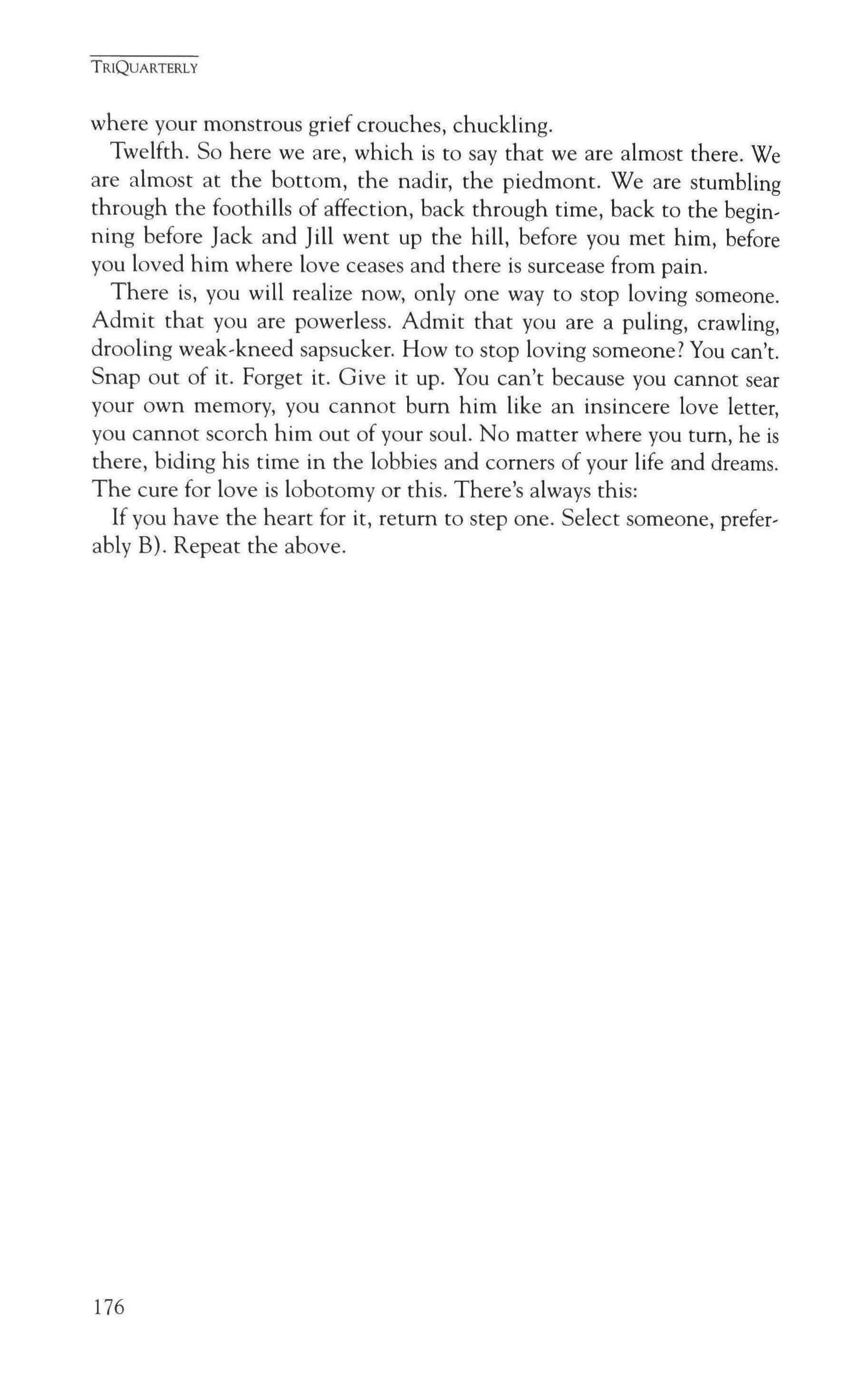
where your monstrous griefcrouches, chuckling. Twelfth. So here we are, which is to say that we are almost there. We are almost at the bottom, the nadir, the piedmont. We are stumbling through the foothills of affection, back through time, back to the beginning before Jack and Jill went up the hill, before you met him, before you loved him where love ceases and there is surcease from pain.
There is, you will realize now, only one way to stop loving someone. Admit that you are powerless. Admit that you are a puling, crawling, drooling weak-kneed sapsucker. How to stop loving someone? You can't. Snap out of it. Forget it. Give it up. You can't because you cannot sear your own memory, you cannot bum him like an insincere love letter, you cannot scorch him out of your soul. No matter where you tum, he is there, biding his time in the lobbies and comers of your life and dreams. The cure for love is lobotomy or this. There's always this: If you have the heart for it, return to step one. Select someone, preferably B). Repeat the above.
TRIQUARTERLY
176
Men Wearing Eye Shadow
Cammie McGovern

Their names were Dorie and Cary, two girls' names on boys-men, real, ly-both black and so imposing that, even seated, it was clear they could probably bench,press their teacher and come up laughing. At this midwestern university, the odds of having black students in class were just about this: seven percent, two in thirty, and Peter, the teacher, was certainly glad to see them (some diversity to the room, thank God, some color), but he was nervous to begin with. This was the first day of the first class he'd ever taught and he'd spent all summer getting ready. As he ran through the role call, he searched for a joke. He wanted the students to know he was approachable and fun, good for a few laughs. Among his other worries, he had a vague fear of everyone transferring before the second class.
"I'm going to get you two confused all the time," he said with a breathy laugh, an imitation of a teacher he'd had his freshman year who never learned names but was popular anyway. He meant of course the names, the ie sound, the gender neutrality. He didn't mean it like that, the way the whole class took it, obvious from the silence, the collective breath of surprise. Not like: I can't tell you people apart.
A prickly heat rose to his face and bloomed out to his ears. He stumbled quickly to brush past the joke. "So here's the syllabus," he said, handing out a pile to the first person in each row. "Take one and pass it back."
That night he lay on his sofa with a cold washcloth over his face and tried to erase the memory of his ferocious faux pas. John, his boyfriend of a year, sat next to his feet, watching "Wheel of Fortune" and prernaturely shouting wrong answers. "Bird of Paradise!" he screamed for a
TRIQUARTERLY
177
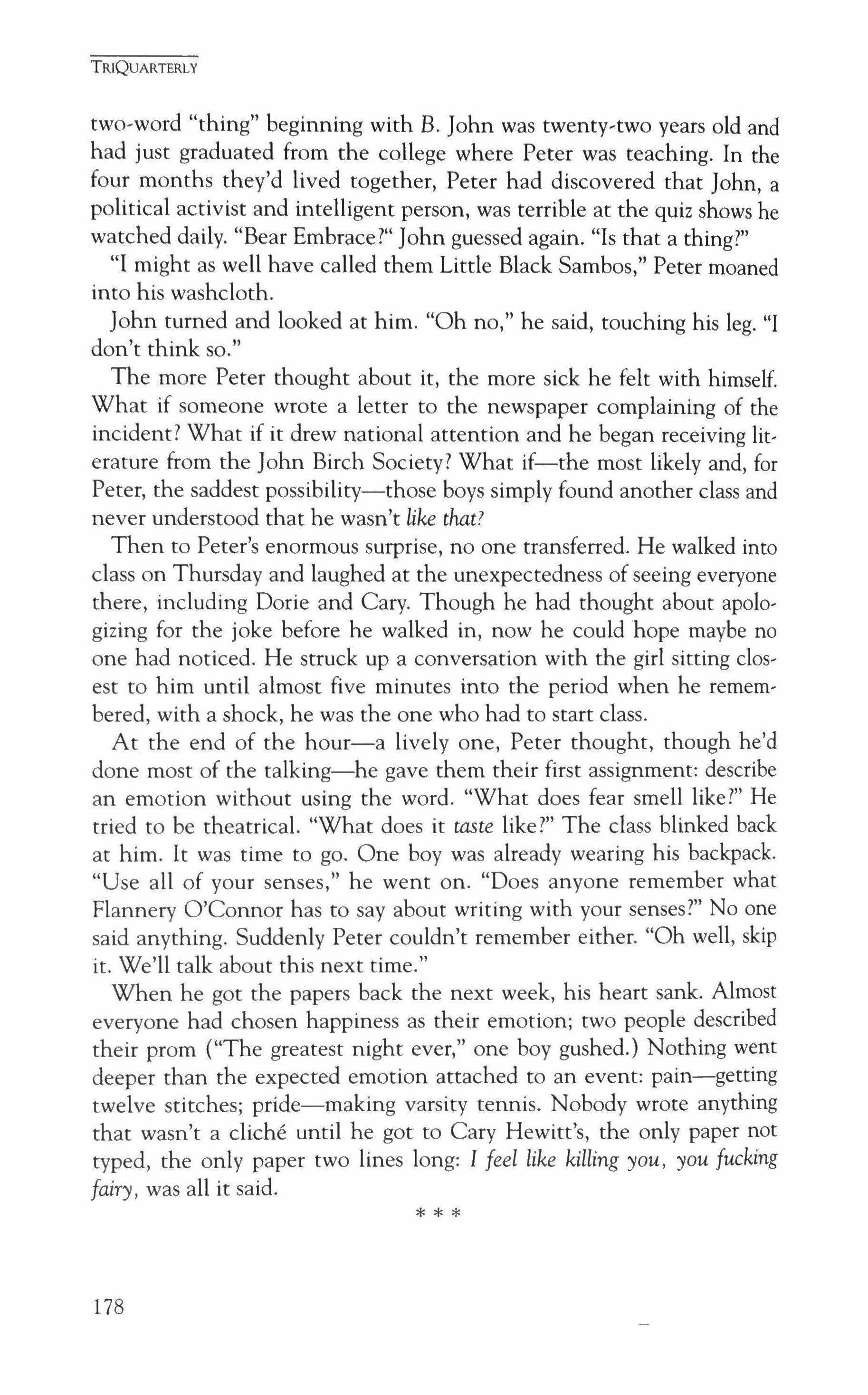
two-word "thing" beginning with B. John was twenty-two years old and had just graduated from the college where Peter was teaching. In the four months they'd lived together, Peter had discovered that John, a political activist and intelligent person, was terrible at the quiz shows he watched daily. "Bear Embrace?" John guessed again. "Is that a thing?"
"I might as well have called them Little Black Sambos," Peter moaned into his washcloth.
John turned and looked at him. "Oh no," he said, touching his leg. "I don't think so."
The more Peter thought about it, the more sick he felt with himself. What if someone wrote a letter to the newspaper complaining of the incident? What if it drew national attention and he began receiving literature from the John Birch Society? What if-the most likely and, for Peter, the saddest possibility-those boys simply found another class and never understood that he wasn't like that?
Then to Peter's enormous surprise, no one transferred. He walked into class on Thursday and laughed at the unexpectedness of seeing everyone there, including Dorie and Cary. Though he had thought about apologizing for the joke before he walked in, now he could hope maybe no one had noticed. He struck up a conversation with the girl sitting closest to him until almost five minutes into the period when he remembered, with a shock, he was the one who had to start class.
At the end of the hour-a lively one, Peter thought, though he'd done most of the talking-he gave them their first assignment: describe an emotion without using the word. "What does fear smell like?" He tried to be theatrical. "What does it taste like?" The class blinked back at him. It was time to go. One boy was already wearing his backpack. "Use all of your senses," he went on. "Does anyone remember what Flannery O'Connor has to say about writing with your senses?" No one said anything. Suddenly Peter couldn't remember either. "Oh well, skip it. We'll talk about this next time."
When he got the papers back the next week, his heart sank. Almost everyone had chosen happiness as their emotion; two people described their prom ("The greatest night ever," one boy gushed.) Nothing went deeper than the expected emotion attached to an event: pain-getting twelve stitches; pride-making varsity tennis. Nobody wrote anything that wasn't a cliche until he got to Cary Hewitt's, the only paper not typed, the only paper two lines long: I feel like killing you, you fucking fairy, was all it said.
TRIQUARTERLY
* * * 178
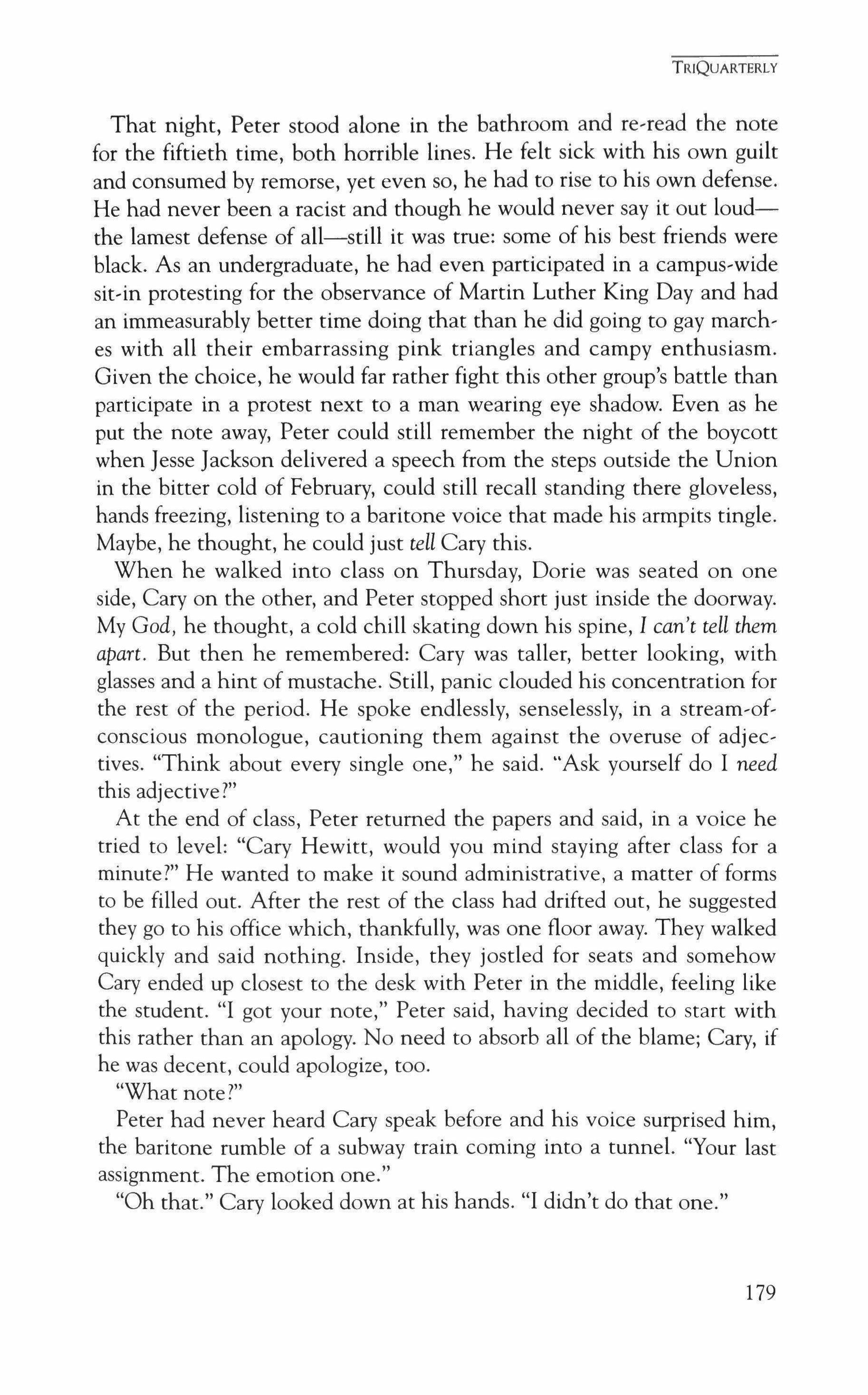
That night, Peter stood alone in the bathroom and re-read the note for the fiftieth time, both horrible lines. He felt sick with his own guilt and consumed by remorse, yet even so, he had to rise to his own defense. He had never been a racist and though he would never say it out loudthe lamest defense of all-still it was true: some of his best friends were black. As an undergraduate, he had even participated in a campus-wide sit,in protesting for the observance of Martin Luther King Day and had an immeasurably better time doing that than he did going to gay march, es with all their embarrassing pink triangles and campy enthusiasm. Given the choice, he would far rather fight this other group's battle than participate in a protest next to a man wearing eye shadow. Even as he put the note away, Peter could still remember the night of the boycott when Jesse Jackson delivered a speech from the steps outside the Union in the bitter cold of February, could still recall standing there gloveless, hands freezing, listening to a baritone voice that made his armpits tingle. Maybe, he thought, he could just tell Cary this.
When he walked into class on Thursday, Dorie was seated on one side, Cary on the other, and Peter stopped short just inside the doorway. My God, he thought, a cold chill skating down his spine, I can't tell them apart. But then he remembered: Cary was taller, better looking, with glasses and a hint of mustache. Still, panic clouded his concentration for the rest of the period. He spoke endlessly, senselessly, in a stream-ofconscious monologue, cautioning them against the overuse of adjectives. "Think about every single one," he said. "Ask yourself do I need this adjective?"
At the end of class, Peter returned the papers and said, in a voice he tried to level: "Cary Hewitt, would you mind staying after class for a minute?" He wanted to make it sound administrative, a matter of forms to be filled out. After the rest of the class had drifted out, he suggested they go to his office which, thankfully, was one floor away. They walked quickly and said nothing. Inside, they jostled for seats and somehow Cary ended up closest to the desk with Peter in the middle, feeling like the student. "I got your note," Peter said, having decided to start with this rather than an apology. No need to absorb all of the blame; Cary, if he was decent, could apologize, too.
"What note?"
Peter had never heard Cary speak before and his voice surprised him, the baritone rumble of a subway train coming into a tunnel. "Your last assignment. The emotion one."
"Oh that." Cary looked down at his hands. "I didn't do that one."
TRIQUARTERLY
179
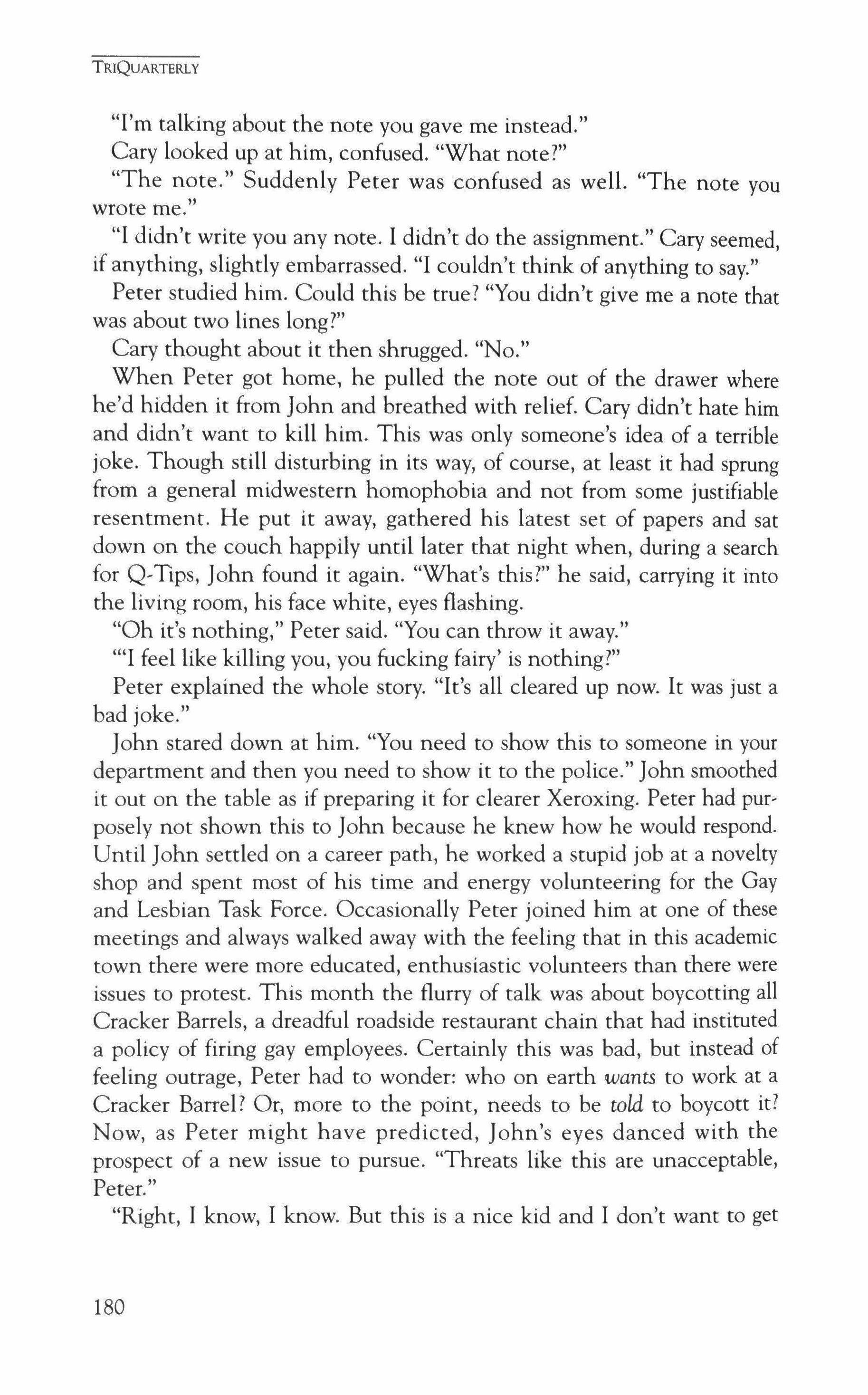
"I'm talking about the note you gave me instead."
Cary looked up at him, confused. "What note?"
"The note." Suddenly Peter was confused as well. "The note you wrote me."
"I didn't write you any note. I didn't do the assignment." Cary seemed, if anything, slightly embarrassed. "I couldn't think of anything to say."
Peter studied him. Could this be true? "You didn't give me a note that was about two lines long?"
Cary thought about it then shrugged. "No."
When Peter got home, he pulled the note out of the drawer where he'd hidden it from John and breathed with relief. Cary didn't hate him and didn't want to kill him. This was only someone's idea of a terrible joke. Though still disturbing in its way, of course, at least it had sprung from a general midwestern homophobia and not from some justifiable resentment. He put it away, gathered his latest set of papers and sat down on the couch happily until later that night when, during a search for Q-Tips, John found it again. "What's this?" he said, carrying it into the living room, his face white, eyes flashing.
"Oh it's nothing," Peter said. "You can throw it away."
"'I feel like killing you, you fucking fairy' is nothing?"
Peter explained the whole story. "It's all cleared up now. It was just a bad joke."
John stared down at him. "You need to show this to someone in your department and then you need to show it to the police." John smoothed it out on the table as if preparing it for clearer Xeroxing. Peter had purposely not shown this to John because he knew how he would respond. Until John settled on a career path, he worked a stupid job at a novelty shop and spent most of his time and energy volunteering for the Gay and Lesbian Task Force. Occasionally Peter joined him at one of these meetings and always walked away with the feeling that in this academic town there were more educated, enthusiastic volunteers than there were issues to protest. This month the flurry of talk was about boycotting all Cracker Barrels, a dreadful roadside restaurant chain that had instituted a policy of firing gay employees. Certainly this was bad, but instead of feeling outrage, Peter had to wonder: who on earth wants to work at a Cracker Barrel? Or, more to the point, needs to be told to boycott it? Now, as Peter might have predicted, John's eyes danced with the prospect of a new issue to pursue. "Threats like this are unacceptable, Peter."
"Right, I know, I know. But this is a nice kid and I don't want to get
TRIQUARTERLY
180
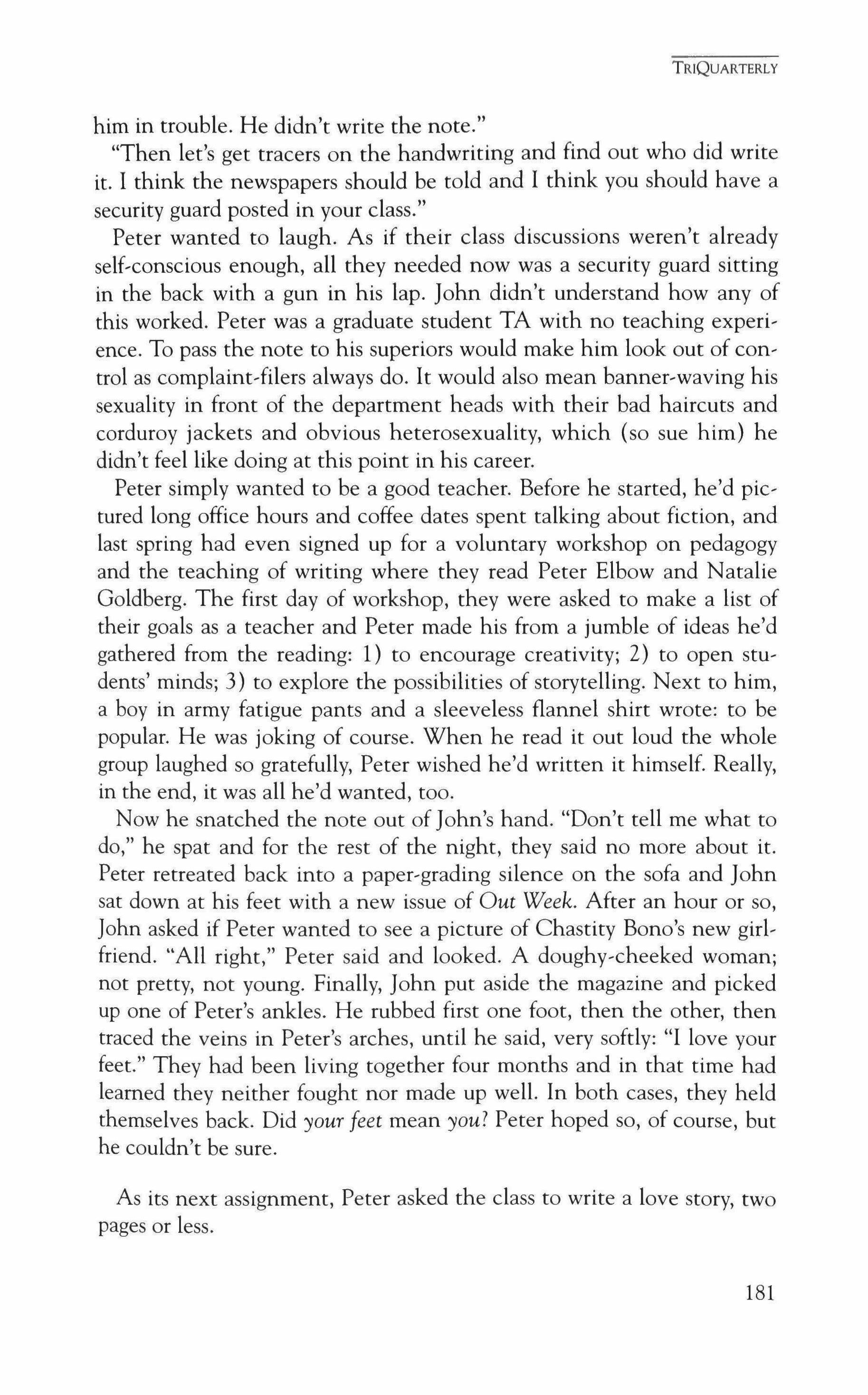
him in trouble. He didn't write the note."
"Then let's get tracers on the handwriting and find out who did write it. I think the newspapers should be told and I think you should have a security guard posted in your class."
Peter wanted to laugh. As if their class discussions weren't already self,conscious enough, all they needed now was a security guard sitting in the back with a gun in his lap. John didn't understand how any of this worked. Peter was a graduate student TA with no teaching experience. To pass the note to his superiors would make him look out of con, trol as complaint-filers always do. It would also mean banner-waving his sexuality in front of the department heads with their bad haircuts and corduroy jackets and obvious heterosexuality, which (so sue him) he didn't feel like doing at this point in his career.
Peter simply wanted to be a good teacher. Before he started, he'd pic, tured long office hours and coffee dates spent talking about fiction, and last spring had even signed up for a voluntary workshop on pedagogy and the teaching of writing where they read Peter Elbow and Natalie Goldberg. The first day of workshop, they were asked to make a list of their goals as a teacher and Peter made his from a jumble of ideas he'd gathered from the reading: 1) to encourage creativity; 2) to open stu, dents' minds; 3) to explore the possibilities of storytelling. Next to him, a boy in army fatigue pants and a sleeveless flannel shirt wrote: to be popular. He was joking of course. When he read it out loud the whole group laughed so gratefully, Peter wished he'd written it himself. Really, in the end, it was all he'd wanted, too.
Now he snatched the note out of John's hand. "Don't tell me what to do," he spat and for the rest of the night, they said no more about it. Peter retreated back into a paper-grading silence on the sofa and John sat down at his feet with a new issue of Out Week. After an hour or so, John asked if Peter wanted to see a picture of Chastity Bono's new girl, friend. "All right," Peter said and looked. A doughy-cheeked woman; not pretty, not young. Finally, John put aside the magazine and picked up one of Peter's ankles. He rubbed first one foot, then the other, then traced the veins in Peter's arches, until he said, very softly: "I love your feet." They had been living together four months and in that time had learned they neither fought nor made up well. In both cases, they held themselves back. Did your feet mean you? Peter hoped so, of course, but he couldn't be sure.
As its next assignment, Peter asked the class to write a love story, two pages or less.
TRIQUARTERLY
181
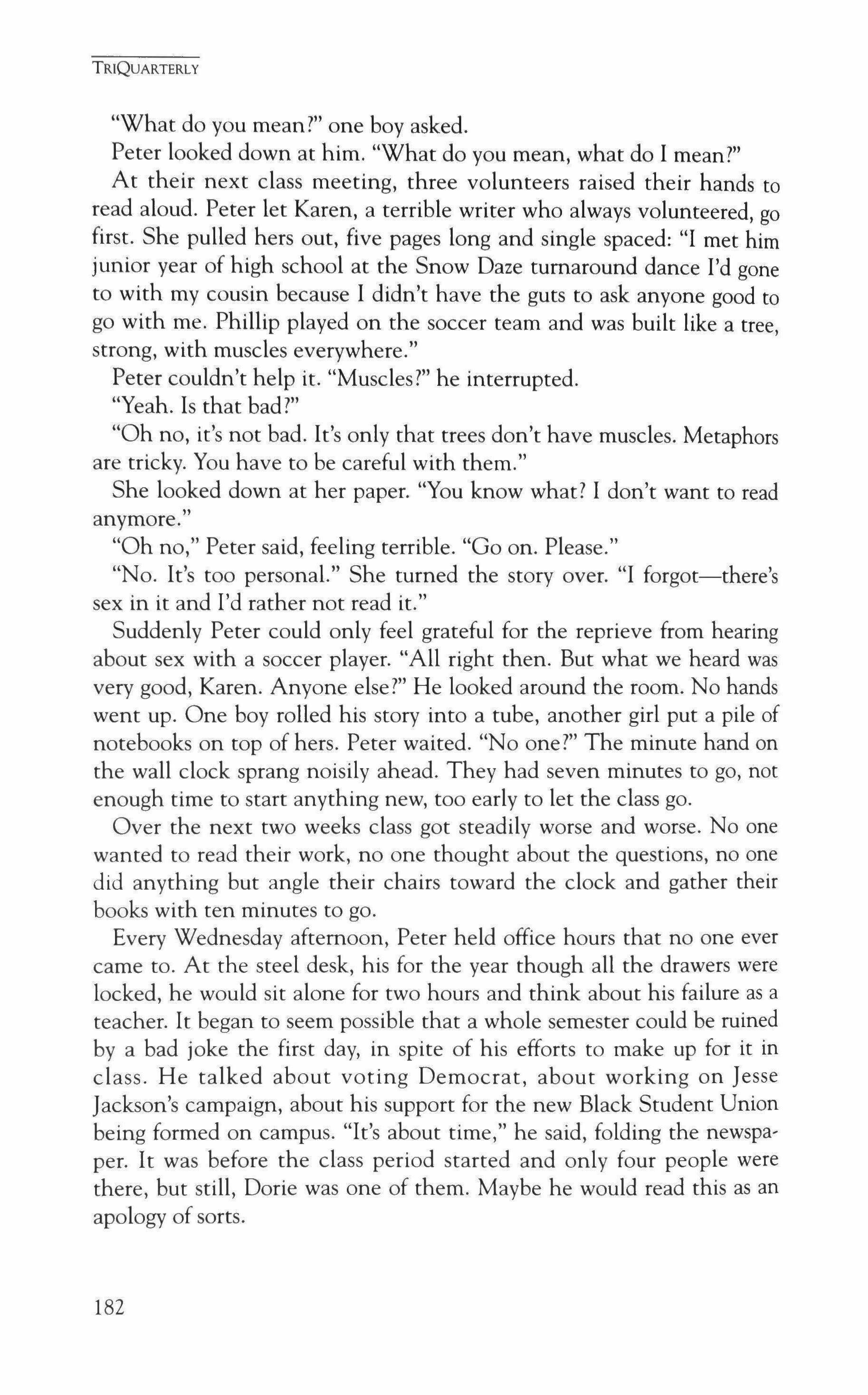
"What do you mean?" one boy asked. Peter looked down at him. "What do you mean, what do I mean?"
At their next class meeting, three volunteers raised their hands to read aloud. Peter let Karen, a terrible writer who always volunteered, go first. She pulled hers out, five pages long and single spaced: "I met him junior year of high school at the Snow Daze turnaround dance I'd gone to with my cousin because I didn't have the guts to ask anyone good to go with me. Phillip played on the soccer team and was built like a tree, strong, with muscles everywhere."
Peter couldn't help it. "Muscles?" he interrupted.
"Yeah. Is that bad?"
"Oh no, it's not bad. It's only that trees don't have muscles. Metaphors are tricky. You have to be careful with them."
She looked down at her paper. "You know what? I don't want to read anymore."
"Oh no," Peter said, feeling terrible. "Go on. Please."
"No. It's too personal." She turned the story over. "I forgot-there's sex in it and I'd rather not read it."
Suddenly Peter could only feel grateful for the reprieve from hearing about sex with a soccer player. "All right then. But what we heard was very good, Karen. Anyone else?" He looked around the room. No hands went up. One boy rolled his story into a tube, another girl put a pile of notebooks on top of hers. Peter waited. "No one?" The minute hand on the wall clock sprang noisily ahead. They had seven minutes to go, not enough time to start anything new, too early to let the class go.
Over the next two weeks class got steadily worse and worse. No one wanted to read their work, no one thought about the questions, no one did anything but angle their chairs toward the clock and gather their books with ten minutes to go.
Every Wednesday afternoon, Peter held office hours that no one ever came to. At the steel desk, his for the year though all the drawers were locked, he would sit alone for two hours and think about his failure as a teacher. It began to seem possible that a whole semester could be ruined by a bad joke the first day, in spite of his efforts to make up for it in class. He talked about voting Democrat, about working on Jesse Jackson's campaign, about his support for the new Black Student Union being formed on campus. "It's about time," he said, folding the newspaper. It was before the class period started and only four people were there, but still, Dorie was one of them. Maybe he would read this as an apology of sorts.
TRIQUARTERLY
182
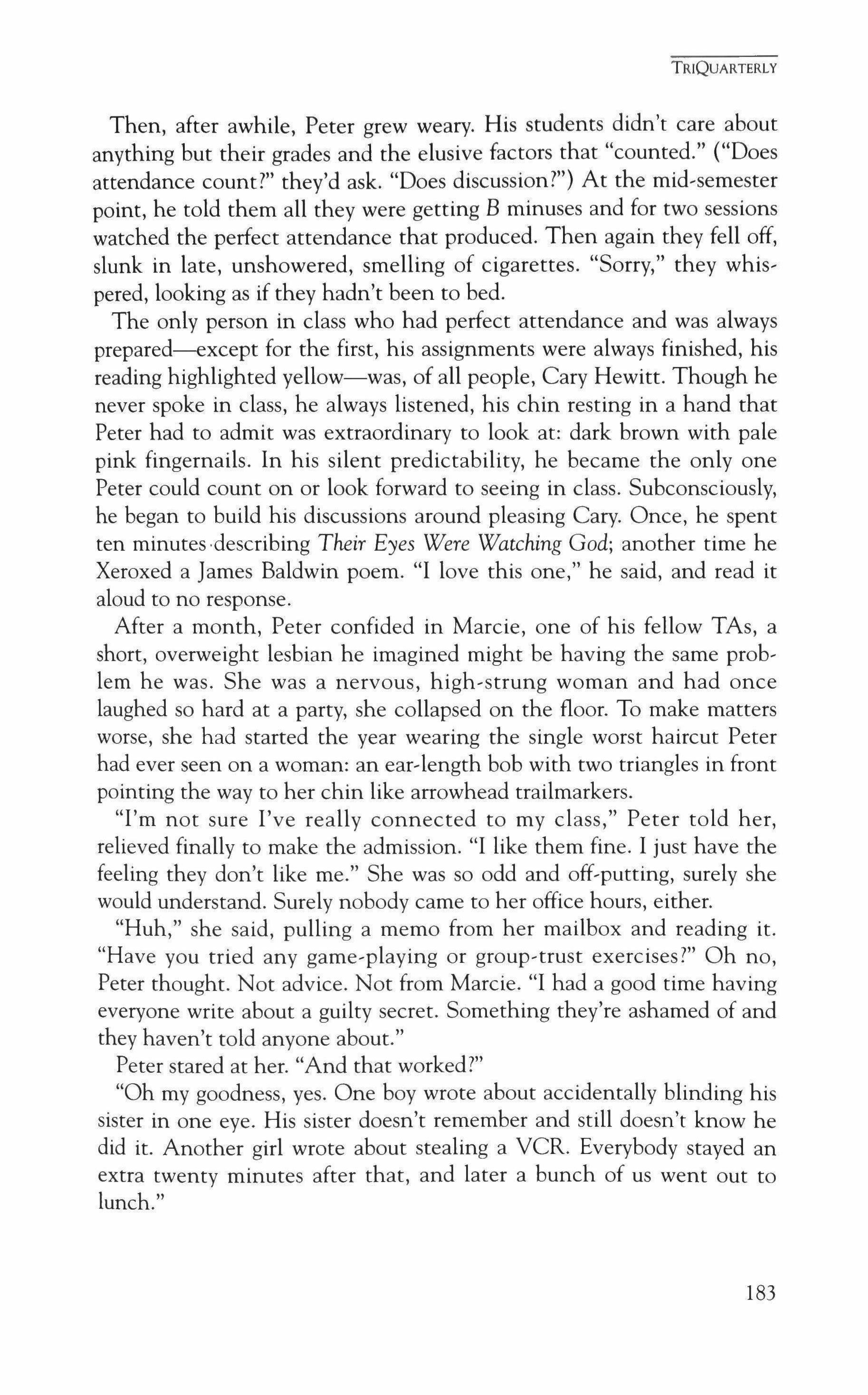
Then, after awhile, Peter grew weary. His students didn't care about anything but their grades and the elusive factors that "counted." ("Does attendance count?" they'd ask. "Does discussion?") At the mid-semester point, he told them all they were getting B minuses and for two sessions watched the perfect attendance that produced. Then again they fell off, slunk in late, unshowered, smelling of cigarettes. "Sorry," they whispered, looking as if they hadn't been to bed.
The only person in class who had perfect attendance and was always prepared-except for the first, his assignments were always finished, his reading highlighted yellow-was, of all people, Cary Hewitt. Though he never spoke in class, he always listened, his chin resting in a hand that Peter had to admit was extraordinary to look at: dark brown with pale pink fingernails. In his silent predictability, he became the only one Peter could count on or look forward to seeing in class. Subconsciously, he began to build his discussions around pleasing Cary. Once, he spent ten minutes ·describing Their Eyes Were Watching God; another time he Xeroxed a James Baldwin poem. "I love this one," he said, and read it aloud to no response.
After a month, Peter confided in Marcie, one of his fellow TAs, a short, overweight lesbian he imagined might be having the same problern he was. She was a nervous, high-strung woman and had once laughed so hard at a party, she collapsed on the floor. To make matters worse, she had started the year wearing the single worst haircut Peter had ever seen on a woman: an ear-length bob with two triangles in front pointing the way to her chin like arrowhead trailmarkers.
"I'm not sure I've really connected to my class," Peter told her, relieved finally to make the admission. "I like them fine. I just have the feeling they don't like me." She was so odd and off-putting, surely she would understand. Surely nobody came to her office hours, either.
"Huh," she said, pulling a memo from her mailbox and reading it. "Have you tried any garne-playing or group-trust exercises?" Oh no, Peter thought. Not advice. Not from Marcie. "I had a good time having everyone write about a guilty secret. Something they're ashamed of and they haven't told anyone about."
Peter stared at her. "And that worked?"
"Oh my goodness, yes. One boy wrote about accidentally blinding his sister in one eye. His sister doesn't remember and still doesn't know he did it. Another girl wrote about stealing a VCR. Everybody stayed an extra twenty minutes after that, and later a bunch of us went out to lunch."
TRIQUARTERLY
183
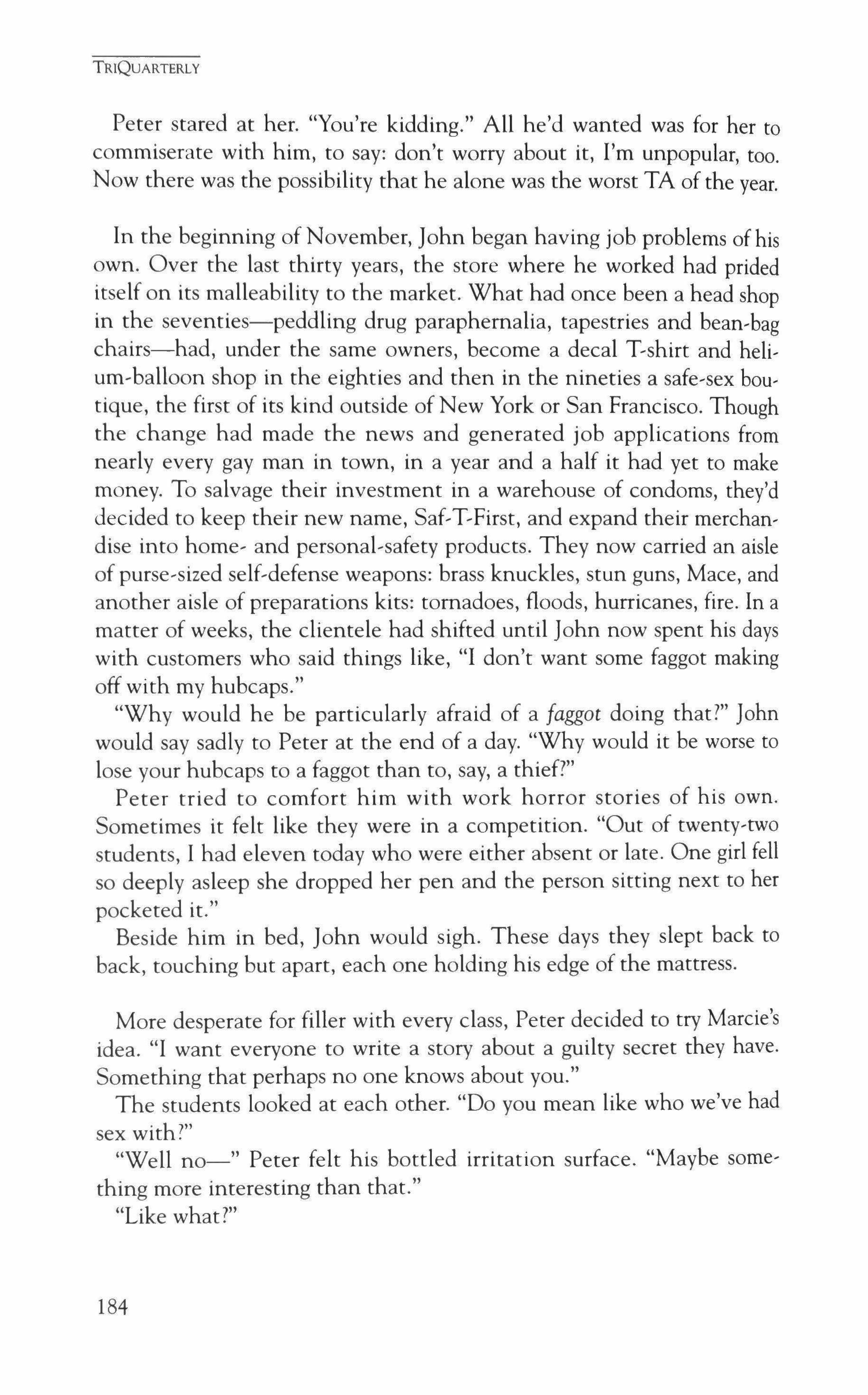
Peter stared at her. "You're kidding." All he'd wanted was for her to commiserate with him, to say: don't worry about it, I'm unpopular, too. Now there was the possibility that he alone was the worst TA of the year.
In the beginning of November, John began having job problems of his own. Over the last thirty years, the store where he worked had prided itself on its malleability to the market. What had once been a head shop in the seventies-peddling drug paraphernalia, tapestries and bean-bag chairs-had, under the same owners, become a decal T-shirt and helium-balloon shop in the eighties and then in the nineties a safe-sex boutique, the first of its kind outside of New York or San Francisco. Though the change had made the news and generated job applications from nearly every gay man in town, in a year and a half it had yet to make money. To salvage their investment in a warehouse of condoms, they'd decided to keep their new name, Saf-T'First, and expand their merchandise into home- and personal-safety products. They now carried an aisle of purse-sized self-defense weapons: brass knuckles, stun guns, Mace, and another aisle of preparations kits: tornadoes, floods, hurricanes, fire. In a matter of weeks, the clientele had shifted until John now spent his days with customers who said things like, "I don't want some faggot making off with my hubcaps."
"Why would he be particularly afraid of a faggot doing that?" John would say sadly to Peter at the end of a day. "Why would it be worse to lose your hubcaps to a faggot than to, say, a thief?"
Peter tried to comfort him with work horror stories of his own. Sometimes it felt like they were in a competition. "Out of twenty-two students, I had eleven today who were either absent or late. One girl fell so deeply asleep she dropped her pen and the person sitting next to her pocketed it."
Beside him in bed, John would sigh. These days they slept back to back, touching but apart, each one holding his edge of the mattress.
More desperate for filler with every class, Peter decided to try Marcie's idea. "I want everyone to write a story about a guilty secret they have. Something that perhaps no one knows about you."
The students looked at each other. "Do you mean like who we've had sex with?"
"Well no-" Peter felt his bottled irritation surface. "Maybe something more interesting than that."
"Like what?"
TRIQUARTERLY
184
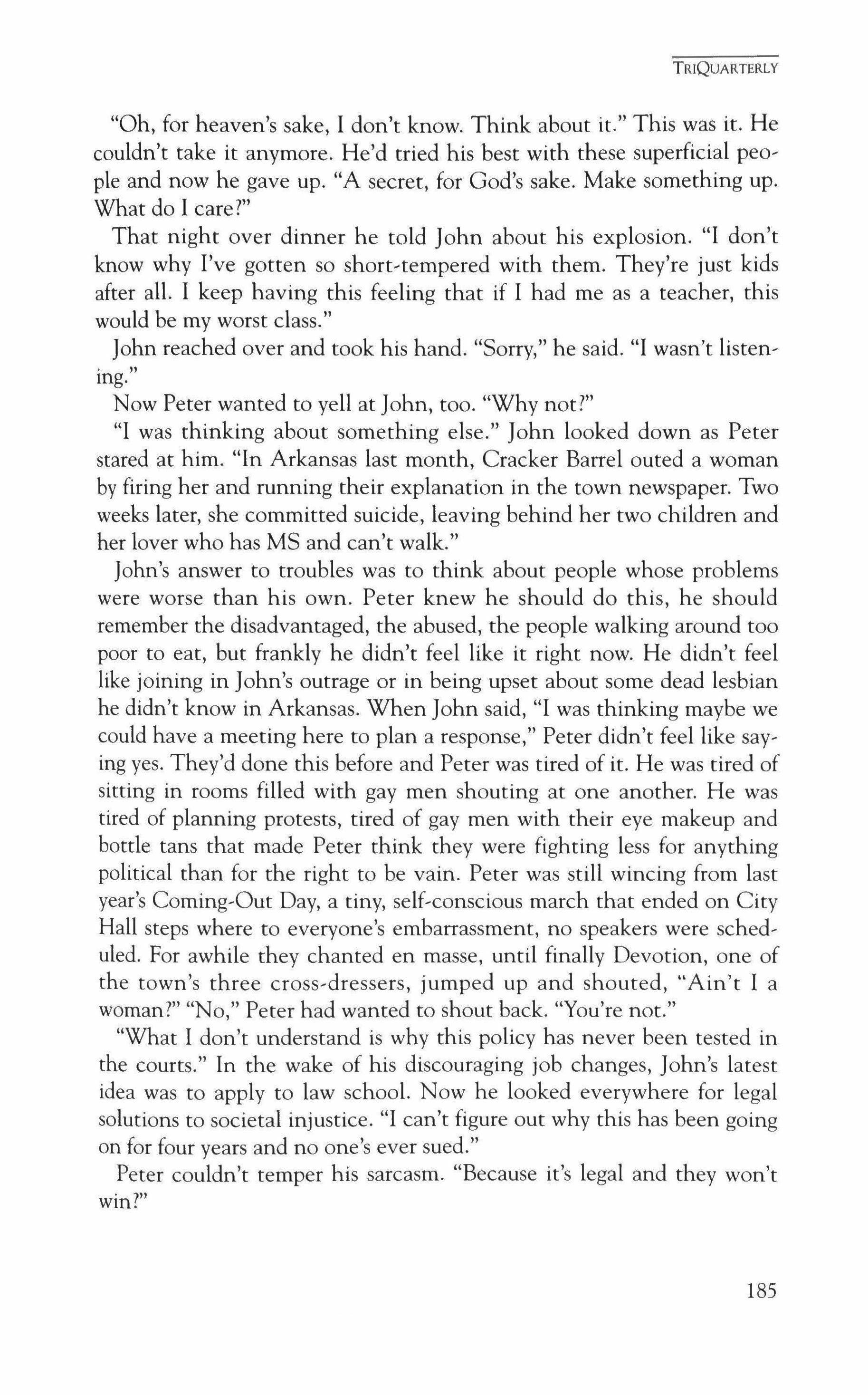
"Oh, for heaven's sake, I don't know. Think about it." This was it. He couldn't take it anymore. He'd tried his best with these superficial people and now he gave up. "A secret, for God's sake. Make something up. What do I care?"
That night over dinner he told John about his explosion. "I don't know why I've gotten so short,tempered with them. They're just kids after all. I keep having this feeling that if I had me as a teacher, this would be my worst class."
John reached over and took his hand. "Sorry," he said. "I wasn't listen' ing."
Now Peter wanted to yell at John, too. "Why not?"
"I was thinking about something else." John looked down as Peter stared at him. "In Arkansas last month, Cracker Barrel outed a woman by firing her and running their explanation in the town newspaper. Two weeks later, she committed suicide, leaving behind her two children and her lover who has MS and can't walk."
John's answer to troubles was to think about people whose problems were worse than his own. Peter knew he should do this, he should remember the disadvantaged, the abused, the people walking around too poor to eat, but frankly he didn't feel like it right now. He didn't feel like joining in John's outrage or in being upset about some dead lesbian he didn't know in Arkansas. When John said, "I was thinking maybe we could have a meeting here to plan a response," Peter didn't feel like say' ing yes. They'd done this before and Peter was tired of it. He was tired of sitting in rooms filled with gay men shouting at one another. He was tired of planning protests, tired of gay men with their eye makeup and bottle tans that made Peter think they were fighting less for anything political than for the right to be vain. Peter was still wincing from last year's Corning-Out Day, a tiny, self-conscious march that ended on City Hall steps where to everyone's embarrassment, no speakers were scheduled. For awhile they chanted en masse, until finally Devotion, one of the town's three cross-dressers, jumped up and shouted, "Ain't I a woman?" "No," Peter had wanted to shout back. "You're not."
"What I don't understand is why this policy has never been tested in the courts." In the wake of his discouraging job changes, John's latest idea was to apply to law schooL Now he looked everywhere for legal solutions to societal injustice. "I can't figure out why this has been going on for four years and no one's ever sued."
Peter couldn't temper his sarcasm. "Because it's legal and they won't win?"
TRIQUARTERLY
185
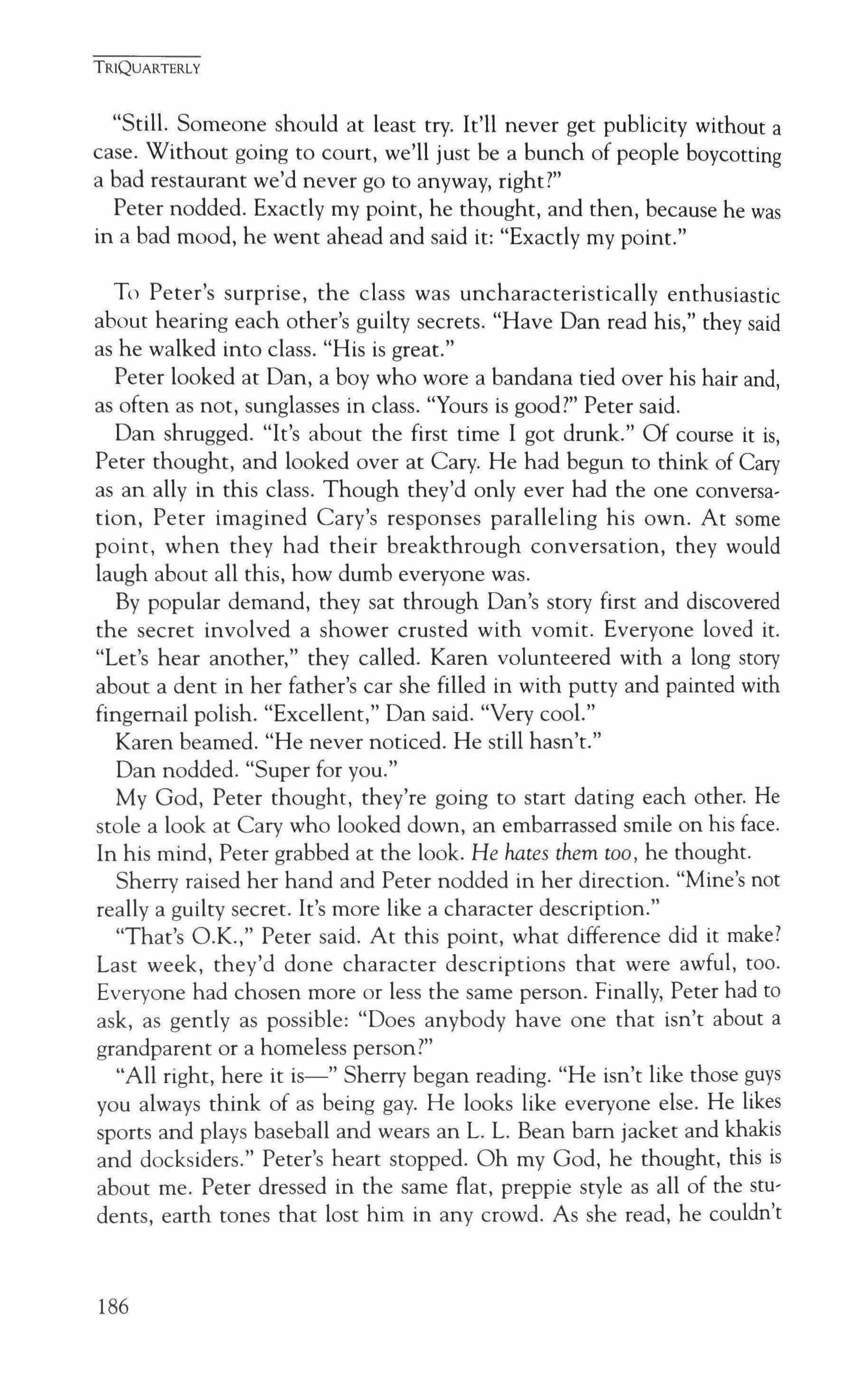
"Still. Someone should at least try. It'll never get publicity without a case. Without going to court, we'll just be a bunch of people boycotting a bad restaurant we'd never go to anyway, right?"
Peter nodded. Exactly my point, he thought, and then, because he was in a bad mood, he went ahead and said it: "Exactly my point."
To Peter's surprise, the class was uncharacteristically enthusiastic about hearing each other's guilty secrets. "Have Dan read his," they said as he walked into class. "His is great."
Peter looked at Dan, a boy who wore a bandana tied over his hair and, as often as not, sunglasses in class. "Yours is good?" Peter said.
Dan shrugged. "It's about the first time I got drunk." Of course it is, Peter thought, and looked over at Cary. He had begun to think of Cary as an ally in this class. Though they'd only ever had the one conversation, Peter imagined Cary's responses paralleling his own. At some point, when they had their breakthrough conversation, they would laugh about all this, how dumb everyone was.
By popular demand, they sat through Dan's story first and discovered the secret involved a shower crusted with vomit. Everyone loved it. "Let's hear another," they called. Karen volunteered with a long story about a dent in her father's car she filled in with putty and painted with fingernail polish. "Excellent," Dan said. "Very cool."
Karen beamed. "He never noticed. He still hasn't."
Dan nodded. "Super for you."
My God, Peter thought, they're going to start dating each other. He stole a look at Cary who looked down, an embarrassed smile on his face. In his mind, Peter grabbed at the look. He hates them too, he thought.
Sherry raised her hand and Peter nodded in her direction. "Mine's not really a guilty secret. It's more like a character description."
"That's O.K.," Peter said. At this point, what difference did it make? Last week, they'd done character descriptions that were awful, too. Everyone had chosen more or less the same person. Finally, Peter had to ask, as gently as possible: "Does anybody have one that isn't about a grandparent or a homeless person?"
"All right, here it is-" Sherry began reading. "He isn't like those guys you always think of as being gay. He looks like everyone else. He likes sports and plays baseball and wears an L. L. Bean bam jacket and khakis and docksiders." Peter's heart stopped. Oh my God, he thought, this is about me. Peter dressed in the same flat, preppie style as all of the students, earth tones that lost him in any crowd. As she read, he couldn't
TRIQUARTERLY
186
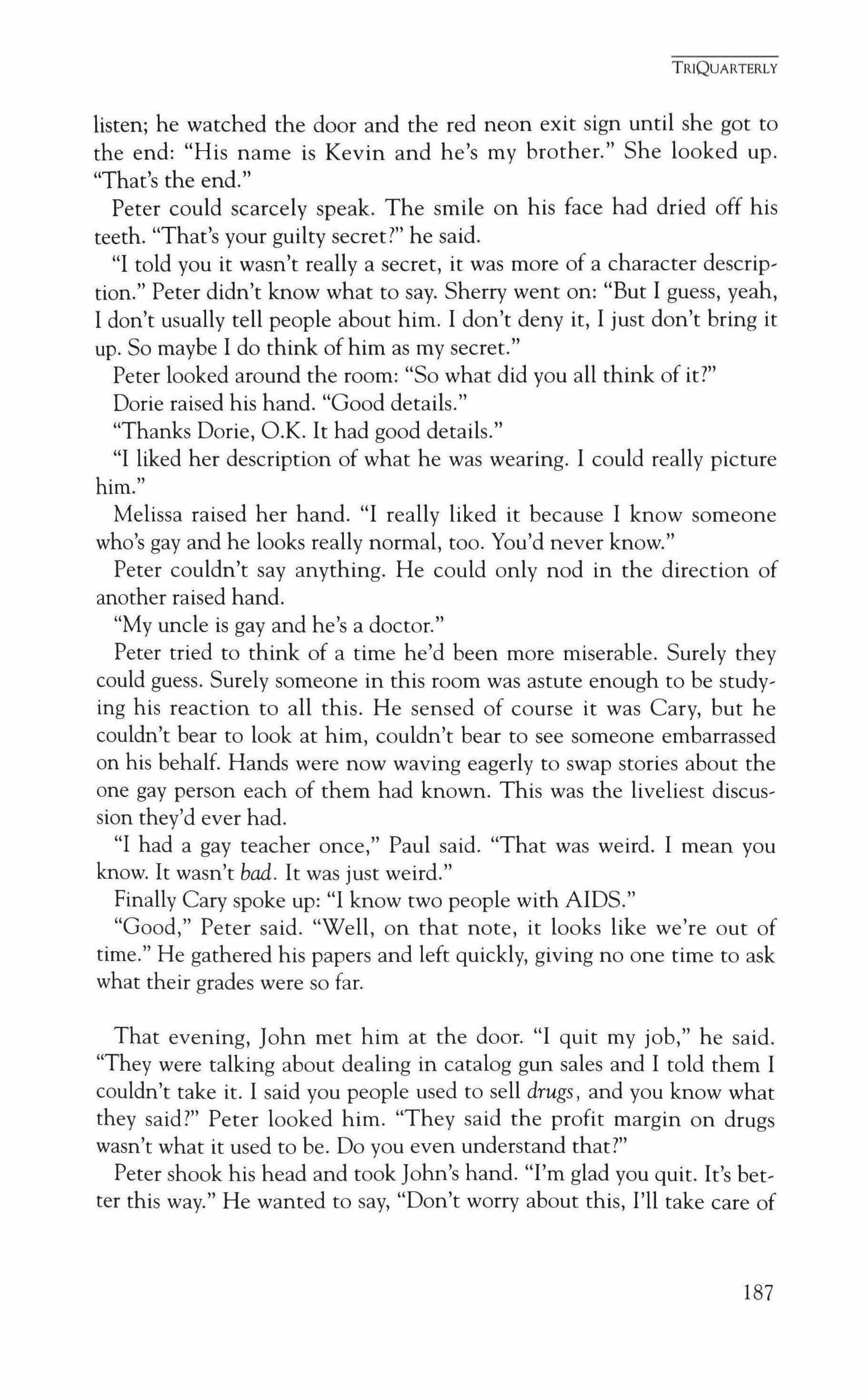
listen; he watched the door and the red neon exit sign until she got to the end: "His name is Kevin and he's my brother." She looked up. "That's the end."
Peter could scarcely speak. The smile on his face had dried off his teeth. "That's your guilty secret?" he said.
"I told you it wasn't really a secret, it was more of a character description." Peter didn't know what to say. Sherry went on: "But I guess, yeah, I don't usually tell people about him. I don't deny it, I just don't bring it up. So maybe I do think of him as my secret."
Peter looked around the room: "So what did you all think of it?"
Dorie raised his hand. "Good details."
"Thanks Dorie, O.K. It had good details."
"I liked her description of what he was wearing. I could really picture him."
Melissa raised her hand. "I really liked it because I know someone who's gay and he looks really normal, too. You'd never know."
Peter couldn't say anything. He could only nod in the direction of another raised hand.
"My uncle is gay and he's a doctor."
Peter tried to think of a time he'd been more miserable. Surely they could guess. Surely someone in this room was astute enough to be studying his reaction to all this. He sensed of course it was Cary, but he couldn't bear to look at him, couldn't bear to see someone embarrassed on his behalf. Hands were now waving eagerly to swap stories about the one gay person each of them had known. This was the liveliest discussian they'd ever had.
"I had a gay teacher once," Paul said. "That was weird. I mean you know. It wasn't bad. It was just weird."
Finally Cary spoke up: "I know two people with AIDS."
"Good," Peter said. "Well, on that note, it looks like we're out of time." He gathered his papers and left quickly, giving no one time to ask what their grades were so far.
That evening, John met him at the door. "I quit my job," he said. "They were talking about dealing in catalog gun sales and I told them I couldn't take it. I said you people used to sell drugs, and you know what they said?" Peter looked him. "They said the profit margin on drugs wasn't what it used to be. Do you even understand that?"
Peter shook his head and took John's hand. "I'm glad you quit. It's better this way." He wanted to say, "Don't worry about this, I'll take care of 187
TRIQUARTERLY
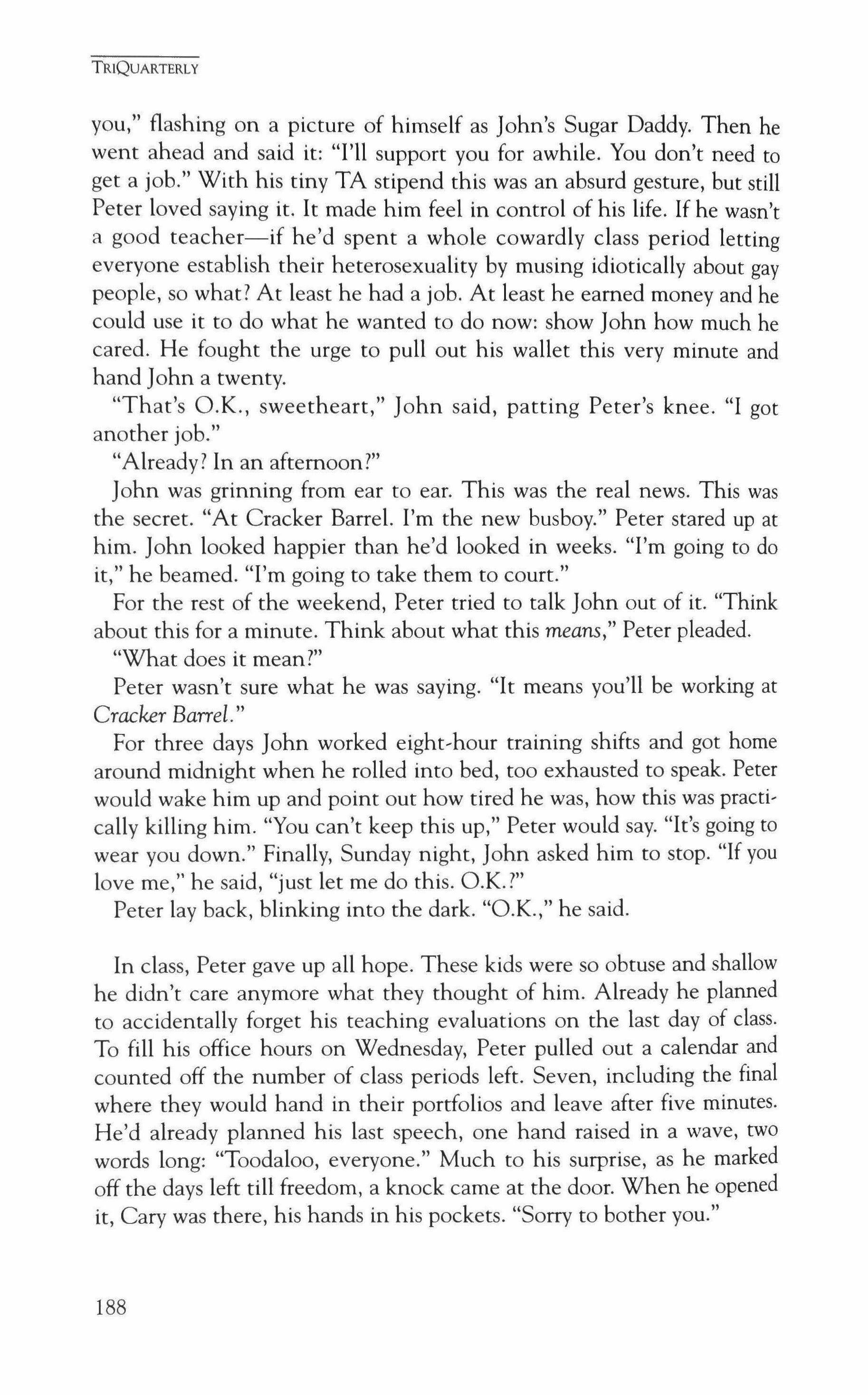
you," flashing on a picture of himself as John's Sugar Daddy. Then he went ahead and said it: "I'll support you for awhile. You don't need to get a job." With his tiny TA stipend this was an absurd gesture, but still Peter loved saying it. It made him feel in control of his life. If he wasn't a good teacher-if he'd spent a whole cowardly class period letting everyone establish their heterosexuality by musing idiotically about gay people, so what? At least he had a job. At least he earned money and he could use it to do what he wanted to do now: show John how much he cared. He fought the urge to pull out his wallet this very minute and hand John a twenty.
"That's O.K., sweetheart," John said, patting Peter's knee. "I got another job."
"Already? In an afternoon?"
John was grinning from ear to ear. This was the real news. This was the secret. "At Cracker Barrel. I'm the new busboy." Peter stared up at him. John looked happier than he'd looked in weeks. "I'm going to do it," he beamed. "I'm going to take them to court."
For the rest of the weekend, Peter tried to talk John out of it. "Think about this for a minute. Think about what this means," Peter pleaded. "What does it mean?"
Peter wasn't sure what he was saying. "It means you'll be working at Cracker Barrel."
For three days John worked eight-hour training shifts and got home around midnight when he rolled into bed, too exhausted to speak. Peter would wake him up and point out how tired he was, how this was practically killing him. "You can't keep this up," Peter would say. "It's going to wear you down." Finally, Sunday night, John asked him to stop. "If you love me," he said, "just let me do this. O.K.?"
Peter lay back, blinking into the dark. "O.K.," he said.
In class, Peter gave up all hope. These kids were so obtuse and shallow he didn't care anymore what they thought of him. Already he planned to accidentally forget his teaching evaluations on the last day of class. To fill his office hours on Wednesday, Peter pulled out a calendar and counted off the number of class periods left. Seven, including the final where they would hand in their portfolios and leave after five minutes. He'd already planned his last speech, one hand raised in a wave, two words long: "Toodaloo, everyone." Much to his surprise, as he marked off the days left till freedom, a knock came at the door. When he opened it, Cary was there, his hands in his pockets. "Sorry to bother you."
TRIQUARTERLY
188

"No, no. Come in." Peter couldn't help it, he was idiotically excited. At last, his most interested student was here to talk about writing or maybe, even better, the rest of the class.
"There was something I wanted to ask you," Cary said. "Of course, certainly. Come in. Sit down."
Cary stepped inside, but didn't sit down or take his backpack off. He seemed unsure of how to begin, so Peter started. "I've really enjoyed some of your writing. Especially the poetry. I'd be curious what poets you read."
Cary seemed uninterested in talking about this. "I was wondering if you would write me a letter of recommendation. I need one for my scholarship."
"Of course!" Peter clapped his hands together. What an honor, he thought and what a surprise. "I'd love to write you a letter of recornmendation. What would you like me to say? What should I be emphasizing?"
Cary shrugged as he reached down and pulled out a blue piece of paper. "Whatever. That I come to class. That I pay attention."
"I can say more if you'd like. I can tell them you're a poet who shows great promise."
Cary looked around the office. "O.K."
After Cary left, Peter unfolded the piece of paper. He thought about how carefully he had chosen the teachers he asked to write his own recommendations, how he looked for the ones he admired, whose class had been important to him. Silly as it sounded, this one request made him feel better about the whole semester. He read the instructions on filling out the recommendation, from a hometown Rotary Club, chatty and personal. "Be as honest as possible," it said. Peter wondered if he should include something about Cary's reticence-how he prepared for class yet never spoke, how he seemed to have very few friends. He thought for awhile about how he would phrase it, and then he looked down at the release signature on the bottom of the page. His heart stopped. There, in the handwriting Peter had etched in his brain: "Cary Hewitt." He didn't even need to compare it to the note he had at home. He already knew. It was exactly the same.
Instead of going home that night, Peter decided to drive out to the Cracker Barrel and visit John at work. He would sit in a vinyl booth, eat overcooked food and watch John move through the room carrying a gray tub of dishes in his flattering black pants. It would soothe his nerves and make him feel better. They wouldn't have to say anything. Like his one affair in high school, they could say hello only with their 189
TRIQUARTERLY
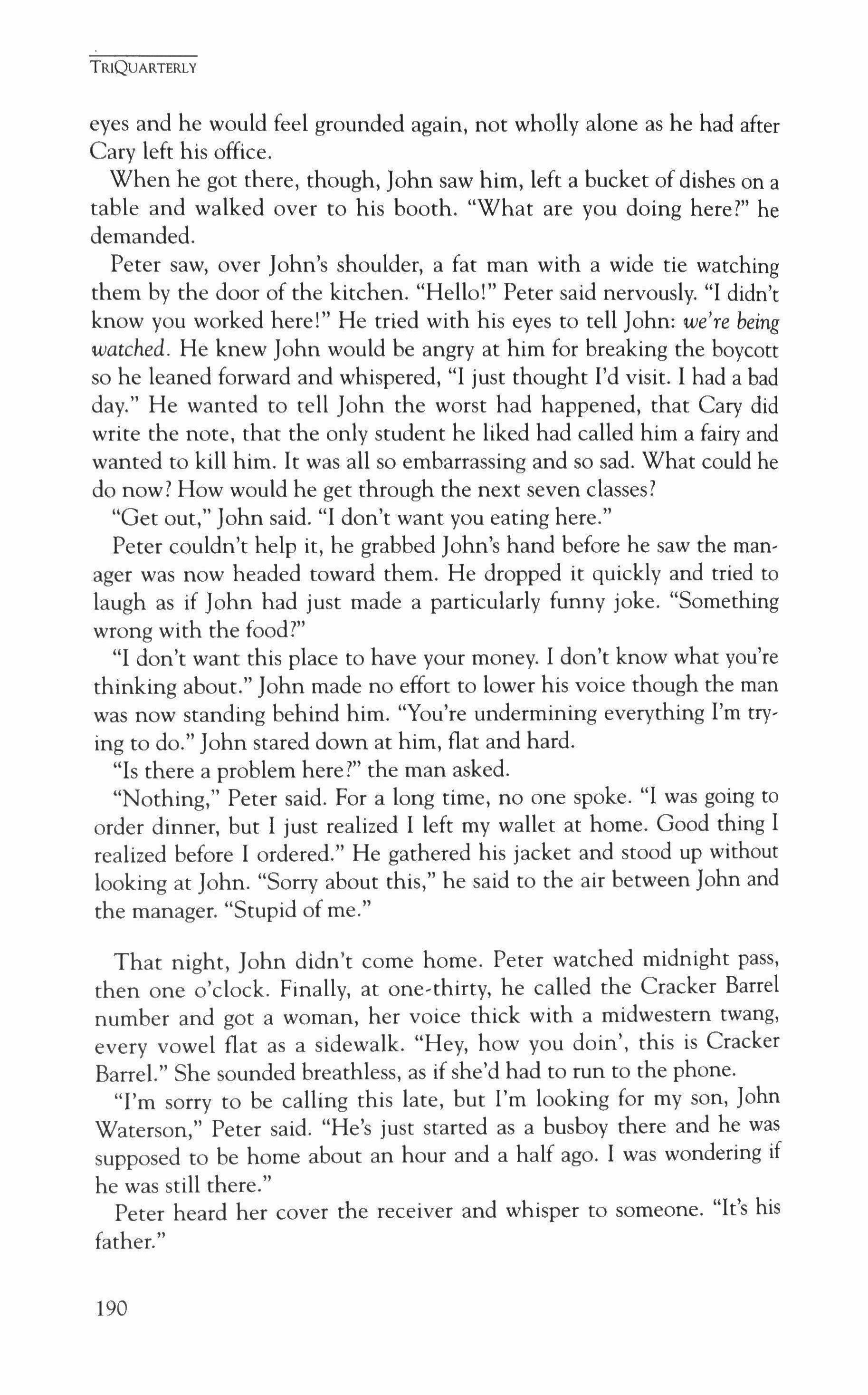
eyes and he would feel grounded again, not wholly alone as he had after Cary left his office.
When he got there, though, John saw him, left a bucket of dishes on a table and walked over to his booth. "What are you doing here?" he demanded.
Peter saw, over John's shoulder, a fat man with a wide tie watching them by the door of the kitchen. "Hello!" Peter said nervously. "I didn't know you worked here!" He tried with his eyes to tell John: we're being watched. He knew John would be angry at him for breaking the boycott so he leaned forward and whispered, "I just thought I'd visit. I had a bad day." He wanted to tell John the worst had happened, that Cary did write the note, that the only student he liked had called him a fairy and wanted to kill him. It was all so embarrassing and so sad. What could he do now? How would he get through the next seven classes?
"Get out," John said. "I don't want you eating here."
Peter couldn't help it, he grabbed John's hand before he saw the manager was now headed toward them. He dropped it quickly and tried to laugh as if John had just made a particularly funny joke. "Something wrong with the food?"
"I don't want this place to have your money. I don't know what you're thinking about." John made no effort to lower his voice though the man was now standing behind him. "You're undermining everything I'm trying to do." John stared down at him, flat and hard.
"Is there a problem here?" the man asked.
"Nothing," Peter said. For a long time, no one spoke. "I was going to order dinner, but I just realized I left my wallet at home. Good thing I realized before I ordered." He gathered his jacket and stood up without looking at John. "Sorry about this," he said to the air between John and the manager. "Stupid of me."
That night, John didn't come home. Peter watched midnight pass, then one o'clock. Finally, at one-thirty, he called the Cracker Barrel number and got a woman, her voice thick with a midwestern twang, every vowel flat as a sidewalk. "Hey, how you doin', this is Cracker Barrel." She sounded breathless, as if she'd had to run to the phone.
"I'm sorry to be calling this late, but I'm looking for my son, John Waterson," Peter said. "He's just started as a busboy there and he was supposed to be home about an hour and a half ago. I was wondering if he was still there."
Peter heard her cover the receiver and whisper to someone. "It's his father."
TRIQUARTERLY
190

He waited and finally another voice came on. "Look, I don't know who this is, but he's at the hospital. His file didn't have anything about a father we were supposed to call, so we just took him over to the hospital."
It wasn't until Peter got to the emergency room and met Rima, the waitress who'd driven John over, that he found out what happened. When John took the garbage out at 11 :00 after his shift, someone attacked him near the dumpster. "It might have even been two people," she said, shaking her head. She was tiny, so small her watch rode like a bracelet up her arm, yet here she was, the only person from Cracker Barrel kind enough to stay around and help. Peter had introduced himself as a friend of John's and now she pulled out a piece of paper with a doctor's name and information on it. She didn't seem to wonder what kind of friend Peter was. "He's in with a second doctor right now. All they've said so far is that his collarbone is broken and his face needed some stitches."
Peter looked down sadly. In his whole life, John had never gotten stitches. He'd always taken a kind of sissy but endearing pride in his unviolated body. "No scars," he told Peter the first time they slept together. "No flaws."
Two and a half hours later, when he finally got in to see John, Peter wasn't prepared for how bad he looked-both eyes black and swollen with bruises that bled out, across his cheekbones, so that his face looked like an abstract painting, a watercolor of burgundy and yellow. His lip was broken open in two different places, with uncovered stitches and an oxygen tube running beneath his nose. Peter took John's hand. "What happened?" he whispered and John opened his eyes.
"I think they figured out what I was up to," John said, moving his lips as little as possible.
The next morning, Peter canceled his class and spent the whole day at the hospital with John. They held hands and watched game shows. Letter by letter, they watched people buy vowels and spell words. When nothing good was on, they shut it off and because they had no hand mirror, Peter described for John the color of his eyes. "It's umber around the edges and lovely soft teal green right here on the lid. It's pretty in a way. Not unattractive at all." He touched it tenderly. John smiled and drifted in and out of sleep.
At five o'clock the next day they discharged him. "We can't keep him any longer," the doctor said. "He doesn't have any internal bleeding and he should be all right. He'll need to stay in bed and avoid putting any
TRIQUARTERLY
191
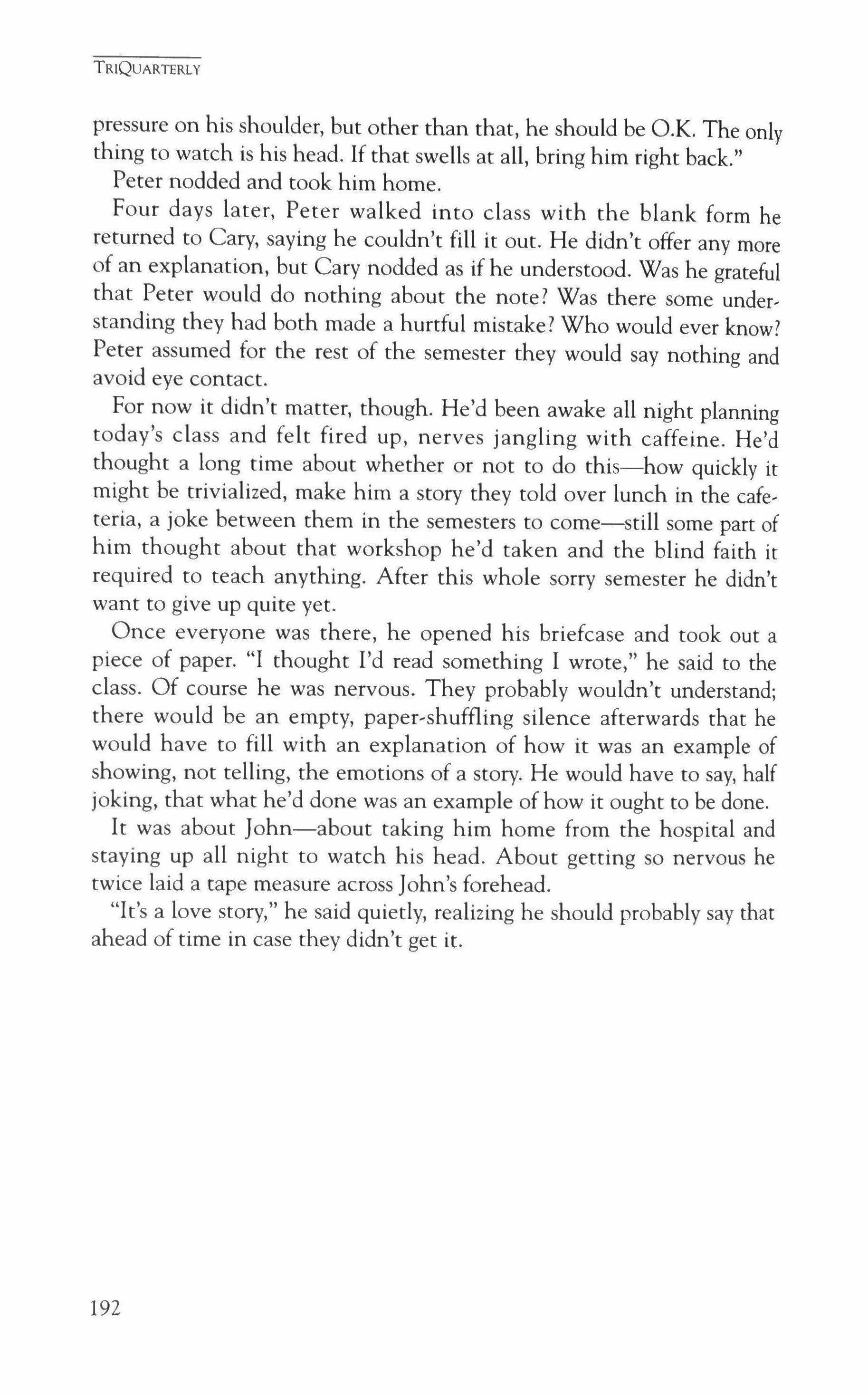
pressure on his shoulder, but other than that, he should be O.K. The only thing to watch is his head. If that swells at all, bring him right back."
Peter nodded and took him home.
Four days later, Peter walked into class with the blank form he returned to Cary, saying he couldn't fill it out. He didn't offer any more of an explanation, but Cary nodded as if he understood. Was he grateful that Peter would do nothing about the note? Was there some understanding they had both made a hurtful mistake? Who would ever know? Peter assumed for the rest of the semester they would say nothing and avoid eye contact.
For now it didn't matter, though. He'd been awake all night planning today's class and felt fired up, nerves jangling with caffeine. He'd thought a long time about whether or not to do this-how quickly it might be trivialized, make him a story they told over lunch in the cafeteria, a joke between them in the semesters to come-still some part of him thought about that workshop he'd taken and the blind faith it required to teach anything. After this whole sorry semester he didn't want to give up quite yet.
Once everyone was there, he opened his briefcase and took out a piece of paper. "I thought I'd read something I wrote," he said to the class. Of course he was nervous. They probably wouldn't understand; there would be an empty, paper-shuffling silence afterwards that he would have to fill with an explanation of how it was an example of showing, not telling, the emotions of a story. He would have to say, half joking, that what he'd done was an example of how it ought to be done.
It was about John-about taking him home from the hospital and staying up all night to watch his head. About getting so nervous he twice laid a tape measure across John's forehead.
"It's a love story," he said quietly, realizing he should probably say that ahead of time in case they didn't get it.
TRIQUARTERLY
192
The Rain in Kilrush
Michael Collins

It had been raining for over a week when Maguire kicked his wife in the back and threw her down the stairs. He stopped himself after that, shut the bedroom door behind him and slept.
It was dark by the time Maguire heard the knock on the door. He tasted the tears in his snot, brought up phlegm from his chest and held it in his mouth. He waited for a moment, laid out on his back in his gray suit. Wind whistled through the windows, drains spluttering outside. He stayed quiet, feeling the invisible damp web of humidity that followed the long downpours of the cold winter months. The fresh smell of rain had disappeared by the third day.
Again the knock on the door. "Dad, are you awake?"
It would have been better if he'd been left to sleep through into the morning. Maguire heard the feet on the stairs. He closed his eyes.
A timid head looked in through the dark. "Dad?"
Maguire turned his head and let the phlegm into the sheet and wiped his heavy lips. "Where is your mother?"
The boy came into the room and hesitated. "Downstairs."
Maguire heard the fear in the voice.
"She's sick," the boy said softly, the words subsumed by the dull static of rain on the corrugated roof of the animal shed.
Maguire broke the rhythm of the rain. "You're an awful cunt, you are."
The boy stopped. Darkness coagulated in the comers. Then he spoke again. "She's hurt." His voice cut through the pure cold in the room.
"Are you making tea?" Maguire said to gain control of the situation.
"She's sick," the boy repeated.
"Are you making tea?" Maguire raised his head as though going to get up.
TRIQUARTERLY
193
TRIQUARTERLY
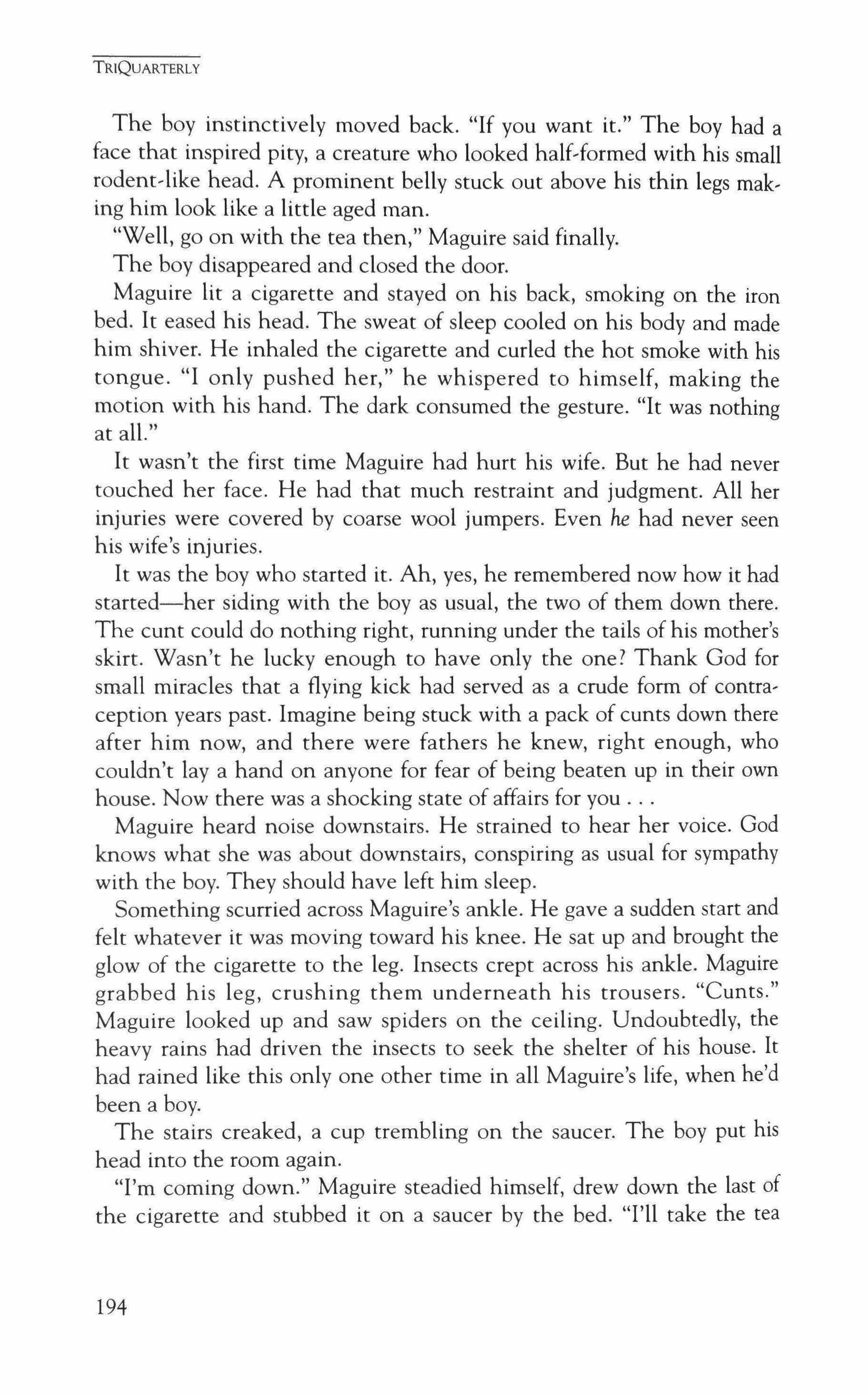
The boy instinctively moved back. "If you want it." The boy had a face that inspired pity, a creature who looked half-formed with his small rodent,like head. A prominent belly stuck out above his thin legs making him look like a little aged man.
"Well, go on with the tea then," Maguire said finally.
The boy disappeared and closed the door.
Maguire lit a cigarette and stayed on his back, smoking on the iron bed. It eased his head. The sweat of sleep cooled on his body and made him shiver. He inhaled the cigarette and curled the hot smoke with his tongue. "I only pushed her," he whispered to himself, making the motion with his hand. The dark consumed the gesture. "It was nothing at all."
It wasn't the first time Maguire had hurt his wife. But he had never touched her face. He had that much restraint and judgment. All her injuries were covered by coarse wool jumpers. Even he had never seen his wife's injuries.
It was the boy who started it. Ah, yes, he remembered now how it had started-her siding with the boy as usual, the two of them down there. The cunt could do nothing right, running under the tails of his mother's skirt. Wasn't he lucky enough to have only the one? Thank God for small miracles that a flying kick had served as a crude form of contra, ception years past. Imagine being stuck with a pack of cunts down there after him now, and there were fathers he knew, right enough, who couldn't lay a hand on anyone for fear of being beaten up in their own house. Now there was a shocking state of affairs for you Maguire heard noise downstairs. He strained to hear her voice. God knows what she was about downstairs, conspiring as usual for sympathy with the boy. They should have left him sleep.
Something scurried across Maguire's ankle. He gave a sudden start and felt whatever it was moving toward his knee. He sat up and brought the glow of the cigarette to the leg. Insects crept across his ankle. Maguire grabbed his leg, crushing them underneath his trousers. "Cunts." Maguire looked up and saw spiders on the ceiling. Undoubtedly, the heavy rains had driven the insects to seek the shelter of his house. It had rained like this only one other time in all Maguire's life, when he'd been a boy.
The stairs creaked, a cup trembling on the saucer. The boy put his head into the room again.
"I'm coming down." Maguire steadied himself, drew down the last of the cigarette and stubbed it on a saucer by the bed. "I'll take the tea
194
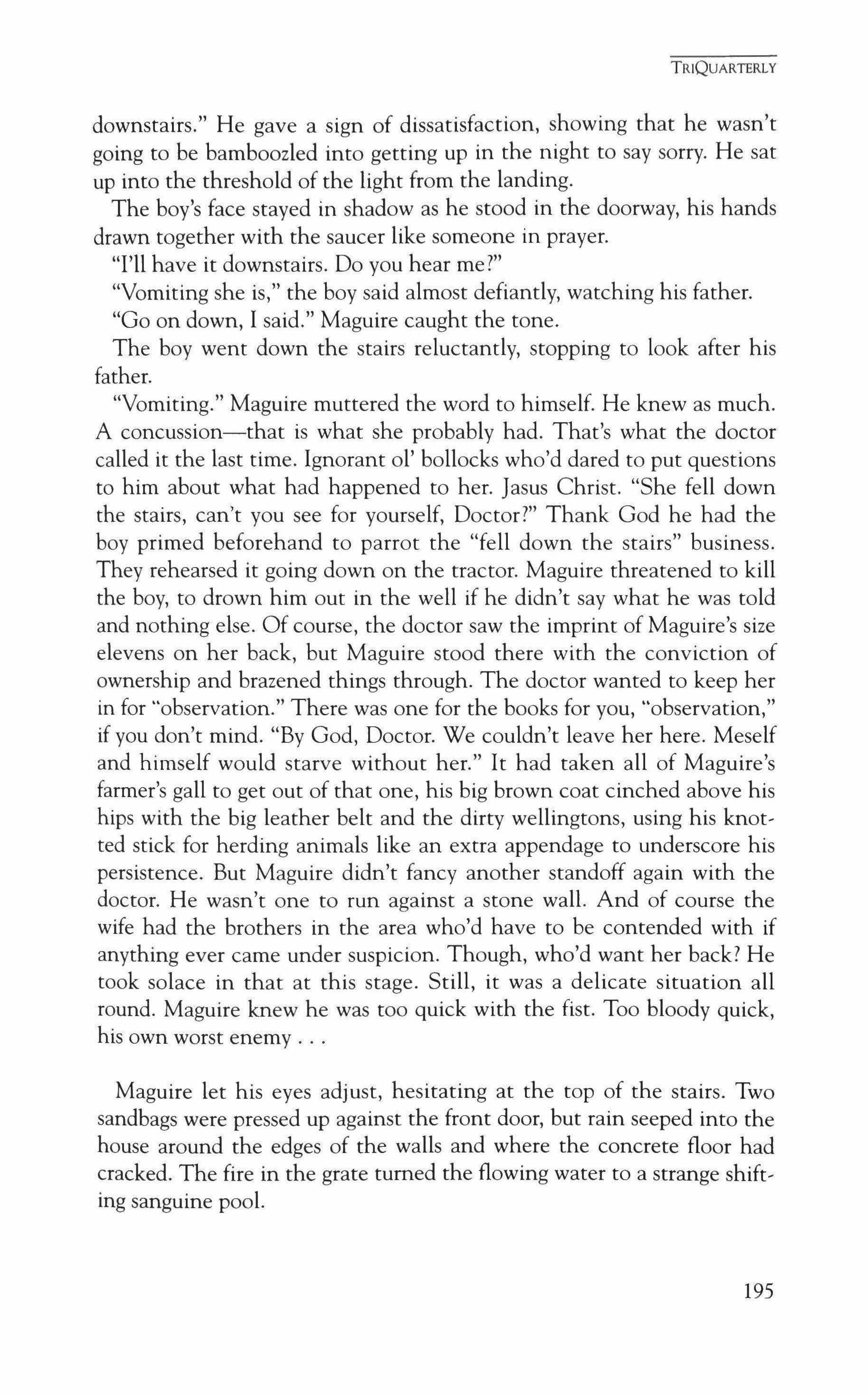
downstairs." He gave a sign of dissatisfaction, showing that he wasn't going to be bamboozled into getting up in the night to say sorry. He sat up into the threshold of the light from the landing.
The boy's face stayed in shadow as he stood in the doorway, his hands drawn together with the saucer like someone in prayer.
"I'll have it downstairs. Do you hear me?"
"Vomiting she is," the boy said almost defiantly, watching his father.
"Go on down, I said." Maguire caught the tone.
The boy went down the stairs reluctantly, stopping to look after his father.
"Vomiting." Maguire muttered the word to himself. He knew as much. A concussion-that is what she probably had. That's what the doctor called it the last time. Ignorant 01' bollocks who'd dared to put questions to him about what had happened to her. Jasus Christ. "She fell down the stairs, can't you see for yourself, Doctor?" Thank God he had the boy primed beforehand to parrot the "fell down the stairs" business. They rehearsed it going down on the tractor. Maguire threatened to kill the boy, to drown him out in the well if he didn't say what he was told and nothing else. Of course, the doctor saw the imprint of Maguire's size elevens on her back, but Maguire stood there with the conviction of ownership and brazened things through. The doctor wanted to keep her in for "observation." There was one for the books for you, "observation," if you don't mind. "By God, Doctor. We couldn't leave her here. Meself and himself would starve without her." It had taken all of Maguire's farmer's gall to get out of that one, his big brown coat cinched above his hips with the big leather belt and the dirty wellingtons, using his knotted stick for herding animals like an extra appendage to underscore his persistence. But Maguire didn't fancy another standoff again with the doctor. He wasn't one to run against a stone wall. And of course the wife had the brothers in the area who'd have to be contended with if anything ever came under suspicion. Though, who'd want her back? He took solace in that at this stage. Still, it was a delicate situation all round. Maguire knew he was too quick with the fist. Too bloody quick, his own worst enemy
Maguire let his eyes adjust, hesitating at the top of the stairs. Two sandbags were pressed up against the front door, but rain seeped into the house around the edges of the walls and where the concrete floor had cracked. The fire in the grate turned the flowing water to a strange shifting sanguine pool.
TRIQUARTERLY
195
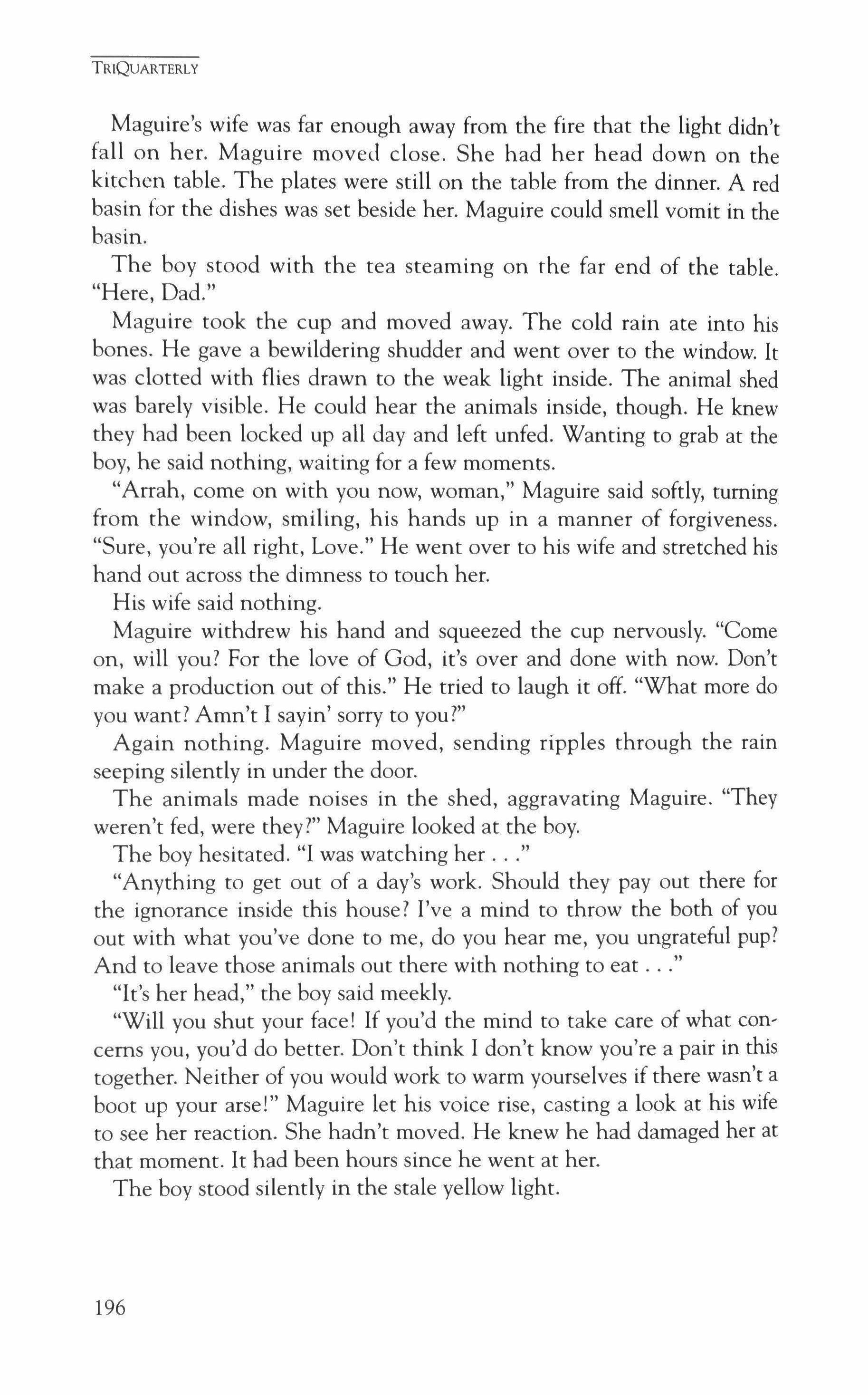
Maguire's wife was far enough away from the fire that the light didn't fall on her. Maguire moved close. She had her head down on the kitchen table. The plates were still on the table from the dinner. A red basin for the dishes was set beside her. Maguire could smell vomit in the basin.
The boy stood with the tea steaming on the far end of the table. "Here, Dad."
Maguire took the cup and moved away. The cold rain ate into his bones. He gave a bewildering shudder and went over to the window. It was clotted with flies drawn to the weak light inside. The animal shed was barely visible. He could hear the animals inside, though. He knew they had been locked up all day and left unfed. Wanting to grab at the boy, he said nothing, waiting for a few moments.
"Arrah, come on with you now, woman," Maguire said softly, turning from the window, smiling, his hands up in a manner of forgiveness. "Sure, you're all right, Love." He went over to his wife and stretched his hand out across the dimness to touch her.
His wife said nothing.
Maguire withdrew his hand and squeezed the cup nervously. "Come on, will you? For the love of God, it's over and done with now. Don't make a production out of this." He tried to laugh it off. "What more do you want? Amn't I sayin' sorry to you?"
Again nothing. Maguire moved, sending ripples through the rain seeping silently in under the door.
The animals made noises in the shed, aggravating Maguire. "They weren't fed, were they?" Maguire looked at the boy.
The boy hesitated. "I was watching her
"Anything to get out of a day's work. Should they payout there for the ignorance inside this house? I've a mind to throw the both of you out with what you've done to me, do you hear me, you ungrateful pup? And to leave those animals out there with nothing to eat
"It's her head," the boy said meekly.
"Will you shut your face! If you'd the mind to take care of what concerns you, you'd do better. Don't think I don't know you're a pair in this together. Neither of you would work to warm yourselves if there wasn't a boot up your arse!" Maguire let his voice rise, casting a look at his wife to see her reaction. She hadn't moved. He knew he had damaged her at that moment. It had been hours since he went at her.
The boy stood silently in the stale yellow light.
TRIQUARTERLY
196
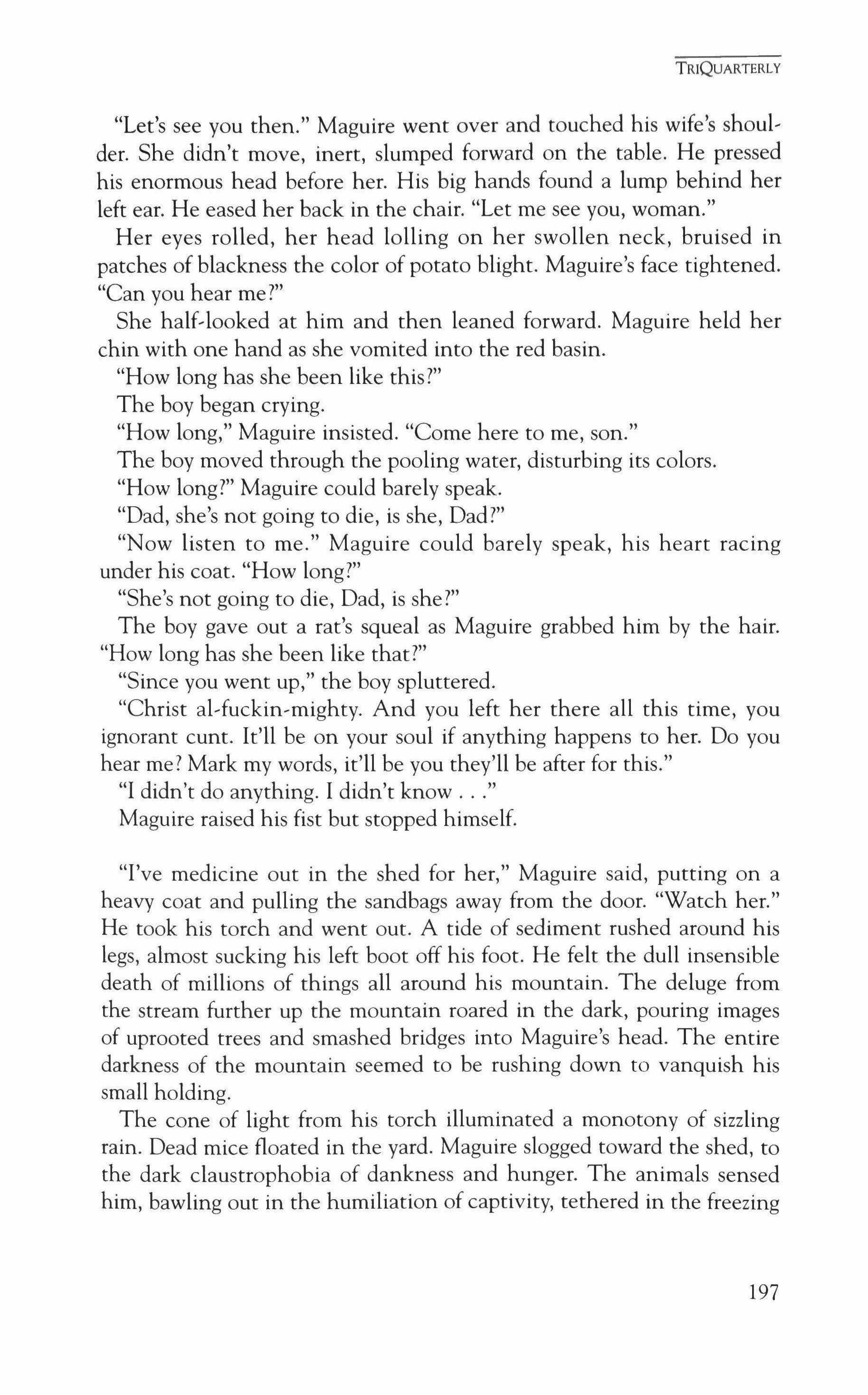
"Let's see you then." Maguire went over and touched his wife's shoulder. She didn't move, inert, slumped forward on the table. He pressed his enormous head before her. His big hands found a lump behind her left ear. He eased her back in the chair. "Let me see you, woman."
Her eyes rolled, her head lolling on her swollen neck, bruised in patches of blackness the color of potato blight. Maguire's face tightened. "Can you hear me?"
She half-looked at him and then leaned forward. Maguire held her chin with one hand as she vomited into the red basin.
"How long has she been like this?"
The boy began crying.
"How long," Maguire insisted. "Come here to me, son."
The boy moved through the pooling water, disturbing its colors.
"How long?" Maguire could barely speak.
"Dad, she's not going to die, is she, Dad?"
"Now listen to me." Maguire could barely speak, his heart racing under his coat. "How long?"
"She's not going to die, Dad, is she?"
The boy gave out a rat's squeal as Maguire grabbed him by the hair. "How long has she been like that?"
"Since you went up," the boy spluttered.
"Christ al-fuckin-mighty. And you left her there all this time, you ignorant cunt. It'll be on your soul if anything happens to her. Do you hear me? Mark my words, it'll be you they'll be after for this."
"I didn't do anything. I didn't know " Maguire raised his fist but stopped himself.
"I've medicine out in the shed for her," Maguire said, putting on a heavy coat and pulling the sandbags away from the door. "Watch her." He took his torch and went out. A tide of sediment rushed around his legs, almost sucking his left boot off his foot. He felt the dull insensible death of millions of things all around his mountain. The deluge from the stream further up the mountain roared in the dark, pouring images of uprooted trees and smashed bridges into Maguire's head. The entire darkness of the mountain seemed to be rushing down to vanquish his small holding.
The cone of light from his torch illuminated a monotony of sizzling rain. Dead mice floated in the yard. Maguire slogged toward the shed, to the dark claustrophobia of dankness and hunger. The animals sensed him, bawling out in the humiliation of captivity, tethered in the freezing
TRIQUARTERLY
197
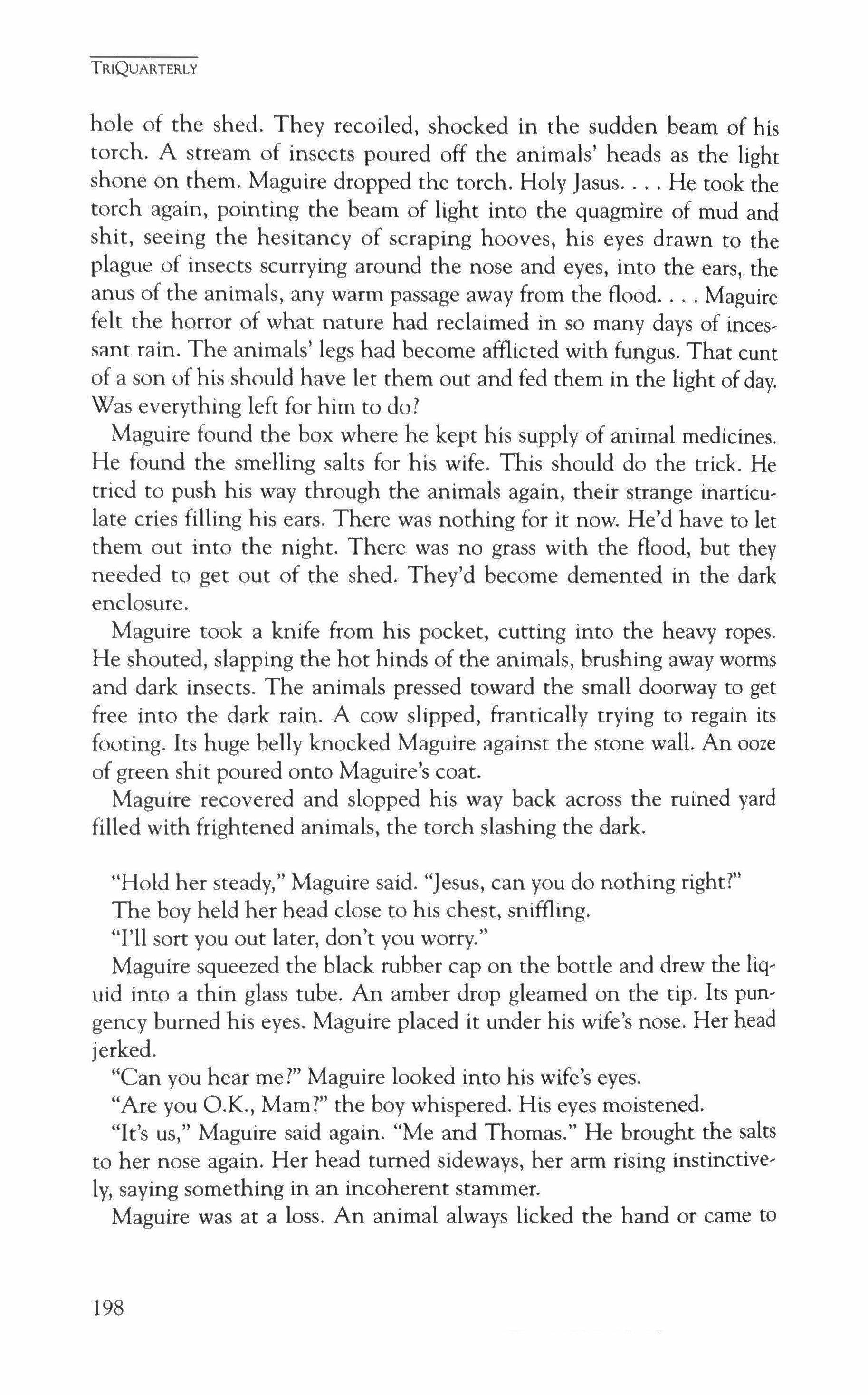
hole of the shed. They recoiled, shocked in the sudden beam of his torch. A stream of insects poured off the animals' heads as the light shone on them. Maguire dropped the torch. Holy Jasus He took the torch again, pointing the beam of light into the quagmire of mud and shit, seeing the hesitancy of scraping hooves, his eyes drawn to the plague of insects scurrying around the nose and eyes, into the ears, the anus of the animals, any warm passage away from the flood Maguire felt the horror of what nature had reclaimed in so many days of incessant rain. The animals' legs had become afflicted with fungus. That cunt of a son of his should have let them out and fed them in the light of day. Was everything left for him to do?
Maguire found the box where he kept his supply of animal medicines. He found the smelling salts for his wife. This should do the trick. He tried to push his way through the animals again, their strange inarticulate cries filling his ears. There was nothing for it now. He'd have to let them out into the night. There was no grass with the flood, but they needed to get out of the shed. They'd become demented in the dark enclosure.
Maguire took a knife from his pocket, cutting into the heavy ropes. He shouted, slapping the hot hinds of the animals, brushing away worms and dark insects. The animals pressed toward the small doorway to get free into the dark rain. A cow slipped, frantically trying to regain its footing. Its huge belly knocked Maguire against the stone wall. An ooze of green shit poured onto Maguire's coat.
Maguire recovered and slopped his way back across the ruined yard filled with frightened animals, the torch slashing the dark.
"Hold her steady," Maguire said. "Jesus, can you do nothing right?"
The boy held her head close to his chest, sniffling.
"I'll sort you out later, don't you worry."
Maguire squeezed the black rubber cap on the bottle and drew the liquid into a thin glass tube. An amber drop gleamed on the tip. Its pungency burned his eyes. Maguire placed it under his wife's nose. Her head jerked.
"Can you hear me?" Maguire looked into his wife's eyes.
"Are you O.K., Mam?" the boy whispered. His eyes moistened.
"It's us," Maguire said again. "Me and Thomas." He brought the salts to her nose again. Her head turned sideways, her arm rising instinctively, saying something in an incoherent stammer.
Maguire was at a loss. An animal always licked the hand or came to
TRIQUARTERLY
198
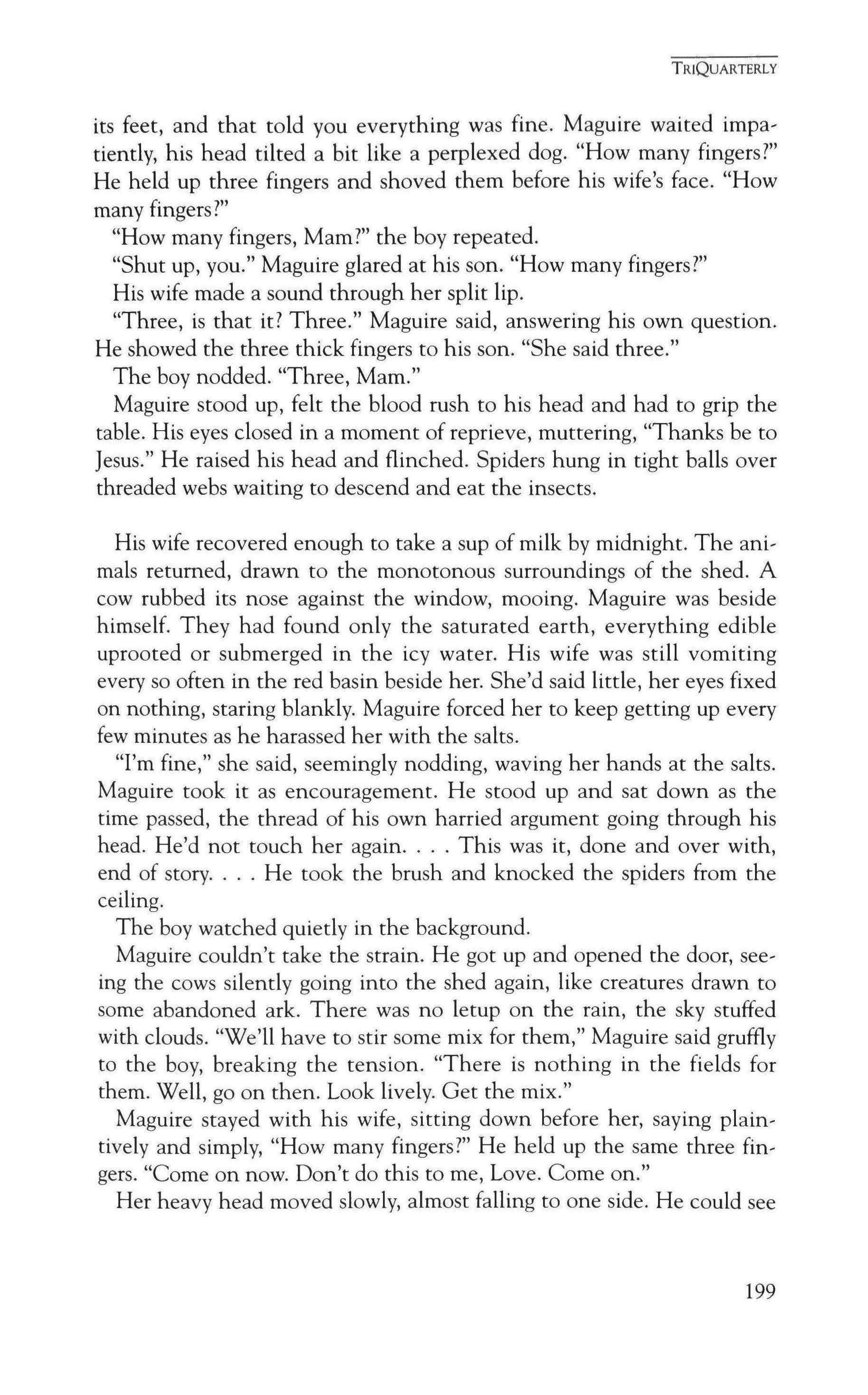
its feet, and that told you everything was fine. Maguire waited impatiently, his head tilted a bit like a perplexed dog. "How many fingers?" He held up three fingers and shoved them before his wife's face. "How many fingers?"
"How many fingers, Mam?" the boy repeated.
"Shut up, you." Maguire glared at his son. "How many fingers?"
His wife made a sound through her split lip.
"Three, is that it? Three." Maguire said, answering his own question. He showed the three thick fingers to his son. "She said three."
The boy nodded. "Three, Mam."
Maguire stood up, felt the blood rush to his head and had to grip the table. His eyes closed in a moment of reprieve, muttering, "Thanks be to Jesus." He raised his head and flinched. Spiders hung in tight balls over threaded webs waiting to descend and eat the insects.
His wife recovered enough to take a sup of milk by midnight. The animals returned, drawn to the monotonous surroundings of the shed. A cow rubbed its nose against the window, mooing. Maguire was beside himself. They had found only the saturated earth, everything edible uprooted or submerged in the icy water. His wife was still vomiting every so often in the red basin beside her. She'd said little, her eyes fixed on nothing, staring blankly. Maguire forced her to keep getting up every few minutes as he harassed her with the salts.
"I'm fine," she said, seemingly nodding, waving her hands at the salts. Maguire took it as encouragement. He stood up and sat down as the time passed, the thread of his own harried argument going through his head. He'd not touch her again This was it, done and over with, end of story. He took the brush and knocked the spiders from the ceiling.
The boy watched quietly in the background.
Maguire couldn't take the strain. He got up and opened the door, see� ing the cows silently going into the shed again, like creatures drawn to some abandoned ark. There was no letup on the rain, the sky stuffed with clouds. "We'll have to stir some mix for them," Maguire said gruffly to the boy, breaking the tension. "There is nothing in the fields for them. Well, go on then. Look lively. Get the mix."
Maguire stayed with his wife, sitting down before her, saying plaintively and simply, "How many fingers?" He held up the same three fingers. "Come on now. Don't do this to me, Love. Come on."
Her heavy head moved slowly, almost falling to one side. He could see
TRIQUARTERLY
199
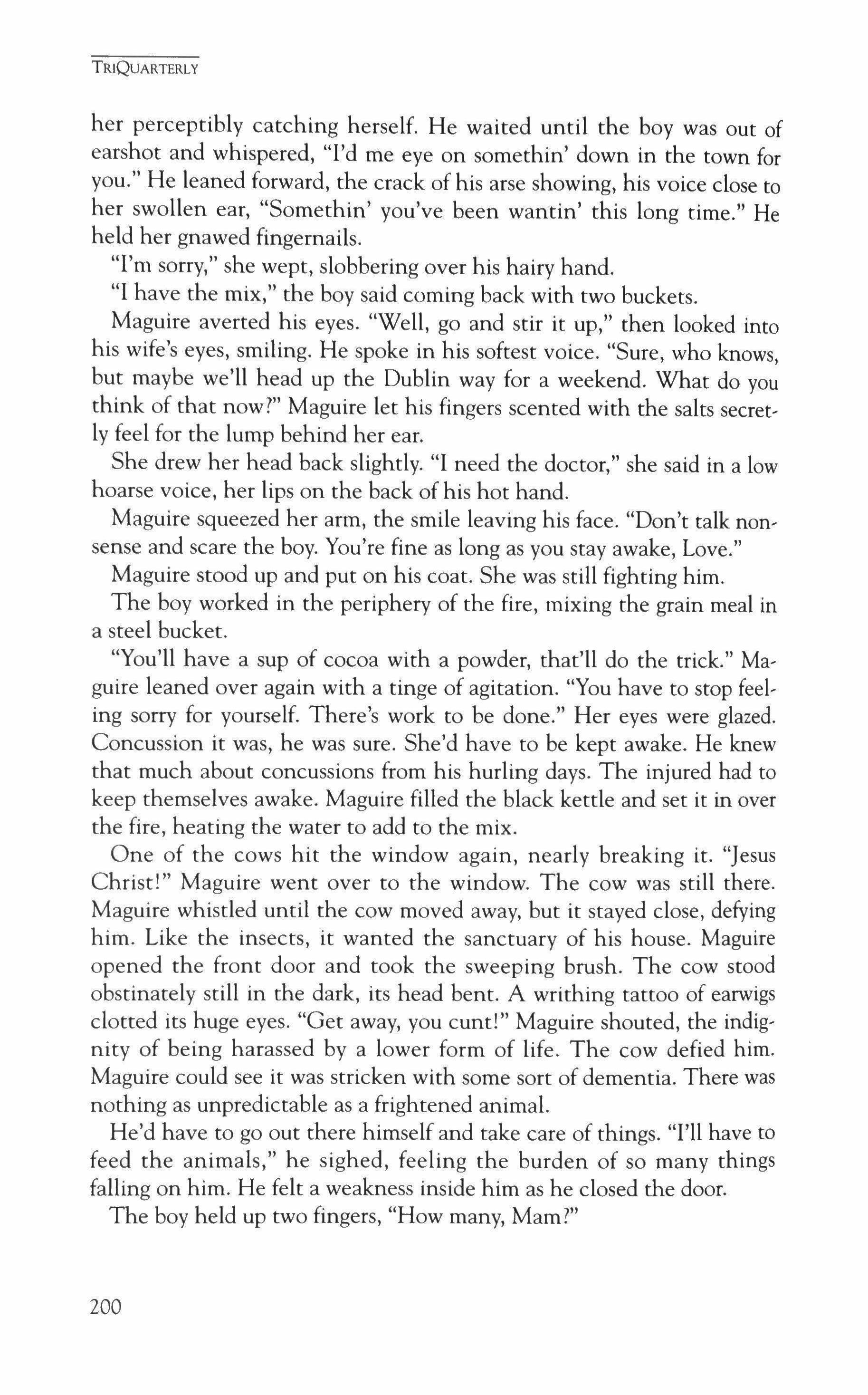
her perceptibly catching herself. He waited until the boy was out of earshot and whispered, "I'd me eye on somethin' down in the town for you." He leaned forward, the crack of his arse showing, his voice close to her swollen ear, "Somethin' you've been wantin' this long time." He held her gnawed fingernails.
"I'm sorry," she wept, slobbering over his hairy hand.
"I have the mix," the boy said coming back with two buckets.
Maguire averted his eyes. "Well, go and stir it up," then looked into his wife's eyes, smiling. He spoke in his softest voice. "Sure, who knows, but maybe we'll head up the Dublin way for a weekend. What do you think of that now?" Maguire let his fingers scented with the salts secretly feel for the lump behind her ear.
She drew her head back slightly. "I need the doctor," she said in a low hoarse voice, her lips on the back of his hot hand.
Maguire squeezed her arm, the smile leaving his face. "Don't talk nonsense and scare the boy. You're fine as long as you stay awake, Love."
Maguire stood up and put on his coat. She was still fighting him.
The boy worked in the periphery of the fire, mixing the grain meal in a steel bucket.
"You'll have a sup of cocoa with a powder, that'll do the trick." Maguire leaned over again with a tinge of agitation. "You have to stop feeling sorry for yourself. There's work to be done." Her eyes were glazed. Concussion it was, he was sure. She'd have to be kept awake. He knew that much about concussions from his hurling days. The injured had to keep themselves awake. Maguire filled the black kettle and set it in over the fire, heating the water to add to the mix.
One of the cows hit the window again, nearly breaking it. "Jesus Christ!" Maguire went over to the window. The cow was still there. Maguire whistled until the cow moved away, but it stayed close, defying him. Like the insects, it wanted the sanctuary of his house. Maguire opened the front door and took the sweeping brush. The cow stood obstinately still in the dark, its head bent. A writhing tattoo of earwigs clotted its huge eyes. "Get away, you cunt!" Maguire shouted, the indignity of being harassed by a lower form of life. The cow defied him. Maguire could see it was stricken with some sort of dementia. There was nothing as unpredictable as a frightened animal.
He'd have to go out there himself and take care of things. "I'll have to feed the animals," he sighed, feeling the burden of so many things falling on him. He felt a weakness inside him as he closed the door.
The boy held up two fingers, "How many, Mam?"
ThIQUARTERLY
200
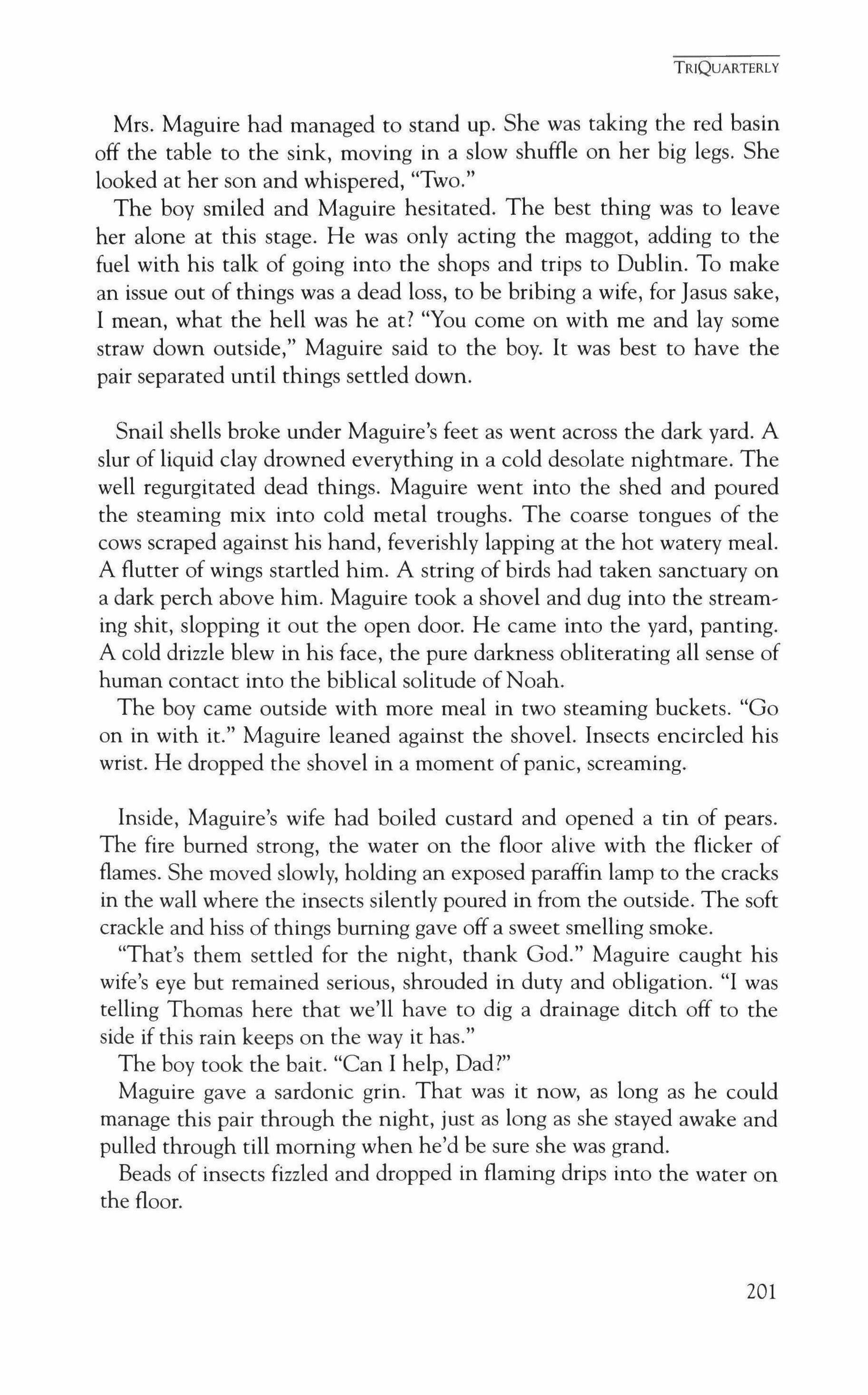
Mrs. Maguire had managed to stand up. She was taking the red basin off the table to the sink, moving in a slow shuffle on her big legs. She looked at her son and whispered, "Two."
The boy smiled and Maguire hesitated. The best thing was to leave her alone at this stage. He was only acting the maggot, adding to the fuel with his talk of going into the shops and trips to Dublin. To make an issue out of things was a dead loss, to be bribing a wife, for Jasus sake, I mean, what the hell was he at? "You come on with me and lay some straw down outside," Maguire said to the boy. It was best to have the pair separated until things settled down.
Snail shells broke under Maguire's feet as went across the dark yard. A slur of liquid clay drowned everything in a cold desolate nightmare. The well regurgitated dead things. Maguire went into the shed and poured the steaming mix into cold metal troughs. The coarse tongues of the cows scraped against his hand, feverishly lapping at the hot watery meal. A flutter of wings startled him. A string of birds had taken sanctuary on a dark perch above him. Maguire took a shovel and dug into the streaming shit, slopping it out the open door. He came into the yard, panting. A cold drizzle blew in his face, the pure darkness obliterating all sense of human contact into the biblical solitude of Noah.
The boy came outside with more meal in two steaming buckets. "Go on in with it." Maguire leaned against the shovel. Insects encircled his wrist. He dropped the shovel in a moment of panic, screaming.
Inside, Maguire's wife had boiled custard and opened a tin of pears. The fire burned strong, the water on the floor alive with the flicker of flames. She moved slowly, holding an exposed paraffin lamp to the cracks in the wall where the insects silently poured in from the outside. The soft crackle and hiss of things burning gave off a sweet smelling smoke.
"That's them settled for the night, thank God." Maguire caught his wife's eye but remained serious, shrouded in duty and obligation. "I was telling Thomas here that we'll have to dig a drainage ditch off to the side if this rain keeps on the way it has."
The boy took the bait. "Can I help, Dad?"
Maguire gave a sardonic grin. That was it now, as long as he could manage this pair through the night, just as long as she stayed awake and pulled through till morning when he'd be sure she was grand.
Beads of insects fizzled and dropped in flaming drips into the water on the floor.
TRIQUARTERLY
201
TRIQUARTERLY

Maguire's wife spoke for the first time. "We should sweep the floor." "We should." Maguire eased his mood. Thank God, she was out of the worst. He opened the door and brushed the tide of creatures outside, feeling a sudden lightness in his head from hunger and other things. He stopped in the open doorway, his broad back outlined against the dark of the exile rain.
Maguire and his son ate hot custard and pears, their shadows half-submerged in the still water on the floor. The moon appeared and smoked in the sky outside.
"It is letting up," Maguire said, pointing to the window.
His wife's face turned sheet-white again as she sat still, the web of broken veins on her cheek, a dark bruise showing under the left eye.
A sudden shock passed through Maguire. "We'll dig a drainage ditch off to the side if this rain keeps on the way it has," he continued again as he slurped the thick pear juice off his spoon. He got up after that and burned more insects off the walls. He was fagged with exhaustion but afraid to go up to the freezing bedroom creeping with earwigs and spiders. And he had to keep vigil over his wife, make sure she didn't suecumb to sleep.
Maguire tuned the radio on to the BBC to kill the silence. Through the crackling wheeze of the reception, a man read Shakespeare at three o'clock in the morning. Maguire knew the poem from his years at school. "I know that one," Maguire yawned and sat down again, patiently waiting for the first light of dawn hours away. He fought sleep as he sat still, but his head drifted with the dull sensation of being dragged under in a dream. In the end he fell asleep with his head on the table.
His wife turned bad soon after that---convulsions that nothing could stop, the dry heaves from an empty stomach. Maguire struggled and tried to hold her, her limbs jerking as though jolted by electricity. Her chair toppled over, the cup of cold cocoa smashing. The boy screamed, "Mam!" She stopped after a few moments and went limp. Maguire set her against the table. A trickle of blood came out of the left ear.
Maguire struggled with the tractor out in the big shed, revving the engine, a thick plume of diesel filling the shed. The animals kicked and moved away as the tractor lurched into the yard. He stormed into the house again and up the stairs to change into his Sunday suit and tie, dragging his heavy coat off him.
"Dad?"
202

"Will you wait?" Maguire roared. He'd leave the house respectable and show that he was serious. He could play the supplicant or whatever was needed. He washed in the small toilet, dragged a comb through his hair. In the bedroom he fumbled with the knot in his Sunday tie. "I swear to you Jesus, on my word, this was the last time!" He spoke to his reflection with morbid intensity.
Things ran through his head. In a moment of stark practicality Maguire took a box from above the dresser. "Yes He went to the black table board and began in a simple, earnest manner, holding his breath when he wrote. He took an envelope and licked it.
The boy screamed downstairs. "Come on, Dad, please!"
Maguire searched in his wife's drawer for a round pale-blue tin of face powder a sister in England had given her the previous summer. He came down in his Sunday best and set the cups in the sink and rinsed the basin, abiding by an insane logic of cleanliness as though it could grant a level of impunity. But what else could he do to defend himself?
"She's going to die!" the boy screamed.
"Will you shut up?" Maguire opened the tin of powder and dabbed the left side of the face, considering it for a moment before doing the other side.
Maguire and the boy took her out to the tractor, the boy holding her legs as Maguire lifted her up into the small cab. The tractor lurched away, leaving the house to the spiders.
"You saw she was better, didn't you? Weren't we just eating there, the three of us?"
The boy held his mother, sobbing. His eyes gleamed in the errant light reflecting in the floodwaters outside. It had stopped raining for the first time in days.
Maguire rocked on the springs in the worn leather seat of the tractor, rubbing mist off the window. The tractor's lights washed over an apparition of gleaming water. "Is she breathin'?"
"Yes." The boy was sobbing again.
"Give it over, do you hear me?" Maguire's arms spread out over the big steering wheel, hugging it. He was silent for a moment, then the scherning came back into his head. "Weren't we eating, the three of us?"
Maguire blurted. "Weren't the three of us just eating?" His big head turned in the cab. "No, that'll not do at all. You were in bed. You saw nothing. Are you listening to me, Son? Nothing!"
The boy's head bobbed in the semi-dark of the cab, his small body up
TRIQUARTERLY
203
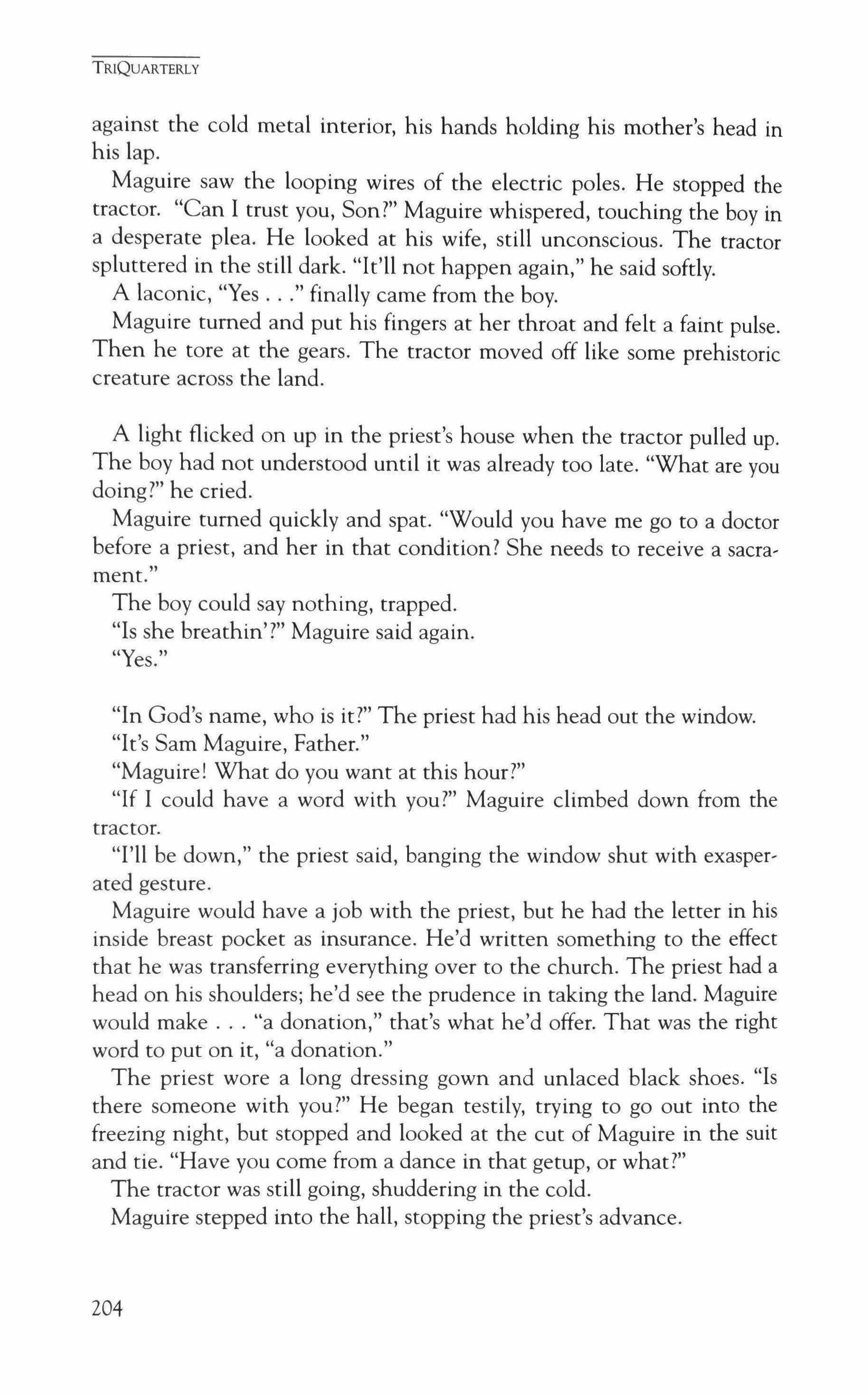
against the cold metal interior, his hands holding his mother's head in his lap.
Maguire saw the looping wires of the electric poles. He stopped the tractor. "Can I trust you, Son?" Maguire whispered, touching the boy in a desperate plea. He looked at his wife, still unconscious. The tractor spluttered in the still dark. "It'll not happen again," he said softly. A laconic, "Yes " finally came from the boy.
Maguire turned and put his fingers at her throat and felt a faint pulse. Then he tore at the gears. The tractor moved off like some prehistoric creature across the land.
A light flicked on up in the priest's house when the tractor pulled up. The boy had not understood until it was already too late. "What are you doing?" he cried.
Maguire turned quickly and spat. "Would you have me go to a doctor before a priest, and her in that condition? She needs to receive a sacrament."
The boy could say nothing, trapped. "Is she breathin'?" Maguire said again. "Yes."
"In God's name, who is it?" The priest had his head out the window. "It's Sam Maguire, Father."
"Maguire! What do you want at this hour?"
"If I could have a word with you?" Maguire climbed down from the tractor.
"I'll be down," the priest said, banging the window shut with exasperated gesture.
Maguire would have a job with the priest, but he had the letter in his inside breast pocket as insurance. He'd written something to the effect that he was transferring everything over to the church. The priest had a head on his shoulders; he'd see the prudence in taking the land. Maguire would make "a donation," that's what he'd offer. That was the right word to put on it, "a donation."
The priest wore a long dressing gown and unlaced black shoes. "Is there someone with you?" He began testily, trying to go out into the freezing night, but stopped and looked at the cut of Maguire in the suit and tie. "Have you come from a dance in that getup, or what?"
The tractor was still going, shuddering in the cold.
Maguire stepped into the hall, stopping the priest's advance.
TRIQUARTERLY
204
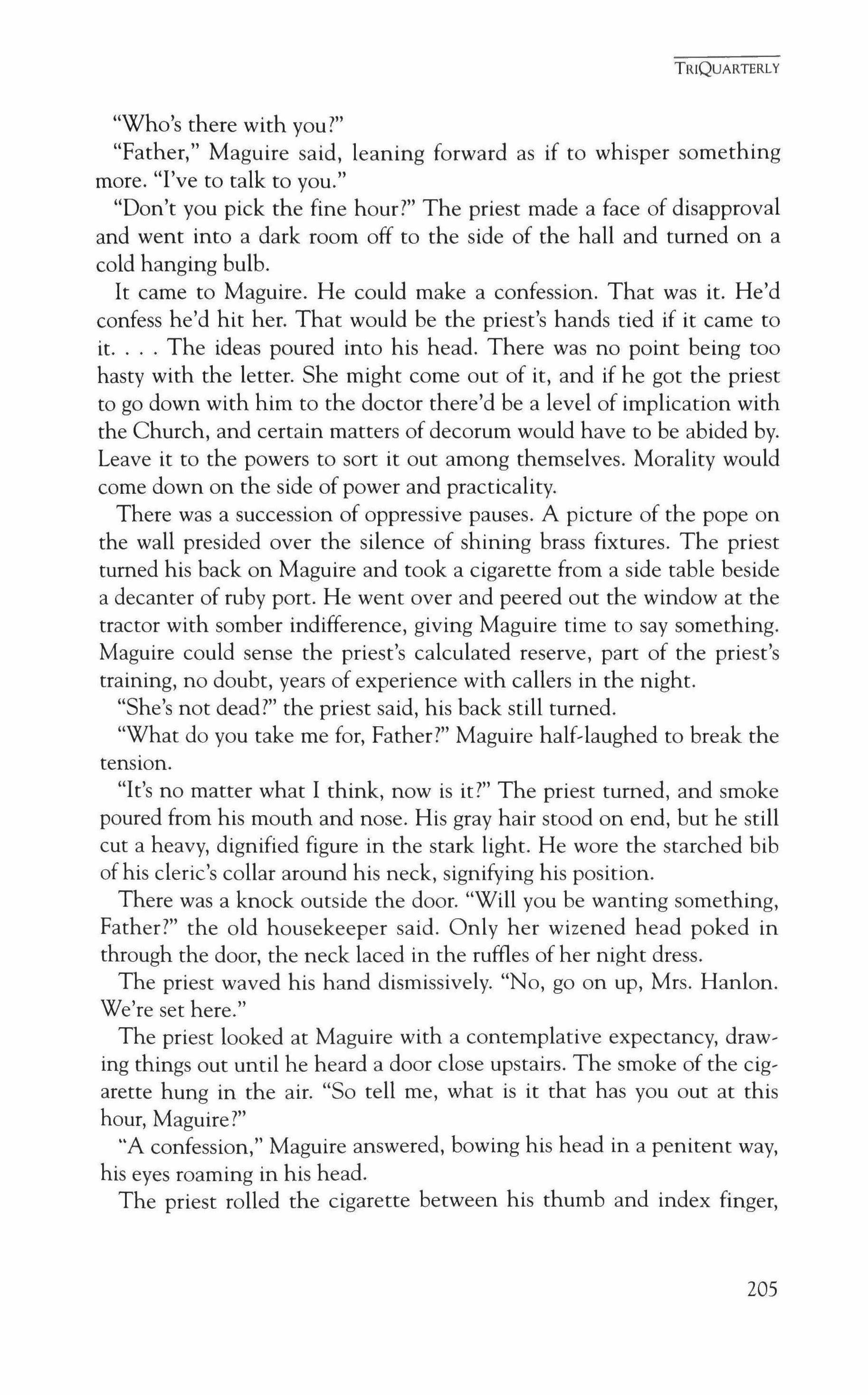
"Who's there with yOU?"
"Father," Maguire said, leaning forward as if to whisper something more. "I've to talk to you."
"Don't you pick the fine hour?" The priest made a face of disapproval and went into a dark room off to the side of the hall and turned on a cold hanging bulb.
It came to Maguire. He could make a confession. That was it. He'd confess he'd hit her. That would be the priest's hands tied if it came to it The ideas poured into his head. There was no point being too hasty with the letter. She might come out of it, and if he got the priest to go down with him to the doctor there'd be a level of implication with the Church, and certain matters of decorum would have to be abided by. Leave it to the powers to sort it out among themselves. Morality would come down on the side of power and practicality.
There was a succession of oppressive pauses. A picture of the pope on the wall presided over the silence of shining brass fixtures. The priest turned his back on Maguire and took a cigarette from a side table beside a decanter of ruby port. He went over and peered out the window at the tractor with somber indifference, giving Maguire time to say something. Maguire could sense the priest's calculated reserve, part of the priest's training, no doubt, years of experience with callers in the night.
"She's not dead?" the priest said, his back still turned.
"What do you take me for, Father?" Maguire half-laughed to break the tension.
"It's no matter what I think, now is it?" The priest turned, and smoke poured from his mouth and nose. His gray hair stood on end, but he still cut a heavy, dignified figure in the stark light. He wore the starched bib of his cleric's collar around his neck, signifying his position.
There was a knock outside the door. "Will you be wanting something, Father?" the old housekeeper said. Only her wizened head poked in through the door, the neck laced in the ruffles of her night dress.
The priest waved his hand dismissively. "No, go on up, Mrs. Hanlon. We're set here."
The priest looked at Maguire with a contemplative expectancy, drawing things out until he heard a door close upstairs. The smoke of the cigarette hung in the air. "So tell me, what is it that has you out at this hour, Maguire?"
"A confession," Maguire answered, bowing his head in a penitent way, his eyes roaming in his head.
The priest rolled the cigarette between his thumb and index finger, 205
TRIQUARTERLY
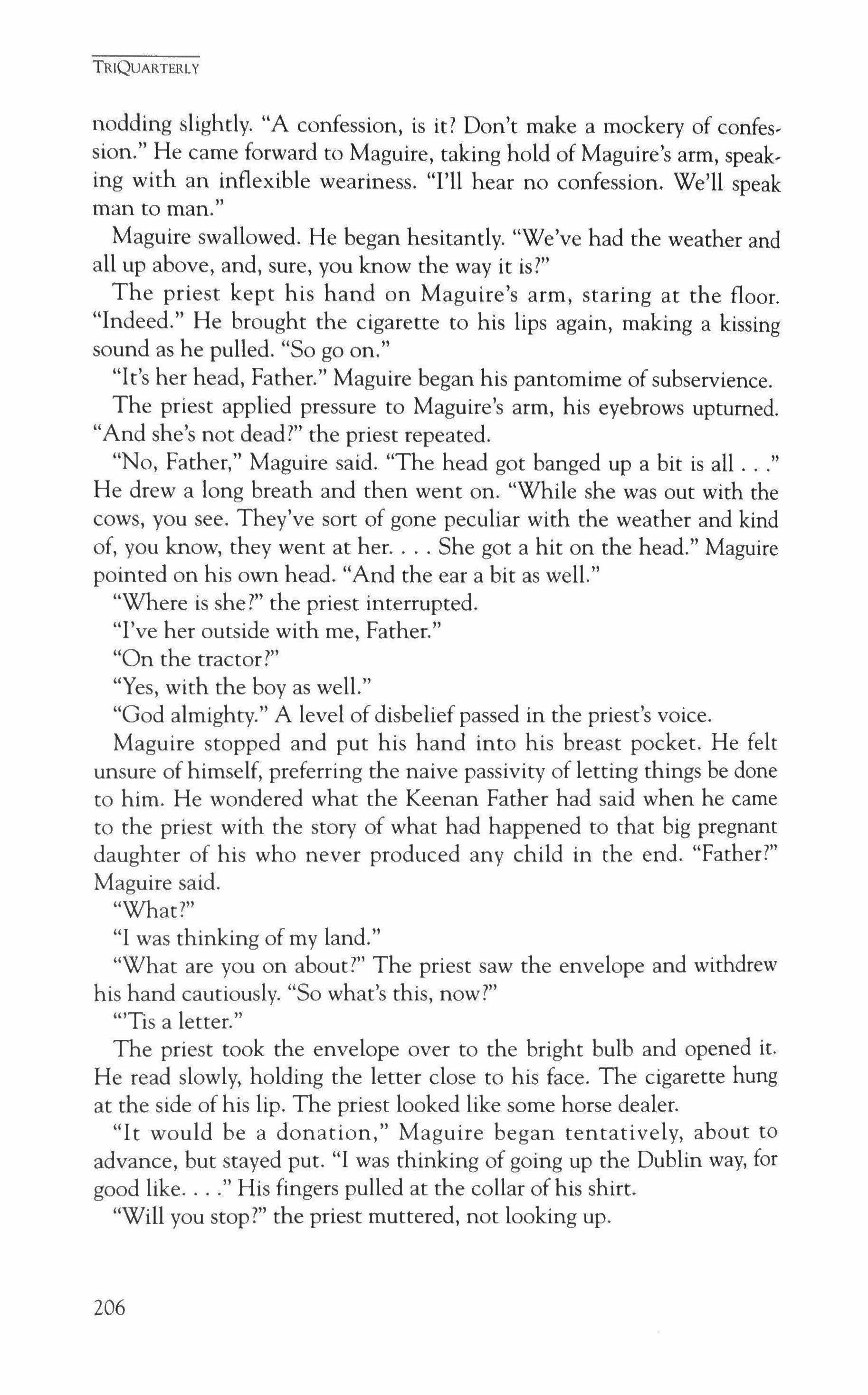
nodding slightly. "A confession, is it? Don't make a mockery of confession." He came forward to Maguire, taking hold of Maguire's arm, speaking with an inflexible weariness. "I'll hear no confession. We'll speak man to man."
Maguire swallowed. He began hesitantly. "We've had the weather and all up above, and, sure, you know the way it is?"
The priest kept his hand on Maguire's arm, staring at the floor. "Indeed." He brought the cigarette to his lips again, making a kissing sound as he pulled. "So go on."
"It's her head, Father." Maguire began his pantomime of subservience.
The priest applied pressure to Maguire's arm, his eyebrows upturned. "And she's not dead?" the priest repeated.
"No, Father," Maguire said. "The head got banged up a bit is all He drew a long breath and then went on. "While she was out with the cows, you see. They've sort of gone peculiar with the weather and kind of, you know, they went at her She got a hit on the head." Maguire pointed on his own head. "And the ear a bit as well."
"Where is she?" the priest interrupted.
"I've her outside with me, Father."
"On the tractor?"
"Yes, with the boy as well."
"God almighty." A level of disbelief passed in the priest's voice. Maguire stopped and put his hand into his breast pocket. He felt unsure of himself, preferring the naive passivity of letting things be done to him. He wondered what the Keenan Father had said when he came to the priest with the story of what had happened to that big pregnant daughter of his who never produced any child in the end. "Father?" Maguire said.
"What?"
"I was thinking of my land."
"What are you on about?" The priest saw the envelope and withdrew his hand cautiously. "So what's this, now?"
"Tis a letter."
The priest took the envelope over to the bright bulb and opened it. He read slowly, holding the letter close to his face. The cigarette hung at the side of his lip. The priest looked like some horse dealer.
"It would be a donation," Maguire began tentatively, about to advance, but stayed put. "I was thinking of going up the Dublin way, for good like His fingers pulled at the collar of his shirt.
"Will you stop?" the priest muttered, not looking up.
TRIQUARTERLY
206
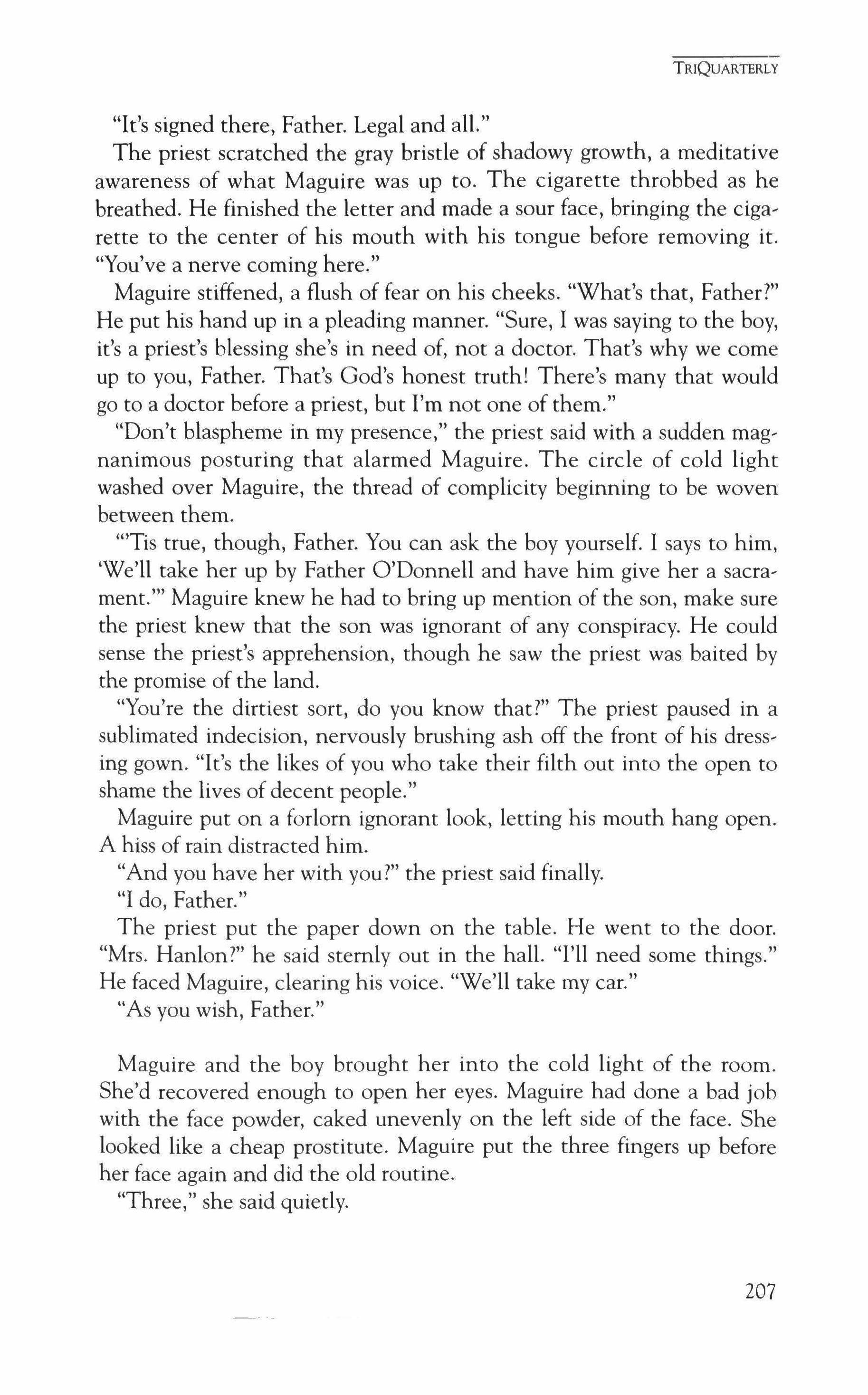
"It's signed there, Father. Legal and all."
The priest scratched the gray bristle of shadowy growth, a meditative awareness of what Maguire was up to. The cigarette throbbed as he breathed. He finished the letter and made a sour face, bringing the cigarette to the center of his mouth with his tongue before removing it. "You've a nerve coming here."
Maguire stiffened, a flush of fear on his cheeks. "What's that, Father?" He put his hand up in a pleading manner. "Sure, I was saying to the boy, it's a priest's blessing she's in need of, not a doctor. That's why we come up to you, Father. That's God's honest truth! There's many that would go to a doctor before a priest, but I'm not one of them."
"Don't blaspheme in my presence," the priest said with a sudden magnanimous posturing that alarmed Maguire. The circle of cold light washed over Maguire, the thread of complicity beginning to be woven between them.
"Tis true, though, Father. You can ask the boy yourself. I says to him, 'We'll take her up by Father O'Donnell and have him give her a sacrament.'" Maguire knew he had to bring up mention of the son, make sure the priest knew that the son was ignorant of any conspiracy. He could sense the priest's apprehension, though he saw the priest was baited by the promise of the land.
"You're the dirtiest sort, do you know that?" The priest paused in a sublimated indecision, nervously brushing ash off the front of his dressing gown. "It's the likes of you who take their filth out into the open to shame the lives of decent people."
Maguire put on a forlorn ignorant look, letting his mouth hang open. A hiss of rain distracted him.
"And you have her with you?" the priest said finally. "I do, Father."
The priest put the paper down on the table. He went to the door. "Mrs. Hanlon?" he said sternly out in the hall. "I'll need some things." He faced Maguire, clearing his voice. "We'll take my car."
"As you wish, Father."
Maguire and the boy brought her into the cold light of the room. She'd recovered enough to open her eyes. Maguire had done a bad job with the face powder, caked unevenly on the left side of the face. She looked like a cheap prostitute. Maguire put the three fingers up before her face again and did the old routine.
"Three," she said quietly.
TRIQUARTERLY
207
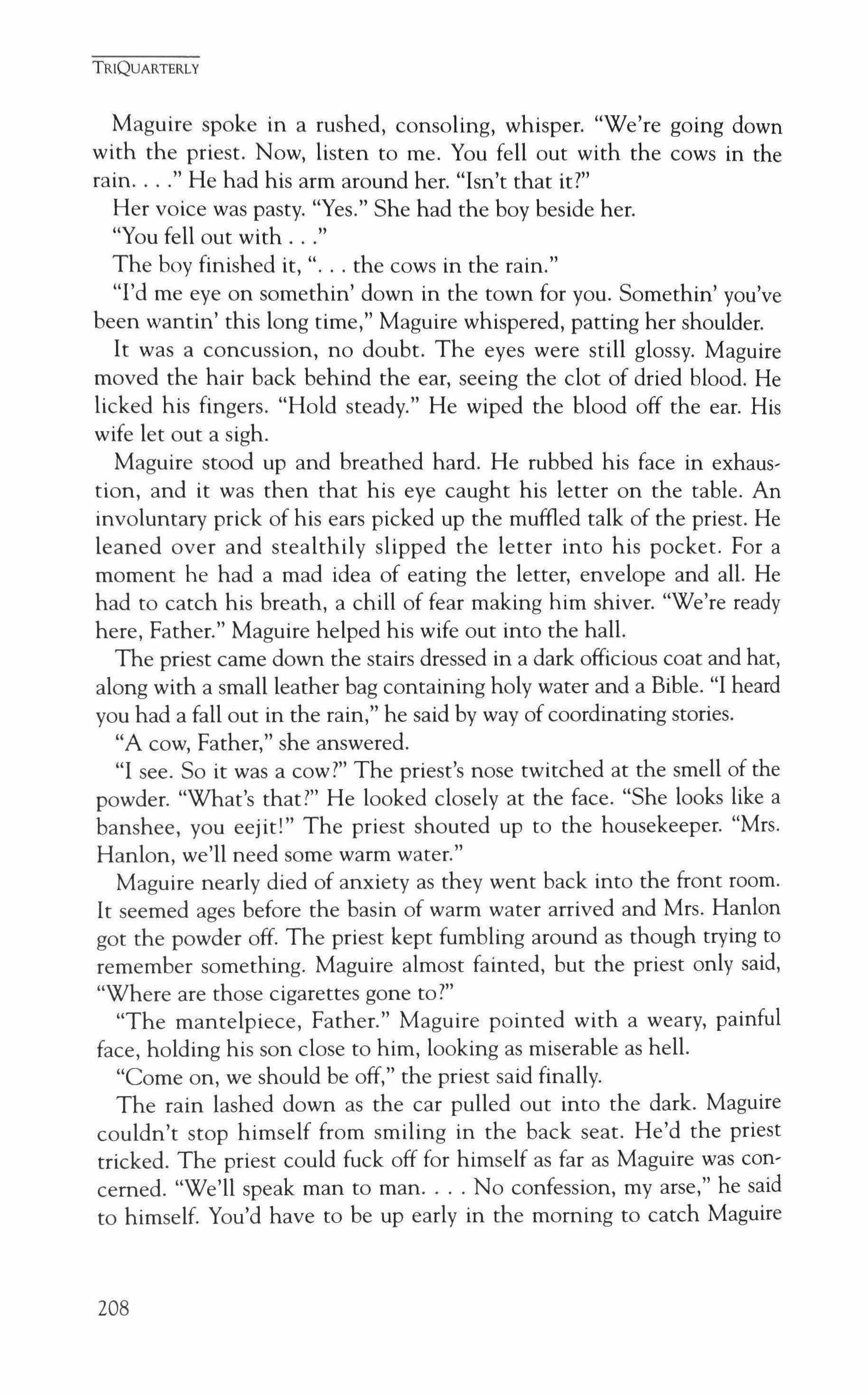
Maguire spoke in a rushed, consoling, whisper. "We're going down with the priest. Now, listen to me. You fell out with the cows in the rain He had his arm around her. "Isn't that it?"
Her voice was pasty. "Yes." She had the boy beside her.
"You fell out with
The boy finished it, the cows in the rain."
"I'd me eye on somethin' down in the town for you. Somethin' you've been wantin' this long time," Maguire whispered, patting her shoulder.
It was a concussion, no doubt. The eyes were still glossy. Maguire moved the hair back behind the ear, seeing the clot of dried blood. He licked his fingers. "Hold steady." He wiped the blood off the ear. His wife let out a sigh.
Maguire stood up and breathed hard. He rubbed his face in exhaustion, and it was then that his eye caught his letter on the table. An involuntary prick of his ears picked up the muffled talk of the priest. He leaned over and stealthily slipped the letter into his pocket. For a moment he had a mad idea of eating the letter, envelope and all. He had to catch his breath, a chill of fear making him shiver. "We're ready here, Father." Maguire helped his wife out into the hall.
The priest came down the stairs dressed in a dark officious coat and hat, along with a small leather bag containing holy water and a Bible. "I heard you had a fall out in the rain," he said by way of coordinating stories.
"A cow, Father," she answered.
"I see. So it was a cow?" The priest's nose twitched at the smell of the powder. "What's that?" He looked closely at the face. "She looks like a banshee, you eejit!" The priest shouted up to the housekeeper. "Mrs. Hanlon, we'll need some warm water."
Maguire nearly died of anxiety as they went back into the front room. It seemed ages before the basin of warm water arrived and Mrs. Hanlon got the powder off. The priest kept fumbling around as though trying to remember something. Maguire almost fainted, but the priest only said, "Where are those cigarettes gone to?"
"The mantelpiece, Father." Maguire pointed with a weary, painful face, holding his son close to him, looking as miserable as hell.
"Come on, we should be off," the priest said finally.
The rain lashed down as the car pulled out into the dark. Maguire couldn't stop himself from smiling in the back seat. He'd the priest tricked. The priest could fuck off for himself as far as Maguire was concerned. "We'll speak man to man No confession, my arse," he said to himself. You'd have to be up early in the morning to catch Maguire
TRIQUARTERLY
208
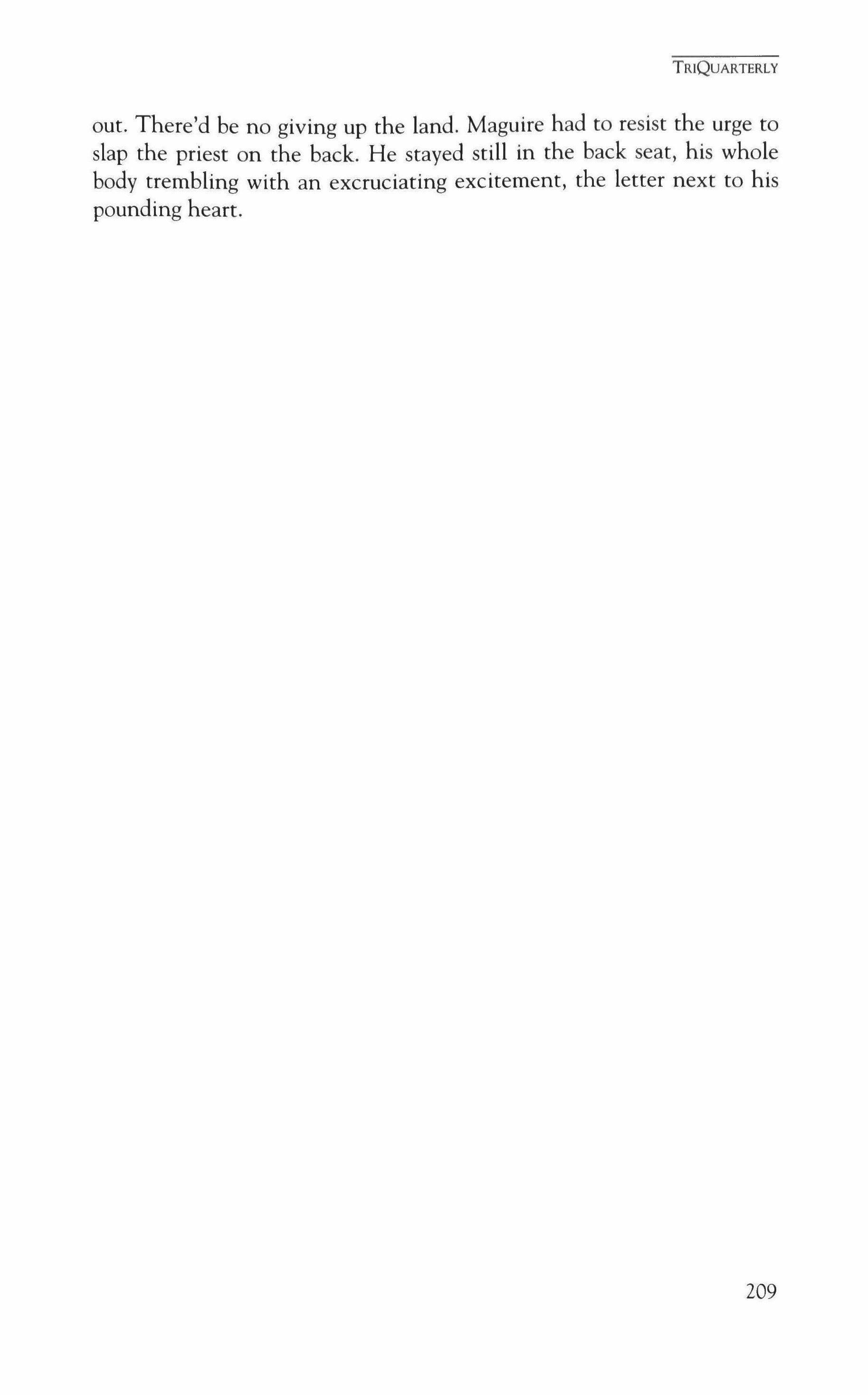
out. There'd be no giving up the land. Maguire had to resist the urge to slap the priest on the back. He stayed still in the back seat, his whole body trembling with an excruciating excitement, the letter next to his pounding heart.
TRIQUARTERLY
209
Tolstoy's American Disciple: Letters to Ernest Howard Crosby, 1894--1906
Robert Whittaker
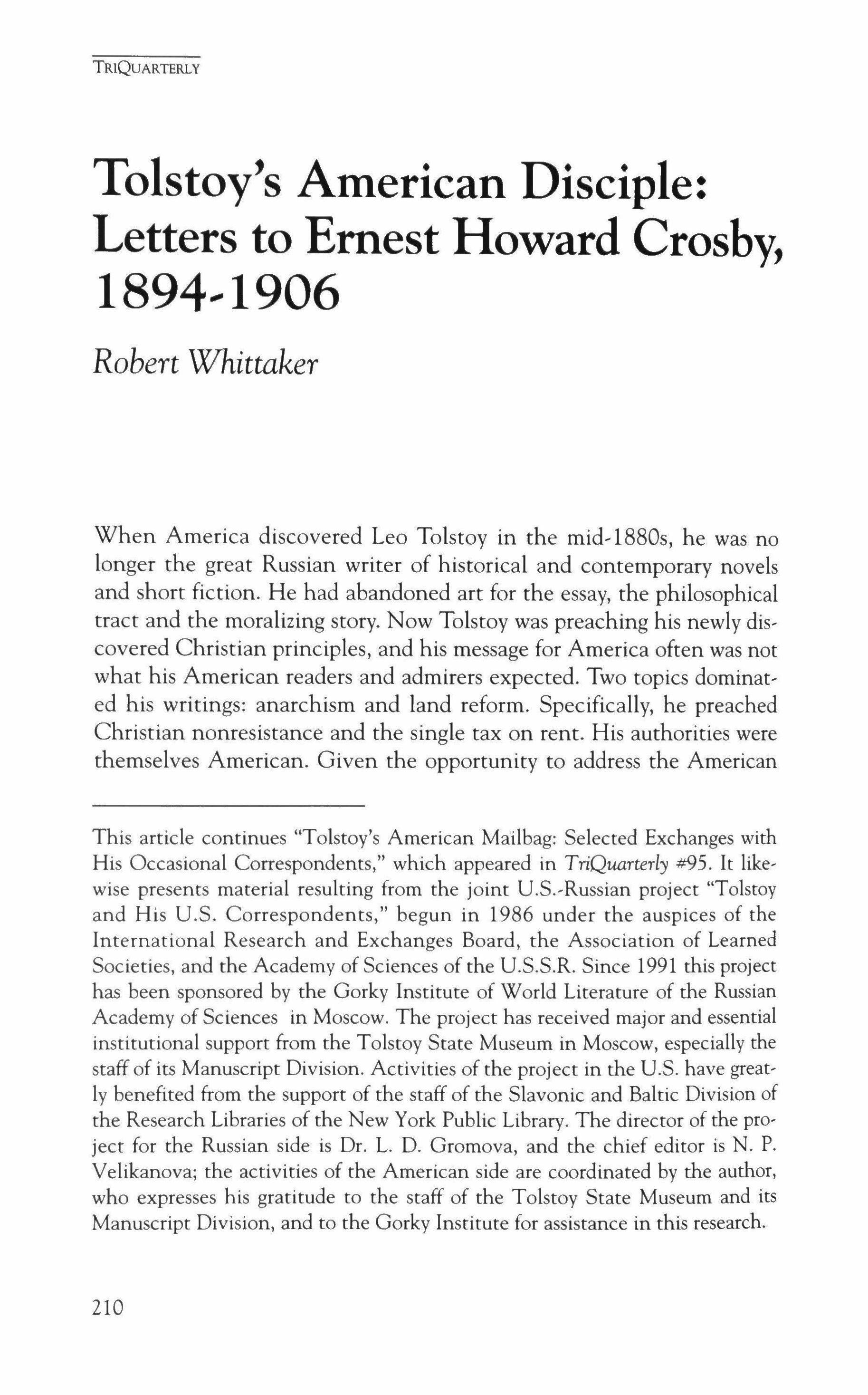
When America discovered Leo Tolstoy in the mid-1880s, he was no longer the great Russian writer of historical and contemporary novels and short fiction. He had abandoned art for the essay, the philosophical tract and the moralizing story. Now Tolstoy was preaching his newly discovered Christian principles, and his message for America often was not what his American readers and admirers expected. Two topics dominated his writings: anarchism and land reform. Specifically, he preached Christian nonresistance and the single tax on rent. His authorities were themselves American. Given the opportunity to address the American
This article continues "Tolstoy's American Mailbag: Selected Exchanges with His Occasional Correspondents," which appeared in TriQuarterly #95. It likewise presents material resulting from the joint Ll.Sc-Russian project "Tolstoy and His U.S. Correspondents," begun in 1986 under the auspices of the International Research and Exchanges Board, the Association of Learned Societies, and the Academy of Sciences of the U.s.s.R. Since 1991 this project has been sponsored by the Gorky Institute of World Literature of the Russian Academy of Sciences in Moscow. The project has received major and essential institutional support from the Tolstoy State Museum in Moscow, especially the staff of its Manuscript Division. Activities of the project in the U.S. have greatly benefited from the support of the staff of the Slavonic and Baltic Division of the Research Libraries of the New York Public Library. The director of the project for the Russian side is Dr. L. D. Gromova, and the chief editor is N. P. Velikanova; the activities of the American side are coordinated by the author, who expresses his gratitude to the staff of the Tolstoy State Museum and its Manuscript Division, and to the Gorky Institute for assistance in this research.
TRIQUARTERLY
210
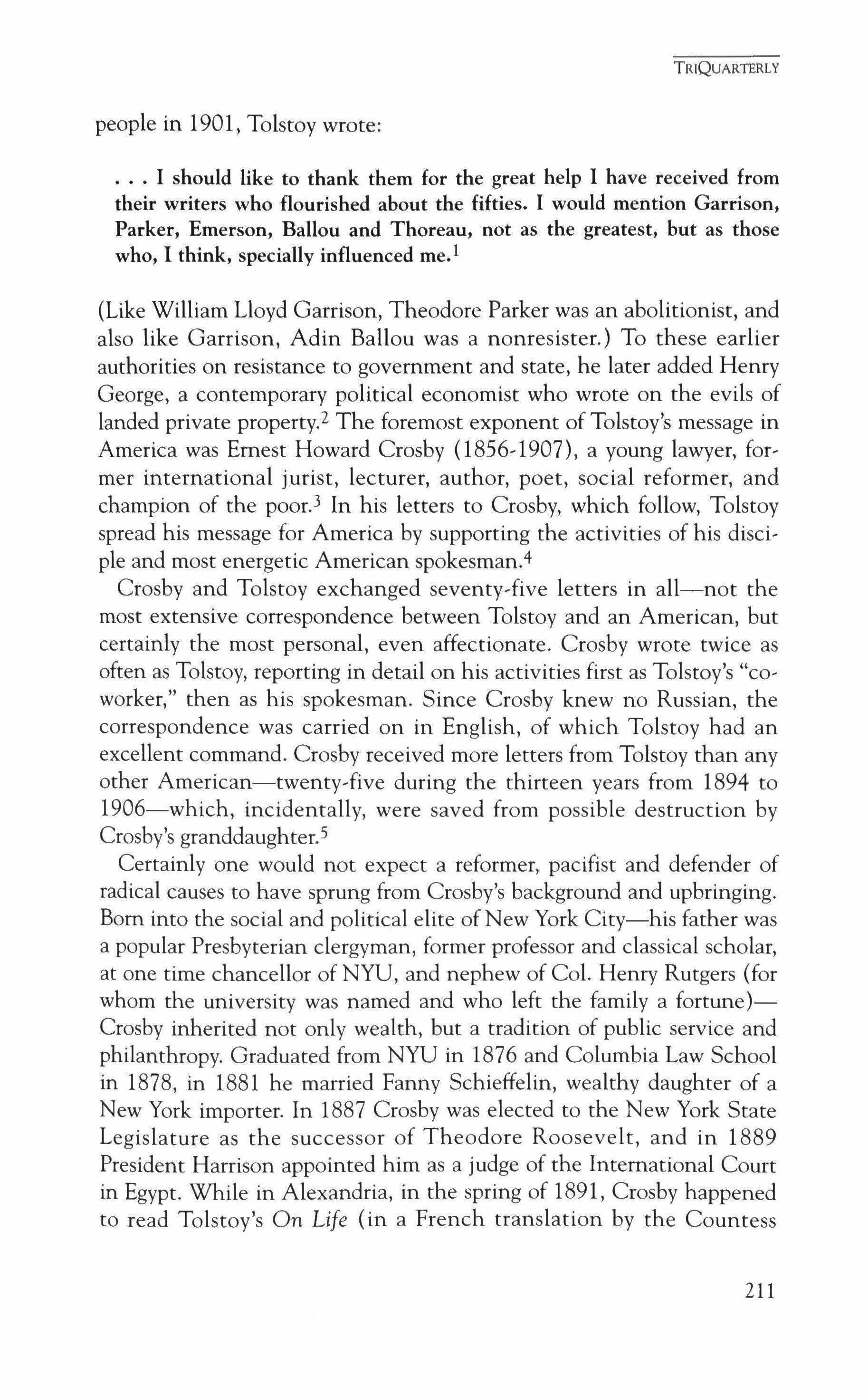
people in 1901, Tolstoy wrote:
I should like to thank them for the great help I have received from their writers who flourished about the fifties. I would mention Garrison, Parker, Emerson, Ballou and Thoreau, not as the greatest, but as those who, I think, specially influenced me.!
(Like William Lloyd Garrison, Theodore Parker was an abolitionist, and also like Garrison, Adin Ballou was a nonresister.) To these earlier authorities on resistance to government and state, he later added Henry George, a contemporary political economist who wrote on the evils of landed private property.- The foremost exponent of Tolstoy's message in America was Ernest Howard Crosby (1856-1907), a young lawyer, former international jurist, lecturer, author, poet, social reformer, and champion of the poor) In his letters to Crosby, which follow, Tolstoy spread his message for America by supporting the activities of his disciple and most energetic American spokesman+
Crosby and Tolstoy exchanged seventy-five letters in all-not the most extensive correspondence between Tolstoy and an American, but certainly the most personal, even affectionate. Crosby wrote twice as often as Tolstoy, reporting in detail on his activities first as Tolstoy's "coworker," then as his spokesman. Since Crosby knew no Russian, the correspondence was carried on in English, of which Tolstoy had an excellent command. Crosby received more letters from Tolstoy than any other American-twenty-five during the thirteen years from 1894 to 1906-which, incidentally, were saved from possible destruction by Crosby's granddaughter.i
Certainly one would not expect a reformer, pacifist and defender of radical causes to have sprung from Crosby's background and upbringing. Born into the social and political elite of New York City-his father was a popular Presbyterian clergyman, former professor and classical scholar, at one time chancellor of NYU, and nephew of Col. Henry Rutgers (for whom the university was named and who left the family a fortune)Crosby inherited not only wealth, but a tradition of public service and philanthropy. Graduated from NYU in 1876 and Columbia Law School in 1878, in 1881 he married Fanny Schieffelin, wealthy daughter of a New York importer. In 1887 Crosby was elected to the New York State Legislature as the successor of Theodore Roosevelt, and in 1889 President Harrison appointed him as a judge of the International Court in Egypt. While in Alexandria, in the spring of 1891, Crosby happened to read Tolstoy's On Life (in a French translation by the Countess
TRIQUARTERLY
211
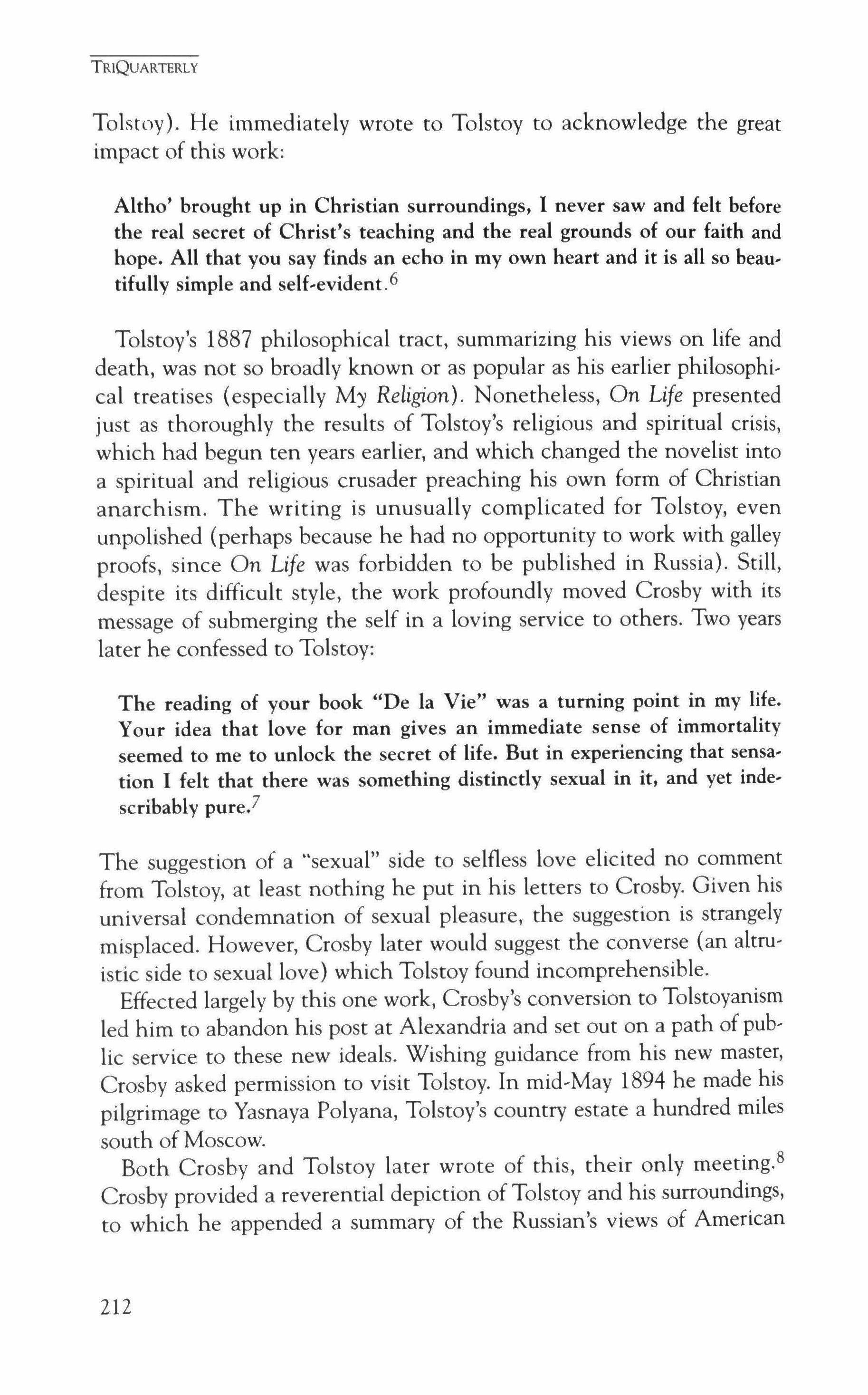
Tolstoy). He immediately wrote to Tolstoy to acknowledge the great impact of this work:
Altho' brought up in Christian surroundings, I never saw and felt before the real secret of Christ's teaching and the real grounds of our faith and hope. All that you say finds an echo in my own heart and it is all so beautifully simple and self-evident. 6
Tolstoy's 1887 philosophical tract, summarizing his views on life and death, was not so broadly known or as popular as his earlier philosophical treatises (especially My Religion), Nonetheless, On Life presented just as thoroughly the results of Tolstoy's religious and spiritual crisis, which had begun ten years earlier, and which changed the novelist into a spiritual and religious crusader preaching his own form of Christian anarchism. The writing is unusually complicated for Tolstoy, even unpolished (perhaps because he had no opportunity to work with galley proofs, since On Life was forbidden to be published in Russia). Still, despite its difficult style, the work profoundly moved Crosby with its message of submerging the self in a loving service to others. Two years later he confessed to Tolstoy:
The reading of your book "De la Vie" was a turning point in my life. Your idea that love for man gives an immediate sense of immortality seemed to me to unlock the secret of life. But in experiencing that sensation I felt that there was something distinctly sexual in it, and yet indescribably pure}
The suggestion of a "sexual" side to selfless love elicited no comment from Tolstoy, at least nothing he put in his letters to Crosby. Given his universal condemnation of sexual pleasure, the suggestion is strangely misplaced. However, Crosby later would suggest the converse (an altruistic side to sexual love) which Tolstoy found incomprehensible. Effected largely by this one work, Crosby's conversion to Tolstoyanism led him to abandon his post at Alexandria and set out on a path of public service to these new ideals. Wishing guidance from his new master, Crosby asked permission to visit Tolstoy. In mid-May 1894 he made his pilgrimage to Yasnaya Polyana, Tolstoy's country estate a hundred miles south of Moscow.
Both Crosby and Tolstoy later wrote of this, their only meeting." Crosby provided a reverential depiction of Tolstoy and his surroundings, to which he appended a summary of the Russian's views of American
TRIQUARTERLY
212
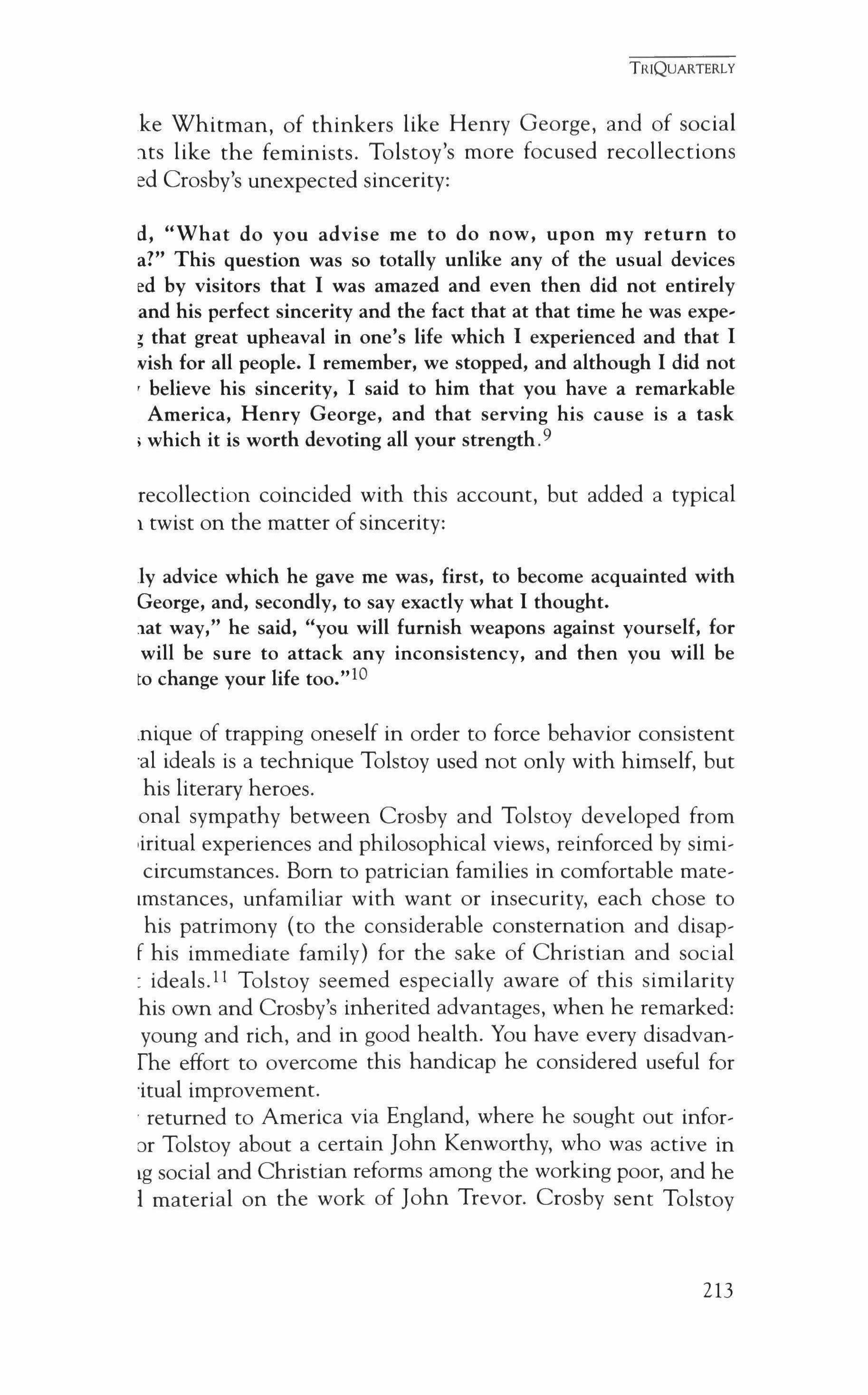
ke Whitman, of thinkers like Henry George, and of social ats like the feminists. Tolstoy's more focused recollections ed Crosby's unexpected sincerity:
d, "What do you advise me to do now, upon my return to a?" This question was so totally unlike any of the usual devices ed by visitors that I was amazed and even then did not entirely and his perfect sincerity and the fact that at that time he was expe� that great upheaval in one's life which I experienced and that I vish for all people. I remember, we stopped, and although I did not r believe his sincerity, I said to him that you have a remarkable America, Henry George, and that serving his cause is a task i which it is worth devoting all your strength.9
recollection coincided with this account, but added a typical 1 twist on the matter of sincerity:
Iv advice which he gave me was, first, to become acquainted with George, and, secondly, to say exactly what I thought. nat way," he said, "you will furnish weapons against yourself, for will be sure to attack any inconsistency, and then you will be to change your life too."IO
.nique of trapping oneself in order to force behavior consistent 'al ideals is a technique Tolstoy used not only with himself, but his literary heroes.
onal sympathy between Crosby and Tolstoy developed from .iritual experiences and philosophical views, reinforced by simicircumstances. Born to patrician families in comfortable mateimstances, unfamiliar with want or insecurity, each chose to his patrimony (to the considerable consternation and disapf his immediate family) for the sake of Christian and social : ideals.U Tolstoy seemed especially aware of this similarity his own and Crosby's inherited advantages, when he remarked: young and rich, and in good health. You have every disadvan[he effort to overcome this handicap he considered useful for 'itual improvement.
returned to America via England, where he sought out inferDr Tolstoy about a certain John Kenworthy, who was active in 19 social and Christian reforms among the working poor, and he I material on the work of John Trevor. Crosby sent Tolstoy 213
TRIQUARTERLY
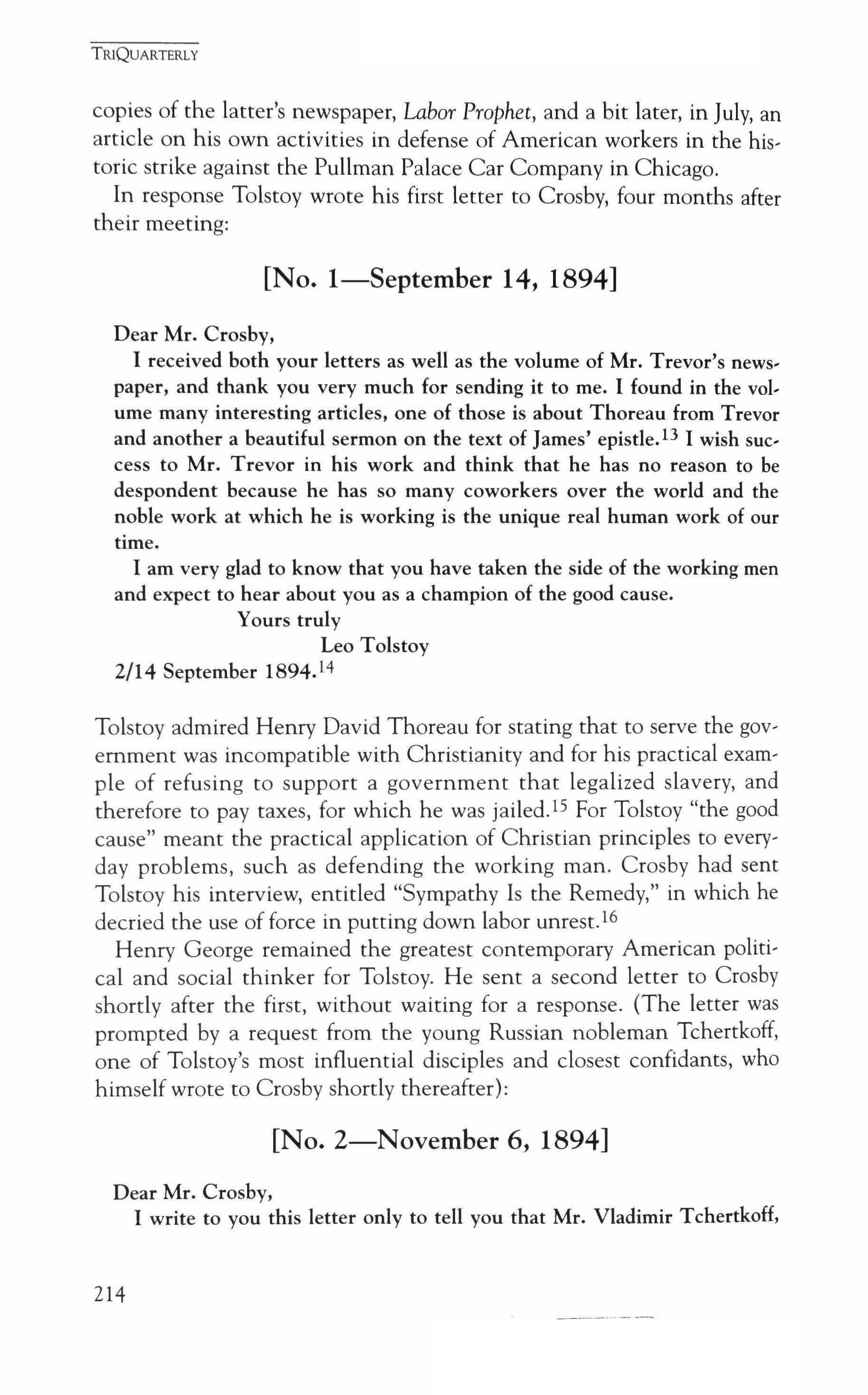
copies of the latter's newspaper, Labor Prophet, and a bit later, in July, an article on his own activities in defense of American workers in the historic strike against the Pullman Palace Car Company in Chicago.
In response Tolstoy wrote his first letter to Crosby, four months after their meeting:
[No. I-September 14, 1894]
Dear Mr. Crosby,
I received both your letters as well as the volume of Mr. Trevor's newspaper, and thank you very much for sending it to me. I found in the volume many interesting articles, one of those is about Thoreau from Trevor and another a beautiful sermon on the text of James' epistle.13 I wish success to Mr. Trevor in his work and think that he has no reason to be despondent because he has so many coworkers over the world and the noble work at which he is working is the unique real human work of our time.
I am very glad to know that you have taken the side of the working men and expect to hear about you as a champion of the good cause.
Yours truly Leo Tolstoy
2/14 September 1894.14
Tolstoy admired Henry David Thoreau for stating that to serve the government was incompatible with Christianity and for his practical example of refusing to support a government that legalized slavery, and therefore to pay taxes, for which he was jailed. IS For Tolstoy "the good cause" meant the practical application of Christian principles to everyday problems, such as defending the working man. Crosby had sent Tolstoy his interview, entitled "Sympathy Is the Remedy," in which he decried the use of force in putting down labor unrest.l>
Henry George remained the greatest contemporary American political and social thinker for Tolstoy. He sent a second letter to Crosby shortly after the first, without waiting for a response. (The letter was prompted by a request from the young Russian nobleman Tchertkoff, one of Tolstoy's most influential disciples and closest confidants, who himself wrote to Crosby shortly thereafter):
[No. 2-November 6, 1894]
Dear Mr. Crosby,
I write to you this letter only to tell you that Mr. Vladimir Tchertkoff,
TRIQUARTERLY
214
of whom, I am sure, you have heard from me, and who will address you on behalf of some literary matters, i.e. about publications of some translations of my writings, is a very dear friend of mine and that you will oblige me in helping him in his work. From a letter that I received from a contributor to the "Labour prophet" I guess that you have communicated my opinion about his paper to the editor. I thank you for it because I appreciate very much his work and I wish him to know it. Henry George has sent me all his books. I knew some of them, but some others [such] as the "Perplexed philosopher" and others were new to me. The more I know of him, the more I esteem him and am astonished at the indifference of the civilized world to his work. If the new Czar were to ask me what I should advise him to do, I would say to him: use your autocratic power to abolish the landed property in Russia and to introduce the single tax system and then give up your power and give the people a liberal constitution. I write this to you because I know that you are one of the coworkers of H. George and that you hold his ideas. I wish you success in your work.
Yours truly
Leo Tolstoy
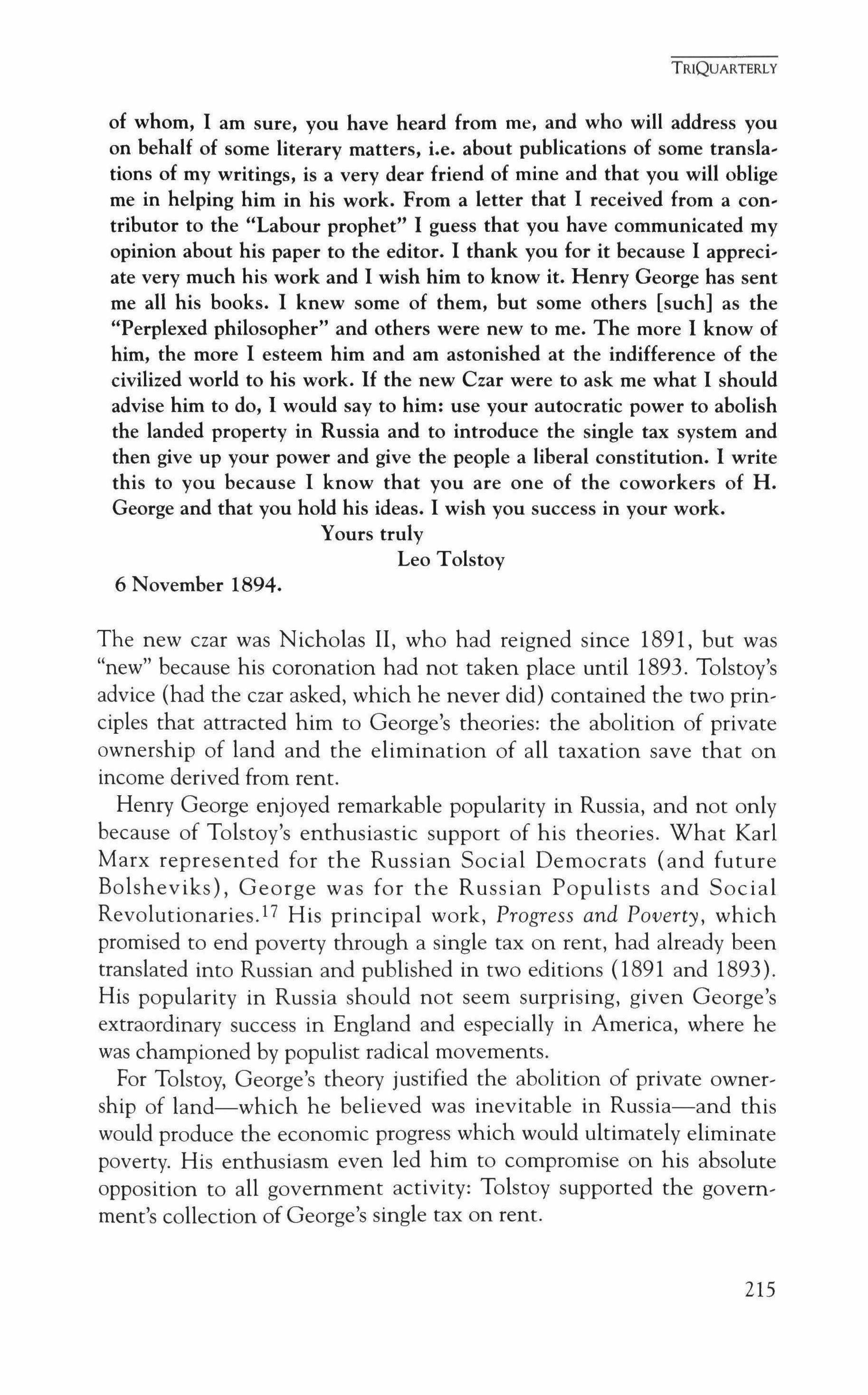
6 November 1894.
The new czar was Nicholas II, who had reigned since 1891, but was "new" because his coronation had not taken place until 1893. Tolstoy's advice (had the czar asked, which he never did) contained the two principles that attracted him to George's theories: the abolition of private ownership of land and the elimination of all taxation save that on income derived from rent.
Henry George enjoyed remarkable popularity in Russia, and not only because of Tolstoy's enthusiastic support of his theories. What Karl Marx represented for the Russian Social Democrats (and future Bolsheviks), George was for the Russian Populists and Social Revolutionaries.J? His principal work, Progress and Poverty, which promised to end poverty through a single tax on rent, had already been translated into Russian and published in two editions (1891 and 1893). His popularity in Russia should not seem surprising, given George's extraordinary success in England and especially in America, where he was championed by populist radical movements.
For Tolstoy, George's theory justified the abolition of private ownership of land-which he believed was inevitable in Russia-and this would produce the economic progress which would ultimately eliminate poverty. His enthusiasm even led him to compromise on his absolute opposition to all government activity: Tolstoy supported the government's collection of George's single tax on rent.
TRIQUARTERLY
215
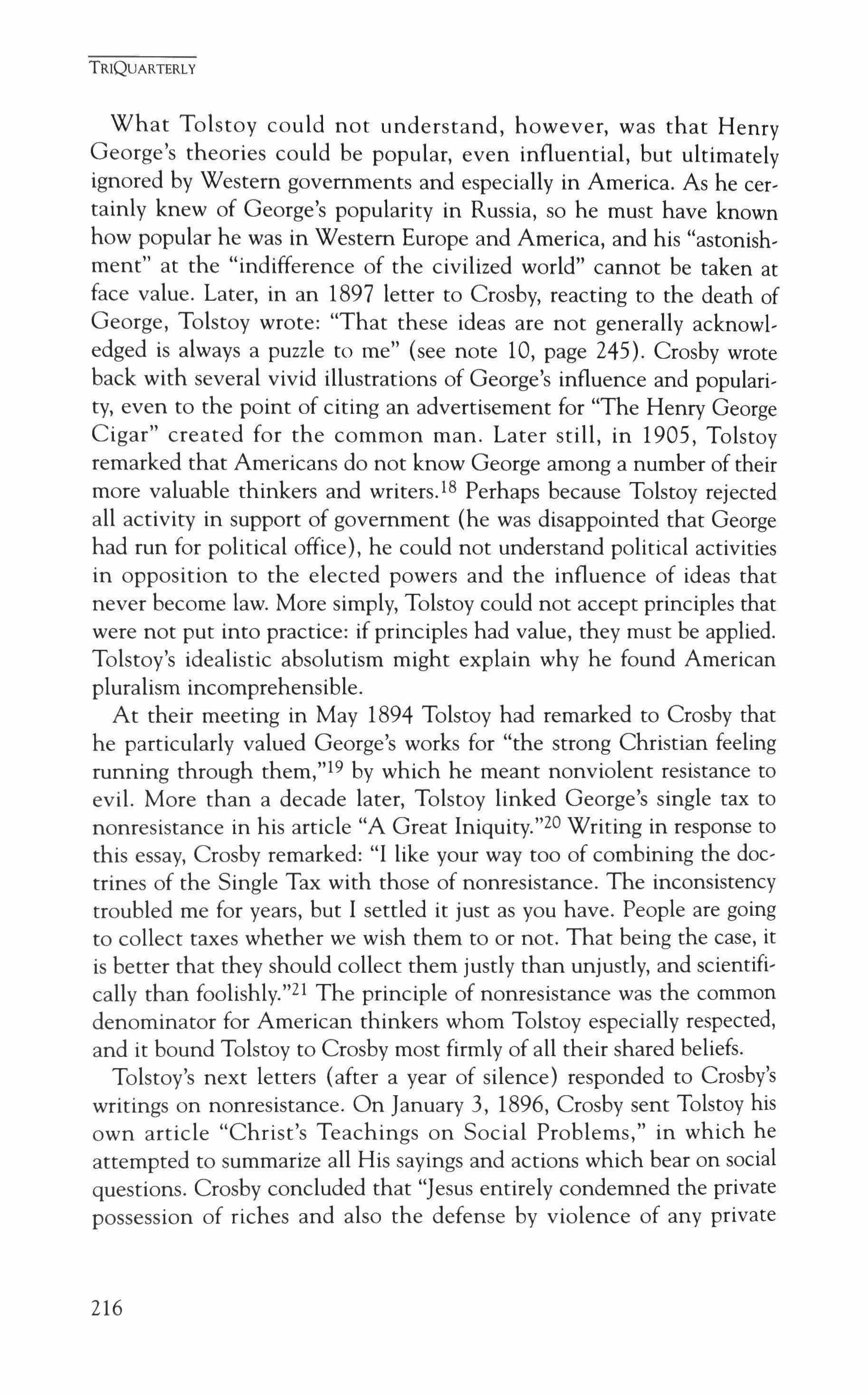
What Tolstoy could not understand, however, was that Henry George's theories could be popular, even influential, but ultimately ignored by Western governments and especially in America. As he certainly knew of George's popularity in Russia, so he must have known how popular he was in Western Europe and America, and his "astonishment" at the "indifference of the civilized world" cannot be taken at face value. Later, in an 1897 letter to Crosby, reacting to the death of George, Tolstoy wrote: "That these ideas are not generally acknowledged is always a puzzle to me" (see note 10, page 245). Crosby wrote back with several vivid illustrations of George's influence and popularity, even to the point of citing an advertisement for "The Henry George Cigar" created for the common man. Later still, in 1905, Tolstoy remarked that Americans do not know George among a number of their more valuable thinkers and writers.lf Perhaps because Tolstoy rejected all activity in support of government (he was disappointed that George had run for political office), he could not understand political activities in opposition to the elected powers and the influence of ideas that never become law. More simply, Tolstoy could not accept principles that were not put into practice: if principles had value, they must be applied. Tolstoy's idealistic absolutism might explain why he found American pluralism incomprehensible.
At their meeting in May 1894 Tolstoy had remarked to Crosby that he particularly valued George's works for "the strong Christian feeling running through them,"19 by which he meant nonviolent resistance to evil. More than a decade later, Tolstoy linked George's single tax to nonresistance in his article "A Great Iniquity."20 Writing in response to this essay, Crosby remarked: "I like your way too of combining the doctrines of the Single Tax with those of nonresistance. The inconsistency troubled me for years, but I settled it just as you have. People are going to collect taxes whether we wish them to or not. That being the case, it is better that they should collect them justly than unjustly, and scientifically than foolishly."21 The principle of nonresistance was the common denominator for American thinkers whom Tolstoy especially respected, and it bound Tolstoy to Crosby most firmly of all their shared beliefs.
Tolstoy's next letters (after a year of silence) responded to Crosby's writings on nonresistance. On January 3, 1896, Crosby sent Tolstoy his own article "Christ's Teachings on Social Problems," in which he attempted to summarize all His sayings and actions which bear on social questions. Crosby concluded that "Jesus entirely condemned the private possession of riches and also the defense by violence of any private
TRIQUARTERLY
216
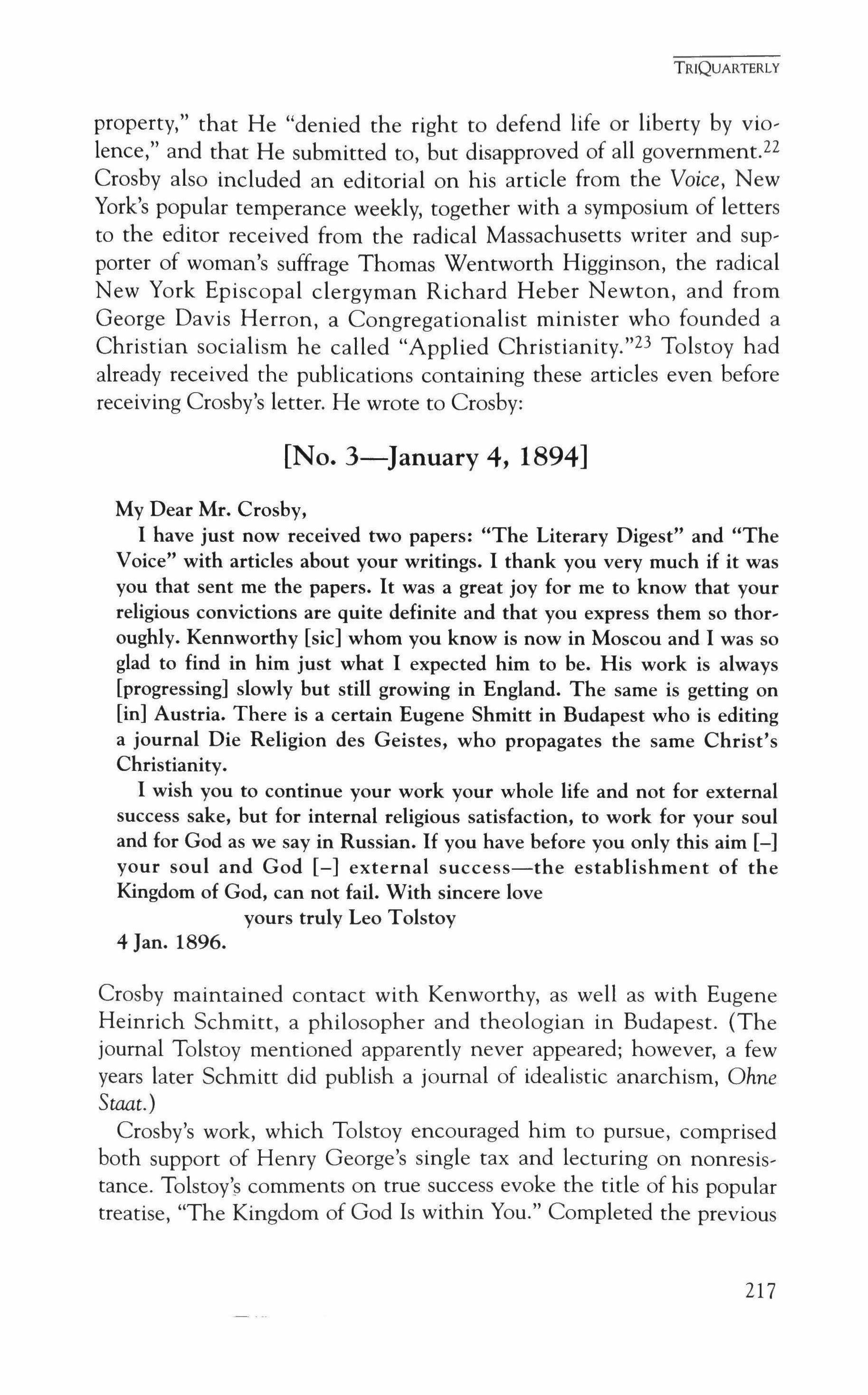
property," that He "denied the right to defend life or liberty by violence," and that He submitted to, but disapproved of all governrnent.F Crosby also included an editorial on his article from the Voice, New York's popular temperance weekly, together with a symposium of letters to the editor received from the radical Massachusetts writer and supporter of woman's suffrage Thomas Wentworth Higginson, the radical New York Episcopal clergyman Richard Heber Newton, and from George Davis Herron, a Congregationalist minister who founded a Christian socialism he called "Applied Christianity."Z3 Tolstoy had already received the publications containing these articles even before receiving Crosby's letter. He wrote to Crosby:
[No. 3-}anuary 4, 1894]
My Dear Mr. Crosby, I have just now received two papers: "The Literary Digest" and "The Voice" with articles about your writings. I thank you very much if it was you that sent me the papers. It was a great joy for me to know that your religious convictions are quite definite and that you express them so thoroughly. Kennworthy [sic] whom you know is now in Moscou and I was so glad to find in him just what I expected him to be. His work is always [progressing] slowly but still growing in England. The same is getting on [in] Austria. There is a certain Eugene Shmitt in Budapest who is editing a journal Die Religion des Geistes, who propagates the same Christ's Christianity
I wish you to continue your work your whole life and not for external success sake, but for internal religious satisfaction, to work for your soul and for God as we say in Russian. If you have before you only this aim [-] your soul and God [-] external success-the establishment of the Kingdom of God, can not fail. With sincere love yours truly Leo Tolstoy 4 Jan. 1896.
Crosby maintained contact with Kenworthy, as well as with Eugene Heinrich Schmitt, a philosopher and theologian in Budapest. (The journal Tolstoy mentioned apparently never appeared; however, a few years later Schmitt did publish a journal of idealistic anarchism, Ohne Staat.)
Crosby's work, which Tolstoy encouraged him to pursue, comprised both support of Henry George's single tax and lecturing on nonresistance. Tolstoy's comments on true success evoke the title of his popular treatise, "The Kingdom of God Is within You." Completed the previous
TRIQUARTERLY
217
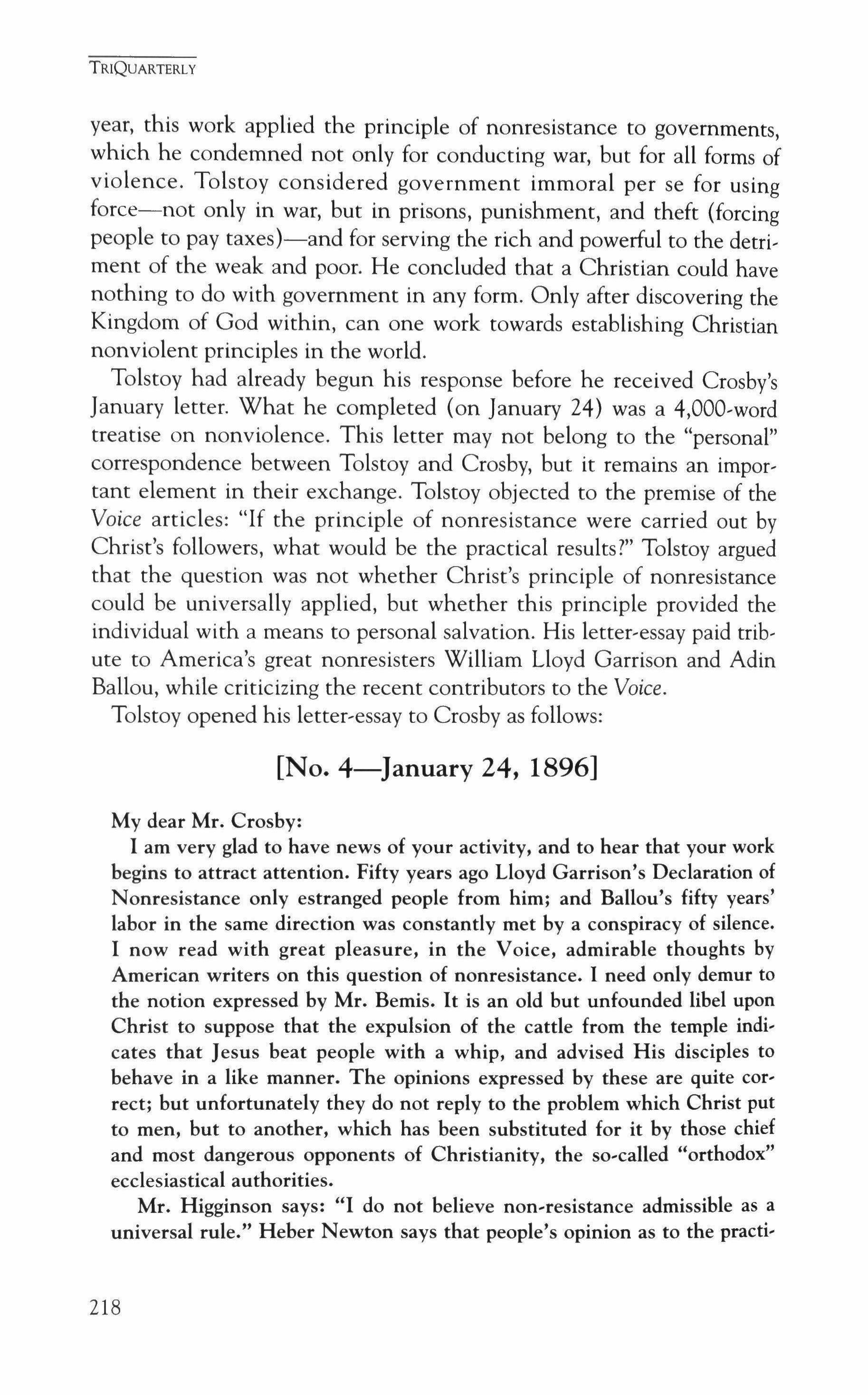
year, this work applied the principle of nonresistance to governments, which he condemned not only for conducting war, but for all forms of violence. Tolstoy considered government immoral per se for using force-not only in war, but in prisons, punishment, and theft {forcing people to pay taxes}-and for serving the rich and powerful to the detriment of the weak and poor. He concluded that a Christian could have nothing to do with government in any form. Only after discovering the Kingdom of God within, can one work towards establishing Christian nonviolent principles in the world.
Tolstoy had already begun his response before he received Crosby's January letter. What he completed {on January 24} was a 4,OOO-word treatise on nonviolence. This letter may not belong to the "personal" correspondence between Tolstoy and Crosby, but it remains an important element in their exchange. Tolstoy objected to the premise of the Voice articles: "If the principle of nonresistance were carried out by Christ's followers, what would be the practical results?" Tolstoy argued that the question was not whether Christ's principle of nonresistance could be universally applied, but whether this principle provided the individual with a means to personal salvation. His letter-essay paid tribute to America's great nonresisters William Lloyd Garrison and Adin Ballou, while criticizing the recent contributors to the Voice.
Tolstoy opened his letter-essay to Crosby as follows:
[No.4-January 24, 1896]
My dear Mr. Crosby:
I am very glad to have news of your activity, and to hear that your work begins to attract attention. Fifty years ago Lloyd Garrison's Declaration of Nonresistance only estranged people from him; and Ballou's fifty years' labor in the same direction was constantly met by a conspiracy of silence. I now read with great pleasure, in the Voice, admirable thoughts by American writers on this question of nonresistance. I need only demur to the notion expressed by Mr. Bemis. It is an old but unfounded libel upon Christ to suppose that the expulsion of the cattle from the temple indicates that Jesus beat people with a whip, and advised His disciples to behave in a like manner. The opinions expressed by these are quite correct; but unfortunately they do not reply to the problem which Christ put to men, but to another, which has been substituted for it by those chief and most dangerous opponents of Christianity, the so-called "orthodox" ecclesiastical authorities.
Mr. Higginson says: "I do not believe non-resistance admissible as a universal rule." Heber Newton says that people's opinion as to the practi-
TRIQUARTERLY
218
cal result of the application of Christ's teaching will depend on the extent of people's belief in His authority. Carlos Martyn considers the transition stage in which we live not suited for the application of the doctrine of non-resistance, George D. Herron holds that to obey the law of non-resistance we must learn how to apply it to life. Mrs. Livermore, thinking that the law of non-resistance can be fully obeyed only in the future, says the same. All these views refer to the question, "What would happen if people were all obliged to obey the law of non-resistance!"
The letter proceeded to explain how to apply in practice Christ's law of love (the Golden Rule) and its corollary of nonviolent resistance to evil. Tolstoy rejected hypothetical questions of whether nonresistance was a categorical imperative, of whether one can employ violence or lie to save a life, and other similar questions on the grounds that they had no practical significance.
Crosby did not actually receive this letter-essay until mid-March, after Tolstoy got an English version (from his translator, Aylmer Maude}.24 He sent the translation with the following letter:
[No.5-March 6, 1896]
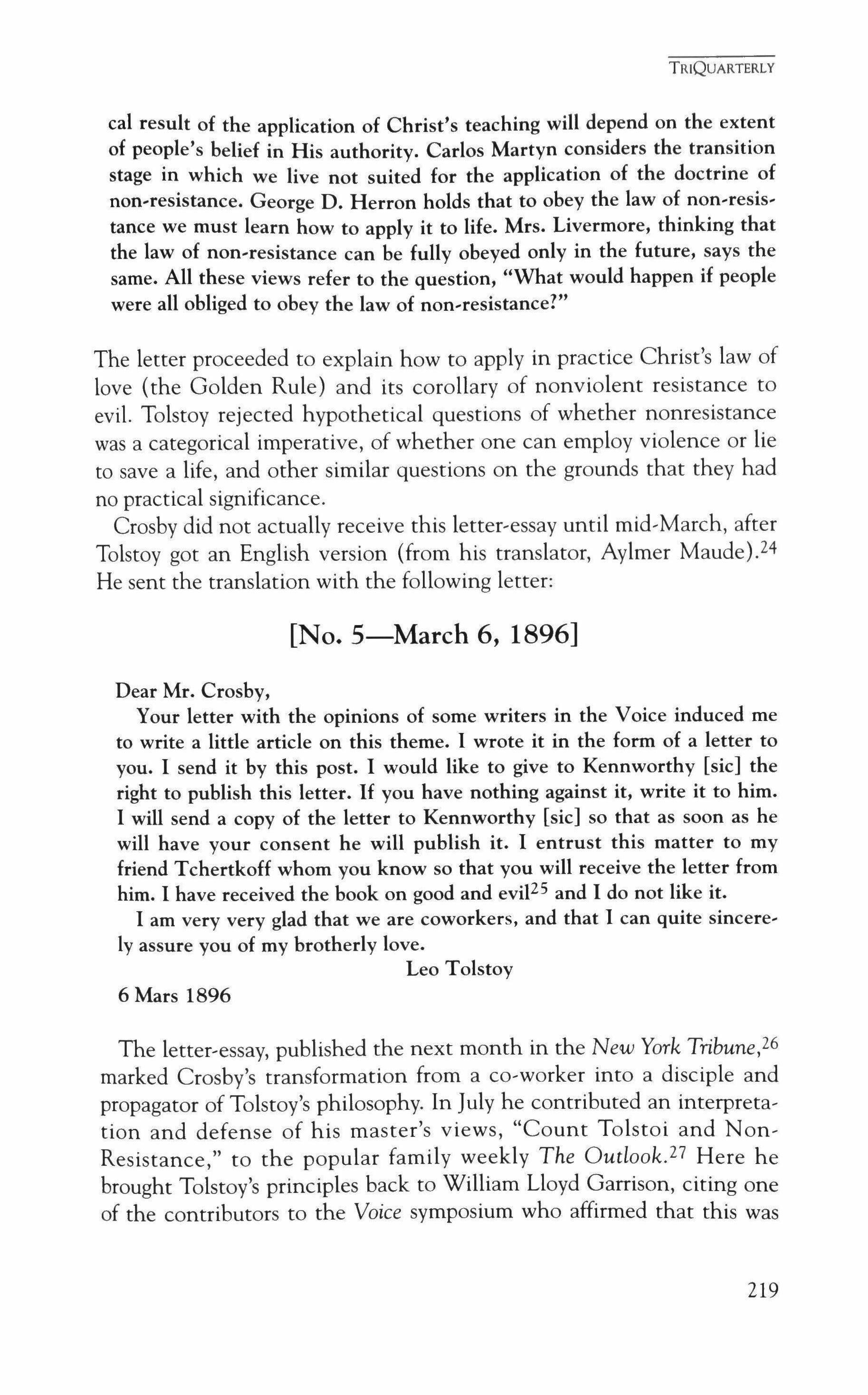
Dear Mr. Crosby,
Your letter with the opinions of some writers in the Voice induced me to write a little article on this theme. I wrote it in the form of a letter to you. I send it by this post. I would like to give to Kennworthy [sic] the right to publish this letter. If you have nothing against it, write it to him. I will send a copy of the letter to Kennworthy [sic] so that as soon as he will have your consent he will publish it. I entrust this matter to my friend Tchertkoff whom you know so that you will receive the letter from him. I have received the book on good and evil25 and I do not like it.
I am very very glad that we are coworkers, and that I can quite sincerely assure you of my brotherly love.
Leo Tolstoy 6 Mars 1896
The letter-essay, published the next month in the New York Tribune,26 marked Crosby's transformation from a co-worker into a disciple and propagator of Tolstoy's philosophy. In July he contributed an interpretation and defense of his master's views, "Count Tolstoi and NonResistance," to the popular family weekly The Outlook.27 Here he brought Tolstoy's principles back to William Lloyd Garrison, citing one of the contributors to the Voice symposium who affirmed that this was
TRIQUARTERLY
219
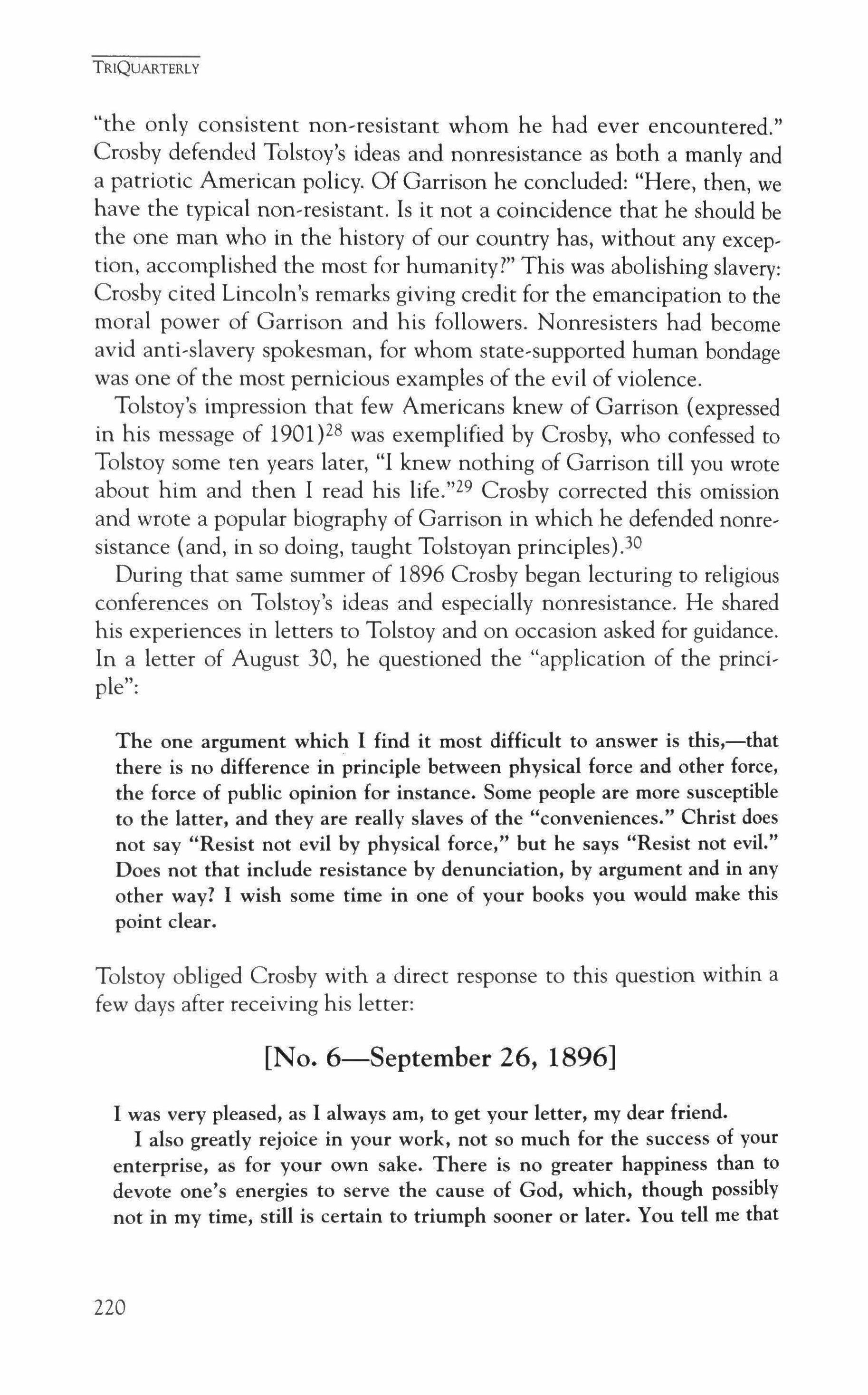
"the only consistent non-resistant whom he had ever encountered." Crosby defended Tolstoy's ideas and nonresistance as both a manly and a patriotic American policy. Of Garrison he concluded: "Here, then, we have the typical non-resistant, Is it not a coincidence that he should be the one man who in the history of our country has, without any exception, accomplished the most for humanity?" This was abolishing slavery: Crosby cited Lincoln's remarks giving credit for the emancipation to the moral power of Garrison and his followers. Nonresisters had become avid anti-slavery spokesman, for whom state-supported human bondage was one of the most pernicious examples of the evil of violence.
Tolstoy's impression that few Americans knew of Garrison {expressed in his message of 1901)28 was exemplified by Crosby, who confessed to Tolstoy some ten years later, "I knew nothing of Garrison till you wrote about him and then I read his life."29 Crosby corrected this omission and wrote a popular biography of Garrison in which he defended nonresistance {and, in so doing, taught Tolstoyan principles))O
During that same summer of 1896 Crosby began lecturing to religious conferences on Tolstoy's ideas and especially nonresistance. He shared his experiences in letters to Tolstoy and on occasion asked for guidance. In a letter of August 30, he questioned the "application of the principle":
The one argument which I find it most difficult to answer is this,-that there is no difference in principle between physical force and other force, the force of public opinion for instance. Some people are more susceptible to the latter, and they are really slaves of the "conveniences." Christ does not say "Resist not evil by physical force," but he says "Resist not evil." Does not that include resistance by denunciation, by argument and in any other way? I wish some time in one of your books you would make this point clear.
Tolstoy obliged Crosby with a direct response to this question within a few days after receiving his letter:
[No.6-September 26, 1896]
I was very pleased, as I always am, to get your letter, my dear friend. I also greatly rejoice in your work, not so much for the success of your enterprise, as for your own sake. There is no greater happiness than to devote one's energies to serve the cause of God, which, though possibly not in my time, still is certain to triumph sooner or later. You tell me that
TRIQUARTERLY
220
occasionally you are confronted with the argument that there is no differ, ence in principle between physical and other forces-the force of public opinion for instance, and that you find it difficult to answer this. Not only do I not find any difficulty in arguing against such a construction put on the words of Christ, but I believe such an argument wholly unnecessary, for this misconception has no ground whatever: we read in the Gospel: "it is said an eye for an eye and a tooth for a tooth, but I say unto you do not resist evil, even if they smite you and if they take your cloak from you"and other examples of violence which are not to be resisted by violence;but nowhere is it said not to resist any unmaterial forces.
To pretend that Christ forbade all resistance to all kind of evil is sophistry, and it is made use of by such who desire by all means to defend the exercise of physical violence.
Yours truly
Leo Tolstoy.
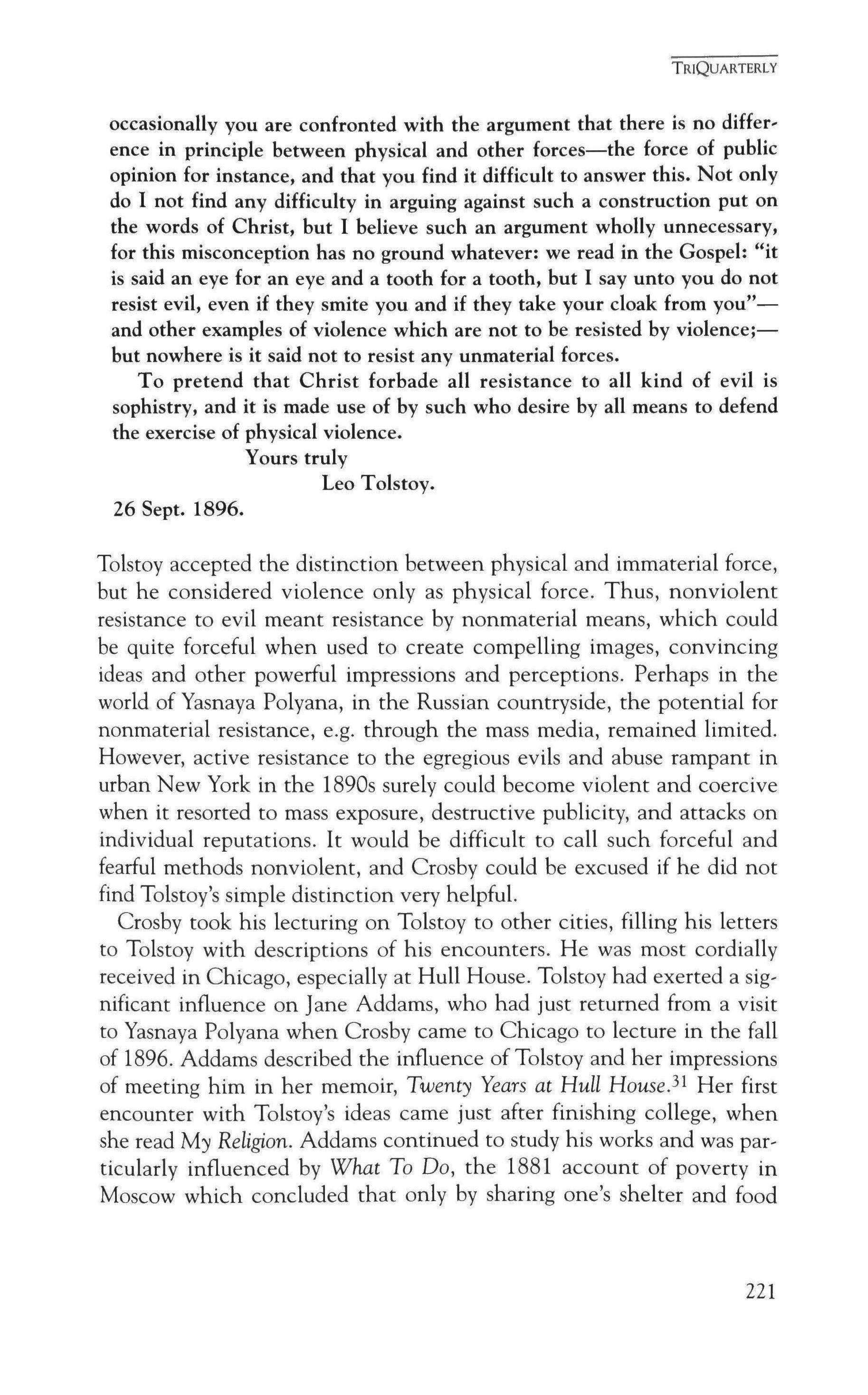
26 Sept. 1896.
Tolstoy accepted the distinction between physical and immaterial force, but he considered violence only as physical force. Thus, nonviolent resistance to evil meant resistance by nonmaterial means, which could be quite forceful when used to create compelling images, convincing ideas and other powerful impressions and perceptions. Perhaps in the world of Yasnaya Polyana, in the Russian countryside, the potential for nonmaterial resistance, e.g. through the mass media, remained limited. However, active resistance to the egregious evils and abuse rampant in urban New York in the 1890s surely could become violent and coercive when it resorted to mass exposure, destructive publicity, and attacks on individual reputations. It would be difficult to call such forceful and fearful methods nonviolent, and Crosby could be excused if he did not find Tolstoy's simple distinction very helpful.
Crosby took his lecturing on Tolstoy to other cities, filling his letters to Tolstoy with descriptions of his encounters. He was most cordially received in Chicago, especially at Hull House. Tolstoy had exerted a significant influence on Jane Addams, who had just returned from a visit to Yasnaya Polyana when Crosby came to Chicago to lecture in the fall of 1896. Addams described the influence of Tolstoy and her impressions of meeting him in her memoir, Twenty Years at Hull House)1 Her first encounter with Tolstoy's ideas came just after finishing college, when she read My Religion. Addams continued to study his works and was particularly influenced by What To Do, the 1881 account of poverty in Moscow which concluded that only by sharing one's shelter and food 221
TRIQUARTERLY
with the poor could one truly assist them. Tolstoy, rather unjustly, failed to recognize a kindred spirit in Addams when they met, and he denigrated her humanitarian efforts by criticizing her as an "absentee landowner" (since she was supported by income from a family farm) and by ridiculing her dress. As she described the encounter,
Tolstoy, standing by clad in his peasant garb, listened gravely but, glancing distrustfully at the sleeves of my traveling gown which unfortunately at that season were monstrous in size, he took hold of an edge and pulling out one sleeve to an interminable breadth, said quite simply that "there was enough stuff on one arm to make a frock for a little girl," and asked me directly if I did not find "such a dress" a "barrier to the people."
Disconcerted by such bold criticism, Addams could only respond that "nothing would more effectively separate [her] from 'the people' than a cotton blouse following the simple lines of the human form," apparently in deference to the demands of fashion and modesty of her time.32 Under the influence of Tolstoy's ideas Addams decided to devote time daily to physical work at Hull House: thus Crosby wrote in his next letter to Tolstoy that "Miss Addams is working regularly in her bakery and her associate, Miss Starr, is learning book-binding.t'U But practical needs soon conquered Tolstoyan principle: Addams wrote, "The half dozen people invariably waiting to see me after breakfast, the piles of letters to be opened and answered, the demand of actual and pressing human wants-were all these to be pushed aside and asked to wait while I saved my soul by two hours' work at baking bread?"34
Tolstoy encouraged Crosby to continue his lecturing. Supporting his plan to gather his lectures and essays into a book, Tolstoy granted Crosby's request to republish the letter-essay on nonresistance and gave him permission to publish an account of his visit to Yasnaya Polyana.
[No.7-January 7, 1897]
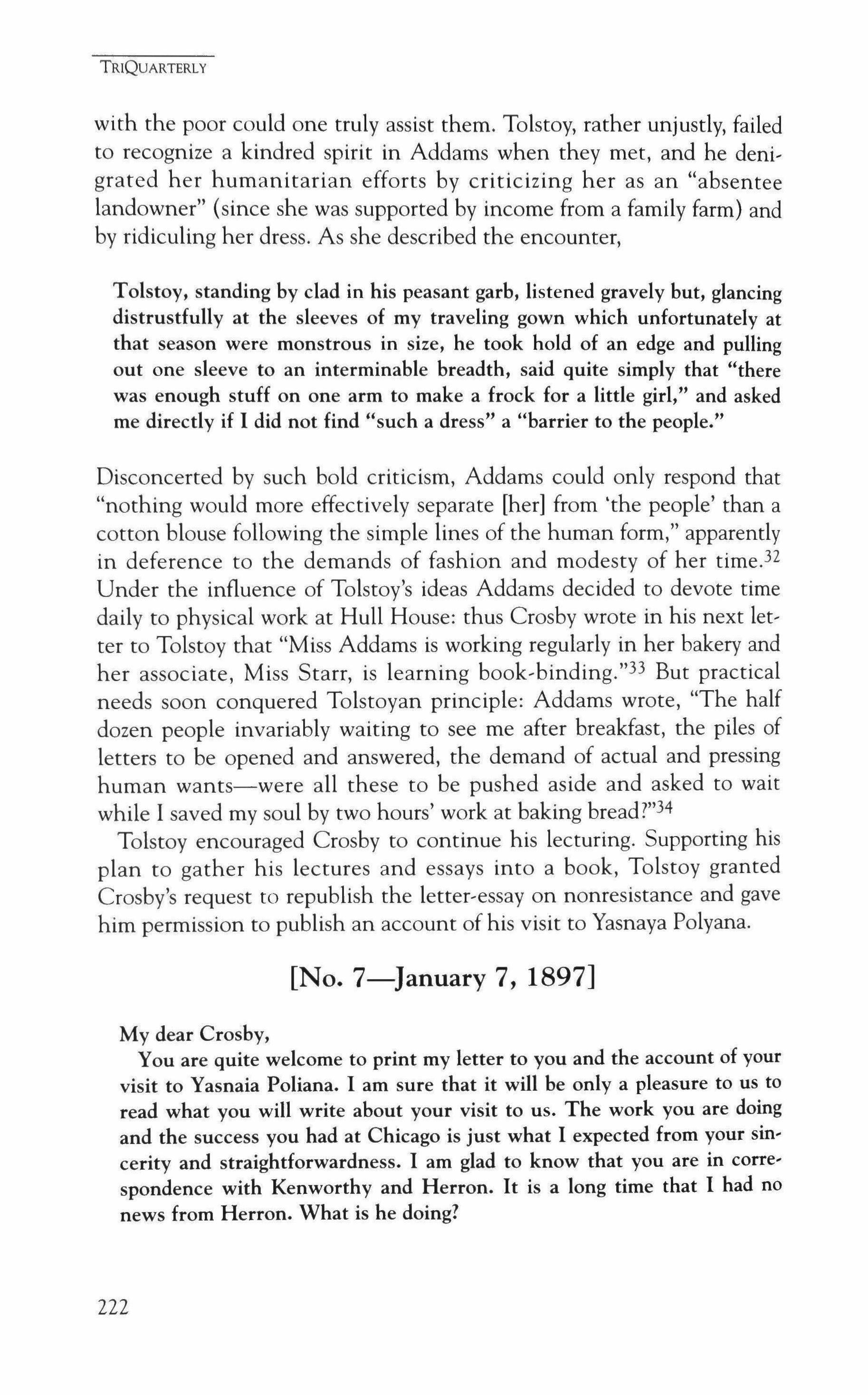
My dear Crosby,
You are quite welcome to print my letter to you and the account of your visit to Yasnaia Poliana. I am sure that it will be only a pleasure to us to read what you will write about your visit to us. The work you are doing and the success you had at Chicago is just what I expected from your sincerity and straightforwardness. I am glad to know that you are in correspondence with Kenworthy and Herron. It is a long time that I had no news from Herron. What is he doing?
TRIQUARTERLY
222
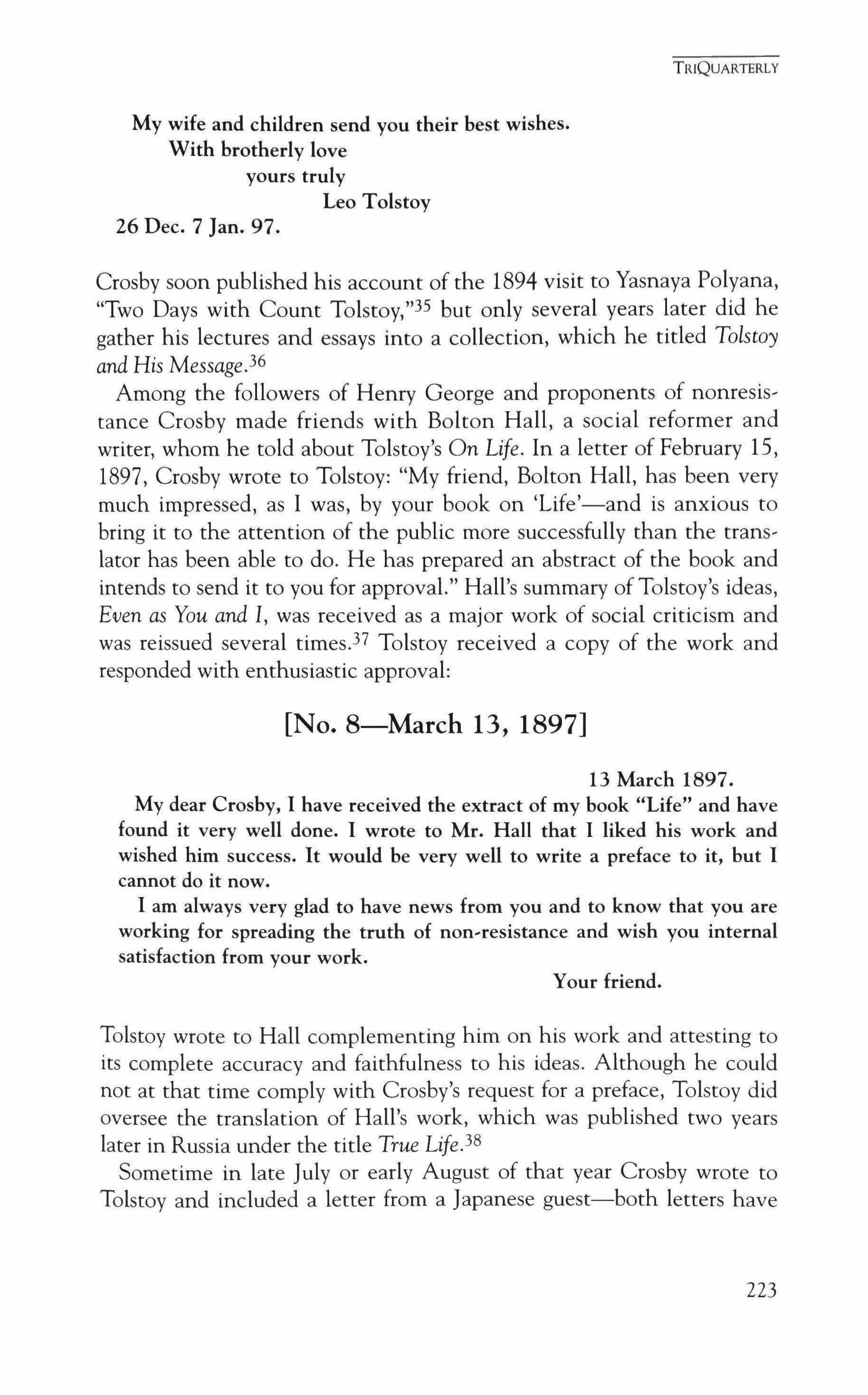
My wife and children send you their best wishes. With brotherly love yours truly Leo Tolstoy 26 Dec. 7 Jan. 97.
Crosby soon published his account of the 1894 visit to Yasnaya Polyana, "Two Days with Count Tolstoy,"35 but only several years later did he gather his lectures and essays into a collection, which he titled Tolstoy and His Message.36
Among the followers of Henry George and proponents of nonresistance Crosby made friends with Bolton Hall, a social reformer and writer, whom he told about Tolstoy's On Life. In a letter of February 15, 1897, Crosby wrote to Tolstoy: "My friend, Bolton Hall, has been very much impressed, as I was, by your book on 'Life'-and is anxious to bring it to the attention of the public more successfully than the translator has been able to do. He has prepared an abstract of the book and intends to send it to you for approval." Hall's summary of Tolstoy's ideas, Even as You and J, was received as a major work of social criticism and was reissued several times.I? Tolstoy received a copy of the work and responded with enthusiastic approval:
[No.8-March 13, 1897]
13 March 1897.
My dear Crosby, I have received the extract of my book "Life" and have found it very well done. I wrote to Mr. Hall that I liked his work and wished him success. It would be very well to write a preface to it, but I cannot do it now.
I am always very glad to have news from you and to know that you are working for spreading the truth of non-resistance and wish you internal satisfaction from your work.
Your friend.
Tolstoy wrote to Hall complementing him on his work and attesting to its complete accuracy and faithfulness to his ideas. Although he could not at that time comply with Crosby's request for a preface, Tolstoy did oversee the translation of Hall's work, which was published two years later in Russia under the title True Life.38
Sometime in late July or early August of that year Crosby wrote to Tolstoy and included a letter from a Japanese guest-both letters have 223
TRIQUARTERLY
been lost. From Tolstoy's account to Tchertkoff it appears that Crosby had introduced his guest to The Gospel in Brief, Tolstoy's translation and combination of the Biblical descriptions of Jesus' life into one account.I? This work "explained the meaning of life" to Crosby's guest, who was returning to Japan to establish settlements to apply these new convictions.40 With this letter Crosby also sent his series of articles on Tolstoy's philosophv+' and requested permission to dedicate a collection of his poems to him. Tolstoy received this letter on August 19 and responded immediately.
[No.9-August 21, 1897]
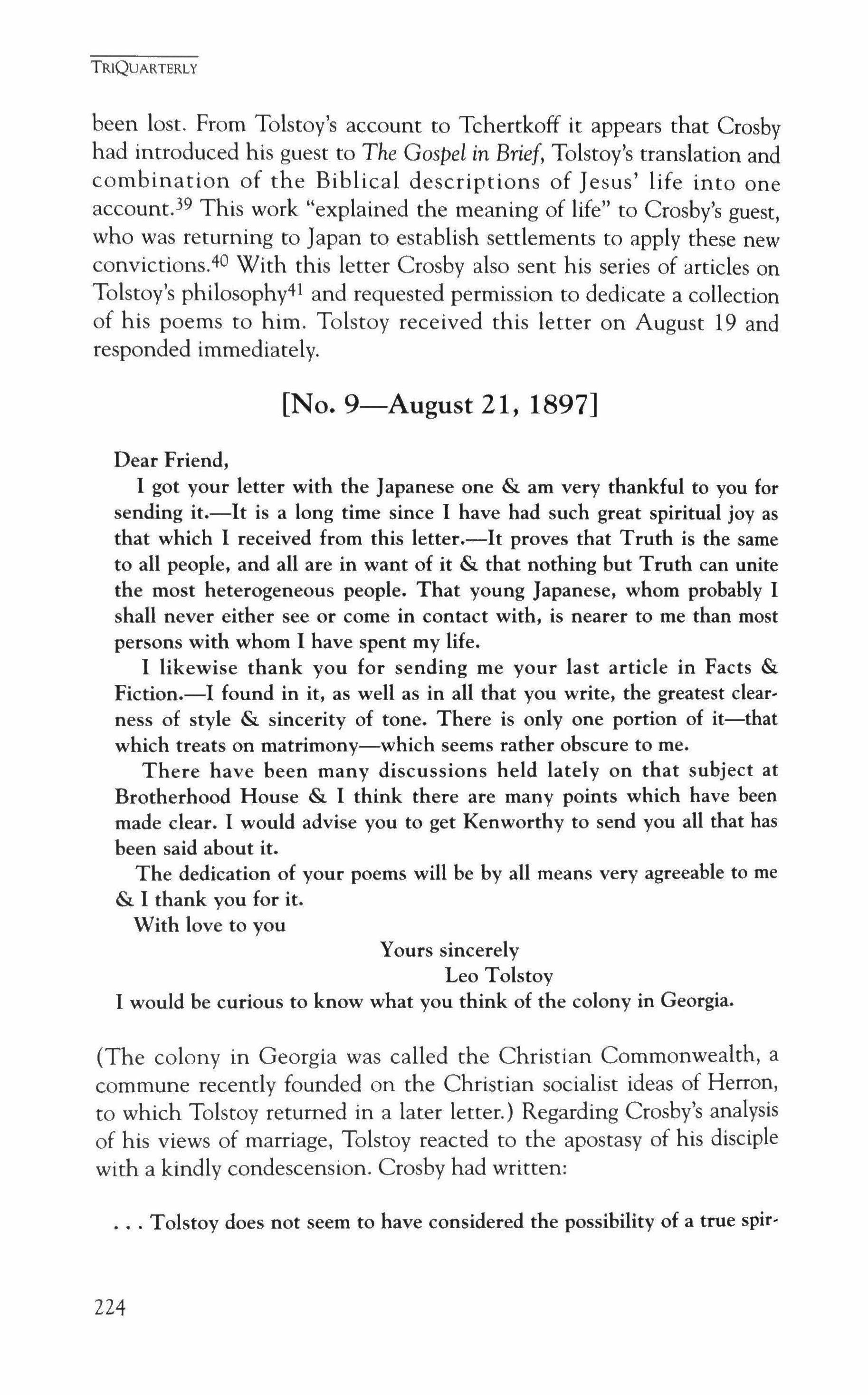
Dear Friend,
I got your letter with the Japanese one & am very thankful to you for sending it.-It is a long time since I have had such great spiritual joy as that which I received from this letter.-It proves that Truth is the same to all people, and all are in want of it & that nothing but Truth can unite the most heterogeneous people. That young Japanese, whom probably I shall never either see or come in contact with, is nearer to me than most persons with whom I have spent my life.
I likewise thank you for sending me your last article in Facts & Fiction.-I found in it, as well as in all that you write, the greatest clearness of style & sincerity of tone. There is only one portion of it-that which treats on matrimony-which seems rather obscure to me.
There have been many discussions held lately on that subject at Brotherhood House & I think there are many points which have been made clear. I would advise you to get Kenworthy to send you all that has been said about it.
The dedication of your poems will be by all means very agreeable to me & I thank you for it.
With love to you
Yours sincerely
Leo Tolstoy
I would be curious to know what you think of the colony in Georgia.
(The colony in Georgia was called the Christian Commonwealth, a commune recently founded on the Christian socialist ideas of Herron, to which Tolstoy returned in a later letter.) Regarding Crosby's analysis of his views of marriage, Tolstoy reacted to the apostasy of his disciple with a kindly condescension. Crosby had written:
Tolstoy does not seem to have considered the possibility of a true spir-
TRIQUARTERLY
224
itual marriage and of the effect it might produce in purifying physical relations. His views appear to be almost identical with those of Saint Paul. •.• We may reasonably infer that sex held a larger place in the thoughts of Jesus than Tolstoy allows.42
By suggesting that Crosby turn to Kenworthy and to Brotherhood House, the organization he founded in England to disseminate and apply Tolstoyan principles, Tolstoy gently offered his follower an opportunity to clarify just what he had meant, for example, in Kreutzer Sonata: absolute and total abstinence. For Tolstoy sexual relations could never be pure, any more than violence could be nonphysical. More the idealist, Crosby continued to hold that sexual love, like violence, could have nonmaterial, spiritual force, positive and creative in the case of love, destructive and negative in the case of violence.
It was perhaps most of all for their rule of celibacy that Tolstoy admired the Shakers, although he certainly sympathized deeply with their pacifism and other Christian principles derived from their Quaker origins. Early in November Crosby visited the Shaker community in Mount Lebanon, New York, where he had been invited to lecture on Henry George and the single tax. He described his visit in a letter written soon after, focusing in particular on Alonzo Hollister, with whom Tolstoy had corresponded in 1889-1891.43 The description elicited a wistful response not often seen in Tolstoy's purposeful and deliberate letters:
[No. lO-December 29, 1897]

Moscou
My Dear Crosby,
I thank you very much for your kind and interesting letter. I like very much the Shakers. I thought always that if not complete chastity, the tendency to a pure life is a sure sign of sincere earnest morality, and therefore I have always found in the Shakers a earnestness in moral matters which is so often wanting in other religious writings. That many of them don't so much care for their dogmas as they care for their life, and also that they abandon their dances and especially the spiritualistic seances, are very good news. How I would like to live with them.
Your article about your visit is very good and can only be agreeable to all of us. The death of George was a loss of a near friend to me. I hope that his ideas will spread more after his death. That these ideas are not generally acknowledged is always a puzzle to me. What are you doing now. With your earnestness, cleverness, and activi-
TRIQUARTERLY
225

ty I am sure something that is good. Yours truly Leo Tolstoy 29 Dec. 1897.
Tolstoy had received from Crosby his article describing their meeting in 1894 and news of the death of Henry George on October 28. Tolstoy had already learned of his death from the Russian press, and wrote in a letter to the Countess Tolstoy, "However strange it may be to say so, this death struck me like the death of a very close friend."44
The next letters from Crosby and events of 1898 and 1899 led Tolstoy to write more of politics and matters of conscience. The questions of nonresistance and government and of whether a Christian can also be a politician came to a focus in the example of Samuel Milton Jones, the Mayor of Toledo, who was known as "Golden Rule Jones." First as an owner of a factory in Toledo, then as the city's elected leader, Samuel Jones practiced the principle of "do unto others as you would have them do unto you" as well as Christ's teaching of nonviolent resistance.45 In his factory these practices produced not only a contented work force (in a time of violent labor conflicts), but also considerable profits. Crosby had received a letter from Jones, which he passed on to Tolstoy with his letter of March 19, 1898, where he explained:
It seems from his letter that Moody, the great evangelist, has just been there and stirred up the people to insist on enforcing the law which requires saloons, i.e. drinking-places, to be closed on Sunday. Mr. Jones, as head of the police, does not believe in co-ercion, and you can see what a quandary he is in. He is one of the best of men, and very widely known, and has even been mentioned as a candidate for President. If you could possibly find time to write him a letter on the subject of promoting temperance by force, and the false position of a Christian at the head of the police, I do not think you could spend a better hour or two. It would influence a man who is sure to have much to say in the future, and, if you asked him to publish the letter, would attract general attention to the doctrine of non-resistance.
Tolstoy did not write to Jones immediately (they exchanged letters several months later, when Jones wrote Tolstoy and sent some of his publications),46 but he provided Crosby with a lengthy commentary on the difficult ethical position of the Christian in politics. As with his compromise on the question of a government levied single tax, Tolstoy's
TRIQUARTERLY
226

advice here displayed a surprisingly passive position. Rather than advocate that the true Christian in a political office should actively apply his principles in order to change the operation of the office, or even that he renounce his position and withdraw on principle, Tolstoy suggested that he simply wait to be fired:
[No. II-April 23, 1898]
My dear Crosby, I think that Mr. Jones has acted quite rightly in refusing to help in the coercion that was wanted for the general good. (Coercion and all kind of violence is always wanted for the general good.) To say that he acted rightly is not the adequate expression. I think he acted as he did because he could not act otherwise. To use coercion for a true Christian is like a physical impossibility. And this impossibility is determining the position that such a man can occupy in society. Therefore I think that for a Christian it is not necessary to renounce the position that he occupies for the reason of nonconformity of his position with his faith, he must only act in his position-it may be of an Emperor, of a hangman, a president, a spy, a priest, a soldier, a judge-act in the position in which the Christian enlightenment found him, as his conscience bids him and the result will be just what it ought to be: he will be dismissed from the position that he occupied and will be the best thing for him. That is what I think about the difficulty Mr. Jones is in.
lt is a great joy for me to know that there are men like Mr. Jones professing the Christian doctrine not only in words but in deeds. Give him, please, my respect and love.
What a pitiful state of jingoistic hypnotisation is your people in now. It is dreadful but for me nothing unexpected and new. This terrible evil and superstition which is called a virtue and which is unhappily so strong in America-patriotism, could not produce anything else. They do not gather grapes from thorns And so patriotism produces only lies, violence, murder. The sole sorrow of myoId age is that I have not succeeded to communicate to my brothers the truth which I feel with the same evidence as I feel the light of the sun, that patriotism must lead to lies, violence, murder and the loss not only of material well being but to the greatest moral depravation. I am not yet discouraged and am now writing again on the same subject an article entitled "Carthago delenda est," I will speak and write on this theme till my last breath, because I think patriotism is one of the dreadfullest delusions and evils of the world.
Yours truly
Leo Tolstoy. 23 April 1898.
The protracted series of events leading up to the Spanish-American
TRIQUARTERLY
227
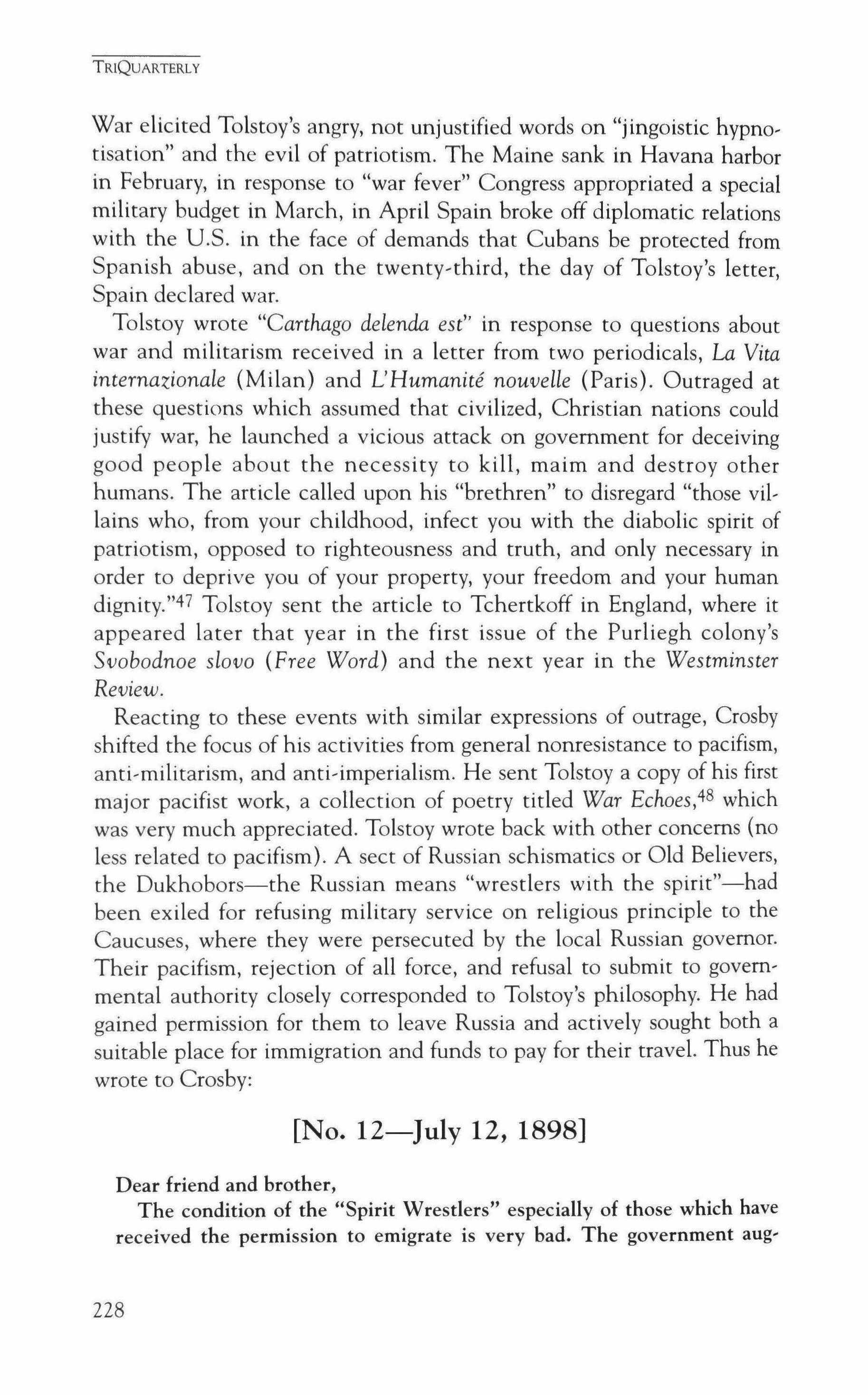
War elicited Tolstoy's angry, not unjustified words on "jingoistic hypnotisation" and the evil of patriotism. The Maine sank in Havana harbor in February, in response to "war fever" Congress appropriated a special military budget in March, in April Spain broke off diplomatic relations with the U.S. in the face of demands that Cubans be protected from Spanish abuse, and on the twenty-third, the day of Tolstoy's letter, Spain declared war.
Tolstoy wrote "Carthago delenda est" in response to questions about war and militarism received in a letter from two periodicals, La Vita internazionale (Milan) and L'Humanite nouvelle (Paris). Outraged at these questions which assumed that civilized, Christian nations could justify war, he launched a vicious attack on government for deceiving good people about the necessity to kill, maim and destroy other humans. The article called upon his "brethren" to disregard "those villains who, from your childhood, infect you with the diabolic spirit of patriotism, opposed to righteousness and truth, and only necessary in order to deprive you of your property, your freedom and your human dignity."47 Tolstoy sent the article to Tchertkoff in England, where it appeared later that year in the first issue of the Purliegh colony's Svobodnoe slovo (Free Word) and the next year in the Westminster Review.
Reacting to these events with similar expressions of outrage, Crosby shifted the focus of his activities from general nonresistance to pacifism, anti-militarism, and anti-imperialism. He sent Tolstoy a copy of his first major pacifist work, a collection of poetry titled War Echoes,48 which was very much appreciated. Tolstoy wrote back with other concerns (no less related to pacifism). A sect of Russian schismatics or Old Believers, the Dukhobors-the Russian means "wrestlers with the spirit"-had been exiled for refusing military service on religious principle to the Caucuses, where they were persecuted by the local Russian governor. Their pacifism, rejection of all force, and refusal to submit to governmental authority closely corresponded to Tolstoy's philosophy. He had gained permission for them to leave Russia and actively sought both a suitable place for immigration and funds to pay for their travel. Thus he wrote to Crosby:
[No. 12-July 12, 1898]
Dear friend and brother,
The condition of the "Spirit Wrestlers" especially of those which have received the permission to emigrate is very bad. The government aug-
TRIQUARTERLY
228
ments its pressure upon them. The governor of the Caucasus Golitzine has told them that if they remain true to their faith they will be kept in the same position i.e, be starved to death, and that if they give in, they will be restored to their former welfare. Many,-nearly 200 of them could not hold out and did recant from their faith, saying that they know it is wrong but they could not longer witness the sufferings of their families. But those which remain true are in a desperate condition. They are nearly 3000, but they have in all no more than 70000 roubles, which is not half enough for their emigration, especially because they must pay 10 r. per head for their passports. Our friend from the Christian Commonwealth has sent to me a proposition to settle them in Texas. I forwarded this letter to the English Committee for the emigration of the Douchoborys [sic], and this proposition pleased very much to the Douchoborys [sic] themselves.
Now what I ask of you is that you should inform us i.e. the committee in England (address Kenworthy or Tchertkoff) how much acres could they have in Texas at what price; 2) that you should inform us also at what price the ships could take the men for the passage and 3) to rise in America a subscription for an emigration fund for the Duochoborys [sic].-I have collected till now about 5000. They intend to publish about it in Russia. But I will nevertheless try to collect more by personal [appeals] to persons who can and will help.
If you will be so good to do what I ask you, please write about it to me and to Tchertkoff.
I admired very much your declaration about the war. Please excuse the negligence of my letter. I have been very ill for a month and [am] not still well.
With sincere love yours truly Leo Tolstoy.
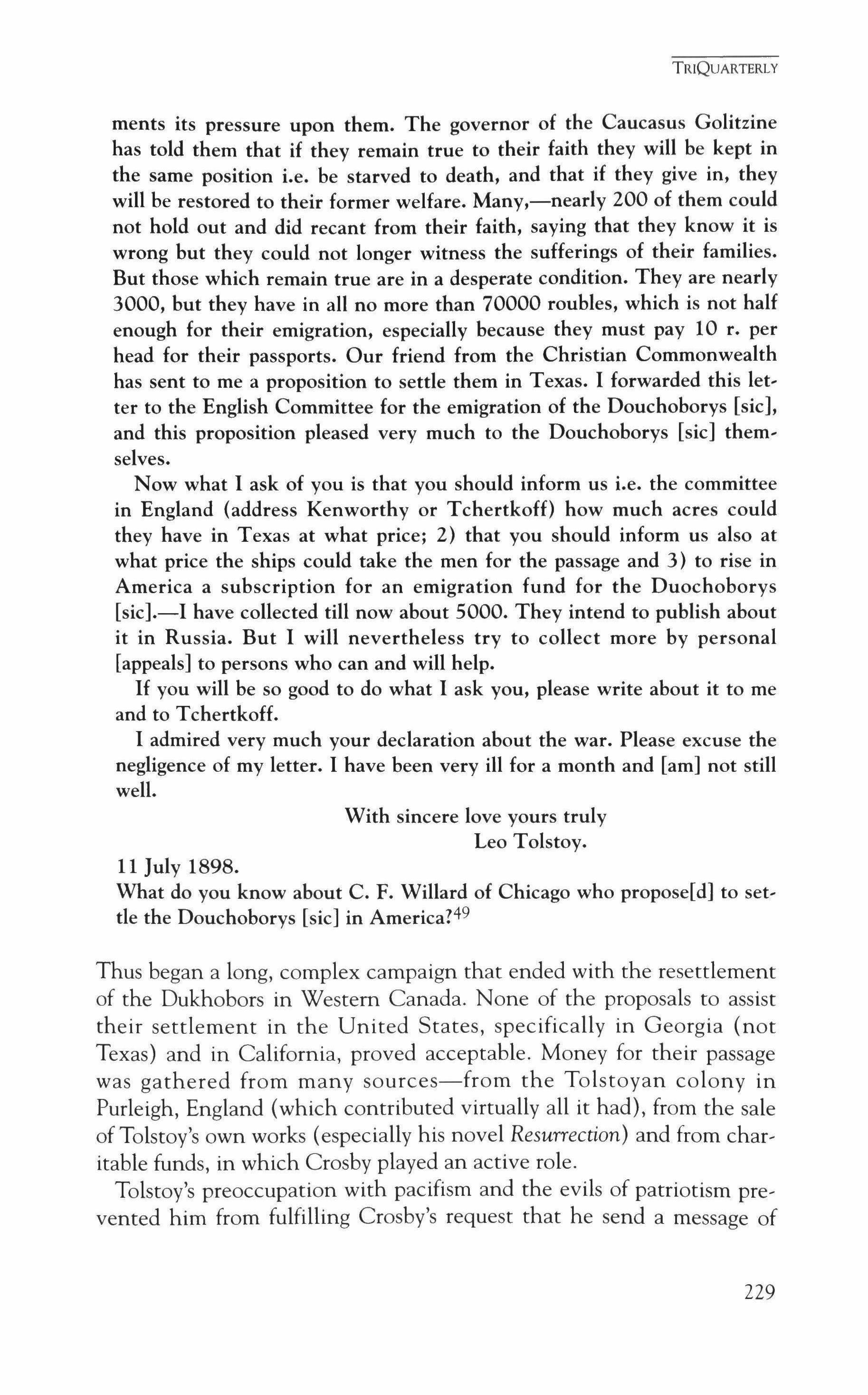
11 July 1898.
What do you know about C. F. Willard of Chicago who propose[d] to settle the Douchoborys [sic] in America?49
Thus began a long, complex campaign that ended with the resettlement of the Dukhobors in Western Canada. None of the proposals to assist their settlement in the United States, specifically in Georgia (not Texas) and in California, proved acceptable. Money for their passage was gathered from many sources-from the Tolstoyan colony in Purleigh, England (which contributed virtually all it had), from the sale of Tolstoy's own works (especially his novel Resurrection) and from charitable funds, in which Crosby played an active role.
Tolstoy's preoccupation with pacifism and the evils of patriotism prevented him from fulfilling Crosby's request that he send a message of
TRIQUARTERLY
229
greeting to the New York celebration of his seventieth birthday. At this literary dinner held at the St. Dennis Hotel on September 8, Crosby had hoped to generate support for the Doukhobors, but had little success-at this event or subsequently. 50 Writing a few months later, Tolstoy apologized for not complying with Crosby's desires:
[No. I3-November 29, 1898]

Dear Crosby,
This letter will be given to you by my friend Volkenshtein, who is going to join his wife, a political martyr at Sachaline. Please excuse me for not answering your last letter. I did write a long answer but did not send it because it was intended for your dinner, and I could not refrain from expressing my opinion about the growing of American patriotism for which I am very very sorry, and I was afraid that this letter should be disagreeable to your friends, who are so well disposed to me. *
Yesterday I received the book "The soul of a people" and thank you very much for sending it to me. I read the first chapter and think it very good. I am reading the Social Gospel and like very much your articles in it. You are touching in them always the true keynote.
Wishing you to progress in the same direction, I am yours truly Leo Tolstoy
29 November 1898
* The idea of this letter is expressed in my article: The two wars, which must appear one of these days and your opinion of which I am anxious to know.
Crosby read Tolstoy's "Two Wars," and particularly admired his description of the un-Christian violence of the Spanish-American War and the Russian government's war on the Dukhobors.t! Fortunately Tolstoy refrained from sending a letter with such sympathies, which would not have been appreciated by a number of the more prominent guests at the birthday dinner, among them General Steward L. Woodford, former U.S. Ambassador to Spain.
Tolstoy took every opportunity to encourage his American disciple in his lecturing and writing. With time Tolstoy developed a sympathetic appreciation of Crosby's writings, approving his religious views in particular. Crosby often sent Tolstoy books and pamphlets by American religious writers he felt would please, which was often the case (as with Fielding's book noted above on the life of the Burmese people).52
TRIQUARTERLY
230

Tolstoy followed the Social Gospel, published by the Christian Commonwealth, and generally approved of the monthly's articles (perhaps he was responding above to Crosby's piece on Tolstoy's seventieth birthday), but despite energetic urgings by its editor, George Gibson, he never contributed anything himself.53
Tolstoy's next letter was occasioned by Crosby's questions of January 23, 1899, on the truth of several news accounts: "We hear all kinds of rumors about you, first, that you are to be exiled, which I did not believe, and then that you had seen the Tsar, which I hope is true, but have my doubts of."54
[No. 14-February 27, 1899]
My dear Crosby,
I am very glad that you liked Volkenstein and thank you for his reception.
My son Sergius, who is now in Canada with the Douchobory [sic], will call on you on his way back and I hope that you will like him also. Both rumors that you heard about me are false and now after my letter on the peace conferences published in the Daily Chronicle, the first rumor is more probable than the second.
I read with great interest your article about Schmitt and his predecessor and thank you for sending it to me. I am very glad to be informed on your doings, especially because I always approve of them.
Your friend
Leo Tolstoy
I think that the money that has been subscribed for the Douchobors [sic] must be sent to Mr. Creary, the immigration agent in Winnipeg.
Tolstoy wrote his "Letter on the Peace Conference" in response to a request from Swedish intellectuals asking his opinion about what should be discussed at the 1899 Hague Peace Conference (which was initiated by Czar Nicholas's invitation and manifesto of the previous year). Denouncing the idea of government supporting peace as an absurd contradiction, he described the czar's undertaking as "one of those hypocritical arrangements which aim not at peace, but, on the contrary, at hiding from men the one means of obtaining universal peace "55
The publication of Resurrection in the spring of that year (the proceeds were to go to the Dukhobors) had caused some controversy because of love scenes considered too explicit for American readers. Crosby attempted to smooth over the publication process, wrote two
TRIQUARTERLY
231
detailed letters, and received Tolstoy's unqualified support for his judgment:
[No. 15-June 24, 1899]
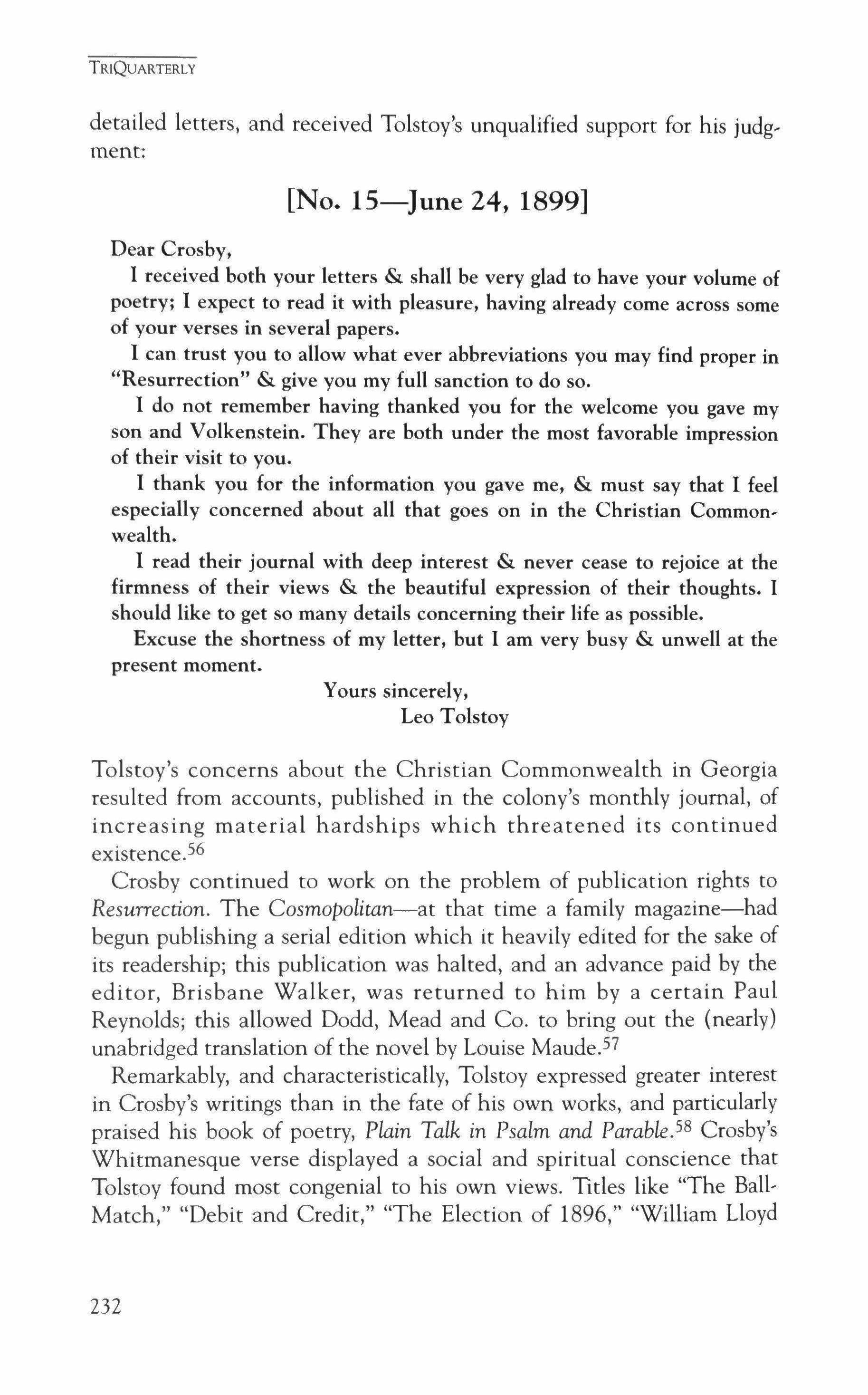
Dear Crosby,
I received both your letters & shall be very glad to have your volume of poetry; I expect to read it with pleasure, having already come across some of your verses in several papers.
I can trust you to allow what ever abbreviations you may find proper in "Resurrection" & give you my full sanction to do so.
I do not remember having thanked you for the welcome you gave my son and Volkenstein. They are both under the most favorable impression of their visit to you.
I thank you for the information you gave me, & must say that I feel especially concerned about all that goes on in the Christian Commonwealth.
I read their journal with deep interest & never cease to rejoice at the firmness of their views & the beautiful expression of their thoughts. I should like to get so many details concerning their life as possible.
Excuse the shortness of my letter, but I am very busy & unwell at the present moment.
Yours sincerely, Leo Tolstoy
Tolstoy's concerns about the Christian Commonwealth in Georgia resulted from accounts, published in the colony's monthly journal, of increasing material hardships which threatened its continued existence.56
Crosby continued to work on the problem of publication rights to Resurrection. The Cosmopolitan-at that time a family magazine-had begun publishing a serial edition which it heavily edited for the sake of its readership; this publication was halted, and an advance paid by the editor, Brisbane Walker, was returned to him by a certain Paul Reynolds; this allowed Dodd, Mead and Co. to bring out the (nearly) unabridged translation of the novel by Louise Maude.57 Remarkably, and characteristically, Tolstoy expressed greater interest in Crosby's writings than in the fate of his own works, and particularly praised his book of poetry, Plain Talk in Psalm and Parable.58 Crosby's Whitmanesque verse displayed a social and spiritual conscience that Tolstoy found most congenial to his own views. Titles like "The BallMatch," "Debit and Credit," "The Election of 1896," "William Lloyd
TRIQUARTERLY
232
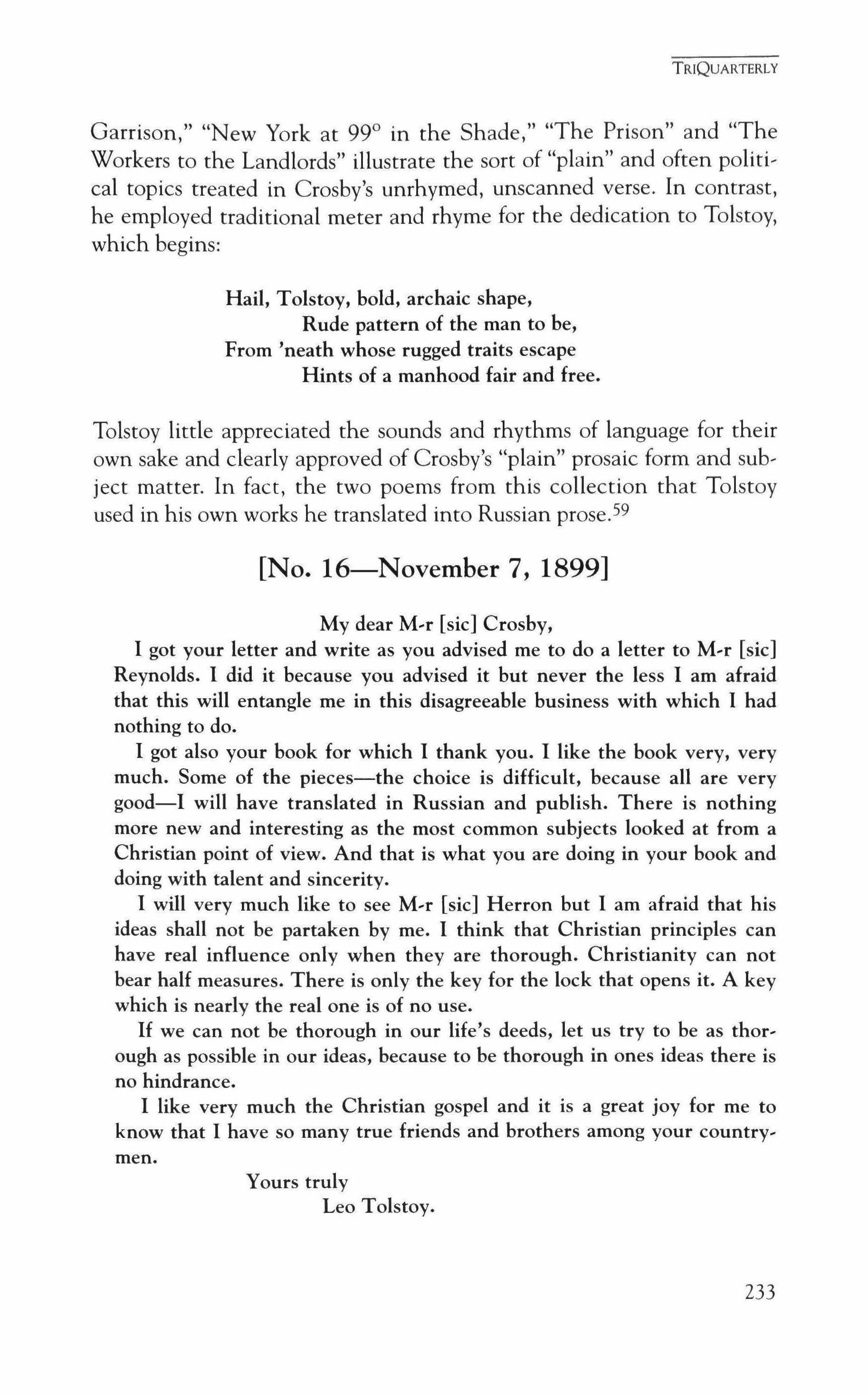
Garrison," "New York at 99° in the Shade," "The Prison" and "The Workers to the Landlords" illustrate the sort of "plain" and often political topics treated in Crosby's unrhymed, unscanned verse. In contrast, he employed traditional meter and rhyme for the dedication to Tolstoy, which begins:
Hail, Tolstoy, bold, archaic shape, Rude pattern of the man to be, From 'neath whose rugged traits escape Hints of a manhood fair and free.
Tolstoy little appreciated the sounds and rhythms of language for their own sake and clearly approved of Crosby's "plain" prosaic form and subject matter. In fact, the two poems from this collection that Tolstoy used in his own works he translated into Russian prosc.t?
[No. 16-November 7, 1899]
My dear M�r [sic] Crosby, I got your letter and write as you advised me to do a letter to M�r [sic] Reynolds. I did it because you advised it but never the less I am afraid that this will entangle me in this disagreeable business with which I had nothing to do.
I got also your book for which I thank you. I like the book very, very much. Some of the pieces-the choice is difficult, because all are very good-I will have translated in Russian and publish. There is nothing more new and interesting as the most common subjects looked at from a Christian point of view. And that is what you are doing in your book and doing with talent and sincerity.
I will very much like to see M�r [sic] Herron but I am afraid that his ideas shall not be partaken by me. I think that Christian principles can have real influence only when they are thorough. Christianity can not bear half measures. There is only the key for the lock that opens it. A key which is nearly the real one is of no use.
If we can not be thorough in our life's deeds, let us try to be as thorough as possible in our ideas, because to be thorough in ones ideas there is no hindrance.
I like very much the Christian gospel and it is a great joy for me to know that I have so many true friends and brothers among your countrymen.
Yours truly Leo Tolstoy.
TRIQUARTERLY
233
Tolstoy had lost the considerable interest he once had in Herron's Christian socialism largely because of the Herron's willingness to compromise-which resulted in unacceptable "half measures."60 Although founded on Herron's principles, the Georgian colony and its publication, Social Gospel (Tolstoy confused the title with the colony's name, Christian Commonwealth), found unqualified favor with him. Herron never did visit Tolstoy.
Greatly pleased with Tolstoy's reaction to his book, Crosby immediately wrote again, on November 21, to ask permission to cite these words of commendation in advertisements. Tolstoy responded with characteristic self-effacement:
[No. 17-December 6, 1899]
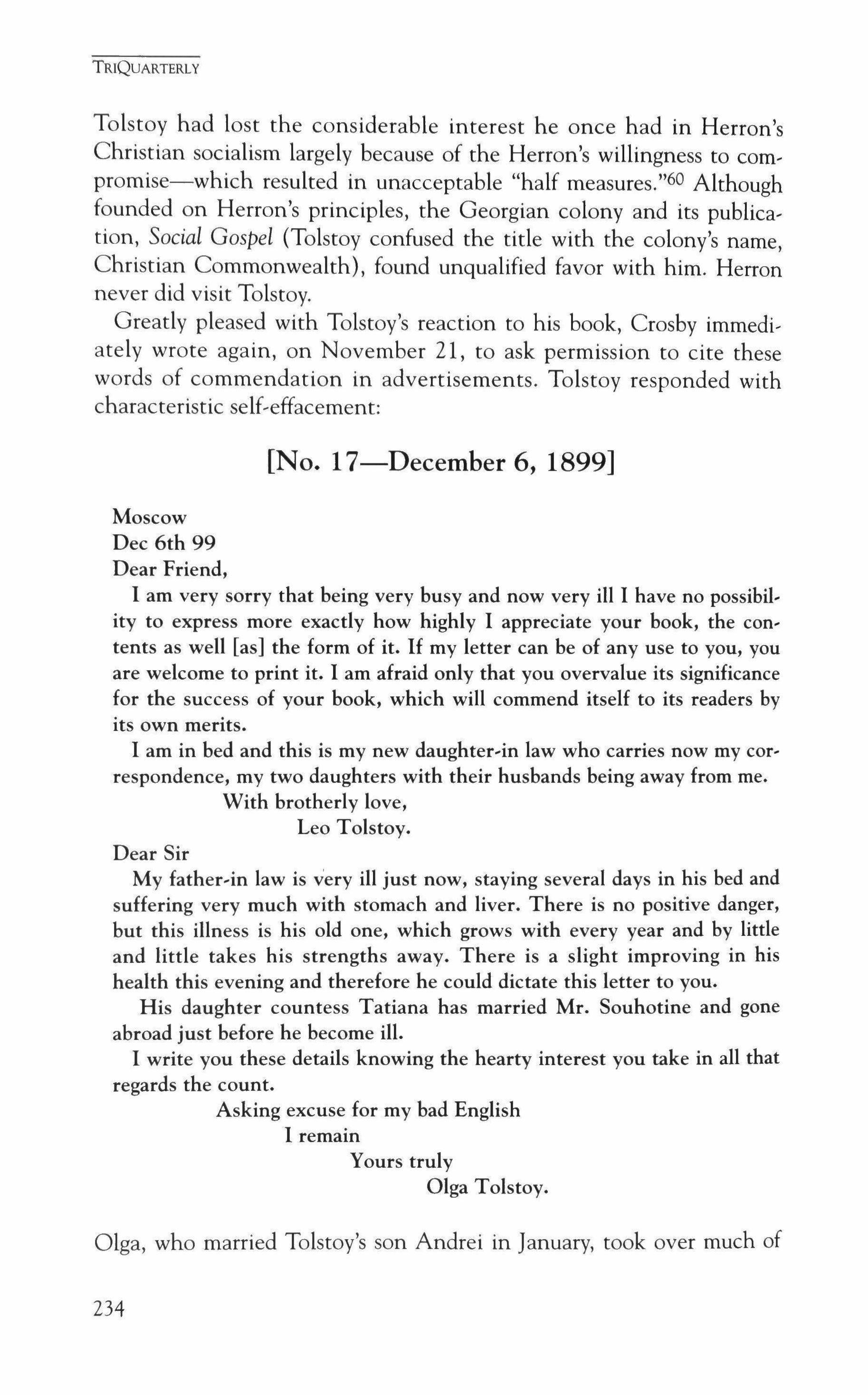
Moscow Dec 6th 99
Dear Friend,
I am very sorry that being very busy and now very ill I have no possibility to express more exactly how highly I appreciate your book, the contents as well [as] the form of it. If my letter can be of any use to you, you are welcome to print it. I am afraid only that you overvalue its significance for the success of your book, which will commend itself to its readers by its own merits.
I am in bed and this is my new daughter-in law who carries now my correspondence, my two daughters with their husbands being away from me. With brotherly love, Leo Tolstoy.
Dear Sir
My father-in law is very ill just now, staying several days in his bed and suffering very much with stomach and liver. There is no positive danger, but this illness is his old one, which grows with every year and by little and little takes his strengths away. There is a slight improving in his health this evening and therefore he could dictate this letter to you.
His daughter countess Tatiana has married Mr. Souhotine and gone abroad just before he become ill.
I write you these details knowing the hearty interest you take in all that regards the count.
Asking excuse for my bad English I remain
Yours truly Olga Tolstoy.
Olga, who married Tolstoy's son Andrei in January, took over much of
TRIQUARTERLY
234
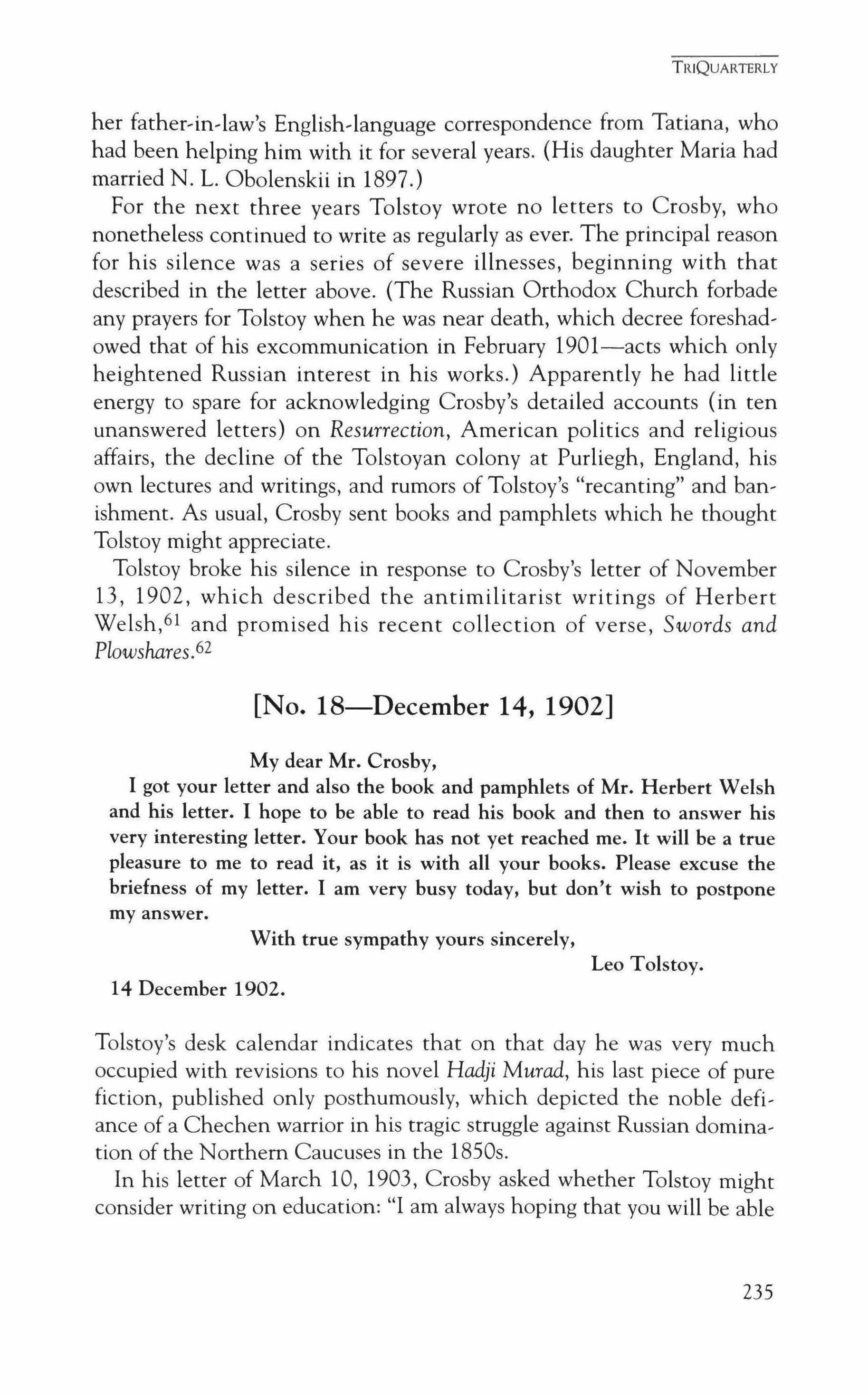
her father-in-law's English-language correspondence from Tatiana, who had been helping him with it for several years. (His daughter Maria had married N. L. Obolenskii in 1897.)
For the next three years Tolstoy wrote no letters to Crosby, who nonetheless continued to write as regularly as ever. The principal reason for his silence was a series of severe illnesses, beginning with that described in the letter above. (The Russian Orthodox Church forbade any prayers for Tolstoy when he was near death, which decree foreshadowed that of his excommunication in February 1901-acts which only heightened Russian interest in his works.) Apparently he had little energy to spare for acknowledging Crosby's detailed accounts (in ten unanswered letters) on Resurrection, American politics and religious affairs, the decline of the Tolstoyan colony at Purliegh, England, his own lectures and writings, and rumors of Tolstoy's "recanting" and banishment. As usual, Crosby sent books and pamphlets which he thought Tolstoy might appreciate.
Tolstoy broke his silence in response to Crosby's letter of November 13, 1902, which described the antimilitarist writings of Herbert Welsh,61 and promised his recent collection of verse, Swords and Plowshares.62
[No. 18-December 14, 1902]
My dear Mr. Crosby,
I got your letter and also the book and pamphlets of Mr. Herbert Welsh and his letter. I hope to be able to read his book and then to answer his very interesting letter. Your book has not yet reached me. It will be a true pleasure to me to read it, as it is with all your books. Please excuse the briefness of my letter. I am very busy today, but don't wish to postpone my answer.
With true sympathy yours sincerely, Leo Tolstoy. 14 December 1902.
Tolstoy's desk calendar indicates that on that day he was very much occupied with revisions to his novel Hadji Murad, his last piece of pure fiction, published only posthumously, which depicted the noble defiance of a Chechen warrior in his tragic struggle against Russian domination of the Northern Caucuses in the 1850s.
In his letter of March 10, 1903, Crosby asked whether Tolstoy might consider writing on education: "I am always hoping that you will be able
TRIQUARTERLY
235
to write a book on Education like the one on Art" (meaning "What Is Art?," the iconoclastic application of his moral philosophy to aesthetics written in 1897). Crosby often lectured on Tolstoy's theories of education and considered that with such a book, as he advised Tolstoy, "you could give a strong impulse to the advance of education in the right line, if you called attention to it."63
Tolstoy responded to Crosby's suggestion with great affection:
[No. 19-April3, 1903]
My dear Crosby, It is a real pleasure to me to see your handwriting because I like you personally and all what I hear of you and from you is always agreeable. From time to time I see articles from you or about you and am very glad to see that you are a very steady and strong coworker in the establishment of the Kingdom of God. I would like very much be able to write a book about education but I am sure I will not have time for it. Beside many other writings that I am working on I am very interested now at a philo, sophical and religious definition of life in which a tort ou a raison I believe that I can say something quite new and very important for our time.
Thank you for your letter; please do not cease to inform me from time to time of your work and yourself.
Your friend Leo Tolstoy 1903,3 April.
Since early February Tolstoy had been putting down in his diary thoughts for a "philosophical exposition of true life"; however, they never developed into a separate work. 64
In a brief note written May 17, Crosby introduced Mr. and Mrs. Robert Hunter, who visited Tolstoy at Yasnaya Polyana in July. Tolstoy found them particularly sympathetic for "their sincere religious striving to live a Godly life."65 Independently wealthy, Hunter had been work, ing with the poor of Chicago for several years, living three years at Hull House, before moving to New York in 1902, as head resident of the University Settlement House. In 1905 Hunter sent Tolstoy a copy of his study, Poverty, which the latter acknowledged with appreciation.s?
Tolstoy's response was likewise a letter of introduction, to which he added a note on his appreciation of Crosby's writings:
[No. 20-August 17, 1903]
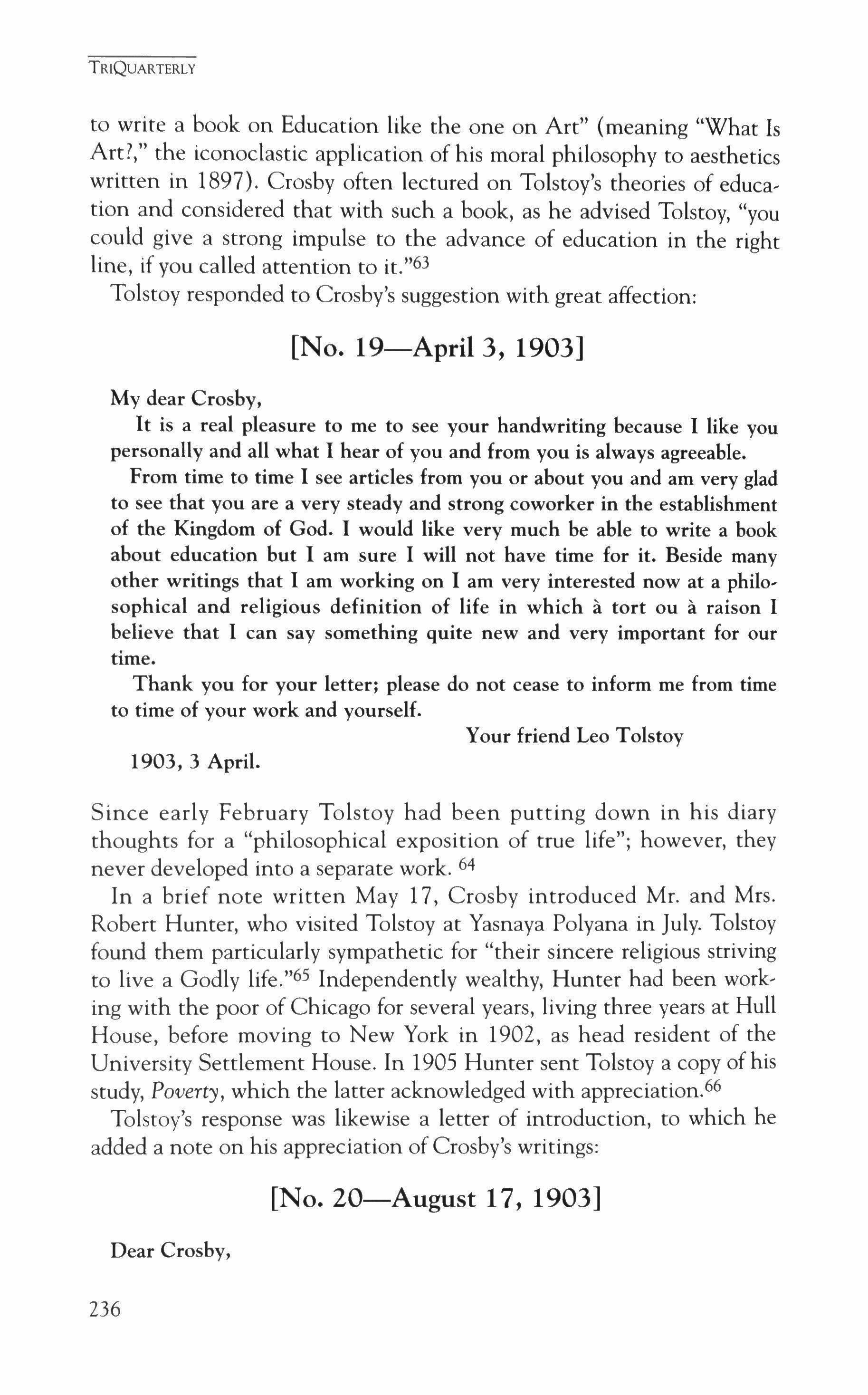
Dear Crosby,
TRIQUARTERLY
236
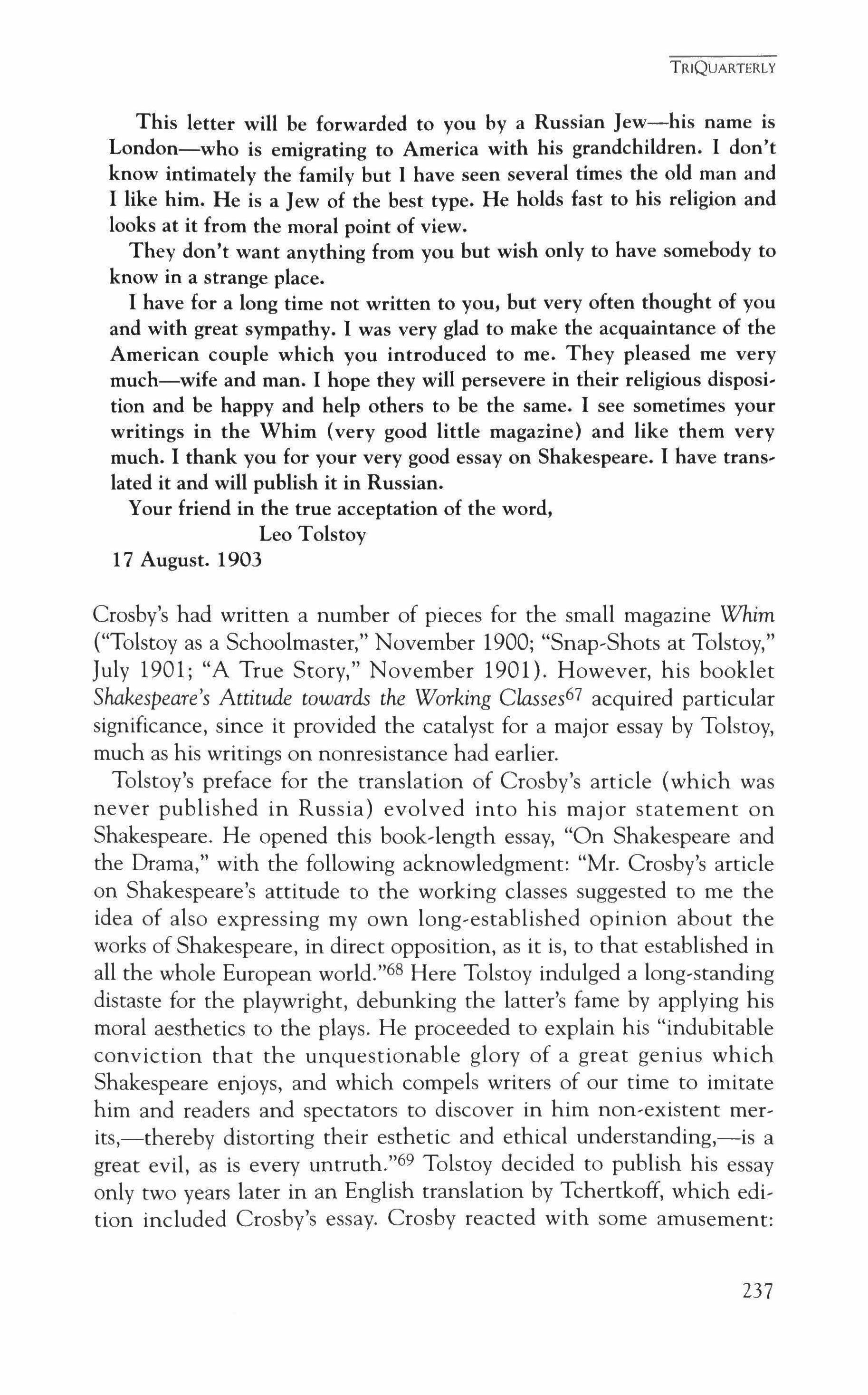
This letter will be forwarded to you by a Russian Jew-his name is London-who is emigrating to America with his grandchildren. I don't know intimately the family but I have seen several times the old man and I like him. He is a Jew of the best type. He holds fast to his religion and looks at it from the moral point of view.
They don't want anything from you but wish only to have somebody to know in a strange place.
I have for a long time not written to you, but very often thought of you and with great sympathy. I was very glad to make the acquaintance of the American couple which you introduced to me. They pleased me very much-wife and man. I hope they will persevere in their religious disposition and be happy and help others to be the same. I see sometimes your writings in the Whim (very good little magazine) and like them very much. I thank you for your very good essay on Shakespeare. I have trans' lated it and will publish it in Russian.
Your friend in the true acceptation of the word, Leo Tolstoy 17 August. 1903
Crosby's had written a number of pieces for the small magazine Whim ("Tolstoy as a Schoolmaster," November 1900; "Snap-Shots at Tolstoy," July 1901; "A True Story," November 1901). However, his booklet Shakespeare's Attitude towards the Working Classes67 acquired particular significance, since it provided the catalyst for a major essay by Tolstoy, much as his writings on nonresistance had earlier.
Tolstoy's preface for the translation of Crosby's article (which was never published in Russia) evolved into his major statement on Shakespeare. He opened this book-length essay, "On Shakespeare and the Drama," with the following acknowledgment: "Mr. Crosby's article on Shakespeare's attitude to the working classes suggested to me the idea of also expressing my own long-established opinion about the works of Shakespeare, in direct opposition, as it is, to that established in all the whole European world."68 Here Tolstoy indulged a long,standing distaste for the playwright, debunking the latter's fame by applying his moral aesthetics to the plays. He proceeded to explain his "indubitable conviction that the unquestionable glory of a great genius which Shakespeare enjoys, and which compels writers of our time to imitate him and readers and spectators to discover in him non'existent mer, its,-thereby distorting their esthetic and ethical understanding,-is a great evil, as is every untruth."69 Tolstoy decided to publish his essay only two years later in an English translation by Tchertkoff, which edition included Crosby's essay. Crosby reacted with some amusement:
TRIQUARTERLY
237
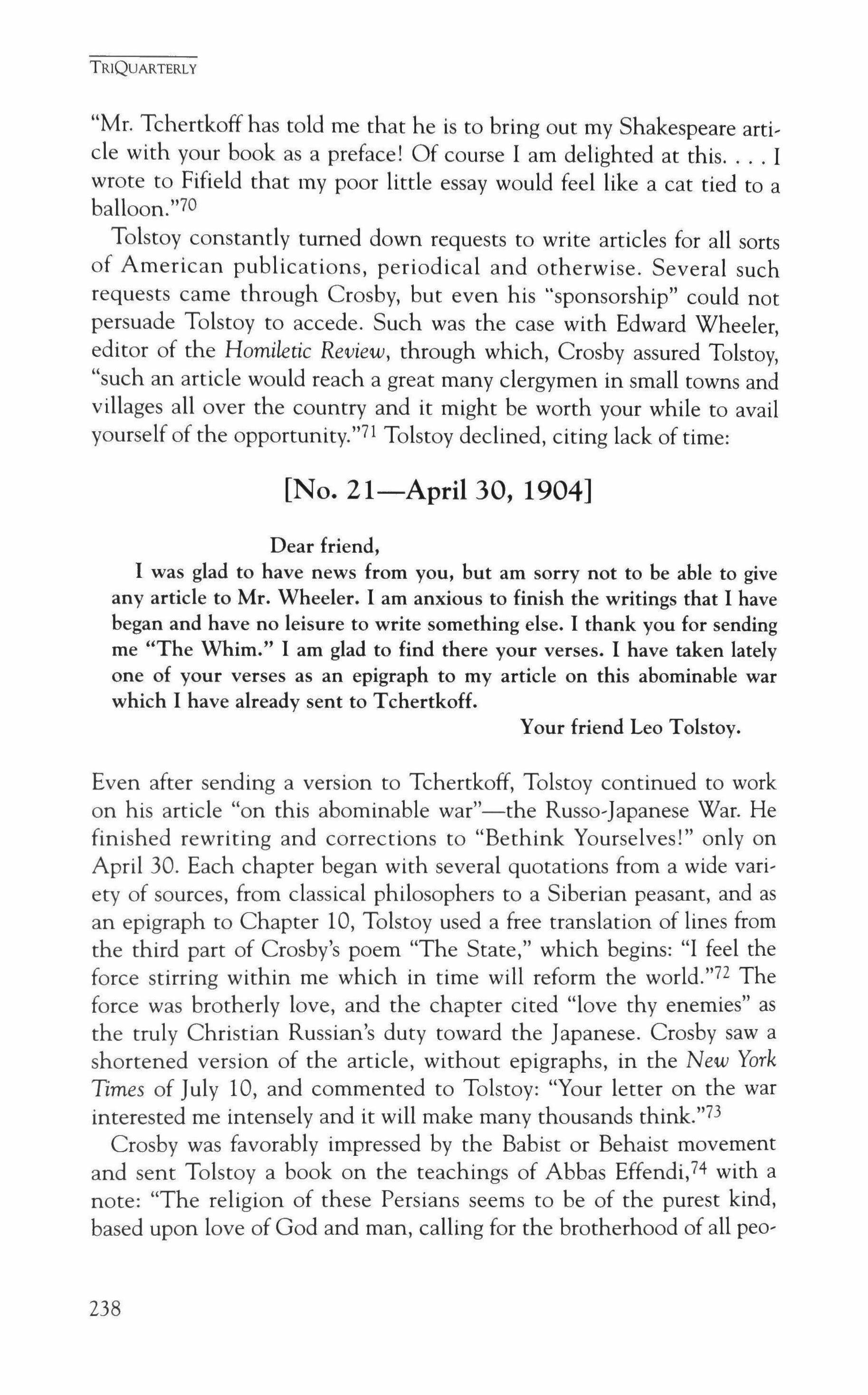
"Mr. Tchertkoff has told me that he is to bring out my Shakespeare article with your book as a preface! Of course I am delighted at this I wrote to Fifield that my poor little essay would feel like a cat tied to a balloon."70
Tolstoy constantly turned down requests to write articles for all sorts of American publications, periodical and otherwise. Several such requests came through Crosby, but even his "sponsorship" could not persuade Tolstoy to accede. Such was the case with Edward Wheeler, editor of the Homiletic Review, through which, Crosby assured Tolstoy, "such an article would reach a great many clergymen in small towns and villages all over the country and it might be worth your while to avail yourself of the opportunity."71 Tolstoy declined, citing lack of time:
[No. 21-April30, 1904]
Dear friend,
I was glad to have news from you, but am sorry not to be able to give any article to Mr. Wheeler. I am anxious to finish the writings that I have began and have no leisure to write something else. I thank you for sending me "The Whim." I am glad to find there your verses. I have taken lately one of your verses as an epigraph to my article on this abominable war which I have already sent to Tchertkoff.
Your friend Leo Tolstoy.
Even after sending a version to Tchertkoff, Tolstoy continued to work on his article "on this abominable war"-the Russo-japanese War. He finished rewriting and corrections to "Bethink Yourselves!" only on April 30. Each chapter began with several quotations from a wide variety of sources, from classical philosophers to a Siberian peasant, and as an epigraph to Chapter 10, Tolstoy used a free translation of lines from the third part of Crosby's poem "The State," which begins: "I feel the force stirring within me which in time will reform the world."n The force was brotherly love, and the chapter cited "love thy enemies" as the truly Christian Russian's duty toward the Japanese. Crosby saw a shortened version of the article, without epigraphs, in the New York Times of July 10, and commented to Tolstoy: "Your letter on the war interested me intensely and it will make many thousands think."73 Crosby was favorably impressed by the Babist or Behaist movement and sent Tolstoy a book on the teachings of Abbas Effendi,74 with a note: "The religion of these Persians seems to be of the purest kind, based upon love of God and man, calling for the brotherhood of all peo-
TRIQUARTERLY
238
pIes and condemning all strife and war." In the same letter of July 16, 1904, Crosby also informed Tolstoy of the recent death of Samuel "Golden Rule" Jones, whom he greatly admired: "His child-like faith in his fellow-men made him very popular with the poorer people and there was not a trace of hypocrisy in his make-up. He was a type of the man of the future." Tolstoy responded with equal affection:
[No. 22-August 25, 1904]
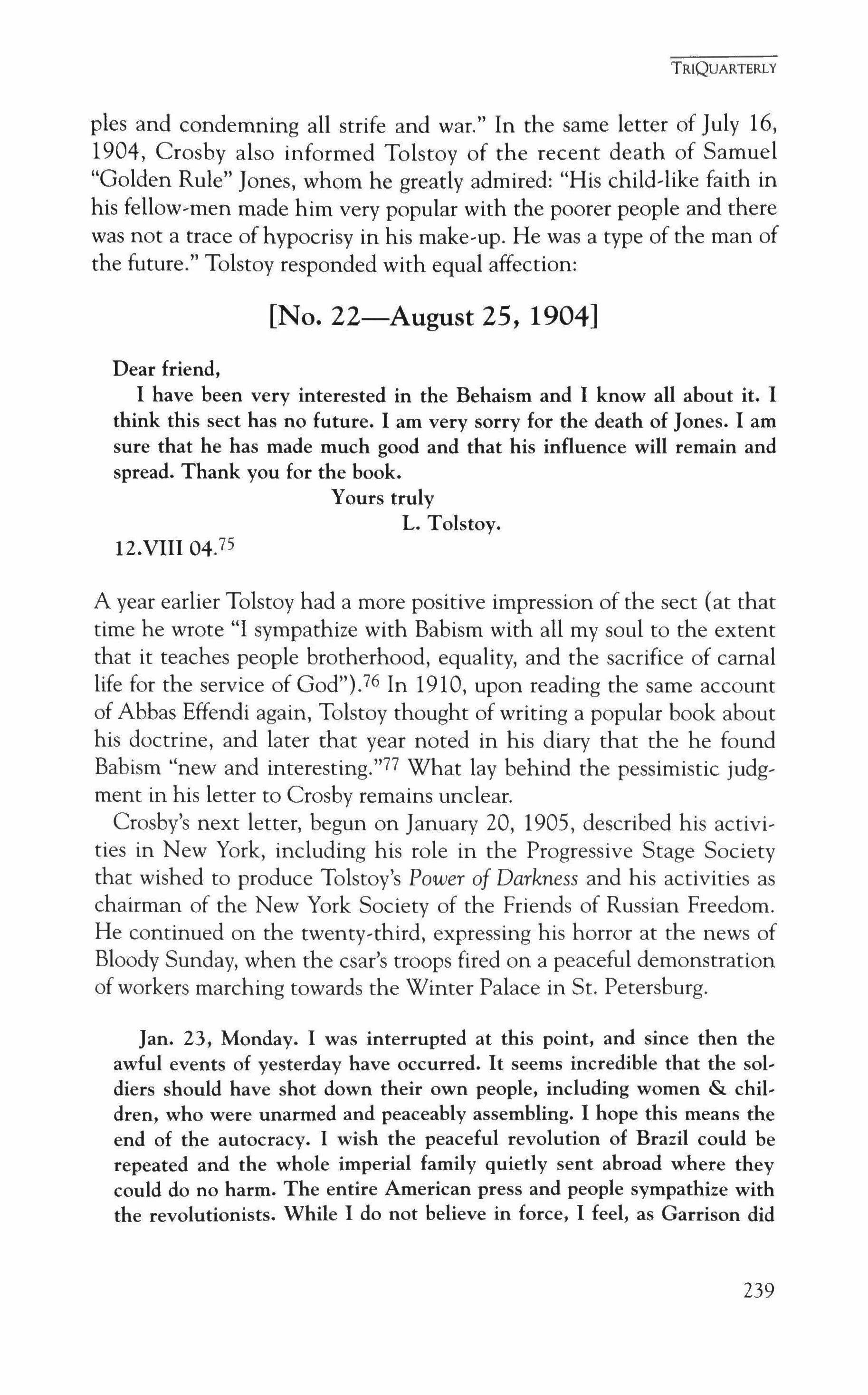
Dear friend,
I have been very interested in the Behaism and I know all about it. I think this sect has no future. I am very sorry for the death of Jones. I am sure that he has made much good and that his influence will remain and spread. Thank you for the book.
Yours truly L. Tolstoy.
12.VIII 04,75
A year earlier Tolstoy had a more positive impression of the sect {at that time he wrote "I sympathize with Babism with all my soul to the extent that it teaches people brotherhood, equality, and the sacrifice of carnal life for the service of God"),76 In 1910, upon reading the same account of Abbas Effendi again, Tolstoy thought of writing a popular book about his doctrine, and later that year noted in his diary that the he found Babism "new and interesting."77 What lay behind the pessimistic judgment in his letter to Crosby remains unclear.
Crosby's next letter, begun on January 20, 1905, described his activities in New York, including his role in the Progressive Stage Society that wished to produce Tolstoy's Power of Darkness and his activities as chairman of the New York Society of the Friends of Russian Freedom. He continued on the twenty-third, expressing his horror at the news of Bloody Sunday, when the csar's troops fired on a peaceful demonstration of workers marching towards the Winter Palace in St. Petersburg.
Jan. 23, Monday. I was interrupted at this point, and since then the awful events of yesterday have occurred. It seems incredible that the soldiers should have shot down their own people, including women & children, who were unarmed and peaceably assembling. I hope this means the end of the autocracy. I wish the peaceful revolution of Brazil could be repeated and the whole imperial family quietly sent abroad where they could do no harm. The entire American press and people sympathize with the revolutionists. While I do not believe in force, I feel, as Garrison did
TRIQUARTERLY
239
during our Civil War, that when those who do believe in force are fighting, it is better for the nobler side to win. I am sorry that this uprising has followed so closely the Japanese war & the assassination of Plehve,78 for people will think that war & assassination sometimes have good results, just as the Franco-Prussian War produced the French Republic.
I have been reading an excellent little book on nonresistance by Fay Mills,79 an American writer. I hope he has sent you a copy. In a quiet way these ideas are surely advancing.
I continue to write and lecture as opportunity offers, and next month I go to Chicago on a lecture-tour. Sowing the seed seems to be the only work possible. I do not wish you to answer this letter, but I like to communicate with you personally now and then.
Despite Crosby's wish that he not answer, Tolstoy wrote a brief note in response:
[No. 23-February 12, 1905]
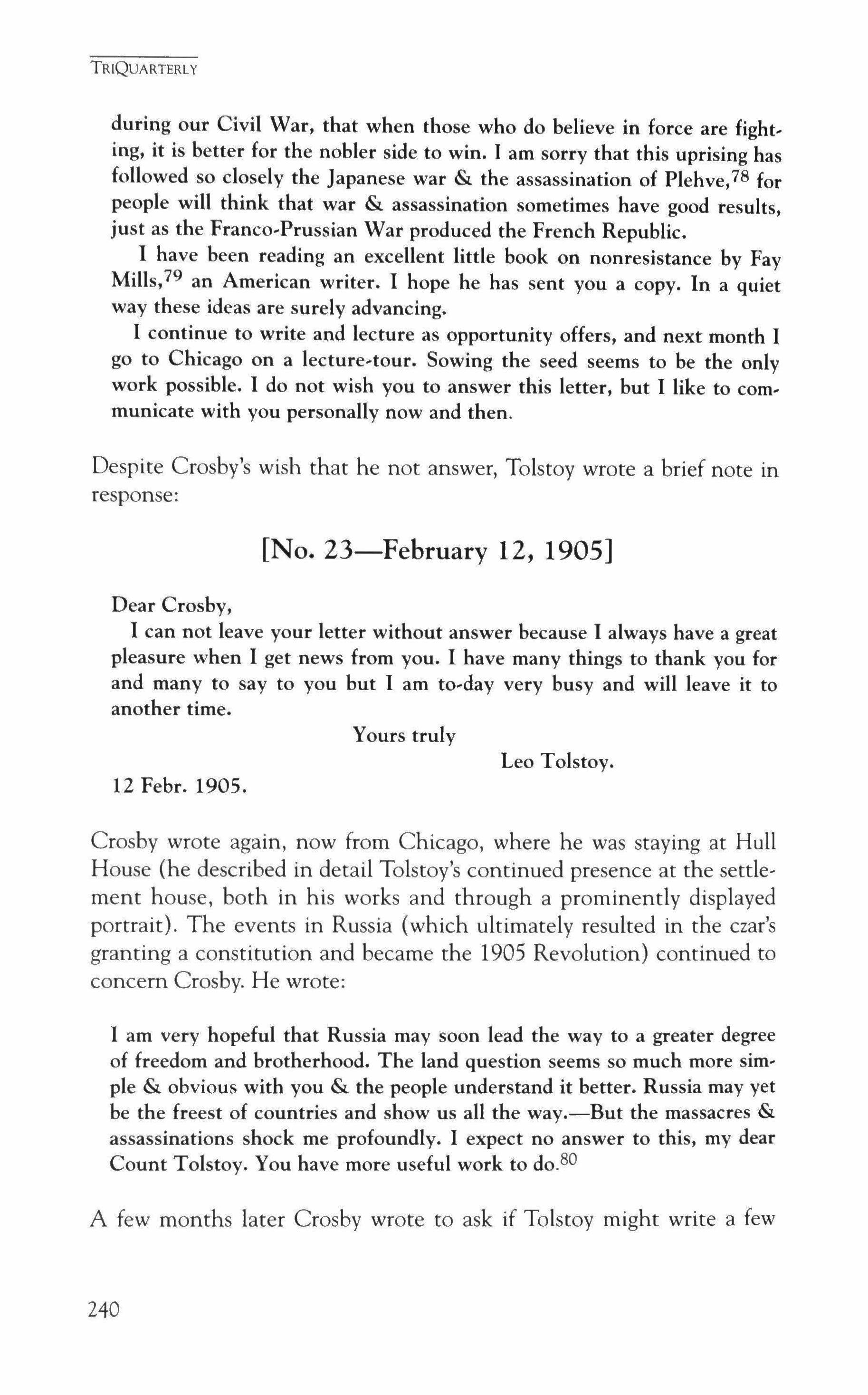
Dear Crosby,
I can not leave your letter without answer because I always have a great pleasure when I get news from you. I have many things to thank you for and many to say to you but I am to-day very busy and will leave it to another time.
Yours truly Leo Tolstoy. 12 Febr. 1905.
Crosby wrote again, now from Chicago, where he was staying at Hull House (he described in detail Tolstoy's continued presence at the settlement house, both in his works and through a prominently displayed portrait). The events in Russia (which ultimately resulted in the czar's granting a constitution and became the 1905 Revolution) continued to concern Crosby. He wrote:
I am very hopeful that Russia may soon lead the way to a greater degree of freedom and brotherhood. The land question seems so much more simple & obvious with you & the people understand it better. Russia may yet be the freest of countries and show us all the way.-But the massacres & assassinations shock me profoundly. I expect no answer to this, my dear Count Tolstoy. You have more useful work to do.80
A few months later Crosby wrote to ask if Tolstoy might write a few
TRIQUARTERLY
240
works of introduction to his article on Shakespeare, which Fifield, his English publisher, wished to bring out. He had no idea that Tolstoy had already written a lengthy essay apropos of his article, which fact lends his request an ironic twist: "You wrote to me very appreciatively of it and I have heard that you spoke well of it to others. A word of introduction from you would insure its wide circulation in England and we would like very much to have such a word-a few lines would be enough-or as long as you please."81 "As long" as Tolstoy "pleased" was some 120 pages in the edition published in 1906. He responded to Crosby's request:
[No. 24-July 19, 1905]

Dear Crosby,
I have written long ago a preface to your article on Shakespire [sic] which has grown into a whole book. I think that I will publish it when it is translated so that it will answer your wishes.
The crimes and cruelties which are committed in Russia are dreadful but I am firmly convinced that this revolution will have greater and more beneficent results for humanity than the great French revolution had.
Yours truly Leo Tolstoy
1905, 19 July
It has been argued that the results of the revolution, as it continued through 1917, had greater results than the French Revolution. The fact that Tolstoy believed that these results would be "more beneficent for humanity" explains, in part, why the leaders of the Russian Revolution, in particular Vladimir Lenin, respected Tolstoy and later acted to preserve his literary and intellectual legacy.
In lectures and articles Crosby pursued his twin causes of land reform and nonresistance, the single tax and pacifism, and he kept Tolstoy informed of his activities. The political upheavals in Russia tempted him to imagine a utopian outcome:
I understand that you expect Russia to lead the world in settling the land question. In several addresses last month I emphasized the same point. Other speakers would say that Russia must be as free as America, but I said no, that is not enough. Russia must go far beyond us and then we can follow. In Russia too the land question is far more obvious than in our industrial system here-and under your government it can be much more readily altered. I hope before long to find the way open to visit
TRIQUARTERLY
241

you without passport and to be received everywhere in Russia all the better because I am a radical & a revolutionist. Such a condition of things in Russia would tempt me to go there & enjoy it.82
An article by Tolstoy on the need to reform conditions for workers in Russia brought enthusiastic agreement from Crosby.83 He nourished a growing hope that the economic principles of Henry George would at last be realized in Russia, even before America. Crosby wrote in response to Tolstoy's article:
Your urgency in declaring the importance of knowing what reform to make first, is very necessary. How well George shows it. They are much excited here now on the subject of municipal ownership of street railways, gas works, etc., but if they get it, it will merely increase the rents. And your protest against turning your peasants into a proletariat is also sound, and I do not see how you can fail to persuade your fellow-citizens of it. As you say, in America the question looks a little different, though it is the same at bottom. In Russia it is an agricultural question, with us for the present it is largely an urban question.vl
Early in 1906 Crosby helped settle the curious case of a counterfeit article, "To the Czar and His Advisors," published in the Independent as written by Tolstoy, but which was not his at all.8s (A young journalist on the New York Times, Herman Bernstein, had received this article from a cousin in Russia, translated and published it, without suspecting that it was a forgery.) In the same letter of April 3, 1906, he asked whether Tolstoy had received his biography of Garrison, noted he was sending a copy of his book Tolstoy As Schoolmaster, in which he had collected his lectures on the school at Yasnaya Polyana in the 1860s, and described a recent visit to Hopewell, Massachusetts, the settlement founded by the nonresister Ballou.86 When first developing his own views on nonresistance, Tolstoy had discovered the writings of the Rev. Adin Ballou, which together with those of Garrison helped him formulate his own views. He had entered into an exchange of detailed letters with Ballou, disputing the true nature of Christian nonresistance (the latter felt Tolstoy's views "exceeded the limit of practical good sense"}.87 Crosby closed his letter by repeating his optimistic expectations for Russia:
I wish your Revolution would make haste and complete itself, for when all is settled-and Russia is much freer than America-I wish to come
TRIQUARTERLY
242
over and see you again & enjoy the change with you. I remember you called me a young man when I saw you in 1894. Now my hair & beard are quite gray and I am in my 50th year. But I expect always to feel young, as I am sure you do, for the last things you have written have more vigor than the writings of your youth.88
Tolstoy addressed these concerns at some length in what was to be his last letter to Crosby:
[No. 25-April25, 1906]
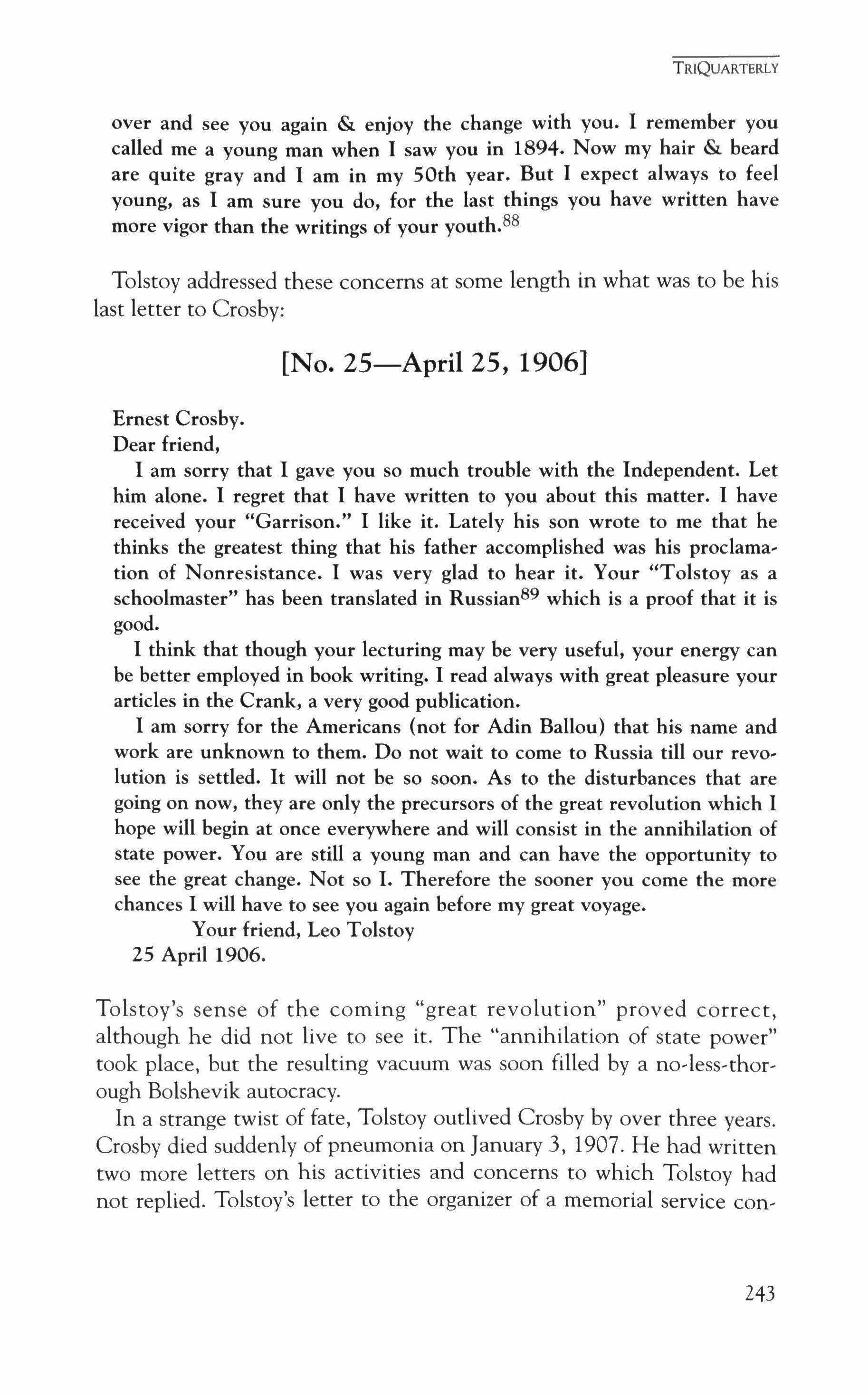
Ernest Crosby. Dear friend,
I am sorry that I gave you so much trouble with the Independent. Let him alone. I regret that I have written to you about this matter. I have received your "Garrison." I like it. Lately his son wrote to me that he thinks the greatest thing that his father accomplished was his proclamation of Nonresistance. I was very glad to hear it. Your "Tolstoy as a schoolmaster" has been translated in Russians? which is a proof that it is good.
I think that though your lecturing may be very useful, your energy can be better employed in book writing. I read always with great pleasure your articles in the Crank, a very good publication.
I am sorry for the Americans (not for Adin Ballou) that his name and work are unknown to them. Do not wait to come to Russia till our revolution is settled. It will not be so soon. As to the disturbances that are going on now, they are only the precursors of the great revolution which I hope will begin at once everywhere and will consist in the annihilation of state power. You are still a young man and can have the opportunity to see the great change. Not so I. Therefore the sooner you come the more chances I will have to see you again before my great voyage.
Your friend, Leo Tolstoy 25 April 1906.
Tolstoy's sense of the coming "great revolution" proved correct, although he did not live to see it. The "annihilation of state power" took place, but the resulting vacuum was soon filled by a no-less-thorough Bolshevik autocracy.
In a strange twist of fate, Tolstoy outlived Crosby by over three years. Crosby died suddenly of pneumonia on January 3, 1907. He had written two more letters on his activities and concerns to which Tolstoy had not replied. Tolstoy's letter to the organizer of a memorial service con243
TRIQUARTERLY

tains his eulogy to Crosby. He wrote to Lawrence Purdy:
Dear Sir,
The death of Ernest Crosby is a very great sorrow for me. I realized the strength of my inner spiritual connection with him only when I got the news of his death.
It is a great and very rare happiness to possess such a friend, of whom one can be sure that he understands you fully, and whose leading innermost force of life is quite the same as your own. And excepting his great intelligence, talent and high morality such a man was Ernest Crosby for me.
Yours truly Leo Tolstoy.
Toula. Yassnaya Polian
February 11 th 1907.
(Tolstoy's last sentence pushed self-effacement beyond the limits of English, which balks at "excepting" intelligence, talent and morality in a positive sense.) Tolstoy saw himself guided by the same force as Crosby-a striving to establish the Kingdom of God, as he wrote more than once, first within each person, then in the world. What bound the two men personally was mutual sympathy, true friendship, and a genuine appreciation for the thoughts, writings and activities of each other. In his lecturing, advocacy of civil and human rights for workers and immigrants, and in his poetry and essays, Crosby served his master well. In him Tolstoy had found a worthy disciple to teach the single tax and nonresistance to America.
Notes
1. "A Message to the American People," North American Review 172 (April 1901),503.
2. In a conversation recorded by D. Makovitskii in January 1905, Tolstoy described Emerson as the most profound of this "pleiade of religious-philosophical poets, writers" of the 1840s and 1850s, which included William E. Channing (the founder of Unitarianism), Parker, Garrison, Thoreau, Ballou, and later, Henry George. (Makovitskii, D. P. "Yasnopolianskie zapiski," vol. 1: 1904-05. Literatumoe nasledstvo, vol. 90, book 1, Moscow: Nauka, 1979, 143.)
3. Surprisingly little has been written about Crosby. See Perry E. Gianakos, "Ernest Howard Crosby: A Forgotten Tolstoyan Anti-Militarist and AntiImperialist," in Charles Chatfield, ed., Peace Movements in America (New York: Schocken Books, 1973), 1-17 (republished from American Studies, Kansas, vol.
TRIQUARTERLY
244
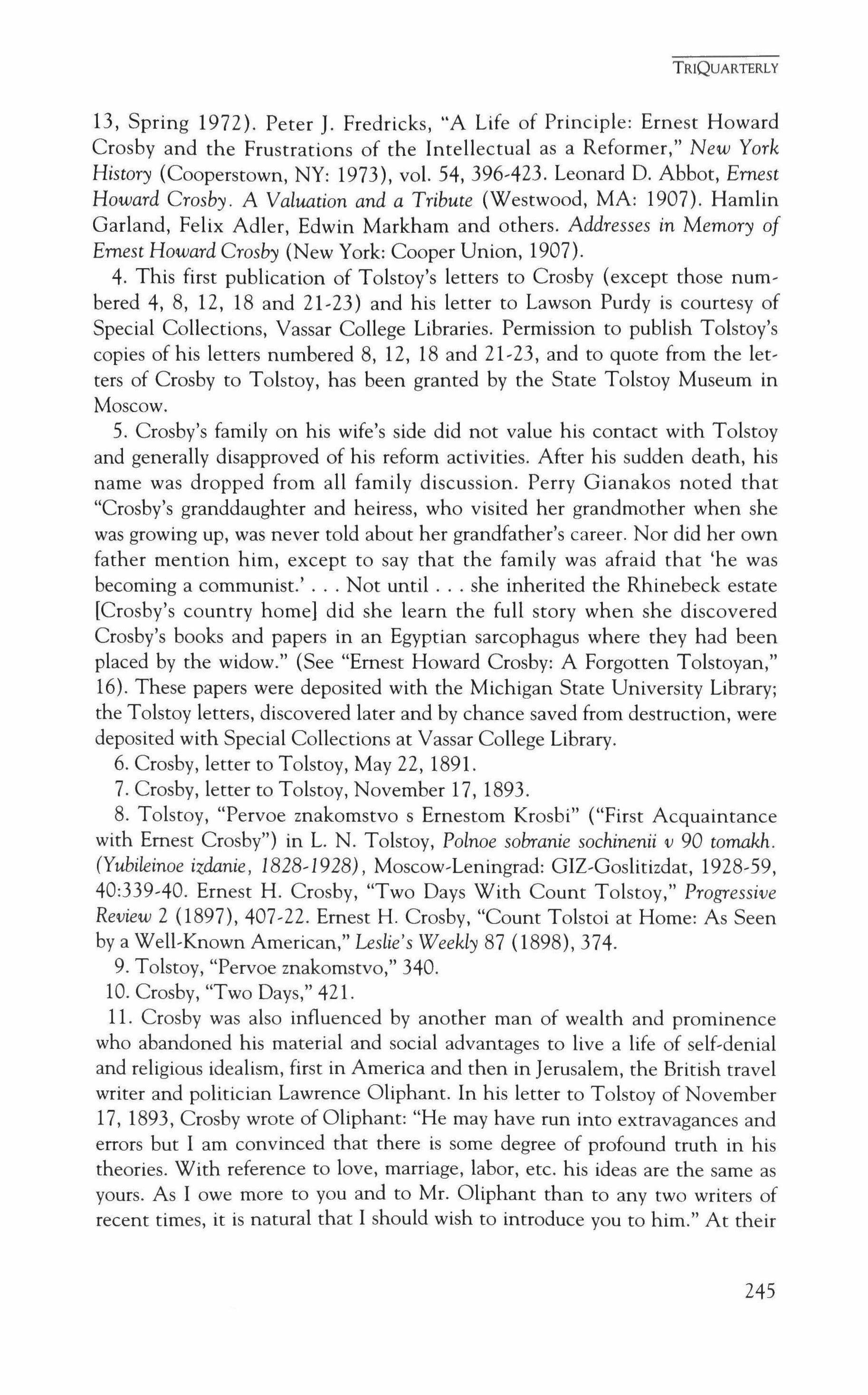
13, Spring 1972). Peter J. Fredricks, "A Life of Principle: Ernest Howard Crosby and the Frustrations of the Intellectual as a Reformer," New York History (Cooperstown, NY: 1973), vol. 54, 396-423. Leonard D. Abbot, Ernest Howard Crosby. A Valuation and a Tribute (Westwood, MA: 1907). Hamlin Garland, Felix Adler, Edwin Markham and others. Addresses in Memory of Ernest Howard Crosby (New York: Cooper Union, 1907).
4. This first publication of Tolstoy's letters to Crosby (except those numbered 4,8, 12, 18 and 21-23) and his letter to Lawson Purdy is courtesy of Special Collections, Vassar College Libraries. Permission to publish Tolstoy's copies of his letters numbered 8, 12, 18 and 21-23, and to quote from the letters of Crosby to Tolstoy, has been granted by the State Tolstoy Museum in Moscow.
5. Crosby's family on his wife's side did not value his contact with Tolstoy and generally disapproved of his reform activities. After his sudden death, his name was dropped from all family discussion. Perry Gianakos noted that "Crosby's granddaughter and heiress, who visited her grandmother when she was growing up, was never told about her grandfather's career. Nor did her own father mention him, except to say that the family was afraid that 'he was becoming a communist.' Not until she inherited the Rhinebeck estate [Crosby's country home] did she learn the full story when she discovered Crosby's books and papers in an Egyptian sarcophagus where they had been placed by the widow." (See "Ernest Howard Crosby: A Forgotten Tolstoyan," 16). These papers were deposited with the Michigan State University Library; the Tolstoy letters, discovered later and by chance saved from destruction, were deposited with Special Collections at Vassar College Library.
6. Crosby, letter to Tolstoy, May 22, 1891.
7. Crosby, letter to Tolstoy, November 17, 1893.
8. Tolstoy, "Pervoe znakomstvo s Ernestom Krosbi" ("First Acquaintance with Ernest Crosby") in L. N. Tolstoy, Polnoe sobranie sochinenii v 90 tomakh. (Yubileinoe izdanie, 1828-1928), Moscow-Leningrad: GIZ-Goslitizdat, 1928-59, 40:339-40. Ernest H. Crosby, "Two Days With Count Tolstoy," Progressive Review 2 (1897),407-22. Ernest H. Crosby, "Count Tolstoi at Home: As Seen by a Well-Known American," Leslie's Weekly 87 (1898),374.
9. Tolstoy, "Pervoe znakomstvo," 340.
10. Crosby, "Two Days," 421.
11. Crosby was also influenced by another man of wealth and prominence who abandoned his material and social advantages to live a life of self-denial and religious idealism, first in America and then in Jerusalem, the British travel writer and politician Lawrence Oliphant. In his letter to Tolstoy of November 17, 1893, Crosby wrote of Oliphant: "He may have run into extravagances and errors but I am convinced that there is some degree of profound truth in his theories. With reference to love, marriage, labor, etc. his ideas are the same as yours. As lowe more to you and to Mr. Oliphant than to any two writers of recent times, it is natural that I should wish to introduce you to him." At their
TRIQUARTERLY
245
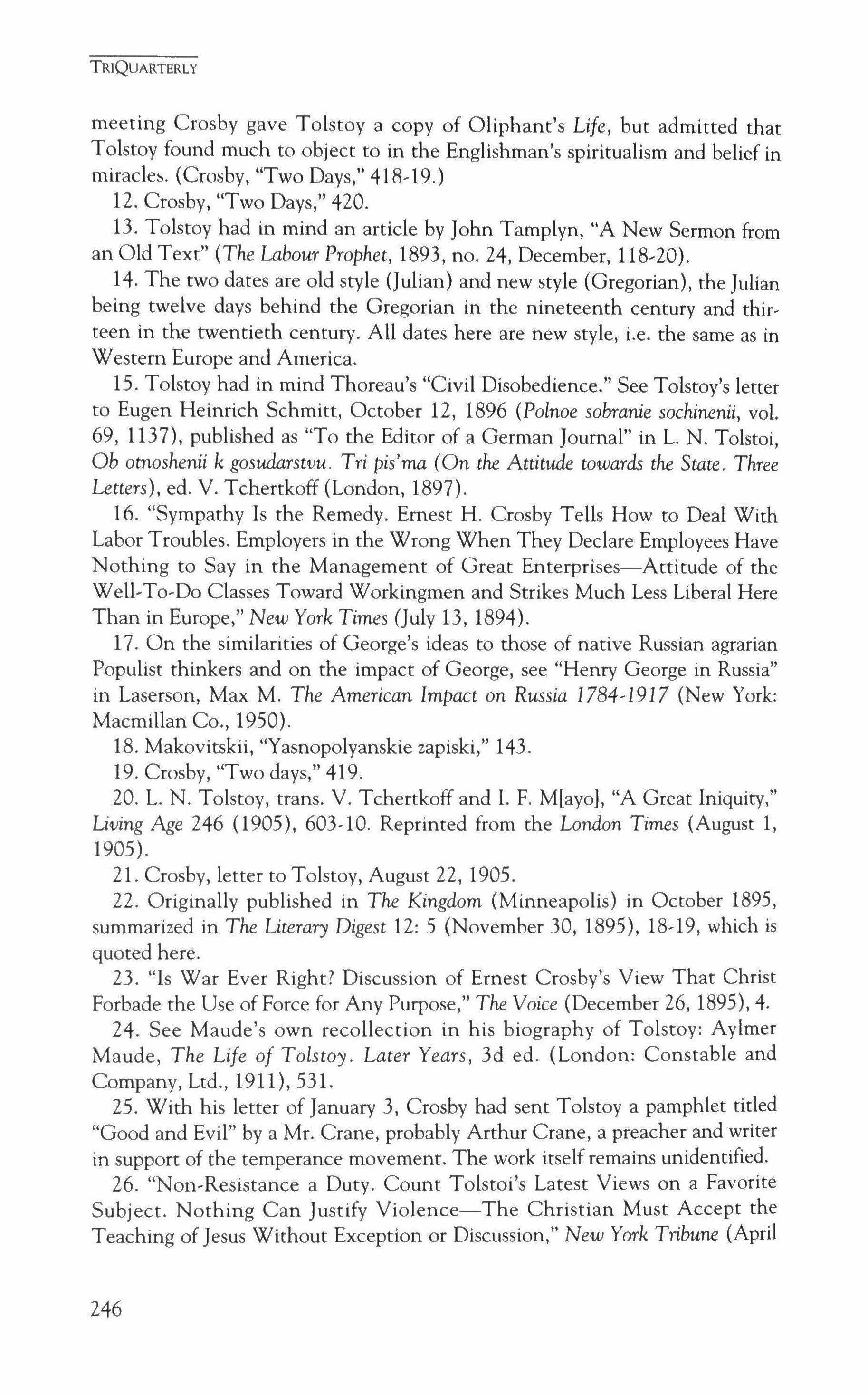
meeting Crosby gave Tolstoy a copy of Oliphant's Life, but admitted that Tolstoy found much to object to in the Englishman's spiritualism and belief in miracles. (Crosby, "Two Days," 418-19.)
12. Crosby, "Two Days," 420.
13. Tolstoy had in mind an article by John Tamplvn, "A New Sermon from an Old Text" (The Labour Prophet, 1893, no. 24, December, 118-20).
14. The two dates are old style (Julian) and new style (Gregorian), the Julian being twelve days behind the Gregorian in the nineteenth century and thirteen in the twentieth century. All dates here are new style, i.e. the same as in Western Europe and America.
15. Tolstoy had in mind Thoreau's "Civil Disobedience." See Tolstoy's letter to Eugen Heinrich Schmitt, October 12, 1896 (Polnoe sobranie sochinenii, vol. 69, 1137), published as "To the Editor of a German Journal" in L. N. Tolstoi, Ob otnoshenii k gosudarstvu. Tri pis'ma (On the Attitude towards the State. Three Letters), ed. V. Tchertkoff (London, 1897).
16. "Sympathy Is the Remedy. Ernest H. Crosby Tells How to Deal With Labor Troubles. Employers in the Wrong When They Declare Employees Have Nothing to Say in the Management of Great Enterprises-Attitude of the Well-To-Do Classes Toward Workingmen and Strikes Much Less Liberal Here Than in Europe," New York Times (July 13, 1894).
17. On the similarities of George's ideas to those of native Russian agrarian Populist thinkers and on the impact of George, see "Henry George in Russia" in Laserson, Max M. The American Impact on Russia 1784-1917 (New York: Macmillan Co., 1950).
18. Makovitskii, "Yasnopolyanskie zapiski," 143.
19. Crosby, "Two days," 419.
20. L. N. Tolstoy, trans. V. Tchertkoff and I. F. M[ayo), "A Great Iniquity," Living Age 246 (1905), 603-10. Reprinted from the London Times (August 1, 1905).
21. Crosby, letter to Tolstoy, August 22,1905.
22. Originally published in The Kingdom (Minneapolis) in October 1895, summarized in The Literary Digest 12: 5 (November 30, 1895), 18-19, which is quoted here.
23. "Is War Ever Right? Discussion of Ernest Crosby's View That Christ Forbade the Use of Force for Any Purpose," The Voice (December 26,1895),4.
24. See Maude's own recollection in his biography of Tolstoy: Aylmer Maude, The Life of Tolstoy. Later Years, 3d ed. (London: Constable and Company, Ltd., 1911),531.
25. With his letter of January 3, Crosby had sent Tolstoy a pamphlet titled "Good and Evil" by a Mr. Crane, probably Arthur Crane, a preacher and writer in support of the temperance movement. The work itself remains unidentified.
26. "Non-Resistance a Duty. Count Tolstoi's Latest Views on a Favorite Subject. Nothing Can Justify Violence-The Christian Must Accept the Teaching of Jesus Without Exception or Discussion," New York Tribune (April
TRIQUARTERLY
246
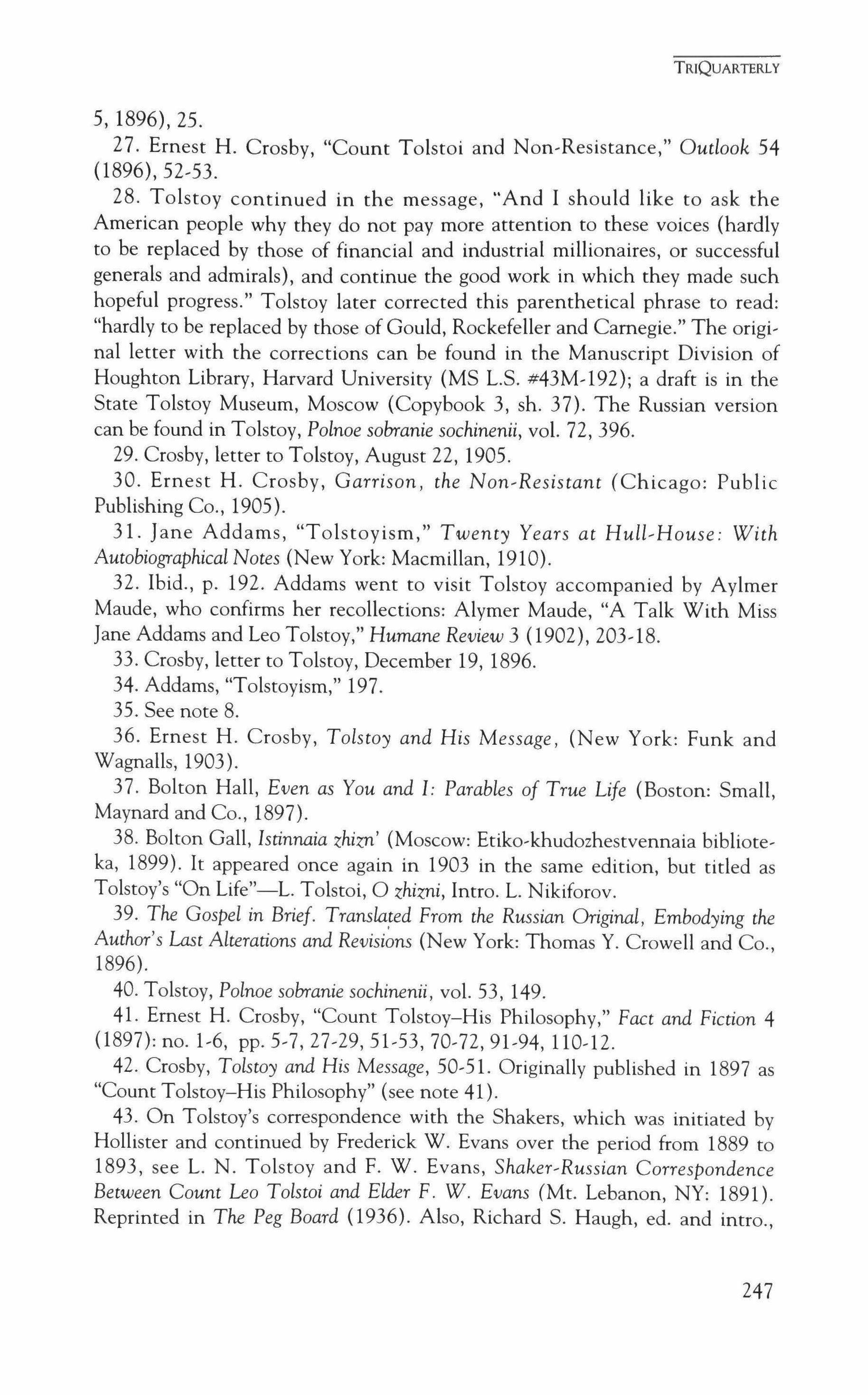
5, 1896), 25.
27. Ernest H. Crosby, "Count Tolstoi and Non-Resistance," Outlook 54 (1896),52-53.
28. Tolstoy continued in the message, "And I should like to ask the American people why they do not pay more attention to these voices (hardly to be replaced by those of financial and industrial millionaires, or successful generals and admirals), and continue the good work in which they made such hopeful progress." Tolstoy later corrected this parenthetical phrase to read: "hardly to be replaced by those of Gould, Rockefeller and Carnegie." The original letter with the corrections can be found in the Manuscript Division of Houghton Library, Harvard University (MS L.S. #43M-192); a draft is in the State Tolstoy Museum, Moscow (Copybook 3, sh. 37). The Russian version can be found in Tolstoy, Polnoe sobranie sochinenii, vol. 72,396.
29. Crosby, letter to Tolstoy, August 22,1905.
30. Ernest H. Crosby, Garrison, the Non-Resistant (Chicago: Public Publishing Co., 1905).
31. Jane Addams, "Tolstoyism," Twenty Years at Hull-House: With Autobiographical Notes (New York: Macmillan, 1910).
32. Ibid., p. 192. Addams went to visit Tolstoy accompanied by Aylmer Maude, who confirms her recollections: Alymer Maude, "A Talk With Miss Jane Addams and Leo Tolstoy," Humane Review 3 (1902),203-18.
33. Crosby, letter to Tolstoy, December 19, 1896.
34. Addams, "Tolstoyism," 197.
35. See note 8.
36. Ernest H. Crosby, Tolstoy and His Message, (New York: Funk and Wagnalls, 1903).
37. Bolton Hall, Even as You and I: Parables of True Life (Boston: Small, Maynard and Co., 1897).
38. Bolton Gall, Istinnaia zhizn' (Moscow: Eciko-khudozhestvennaia biblioteka, 1899). It appeared once again in 1903 in the same edition, but titled as Tolstoy's "On Life"-L. Tolstoi, 0 zhizni, Intro. L. Nikiforov,
39. The Gospel in Brief. Translated From the Russian Original, Embodying the Author's Last Alterations and Revisi�ns (New York: Thomas Y. Crowell and Co., 1896).
40. Tolstoy, Polnoe sobranie sochinenii, vol. 53, 149.
41. Ernest H. Crosby, "Count Tolstoy-His Philosophy," Fact and Fiction 4 (1897): no. 1-6, pp. 5-7, 27-29,51-53,70-72,91-94,110-12.
42. Crosby, Tolstoy and His Message, 50-51. Originally published in 1897 as "Count Tolstoy-His Philosophy" (see note 41).
43. On Tolstoy's correspondence with the Shakers, which was initiated by Hollister and continued by Frederick W. Evans over the period from 1889 to 1893, see L. N. Tolstoy and F. W. Evans, Shaker-Russian Correspondence Between Count Leo Tolstoi and Elder F. W. Evans (Mt. Lebanon, NY: 1891). Reprinted in The Peg Board (1936). Also, Richard S. Haugh, ed. and intro.,
TRIQUARTERLY
247

"The Correspondence between Count Leo Tolstoy and the American Shakers: Introduction and Texts," TransactionslZapiski of the Association of Russian� American Scholars in the USA, 11 (1978), 231�40.
44. Tolstoy, Polnoe sobranie sochinenii, vol. 84, 298.
45. Crosby subsequently wrote a short biography of Jones: Ernest H. Crosby, Golden Rule Jones, Mayor of Toledo (Chicago: Public Publishing Co., 1906). This sketch of Golden Rule Jones appeared originally in the Craftsman of Syracuse, New York.
46. Jones wrote Tolstoy on September 8, 1898, and Tolstoy responded on January 24, 1899, with thanks for his letter and brochures.
47. Tolstoy, Polnoe sobranie sochinenii, vol. 39,199.
48. Published in Philadelphia in 1898. Crosby's satiric anti-militarist novel achieved considerably more success (Ernest H. Crosby, Captain Jinks, Hero, New York: Funk and Wagnalls, 1902).
49. Nothing is known of C. F. Willard. Here and subsequently Tolstoy uses peculiar terms for the standard "Dukhobors" (also commonly given as "Doukhobors" for the Russian term dukhobortsy).
50. See Crosby, letters to Tolstoy, August 10, 1898, and January 23, 1899. In the latter he wrote: "I am sorry that our attempt to raise money for the Doukhobors [sic] has not been successful. We have scarcely collected $600. or $700. and we have tried every method. The truth is that no one sympathizes with their refusal to serve as soldiers,-especially in time of peace-except the Quakers and Moravians, who had their own committees."
51. The article appeared both in Russian ("Dve voiny," Listki Svobodnogo slova, no. 1, November 1898) and in the Clarion (November 19, 1898). Crosby commented on it in his letter to Tolstoy ofJanuary 23, 1899.
52. Harold Fielding, The Soul of a People (London, 1898).
53. Ernest H. Crosby, "The Grand Old Man of Russia," Social Gospel (Commonwealth, GA), 1:8 (September 1898), 14-19. Crosby was an associate editor of the monthly and throughout 1898 and much of 1899 he contributed articles to each issue, most often on nonviolence, social reform, Tolstoy's views, and Christian social principles. A letter from Tolstoy to the editor appeared in the November 1899 issue (2:11, p.13) as well as an excerpts from his "Letter on the Peace Conference" in the same issue, p. 17 (see note 55). However, he never wrote specifically for the publication.
54. One popular weekly contained a detailed account of how Nicholas II, returning from the Crimea to St. Petersburg, invited Tolstoy to lunch with him at the Tula station: "It appears to have been generally expected by the Czar's party that the Count would not present himself; but, contrary to these expectations, the great writer and patriot appeared at the railway station, his peasant garb presenting a striking contrast to the richly dressed group about the Czar." ("Tolstoi and the Czar," The Outlook, January 28, 1899, 209). The idea of a meeting was no less absurd than it was to describe Tolstoy as a "patriot."
55. This letter of March 14, 1899, was published in Swedish, German and
TRIQUARTERLY
248
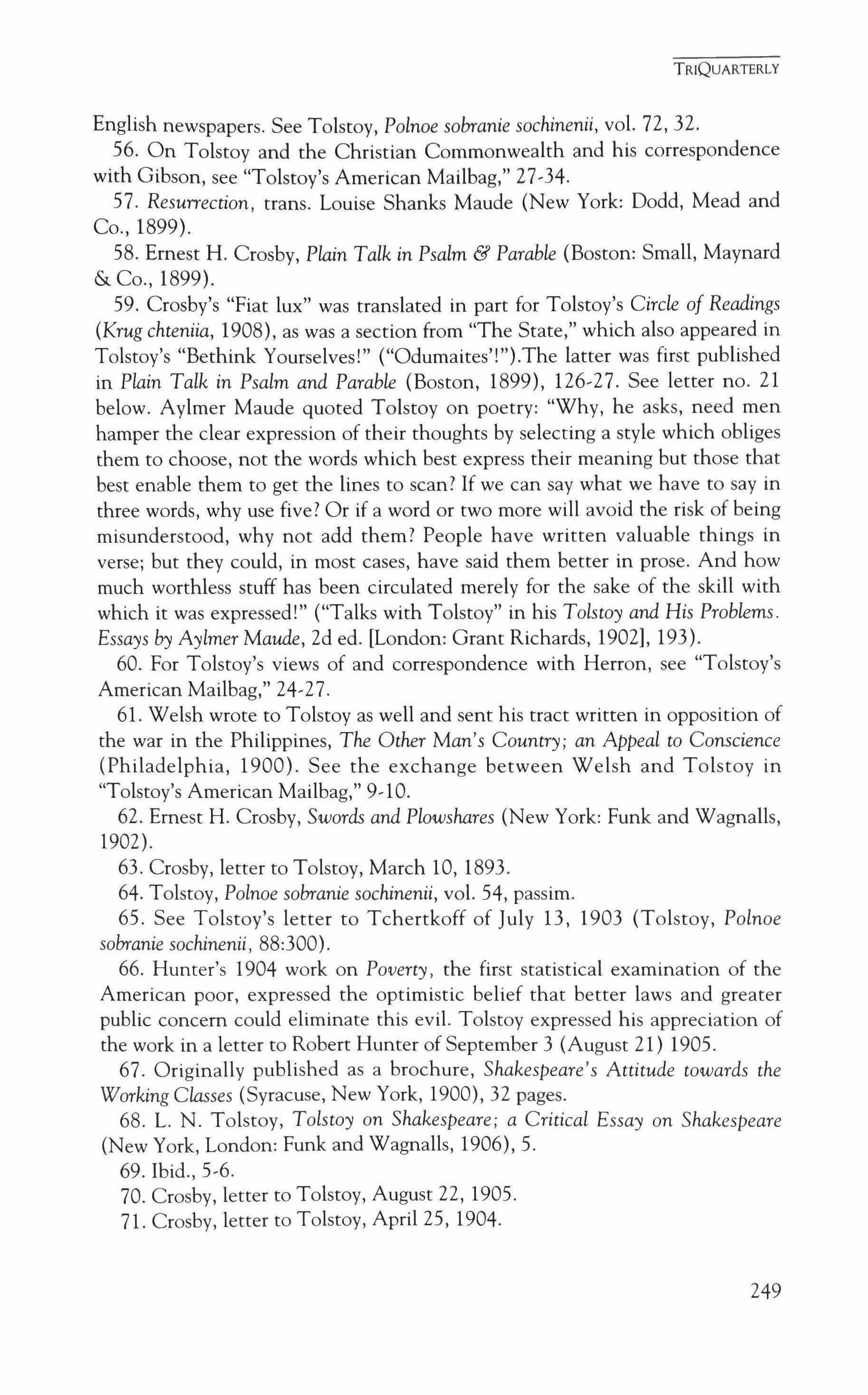
English newspapers. See Tolstoy, Polnoe sobranie sochinenii, vol. 72,32.
56. On Tolstoy and the Christian Commonwealth and his correspondence with Gibson, see ''Tolstoy's American Mailbag," 27-34.
57. Resurrection, trans. Louise Shanks Maude (New York: Dodd, Mead and Co., 1899).
58. Ernest H. Crosby, Plain Talk in Psalm & Parable (Boston: Small, Maynard & Co., 1899).
59. Crosby's "Fiat lux" was translated in part for Tolstoy's Circle of Readings (Krug chteniia, 1908), as was a section from "The State," which also appeared in Tolstoy's "Bethink Yourselves!" ("Odumaites'!").The latter was first published in Plain Talk in Psalm and Parable (Boston, 1899), 126-27. See letter no. 21 below. Aylmer Maude quoted Tolstoy on poetry: "Why, he asks, need men hamper the clear expression of their thoughts by selecting a style which obliges them to choose, not the words which best express their meaning but those that best enable them to get the lines to scan? If we can say what we have to say in three words, why use five? Or if a word or two more will avoid the risk of being misunderstood, why not add them? People have written valuable things in verse; but they could, in most cases, have said them better in prose. And how much worthless stuff has been circulated merely for the sake of the skill with which it was expressed!" ("Talks with Tolstoy" in his Tolstoy and His Problems. Essays by Aylmer Maude, 2d ed. [London: Grant Richards, 1902], 193).
60. For Tolstoy's views of and correspondence with Herron, see "Tolstoy's American Mailbag," 24-27.
61. Welsh wrote to Tolstoy as well and sent his tract written in opposition of the war in the Philippines, The Other Man's Country; an Appeal to Conscience (Philadelphia, 1900). See the exchange between Welsh and Tolstoy in "Tolstoy's American Mailbag," 9-10.
62. Ernest H. Crosby, Swords and Plowshares (New York: Funk and Wagnalls, 1902).
63. Crosby, letter to Tolstoy, March 10, 1893.
64. Tolstoy, Polnoe sobranie sochinenii, vol. 54, passim.
65. See Tolstoy's letter to Tchertkoff of July 13, 1903 (Tolstoy, Polnoe sobranie sochinenii, 88:300).
66. Hunter's 1904 work on Poverty, the first statistical examination of the American poor, expressed the optimistic belief that better laws and greater public concern could eliminate this evil. Tolstoy expressed his appreciation of the work in a letter to Robert Hunter of September 3 (August 21) 1905.
67. Originally published as a brochure, Shakespeare's Attitude towards the Working Classes (Syracuse, New York, 1900),32 pages.
68. L. N. Tolstoy, Tolstoy on Shakespeare; a Critical Essay on Shakespeare (New York, London: Funk and Wagnalls, 1906),5.
69. Ibid., 5-6.
70. Crosby, letter to Tolstoy, August 22, 1905.
71. Crosby, letter to Tolstoy, April 25, 1904.
TRIQUARTERLY
249

72. Crosby, Plain Talk, 186.
73. An abbreviated version, dated May 21, 1904, appeared in the New York Times on July 10. (Of this version, Crosby had mistakenly written: "It was published in full in the New York Times last Sunday.")
74. Myron Henry Phelps, Life and Teachings of Abbas Effendi: a Study of the Religion of the Babis, or Behais Founded by the Persian Bab and by His Successors, Beha Ullah and Abbas Effendi (New York: G. P. Putnam's, 1903).
75. Tolstoy here used the "old style" date, which (in the twentieth century) is thirteen days behind the "new style" Gregorian calendar used in the West.
76. Tolstoy, letter to I. A. Grinevskaya, October 22, 1903 (Tolstoy, Polnoe sobranie sochinenii, vol. 74, 208).
77. Tolstoy, letter to Jonas Khan, February 23, 1910 (Polnoe sobranie sochinenii, vol. 81,107).
78. The Minister of the Interior, V. K. Plehve, was assassinated July 28, 1904.
79. Benjamin Fay Mills, Victory Through Surrender (Chicago: Fleming H. Revell, 1892).
80. Crosby, letter to Tolstoy, February 26. 1905.
81. Crosby, letter to Tolstoy, July 1,1905.
82. Crosby, letter to Tolstoy, August 4,1905.
83. L. N. Tolstoy, "How Are the Working People to Free Themselves?" Independent 58 (April 15, 1905), 1333-36.
84. Crosby, letter to Tolstoy, August 22, 1905.
85. Tolstoy, L. N. "Letter to the Czar and His Advisers," Independent 60 (January 4,1906): 37-38.
86. Ernest H. Crosby, Garrison, the Non-Resistant (Chicago: The Public Publishing Co., 1905). Reprinted in facsimile by Jerome W. Ozer, Publisher, 1972, in the "Peace Movement in America" series. Ernest H. Crosby, Tolstoy as a Schoolmaster (Chicago: Hammersmark, 1904).
87. See the publication of this exchange by Rev. Wilson, who first brought Ballou to Tolstoy's attention, "The Christian Doctrine of Non-Resistance. By Count Leo Tolstoi and the Rev. Adin Ballou: Unpublished Correspondence complied by Rev. Lewis G. Wilson," The Arena 13 (December 1890),1-12.
88. Crosby, letter to Tolstoy, April 3, 1906.
89. Translated in mid-1905 into Russian, Crosby's Tolstoy as a Schoolmaster was published the next year by the Tolstoyan publishers "Posrednik" (Intermediary) in Moscow (Tolstoi kak shkol'nyi uchitel').
TRIQUARTERLY
250
Easter Raga
Vikas Menon
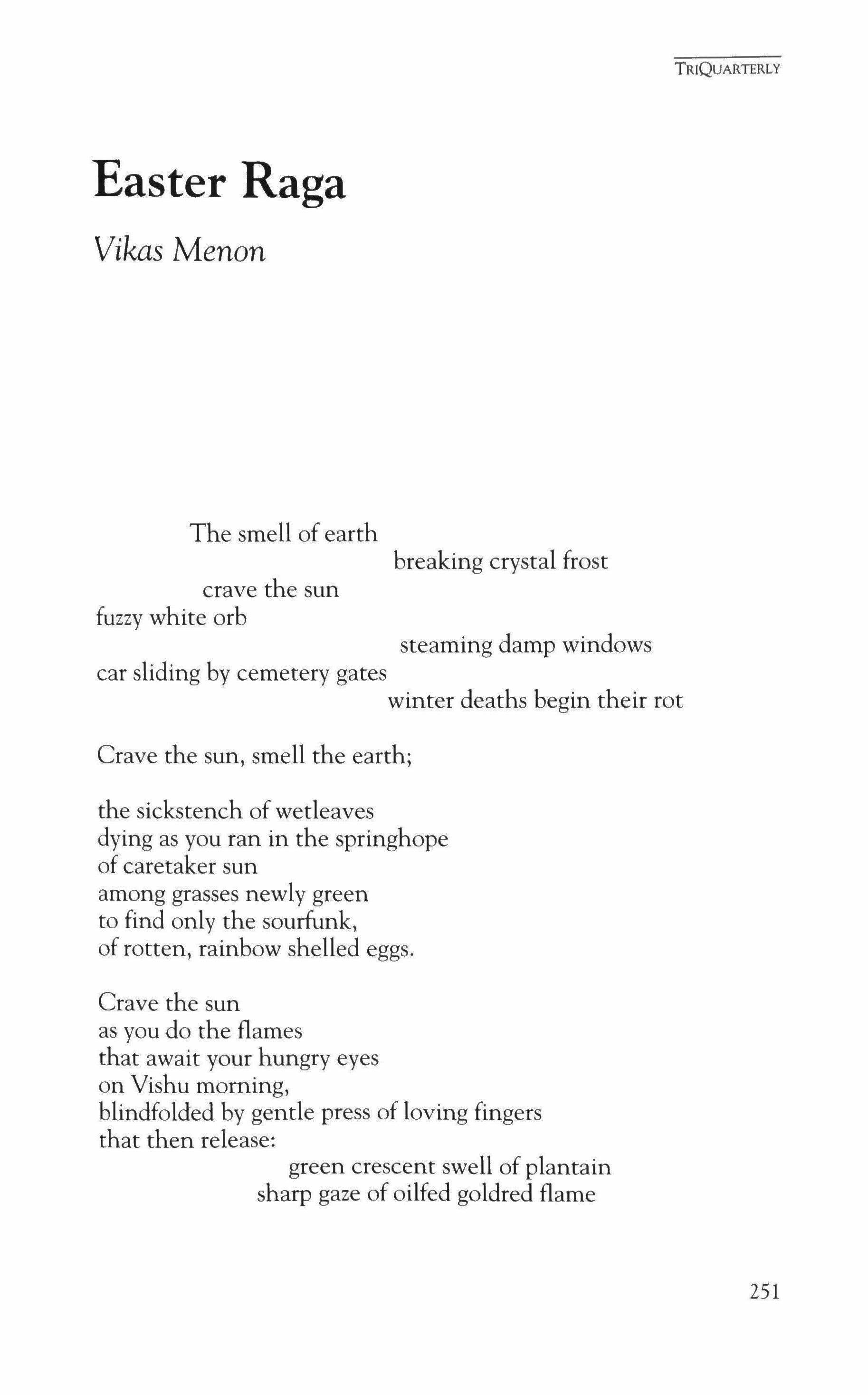
The smell of earth breaking crystal frost
crave the sun fuzzy white orb steaming damp windows car sliding by cemetery gates winter deaths begin their rot
Crave the sun, smell the earth; the sickstench of wetleaves dying as you ran in the springhope of caretaker sun among grasses newly green to find only the sourfunk, of rotten, rainbow shelled eggs.
Crave the sun as you do the flames that await your hungry eyes on Vishu morning, blindfolded by gentle press of loving fingers that then release:
green crescent swell of plantain sharp gaze of oilfed goldred flame
TRIQUARTERLY
251
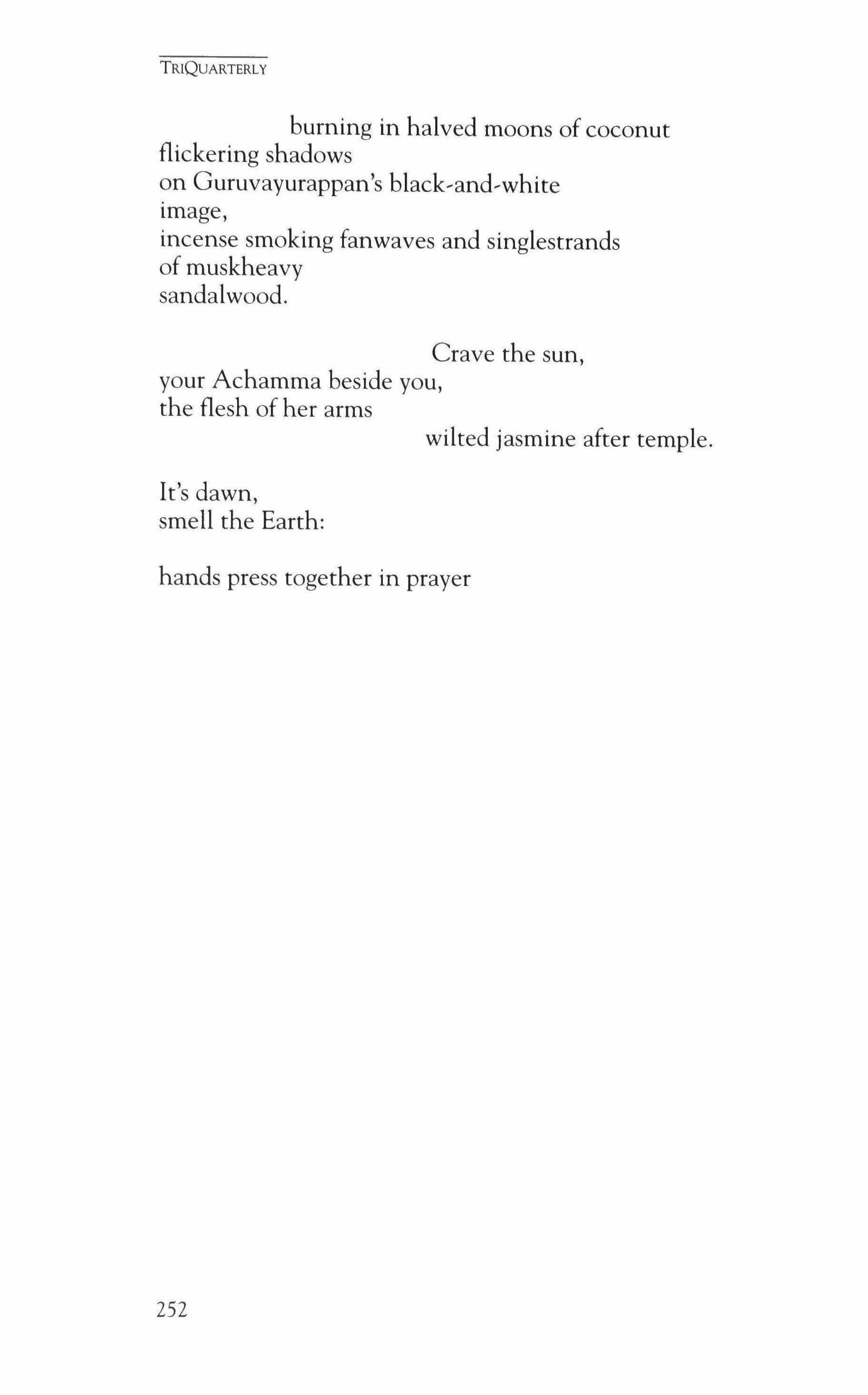
burning in halved moons of coconut flickering shadows on Guruvayurappan's black-and-white image, incense smoking fanwaves and singlestrands of muskheavy sandalwood.
Crave the sun, your Achamma beside you, the flesh of her arms wilted jasmine after temple.
It's dawn, smell the Earth: hands press together in prayer
TRIQUARTERLY
252
Contributors

Tom Sleigh's most recent book of poems, The Chain, was published in 1996 by the University of Chicago Press. His other books are After One (Houghton Mifflin, 1983) and Waking (University of Chicago Press, 1990). * * * Alice Fulton has published four books of poems, Sensual Math (W. W. Norton, 1995), Powers of Congress (David R. Godine, 1990), Palladium (University of Illinois Press, 1986) and Dance Script with Electric Ballerina (1983; reissued by the University of Illinois Press, 1996). Her story, "Queen Wintergreen," in TQ #84, was anthologized in The Best American Short Stories 1993 (Houghton Mifflin) * * * Alec Marsh teaches poetry at Muhlenberg College. A poem of his appeared in TQ #95. * * * Edward Hirsch's most recent book of poems is Earthly Measures (Knopf, 1994). He teaches at the University of Houston. * * * Carl Phillips is the author of In the Blood (Northeastern University Press, 1992) and Cortege (Graywolf Press, 1995), the latter of which was a finalist for the National Book Critics Circle Award. He is an associate professor of English and AfricanAmerican literature and director of the creative writing program at Washington University, in St. Louis. * * * Charles Baxter teaches in the MFA program in creative writing at the University of Michigan. He will publish two new books in 1997: a book of fiction, Believers (Pantheon); and a book of essays on fiction (Graywolf Press). His story, "Super Night," which appeared in TQ #91, was anthologized in The Pushcart Prize XX: Best of the Small Presses (Pushcart Press, 1995).
Leigh Buchanan Bienen's short stories have appeared in the Ontario Review, Descant and O. Henry Prize Stories 1983 (Doubleday). She has also published books and articles on capital punishment, homicide, rape
TRIQUARTERLY
253

and incest. * * * Stephen Dixon's nineteenth book of fiction, Gould, a novel, will be published by Henry Holt in fall 1997. His most recent book is Man on Stage: Playstories (Hi Jinx Press, 1996), a collection of four one-act "story" plays. His last novel, Interstate (Henry Holt, 1995), was a finalist for the National Book Award, as was Frog (British American Publishing, 1991); both have been reissued by Owl Books. * * * Jason Sommer's second book of poems, Other People's Troubles, will be published in fall 1997 by the University of Chicago Press. His first collection was Lifting the Stone (Forest Books, 1991). * * * Heather Smith is a graduate student in the Writers' Workshop at the University of Iowa. In summer 1994, she worked as a volunteer in a Bosnian refugee camp. * * * Pimone Triplett is completing a Ph.D. in creative writing at the University of Houston. Her poems have appeared, or are forthcoming in, the Paris Review, Quarterly West and Poetry * * * David Gewanter's first book of poems, In the Belly, will be published by the University of Chicago Press in 1997. He teaches writing at Harvard University.
Katherine Soniat's third collection of poems, A Shared Life, received the Iowa Poetry Prize and was published by the University of Iowa Press (1993). Her poems have appeared in the Nation, Kenyon Review, the Southern Review, and other journals.
* * * Dabney Stuart's recent books are Second Sight: Poems for Paintings by Carroll Claar (University of Missouri Press, 1996); and Long Gone (1996) and Light Years: New and Selected Poems (1994), both published by Louisiana State University Press. He has published poems, stories and an essay in this magazine.
* * * David Teplica is a practicing plastic and reconstructive surgeon at St. Joseph Hospital, in Chicago, and serves as a clinical associate at the University of Chicago. He has a Master of Fine Arts degree from the School of the Art Institute of Chicago. * * * Alan Williamson teaches at the University of California, Davis. His most recent books are Love and the Soul (poems, University of Chicago Press, 1995) and Eloquence and Mere Life (essays, University of Michigan Press, 1994). * * * Eric Pankey's new collection of poems is The Late Romances (Knopf, 1997).
* * * Jill Bialosky's poems have appeared in the Seneca Review, Antioch Review, Partisan Review and other journals.
Joan Connor teaches fiction writing at Ohio University and is an assistant editor for fiction at Chelsea. Her stories have appeared in the North American Review, the Southern Review, Shenandoah and several other journals. * * * Cammie McGovern recently completed a Wallace Stegner Fellowship at Stanford University. Her stories have
TRIQUARTERLY
254
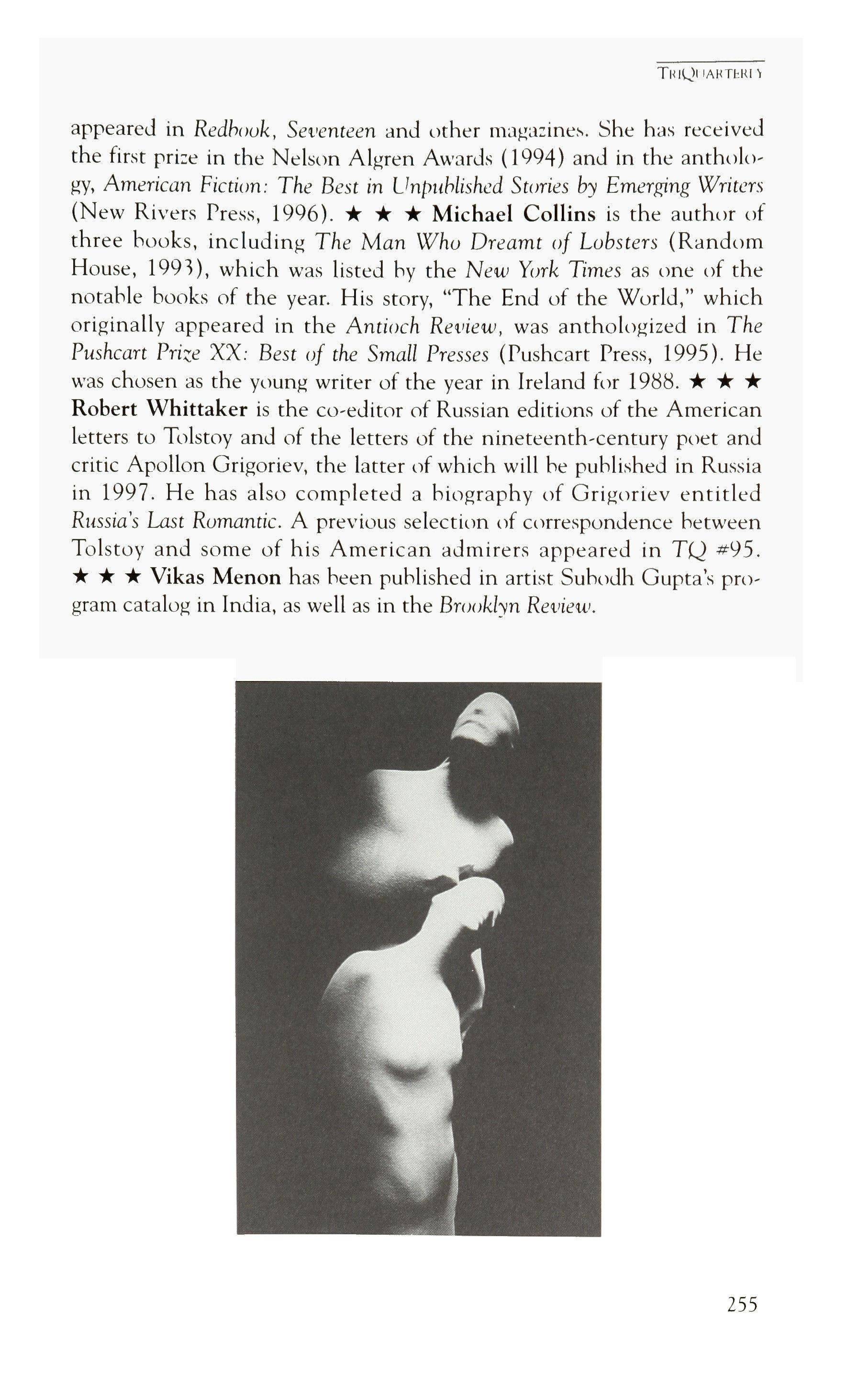
appeared in Redh()uk, Set'enteen and other magazines. She has received the first prize in the Nelson Algren Awards (1994) and in the anthology, American Ficti()n: The Best in L1nptthlished St()ries by Emer[;ing Writers (New Rivers Press, 1996). * * * Michael Collins is the author (It" three books, including The Man \Vhu Dreamt ()f Lobsters (Random House, 199)), which was listed hy the Nesu Yc)rk Times as one of the notable books of the year. His story, "The End of the World," which originally appeared in the Anti()ch Re�lieu), was anthologized in The Ptlshcart Prize XX: Best ()f the Small Presses (Pushcart Press, 1995). He was chosen as the young writer of the year in Ireland for 1988. * * *
Robert Whittaker is the co-editor of Russian editions of the American letters to Tolstoy and of the letters of the nineteenth-century poet and critic Apollon Grigoriev, the latter of which will he published in Russia in 1997. He has also completed a biography of Grigoriev entitled Rllssia's Last Rumantic. A previous selection of correspondence between Tolstoy' and some of his American admirers appeared in T(J #95. * * * Vikas Menon has heen published in artist Subodh Gupta's program catalog in India, as well as in the Brc)c)kl"ln Re1)ie�i).
THI\.JI 'AKT�I{I i
255
TriQuarterly thanks the following past donors and life subscribers:
David C. Abercrombie
Mr. and Mrs. Walter L. Adams
Amin Alimard
Lois Ames
Richard H. Anderson
Roger K. Anderson
Sandy Anderson
I. N. C. Aniebo
Anonymous
University of Arizona Poetry Center
Gayle Arnzen
Michael Attas
Asa Baber
Hadassah Baskin
Tom G. Bell
Sandra Berris
Simon J. Blattner, Jr.
Mr. and Mrs. Andrew K. Block
Louise Blosten
Carol Bly
Susan DeWitt Bodemer
Kay Bonetti
Robert Boruch
Mr. and Mrs. Richard S. Brennan
Van K. Brock
Gwendolyn Brooks
Timothy Browne
Paul Bundy
Eric O. Cahn
David Cassak
Stephen Chapman
Anthony Chase
Michael Chwe
Willard Cook
Mr. and Mrs. William Cottle
Robert A. Creamer
Andrew Cyr
Doreen Davie
Kenneth Day
Mark W. DeBree
Elizabeth Des Pres
Anstiss Drake
J. A. Dufresne
Mr. and Mrs. Donald Egan
John B. Elliott
Christopher English
Carol Erickson
Steven Finch
David R. Fine
Mr. and Mrs. H. Bernard Firestone

Melvin P. Firestone, M.D.
Mr. and Mrs. Solway Firestone
Paul Fjelstad
Torrence Fossland
C. Dwight Foster
Jeffrey Franklin
Peter S. Fritz
Mrs. Angela M. Gannon
Kathy M. Garness
Robert Gislason
Mr. and Mrs. Stanford J. Goldblatt
Lawrence J. Gorman
Maxine Groffsky
Jack Hagstrom
Mrs. Donald Haider
Mrs. Heidi HalHones
Mrs. James E. Hayes
Joanna Hearne
Ross B. Heath
Charles Hedde
Gene Helton
Donald Hey
Donald A. Hillel
Mr. and Mrs. David C. Hilliard
Mr. and Mrs. Thomas D. Hodgkins
Craig V. Hodson
Irwin L. Hoffman
Irwin T. Holtzman
P. Hosier
Mary Gray Hughes
Charles Huss
Curtis Imrie
Helen Jacob
Del Ivan Janik
Fran Katz
Gary Michael Katz
Dr. Alfred D. Klinger
Loy E. Knapp
Sydney Knowlton
Mr. and Mrs. Martin Koldyke
Mr. and Mrs. Carl A. Kroch
Greg Kunz
Judy Kunz
Conrad A. Langenberg
John Larroquette
Isaac Lassiter
Dorothy Latiak
Elizabeth Leibik
Patrick A. Lezark
Patricia W. Linton
Philip Lister
Mr. and Mrs. W. J. Lorentz de Haas
Kubet Luchterhand
Ellen L. Marks
Richard Marmulstein
James Marquardt
Charles T. Martin, Jr.
Ms. Jane Mayer
Kevin McCanna
Robert D. McChesney
Charles Gene McDaniel
Martin H. McGrath
Robert McMillan
Mr. and Mrs. Andrew McNally
Michael Meaney
George Meredith
Lois Adele Meyer
Cliff Michel Gallery
University of Michigan Hopwood Room
Michal Miller
Ralph Miller
Kenneth Monroe
William T. Morgan
Max Nathan
Dean Neprud
Fred S. Novy
Catherine Ohs
Lenrie Peters
Paul Peters and Rosemarie Kozdron
Scott Peters
Jane Petro
Lee Phillip
Mrs. Marlene Welsh Phillips
Evelyn Pine
Doyle Pitman
Fran Podulka
Geraldine R. Pratt
Alex T. Primm
Richard Prinz, M.D.
Honora Rankine-Galloway
Anne Katheryn Ream
J. M. Reese
Peter Reich
Susan Reiners
Don Reynolds
Mary Ellen Reynolds
Christopher Richter
Diane Rider
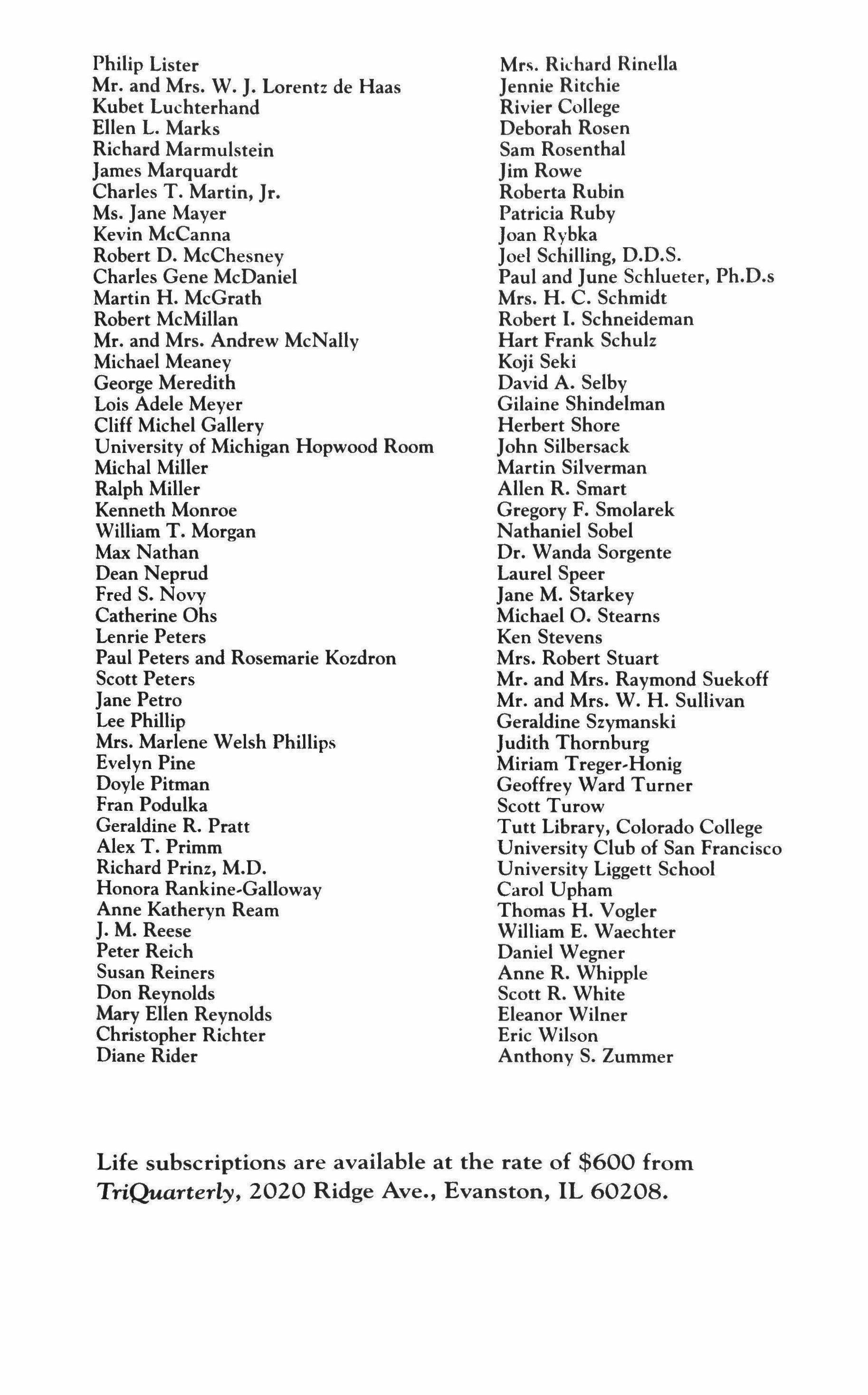
Mrs. Richard Rinella
Jennie Ritchie
Rivier College
Deborah Rosen
Sam Rosenthal
Jim Rowe
Roberta Rubin
Patricia Ruby
Joan Rybka
Joel Schilling, D.D.S.
Paul and June Schlueter, Ph.D.s
Mrs. H. C. Schmidt
Robert I. Schneideman
Hart Frank Schulz
Koji Seki
David A. Selby
Gilaine Shindelman
Herbert Shore
John Silbersack
Martin Silverman
Allen R. Smart
Gregory F. Smolarek
Nathaniel Sobel
Dr. Wanda Sorgente
Laurel Speer
Jane M. Starkey
Michael o. Steams
Ken Stevens
Mrs. Robert Stuart
Mr. and Mrs. Raymond Suekoff
Mr. and Mrs. W. H. Sullivan
Geraldine Szymanski
Judith Thornburg
Miriam Treger-Honig
Geoffrey Ward Turner
Scott Turow
Tutt Library, Colorado College
University Club of San Francisco
University Liggett School
Carol Upham
Thomas H. Vogler
William E. Waechter
Daniel Wegner
Anne R. Whipple
Scott R. White
Eleanor Wilner
Eric Wilson
Anthony S. Zummer
Life subscriptions are available at the rate of $600 from TriQuarterly, 2020 Ridge Ave., Evanston, IL 60208.
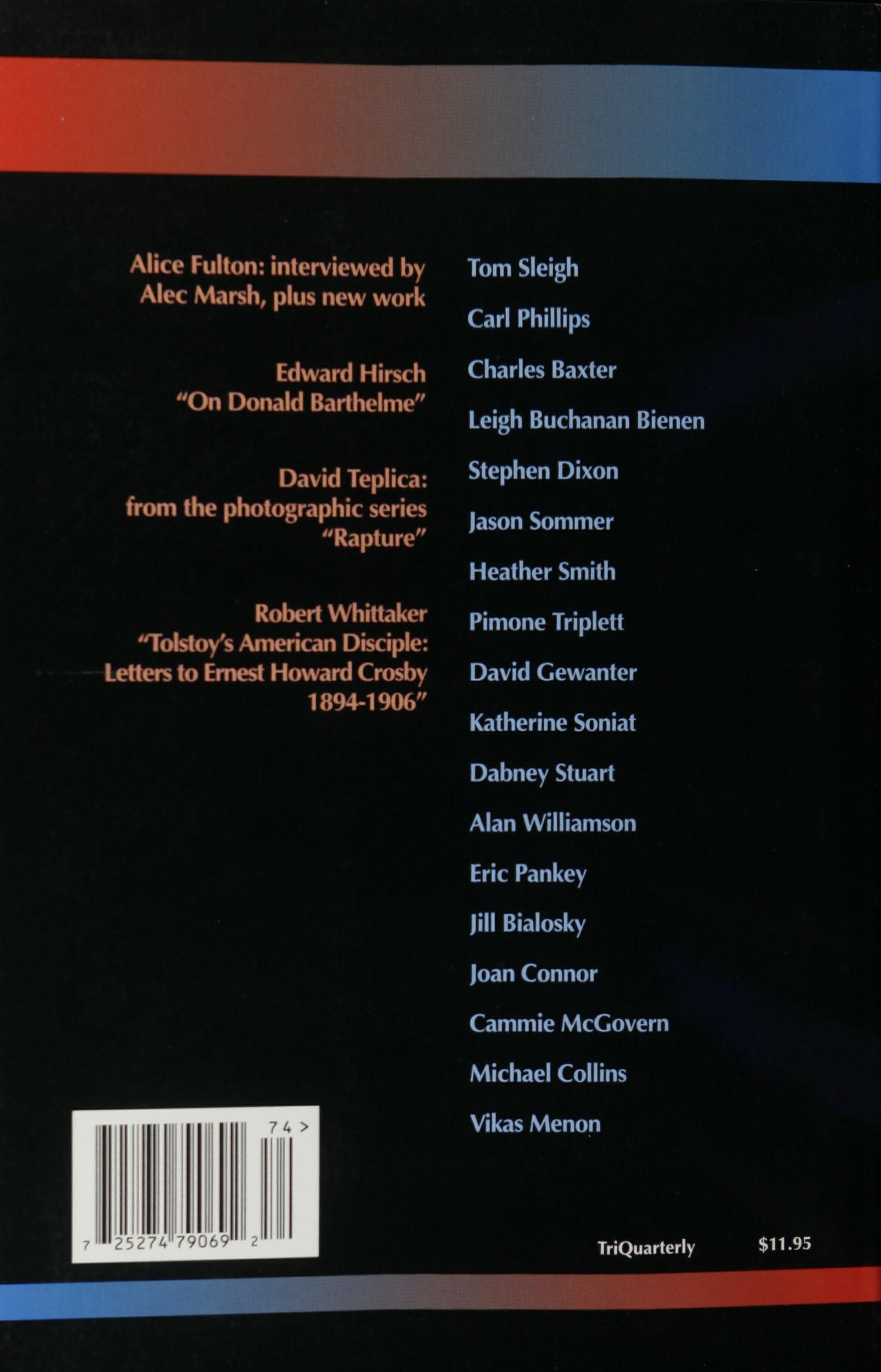
74 >










































 Alice Fulton
Alice Fulton






















































































































































































































